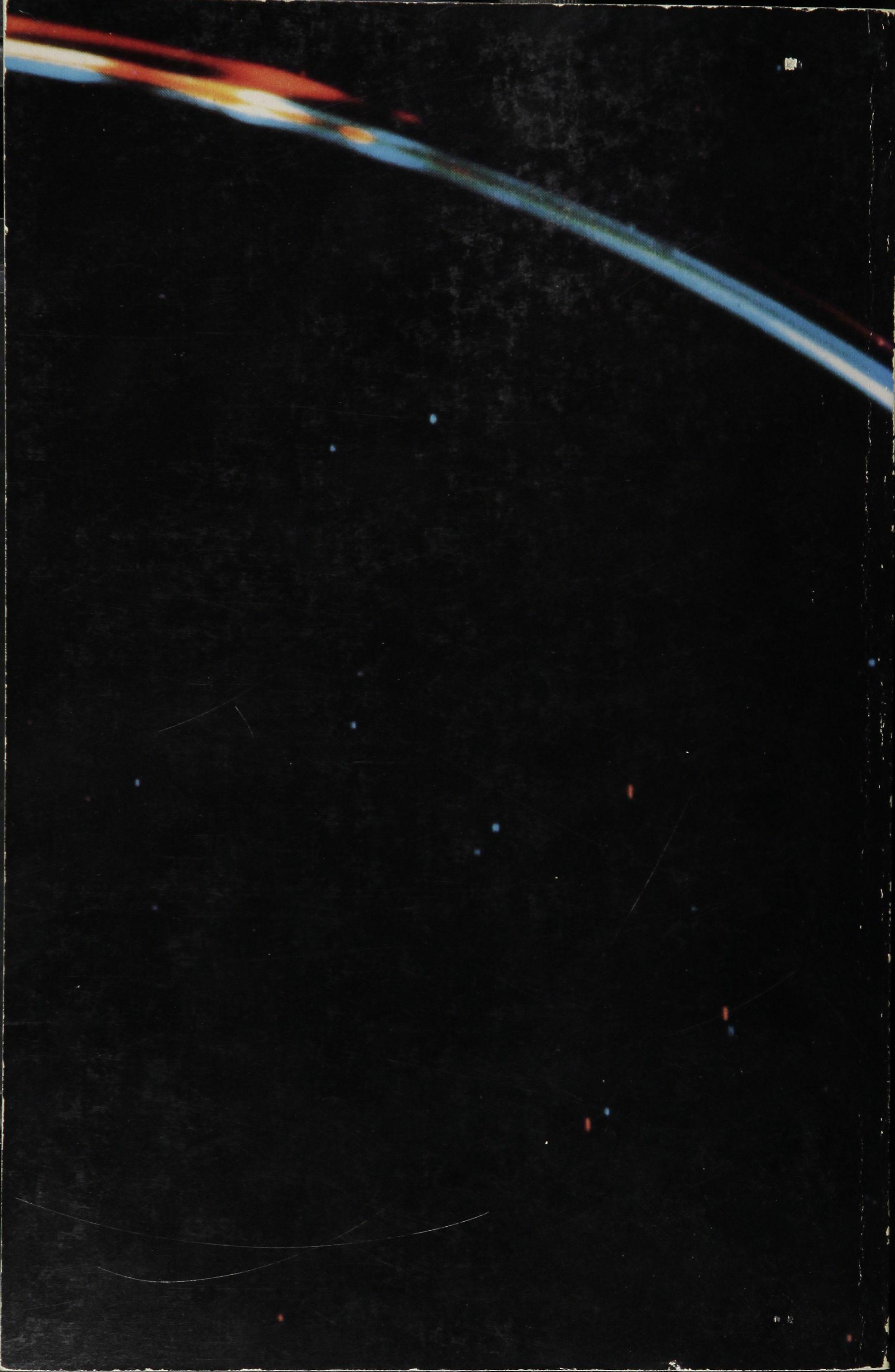






Editors:
Elliott Anderson, Jonathan Brent
Guest Editors: David Hartwell, Robert Onopa
Art Director: Cynthia Anderson
Managing Editor: Michael McDonnell
Associate Editor: Anne-Marie Zwierzyna
Assistant Editors: Demetra Bowles, Susan Hahn, Lisa Johnson, Fred Shafer, Mary Elinore Smith, Pam Sprague
Advisory Editors: Lawrence Levy, Charles Newman
Fulfillment: Judy Marrs
Contributing Editors:
Robert Alter, Michael Anania, Gerald Graff, John Hawkes, David Hayman, Bill Henderson, Ian MacMillan, Joseph McElroy, Peter Michelson, Robert Ray, Tony Tanner, Nathaniel Tam
TriQuarterly is an international journal of art and writing published in the fall. winter. and spring at Northwestern University, Evanston. Illinois 6020 I.
Subscription rates: One year $14.00; two years $25.00; three years $35.00 Foreign subscriptions $1.00 per year additional. Single copies usually $5.95. Back issue prices on request. Contributions. correspondence, and subscriptions should be addressed to TriQuarterly, 1735 Benson Avenue. Northwestern University. Evanston. Illinois 6020 I. The editors invite submissions. but queries are strongly suggested. No manuscripts will be returned unless accompanied by a stamped. self-addressed envelope. All manuscripts accepted for publication become the property of TriQuarterly, unless otherwise indicated. Copyright © 1980 by TriQuarterly. All rights reserved. The views expressed in this magazine are to be attributed to the writers. not the editors or sponsors. Printed in the United States of America. Claims for missing numbers will be honored only within the four-month period after month of issue.
NATIONAL DISTRIBUTOR TO RETAIL TRADE: B DEBOER. 113 E. CENTRE STREET·REAR. NUTLEY. NEW JERSEY 07110. DISTRIBUTOR FOR WEST COAST TRADE: BOOK PEOPLE. 2940 7TH STREET. BERKELEY. CALI· FORNIA 94710. MIDWEST: BooKSLINGER. P.O. BOX 16251.2163 FORD PKWY. ST. PAUL. MINNESOTA 55116.
REPRINTS OF BACK ISSUES OF TriQuarterly ARE NOW AVAJLABLE IN FULL FORMAT FROM KRAUS REPRINT COMPANY. ROUTE 100, MILLWOOD. NEW YORK 10546. AND IN MICROALM FROM UMJ, A XEROX COMPANY, ANN ARBOR, MICHIGAN 48106.
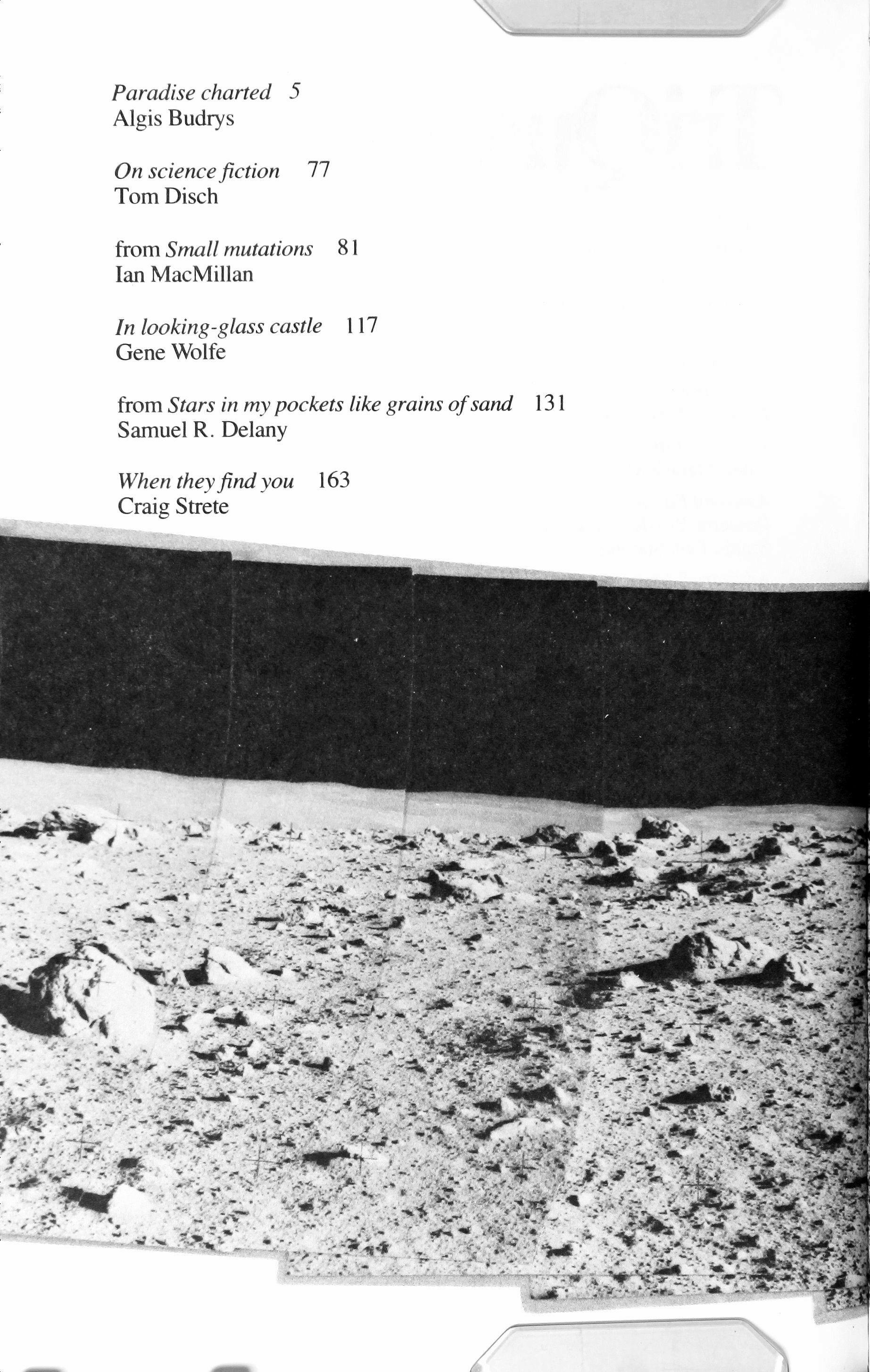
Paradise charted 5
On sciencefiction 77
Tom Disch
from Small mutations 8 1
Ian MacMillan
In looking-glass castle 117
Gene Wolfe
from Stars in my pockets like grains ofsand 131
Samuel R. Delany
When theyfind you 163
Craig Strete
Ginungagap 179
Michael SwanwickThe pressure oftime 213
Thomas M. DischThe white donkey 259
Ursula K. Le Gum

Cover: Jupiter's ring system as photographed from the Voyager 2 spacecraft courtesy NASA (National Aeronautics and Space Administration)
Below: One in a series offour photographs composing a 3600 panoramic view ofthe Apollo 14 Fra Mauro lunar landing site courtesy NASA (NationalAeronautics andSpaceAdministration)

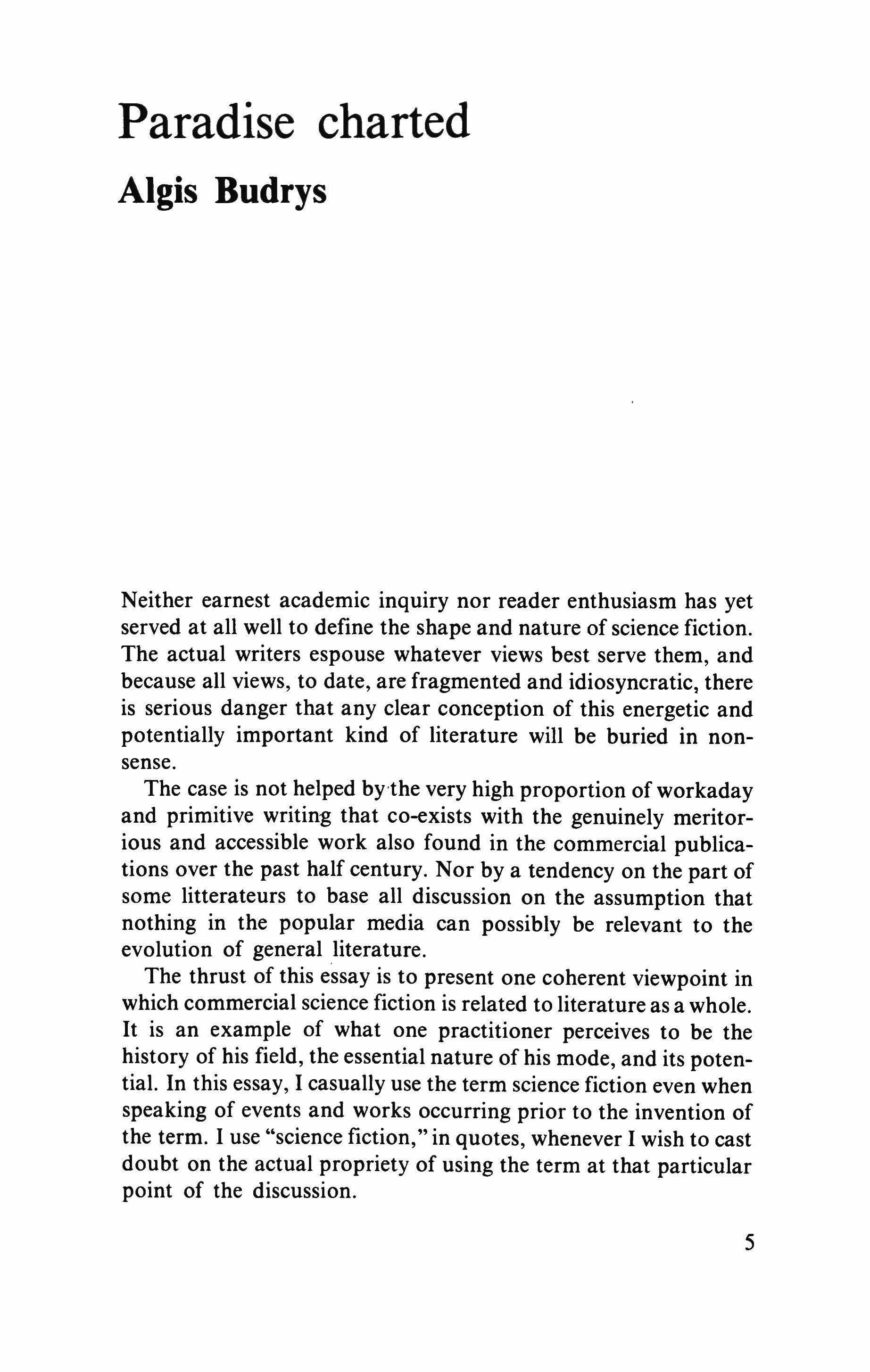
Neither earnest academic inquiry nor reader enthusiasm has yet served at all well to define the shape and nature of science fiction. The actual writers espouse whatever views best serve them, and because all views, to date, are fragmented and idiosyncratic, there is serious danger that any clear conception of this energetic and potentially important kind of literature will be buried in nonsense.
The case is not helped bythe very high proportion of workaday and primitive writing that co-exists with the genuinely meritorious and accessible work also found in the commercial publications over the past half century. Nor by a tendency on the part of some litterateurs to base all discussion on the assumption that nothing in the popular media can possibly be relevant to the evolution of general literature.
The thrust of this essay is to present one coherent viewpoint in which commercial science fiction is related to literature as a whole. It is an example of what one practitioner perceives to be the history of his field, the essential nature of his mode, and its potential. In this essay, I casually use the term science fiction even when speaking of events and works occurring prior to the invention of the term. I use "science fiction," in quotes, whenever I wish to cast doubt on the actual propriety of using the term at that particular point of the discussion.
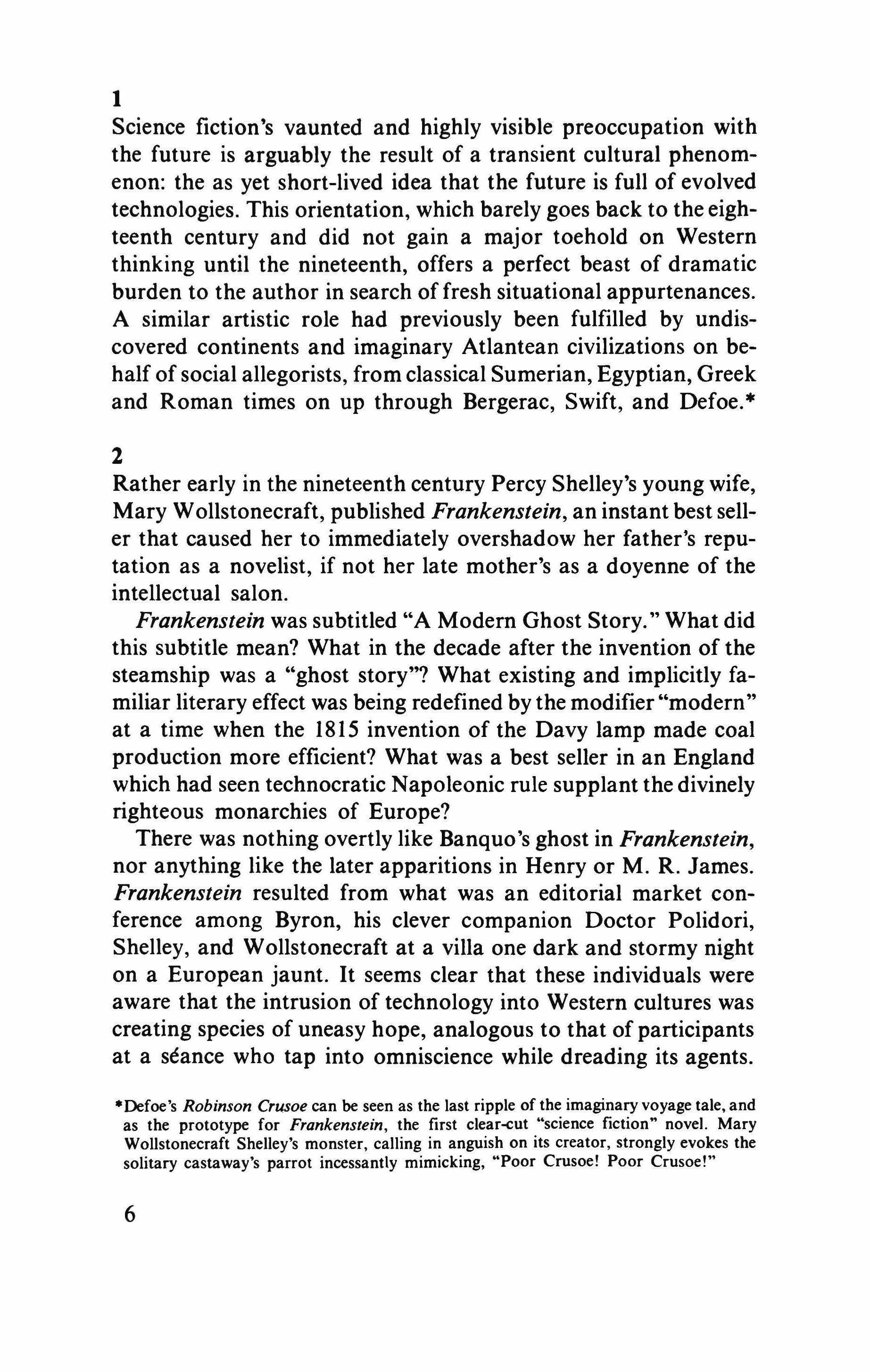
Science fiction's vaunted and highly visible preoccupation with the future is arguably the result of a transient cultural phenomenon: the as yet short-lived idea that the future is full of evolved technologies. This orientation, which barely goes back to the eighteenth century and did not gain a major toehold on Western thinking until the nineteenth, offers a perfect beast of dramatic burden to the author in search of fresh situational appurtenances. A similar artistic role had previously been fulfilled by undiscovered continents and imaginary Atlantean civilizations on behalf of social allegorists, from classical Sumerian, Egyptian, Greek and Roman times on up through Bergerac, Swift, and Defoe. *
2
Rather early in the nineteenth century Percy Shelley's young wife, Mary Wollstonecraft, published Frankenstein, an instant best seller that caused her to immediately overshadow her father's reputation as a novelist, if not her late mother's as a doyenne of the intellectual salon.
Frankenstein was subtitled "A Modern Ghost Story." What did this subtitle mean? What in the decade after the invention of the steamship was a "ghost story"? What existing and implicitly familiar literary effect was being redefined by the modifier "modern" at a time when the 1815 invention of the Davy lamp made coal production more efficient? What was a best seller in an England which had seen technocratic Napoleonic rule supplant the divinely righteous monarchies of Europe?
There was nothing overtly like Banquo's ghost in Frankenstein, nor anything like the later apparitions in Henry or M. R. James. Frankenstein resulted from what was an editorial market conference among Byron, his clever companion Doctor Polidori, Shelley, and Wollstonecraft at a villa one dark and stormy night on a European jaunt. It seems clear that these individuals were aware that the intrusion of technology into Western cultures was creating species of uneasy hope, analogous to that of participants at a seance who tap into omniscience while dreading its agents.
-Defoe's Robinson Crusoe can be seen as the last ripple of the imaginary voyage tale, and as the prototype for Frankenstein, the first clear-cut "science fiction" novel. Mary Wollstonecraft Shelley's monster, calling in anguish on its creator, strongly evokes the solitary castaway's parrot incessantly mimicking, "Poor Crusoe! Poor Crusoe!"

This potent little circle of litterateurs had no name for the new thing, but they knew what they meant when they pointed to it, and they expected it to create in audiences feelings analogous to those aroused by classical tales of traffic with the worlds beyond. It had to be called something. Thus, "modern ghost story," for better or taxonomic worse.
Although Frankenstein was allegorical in the same sense that Crusoe was allegorical, and similarly addressed itself to the relationship between a sentient, emotional creature and its creator, it called upon the furniture of contemporary technological thinking to create its story situation. For Defoe, God had sufficed. *
Frankenstein, however, lacked any overt uplifting purpose, distinguishing it from the ready interpretations available in Crusoe. By these various measurements it was not a tract; it was a work of prose drama, and today presents ready credentials as "science fiction.
Late in the nineteenth century, Rudyard Kipling dabbled in a few science fiction and fantasy works, among his other short stories, but these of course were overshadowed by the stories of the French adventure-tale writer, Jules Verne. Verne, like Michael Crichton or Martin Caidin today, occasionally borrowed some topic of contemporary interest on the "popular science" level and converted it into a prop for his fiction.
Often honored today as the Father of Science Fiction, Verne was rather the Bard of Steam-the romanticizer of larger, swifter engines and of decisive, adventurous men who seized issues by the throat. He took satisfaction from his enormous popularity and from the fact that every invention he described was, without exception, founded on some prototype already available on some drawing board in his day.
At his father's insistence, Verne had received professional legal training. Leaving his native port of Nantes for the Parisian intellectual community, he quickly began indulging literary avocations that reflected his broad taste for melodrama-which may have arisen as a reaction to the constraints of his almost totally seden-
Actually, of course, Defoe was a rather sly fellow. Eventually, he was author of A Journal of the Plague Year, precursor, with a similar, mature work by Wollstonecraft, of all disaster "science fiction" to come. In showing Crusoe calling Job-like on his Maker for answers while hewing down entire trees to produce one plank, Defoe was saying more about the beginnings of the Age of Reason than Walt Disney ever gave him credit for.
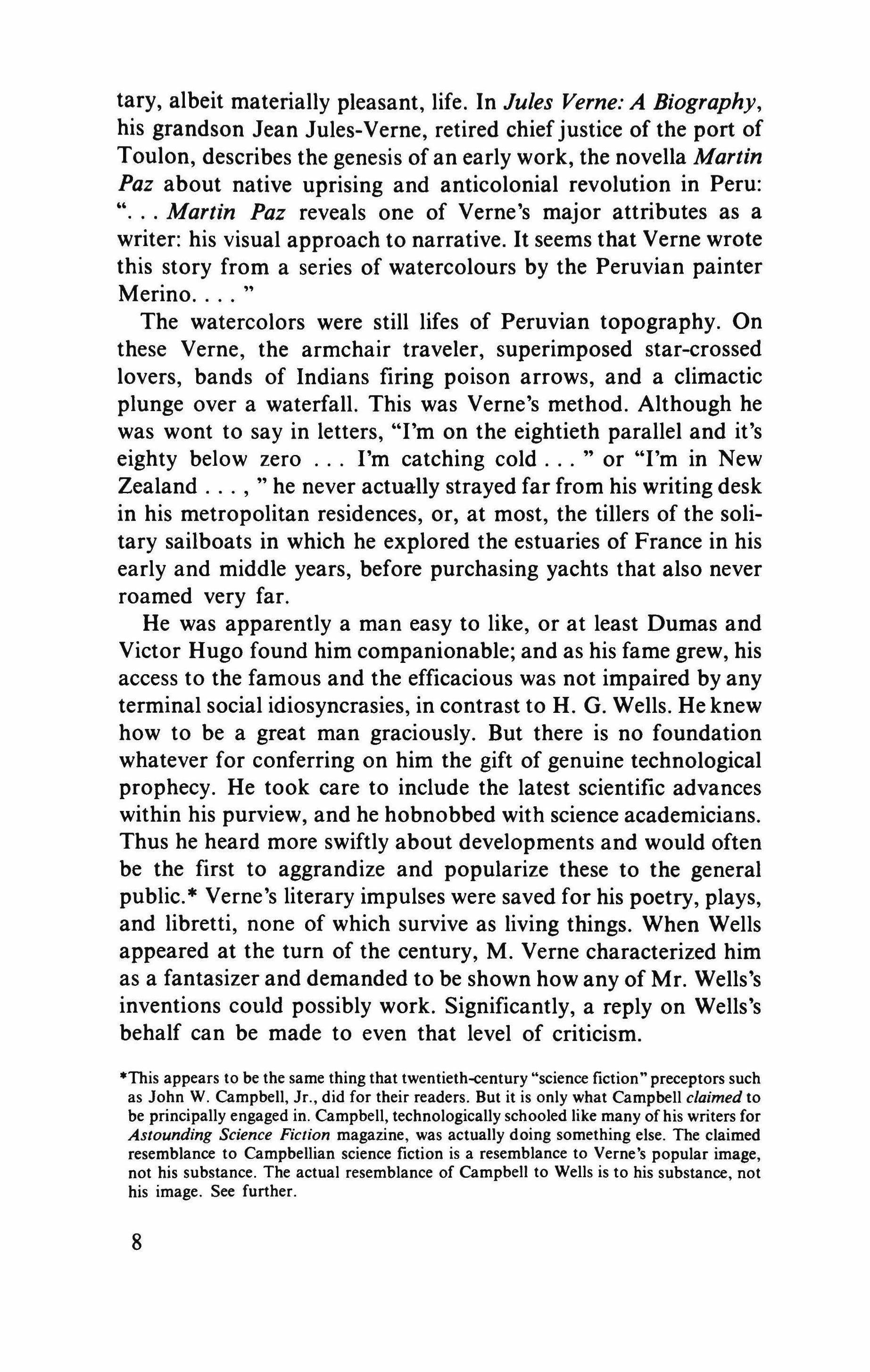
tary, albeit materially pleasant, life. In Jules Verne: A Biography, his grandson Jean Jules-Verne, retired chiefjustice of the port of Toulon, describes the genesis of an early work, the novella Martin Paz about native uprising and anticolonial revolution in Peru: " Martin Paz reveals one of Verne's major attributes as a writer: his visual approach to narrative. It seems that Verne wrote this story from a series of watercolours by the Peruvian painter Merino
The watercolors were still lifes of Peruvian topography. On these Verne, the armchair traveler, superimposed star-crossed lovers, bands of Indians firing poison arrows, and a climactic plunge over a waterfall. This was Verne's method. Although he was wont to say in letters, "I'm on the eightieth parallel and it's eighty below zero I'm catching cold or "I'm in New Zealand he never actually strayed far from his writing desk in his metropolitan residences, or, at most, the tillers of the solitary sailboats in which he explored the estuaries of France in his early and middle years, before purchasing yachts that also never roamed very far.
He was apparently a man easy to like, or at least Dumas and Victor Hugo found him companionable; and as his fame grew, his access to the famous and the efficacious was not impaired by any terminal social idiosyncrasies, in contrast to H. G. Wells. He knew how to be a great man graciously. But there is no foundation whatever for conferring on him the gift of genuine technological prophecy. He took care to include the latest scientific advances within his purview, and he hobnobbed with science academicians. Thus he heard more swiftly about developments and would often be the first to aggrandize and popularize these to the general public. * Verne's literary impulses were saved for his poetry, plays, and libretti, none of which survive as living things. When Wells appeared at the turn of the century, M. Verne characterized him as a fantasizer and demanded to be shown how any of Mr. Wells's inventions could possibly work. Significantly, a reply on Wells's behalf can be made to even that level of criticism.
·This appears to be the same thing that twentieth-century "science fiction" preceptors such as John w. Campbell, Jr., did for their readers. But it is only what Campbell claimed to be principally engaged in. Campbell, technologically schooled like many of his writers for Astounding Science Fiction magazine, was actually doing something else. The claimed resemblance to Campbellian science fiction is a resemblance to Verne's popular image, not his substance. The actual resemblance of Campbell to Wells is to his substance, not his image. See further.
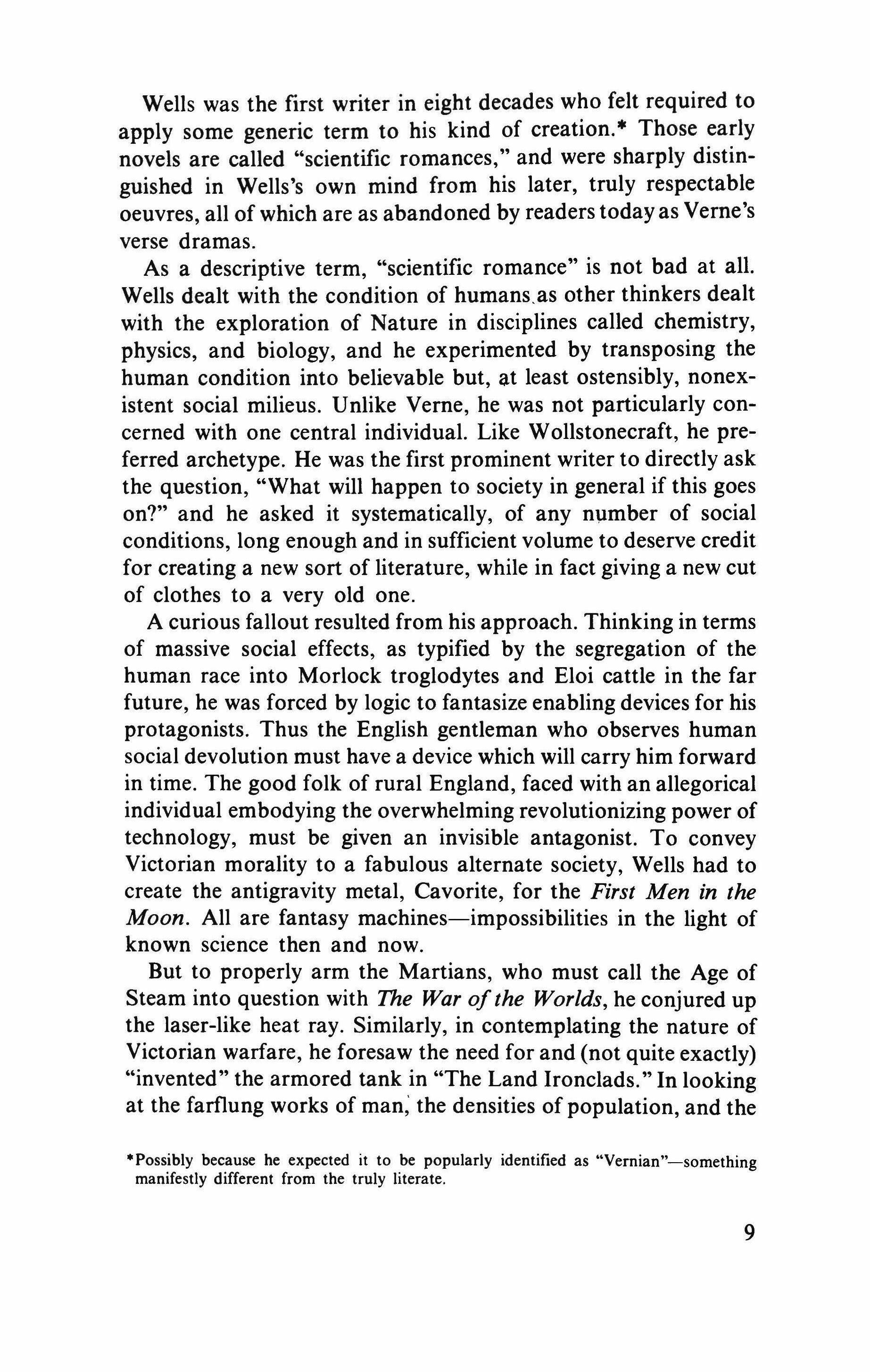
Wells was the first writer in eight decades who felt required to apply some generic term to his kind of creation. * Those early novels are called "scientific romances," and were sharply distinguished in Wells's own mind from his later, truly respectable oeuvres, all of which are as abandoned by readers today as Verne's verse dramas.
As a descriptive term, "scientific romance" is not bad at all. Wells dealt with the condition of humans.as other thinkers dealt with the exploration of Nature in disciplines called chemistry, physics, and biology, and he experimented by transposing the human condition into believable but, at least ostensibly, nonexistent social milieus. Unlike Verne, he was not particularly concerned with one central individual. Like Wollstonecraft, he preferred archetype. He was the first prominent writer to directly ask the question, "What will happen to society in general if this goes on?" and he asked it systematically, of any number of social conditions, long enough and in sufficient volume to deserve credit for creating a new sort of literature, while in fact giving a new cut of clothes to a very old one.
A curious fallout resulted from his approach. Thinking in terms of massive social effects, as typified by the segregation of the human race into Morlock troglodytes and Eloi cattle in the far future, he was forced by logic to fantasize enabling devices for his protagonists. Thus the English gentleman who observes human social devolution must have a device which will carry him forward in time. The good folk of rural England, faced with an allegorical individual embodying the overwhelming revolutionizing power of technology, must be given an invisible antagonist. To convey Victorian morality to a fabulous alternate society, Wells had to create the antigravity metal, Cavorite, for the First Men in the Moon. All are fantasy machines-impossibilities in the light of known science then and now.
But to properly arm the Martians, who must call the Age of Steam into question with The War ofthe Worlds, he conjured up the laser-like heat ray. Similarly, in contemplating the nature of Victorian warfare, he foresaw the need for and (not quite exactly) "invented" the armored tank in "The Land Ironclads." In looking at the farflung works of man; the densities of population, and the
·Possibly because he expected it to be popularly identified as "Vernian"-something manifestly different from the truly literate.
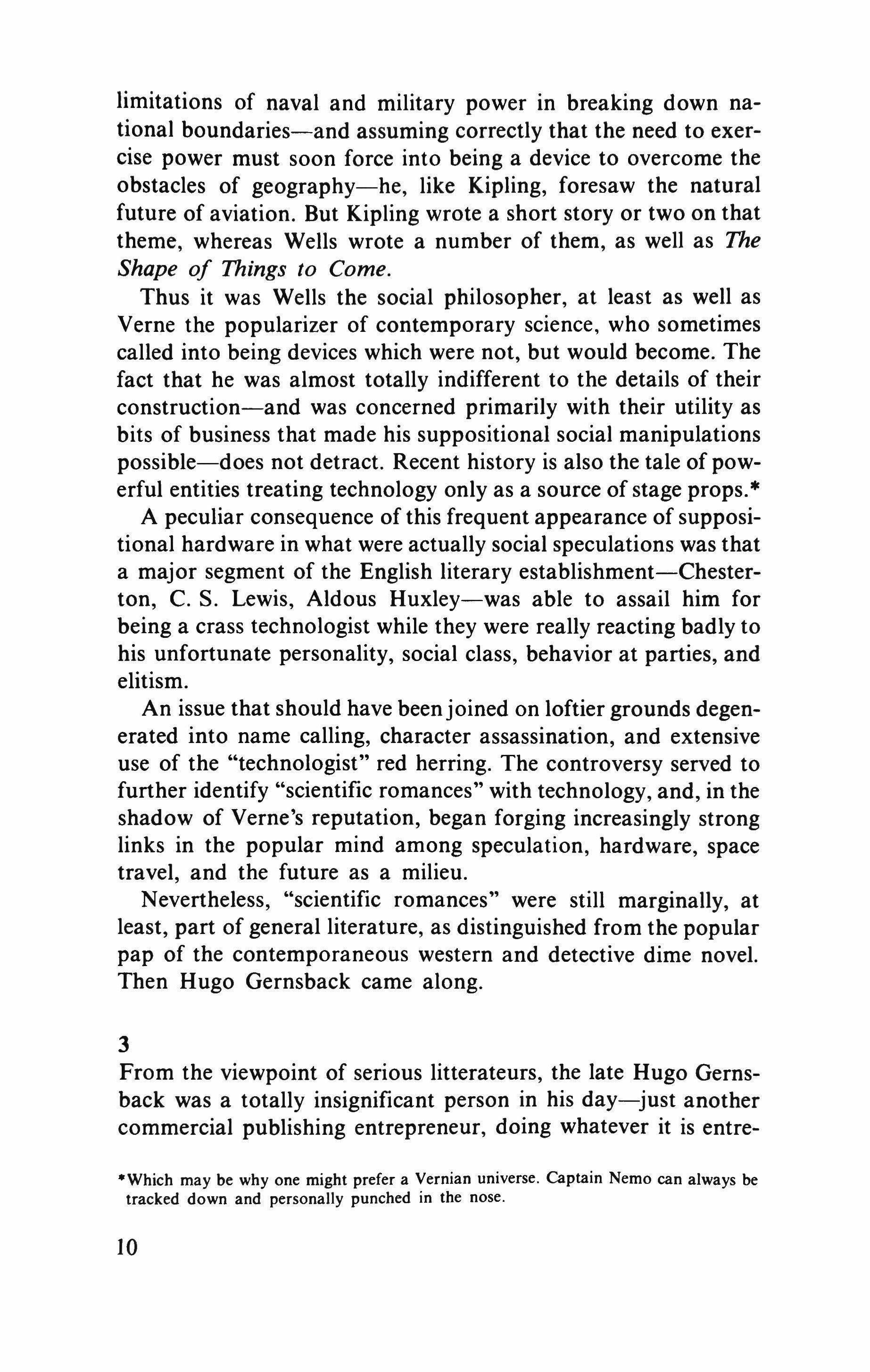
limitations of naval and military power in breaking down national boundaries-and assuming correctly that the need to exercise power must soon force into being a device to overcome the obstacles of geography-he, like Kipling, foresaw the natural future of aviation. But Kipling wrote a short story or two on that theme, whereas Wells wrote a number of them, as well as The Shape of Things to Come.
Thus it was Wells the social philosopher, at least as well as Verne the popularizer of contemporary science, who sometimes called into being devices which were not, but would become. The fact that he was almost totally indifferent to the details of their construction-and was concerned primarily with their utility as bits of business that made his suppositional social manipulations possible-does not detract. Recent history is also the tale of powerful entities treating technology only as a source of stage props. *
A peculiar consequence of this frequent appearance of suppositional hardware in what were actually social speculations was that a major segment of the English literary establishment-Chesterton, C. S. Lewis, Aldous Huxley-was able to assail him for being a crass technologist while they were really reacting badly to his unfortunate personality, social class, behavior at parties, and elitism.
An issue that should have beenjoined on loftier grounds degenerated into name calling, character assassination, and extensive use of the "technologist" red herring. The controversy served to further identify "scientific romances" with technology, and, in the shadow of Verne's reputation, began forging increasingly strong links in the popular mind among speculation, hardware, space travel, and the future as a milieu.
Nevertheless, "scientific romances" were still marginally, at least, part of general literature, as distinguished from the popular pap of the contemporaneous western and detective dime novel. Then Hugo Gernsback came along.
3
From the viewpoint of serious litterateurs, the late Hugo Gernsback was a totally insignificant person in his day-just another commercial publishing entrepreneur, doing whatever it is entre-
·Which may be why one might prefer a Vernian universe. Captain Nemo can always be tracked down and personally punched in the nose. to
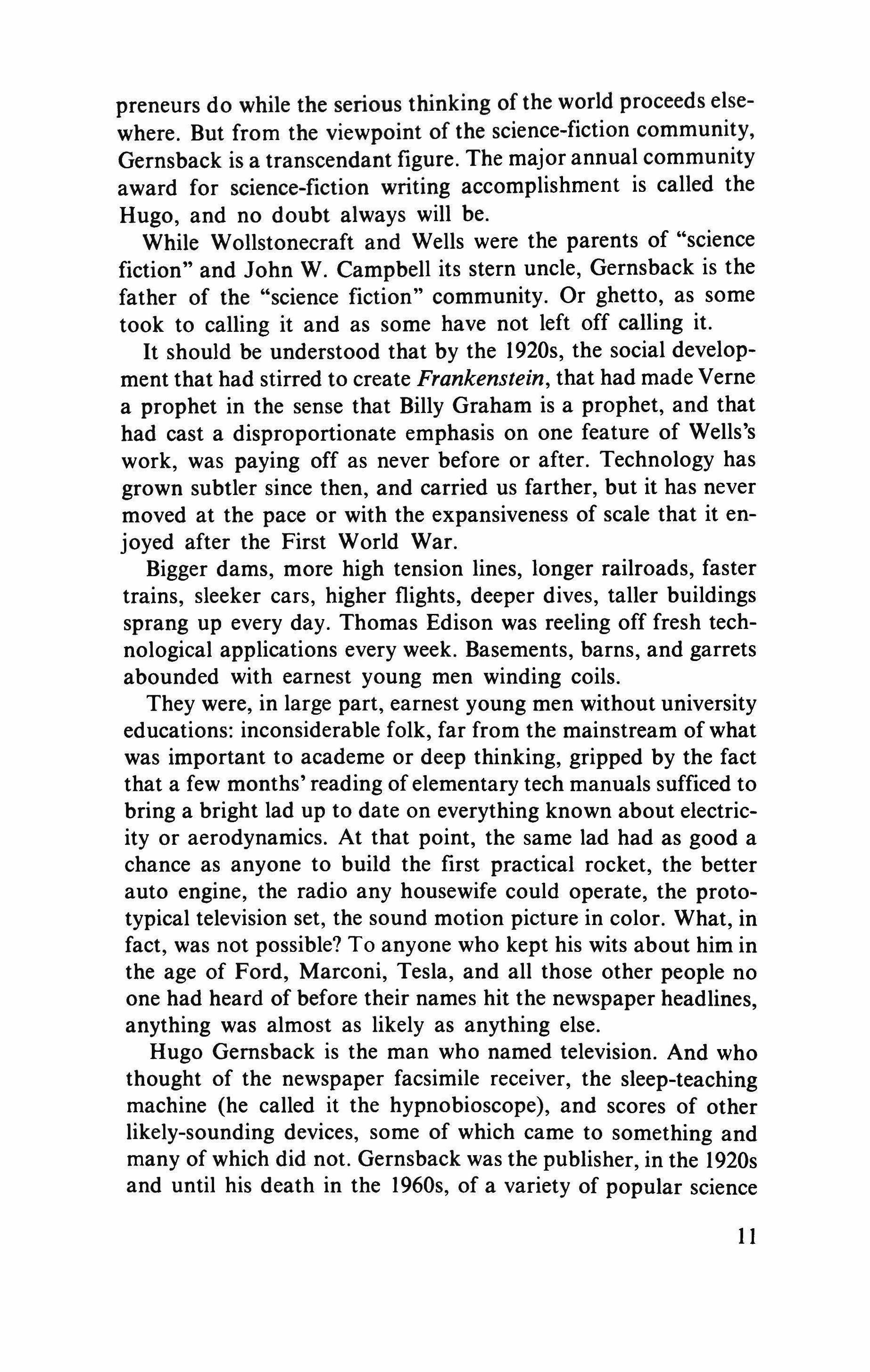
preneurs do while the serious thinking of the world proceeds elsewhere. But from the viewpoint of the science-fiction community, Gernsback is a transcendant figure. The major annual community award for science-fiction writing accomplishment is called the Hugo, and no doubt always will be.
While Wollstonecraft and Wells were the parents of "science fiction" and John W. Campbell its stern uncle, Gernsback is the father of the "science fiction" community. Or ghetto, as some took to calling it and as some have not left off calling it.
It should be understood that by the 1920s, the social development that had stirred to create Frankenstein, that had made Verne a prophet in the sense that Billy Graham is a prophet, and that had cast a disproportionate emphasis on one feature of Wells's work, was paying off as never before or after. Technology has grown subtler since then, and carried us farther, but it has never moved at the pace or with the expansiveness of scale that it enjoyed after the First World War.
Bigger dams, more high tension lines, longer railroads, faster trains, sleeker cars, higher flights, deeper dives, taller buildings sprang up every day. Thomas Edison was reeling off fresh technological applications every week. Basements, barns, and garrets abounded with earnest young men winding coils.
They were, in large part, earnest young men without university educations: inconsiderable folk, far from the mainstream of what was important to academe or deep thinking, gripped by the fact that a few months' reading of elementary tech manuals sufficed to bring a bright lad up to date on everything known about electricity or aerodynamics. At that point, the same lad had as good a chance as anyone to build the first practical rocket, the better auto engine, the radio any housewife could operate, the prototypical television set, the sound motion picture in color. What, in fact, was not possible? To anyone who kept his wits about him in the age of Ford, Marconi, Tesla, and all those other people no one had heard of before their names hit the newspaper headlines, anything was almost as likely as anything else.
Hugo Gernsback is the man who named television. And who thought of the newspaper facsimile receiver, the sleep-teaching machine (he called it the hypnobioscope), and scores of other likely-sounding devices, some of which came to something and many of which did not. Gernsback was the publisher, in the 1920s and until his death in the 1960s, of a variety of popular science

magazines, all essentially named either Sexology or The Electrical Experimenter.
An immigrant Luxemburger, Gernsback was a man who thought coil-winding was science. There is some possibility that, having learned English as an adult, he literally never understood the exact verbal distinction between technology and science. Part of what we have inherited may be a language difficulty. Certainly, like many other intelligent, multilingual persons, he used English in a cavalier but highly creative way, being not only a tireless neologist but an inveterate punster. It seems reasonable to suppose that a certain failure to grasp exactitudes of denotation would be the inverse result.
So it's quite possible that this at least partially explains why the fiction of technology is today called what it is, although there are steps between Gernsback and Robert A. Heinlein. It's even more certain that the same sort of thing was operating when the first magazine to put technology fiction on the pulp newsstands as a homogeneous category was named.
Publishing his magazines for the coil-winders of America, Gernsback hit upon a device that was still being used recently by Popular Mechanics magazine with its Gus Wilson's Model Garage "stories. Filling each issue with scores of articles such as how to build your own television signal decoder from three sheets of plywood and an electric fan motor;" editors tended to want to break up the pacing just a bit. Gernsback may have been the first to publish little inserted "fictions" that, still centered on the technology at hand, featured transient tech japes, or made a hero of a young lad whose quick thinking with spare wires and batteries created a device that solved some serious oncoming problem.
Fueled by his idiosyncratic sense of humor, his vast tech optimism, and his (probably accurate) high estimate of the range of his mind, Gernsback wrote almost all of these himself; their tone derives from his 1911 novel, Ralph 124C41+ (one to foresee for one, plus). Ralph, a scientist of the ultratechnological future, had a series of naive adventures whose essential purpose was to furnish the reader with a travelogue through the marvels of the coming age.
These were in a sense rather modest marvels based only, and strictly, on something that could clearly be seen coming if the .It could be done: pre-iconoscope TV used a motor-rotated "scanning disc."
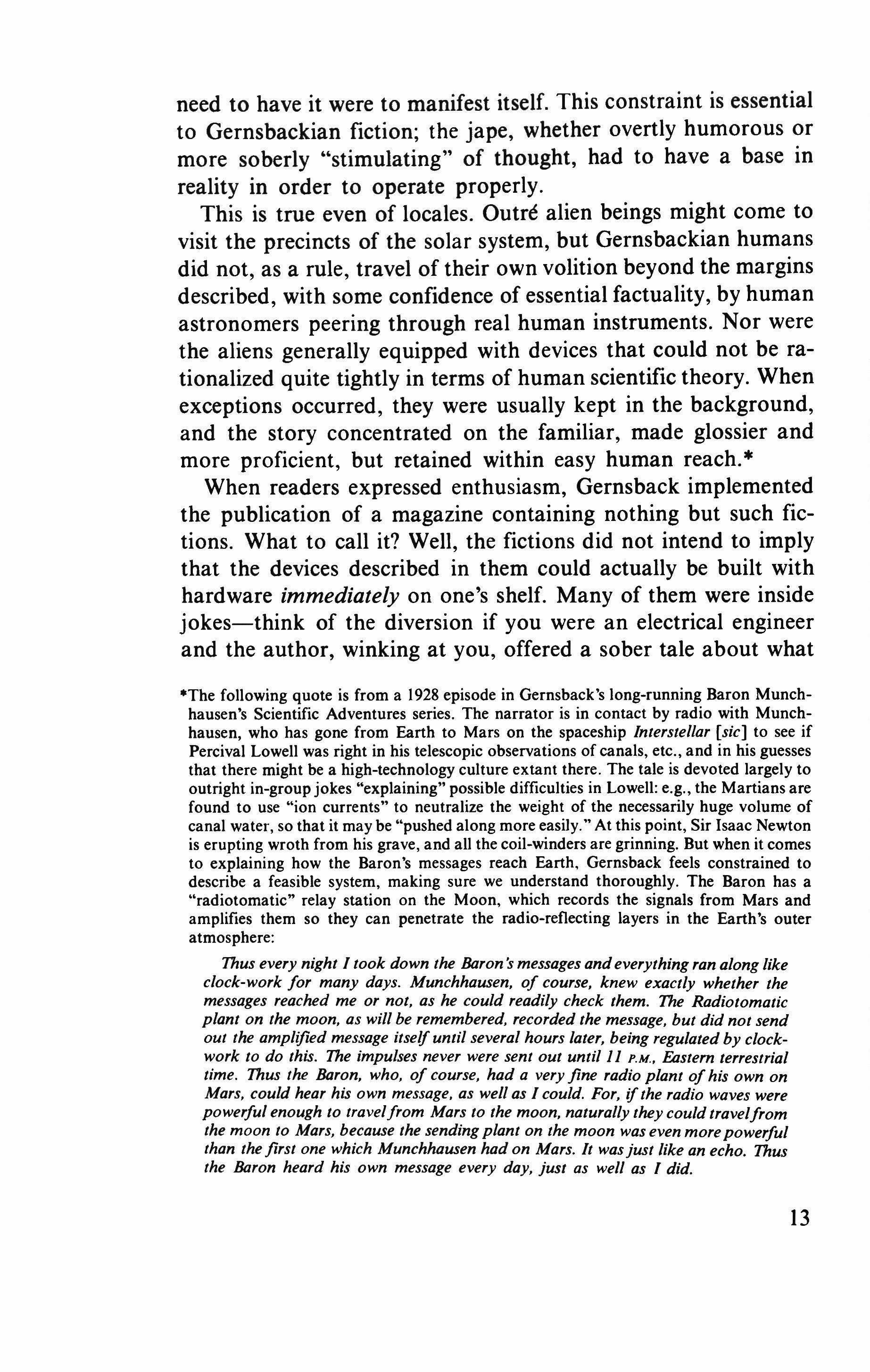
need to have it were to manifest itself. This constraint is essential to Gernsbackian fiction; the jape, whether overtly humorous or more soberly "stimulating" of thought, had to have a base in reality in order to operate properly.
This is true even of locales. Outre alien beings might come to visit the precincts of the solar system, but Gernsbackian humans did not, as a rule, travel of their own volition beyond the margins described, with some confidence of essential factuality, by human astronomers peering through real human instruments. Nor were the aliens generally equipped with devices that could not be rationalized quite tightly in terms of human scientific theory. When exceptions occurred, they were usually kept in the background, and the story concentrated on the familiar, made glossier and more proficient, but retained within easy human reach. *
When readers expressed enthusiasm, Gernsback implemented the publication of a magazine containing nothing but such fictions. What to call it? Well, the fictions did not intend to imply that the devices described in them could actually be built with hardware immediately on one's shelf. Many of them were inside jokes-think of the diversion if you were an electrical engineer and the author, winking at you, offered a sober tale about what
*The following quote is from a 1928 episode in Gernsback's long-running Baron Munchhausen's Scientific Adventures series. The narrator is in contact by radio with Munchhausen, who has gone from Earth to Mars on the spaceship Interstellar [sic] to see if Percival Lowell was right in his telescopic observations of canals, etc., and in his guesses that there might be a high-technology culture extant there. The tale is devoted largely to outright in-groupjokes "explaining" possible difficulties in Lowell: e.g., the Martians are found to use "ion currents" to neutralize the weight of the necessarily huge volume of canal water, so that it may be "pushed along more easily." At this point, Sir Isaac Newton is erupting wroth from his grave, and all the coil-winders are grinning. But when it comes to explaining how the Baron's messages reach Earth, Gernsback feels constrained to describe a feasible system, making sure we understand thoroughly. The Baron has a "radiotomatic" relay station on the Moon, which records the signals from Mars and amplifies them so they can penetrate the radio-reflecting layers in the Earth's outer atmosphere:
Thus every night I took down the Baron s messages andeverything ran along like clock-work for many days. Munchhausen, of course, knew exactly whether the messages reached me or not, as he could readily check them. The Radiotomatic plant on the moon, as will be remembered, recorded the message, but did not send out the amplified message itself until several hours later, being regulated by clockwork to do this. The impulses never were sent out until II P.M., Eastern terrestrial time. Thus the Baron, who, of course, had a very fine radio plant of his own on Mars, could hear his own message, as well as I could. For, if the radio waves were powerful enough to travelfrom Mars to the moon, naturally they could travelfrom the moon to Mars, because the sendingplant on the moon was even more powerful than the first one which Munchhausen had on Mars. It wasjust like an echo. Thus the Baron heard his own message every day, just as well as I did.
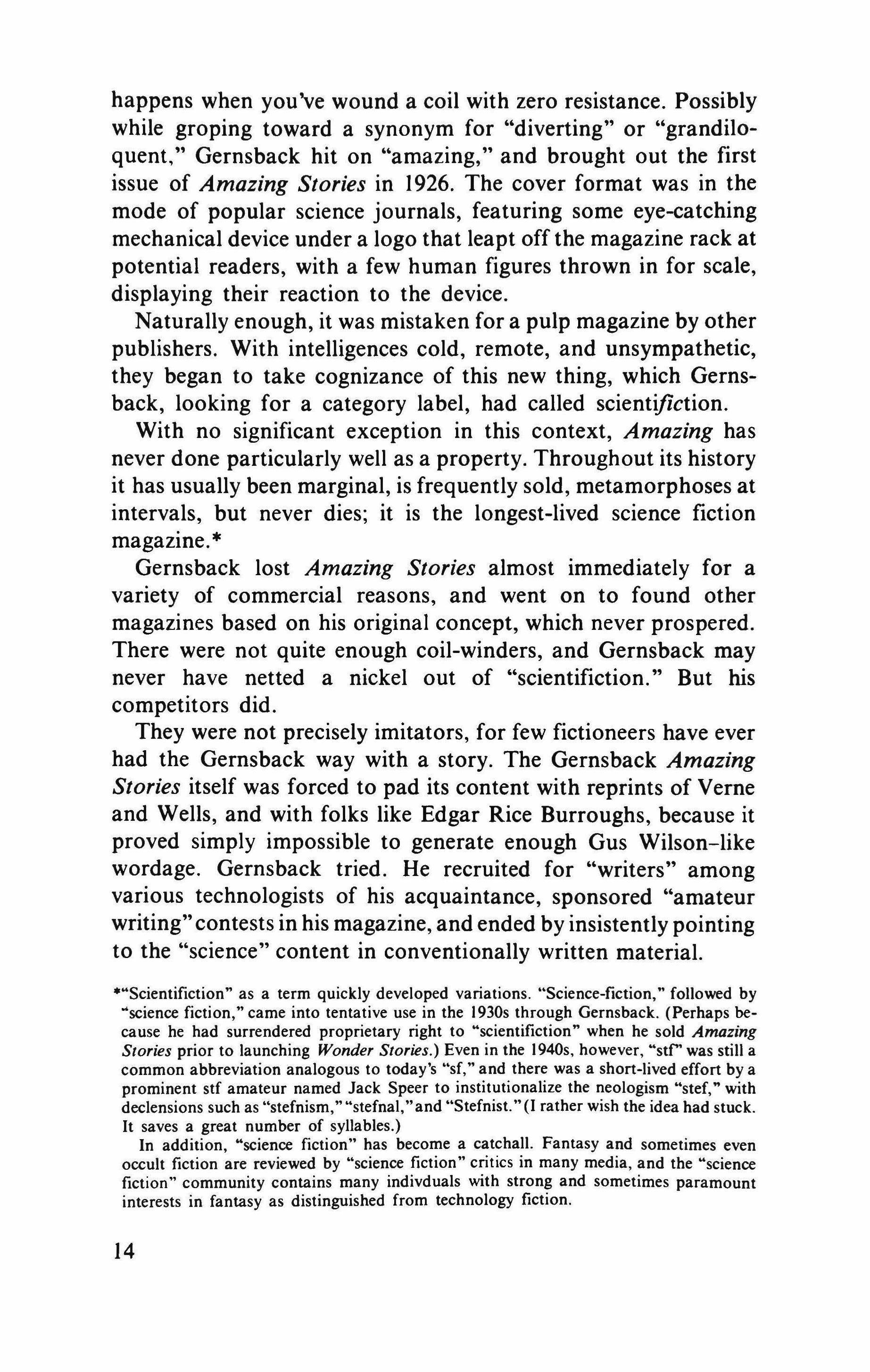
happens when you've wound a coil with zero resistance. Possibly while groping toward a synonym for "diverting" or "grandiloquent," Gernsback hit on "amazing," and brought out the first issue of Amazing Stories in 1926. The cover format was in the mode of popular science journals, featuring some eye-catching mechanical device under a logo that leapt off the magazine rack at potential readers, with a few human figures thrown in for scale, displaying their reaction to the device.
Naturally enough, it was mistaken for a pulp magazine by other publishers. With intelligences cold, remote, and unsympathetic, they began to take cognizance of this new thing, which Gernsback, looking for a category label, had called scientifiction.
With no significant exception in this context, Amazing has never done particularly well as a property. Throughout its history it has usually been marginal, is frequently sold, metamorphoses at intervals, but never dies; it is the longest-lived science fiction magazine. *
Gernsback lost Amazing Stories almost immediately for a variety of commercial reasons, and went on to found other magazines based on his original concept, which never prospered. There were not quite enough coil-winders, and Gernsback may never have netted a nickel out of "scientifiction." But his competitors did.
They were not precisely imitators, for few fictioneers have ever had the Gernsback way with a story. The Gernsback Amazing Stories itself was forced to pad its content with reprints of Verne and Wells, and with folks like Edgar Rice Burroughs, because it proved simply impossible to generate enough Gus Wilson-like wordage. Gernsback tried. He recruited for "writers" among various technologists of his acquaintance, sponsored "amateur writing" contests in his magazine, and ended byinsistently pointing to the "science" content in conventionally written material.
·"Scientifiction" as a term quickly developed variations. "Science-fiction," followed by "science fiction," came into tentative use in the 1930s through Gernsback. (Perhaps because he had surrendered proprietary right to "scientifiction" when he sold Amazing Stories prior to launching Wonder Stories.) Even in the 194Os, however, "stf" was still a common abbreviation analogous to today's "sf," and there was a short-lived effort by a prominent stf amateur named Jack Speer to institutionalize the neologism "stef," with declensions such as "stefnism," "stefnal,"and "Stefnist." (I rather wish the idea had stuck. It saves a great number of syllables.)
In addition, "science fiction" has become a catchall. Fantasy and sometimes even occult fiction are reviewed by "science fiction" critics in many media, and the "science fiction" community contains many indivduals with strong and sometimes paramount interests in fantasy as distinguished from technology fiction.
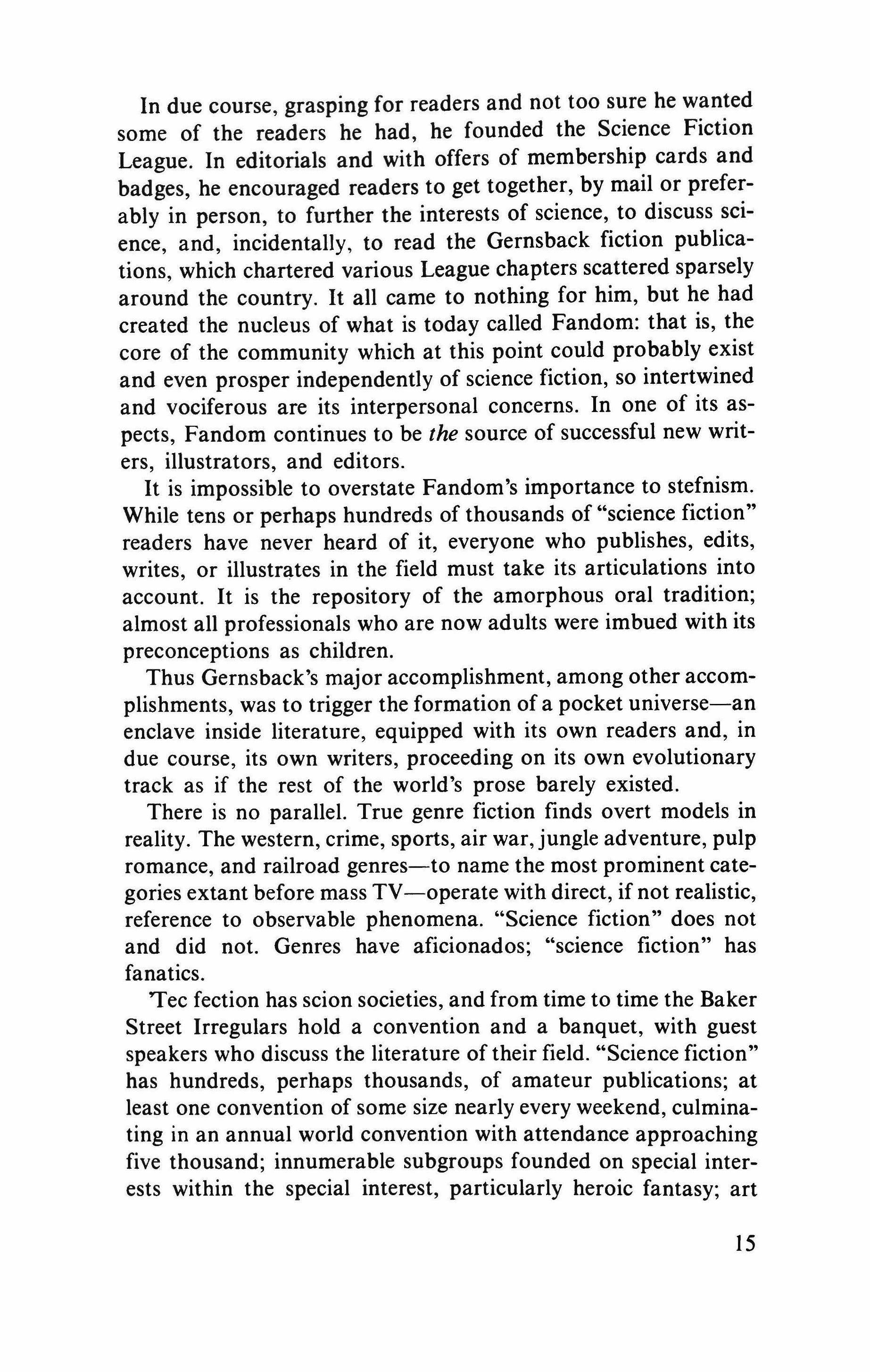
In due course, grasping for readers and not too sure he wanted some of the readers he had, he founded the Science Fiction League. In editorials and with offers of membership cards and badges, he encouraged readers to get together, by mail or preferably in person, to further the interests of science, to discuss science, and, incidentally, to read the Gernsback fiction publications, which chartered various League chapters scattered sparsely around the country. It all came to nothing for him, but he had created the nucleus of what is today called Fandom: that is, the core of the community which at this point could probably exist and even prosper independently of science fiction, so intertwined and vociferous are its interpersonal concerns. In one of its aspects, Fandom continues to be the source of successful new writers, illustrators, and editors.
It is impossible to overstate Fandom's importance to stefnism. While tens or perhaps hundreds of thousands of "science fiction" readers have never heard of it, everyone who publishes, edits, writes, or illustrates in the field must take its articulations into account. It is the repository of the amorphous oral tradition; almost all professionals who are now adults were imbued with its preconceptions as children.
Thus Gernsback's major accomplishment, among other accomplishments, was to trigger the formation of a pocket universe-an enclave inside literature, equipped with its own readers and, in due course, its own writers, proceeding on its own evolutionary track as if the rest of the world's prose barely existed.
There is no parallel. True genre fiction finds overt models in reality. The western, crime, sports, air war, jungle adventure, pulp romance, and railroad genres-to name the most prominent categories extant before mass TV-operate with direct, if not realistic, reference to observable phenomena. "Science fiction" does not and did not. Genres have aficionados; "science fiction" has fanatics.
'Tec fection has scion societies, and from time to time the Baker Street Irregulars hold a convention and a banquet, with guest speakers who discuss the literature oftheir field. "Science fiction" has hundreds, perhaps thousands, of amateur publications; at least one convention of some size nearly every weekend, culminating in an annual world convention with attendance approaching five thousand; innumerable subgroups founded on special interests within the special interest, particularly heroic fantasy; art
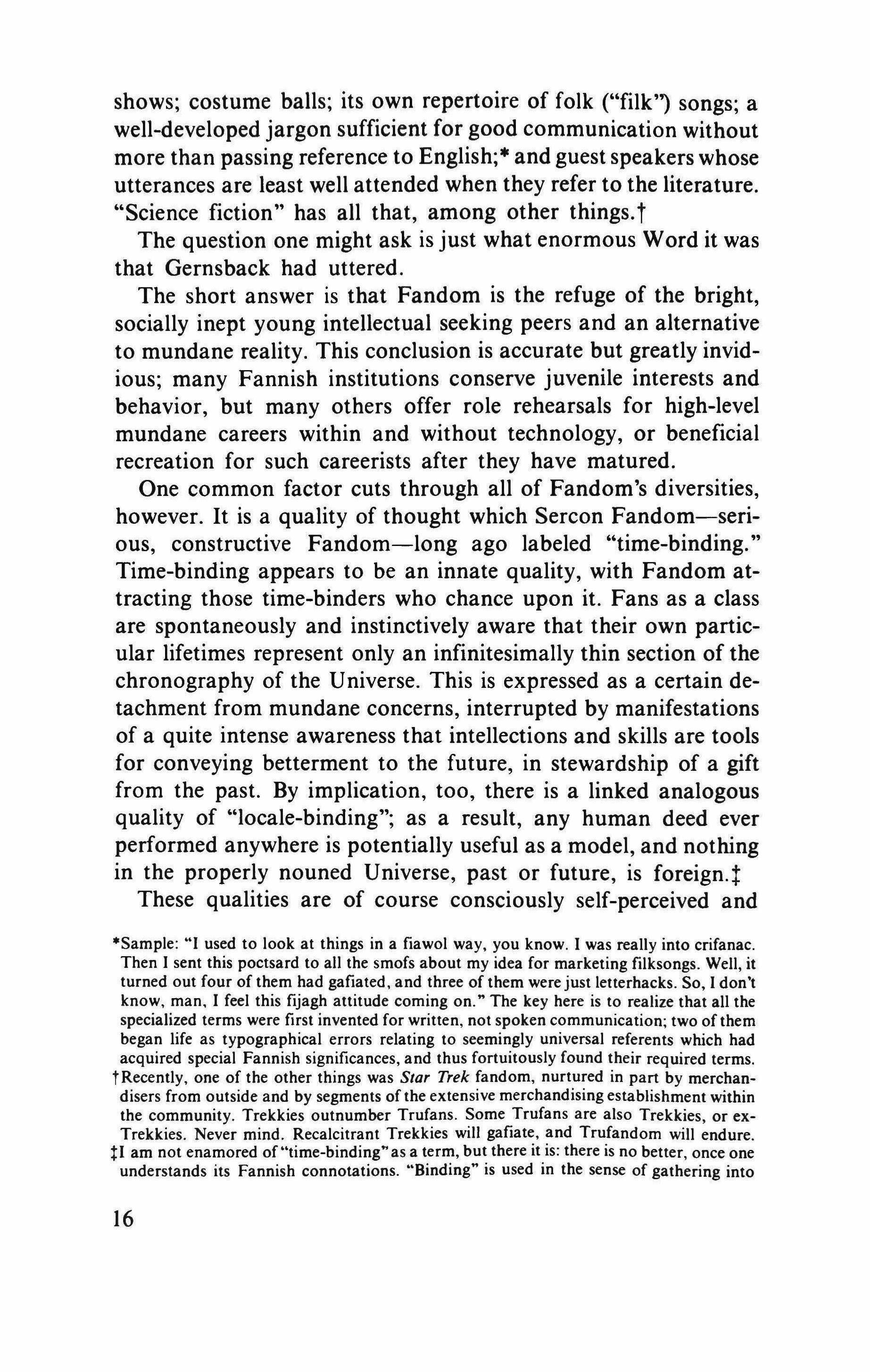
shows; costume balls; its own repertoire of folk ("filk'') songs; a well-developed jargon sufficient for good communication without more than passing reference to English;" and guest speakers whose utterances are least well attended when they refer to the literature. "Science fiction" has all that, among other things.t
The question one might ask is just what enormous Word it was that Gernsback had uttered.
The short answer is that Fandom is the refuge of the bright, socially inept young intellectual seeking peers and an alternative to mundane reality. This conclusion is accurate but greatly invidious; many Fannish institutions conserve juvenile interests and behavior, but many others offer role rehearsals for high-level mundane careers within and without technology, or beneficial recreation for such careerists after they have matured.
One common factor cuts through all of Fandom's diversities, however. It is a quality of thought which Sercon Fandom-serious, constructive Fandom-long ago labeled "time-binding." Time-binding appears to be an innate quality, with Fandom attracting those time-binders who chance upon it. Fans as a class are spontaneously and instinctively aware that their own particular lifetimes represent only an infinitesimally thin section of the chronography of the Universe. This is expressed as a certain detachment from mundane concerns, interrupted by manifestations of a quite intense awareness that intellections and skills are tools for conveying betterment to the future, in stewardship of a gift from the past. By implication, too, there is a linked analogous quality of "locale-binding"; as a result, any human deed ever performed anywhere is potentially useful as a model, and nothing in the properly nouned Universe, past or future, is foreign.]
These qualities are of course consciously self-perceived and
*Sample: "I used to look at things in a fiawol way, you know. I was really into crifanac. Then I sent this poctsard to all the smofs about my idea for marketing filksongs. Well, it turned out four of them had gafiated, and three of them were just letterhacks. So, I don't know, man, I feel this fijagh attitude coming on." The key here is to realize that all the specialized terms were first invented for written, not spoken communication; two of them began life as typographical errors relating to seemingly universal referents which had acquired special Fannish significances, and thus fortuitously found their required terms. tRecently, one of the other things was Star Trek fandom, nurtured in part by merchandisers from outside and by segments of the extensive merchandising establishment within the community. Trekkies outnumber Trufans. Some Trufans are also Trekkies, or exTrekkies, Never mind. Recalcitrant Trekkies will gafiate, and Trufandom will endure. tl am not enamored of "time-binding" as a term, but there it is: there is no better, once one understands its Fannish connotations. "Binding" is used in the sense of gathering into

expressed according to the abilities and personalities of given individuals. The depth of genuine meaning or benefit in anyone instance will vary considerably from the next. In a population which is otherwise quite heterogeneous, most sercon Fannish expressions cancel each other out. A movement was once initiated to declare Fandom the nucleus of a super race. ("Fans are Slans!"
The model is a superman novel, called Sian, by A. E. van Vogt.) It was laughed to death. Nevertheless, clearly the Word uttered in all its deepest meanings by Gernsback was Shelter.
Fandom is markedly conservative of its own institutions. There is no paradox in this; so are all other human groupings centered on a common quality, no matter how outlandish their expressions might seem when viewed from within any other grouping.
Having affiliated itself in its beginning with a prose form whose only expressed concern was play with technological ideas, Fandom continued to assume that this prose was nonliterary at best, or literary in a very narrow sense. Though "scientifiction" was a Mayfly, dying even at the height of its existence, that underlying assumption still persists, not sufficiently attenuated to be at all in accord with the objective nature of "science fiction" as it is now written.
This is an important aspect of the stefnal culture. Adult members of the community tend to articulate and act in ways they saw and learned as children. Because these people have an unusually limited capacity for boredom, they in fact produce constant evolutions in the form. But those evolutions almost invariably proceed from trusted bases, and are labeled with the least possible variations from the labels of childhood.
The phenomenon is not unknown outside the community. Fans
sheaves-of being able to see correspondences and congruities across very broad diversions of data. The quality is not necessarily related to I.Q. or any other measure or description of intelligence level: there are idiots savants in stef as there are in mathematics. Yet inevitably there is a sense of being special, reinforced frequently when mundane types react with wonder to what are actually very obvious and subjectively matter-of-fact analyses produced by time-binder minds. We notice, in fact, that we arouse the loudest exclamations of delight-and the least unease-when we are most like Ralph the Wonder Horse and least likely to be calling truly fundamental social precepts into question. "Mundane" is, by the way, the Fannish term for anything non-Fannish. It is used as a neutral descriptive term, and nothing scornful or derogatory is implied in the overwhelming majority of such uses. But we are aware that mundanes overhearing us will at times take umbrage, and there are such occasions in which some of us have been known not to feel particularly embarrassed. Well, the Benevolent Improved Order of Elks had a bone to pick with the Benevolent Protective Order of Elks, too.
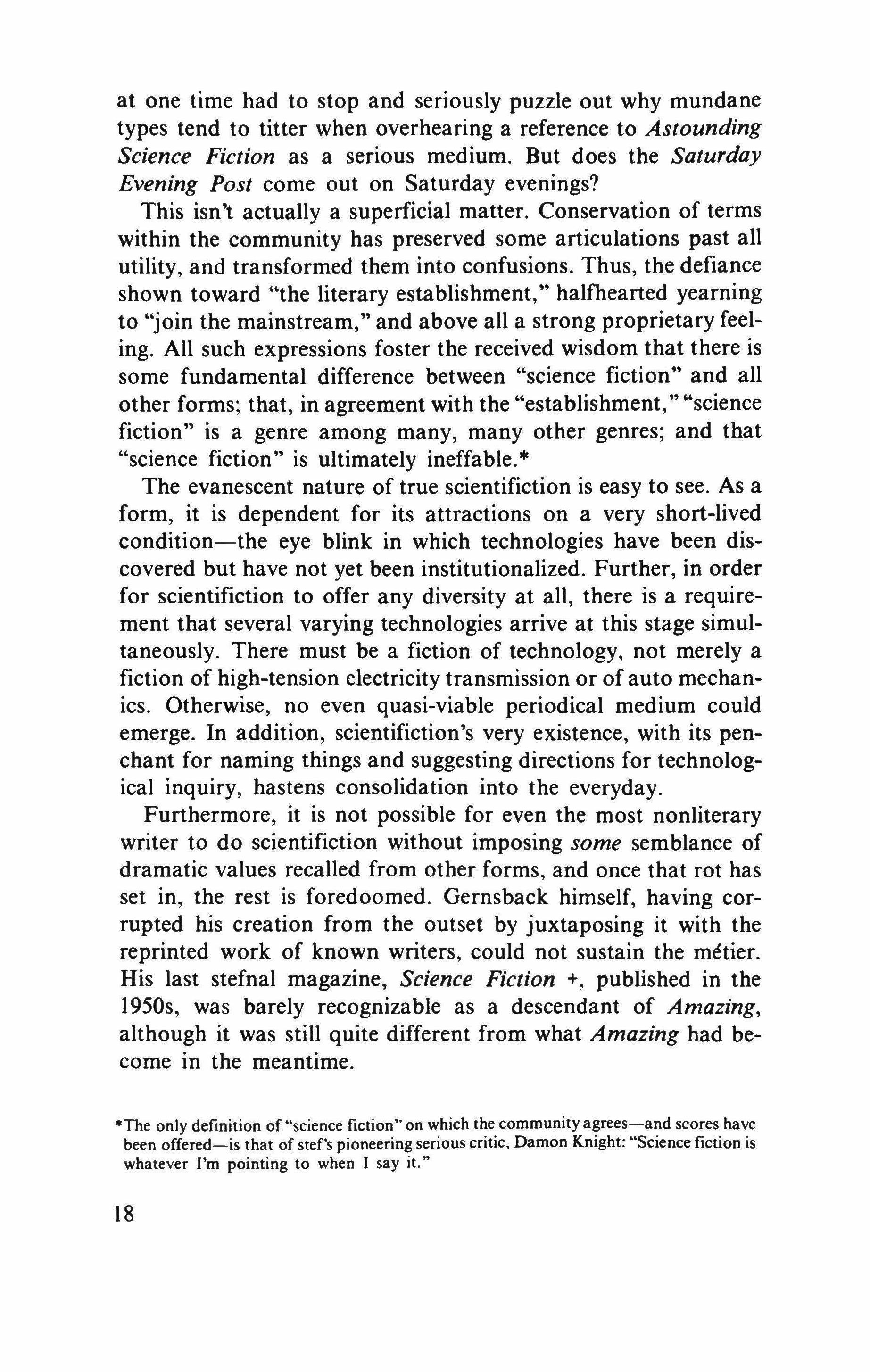
at one time had to stop and seriously puzzle out why mundane types tend to titter when overhearing a reference to Astounding Science Fiction as a serious medium. But does the Saturday Evening Post come out on Saturday evenings?
This isn't actually a superficial matter. Conservation of terms within the community has preserved some articulations past all utility, and transformed them into confusions. Thus, the defiance shown toward "the literary establishment," halfhearted yearning to "join the mainstream," and above all a strong proprietary feeling. All such expressions foster the received wisdom that there is some fundamental difference between "science fiction" and all other forms; that, in agreement with the "establishment," "science fiction" is a genre among many, many other genres; and that "science fiction" is ultimately ineffable. *
The evanescent nature of true scientifiction is easy to see. As a form, it is dependent for its attractions on a very short-lived condition-the eye blink in which technologies have been discovered but have not yet been institutionalized. Further, in order for scientifiction to offer any diversity at all, there is a requirement that several varying technologies arrive at this stage simultaneously. There must be a fiction of technology, not merely a fiction of high-tension electricity transmission or of auto mechanics. Otherwise, no even quasi-viable periodical medium could emerge. In addition, scientifiction's very existence, with its penchant for naming things and suggesting directions for technological inquiry, hastens consolidation into the everyday.
Furthermore, it is not possible for even the most nonliterary writer to do scientifiction without imposing some semblance of dramatic values recalled from other forms, and once that rot has set in, the rest is foredoomed. Gernsback himself, having corrupted his creation from the outset by juxtaposing it with the reprinted work of known writers, could not sustain the metier. His last stefnal magazine, Science Fiction +, published in the 1950s, was barely recognizable as a descendant of Amazing, although it was still quite different from what Amazing had become in the meantime.
-The only definition of "science fiction" on which the communityagrees-and scores have been offered-is that of stef's pioneering serious critic, Damon Knight: "Science fiction is whatever I'm pointing to when I say it."
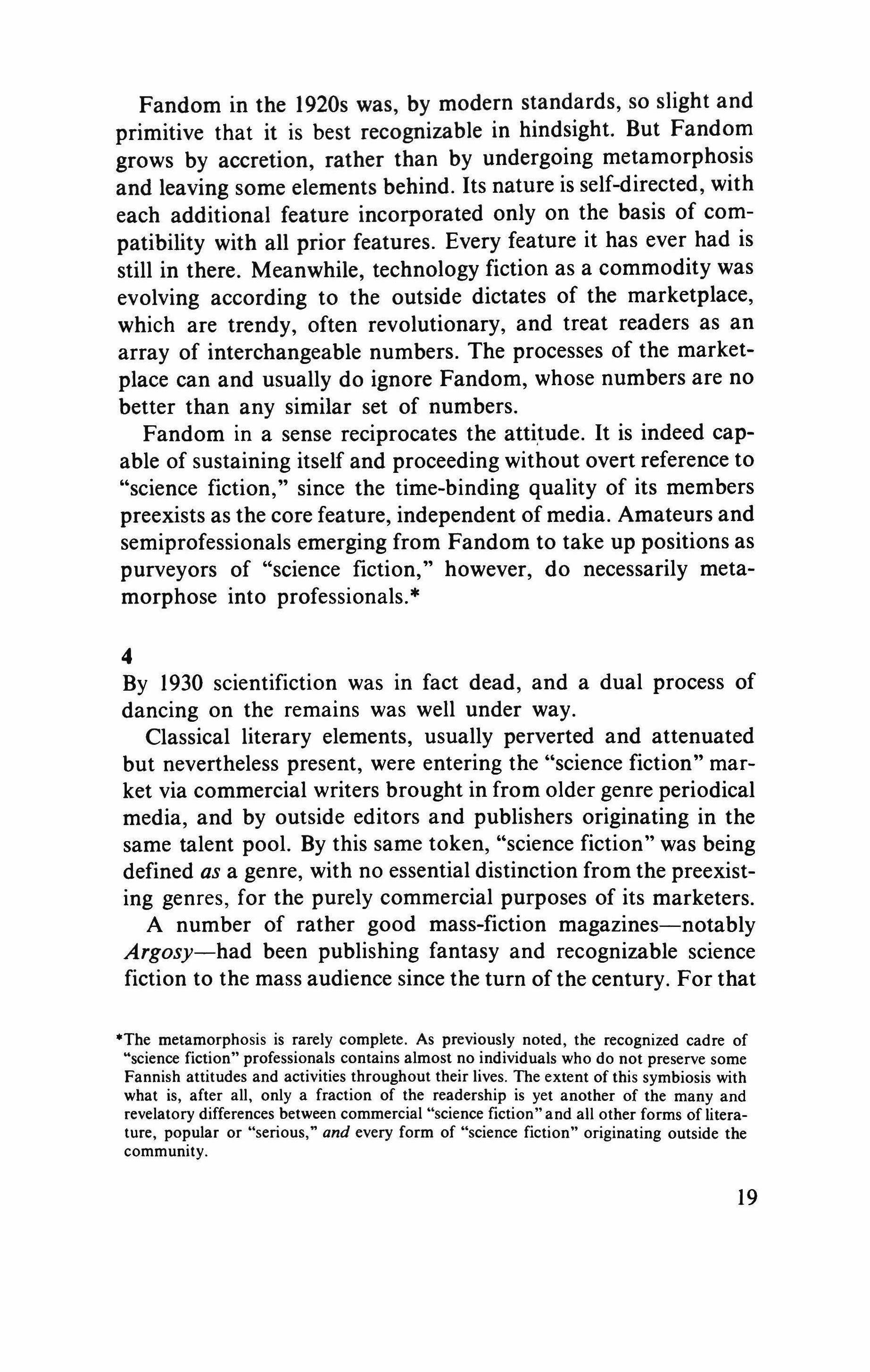
Fandom in the 1920s was, by modern standards, so slight and primitive that it is best recognizable in hindsight. But Fandom grows by accretion, rather than by undergoing metamorphosis and leaving some elements behind. Its nature is self-directed, with each additional feature incorporated only on the basis of compatibility with all prior features. Every feature it has ever had is still in there. Meanwhile, technology fiction as a commodity was evolving according to the outside dictates of the marketplace, which are trendy, often revolutionary, and treat readers as an array of interchangeable numbers. The processes of the marketplace can and usually do ignore Fandom, whose numbers are no better than any similar set of numbers.
Fandom in a sense reciprocates the attitude, It is indeed capable of sustaining itself and proceeding without overt reference to "science fiction," since the time-binding quality of its members preexists as the core feature, independent of media. Amateurs and semiprofessionals emerging from Fandom to take up positions as purveyors of "science fiction," however, do necessarily metamorphose into professionals. *
4
By 1930 scientifiction was in fact dead, and a dual process of dancing on the remains was well under way.
Classical literary elements, usually perverted and attenuated but nevertheless present, were entering the "science fiction" market via commercial writers brought in from older genre periodical media, and by outside editors and publishers originating in the same talent pool. By this same token, "science fiction" was being defined as a genre, with no essential distinction from the preexisting genres, for the purely commercial purposes of its marketers.
A number of rather good mass-fiction magazines-notably Argosy-had been publishing fantasy and recognizable science fiction to the mass audience since the turn of the century. For that
·The metamorphosis is rarely complete. As previously noted, the recognized cadre of "science fiction" professionals contains almost no individuals who do not preserve some Fannish attitudes and activities throughout their lives. The extent of this symbiosis with what is, after all, only a fraction of the readership is yet another of the many and revelatory differences between commercial "science fiction" and all other forms of literature, popular or "serious," and every form of "science fiction" originating outside the community.
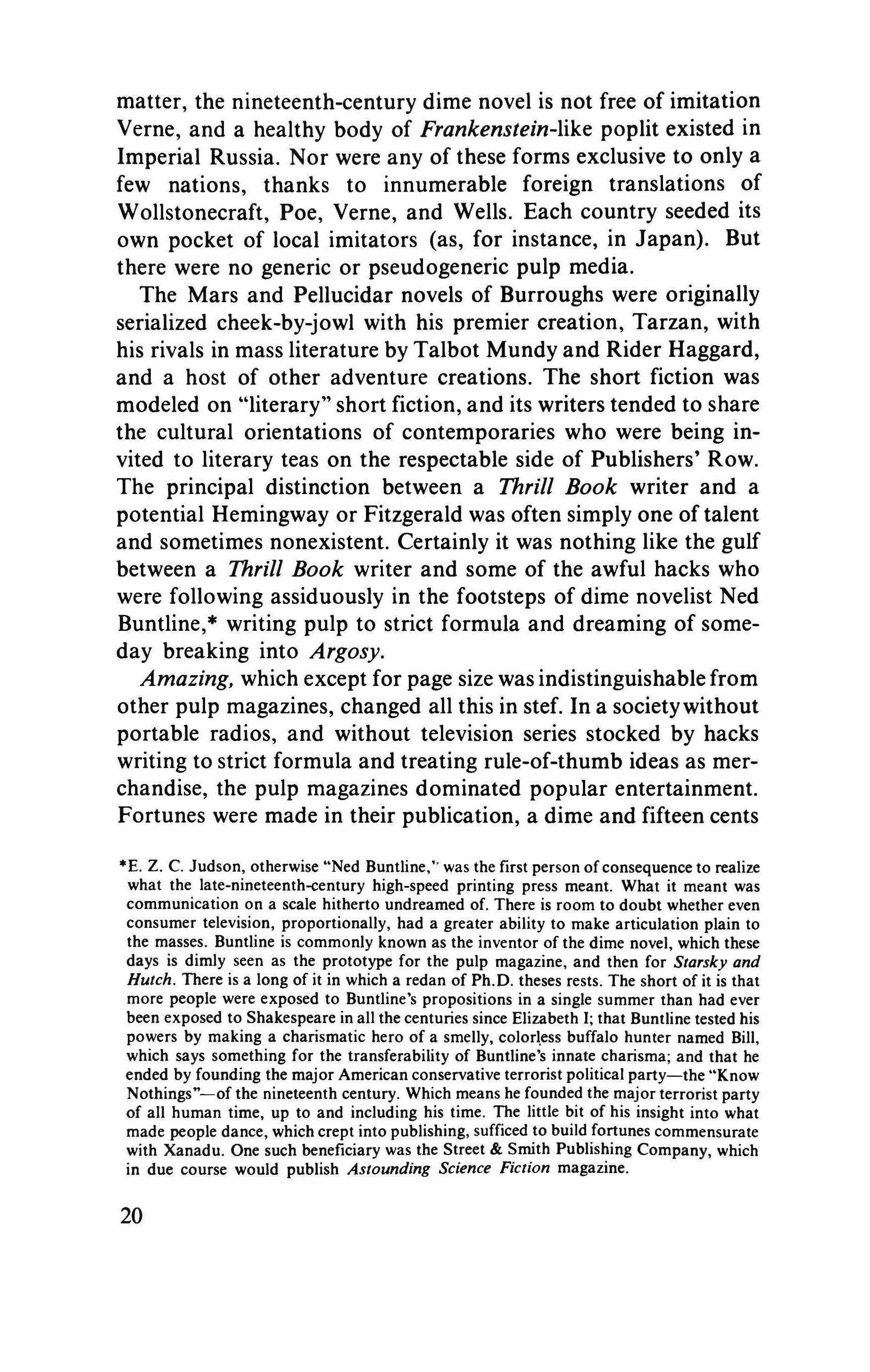
matter, the nineteenth-century dime novel is not free of imitation Verne, and a healthy body of Frankenstein-like poplit existed in Imperial Russia. Nor were any of these forms exclusive to only a few nations, thanks to innumerable foreign translations of Wollstonecraft, Poe, Verne, and Wells. Each country seeded its own pocket of local imitators (as, for instance, in Japan). But there were no generic or pseudogeneric pulp media.
The Mars and Pellucidar novels of Burroughs were originally serialized cheek-by-jowl with his premier creation, Tarzan, with his rivals in mass literature by Talbot Mundy and Rider Haggard, and a host of other adventure creations. The short fiction was modeled on "literary" short fiction, and its writers tended to share the cultural orientations of contemporaries who were being invited to literary teas on the respectable side of Publishers' Row. The principal distinction between a Thrill Book writer and a potential Hemingway or Fitzgerald was often simply one of talent and sometimes nonexistent. Certainly it was nothing like the gulf between a Thrill Book writer and some of the awful hacks who were following assiduously in the footsteps of dime novelist Ned Buntline, * writing pulp to strict formula and dreaming of someday breaking into Argosy.
Amazing, which except for page size was indistinguishable from other pulp magazines, changed all this in stef. In a societywithout portable radios, and without television series stocked by hacks writing to strict formula and treating rule-of-thumb ideas as merchandise, the pulp magazines dominated popular entertainment. Fortunes were made in their publication, a dime and fifteen cents
*E. Z. C. Judson, otherwise "Ned Buntline, was the first person of consequence to realize what the late-nineteenth-century high-speed printing press meant. What it meant was communication on a scale hitherto undreamed of. There is room to doubt whether even consumer television, proportionally, had a greater ability to make articulation plain to the masses. Buntiine is commonly known as the inventor of the dime novel, which these days is dimly seen as the prototype for the pulp magazine, and then for Starsky and Hutch. There is a long of it in which a redan of Ph.D. theses rests. The short of it is that more people were exposed to Buntline's propositions in a single summer than had ever been exposed to Shakespeare in all the centuries since Elizabeth I; that Buntline tested his powers by making a charismatic hero of a smelly, colorless buffalo hunter named Bill, which says something for the transferability of Buntline's innate charisma; and that he ended by founding the major American conservative terrorist political party-the "Know Nothings"-of the nineteenth century. Which means he founded the major terrorist party of all human time, up to and including his time. The little bit of his insight into what made people dance, which crept into publishing, sufficed to build fortunes commensurate with Xanadu. One such beneficiary was the Street & Smith Publishing Company, which in due course would publish Astounding Science Fiction magazine.

at a time each month or every two weeks, and the genius who could invent a new genre had best hold on to it tight. Gernsback failed in the latter half of that proposition, but the exploiters of his apparent idea did not.
The important thing, as the pulp impresarios understood it, was to publish something with a rocket ship or a Martian on the cover, and fill it with stories that had some kind of hardware in them. Lacking writers who could do it the way Amazing tried to do it, they simply searched their stables of house hacks for individuals who could translate westerns and jungle stories into ray-gun drama set on an imaginary planet called Venus. Edgar Rice Burroughs and his near-equivalent, Otis Adelbert Kline, had already pointed that way.
Amazing, on the other hand, had created or found a handful of writers who could do the hardware with some verisimilitude, but who couldn't plot an entertaining story very well. Cobbling issues together, groping for an audience, such publications as Astounding Stories of Super-Science and eventually such other developments as Thrilling Wonder Stories, Impossible Stories, Astonishing Stories, and Startling Stories-to say nothing of Cosmic, Dynamic, and Planet Stories, or Captain Future-established a pseudo-generic market based on the work ofborn nobodies. Some of those people could write action, some of them may have had some grasp of science or technology, and a small number ofthem combined those abilities. Few of their media did as well as the average genre magazine, but the economics of chain publishing, and a judicious leavening of illustrations featuring Martian priestesses with large breasts, kept them well enough afloat. Rates running to half a cent per word after publication also were a factor in profitability.
Yet if you scratch around among enough coil-winders, you will find some who have a perceptivity for the human condition and a way with words, and if you shuffle through enough pulp manuscripts, you will find some people who are not terminally stuporous to the impulses of art. What they need is an editor.
John W. Campbell, Jr., had found a way to help out his budget as an undergraduate at MIT and Duke University, and subsequently as an apprentice engineer without a decent job in the depths of the Depression. A hobbyist named Edward E. Smith, Ph.D., who was a chemist in sugars, had rewritten a manuscript
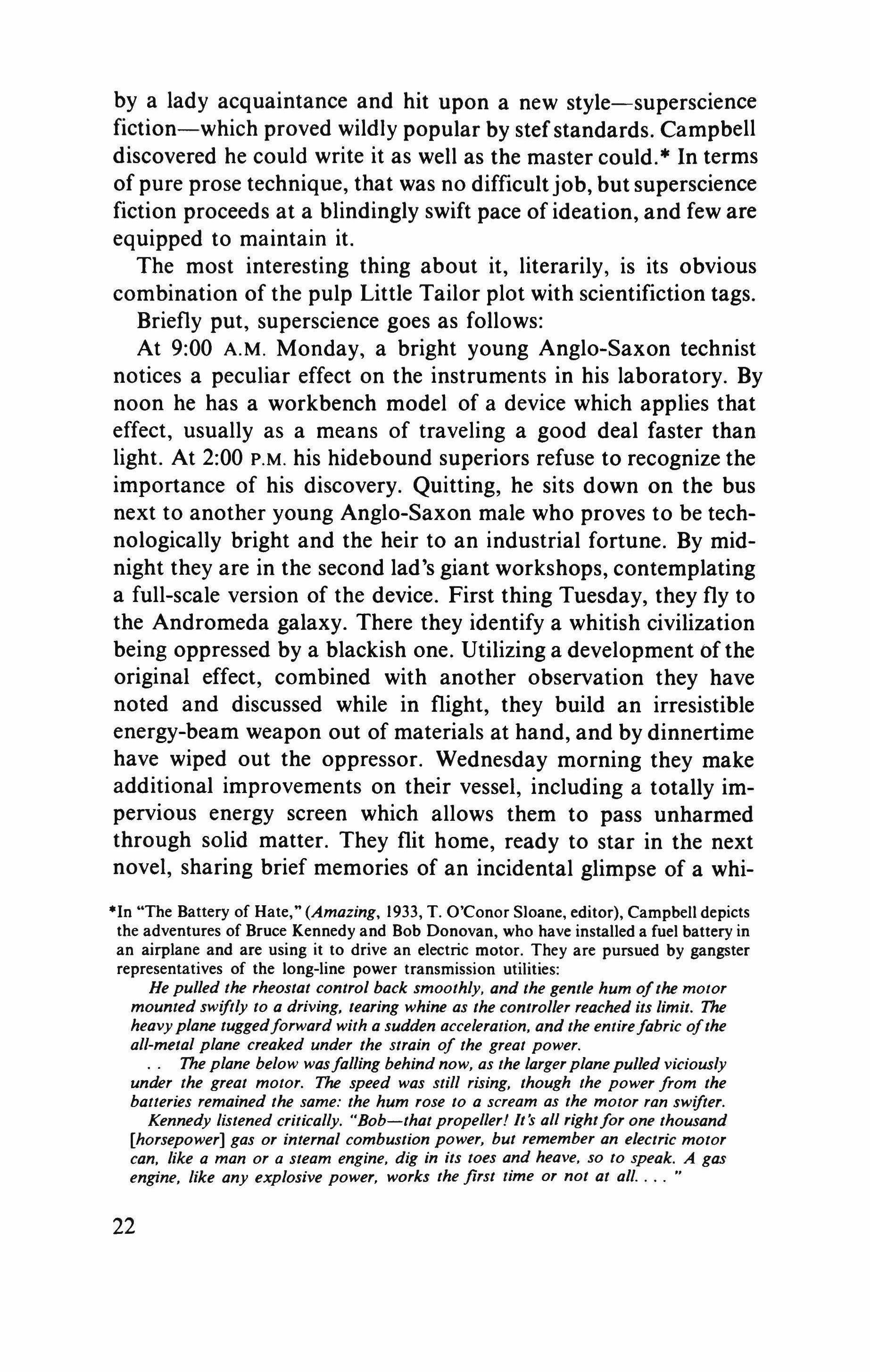
by a lady acquaintance and hit upon a new style-superscience fiction-which proved wildly popular by stefstandards. Campbell discovered he could write it as well as the master could." In terms of pure prose technique, that was no difficultjob, but superscience fiction proceeds at a blindingly swift pace of ideation, and few are equipped to maintain it.
The most interesting thing about it, literarily, is its obvious combination of the pulp Little Tailor plot with scientifiction tags.
Briefly put, superscience goes as follows:
At 9:00 A.M. Monday, a bright young Anglo-Saxon technist notices a peculiar effect on the instruments in his laboratory. By noon he has a workbench model of a device which applies that effect, usually as a means of traveling a good deal faster than light. At 2:00 P.M. his hidebound superiors refuse to recognize the importance of his discovery. Quitting, he sits down on the bus next to another young Anglo-Saxon male who proves to be technologically bright and the heir to an industrial fortune. By midnight they are in the second lad's giant workshops, contemplating a full-scale version of the device. First thing Tuesday, they fly to the Andromeda galaxy. There they identify a whitish civilization being oppressed by a blackish one. Utilizing a development of the original effect, combined with another observation they have noted and discussed while in flight, they build an irresistible energy-beam weapon out of materials at hand, and by dinnertime have wiped out the oppressor. Wednesday morning they make additional improvements on their vessel, including a totally impervious energy screen which allows them to pass unharmed through solid matter. They flit home, ready to star in the next novel, sharing brief memories of an incidental glimpse of a whi-
*In "The Battery of Hate," (Amazing, 1933, T. Q'Conor Sloane, editor), Campbell depicts the adventures of Bruce Kennedy and Bob Donovan, who have installed a fuel battery in an airplane and are using it to drive an electric motor. They are pursued by gangster representatives of the long-line power transmission utilities: He pulled the rheostat control back smoothly, and the gentle hum ofthe motor mounted swiftly to a driving. tearing whine as the controller reached its limit. The heavyplane tuggedforward with a sudden acceleration. and the entirefabric ofthe all-metal plane creaked under the strain of the great power. The plane below wasfalling behind now, as the largerplanepulled viciously under the great motor. The speed was still rising, though the power from the batteries remained the same: the hum rose to a scream as the motor ran swifter. Kennedy listened critically. "Bob-that propeller! It's all rightfor one thousand [horsepower] gas or internal combustion power, but remember an electric motor can. like a man or a steam engine. dig in its toes and heave. so to speak. A gas engine. like any explosive power, works the first time or not at all

tish maiden with the social attributes of a Swarthmore undergraduate.
The appeal of this story to unemployed technologists in the 1930s is obvious. Superscience fiction was the first version of technology fiction to make commercial sense. It was a kind of yard goods, but it isolated a viable audience out of the ruck of pulp readers, and added others.
First of all, with the strong superficial resemblance between superscience and scientifiction, the evolution in the prose carried with it a successful accretion upon Fandom, which accepted the new form readily.
It was in fact a radically new form. Scientifiction features one jape at a time; a scientifiction novel strings a series of scientifiction short-story situations together, like beads, to the number desired.* A superscience story, on the other hand, whether a novel or some shorter work, is made by pyramiding ideas.
In superscience, each notion is more exciting than the last. Whereas the milieus of scientifiction are givens-stable societies with a Chinese menu of plausible artifacts, each about as fundamental to that society as the next-the milieus of superscience are unstable and also usually forced into being, in the sense that the heroes plunge into them at distances so remote they might as well otherwise not exist, and are not directly modeled on known places.
This is a subtle distinction. To scientifiction readers, Percival Lowell had made Mars familiar-even if subsequent astronomers later exploded nearly every supposition which for a time had been gospel. But a planet in Andromeda can be anything; it is understood by the reader from the beginning that the detail of such a world must be a reflection of an auctorial fantasy, although that understanding does not necessarily occur on the conscious level.
What is more, the machines in superscience are introduced in the order Mighty, Mightier, Mightiest. And they, too, are vastly more suppositional than anything in scientifiction, if only because their scope and puissance are so far above everyday norms that it
* Ralph 124C41+ originally appeared in 1911 as twelve episodes in Gernsback's first magazine, Modem Electrics. The first nine episodes were written as isolated features; only the last three introduce any combining plot, in which Ralph, a villain, and a figure invariably described as "a lovesick Martian," vie for the hand(?) of a maiden who doubtless was just contemplating a transition from hoopskirts into bloomers, at least while watching television and plugging herself into her hypnobioscope in the privacy of her own automapartment.
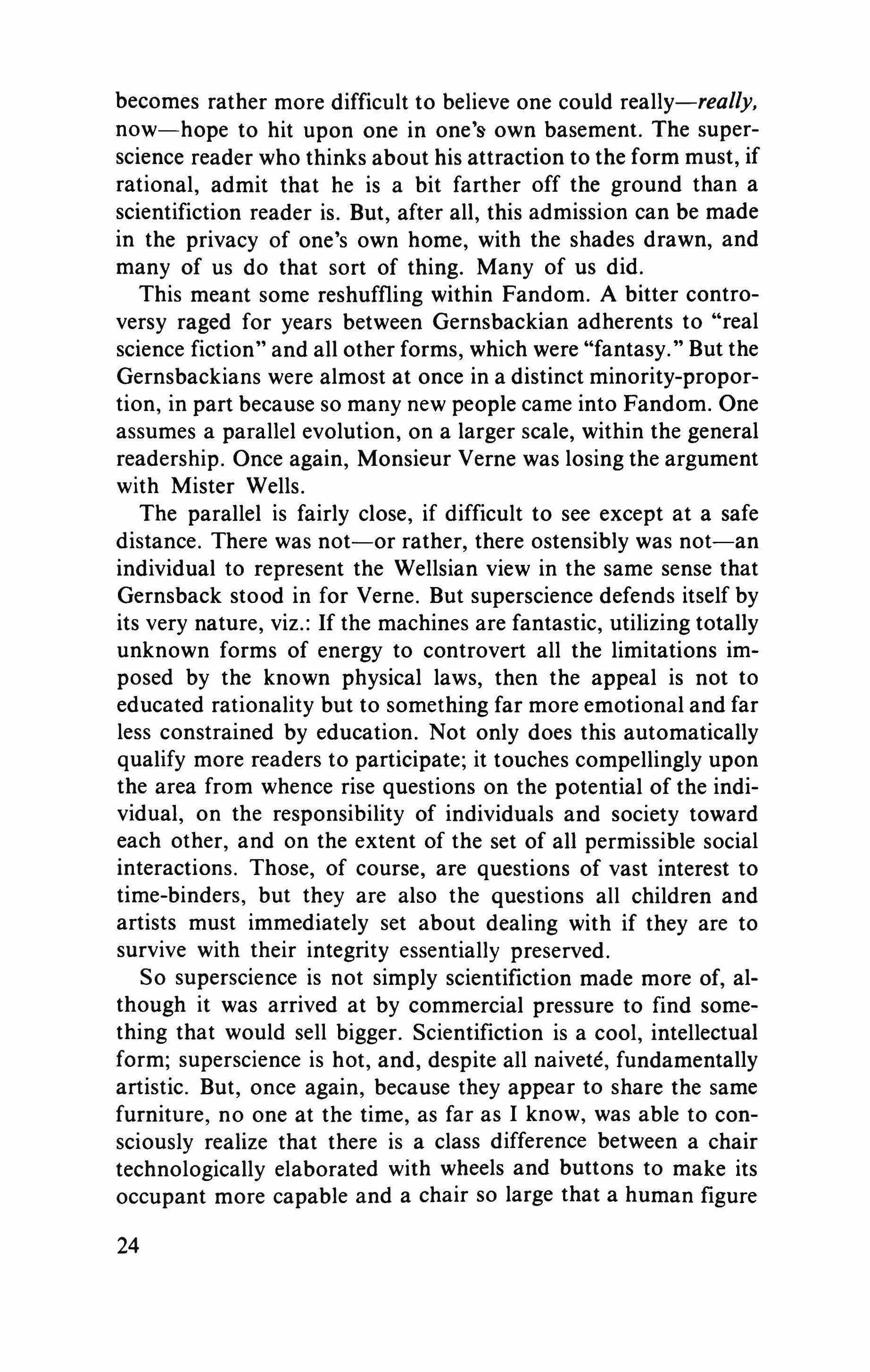
becomes rather more difficult to believe one could really-really, now-hope to hit upon one in one's own basement. The superscience reader who thinks about his attraction to the form must, if rational, admit that he is a bit farther off the ground than a scientifiction reader is. But, after all, this admission can be made in the privacy of one's own home, with the shades drawn, and many of us do that sort of thing. Many of us did.
This meant some reshuffling within Fandom. A bitter controversy raged for years between Gernsbackian adherents to "real science fiction" and all other forms, which were "fantasy." But the Gernsbackians were almost at once in a distinct minority-proportion, in part because so many new people came into Fandom. One assumes a parallel evolution, on a larger scale, within the general readership. Once again, Monsieur Verne was losing the argument with Mister Wells.
The parallel is fairly close, if difficult to see except at a safe distance. There was not-or rather, there ostensibly was not-an individual to represent the Wellsian view in the same sense that Gernsback stood in for Verne. But superscience defends itself by its very nature, viz.: If the machines are fantastic, utilizing totally unknown forms of energy to controvert all the limitations imposed by the known physical laws, then the appeal is not to educated rationality but to something far more emotional and far less constrained by education. Not only does this automatically qualify more readers to participate; it touches compellingly upon the area from whence rise questions on the potential of the individual, on the responsibility of individuals and society toward each other, and on the extent of the set of all permissible social interactions. Those, of course, are questions of vast interest to time-binders, but they are also the questions all children and artists must immediately set about dealing with if they are to survive with their integrity essentially preserved.
So superscience is not simply scientifiction made more of, although it was arrived at by commercial pressure to find something that would sell bigger. Scientifiction is a cool, intellectual form; superscience is hot, and, despite all naivete, fundamentally artistic. But, once again, because they appear to share the same furniture, no one at the time, as far as I know, was able to consciously realize that there is a class difference between a chair technologically elaborated with wheels and buttons to make its occupant more capable and a chair so large that a human figure

upon it is a figure in a landscape. Or a human also made so large as to be a landscape.
Edward E. Smith, Ph.D., to the end of his days was a superscience writer, an attractive, stand-up gent who in his elder years was still wont to turn up at conventions in his motorcycle leathers. * He became in time the object of much fond editorial attention from John W. Campbell, Jr., who attempted to get Smith to bring his approach up to date.
In the late 1930s, Campbell left E. E. Smith behind, although that was not clearly visible because Campbell left superscience behind-I think not consciously at first, and certainly not at first visibly at all.
Also by the late 1930s Gernsback had already been cut off from the main line of development, but, more important, a glance at any newsstand would prove beyond doubt that the thing he had put on the market was trash. It was displayed with trash, packaged like trash, published by trash merchandisers using trash methods, and there was absolutely no hope that any practitioner of writing for those media could possibly hope to find his work in a Carnegie library.
Anyone committing himself to work in the field had to agree, either brokenly or defiantly, that his byline was cut off from respectability, from "literature"-that is, from anything written that was openly distributed in some way other than the way the pulps were brought to their audience.
One major factor ensured that the professionals' attitude would be not only defiant, often proudly defiant, but proprietary. The survivors of the competition to sell to the media were largely people weaned on scientifiction, who felt that their innate qualities had enabled them to beat the outside professionals at their own game. In a matter of a few years, only L. Ron Hubbard, Henry Kuttner (with his multiple pseudonyms), and most especially "Murray Leinster," who was a sweet gentlemanly genius named Will F. Jenkins, carried the flag for pulp generalists; and all three of them rapidly abandoned doing much work outside the field. All the other contributors were homegrown.t
At costume balls such as the one at Seacon I (the world science-fiction convention in Seattle, 1961), I hasten to clarify. The rest of the time he favored solid brown pants, a brown-and-yellow checked sport coat, and a bow tie. But the leathers were his own and well worn-in, aviator helmet, goggles, and all.
[This continued to be true indefinitely. Fredric Brown, in the later 1940s and afterward, wrote many detective novels and simultaneously made himself famous as the master of
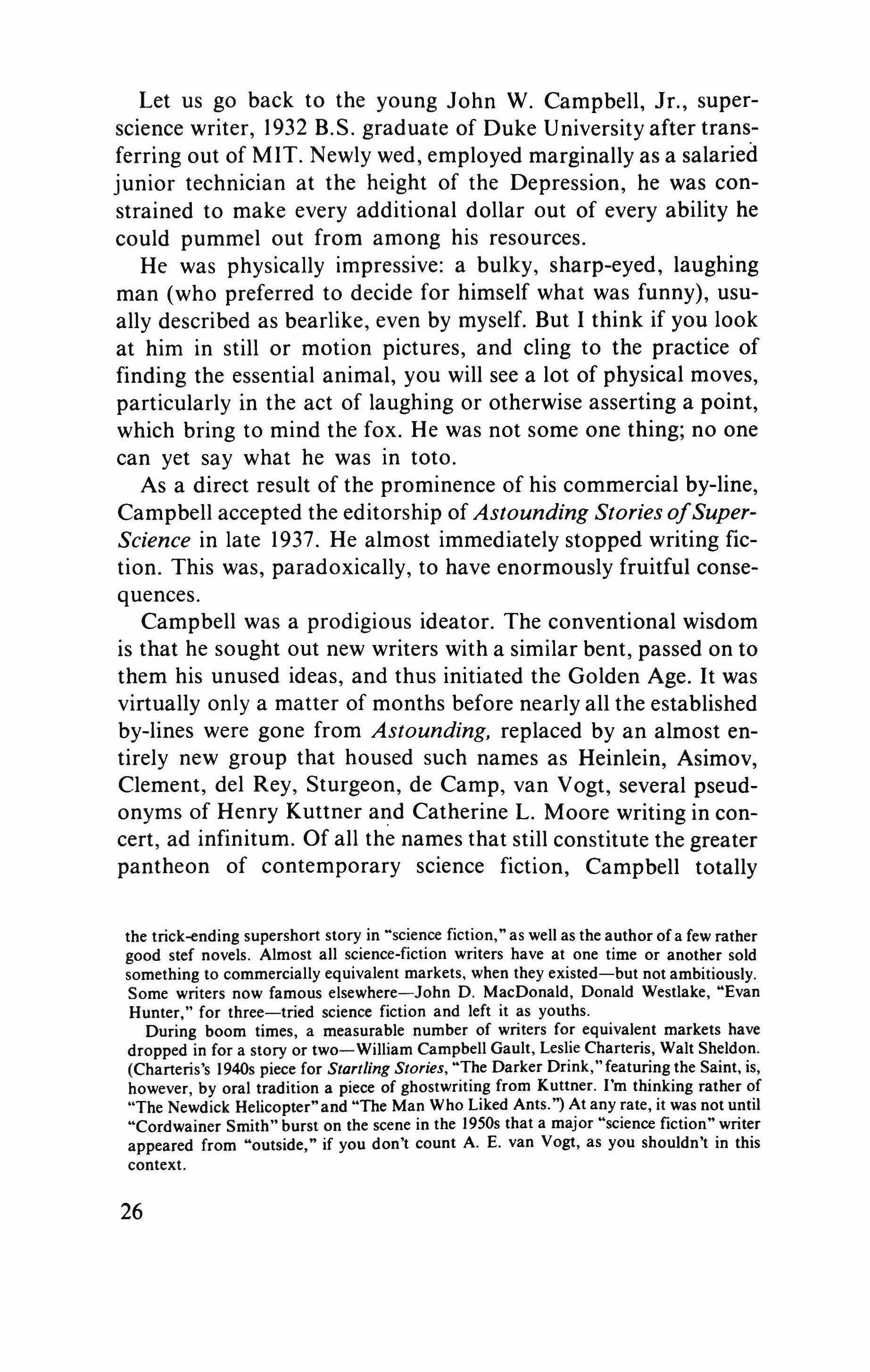
Let us go back to the young John W. Campbell, Jr., superscience writer, 1932 B.S. graduate of Duke University after transferring out of MIT. Newly wed, employed marginally as a salaried junior technician at the height of the Depression, he was constrained to make every additional dollar out of every ability he could pummel out from among his resources.
He was physically impressive: a bulky, sharp-eyed, laughing man (who preferred to decide for himself what was funny), usually described as bearlike, even by myself. But I think if you look at him in still or motion pictures, and cling to the practice of finding the essential animal, you will see a lot of physical moves, particularly in the act of laughing or otherwise asserting a point, which bring to mind the fox. He was not some one thing; no one can yet say what he was in toto.
As a direct result of the prominence of his commercial by-line, Campbell accepted the editorship of Astounding Stories ofSuperScience in late 1937. He almost immediately stopped writing fiction. This was, paradoxically, to have enormously fruitful consequences.
Campbell was a prodigious ideator. The conventional wisdom is that he sought out new writers with a similar bent, passed on to them his unused ideas, and thus initiated the Golden Age. It was virtually only a matter of months before nearly all the established by-lines were gone from Astounding, replaced by an almost entirely new group that housed such names as Heinlein, Asimov, Clement, del Rey, Sturgeon, de Camp, van Vogt, several pseudonyms of Henry Kuttner and Catherine L. Moore writing in concert, ad infinitum. Of all the names that still constitute the greater pantheon of contemporary science fiction, Campbell totally
the trick-ending supershort story in "science fiction," as well as the author of a few rather good stef novels. Almost all science-fiction writers have at one time or another sold something to commercially equivalent markets, when they existed-but not ambitiously. Some writers now famous elsewhere-John D. MacDonald, Donald Westlake, "Evan Hunter," for three-tried science fiction and left it as youths.
During boom times, a measurable number of writers for equivalent markets have dropped in for a story or two-William Campbell Gault, Leslie Charteris, Walt Sheldon. (Charteris's 1940s piece for Startling Stories, "The Darker Drink,"featuring the Saint, is, however, by oral tradition a piece of ghostwriting from Kuttner. I'm thinking rather of "The Newdick Helicopter" and "The Man Who Liked Ants.") At any rate, it was not until "Cordwainer Smith" burst on the scene in the 1950s that a major "science fiction" writer appeared from "outside," if you don't count A. E. van Vogt, as you shouldn't in this context.
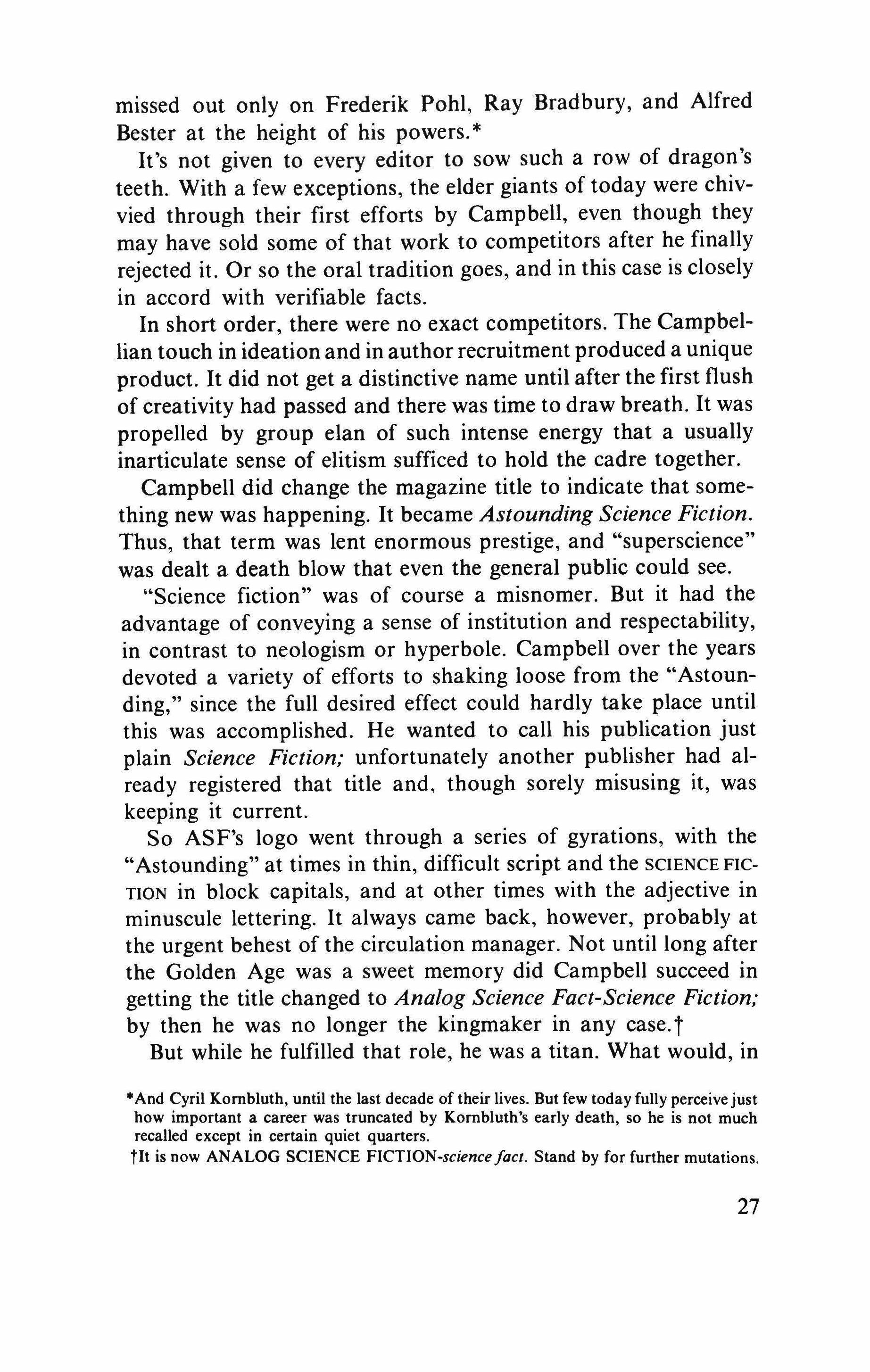
missed out only on Frederik Pohl, Ray Bradbury, and Alfred Bester at the height of his powers. *
It's not given to every editor to sow such a row of dragon's teeth. With a few exceptions, the elder giants of today were chivvied through their first efforts by Campbell, even though they may have sold some of that work to competitors after he finally rejected it. Or so the oral tradition goes, and in this case is closely in accord with verifiable facts.
In short order, there were no exact competitors. The Campbellian touch in ideation and in author recruitment produced a unique product. It did not get a distinctive name until after the first flush of creativity had passed and there was time to draw breath. It was propelled by group elan of such intense energy that a usually inarticulate sense of elitism sufficed to hold the cadre together.
Campbell did change the magazine title to indicate that something new was happening. It became Astounding Science Fiction. Thus, that term was lent enormous prestige, and "superscience" was dealt a death blow that even the general public could see.
"Science fiction" was of course a misnomer. But it had the advantage of conveying a sense of institution and respectability, in contrast to neologism or hyperbole. Campbell over the years devoted a variety of efforts to shaking loose from the "Astounding," since the full desired effect could hardly take place until this was accomplished. He wanted to call his publication just plain Science Fiction; unfortunately another publisher had already registered that title and, though sorely misusing it, was keeping it current.
So ASF's logo went through a series of gyrations, with the "Astounding" at times in thin, difficult script and the SCIENCE FICTION in block capitals, and at other times with the adjective in minuscule lettering. It always came back, however, probably at the urgent behest of the circulation manager. Not until long after the Golden Age was a sweet memory did Campbell succeed in getting the title changed to Analog Science Fact-Science Fiction; by then he was no longer the kingmaker in any case. t
But while he fulfilled that role, he was a titan. What would, in
• And Cyril Kornbluth, until the last decade of their lives. But few today fully perceivejust how important a career was truncated by Kornbluth's early death, so he is not much recalled except in certain quiet quarters. tit is now ANALOG SCIENCE FICTION-science/act. Stand by for further mutations.
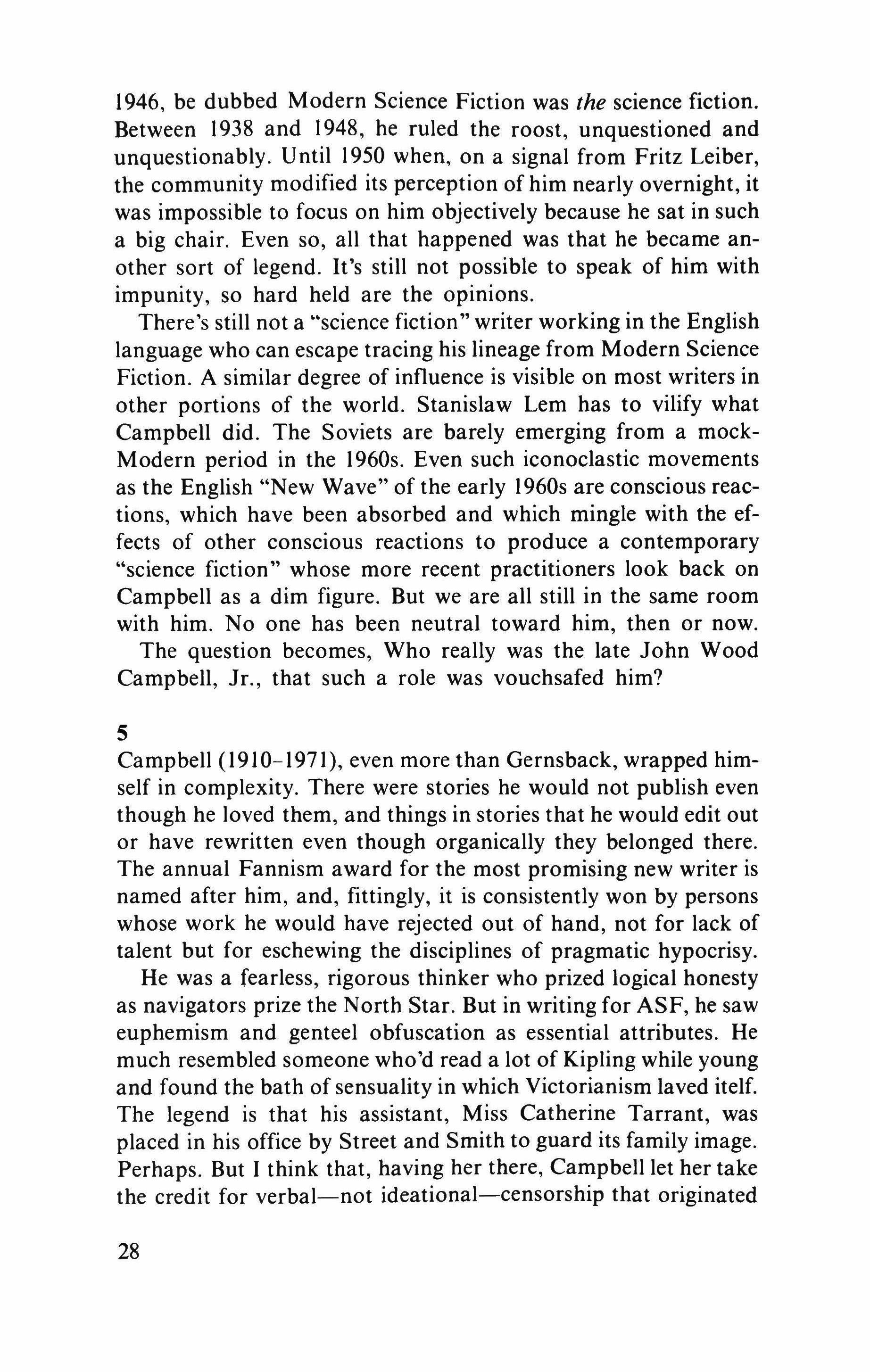
1946, be dubbed Modern Science Fiction was the science fiction. Between 1938 and 1948, he ruled the roost, unquestioned and unquestionably. Until 1950 when, on a signal from Fritz Leiber, the community modified its perception of him nearly overnight, it was impossible to focus on him objectively because he sat in such a big chair. Even so, all that happened was that he became another sort of legend. It's still not possible to speak of him with impunity, so hard held are the opinions.
There's still not a "science fiction" writer working in the English language who can escape tracing his lineage from Modern Science Fiction. A similar degree of influence is visible on most writers in other portions of the world. Stanislaw Lem has to vilify what Campbell did. The Soviets are barely emerging from a mockModern period in the 1960s. Even such iconoclastic movements as the English "New Wave" of the early 1960s are conscious reactions, which have been absorbed and which mingle with the effects of other conscious reactions to produce a contemporary "science fiction" whose more recent practitioners look back on Campbell as a dim figure. But we are all still in the same room with him. No one has been neutral toward him, then or now.
The question becomes, Who really was the late John Wood Campbell, Jr., that such a role was vouchsafed him?
5
Campbell (1910-1971), even more than Gernsback, wrapped himself in complexity. There were stories he would not publish even though he loved them, and things in stories that he would edit out or have rewritten even though organically they belonged there. The annual Fannism award for the most promising new writer is named after him, and, fittingly, it is consistently won by persons whose work he would have rejected out of hand, not for lack of talent but for eschewing the disciplines of pragmatic hypocrisy.
He was a fearless, rigorous thinker who prized logical honesty as navigators prize the North Star. But in writing for ASF, he saw euphemism and genteel obfuscation as essential attributes. He much resembled someone who'd read a lot of Kipling while young and found the bath of sensuality in which Victorianism laved itelf. The legend is that his assistant, Miss Catherine Tarrant, was placed in his office by Street and Smith to guard its family image. Perhaps. But I think that, having her there, Campbell let her take the credit for verbal-not ideational-censorship that originated
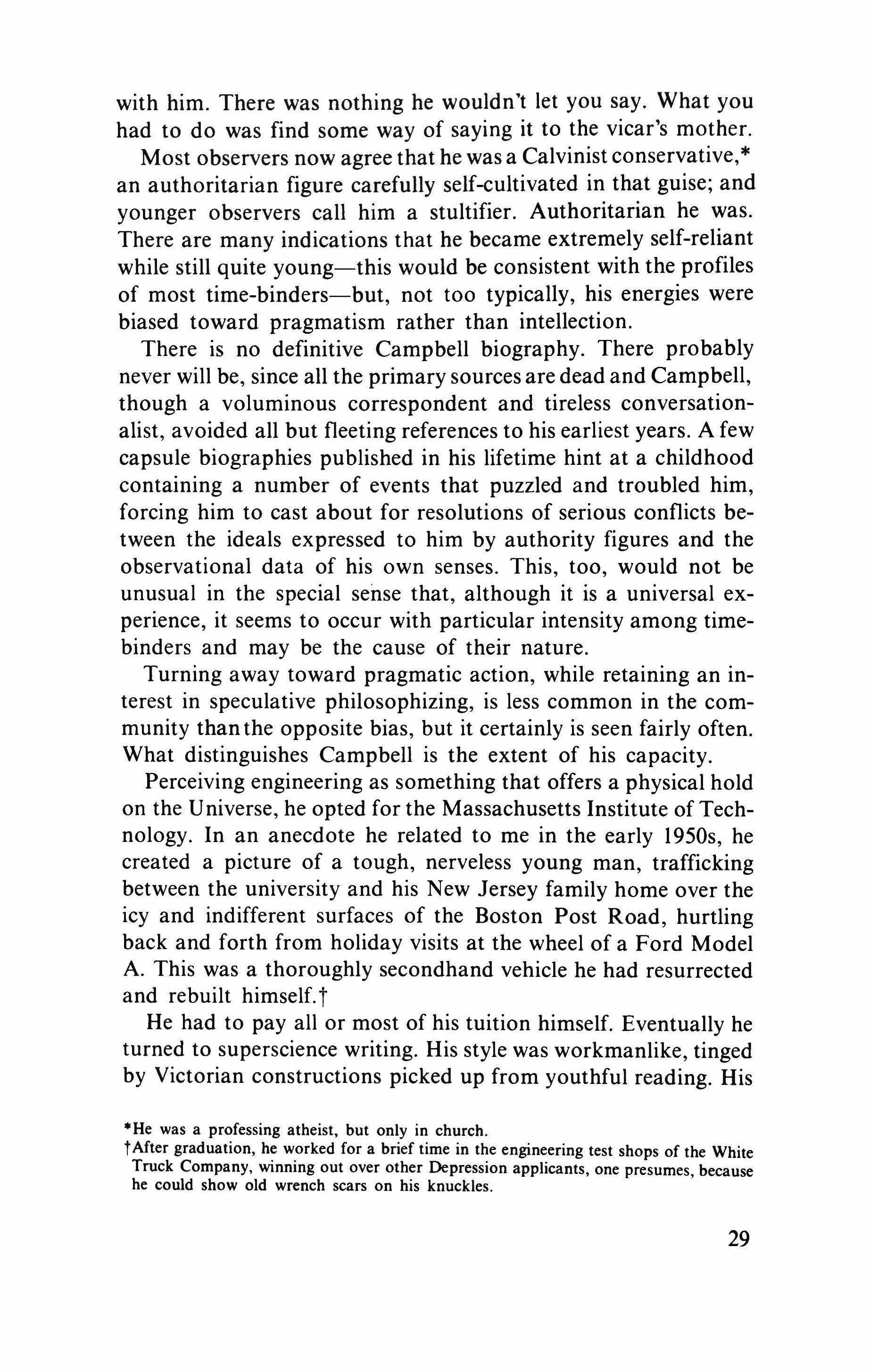
with him. There was nothing he wouldn't let you say. What you had to do was find some way of saying it to the vicar's mother.
Most observers now agree that he was a Calvinist conservative, * an authoritarian figure carefully self-cultivated in that guise; and younger observers call him a stultifier. Authoritarian he was. There are many indications that he became extremely self-reliant while still quite young-this would be consistent with the profiles of most time-binders-but, not too typically, his energies were biased toward pragmatism rather than intellection.
There is no definitive Campbell biography. There probably never will be, since all the primary sources are dead and Campbell, though a voluminous correspondent and tireless conversationalist, avoided all but fleeting references to his earliest years. A few capsule biographies published in his lifetime hint at a childhood containing a number of events that puzzled and troubled him, forcing him to cast about for resolutions of serious conflicts between the ideals expressed to him by authority figures and the observational data of his own senses. This, too, would not be unusual in the special sense that, although it is a universal experience, it seems to occur with particular intensity among timebinders and may be the cause of their nature.
Turning away toward pragmatic action, while retaining an interest in speculative philosophizing, is less common in the community than the opposite bias, but it certainly is seen fairly often. What distinguishes Campbell is the extent of his capacity.
Perceiving engineering as something that offers a physical hold on the Universe, he opted for the Massachusetts Institute of Technology. In an anecdote he related to me in the early 1950s, he created a picture of a tough, nerveless young man, trafficking between the university and his New Jersey family home over the icy and indifferent surfaces of the Boston Post Road, hurtling back and forth from holiday visits at the wheel of a Ford Model A. This was a thoroughly secondhand vehicle he had resurrected and rebuilt himself.t
He had to pay all or most of his tuition himself. Eventually he turned to superscience writing. His style was workmanlike, tinged by Victorian constructions picked up from youthful reading. His
*He was a professing atheist, but only in church.
tAfter graduation, he worked for a brief time in the engineering test shops of the White Truck Company, winning out over other Depression applicants, one presumes, because he could show old wrench scars on his knuckles.
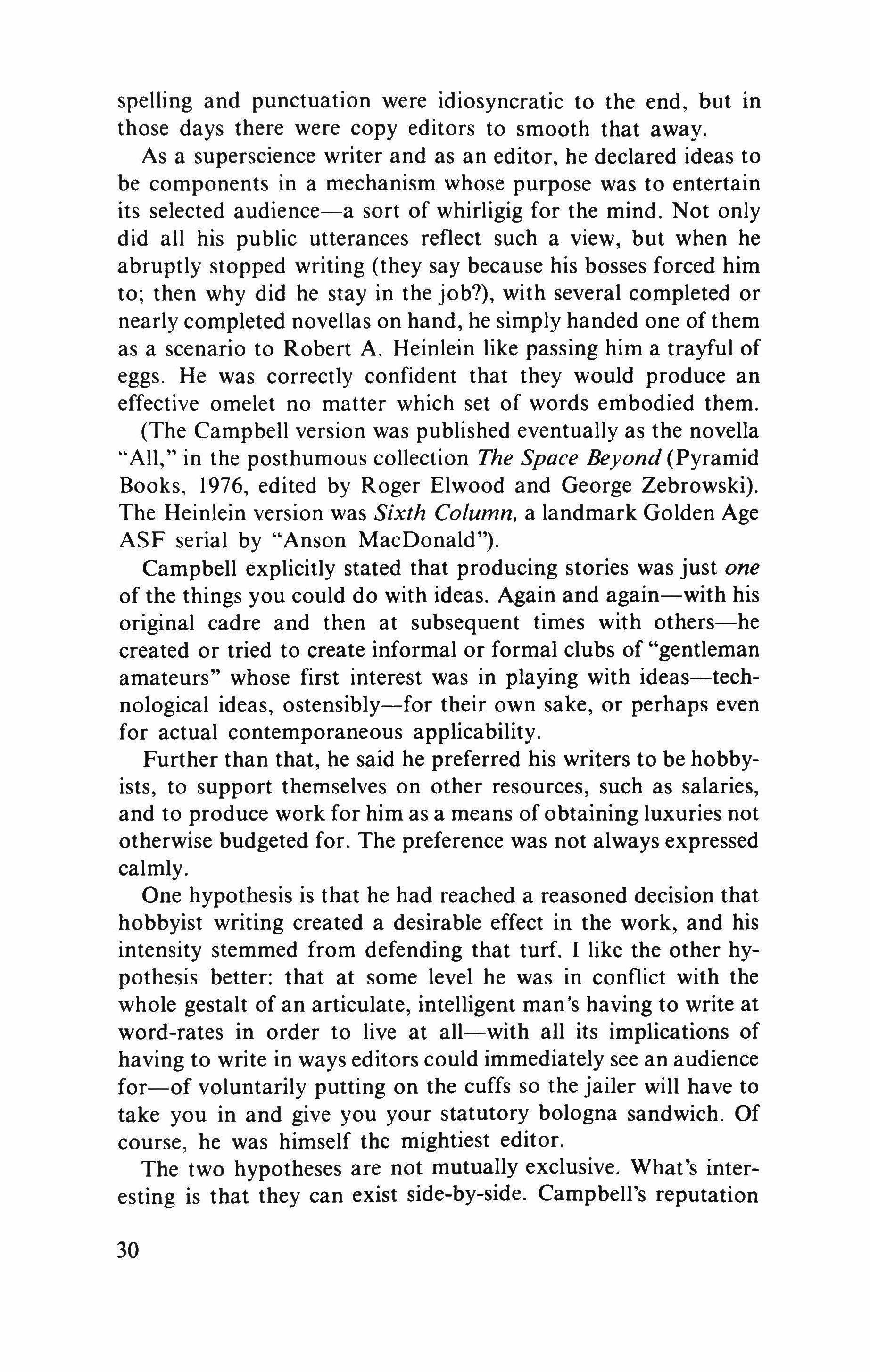
spelling and punctuation were idiosyncratic to the end, but in those days there were copy editors to smooth that away.
As a superscience writer and as an editor, he declared ideas to be components in a mechanism whose purpose was to entertain its selected audience-a sort of whirligig for the mind. Not only did all his public utterances reflect such a view, but when he abruptly stopped writing (they say because his bosses forced him to; then why did he stay in the job?), with several completed or nearly completed novellas on hand, he simply handed one of them as a scenario to Robert A. Heinlein like passing him a trayful of eggs. He was correctly confident that they would produce an effective omelet no matter which set of words embodied them.
(The Campbell version was published eventually as the novella "All," in the posthumous collection The Space Beyond (Pyramid Books, 1976, edited by Roger Elwood and George Zebrowski). The Heinlein version was Sixth Column, a landmark Golden Age ASF serial by "Anson MacDonald").
Campbell explicitly stated that producing stories was just one of the things you could do with ideas. Again and again-with his original cadre and then at subsequent times with others-he created or tried to create informal or formal clubs of "gentleman amateurs" whose first interest was in playing with ideas-technological ideas, ostensibly-for their own sake, or perhaps even for actual contemporaneous applicability.
Further than that, he said he preferred his writers to be hobbyists, to support themselves on other resources, such as salaries, and to produce work for him as a means of obtaining luxuries not otherwise budgeted for. The preference was not always expressed calmly.
One hypothesis is that he had reached a reasoned decision that hobbyist writing created a desirable effect in the work, and his intensity stemmed from defending that turf. I like the other hypothesis better: that at some level he was in conflict with the whole gestalt of an articulate, intelligent man's having to write at word-rates in order to live at all-with all its implications of having to write in ways editors could immediately see an audience for-of voluntarily putting on the cuffs so the jailer will have to take you in and give you your statutory bologna sandwich. Of course, he was himself the mightiest editor.
The two hypotheses are not mutually exclusive. What's interesting is that they can exist side-by-side. Campbell's reputation

now is of the incisive story-doctor, passing out capsule thumbrules to would-be contributors: a man who could "put his finger on it."
But this is not how it was. The famous letters to young writers were often vague, bumpy things; they were interminabilities in which he strained to make his meaning clear to both the addressee and himself, over and over again, until enough collisions with useful notions had occurred. His rejection notes were marvels of cryptic imprecision, as distinguished from polite obfuscation. His hortatory methods failed far more often then they succeeded: Alfred Bester and Damon Knight were specifically driven away by them, and who knows how many scores of lesser known or neophyte individuals, even of talent, could not accommodate to what were in fact seat-of-the pants methods. The survivors, of course, praised his name.
This is not to denigrate him. Any editor would gladly wish to show results on anything like the Campbellian scale. It is to indicate that however articulate he might be when given a chance to prepare his statements, and however one-two-three those statements might go when thus prepared, there was very much another side to him.
There was a lot of the poet in Campbell and, with just a bit of extra twist, he would have been a superb comedian. He had some of the two essential ingredients: a great insight into the human heart and a willingness to stumble. But he didn't think people would approve of him unless he called the stumbling something else-freewheeling but practical speculation, by preference.
I think, in short, that Campbell spent a lot of time paying attention to what he ought to say and do in his role, and that, more than some people, he controlled what he would let himself realize about himself.
This business of ideas, for example. Most people assume his were tech ideas. He expressed a very casual attitude toward ideas, in the sense that the only interest he never professed was the proprietary one. He liked to give the impression of a man juggling them happily, caring little whence they came, sometimes halfseriously suggesting that there was some mystical source continually putting them "in the air" for ideators to catch. He habitually and deftly tossed the same new idea to half a dozen different writers, confident it would sometimes return within stories, certain that no two stories would be sufficiently alike to disturb his
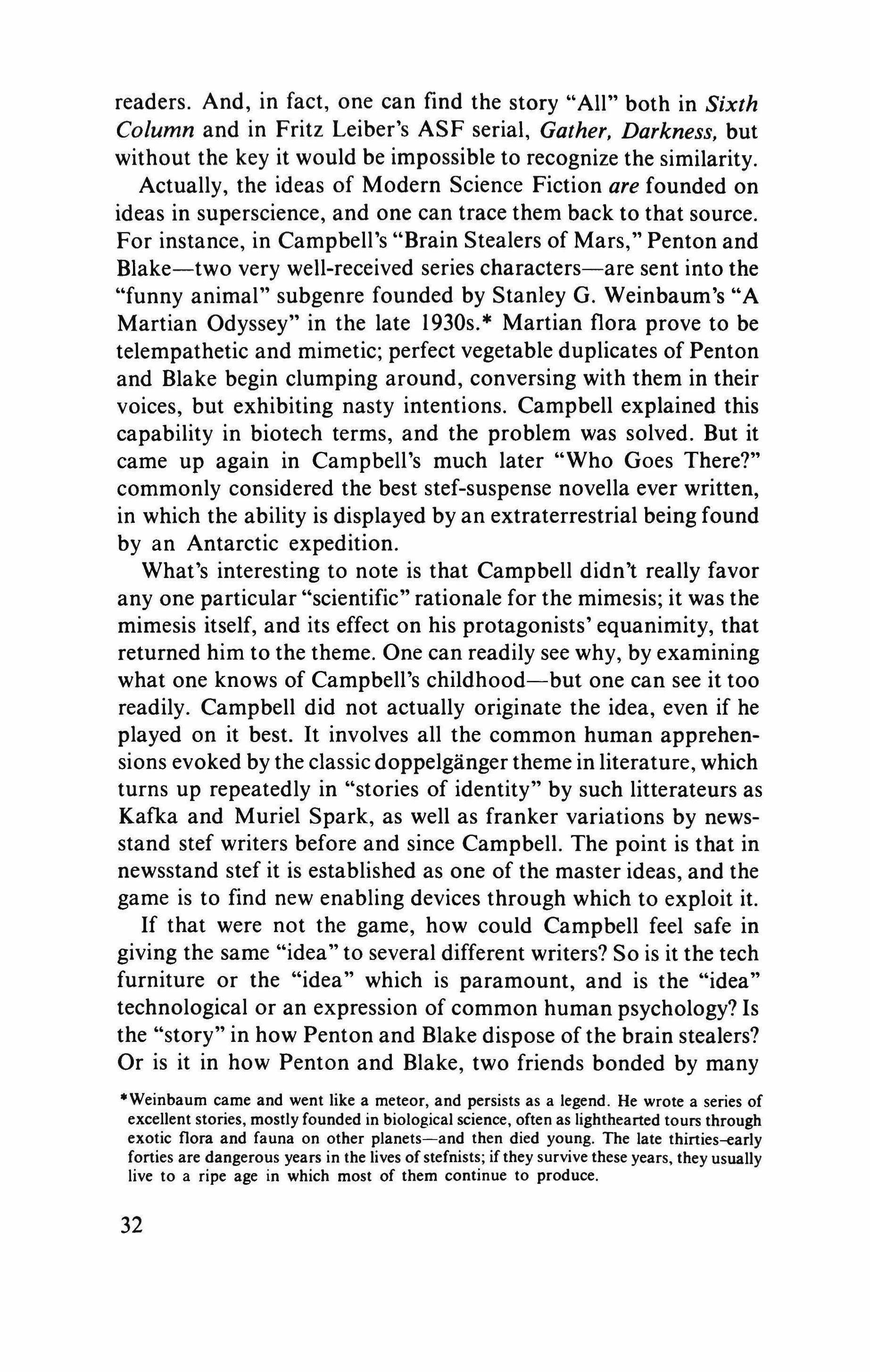
readers. And, in fact, one can find the story "All" both in Sixth Column and in Fritz Leiber's ASF serial, Gather, Darkness, but without the key it would be impossible to recognize the similarity.
Actually, the ideas of Modern Science Fiction are founded on ideas in superscience, and one can trace them back to that source. For instance, in Campbell's "Brain Stealers of Mars," Penton and Blake-two very well-received series characters-are sent into the "funny animal" subgenre founded by Stanley G. Weinbaum's "A Martian Odyssey" in the late 1930s. * Martian flora prove to be telempathetic and mimetic; perfect vegetable duplicates of Penton and Blake begin clumping around, conversing with them in their voices, but exhibiting nasty intentions. Campbell explained this capability in biotech terms, and the problem was solved. But it came up again in Campbell's much later "Who Goes There?" commonly considered the best stef-suspense novella ever written, in which the ability is displayed by an extraterrestrial being found by an Antarctic expedition.
What's interesting to note is that Campbell didn't really favor anyone particular "scientific" rationale for the mimesis; it was the mimesis itself, and its effect on his protagonists' equanimity, that returned him to the theme. One can readily see why, by examining what one knows of Campbell's childhood-but one can see it too readily. Campbell did not actually originate the idea, even if he played on it best. It involves all the common human apprehensions evoked by the classic doppelganger theme in literature, which turns up repeatedly in "stories of identity" by such litterateurs as Kafka and Muriel Spark, as well as franker variations by newsstand stef writers before and since Campbell. The point is that in newsstand stef it is established as one of the master ideas, and the game is to find new enabling devices through which to exploit it.
If that were not the game, how could Campbell feel safe in giving the same "idea" to several different writers? So is it the tech furniture or the "idea" which is paramount, and is the "idea" technological or an expression of common human psychology? Is the "story" in how Penton and Blake dispose of the brain stealers? Or is it in how Penton and Blake, two friends bonded by many
*Weinbaum came and went like a meteor, and persists as a legend. He wrote a series of excellent stories, mostly founded in biological science, often as lighthearted tours through exotic flora and fauna on other planets-and then died young. The late thirties-early forties are dangerous years in the lives of stefnists; if they survive these years, they usually live to a ripe age in which most of them continue to produce.
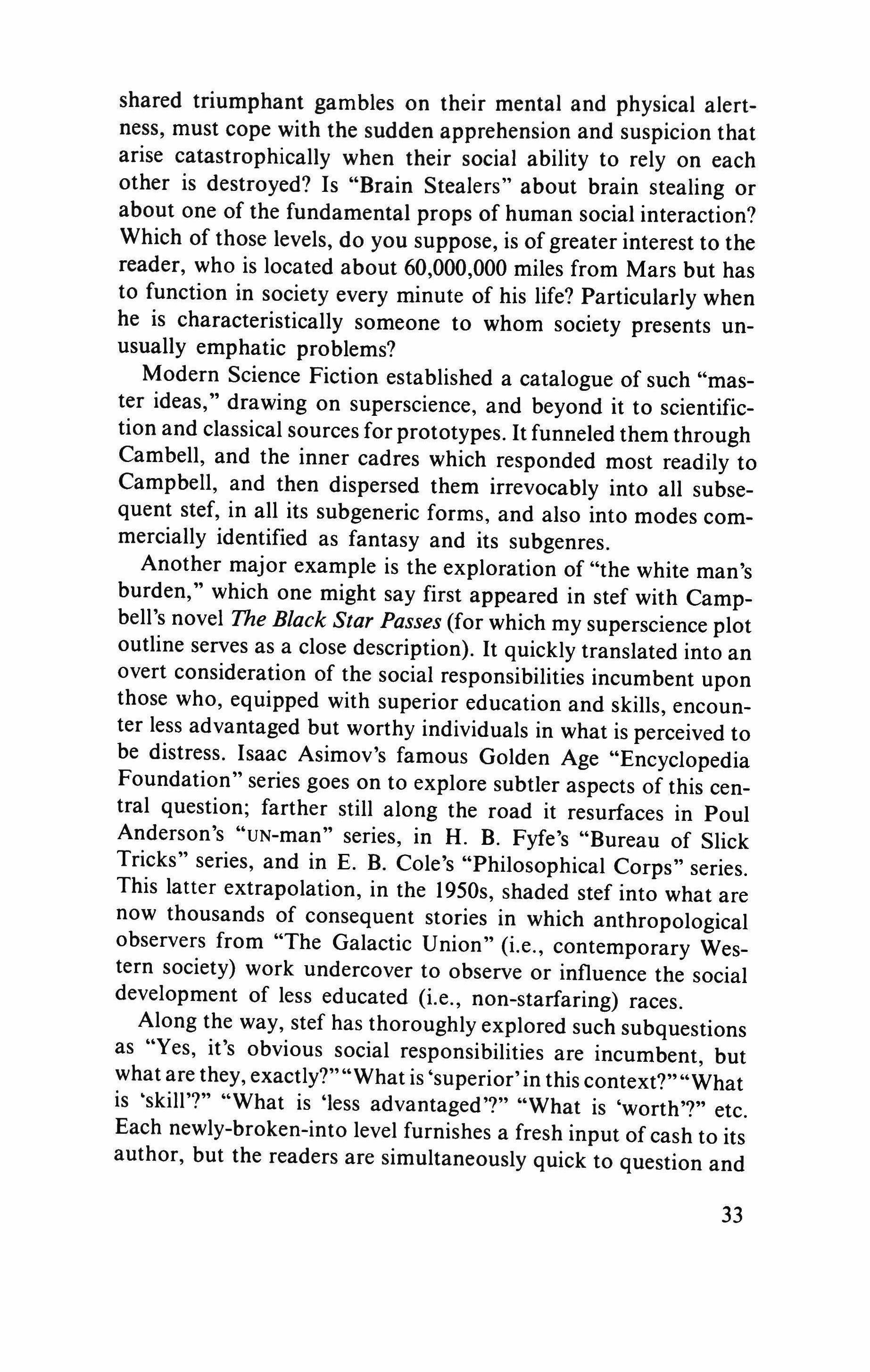
shared triumphant gambles on their mental and physical alertness, must cope with the sudden apprehension and suspicion that arise catastrophically when their social ability to rely on each other is destroyed? Is "Brain Stealers" about brain stealing or about one of the fundamental props of human social interaction? Which of those levels, do you suppose, is of greater interest to the reader, who is located about 60,000,000 miles from Mars but has to function in society every minute of his life? Particularly when he is characteristically someone to whom society presents unusually emphatic problems?
Modern Science Fiction established a catalogue of such "master ideas," drawing on superscience, and beyond it to scientifiction and classical sources for prototypes. It funneled them through Cambell, and the inner cadres which responded most readily to Campbell, and then dispersed them irrevocably into all subsequent stef, in all its subgeneric forms, and also into modes commercially identified as fantasy and its subgenres.
Another major example is the exploration of "the white man's burden," which one might say first appeared in stef with Camp bell's novel The Black Star Passes (for which my superscience plot outline serves as a close description). It quickly translated into an overt consideration of the social responsibilities incumbent upon those who, equipped with superior education and skills, encounter less advantaged but worthy individuals in what is perceived to be distress. Isaac Asimov's famous Golden Age "Encyclopedia Foundation" series goes on to explore subtler aspects of this central question; farther still along the road it resurfaces in Poul Anderson's "UN-man" series, in H. B. Fyfe's "Bureau of Slick Tricks" series, and in E. B. Cole's "Philosophical Corps" series. This latter extrapolation, in the 1950s, shaded stef into what are now thousands of consequent stories in which anthropological observers from "The Galactic Union" (i.e., contemporary Western society) work undercover to observe or influence the social development of less educated (i.e., non-starfaring) races.
Along the way, stef has thoroughly explored such subquestions as "Yes, it's obvious social responsibilities are incumbent, but what are they, exactly?" "What is 'superior' in this context?""What is 'skill'?" "What is 'less advantaged'?" "What is 'worth'?" etc. Each newly-broken-into level furnishes a fresh input of cash to its author, but the readers are simultaneously quick to question and
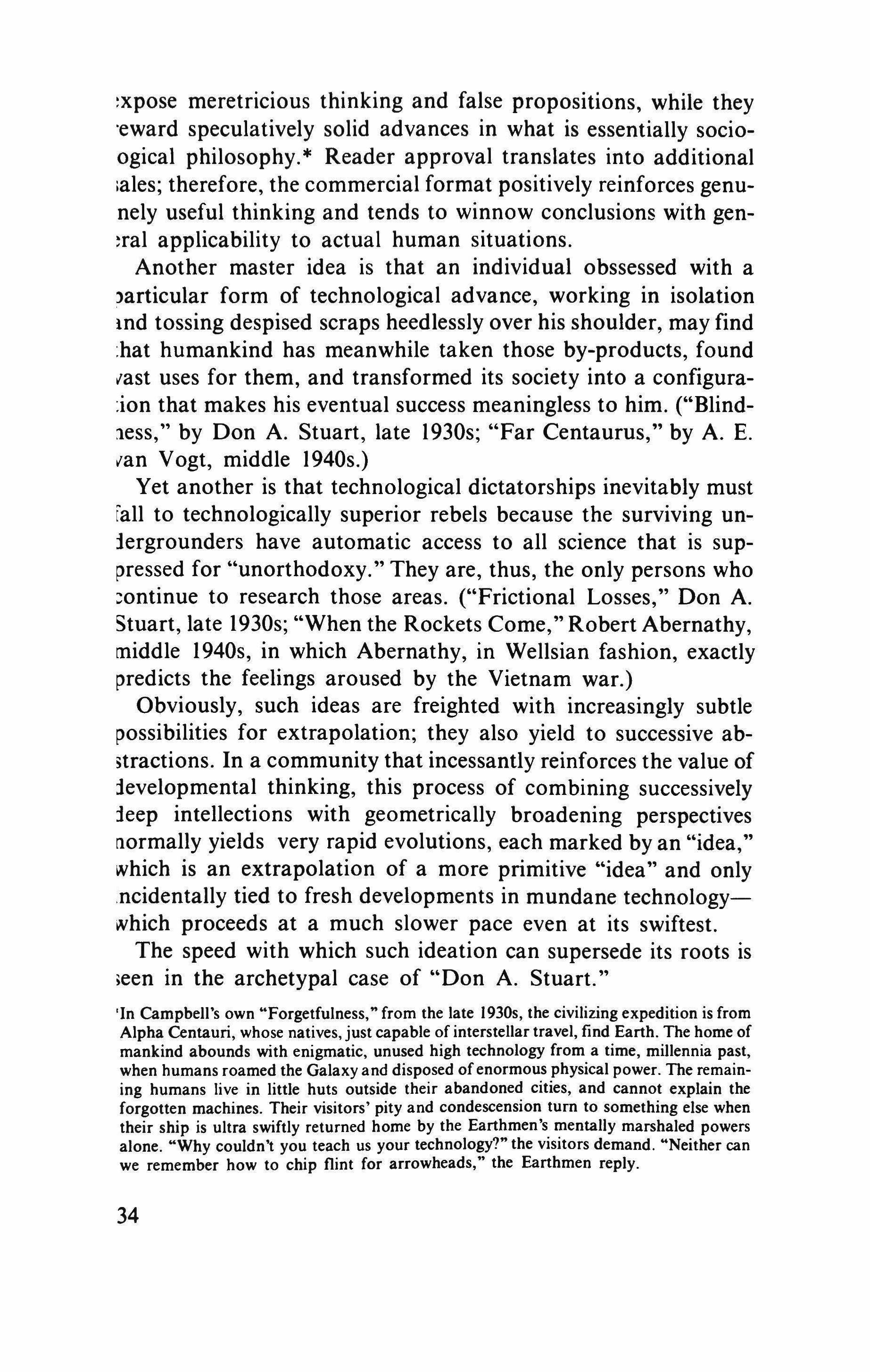
.xpose meretricious thinking and false propositions, while they 'eward speculatively solid advances in what is essentially socioogical philosophy. * Reader approval translates into additional .ales; therefore, the commercial format positively reinforces genunely useful thinking and tends to winnow conclusions with gen.ral applicability to actual human situations.
Another master idea is that an individual obssessed with a oarticular form of technological advance, working in isolation ind tossing despised scraps heedlessly over his shoulder, may find :hat humankind has meanwhile taken those by-products, found vast uses for them, and transformed its society into a configura:ion that makes his eventual success meaningless to him. ("Blindless," by Don A. Stuart, late 1930s; "Far Centaurus," by A. E. van Vogt, middle 1940s.)
Yet another is that technological dictatorships inevitably must fall to technologically superior rebels because the surviving un:lergrounders have automatic access to all science that is suppressed for "unorthodoxy." They are, thus, the only persons who continue to research those areas. ("Frictional Losses," Don A. Stuart, late 1930s; "When the Rockets Come," Robert Abernathy, middle 1940s, in which Abernathy, in Wellsian fashion, exactly predicts the feelings aroused by the Vietnam war.)
Obviously, such ideas are freighted with increasingly subtle possibilities for extrapolation; they also yield to successive abstractions. In a community that incessantly reinforces the value of :levelopmental thinking, this process of combining successively :leep intellections with geometrically broadening perspectives normally yields very rapid evolutions, each marked by an "idea," which is an extrapolation of a more primitive "idea" and only .ncidentally tied to fresh developments in mundane technologywhich proceeds at a much slower pace even at its swiftest.
The speed with which such ideation can supersede its roots is ;een in the archetypal case of "Don A. Stuart."
'In Campbell's own "Forgetfulness," from the late 1930s, the civilizing expedition is from Alpha Centauri, whose natives, just capable of interstellar travel, find Earth. The home of mankind abounds with enigmatic, unused high technology from a time, millennia past, when humans roamed the Galaxy and disposed of enormous physical power. The remaining humans live in little huts outside their abandoned cities, and cannot explain the forgotten machines. Their visitors' pity and condescension turn to something else when their ship is ultra swiftly returned home by the Earthmen's mentally marshaled powers alone. "Why couldn't you teach us your technology?" the visitors demand. "Neither can we remember how to chip flint for arrowheads," the Earthmen reply.
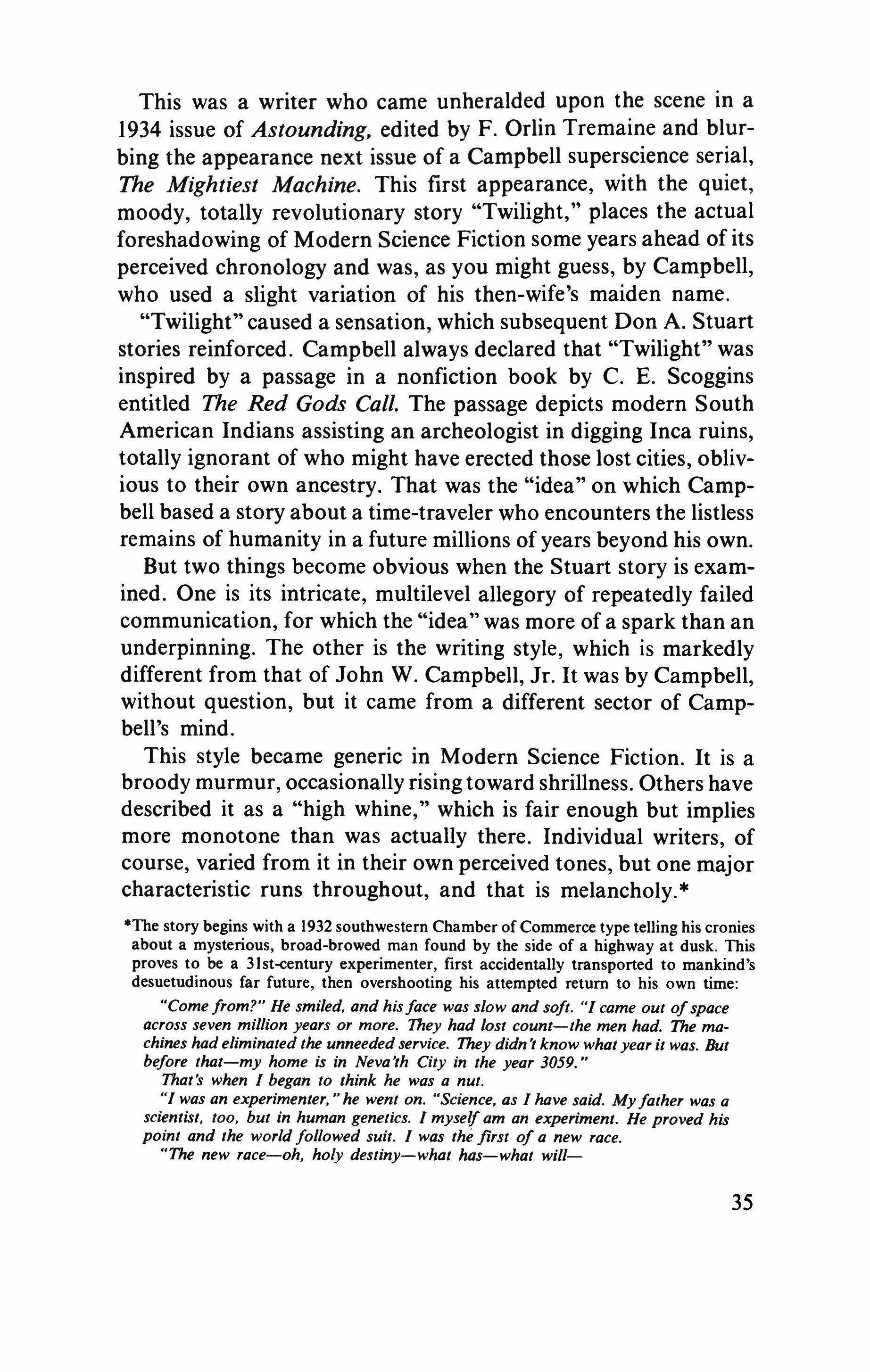
This was a writer who came unheralded upon the scene in a 1934 issue of Astounding, edited by F. Orlin Tremaine and blurbing the appearance next issue of a Campbell superscience serial, The Mightiest Machine. This first appearance, with the quiet, moody, totally revolutionary story "Twilight," places the actual foreshadowing of Modern Science Fiction some years ahead of its perceived chronology and was, as you might guess, by Campbell, who used a slight variation of his then-wife's maiden name.
"Twilight" caused a sensation, which subsequent Don A. Stuart stories reinforced. Campbell always declared that "Twilight" was inspired by a passage in a nonfiction book by C. E. Scoggins entitled The Red Gods Call. The passage depicts modern South American Indians assisting an archeologist in digging Inca ruins, totally ignorant of who might have erected those lost cities, oblivious to their own ancestry. That was the "idea" on which Campbell based a story about a time-traveler who encounters the listless remains of humanity in a future millions of years beyond his own.
But two things become obvious when the Stuart story is examined. One is its intricate, multilevel allegory of repeatedly failed communication, for which the "idea" was more of a spark than an underpinning. The other is the writing style, which is markedly different from that of John W. Campbell, Jr. It was by Campbell, without question, but it came from a different sector of Campbell's mind.
This style became generic in Modern Science Fiction. It is a broody murmur, occasionally rising toward shrillness. Others have described it as a "high whine," which is fair enough but implies more monotone than was actually there. Individual writers, of course, varied from it in their own perceived tones, but one major characteristic runs throughout, and that is melancholy. *
*The story begins with a 1932 southwestern Chamber of Commerce type telling his cronies about a mysterious, broad-browed man found by the side of a highway at dusk. This proves to be a 31st-century experimenter, first accidentally transported to mankind's desuetudinous far future, then overshooting his attempted return to his own time:
"Come from?" He smiled, and hisface was slow and soft. "I came out ofspace across seven million years or more. They had lost count-the men had. The machines had eliminated the unneeded service. They didn't know what year it was. But before that-my home is in Neva'th City in the year 3059.
That s when / began to think he was a nut.
"I was an experimenter," he went on. "Science, as / have said. Myfather was a scientist, too, but in human genetics. / myself am an experiment. He proved his point and the world followed suit. / was the first of a new race.
"The new race=oh, holy destiny-what has-what wil/-
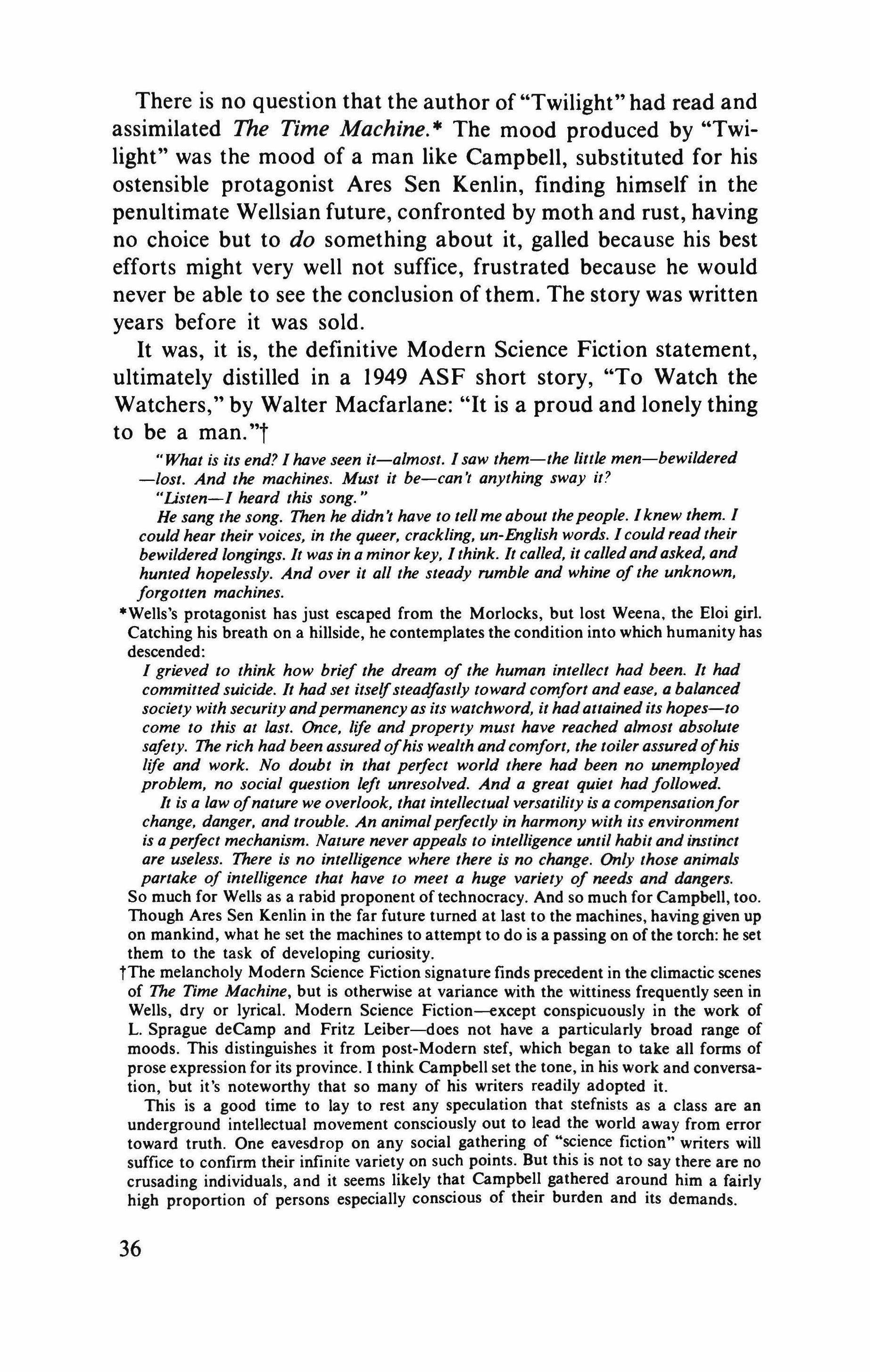
There is no question that the author of "Twilight" had read and assimilated The Time Machine. * The mood produced by "Twilight" was the mood of a man like Campbell, substituted for his ostensible protagonist Ares Sen Kenlin, finding himself in the penultimate Wellsian future, confronted by moth and rust, having no choice but to do something about it, galled because his best efforts might very well not suffice, frustrated because he would never be able to see the conclusion of them. The story was written years before it was sold.
It was, it is, the definitive Modern Science Fiction statement, ultimately distilled in a 1949 ASF short story, "To Watch the Watchers," by Walter Macfarlane: "It is a proud and lonely thing to be a man. "t
"What is its end? I have seen it-almost. I saw them-the little men-bewildered -lost. And the machines. Must it be-can't anything sway it'
"Listen=-I heard this song."
He sang the song. Then he didn't have to tell me about thepeople. Iknew them. I could hear their voices, in the queer, crackling, un-English words. I could read their bewildered longings. It was in a minor key, I think. It called, it calledandasked, and hunted hopelessly. And over it all the steady rumble and whine of the unknown, forgotten machines.
·Wells·s protagonist has just escaped from the Morlocks, but lost Weena, the Eloi girl. Catching his breath on a hillside, he contemplates the condition into which humanity has descended:
I grieved to think how brief the dream of the human intellect had been. It had committed suicide. It had set itselfsteadfastly toward comfort and ease, a balanced society with security andpermanency as its watchword, it hadattained its hopes-to come to this at last. Once, life and property must have reached almost absolute safety. The rich had been assured ofhis wealth and comfort, the toiler assuredofhis life and work. No doubt in that perfect world there had been no unemployed problem, no social question left unresolved. And a great quiet had followed. It is a law ofnature we overlook, that intellectual versatility is a compensationfor change, danger, and trouble. An animalperfectly in harmony with its environment is a perfect mechanism. Nature never appeals to intelligence until habit and instinct are useless. There is no intelligence where there is no change. Only those animals partake of intelligence that have to meet a huge variety of needs and dangers. So much for Wells as a rabid proponent of technocracy. And so much for Campbell, too. Though Ares Sen Kenlin in the far future turned at last to the machines. having given up on mankind, what he set the machines to attempt to do is a passing on of the torch: he set them to the task of developing curiosity.
tThe melancholy Modern Science Fiction signature finds precedent in the climactic scenes of The Time Machine, but is otherwise at variance with the wittiness frequently seen in Wells, dry or lyrical. Modern Science Fiction--except conspicuously in the work of L. Sprague deCamp and Fritz Leiber-does not have a particularly broad range of moods. This distinguishes it from post-Modern stef, which began to take all forms of prose expression for its province. I think Campbell set the tone, in his work and conversation, but it's noteworthy that so many of his writers readily adopted it. This is a good time to lay to rest any speculation that stefnists as a class are an underground intellectual movement consciously out to lead the world away from error toward truth. One eavesdrop on any social gathering of "science fiction" writers will suffice to confirm their infinite variety on such points. But this is not to say there are no crusading individuals, and it seems likely that Campbell gathered around him a fairly high proportion of persons especially conscious of their burden and its demands.

Compared to all previous stories in the genre media (during the initial eight-year history of that commercial field), "Twilight" was essentially without precedent. Its effect depended not upon its plot, not upon its central technological supposition, not even so much on the arrangement of its primary and supporting ideas, but on its "mood"-that is, on what it evoked in the psyches, rather than in the intellects, of its readers. And that effect was literary. It transcended the mere building blocks of its words and sentences, and belied Campbell's assertion that it was simply a deployment of ideas to be speculated upon as ideas. It was a direct lineal descendant of the work of H. G. Wells, the would-be Mainstream author, as evolved to enwrap a philosophical statement. It does not matter that this quality apparently resulted from the merely intuitive creativity of a man who made a passable living as a rocksteady genre writer and who had never read a book from a liberal arts viewpoint in his life.
There is something to be made of the fact that as a genre businessman, Campbell must have realized, imprimis, that in "Twilight" he was producing the unsalable, and was compelled to go ahead and do it anyway. There was no place for it in the generic media; this was confirmed by its repeated failure to sell to anyone publishing "science fiction."
This is a famous failure; the oral tradition of the field refers to it often. The story was rejected for years, everywhere, until Tremaine eventually took it. There is reason to believe that he accepted it in part because he never had a very sure grasp of what "science fiction" was. Had he been more confident of what was expected in the field, he might never have run it. Campbell's own feeling was that it was so far out of line it required a pseudonym to protect John W. Campbell, 1r.,'s established reputation for knowing what the pure quill was, and supplying it.
What I am asserting is that there really is such a thing as literature, that it exists as a genuine entity generated by universal human aesthetics, and that its imperatives can under certain circumstances force themselves even upon prose salesmen with a vested interest in denying them. I believe that, for all practical purposes, "Twilight" represents the first incursion into original genre "science fiction" of art as something beyond mere craftsmanship.
It is necessary to think of literature as a quality, rather than the result of a writer's conscious abilities, in order to explain the
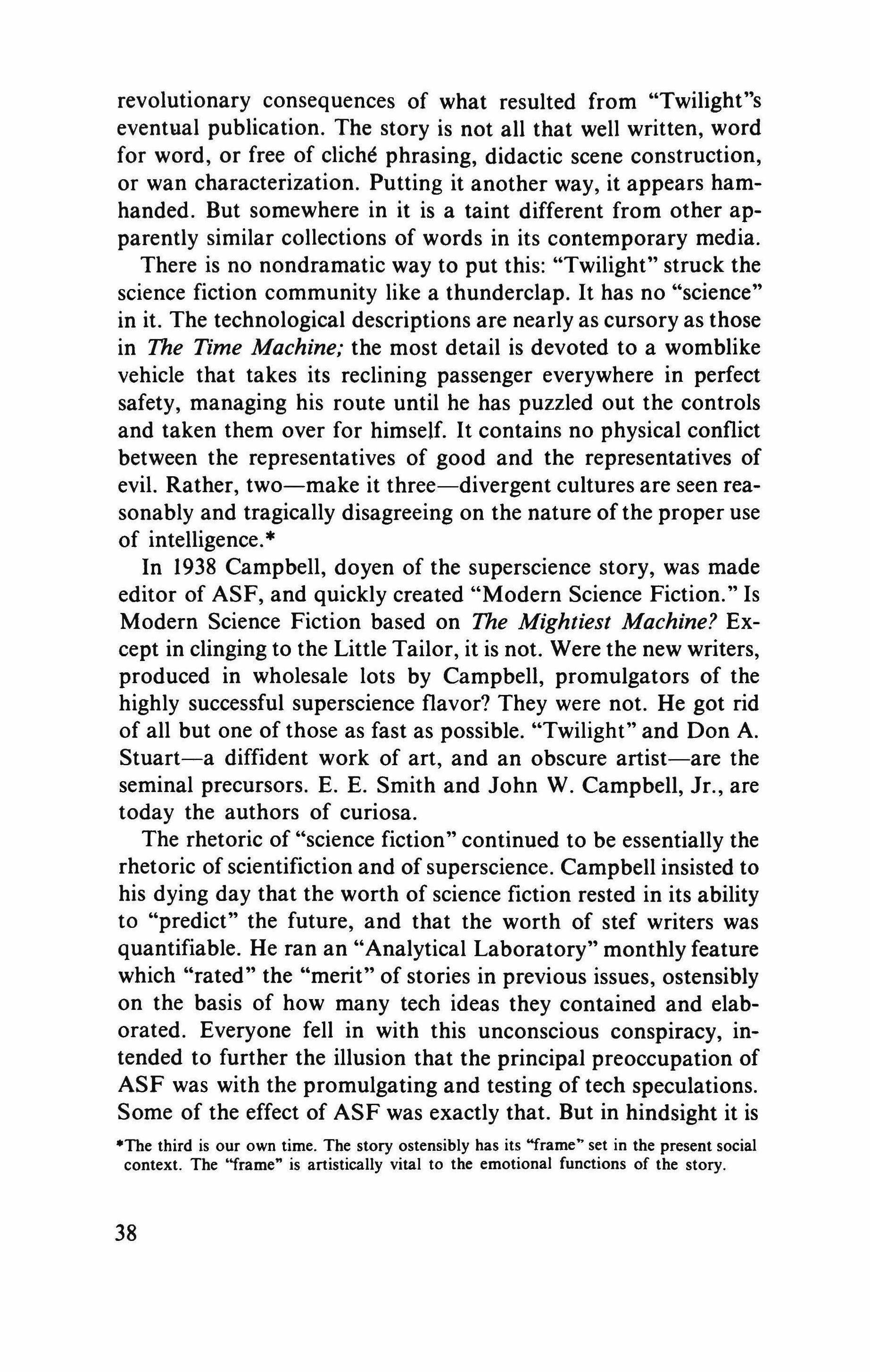
revolutionary consequences of what resulted from "Twilight"s eventual publication. The story is not all that well written, word for word, or free of cliche phrasing, didactic scene construction, or wan characterization. Putting it another way, it appears hamhanded. But somewhere in it is a taint different from other apparently similar collections of words in its contemporary media.
There is no nondramatic way to put this: "Twilight" struck the science fiction community like a thunderclap. It has no "science" in it. The technological descriptions are nearly as cursory as those in The Time Machine; the most detail is devoted to a womblike vehicle that takes its reclining passenger everywhere in perfect safety, managing his route until he has puzzled out the controls and taken them over for himself. It contains no physical conflict between the representatives of good and the representatives of evil. Rather, two-make it three-divergent cultures are seen reasonably and tragically disagreeing on the nature of the proper use of intelligence. *
In 1938 Campbell, doyen of the superscience story, was made editor of ASF, and quickly created "Modern Science Fiction." Is Modern Science Fiction based on The Mightiest Machine? Except in clinging to the Little Tailor, it is not. Were the new writers, produced in wholesale lots by Campbell, promulgators of the highly successful superscience flavor? They were not. He got rid of all but one of those as fast as possible. "Twilight" and Don A. Stuart-a diffident work of art, and an obscure artist-are the seminal precursors. E. E. Smith and John W. Campbell, Jr., are today the authors of curiosa.
The rhetoric of "science fiction" continued to be essentially the rhetoric of scientifiction and of superscience. Campbell insisted to his dying day that the worth of science fiction rested in its ability to "predict" the future, and that the worth of stef writers was quantifiable. He ran an "Analytical Laboratory" monthly feature which "rated" the "merit" of stories in previous issues, ostensibly on the basis of how many tech ideas they contained and elaborated. Everyone fell in with this unconscious conspiracy, intended to further the illusion that the principal preoccupation of ASF was with the promulgating and testing of tech speculations. Some of the effect of ASF was exactly that. But in hindsight it is
·The third is our own time. The story ostensibly has its "frame" set in the present social context. The "frame" is artistically vital to the emotional functions of the story.

ludicrous to suggest that this is what ASF was doing the greater part of the time.
A notable, central fact regarding Campbell is rarely placed in its proper perspective. After inheriting the editorial direction of ASF, he promptly created a sister magazine devoted to fantasy. It is the only publication Campbell ever founded. Called Unknown, and later Unknown Worlds, its format was identical with ASF's, and its core writers were shared between the two media. Unknown died in World War II paper shortages. Many Campbell writers promptly began selling some of their total production to Weird Tales and Fantastic Adventures, which paid badly. Campbell made several postwar efforts to revive Unknown. In other words, the editor and the writers now cited as hardheaded scientophiles were just as ready to practice magic under other hats.
So to what extent does stefartistically separate "science fiction" from "fantasy" or other forms of speculative fiction?
Among the few details available from Campbell's childhood is the anecdote relating that his mother and aunt, being identical twins, often exchanged clothes and roles in order to prankishly confuse the youngster. Wherever the truth and full extent of this Freudian nightmare might lie, observation declares that Campbell was himself a twinned person (and also hyperconscious of what it can mean to be a "junior"). * While the articulate, public personality was busy generating verbal formulae intended to deny the brooding, anxious artist, the raw creative genius was getting his licks in by the very nature of the ideas that the public Campbell dispensed to his amanuenses-as if he were a genuine storycomputational machine instead of a Maelzel's "mechanical" chess player with a hidden person inside. (Cf. "Poor Superman," by Fritz Leiber, the writer whose own art punctured more Campbell myths more precisely than the oral tradition yet recognizes.)
The universal quality shared by those ideas, again, is that they were not technological; they were sociological. The idea of"All," for instance, is that technology might supply devices whose discreet use would support a new miraculous religion, which then would constitute an overwhelming political force. The specific hardware is totally optional, and differs among the Campbell, Heinlein, and Leiber versions.
Dianetics, the Modern Science of Mental Health goes to obsessive lengths on the inescapable psychic damage resulting from being named for one's parent. See further passages relating to Campbell vis-a-vis Dianetics and Scientology.
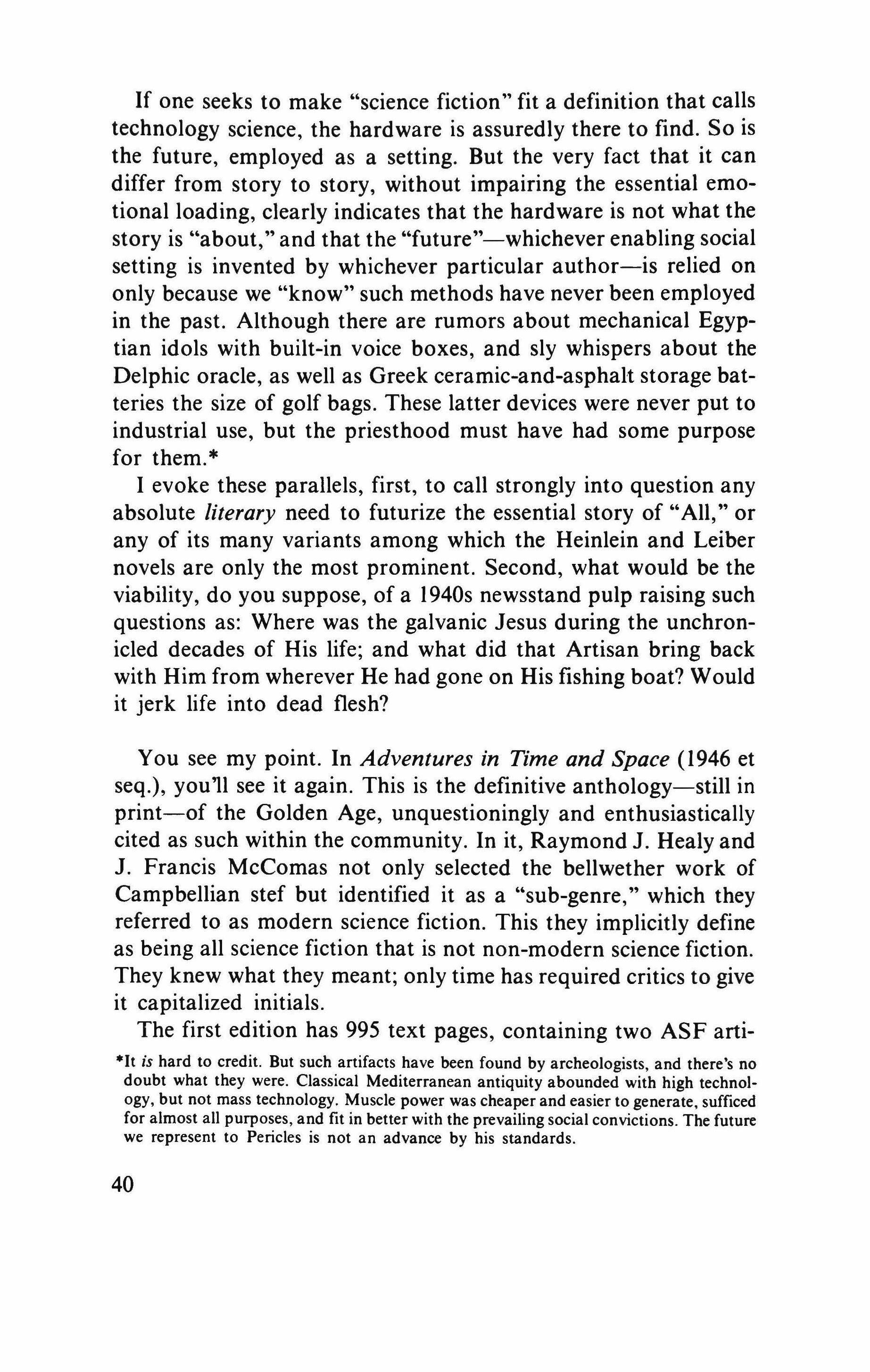
If one seeks to make "science fiction" fit a definition that calls technology science, the hardware is assuredly there to find. So is the future, employed as a setting. But the very fact that it can differ from story to story, without impairing the essential emotionalloading, clearly indicates that the hardware is not what the story is "about," and that the "future"-whichever enabling social setting is invented by whichever particular author-is relied on only because we "know" such methods have never been employed in the past. Although there are rumors about mechanical Egyptian idols with built-in voice boxes, and sly whispers about the Delphic oracle, as well as Greek ceramic-and-asphalt storage batteries the size of golf bags. These latter devices were never put to industrial use, but the priesthood must have had some purpose for them.*
I evoke these parallels, first, to call strongly into question any absolute literary need to futurize the essential story of "All," or any of its many variants among which the Heinlein and Leiber novels are only the most prominent. Second, what would be the viability, do you suppose, of a 1940s newsstand pulp raising such questions as: Where was the galvanic Jesus during the unchronicled decades of His life; and what did that Artisan bring back with Him from wherever He had gone on His fishing boat? Would it jerk life into dead flesh?
You see my point. In Adventures in Time and Space (1946 et seq.), you'll see it again. This is the definitive anthology-still in print-of the Golden Age, unquestioningly and enthusiastically cited as such within the community. In it, Raymond J. Healy and J. Francis McComas not only selected the bellwether work of Campbellian stef but identified it as a "sub-genre," which they referred to as modern science fiction. This they implicitly define as being all science fiction that is not non-modern science fiction. They knew what they meant; only time has required critics to give it capitalized initials.
The first edition has 995 text pages, containing two ASF arti·It is hard to credit. But such artifacts have been found by archeologists, and there's no doubt what they were. Classical Mediterranean antiquity abounded with high technology, but not mass technology. Muscle power was cheaper and easier to generate, sufficed for almost all purposes, and fit in better with the prevailing social convictions. The future we represent to Pericles is not an advance by his standards.
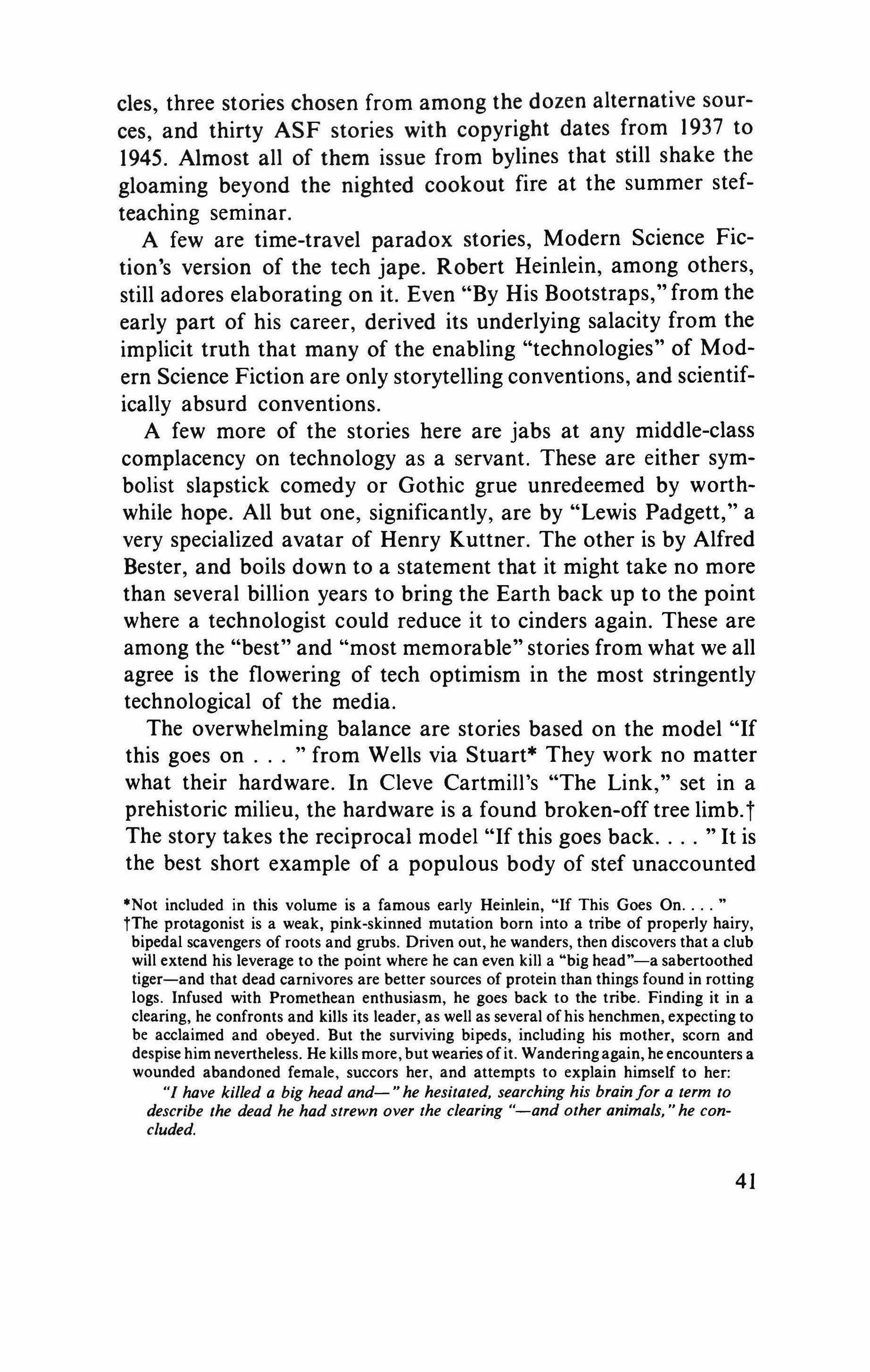
cles, three stories chosen from among the dozen alternative sources, and thirty ASF stories with copyright dates from 1937 to 1945. Almost all of them issue from bylines that still shake the gloaming beyond the nighted cookout fire at the summer stefteaching seminar.
A few are time-travel paradox stories, Modern Science Fiction's version of the tech jape. Robert Heinlein, among others, still adores elaborating on it. Even "By His Bootstraps," from the early part of his career, derived its underlying salacity from the implicit truth that many of the enabling "technologies" of Modern Science Fiction are only storytelling conventions, and scientifically absurd conventions.
A few more of the stories here are jabs at any middle-class complacency on technology as a servant. These are either symbolist slapstick comedy or Gothic grue unredeemed by worthwhile hope. All but one, significantly, are by "Lewis Padgett," a very specialized avatar of Henry Kuttner. The other is by Alfred Bester, and boils down to a statement that it might take no more than several billion years to bring the Earth back up to the point where a technologist could reduce it to cinders again. These are among the "best" and "most memorable" stories from what we all agree is the flowering of tech optimism in the most stringently technological of the media.
The overwhelming balance are stories based on the model "If this goes on "from Wells via Stuart* They work no matter what their hardware. In Cleve Cartmill's "The Link," set in a prehistoric milieu, the hardware is a found broken-off tree limb.t The story takes the reciprocal model "If this goes back "It is the best short example of a populous body of stef unaccounted
*Not included in this volume is a famous early Heinlein, "If This Goes On tThe protagonist is a weak, pink-skinned mutation born into a tribe of properly hairy, bipedal scavengers of roots and grubs. Driven out, he wanders, then discovers that a club will extend his leverage to the point where he can even kill a "big head"-a sabertoothed tiger-and that dead carnivores are better sources of protein than things found in rotting logs. Infused with Promethean enthusiasm, he goes back to the tribe. Finding it in a clearing, he confronts and kills its leader, as well as several of his henchmen, expecting to be acclaimed and obeyed. But the surviving bipeds, including his mother, scorn and despise him nevertheless. He kills more, but wearies of it. Wanderingagain, he encounters a wounded abandoned female, succors her, and attempts to explain himself to her: "I have killed a big head and-"he hesitated, searching his brainfor a term to describe the dead he had strewn over the clearing "-and other animals, he concluded.
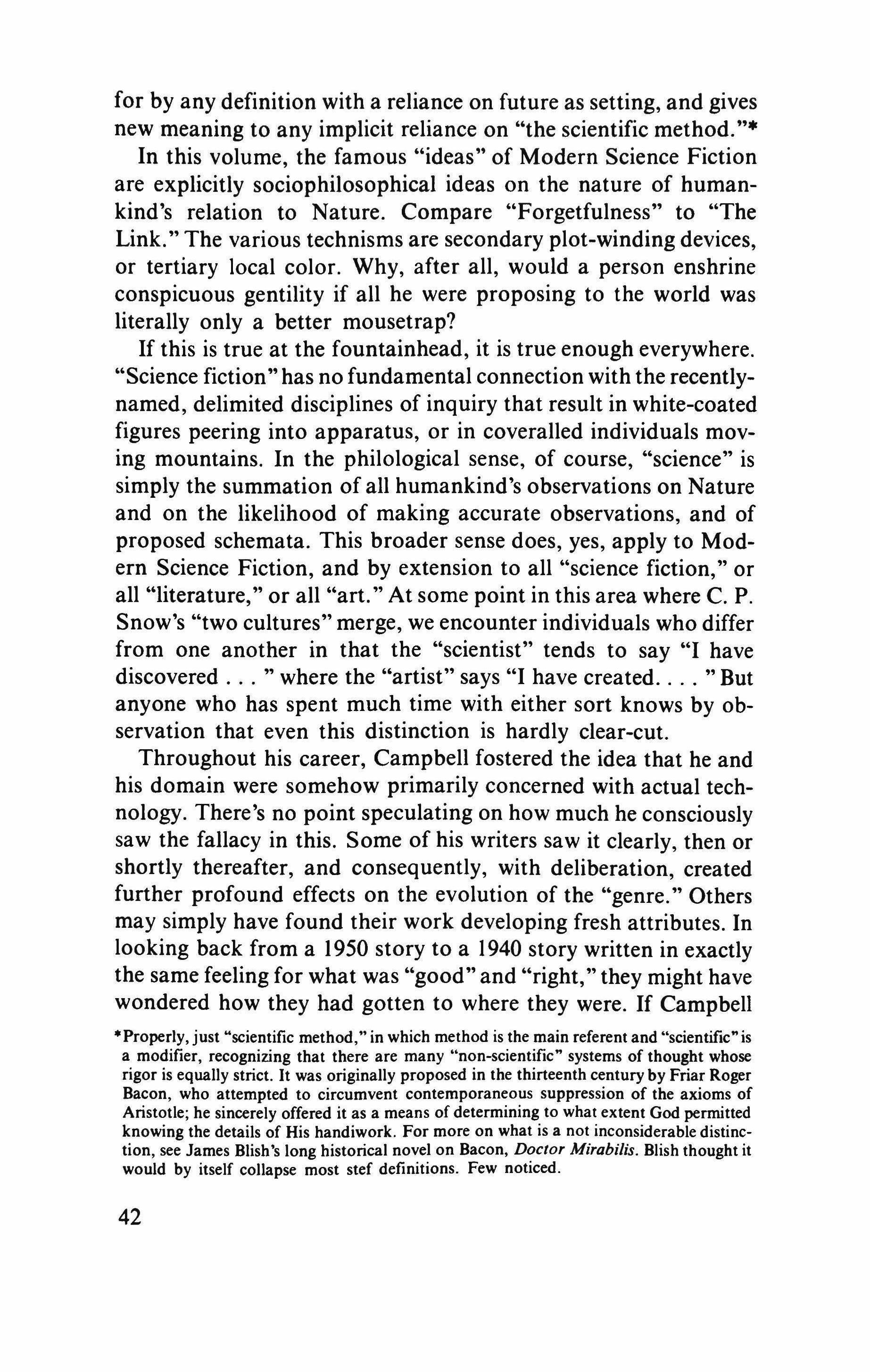
for by any definition with a reliance on future as setting, and gives new meaning to any implicit reliance on "the scientific method. ,,*
In this volume, the famous "ideas" of Modern Science Fiction are explicitly sociophilosophical ideas on the nature of humankind's relation to Nature. Compare "Forgetfulness" to "The Link." The various technisms are secondary plot-winding devices, or tertiary local color. Why, after all, would a person enshrine conspicuous gentility if all he were proposing to the world was literally only a better mousetrap?
If this is true at the fountainhead, it is true enough everywhere. "Science fiction" has no fundamental connection with the recentlynamed, delimited disciplines of inquiry that result in white-coated figures peering into apparatus, or in coveralled individuals moving mountains. In the philological sense, of course, "science" is simply the summation of all humankind's observations on Nature and on the likelihood of making accurate observations, and of proposed schemata. This broader sense does, yes, apply to Modern Science Fiction, and by extension to all "science fiction," or all "literature," or all "art." At some point in this area where C. P. Snow's "two cultures" merge, we encounter individuals who differ from one another in that the "scientist" tends to say "I have discovered where the "artist" says "I have created "But anyone who has spent much time with either sort knows by observation that even this distinction is hardly clear-cut.
Throughout his career, Campbell fostered the idea that he and his domain were somehow primarily concerned with actual technology. There's no point speculating on how much he consciously saw the fallacy in this. Some of his writers saw it clearly, then or shortly thereafter, and consequently, with deliberation, created further profound effects on the evolution of the "genre." Others may simply have found their work developing fresh attributes. In looking back from a 1950 story to a 1940 story written in exactly the same feeling for what was "good" and "right," they might have wondered how they had gotten to where they were. If Campbell
Properly, just "scientific method," in which method is the main referent and "scientific" is a modifier, recognizing that there are many "non-scientific" systems of thought whose rigor is equally strict. It was originally proposed in the thirteenth century by Friar Roger Bacon, who attempted to circumvent contemporaneous suppression of the axioms of Aristotle; he sincerely offered it as a means of determining to what extent God permitted knowing the details of His handiwork. For more on what is a not inconsiderable distinction, see James Blish's long historical novel on Bacon, Doctor Mirabilis. Blish thought it would by itself collapse most stef definitions. Few noticed.
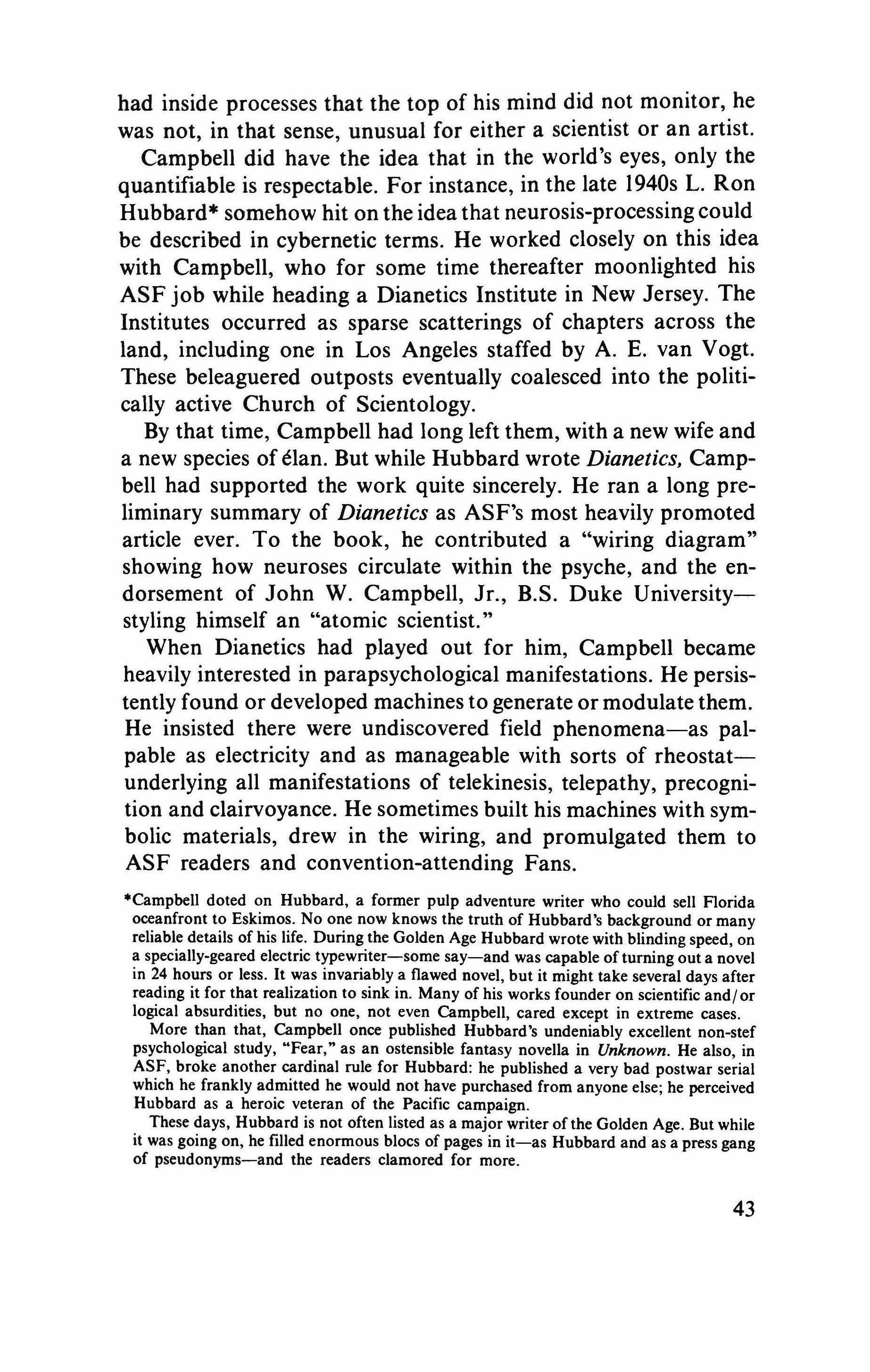
had inside processes that the top of his mind did not monitor, he was not in that sense unusual for either a scientist or an artist.
Campbell did have the idea that in the world's eyes, only the quantifiable is respectable. For instance, in the late 1940s L. Ron Hubbard* somehow hit on the idea that neurosis-processing could be described in cybernetic terms. He worked closely on this idea with Campbell, who for some time thereafter moonlighted his ASF job while heading a Dianetics Institute in New Jersey. The Institutes occurred as sparse scatterings of chapters across the land, including one in Los Angeles staffed by A. E. van Vogt. These beleaguered outposts eventually coalesced into the politically active Church of Scientology.
By that time, Campbell had long left them, with a new wife and a new species of elan. But while Hubbard wrote Dianetics, Campbell had supported the work quite sincerely. He ran a long preliminary summary of Dianetics as ASF's most heavily promoted article ever. To the book, he contributed a "wiring diagram" showing how neuroses circulate within the psyche, and the endorsement of John W. Campbell, Jr., B.S. Duke Universitystyling himself an "atomic scientist."
When Dianetics had played out for him, Campbell became heavily interested in parapsychological manifestations. He persistently found or developed machines to generate or modulate them. He insisted there were undiscovered field phenomena-as palpable as electricity and as manageable with sorts of rheostatunderlying all manifestations of telekinesis, telepathy, precognition and clairvoyance. He sometimes built his machines with symbolic materials, drew in the wiring, and promulgated them to ASF readers and convention-attending Fans.
*Campbell doted on Hubbard, a former pulp adventure writer who could sell Florida oceanfront to Eskimos. No one now knows the truth of Hubbard's background or many reliable details of his life. During the Golden Age Hubbard wrote with blinding speed, on a specially-geared electric typewriter-some say-and was capable of turning out a novel in 24 hours or less. It was invariably a flawed novel, but it might take several days after reading it for that realization to sink in. Many of his works founder on scientific and/ or logical absurdities, but no one, not even Campbell, cared except in extreme cases.
More than that, Campbell once published Hubbard's undeniably excellent non-stef psychological study, "Fear," as an ostensible fantasy novella in Unknown. He also, in ASF, broke another cardinal rule for Hubbard: he published a very bad postwar serial which he frankly admitted he would not have purchased from anyone else; he perceived Hubbard as a heroic veteran of the Pacific campaign.
These days, Hubbard is not often listed as a major writer of the Golden Age. But while it was going on, he filled enormous blocs of pages in it-as Hubbard and as a press gang of pseudonyms-and the readers clamored for more.
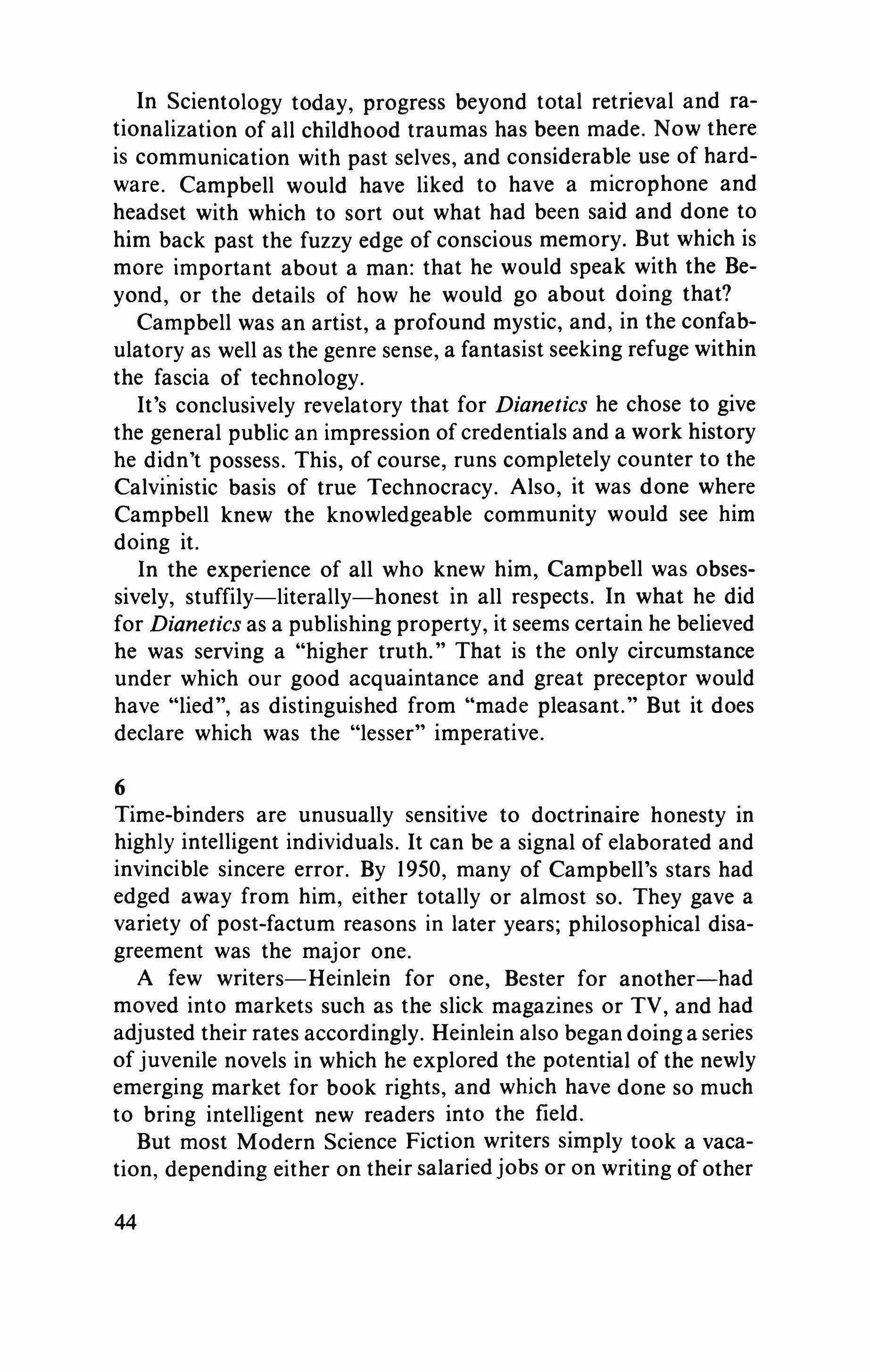
In Scientology today, progress beyond total retrieval and rationalization of all childhood traumas has been made. Now there is communication with past selves, and considerable use of hardware. Campbell would have liked to have a microphone and headset with which to sort out what had been said and done to him back past the fuzzy edge of conscious memory. But which is more important about a man: that he would speak with the Beyond, or the details of how he would go about doing that?
Campbell was an artist, a profound mystic, and, in the confabulatory as well as the genre sense, a fantasist seeking refuge within the fascia of technology.
It's conclusively revelatory that for Dianetics he chose to give the general public an impression of credentials and a work history he didn't possess. This, of course, runs completely counter to the Calvinistic basis of true Technocracy. Also, it was done where Campbell knew the knowledgeable community would see him doing it.
In the experience of all who knew him, Campbell was obsessively, stuffily-literally-honest in all respects. In what he did for Dianetics as a publishing property, it seems certain he believed he was serving a "higher truth." That is the only circumstance under which our good acquaintance and great preceptor would have "lied", as distinguished from "made pleasant." But it does declare which was the "lesser" imperative.
6
Time-binders are unusually sensitive to doctrinaire honesty in highly intelligent individuals. It can be a signal of elaborated and invincible sincere error. By 1950, many of Campbell's stars had edged away from him, either totally or almost so. They gave a variety of post-factum reasons in later years; philosophical disagreement was the major one.
A few writers-Heinlein for one, Bester for another-had moved into markets such as the slick magazines or TV, and had adjusted their rates accordingly. Heinlein also began doing a series of juvenile novels in which he explored the potential of the newly emerging market for book rights, and which have done so much to bring intelligent new readers into the field.
But most Modern Science Fiction writers simply took a vacation, depending either on their salaried jobs or on writing of other
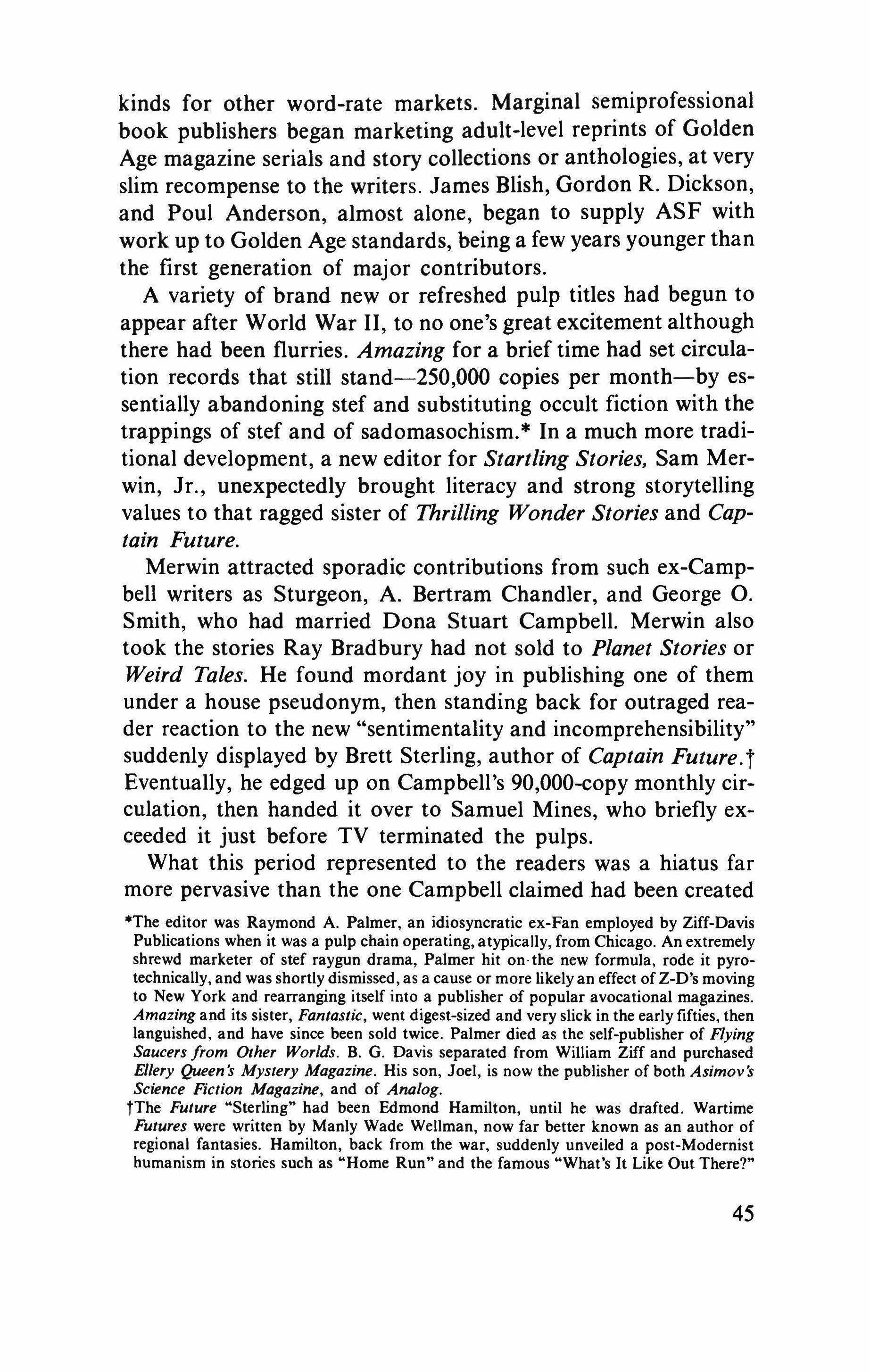
kinds for other word-rate markets. Marginal semiprofessional book publishers began marketing adult-level reprints of Golden Age magazine serials and story collections or anthologies, at very slim recompense to the writers. James Blish, Gordon R. Dickson, and Poul Anderson, almost alone, began to supply ASF with work up to Golden Age standards, being a few years younger than the first generation of major contributors.
A variety of brand new or refreshed pulp titles had begun to appear after World War II, to no one's great excitement although there had been flurries. Amazing for a brief time had set circulation records that still stand-250,OOO copies per month-by essentially abandoning stef and substituting occult fiction with the trappings of stef and of sadomasochism. * In a much more traditional development, a new editor for Startling Stories, Sam Merwin, Jr., unexpectedly brought literacy and strong storytelling values to that ragged sister of Thrilling Wonder Stories and Captain Future.
Merwin attracted sporadic contributions from such ex-Campbell writers as Sturgeon, A. Bertram Chandler, and George o. Smith, who had married Dona Stuart Campbell. Merwin also took the stories Ray Bradbury had not sold to Planet Stories or Weird Tales. He found mordant joy in publishing one of them under a house pseudonym, then standing back for outraged reader reaction to the new "sentimentality and incomprehensibility" suddenly displayed by Brett Sterling, author of Captain Future.t Eventually, he edged up on Campbell's 90,OOO-copy monthly circulation, then handed it over to Samuel Mines, who briefly exceeded it just before TV terminated the pulps.
What this period represented to the readers was a hiatus far more pervasive than the one Campbell claimed had been created
*The editor was Raymond A. Palmer, an idiosyncratic ex-Fan employed by Ziff-Davis Publications when it was a pulp chain operating, atypically, from Chicago. An extremely shrewd marketer of stef raygun drama, Palmer hit on the new formula, rode it pyrotechnically, and was shortly dismissed, as a cause or more likely an effect of Z-D's moving to New York and rearranging itself into a publisher of popular avocational magazines. Amazing and its sister, Fantastic, went digest-sized and very slick in the early fifties, then languished, and have since been sold twice. Palmer died as the self-publisher of Flying Saucers from Other Worlds. B. G. Davis separated from William Ziff and purchased Ellery Queen's Mystery Magazine. His son, Joel, is now the publisher of both Asimov's Science Fiction Magazine, and of Analog.
[The Future "Sterling" had been Edmond Hamilton, until he was drafted. Wartime Futures were written by Manly Wade Wellman, now far better known as an author of regional fantasies. Hamilton, back from the war, suddenly unveiled a post-Modernist humanism in stories such as "Home Run" and the famous "What's It Like Out There?"
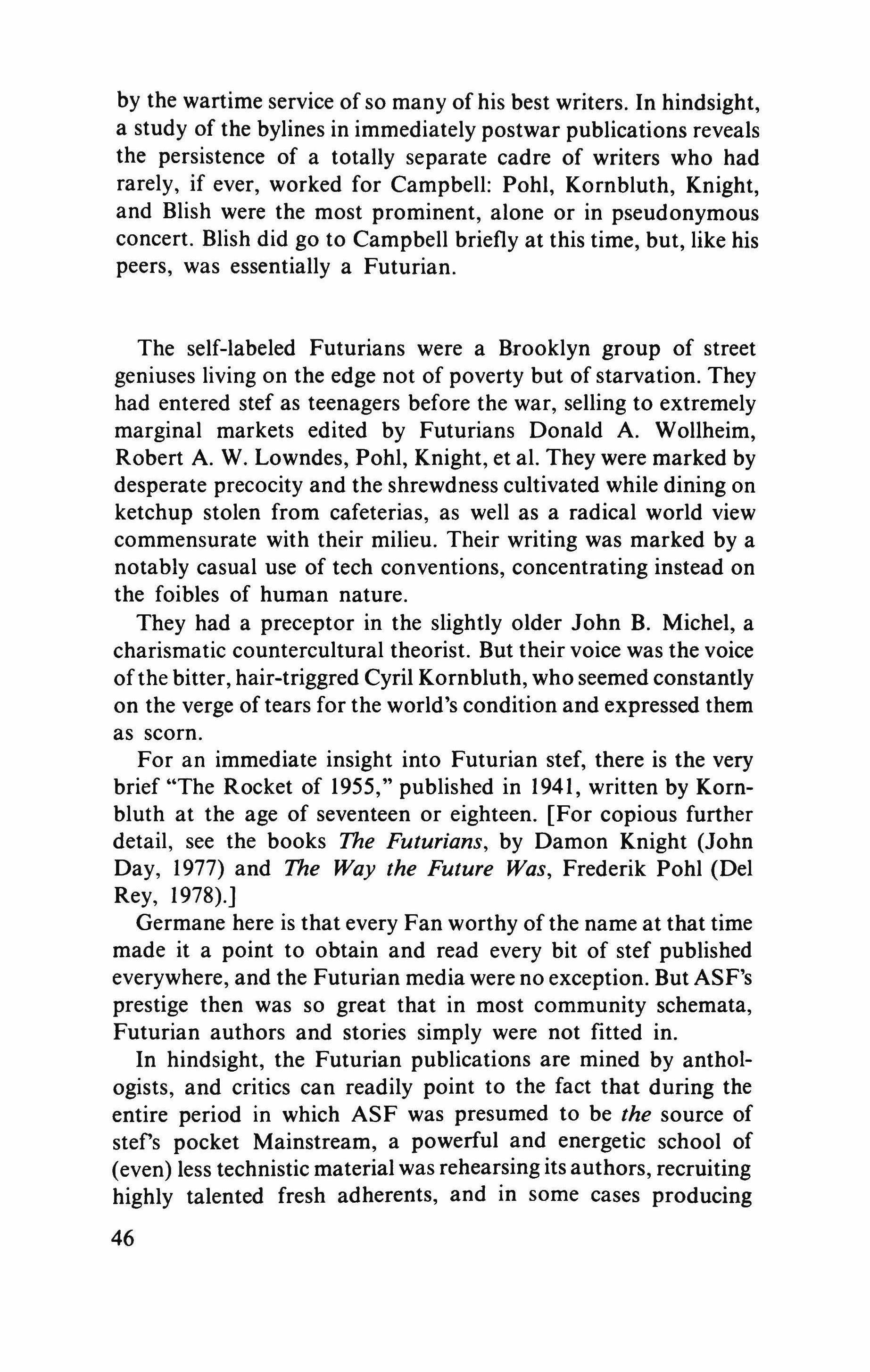
by the wartime service of so many of his best writers. In hindsight, a study of the bylines in immediately postwar publications reveals the persistence of a totally separate cadre of writers who had rarely, if ever, worked for Campbell: Pohl, Kornbluth, Knight, and Blish were the most prominent, alone or in pseudonymous concert. Blish did go to Campbell briefly at this time, but, like his peers, was essentially a Futurian.
The self-labeled Futurians were a Brooklyn group of street geniuses living on the edge not of poverty but of starvation. They had entered stef as teenagers before the war, selling to extremely marginal markets edited by Futurians Donald A. Wollheim, Robert A. W. Lowndes, Pohl, Knight, et al. They were marked by desperate precocity and the shrewdness cultivated while dining on ketchup stolen from cafeterias, as well as a radical world view commensurate with their milieu. Their writing was marked by a notably casual use of tech conventions, concentrating instead on the foibles of human nature.
They had a preceptor in the slightly older John B. Michel, a charismatic countercultural theorist. But their voice was the voice ofthe bitter, hair-triggred Cyril Kornbluth, who seemed constantly on the verge of tears for the world's condition and expressed them as scorn.
For an immediate insight into Futurian stef, there is the very brief "The Rocket of 1955," published in 1941, written by Kornbluth at the age of seventeen or eighteen. [For copious further detail, see the books The Futurians, by Damon Knight (John Day, 1977) and The Way the Future Was, Frederik Pohl (Del Rey, 1978).J
Germane here is that every Fan worthy of the name at that time made it a point to obtain and read every bit of stef published everywhere, and the Futurian media were no exception. But ASF's prestige then was so great that in most community schemata, Futurian authors and stories simply were not fitted in.
In hindsight, the Futurian publications are mined by anthologists, and critics can readily point to the fact that during the entire period in which ASF was presumed to be the source of stef's pocket Mainstream, a powerful and energetic school of (even) less technistic material was rehearsing its authors, recruiting highly talented fresh adherents, and in some cases producing

finished work fully as effective as anything on the market. These were, furthermore, frank intellectuals, who were broadly conversant with the entire domain of the arts, widely read considering the circumstances, and prized intellectuality as ASF's writers ostensibly or actually did not.
In 1949 the first noteworthy tap into this potential occurred with the publication of The Magazine ofFantasy, which with its second issue became The Magazine of Fantasy and Science Fiction.
F&SF was then a sister to Ellery Queen's Mystery Magazine, and thus cousin to the American Mercury, formerly edited by H. L. Mencken, latterly by Wiliam Bradford Huie. It consequently was stef's first entree into the market for American intellectual diversionary fiction, quickly picking up the back-cover endorsements of Book-of-the-Month Club editor Basil Davenport, of Spring Byington, doyenne of the Hollywood intellectual establishment, of Hugo Gernsback(!), and of Mortimer Adler. It published poetry, cartoons, and spot art but no illustrations, used page-width columns, and for its fiction displayed a mix of "classic" reprints by "Mainstream" short story writers and very similarly oriented new pieces by stef names.
The readership was also mixed. Some readers were amenable individuals already within the existing stef magazine pool. Others were the sort of people who will read Huxley, Wells, Stapledon, and perhaps Franz Werfel's Book-of-the-Month-Club selection Star ofthe Unborn, but would never crack the pages of something called Astounding to find Leiber's Destiny Times Three or Catherine Moore's "NoWoman Born."
The editors were J. Francis McComas and Anthony Boucher. Boucher had been a significant contributor to Unknown. A few of his stories had appeared in ASF. He was more at home in the milieu of the Agatha Christie school of 'tec fiction, and showed a predilection for the intellectual jape-the charming, rather than the powerful. In 1942, under a pseudonym, * H. H. Holmes, he had published a roman a clef called Rocket to the Morgue, a straight-line detection novel, whose cast featured lightly disguised Modern Science Fiction writers, as writers of this interesting new ·"Boucher" was actually one of the scores of people named White who abound in popular and semipopular literature of the twentieth century. (If something began the 1900s by collecting Ambroses, to cite Charles Fort, did something then begin producing Whites?) In the case of our William Anthony Parker White, "Boucher" was more a nom de guerre than a true pseudonym.
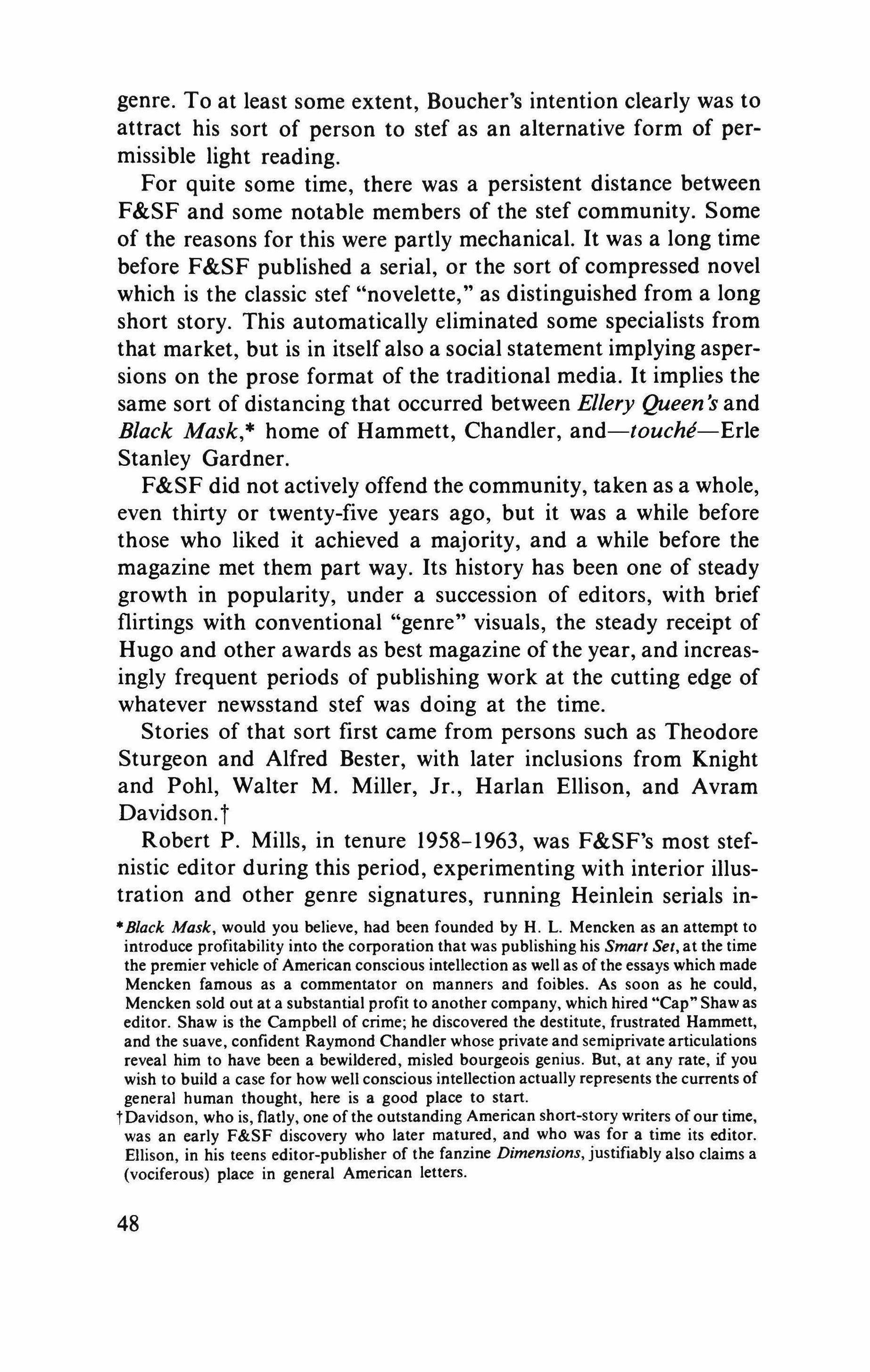
genre. To at least some extent, Boucher's intention clearly was to attract his sort of person to stef as an alternative form of permissible light reading.
For quite some time, there was a persistent distance between F&SF and some notable members of the stef community. Some of the reasons for this were partly mechanical. It was a long time before F&SF published a serial, or the sort of compressed novel which is the classic stef "novelette," as distinguished from a long short story. This automatically eliminated some specialists from that market, but is in itself also a social statement implying aspersions on the prose format of the traditional media. It implies the same sort of distancing that occurred between Ellery Queen sand Black Mask,* home of Hammett, Chandler, and-fouche-ErIe Stanley Gardner.
F&SF did not actively offend the community, taken as a whole, even thirty or twenty-five years ago, but it was a while before those who liked it achieved a majority, and a while before the magazine met them part way. Its history has been one of steady growth in popularity, under a succession of editors, with brief flirtings with conventional "genre" visuals, the steady receipt of Hugo and other awards as best magazine of the year, and increasingly frequent periods of publishing work at the cutting edge of whatever newsstand stef was doing at the time.
Stories of that sort first came from persons such as Theodore Sturgeon and Alfred Bester, with later inclusions from Knight and Pohl, Walter M. Miller, Jr., Harlan Ellison, and Avram Davidson.]
Robert P. Mills, in tenure 1958-1963, was F&SF's most stefnistic editor during this period, experimenting with interior illustration and other genre signatures, running Heinlein serials in*Black Mask, would you believe, had been founded by H. L. Mencken as an attempt to introduce profitability into the corporation that was publishing his Smart Set, at the time the premier vehicle of American conscious intellection as well as of the essays which made Mencken famous as a commentator on manners and foibles. As soon as he could, Mencken sold out at a substantial profit to another company, which hired "Cap" Shaw as editor. Shaw is the Campbell of crime; he discovered the destitute, frustrated Hammett, and the suave, confident Raymond Chandler whose private and semiprivate articulations reveal him to have been a bewildered, misled bourgeois genius. But, at any rate, if you wish to build a case for how well conscious intellection actually represents the currents of general human thought, here is a good place to start. tDavidson, who is, flatly, one of the outstanding American short-story writers of our time, was an early F&SF discovery who later matured, and who was for a time its editor. Ellison, in his teens editor-publisher of the fanzine Dimensions, justifiably also claims a (vociferous) place in general American letters.
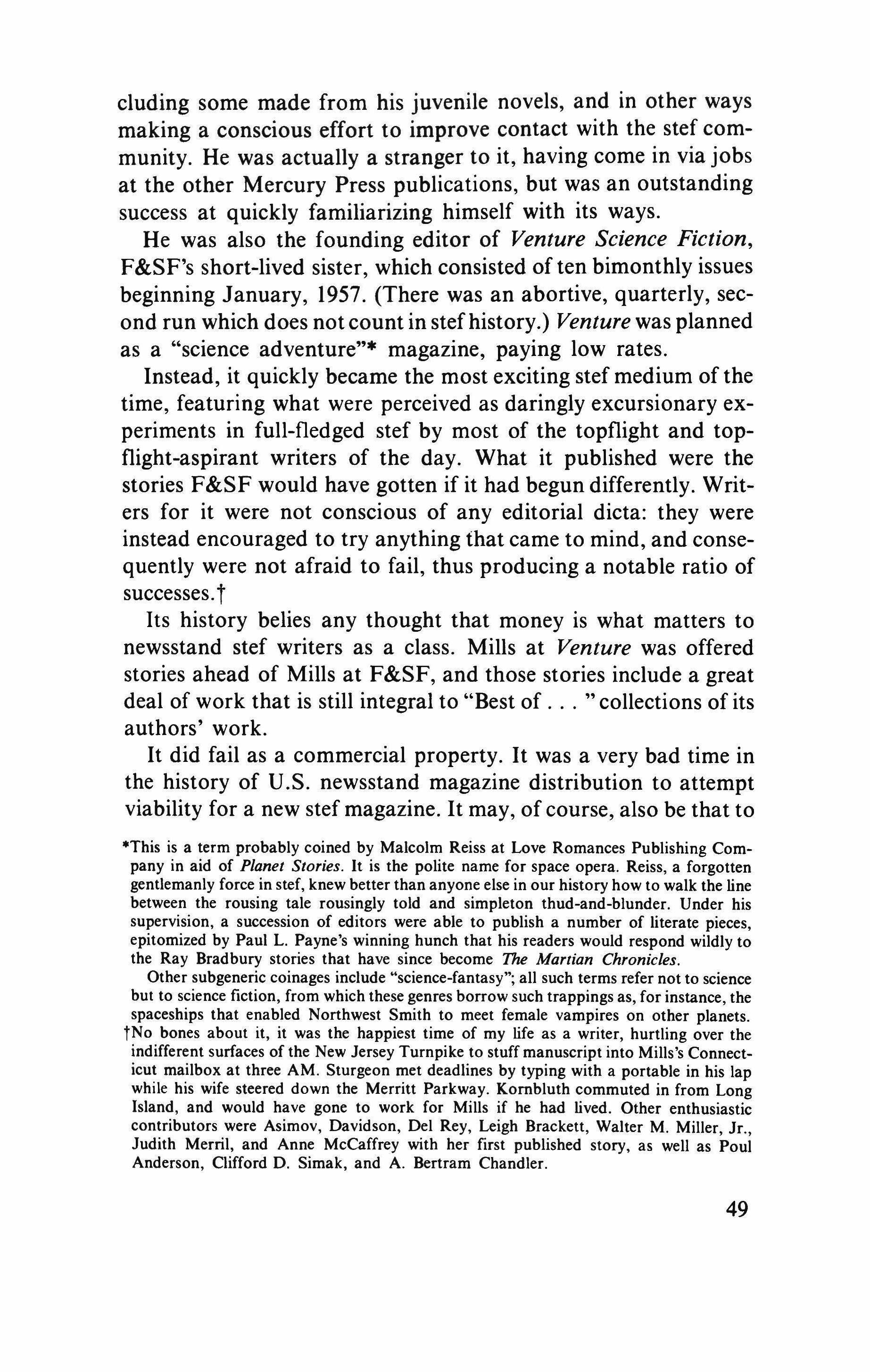
eluding some made from his juvenile novels, and in other ways making a conscious effort to improve contact with the stef community. He was actually a stranger to it, having come in via jobs at the other Mercury Press publications, but was an outstanding success at quickly familiarizing himself with its ways.
He was also the founding editor of Venture Science Fiction, F&SF's short-lived sister, which consisted of ten bimonthly issues beginning January, 1957. (There was an abortive, quarterly, second run which does not count in stefhistory.) Venture was planned as a "science adventure't" magazine, paying low rates.
Instead, it quickly became the most exciting stef medium of the time, featuring what were perceived as daringly excursionary experiments in full-fledged stef by most of the topflight and topflight-aspirant writers of the day. What it published were the stories F&SF would have gotten if it had begun differently. Writers for it were not conscious of any editorial dicta: they were instead encouraged to try anything that came to mind, and consequently were not afraid to fail, thus producing a notable ratio of successes. t
Its history belies any thought that money is what matters to newsstand stef writers as a class. Mills at Venture was offered stories ahead of Mills at F&SF, and those stories include a great deal of work that is still integral to "Best of "collections of its authors' work.
It did fail as a commercial property. It was a very bad time in the history of U.S. newsstand magazine distribution to attempt viability for a new stef magazine. It may, of course, also be that to
·This is a term probably coined by Malcolm Reiss at Love Romances Publishing Company in aid of Planet Stories. It is the polite name for space opera. Reiss, a forgotten gentlemanly force in stef, knew better than anyone else in our history how to walk the line between the rousing tale rousingly told and simpleton thud-and-blunder. Under his supervision, a succession of editors were able to publish a number of literate pieces, epitomized by Paul L. Payne's winning hunch that his readers would respond wildly to the Ray Bradbury stories that have since become The Martian Chronicles.
Other subgeneric coinages include "science-fantasy"; all such terms refer not to science but to science fiction, from which these genres borrow such trappings as, for instance, the spaceships that enabled Northwest Smith to meet female vampires on other planets. [No bones about it, it was the happiest time of my life as a writer, hurtling over the indifferent surfaces of the New Jersey Turnpike to stuff manuscript into Mills's Connecticut mailbox at three AM. Sturgeon met deadlines by typing with a portable in his lap while his wife steered down the Merritt Parkway. Kornbluth commuted in from Long Island, and would have gone to work for Mills if he had lived. Other enthusiastic contributors were Asimov, Davidson, Del Rey, Leigh Brackett, Walter M. Miller, Jr., Judith Merril, and Anne McCaffrey with her first published story, as well as Poul Anderson, Clifford D. Simak, and A. Bertram Chandler.
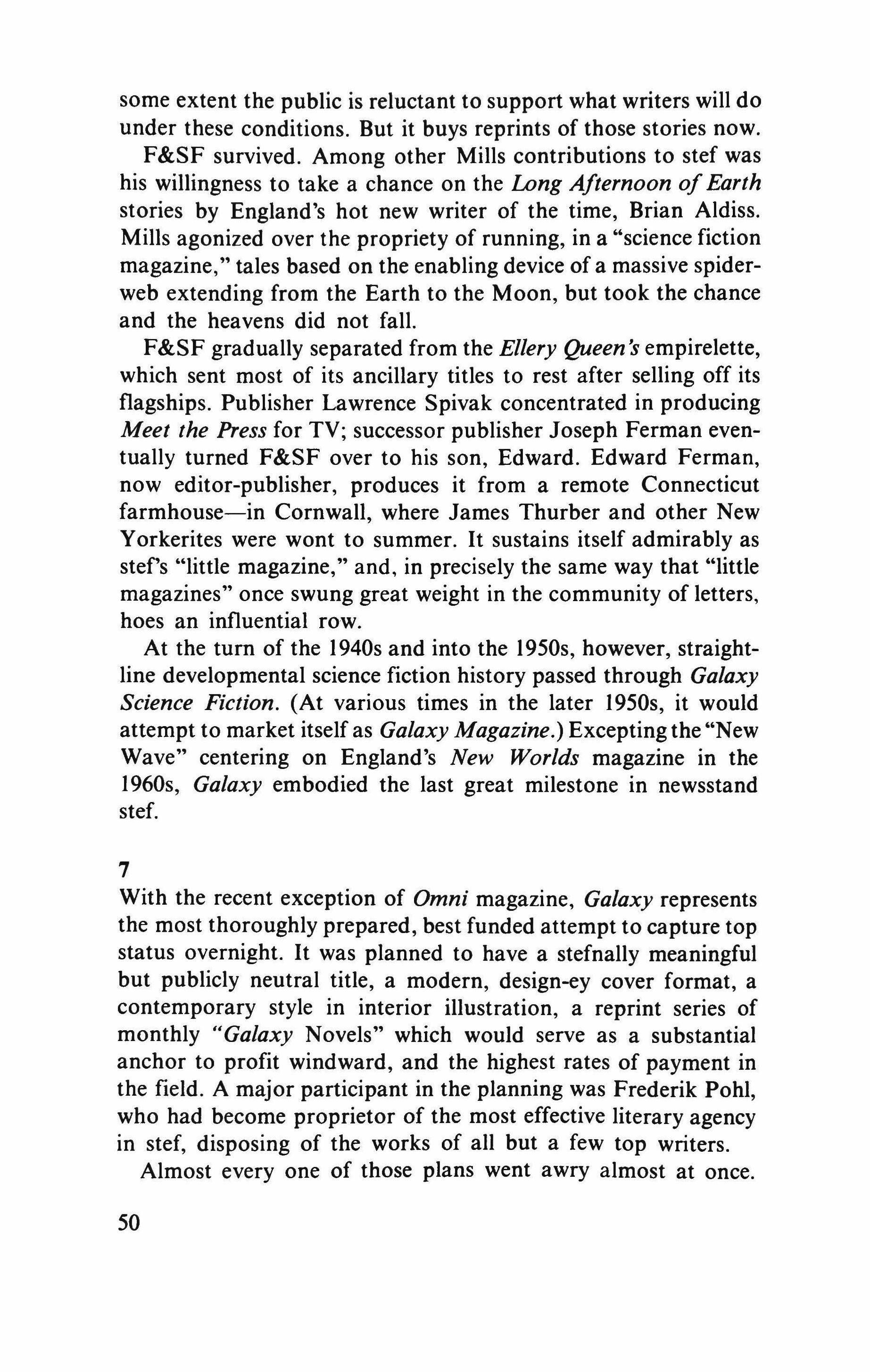
some extent the public is reluctant to support what writers will do under these conditions. But it buys reprints of those stories now.
F&SF survived. Among other Mills contributions to stef was his willingness to take a chance on the Long Afternoon ofEarth stories by England's hot new writer of the time, Brian Aldiss. Mills agonized over the propriety of running, in a "science fiction magazine," tales based on the enabling device of a massive spiderweb extending from the Earth to the Moon, but took the chance and the heavens did not fall.
F&SF gradually separated from the Ellery Queen s empirelette, which sent most of its ancillary titles to rest after selling off its flagships. Publisher Lawrence Spivak concentrated in producing Meet the Press for TV; successor publisher Joseph Ferman eventually turned F&SF over to his son, Edward. Edward Ferman, now editor-publisher, produces it from a remote Connecticut farmhouse-in Cornwall, where James Thurber and other New Yorkerites were wont to summer. It sustains itself admirably as stef's "little magazine," and, in precisely the same way that "little magazines" once swung great weight in the community of letters, hoes an influential row.
At the turn of the 1940s and into the 1950s, however, straightline developmental science fiction history passed through Galaxy Science Fiction. (At various times in the later 1950s, it would attempt to market itself as Galaxy Magazine.) Excepting the "New Wave" centering on England's New Worlds magazine in the 1960s, Galaxy embodied the last great milestone in newsstand stef.
7
With the recent exception of Omni magazine, Galaxy represents the most thoroughly prepared, best funded attempt to capture top status overnight. It was planned to have a stefnally meaningful but publicly neutral title, a modern, design-ey cover format, a contemporary style in interior illustration, a reprint series of monthly "Galaxy Novels" which would serve as a substantial anchor to profit windward, and the highest rates of payment in the field. A major participant in the planning was Frederik Pohl, who had become proprietor of the most effective literary agency in stef, disposing of the works of all but a few top writers. Almost everyone of those plans went awry almost at once.
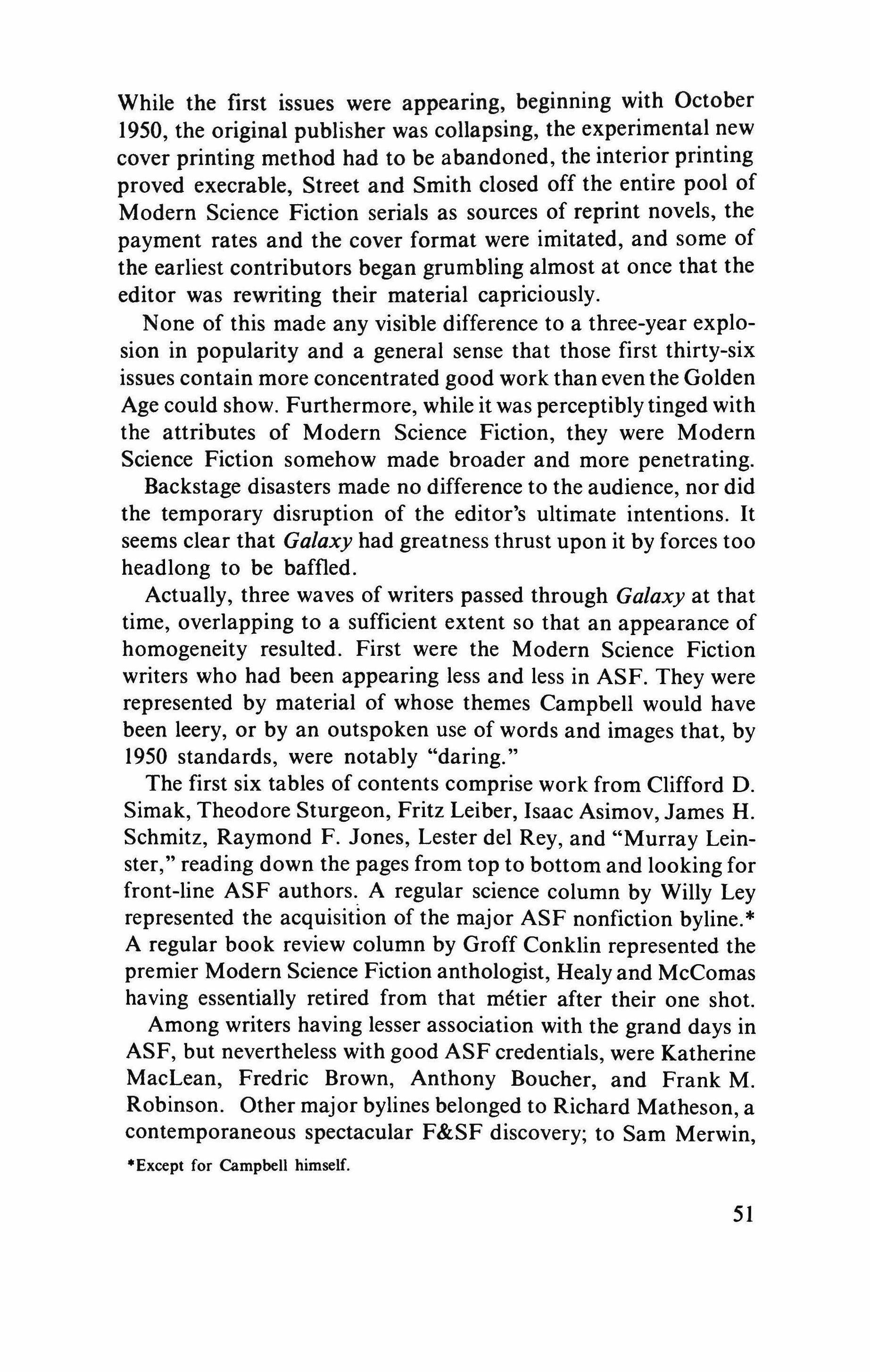
While the first issues were appearing, beginning with October 1950, the original publisher was collapsing, the experimental new cover printing method had to be abandoned, the interior printing proved execrable, Street and Smith closed off the entire pool of Modern Science Fiction serials as sources of reprint novels, the payment rates and the cover format were imitated, and some of the earliest contributors began grumbling almost at once that the editor was rewriting their material capriciously.
None of this made any visible difference to a three-year explosion in popularity and a general sense that those first thirty-six issues contain more concentrated good work than even the Golden Age could show. Furthermore, while it was perceptiblytinged with the attributes of Modern Science Fiction, they were Modern Science Fiction somehow made broader and more penetrating.
Backstage disasters made no difference to the audience, nor did the temporary disruption of the editor's ultimate intentions. It seems clear that Galaxy had greatness thrust upon it by forces too headlong to be baffled.
Actually, three waves of writers passed through Galaxy at that time, overlapping to a sufficient extent so that an appearance of homogeneity resulted. First were the Modern Science Fiction writers who had been appearing less and less in ASF. They were represented by material of whose themes Campbell would have been leery, or by an outspoken use of words and images that, by 1950 standards, were notably "daring."
The first six tables of contents comprise work from Clifford D. Simak, Theodore Sturgeon, Fritz Leiber, Isaac Asimov, James H. Schmitz, Raymond F. Jones, Lester del Rey, and "Murray Leinster," reading down the pages from top to bottom and looking for front-line ASF authors. A regular science column by Willy Ley represented the acquisition of the major ASF nonfiction byline. * A regular book review column by Groff Conklin represented the premier Modern Science Fiction anthologist, Healy and McComas having essentially retired from that metier after their one shot. Among writers having lesser association with the grand days in ASF, but nevertheless with good ASF credentials, were Katherine MacLean, Fredric Brown, Anthony Boucher, and Frank M. Robinson. Other major bylines belonged to Richard Matheson, a contemporaneous spectacular F&SF discovery; to Sam Merwin, -Except for Campbell himself.
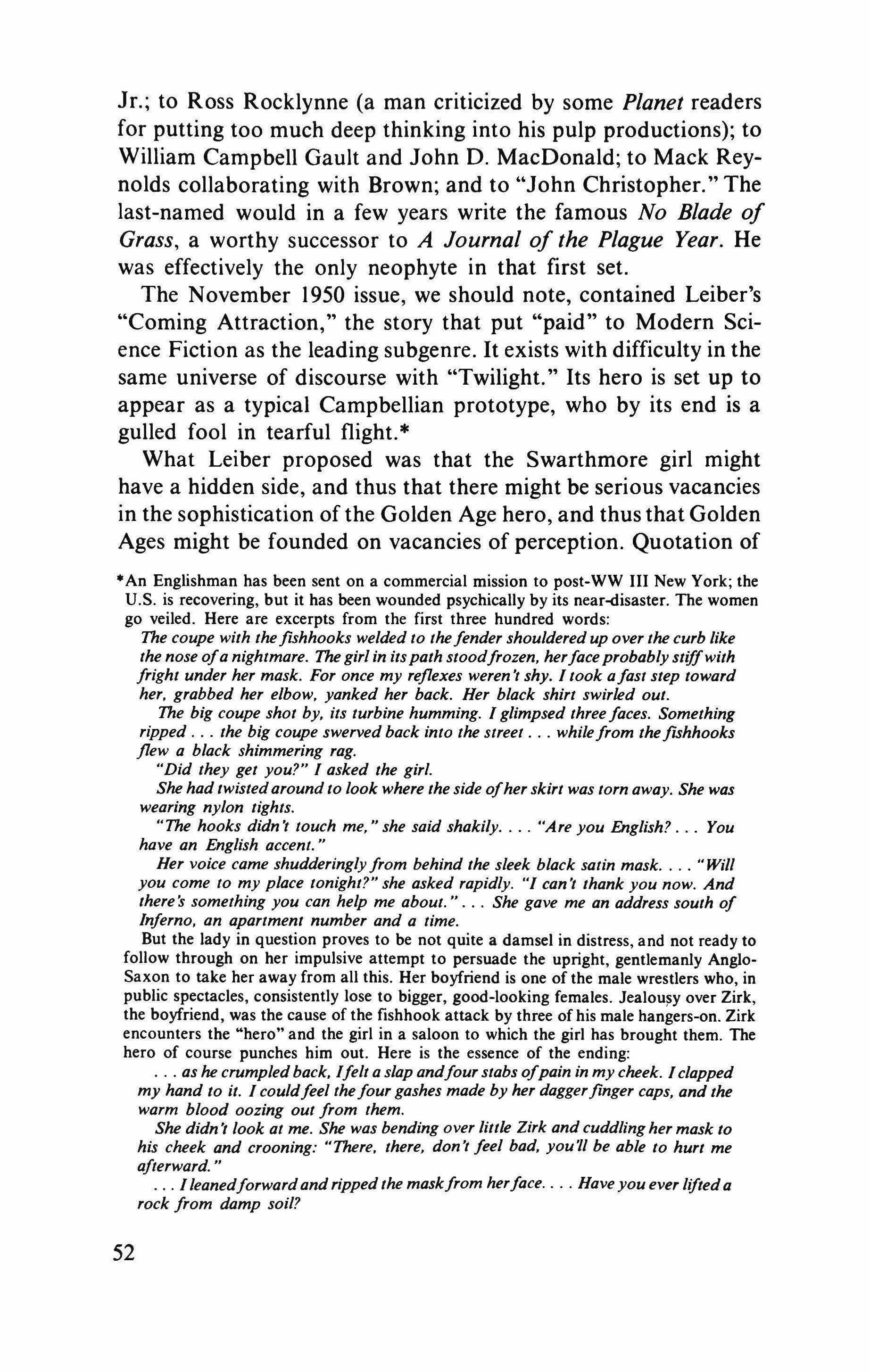
Jr.; to Ross Rocklynne (a man criticized by some Planet readers for putting too much deep thinking into his pulp productions); to William Campbell Gault and John D. MacDonald; to Mack Reynolds collaborating with Brown; and to "John Christopher." The last-named would in a few years write the famous No Blade of Grass, a worthy successor to A Journal of the Plague Year. He was effectively the only neophyte in that first set.
The November 1950 issue, we should note, contained Leiber's "Coming Attraction," the story that put "paid" to Modern Science Fiction as the leading subgenre. It exists with difficulty in the same universe of discourse with "Twilight." Its hero is set up to appear as a typical Campbellian prototype, who by its end is a gulled fool in tearful flight. *
What Leiber proposed was that the Swarthmore girl might have a hidden side, and thus that there might be serious vacancies in the sophistication of the Golden Age hero, and thus that Golden Ages might be founded on vacancies of perception. Quotation of
*An Englishman has been sent on a commercial mission to post-WW III New York; the U.S. is recovering, but it has been wounded psychically by its near-disaster. The women go veiled. Here are excerpts from the first three hundred words: The coupe with thefishhooks welded to thefender shouldered up over the curb like the nose ofa nightmare. The girl in itspath stoodfrozen, herfaceprobably stiffwith fright under her mask. For once my reflexes weren't shy. I took afast step toward her, grabbed her elbow, yanked her back. Her black shirt swirled out.
The big coupe shot by, its turbine humming. I glimpsed threefaces. Something ripped the big coupe swerved back into the street whilefrom thefishhooks flew a black shimmering rag.
"Did they get you?" I asked the girl.
She had twistedaround to look where the side ofher skirt was torn away. She was wearing nylon tights.
"The hooks didn't touch me," she said shakily "Are you English? You have an English accent."
Her voice came shudderinglyfrom behind the sleek black satin mask "Will you come to my place tonight?" she asked rapidly. "I can't thank you now. And there's something you can help me about." She gave me an address south of Inferno, an apartment number and a time.
But the lady in question proves to be not quite a damsel in distress, and not ready to follow through on her impulsive attempt to persuade the upright, gentlemanly AngloSaxon to take her away from all this. Her boyfriend is one of the male wrestlers who, in public spectacles, consistently lose to bigger, good-looking females. Jealousy over Zirk, the boyfriend, was the cause of the fishhook attack by three of his male hangers-on. Zirk encounters the "hero" and the girl in a saloon to which the girl has brought them. The hero of course punches him out. Here is the essence of the ending: as he crumpled back, Ifelt a slap andfour stabs ofpain in my cheek. Iclapped my hand to it. I couldfeel thefourgashes made by her daggerfinger caps, and the warm blood oozing out from them.
She didn � look at me. She was bending over little Zirk and cuddling her mask to his cheek and crooning: "There, there, don't feel bad, you'll be able to hurt me afterward.
Ileanedforwardand ripped the maskfrom herface Have you ever lifted a rock from damp soil?
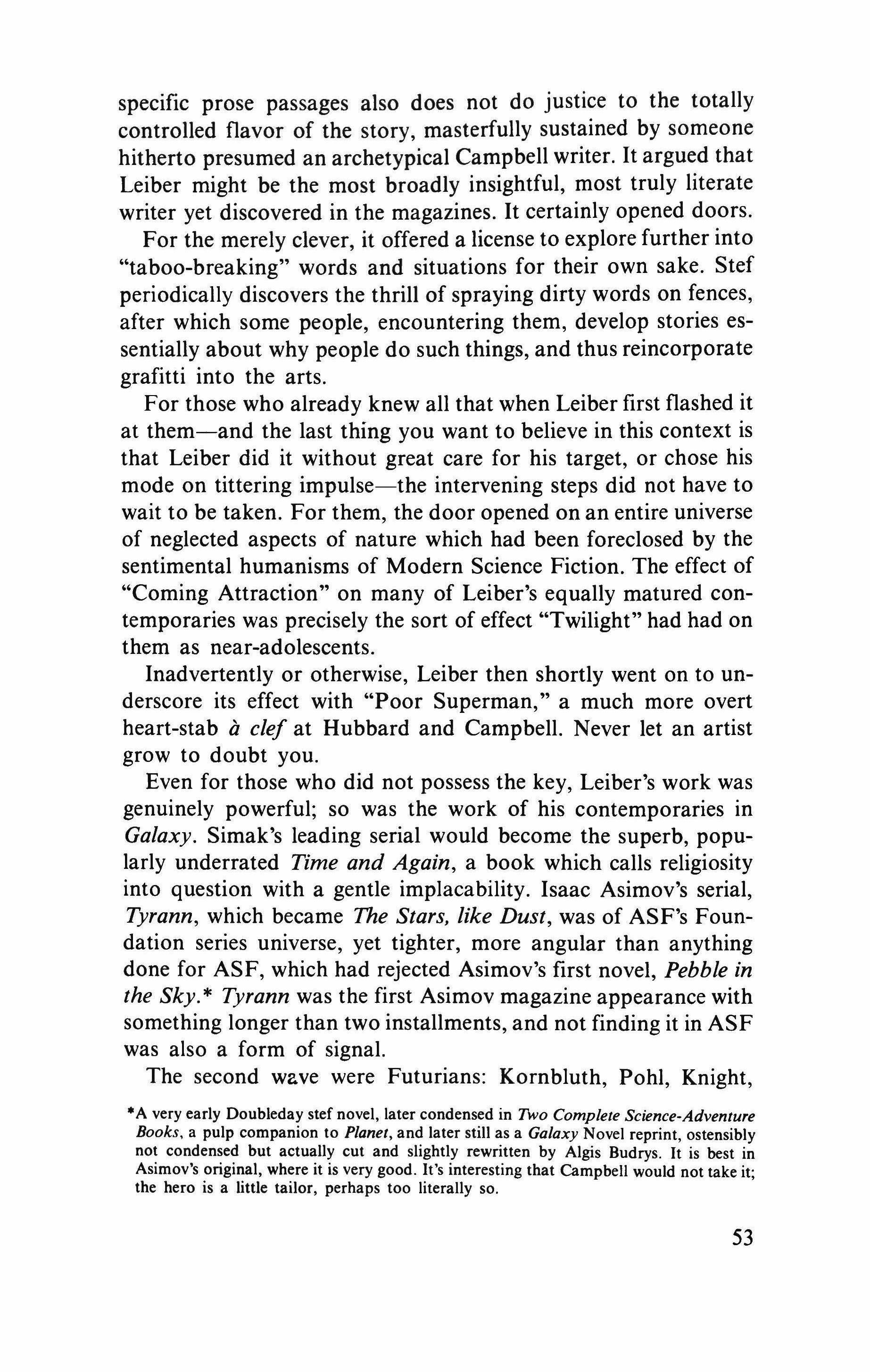
specific prose passages also does not do justice to the totally controlled flavor of the story, masterfully sustained by someone hitherto presumed an archetypical Campbell writer. It argued that Leiber might be the most broadly insightful, most truly literate writer yet discovered in the magazines. It certainly opened doors.
For the merely clever, it offered a license to explore further into "taboo-breaking" words and situations for their own sake. Stef periodically discovers the thrill of spraying dirty words on fences, after which some people, encountering them, develop stories essentially about why people do such things, and thus reincorporate grafitti into the arts.
For those who already knew all that when Leiber first flashed it at them-and the last thing you want to believe in this context is that Leiber did it without great care for his target, or chose his mode on tittering impulse-the intervening steps did not have to wait to be taken. For them, the door opened on an entire universe of neglected aspects of nature which had been foreclosed by the sentimental humanisms of Modern Science Fiction. The effect of "Coming Attraction" on many of Leiber's equally matured contemporaries was precisely the sort of effect "Twilight" had had on them as near-adolescents.
Inadvertently or otherwise, Leiber then shortly went on to underscore its effect with "Poor Superman," a much more overt heart-stab a clef at Hubbard and Campbell. Never let an artist grow to doubt you.
Even for those who did not possess the key, Leiber's work was genuinely powerful; so was the work of his contemporaries in Galaxy. Simak's leading serial would become the superb, popularly underrated Time and Again, a book which calls religiosity into question with a gentle implacability. Isaac Asimov's serial, Tyrann, which became The Stars, like Dust, was of ASF's Foundation series universe, yet tighter, more angular than anything done for ASF, which had rejected Asimov's first novel, Pebble in the Sky. * Tyrann was the first Asimov magazine appearance with something longer than two installments, and not finding it in ASF was also a form of signal.
The second wave were Futurians: Kornbluth, Pohl, Knight,
A very early Doubleday stef novel, later condensed in Two Complete Science-Adventure Books, a pulp companion to Planet, and later still as a Galaxy Novel reprint, ostensibly not condensed but actually cut and slightly rewritten by Algis Budrys. It is best in Asimov's original, where it is very good. It's interesting that Campbell would not take it; the hero is a little tailor, perhaps too literally so.
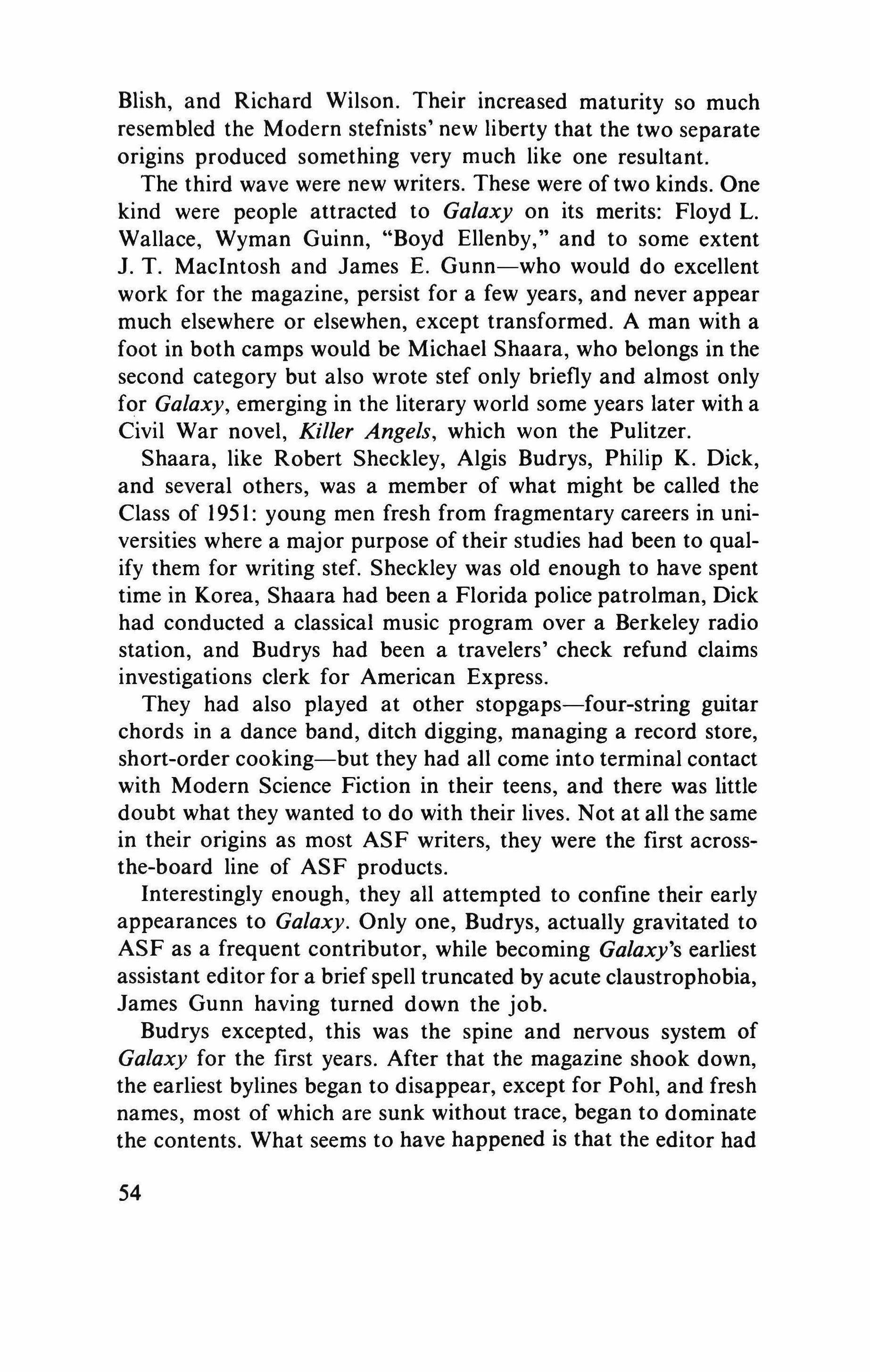
Blish, and Richard Wilson. Their increased maturity so much resembled the Modern stefnists' new liberty that the two separate origins produced something very much like one resultant.
The third wave were new writers. These were of two kinds. One kind were people attracted to Galaxy on its merits: Floyd L. Wallace, Wyman Guinn, "Boyd Ellenby," and to some extent J. T. MacIntosh and James E. Gunn-who would do excellent work for the magazine, persist for a few years, and never appear much elsewhere or elsewhen, except transformed. A man with a foot in both camps would be Michael Shaara, who belongs in the second category but also wrote stef only briefly and almost only for Galaxy, emerging in the literary world some years later with a Civil War novel, Killer Angels, which won the Pulitzer.
Shaara, like Robert Sheckley, Algis Budrys, Philip K. Dick, and several others, was a member of what might be called the Class of 1951: young men fresh from fragmentary careers in universities where a major purpose of their studies had been to qualify them for writing stef. Sheckley was old enough to have spent time in Korea, Shaara had been a Florida police patrolman, Dick had conducted a classical music program over a Berkeley radio station, and Budrys had been a travelers' check refund claims investigations clerk for American Express.
They had also played at other stopgaps-four-string guitar chords in a dance band, ditch digging, managing a record store, short-order cooking-but they had all come into terminal contact with Modern Science Fiction in their teens, and there was little doubt what they wanted to do with their lives. Not at all the same in their origins as most ASF writers, they were the first acrossthe-board line of ASF products.
Interestingly enough, they all attempted to confine their early appearances to Galaxy. Only one, Budrys, actually gravitated to ASF as a frequent contributor, while becoming Galaxy'S earliest assistant editor for a brief spell truncated by acute claustrophobia, James Gunn having turned down the job.
Budrys excepted, this was the spine and nervous system of Galaxy for the first years. After that the magazine shook down, the earliest bylines began to disappear, except for Pohl, and fresh names, most of which are sunk without trace, began to dominate the contents. What seems to have happened is that the editor had
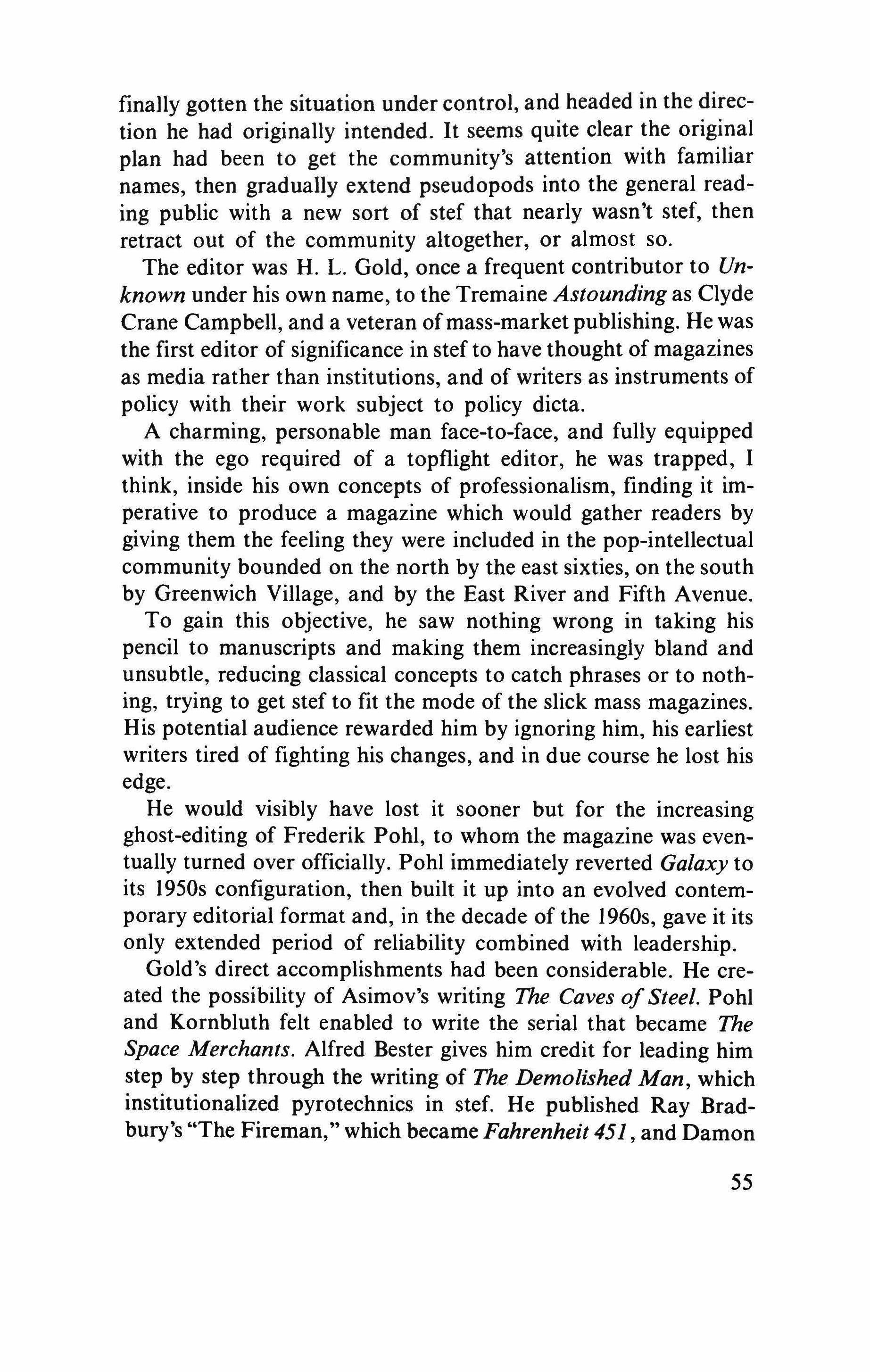
finally gotten the situation under control, and headed in the direction he had originally intended. It seems quite clear the original plan had been to get the community's attention with familiar names, then gradually extend pseudopods into the general reading public with a new sort of stef that nearly wasn't stef, then retract out of the community altogether, or almost so.
The editor was H. L. Gold, once a frequent contributor to Unknown under his own name, to the Tremaine Astounding as Clyde Crane Campbell, and a veteran ofmass-market publishing, He was the first editor of significance in stef to have thought of magazines as media rather than institutions, and of writers as instruments of policy with their work subject to policy dicta.
A charming, personable man face-to-face, and fully equipped with the ego required of a topflight editor, he was trapped, I think, inside his own concepts of professionalism, finding it imperative to produce a magazine which would gather readers by giving them the feeling they were included in the pop-intellectual community bounded on the north by the east sixties, on the south by Greenwich Village, and by the East River and Fifth Avenue.
To gain this objective, he saw nothing wrong in taking his pencil to manuscripts and making them increasingly bland and unsubtle, reducing classical concepts to catch phrases or to nothing, trying to get stef to fit the mode of the slick mass magazines. His potential audience rewarded him by ignoring him, his earliest writers tired of fighting his changes, and in due course he lost his edge.
He would visibly have lost it sooner but for the increasing ghost-editing of Frederik Pohl, to whom the magazine was eventually turned over officially. Pohl immediately reverted Galaxy to its 1950s configuration, then built it up into an evolved contemporary editorial format and, in the decade of the 1960s, gave it its only extended period of reliability combined with leadership.
Gold's direct accomplishments had been considerable. He created the possibility of Asimov's writing The Caves ofSteel. Pohl and Kornbluth felt enabled to write the serial that became The Space Merchants. Alfred Bester gives him credit for leading him step by step through the writing of The Demolished Man, which institutionalized pyrotechnics in stef. He published Ray Bradbury's "The Fireman," which became Fahrenheit 451, and Damon

Knight's most concentrated body of good work was done for him. William Tenn-who, like Dick, now recalls the Galaxy years with some bitterness-nevertheless was able to publish some of the best humorous stef ever written, a particularly good thing in a field which lacks numerous examples of something above the sophomoric along those lines.
Galaxy also furnished the last major market for Asimov's stef, which also included a brilliant series of novelettes. Although it's notable that just before he almost stopped writing fiction altogether, Asimov went back to Campbell.
What's most significant about the early history of Galaxy is that it illustrates both the excellences inherent in Golden Age writing and the degree of rising frustration imposed on its writers by ASF. As a class, they are clearly shown to be people who were too various to be constricted. Again as a class, they were people ready to abandon technism at the first opportunity, in favor of some other expressive wellspring in the mode.
They poured into Galaxy in a freshet. It cannot have been so much the money, because Campbell quickly brought his rates up to par and did not steal added time by demanding thematically trivial rewrites. It cannot have been so much the existence of a fresh market; there was a short-lived boom on, and it was hardly possibly not to place anything one wrote. These were writers with ready access to old friends at many new or revived magazines, such as Lester del Rey's Space Science Fiction or Robert A. W. Lowndes's Future Science Fiction, where the community language was spoken fluently, rates were adjustable, and writers with good names were treated as valuable.
What Galaxy offered was not anyone thing ostensibly, but what appeared to be a gestalt of factors: decent pay, halfway decent physical presentation, and blurbs describing them as literarily potent ("For Adults Only," said the headline over Galaxy'S first editorial). It offered them dignity. *
It was one thing, comprising those subsidiary features. When their dignity was affronted by Horace Gold's fits-all pencil, they left.
Some had found that there was no further need for a writer to tie himself to a particular market; they could be their own preceptors. Arthur C. Clarke and Asimov had clearlyjoined Heinlein .1948 literary tea conversation: "And where does your work appear, Doctor Clarke?" "In Astounding Science Fiction Monthly, madam."
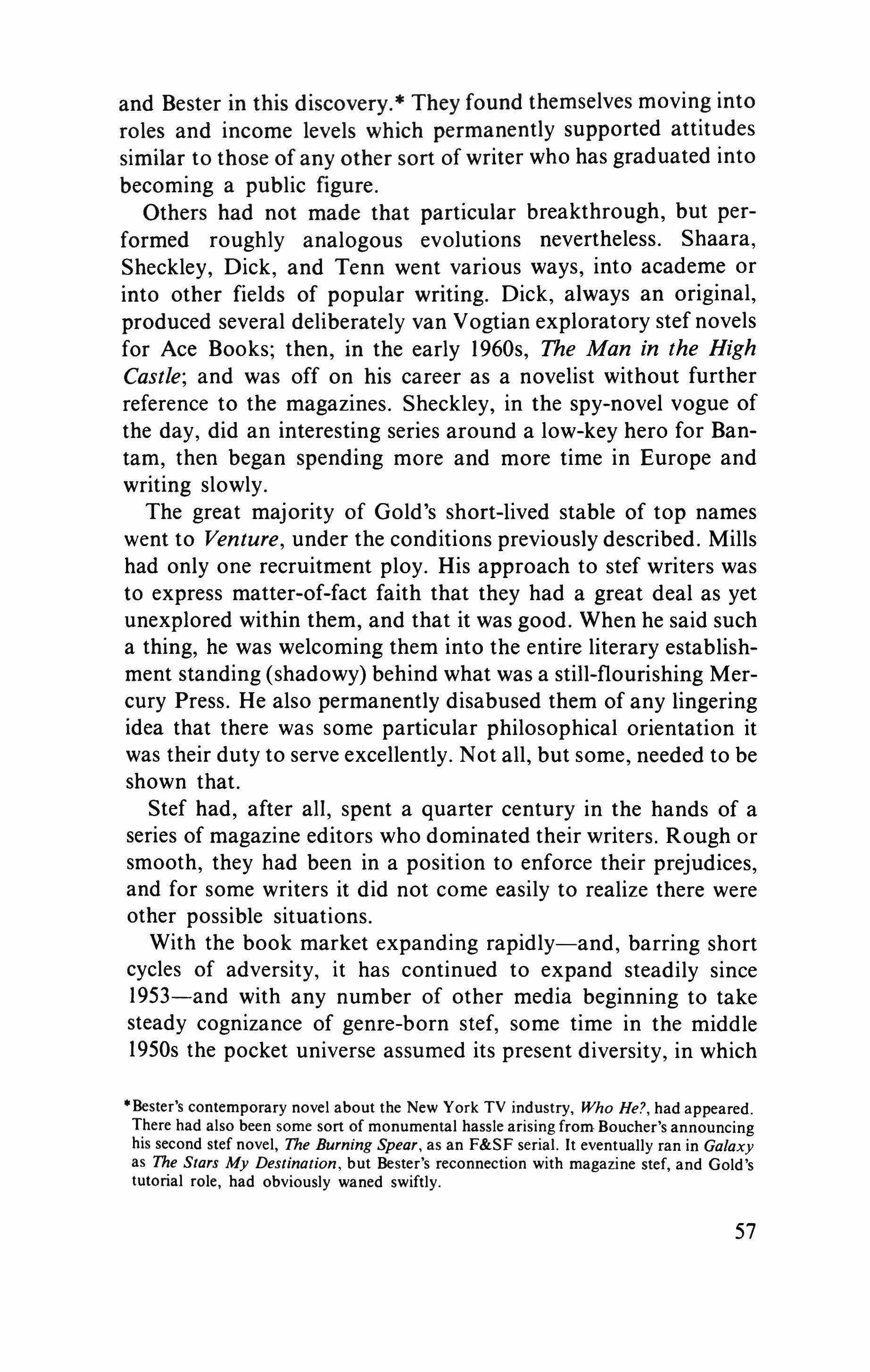
and Bester in this discovery.* They found themselves moving into roles and income levels which permanently supported attitudes similar to those of any other sort of writer who has graduated into becoming a public figure.
Others had not made that particular breakthrough, but performed roughly analogous evolutions nevertheless. Shaara, Sheckley, Dick, and Tenn went various ways, into academe or into other fields of popular writing. Dick, always an original, produced several deliberately van Vogtian exploratory stef novels for Ace Books; then, in the early 1960s, The Man in the High Castle; and was off on his career as a novelist without further reference to the magazines. Sheckley, in the spy-novel vogue of the day, did an interesting series around a low-key hero for Bantam, then began spending more and more time in Europe and writing slowly.
The great majority of Gold's short-lived stable of top names went to Venture, under the conditions previously described. Mills had only one recruitment ploy. His approach to stef writers was to express matter-of-fact faith that they had a great deal as yet unexplored within them, and that it was good. When he said such a thing, he was welcoming them into the entire literary establishment standing (shadowy) behind what was a still-flourishing Mercury Press. He also permanently disabused them of any lingering idea that there was some particular philosophical orientation it was their duty to serve excellently. Not all, but some, needed to be shown that.
Stef had, after all, spent a quarter century in the hands of a series of magazine editors who dominated their writers. Rough or smooth, they had been in a position to enforce their prejudices, and for some writers it did not come easily to realize there were other possible situations.
With the book market expanding rapidly-and, barring short cycles of adversity, it has continued to expand steadily since 1953-and with any number of other media beginning to take steady cognizance of genre-born stef, some time in the middle 1950s the pocket universe assumed its present diversity, in which
*Bester's contemporary novel about the New York TV industry, Who He?, had appeared. There had also been some sort of monumental hassle arising from Boucher's announcing his second stef novel, The Burning Spear, as an F&SF serial. It eventually ran in Galaxy as The Stars My Destination, but Bester's reconnection with magazine stef, and Gold's tutorial role, had obviously waned swiftly.

there is hardly anything for which a decently skilled writer cannot find his or her own audience.
The ghetto attitude still exists in some quarters, at amateur, professional and academic levels, expressed from inside and outside stefnism; nevertheless, functionally for many writers there has long been no distinction between their work and Mainstream work and work attitudes. Hindsight in some near future will make it possible to see that what Gernsback had done to institutionalize parochialism in 1926 was essentially undone by 1956, while the enthusiasm he had also introduced was continuing to proliferate, arguably to the benefit of all literature.
8
The drive to excellence has taken many forms in the stef universe, fueled by a sometimes unarticulated and unexamined, but highly energetic source. We are near to having established enough data and common vocabulary here to be able to reach some hardedged conclusions about what that source might be, and how it relates to the impulses of art in general. But we should first examine some typical cases of writers who, to outside eyes, might be said to have been begun as purely commercial suppliers of product, but ended or have continued quite differently.
Stef has had its share of hacks. The present market is also large enough, and some editors and publishers naive enough, to shelter a noteworthy proportion of incompetence in logic and articulation, let alone in storytelling. Acculturation-from monster movies, TV, and comics-additionally serves to prejudice many observers. But similar peripheral features appear at the fringes of all literatures, and always have. The measure of an art form should not be taken at its lowest levels.
Similarly, it should not be taken at its highest. Any material can be transformed by genius; making an angel out of dross does not argue that dross is angelic. The endurance of an art form rests rather in what can be done with it by persons of creativity, intelligence, and intuition at expectable levels: What quality of work can be found from how many steady practitioners who dismay rarely, astonish occasionally, and the rest of the time can be seen perseveringly increasing the scope and raising the average.
Fritz Leiber, for example, is a graduate of the University of Chicago in psychology and physiology, a former theological sem-
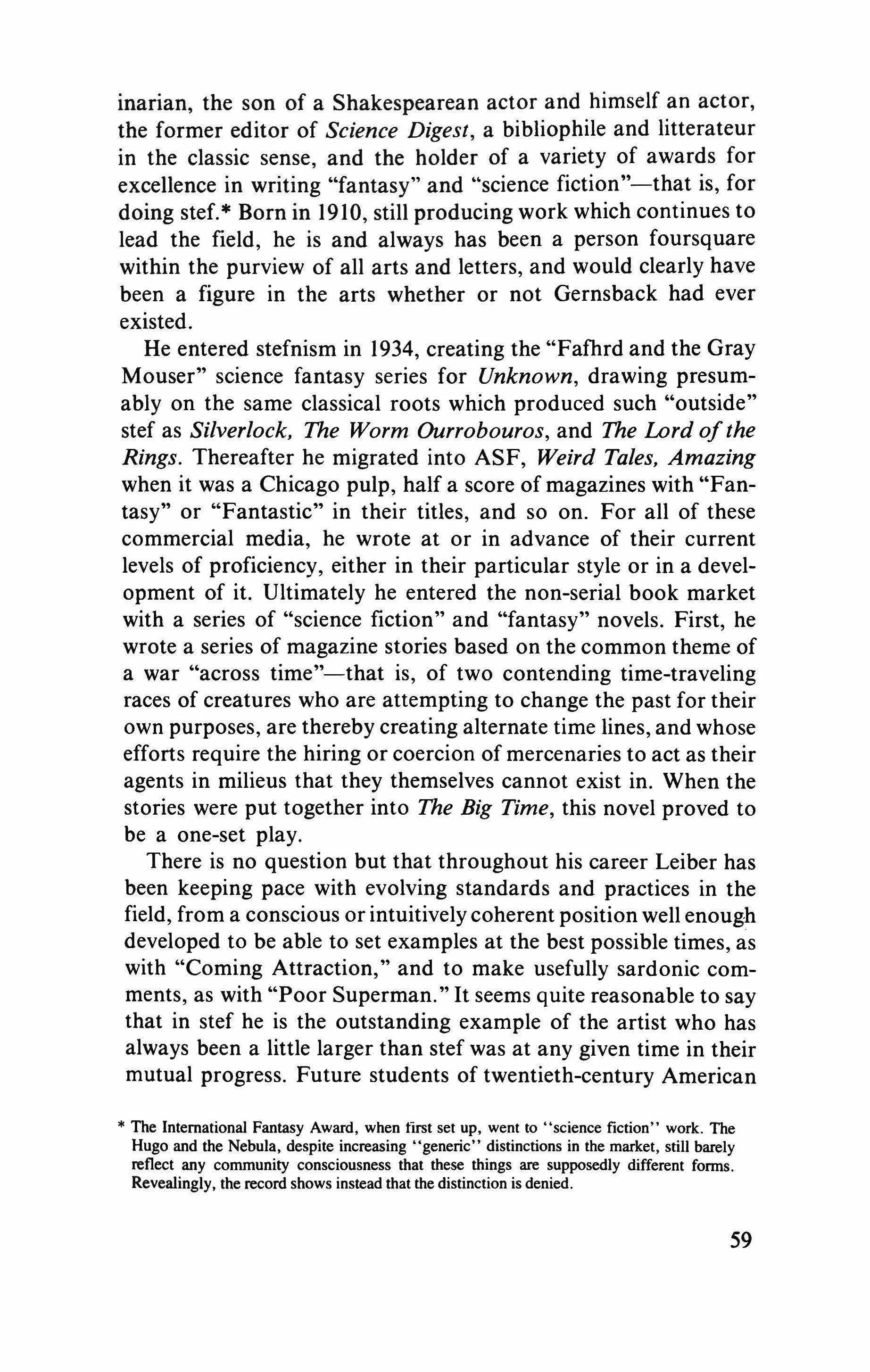
inarian, the son of a Shakespearean actor and himself an actor, the former editor of Science Digest, a bibliophile and litterateur in the classic sense, and the holder of a variety of awards for excellence in writing "fantasy" and "science fiction"-that is, for doing stef.* Born in 1910, still producing work which continues to lead the field, he is and always has been a person foursquare within the purview of all arts and letters, and would clearly have been a figure in the arts whether or not Gernsback had ever existed.
He entered stefnism in 1934, creating the "Fafhrd and the Gray Mouser" science fantasy series for Unknown, drawing presumably on the same classical roots which produced such "outside" stef as Silverlock, The Worm Ourrobouros, and The Lord ofthe Rings. Thereafter he migrated into ASF, Weird Tales, Amazing when it was a Chicago pulp, half a score of magazines with "Fantasy" or "Fantastic" in their titles, and so on. For all of these commercial media, he wrote at or in advance of their current levels of proficiency, either in their particular style or in a development of it. Ultimately he entered the non-serial book market with a series of "science fiction" and "fantasy" novels. First, he wrote a series of magazine stories based on the common theme of a war "across time"-that is, of two contending time-traveling races of creatures who are attempting to change the past for their own purposes, are thereby creating alternate time lines, and whose efforts require the hiring or coercion of mercenaries to act as their agents in milieus that they themselves cannot exist in. When the stories were put together into The Big Time, this novel proved to be a one-set play.
There is no question but that throughout his career Leiber has been keeping pace with evolving standards and practices in the field, from a conscious or intuitively coherent position well enough developed to be able to set examples at the best possible times, as with "Coming Attraction," and to make usefully sardonic comments, as with "Poor Superman." It seems quite reasonable to say that in stef he is the outstanding example of the artist who has always been a little larger than stef was at any given time in their mutual progress. Future students of twentieth-century American
The International Fantasy Award, when first set up, went to "science fiction" work. The Hugo and the Nebula, despite increasing "generic" distinctions in the market, still barely reflect any community consciousness that these things are supposedly different forms. Revealingly, the record shows instead that the distinction is denied.
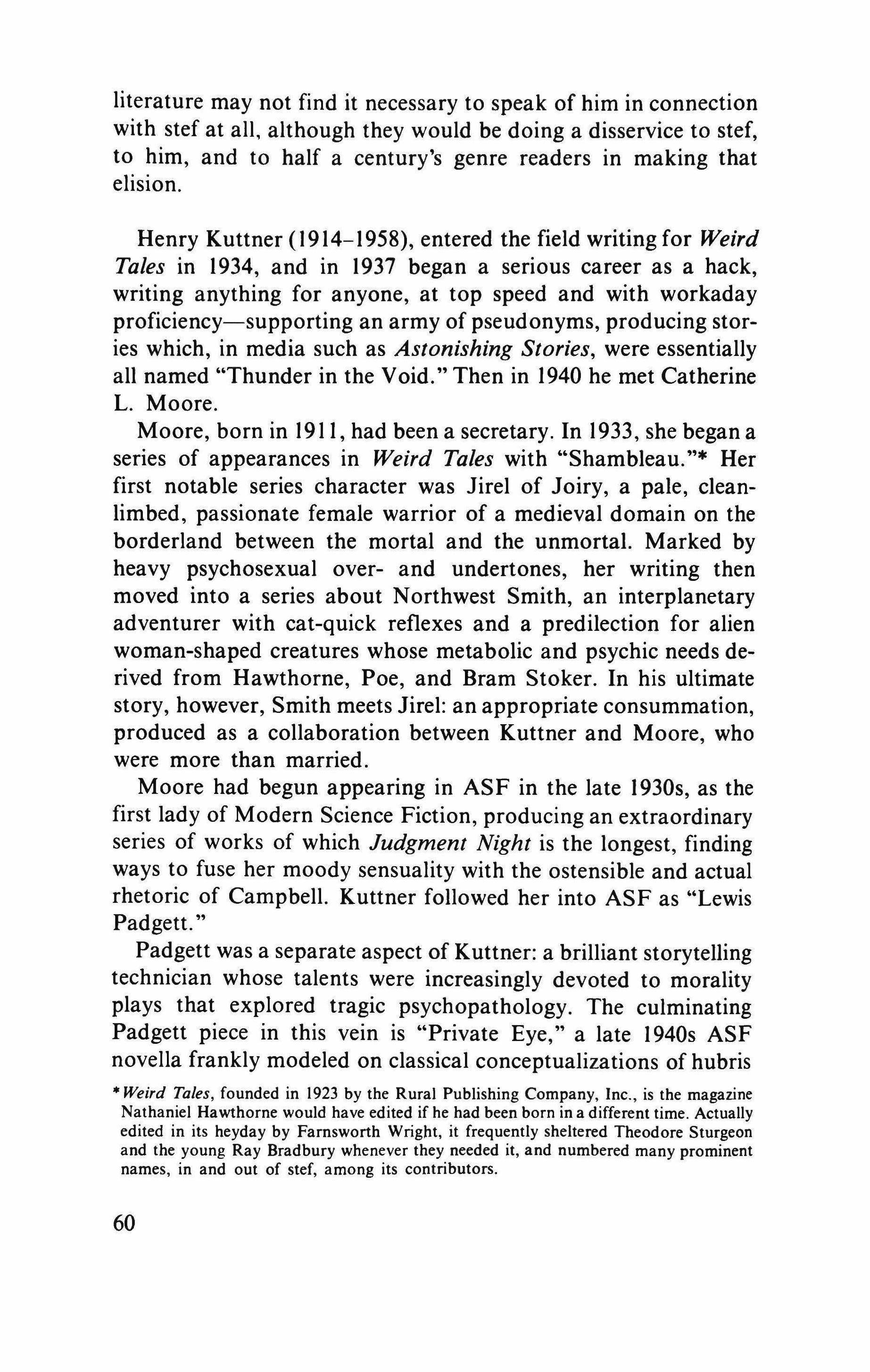
literature may not find it necessary to speak of him in connection with stef at all, although they would be doing a disservice to stef, to him, and to half a century's genre readers in making that elision.
Henry Kuttner (1914-1958), entered the field writing for Weird Tales in 1934, and in 1937 began a serious career as a hack, writing anything for anyone, at top speed and with workaday proficiency-supporting an army of pseudonyms, producing stories which, in media such as Astonishing Stories, were essentially all named "Thunder in the Void." Then in 1940 he met Catherine L. Moore.
Moore, born in 1911, had been a secretary. In 1933, she began a series of appearances in Weird Tales with "Shambleau."* Her first notable series character was Jirel of Joiry, a pale, cleanlimbed, passionate female warrior of a medieval domain on the borderland between the mortal and the unmortal. Marked by heavy psychosexual over- and undertones, her writing then moved into a series about Northwest Smith, an interplanetary adventurer with cat-quick reflexes and a predilection for alien woman-shaped creatures whose metabolic and psychic needs derived from Hawthorne, Poe, and Bram Stoker. In his ultimate story, however, Smith meets Jirel: an appropriate consummation, produced as a collaboration between Kuttner and Moore, who were more than married.
Moore had begun appearing in ASF in the late 1930s, as the first lady of Modern Science Fiction, producing an extraordinary series of works of which Judgment Night is the longest, finding ways to fuse her moody sensuality with the ostensible and actual rhetoric of Campbell. Kuttner followed her into ASF as "Lewis Padgett. "
Padgett was a separate aspect of Kuttner: a brilliant storytelling technician whose talents were increasingly devoted to morality plays that explored tragic psychopathology. The culminating Padgett piece in this vein is "Private Eye," a late 1940s ASF novella frankly modeled on classical conceptualizations of hubris
• Weird Tales, founded in 1923 by the Rural Publishing Company, Inc., is the magazine Nathaniel Hawthorne would have edited if he had been born in a different time. Actually edited in its heyday by Farnsworth Wright, it frequently sheltered Theodore Sturgeon and the young Ray Bradbury whenever they needed it, and numbered many prominent names, in and out of stef, among its contributors.
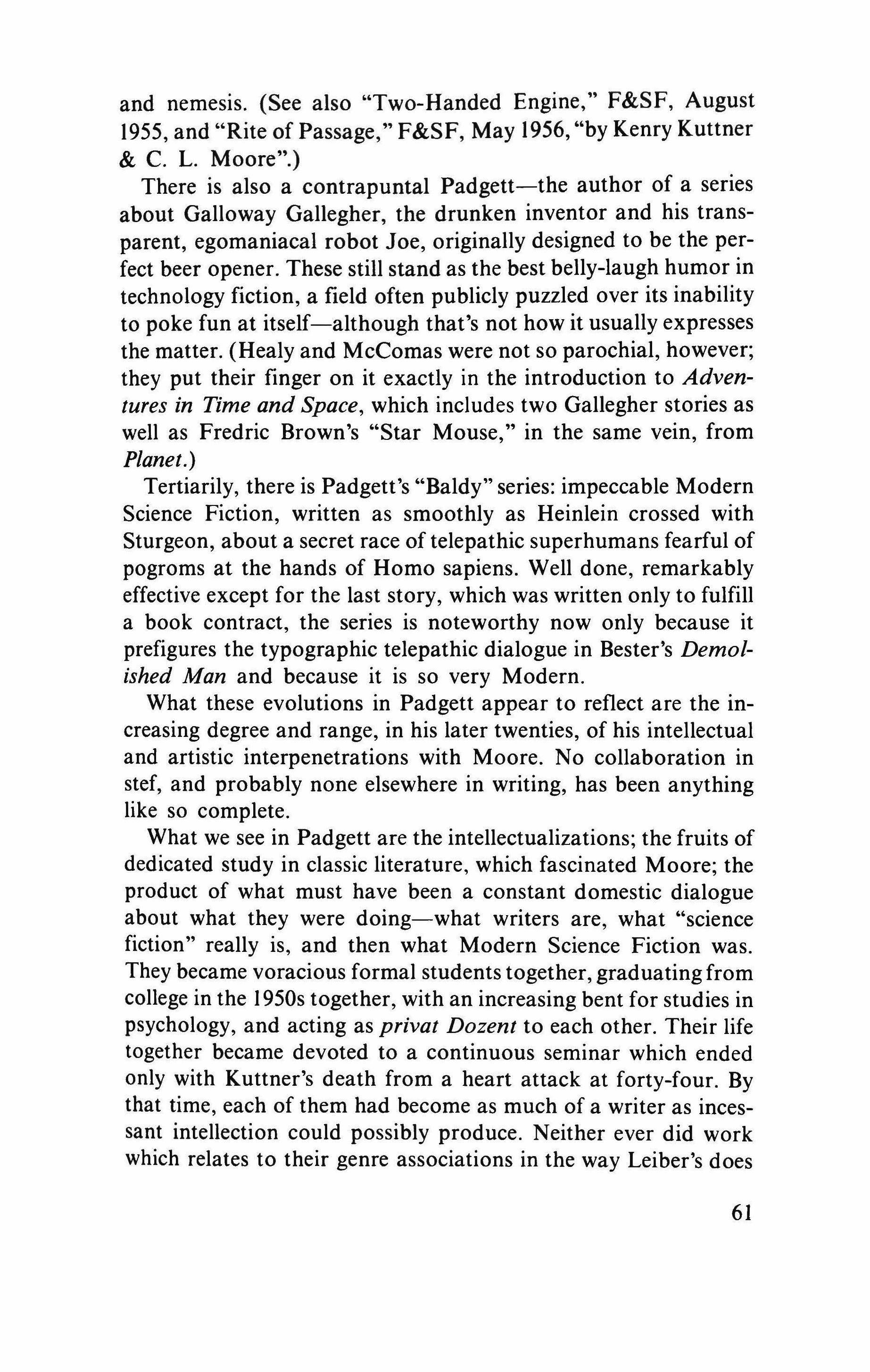
and nemesis. (See also "Two-Handed Engine," F&SF, August 1955, and "Rite of Passage," F&SF, May 1956, "by Kenry Kuttner & c. L. Moore".)
There is also a contrapuntal Padgett-the author of a series about Galloway Gallegher, the drunken inventor and his transparent, egomaniacal robot Joe, originally designed to be the perfect beer opener. These still stand as the best belly-laugh humor in technology fiction, a field often publicly puzzled over its inability to poke fun at itself-although that's not how it usually expresses the matter. (Healy and McComas were not so parochial, however; they put their finger on it exactly in the introduction to Adventures in Time and Space, which includes two Gallegher stories as well as Fredric Brown's "Star Mouse," in the same vein, from Planet.)
Tertiarily, there is Padgett's "Baldy" series: impeccable Modern Science Fiction, written as smoothly as Heinlein crossed with Sturgeon, about a secret race of telepathic superhumans fearful of pogroms at the hands of Homo sapiens. Well done, remarkably effective except for the last story, which was written only to fulfill a book contract, the series is noteworthy now only because it prefigures the typographic telepathic dialogue in Bester's Demolished Man and because it is so very Modern.
What these evolutions in Padgett appear to reflect are the increasing degree and range, in his later twenties, of his intellectual and artistic interpenetrations with Moore. No collaboration in stef, and probably none elsewhere in writing, has been anything like so complete.
What we see in Padgett are the intellectualizations; the fruits of dedicated study in classic literature, which fascinated Moore; the product of what must have been a constant domestic dialogue about what they were doing-what writers are, what "science fiction" really is, and then what Modern Science Fiction was. They became voracious formal students together, graduating from college in the I 950s together, with an increasing bent for studies in psychology, and acting as privat Dozent to each other. Their life together became devoted to a continuous seminar which ended only with Kuttner's death from a heart attack at forty-four. By that time, each of them had become as much of a writer as incessant intellection could possibly produce. Neither ever did work which relates to their genre associations in the way Leiber's does

to his, but they were as if one of them had been Hammett and the other had been Chandler."
The work of Padgett, like the work of other Kuttner pseudonyms, became increasingly difficult to parse out into the Kuttner portion and the Moore portion. Today Moore is unable to say which words are whose, just as Kuttner-Moore were in the day when one, waking, might find the story in the typewriter well advanced, in identical style, by the other. Padgett, however, was more Kuttner-almost pure Kuttner in the beginning, with the proportion changing as time passed-and his influence on stef in itself would suffice for most persons.
A thing to remember is that most influences in stef affect very young readers, typically not yet of high school age. They do not constitute the majority of stef readers, if we except specifically marketed juvenile stef, most of which is ludicrous-but they constitute a significant cadre of precocity among readers of adult stef. This is the pool from which Fandom and the protoprofessional writers and graphic artists within Fandom are most numerously drawn. So although Padgett's references to classical drama and classical compulsions are rather crudely drawn and appear primitive to persons at the college level, they represent the first exposure-and a readily graspable exposure-to such matters for a great many young persons in stef who have subsequently reexpressed them in more sophisticated forms.
In effect, Kuttner-Moore were smuggling 1960s stef into the Golden Age. Many ASF readers, including other ASF writers, expressed great admiration for their work. It's not possible now, of course, to determine how consciously Don A. Stuart had analyzed the heterodoxies in it, or how much was perceived by the component of Don A. Stuart in Kuttner-Moore's colleagues.t
So much for intellection. In the works of Lawrence O'Donnell we find the art. O'Donnell was the pseudonym under which Moore's style predominated over Kuttner's. O'Donnell came latest and last to ASF, though calling himself Keith Hammond ·Moore is still alive, remarried out of the field, and of course continues to write, but very sparsely; there are constant rumors of her much hoped-for return. tWhat Kuttner, and Kuttner-Moore under other names, were saying was this:
The technically trained man, with his armamentarium of disciplines and his firm sense of career, is nevertheless prey to internal and functionally disturbing programs he may not consciously apprehend. Worse, the external tidiness, with its apparently rational basis, might not exist at all if it were not required by some dirty, humid scheme within.
Just what is so funny about a robot with transparent skin?
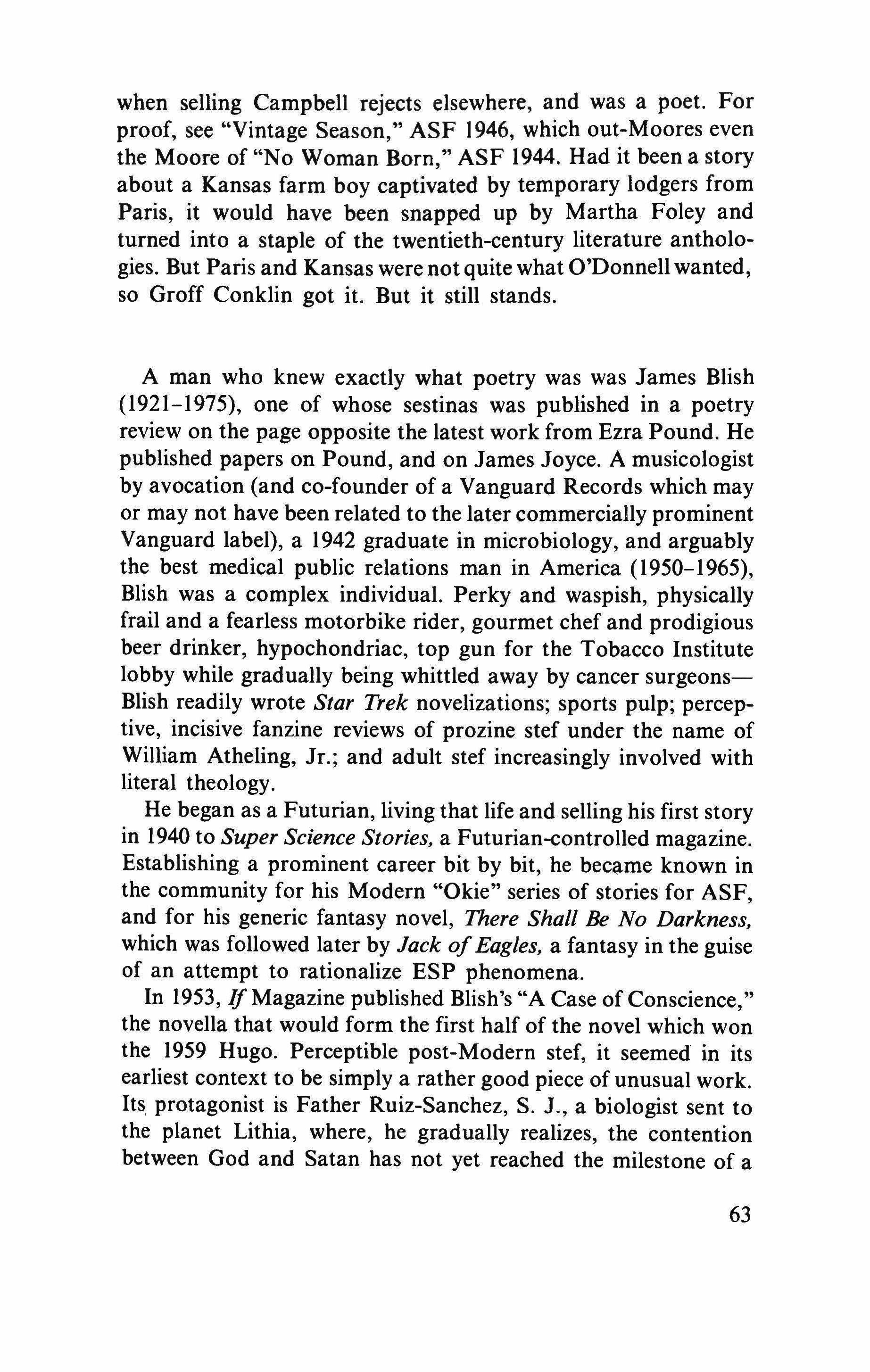
when selling Campbell rejects elsewhere, and was a poet. For proof, see "Vintage Season," ASF 1946, which out-Moores even the Moore of "No Woman Born," ASF 1944. Had it been a story about a Kansas farm boy captivated by temporary lodgers from Paris, it would have been snapped up by Martha Foley and turned into a staple of the twentieth-century literature anthologies. But Paris and Kansas were not quite what O'Donnell wanted, so Groff Conklin got it. But it still stands.
A man who knew exactly what poetry was was James Blish (1921-1975), one of whose sestinas was published in a poetry review on the page opposite the latest work from Ezra Pound. He published papers on Pound, and on James Joyce. A musicologist by avocation (and co-founder of a Vanguard Records which may or may not have been related to the later commercially prominent Vanguard label), a 1942 graduate in microbiology, and arguably the best medical public relations man in America (1950-1965), Blish was a complex individual. Perky and waspish, physically frail and a fearless motorbike rider, gourmet chef and prodigious beer drinker, hypochondriac, top gun for the Tobacco Institute lobby while gradually being whittled away by cancer surgeonsBlish readily wrote Star Trek novelizations; sports pulp; perceptive, incisive fanzine reviews of prozine stef under the name of William Atheling, Jr.; and adult stef increasingly involved with literal theology.
He began as a Futurian, living that life and selling his first story in 1940 to Super Science Stories, a Futurian-controlled magazine. Establishing a prominent career bit by bit, he became known in the community for his Modern "Okie" series of stories for ASF, and for his generic fantasy novel, There Shall Be No Darkness, which was followed later by Jack ofEagles, a fantasy in the guise of an attempt to rationalize ESP phenomena.
In 1953, .(fMagazine published Blish's "A Case of Conscience," the novella that would form the first half of the novel which won the 1959 Hugo. Perceptible post-Modern stef, it seemed in its earliest context to be simply a rather good piece of unusual work. Its, protagonist is Father Ruiz-Sanchez, S. J., a biologist sent to the planet Lithia, where, he gradually realizes, the contention between God and Satan has not yet reached the milestone of a

Savior's birth and in fact the intelligent inhabitants may be without Original Sin.
Blish himself was going through a protracted personal reevaluation, and was also increasingly conscious that his reputation among serious critics in England was higher, and more deeply founded, than it was among Americans. The last years of his life were spent in England, which had proved to be the only market for Doctor Mirabilis. Before his death there, he completed Black Easter and The Day After Judgment, two highly intellectualized and intense theological fantasies very much in the line of succession following C. W. Lewis's work. With A Case of Conscience and Mirabilis, they form the tetralogy After Such Knowledgewhich he called a trilogy, considering the last two volumes to be one work.
In reviewing these four evolutions, one sees three persons who would unhesitatingly have been identified as solidly Campbellian in 1945 and one who would have fitted perfectly beside them in 1950. One has, in the best sense, always been above his media; two were inescapably attracted to Campbell but were seminal in transforming his work. The fourth not only evolved beyond anything expectable but found a way to begin with Wells and then reconcile his art with one of Wells's most deeply convinced intellectual enemies.*
The conventional picture of Campbell's cadre as being nothing more than a group of semi-literate engineers flanging out plain tales plainly told shows even further defects.
Clifford Simak was a newspaperman writing fiction on the side, before and after the Golden Age. Jack Williamson and Will Jenkins were professional writers by first intention, before and after the Golden Age. Jenkins had been writing it before there were any stef media-almost as early as Gernsback.
In the core that Campbell is credited with having personally discovered and developed, the remaining great names, in no particular order, are L. Sprague deCamp, Hal Clement, Isaac Asimov, Hubbard, Sturgeon, George O. Smith, A. E. van Vogt, Eric Frank Russell, A. Bertram Chandler, and Lester del Rey. Of these, several are engineers, and several write like engineers, which does not
*In That Hideous Strength, Wells, very lightly disguised and savagely caricatured, is literally called an agent of the devil by Lewis, whose entire life and work were founded on an absolute belief that there are such things.
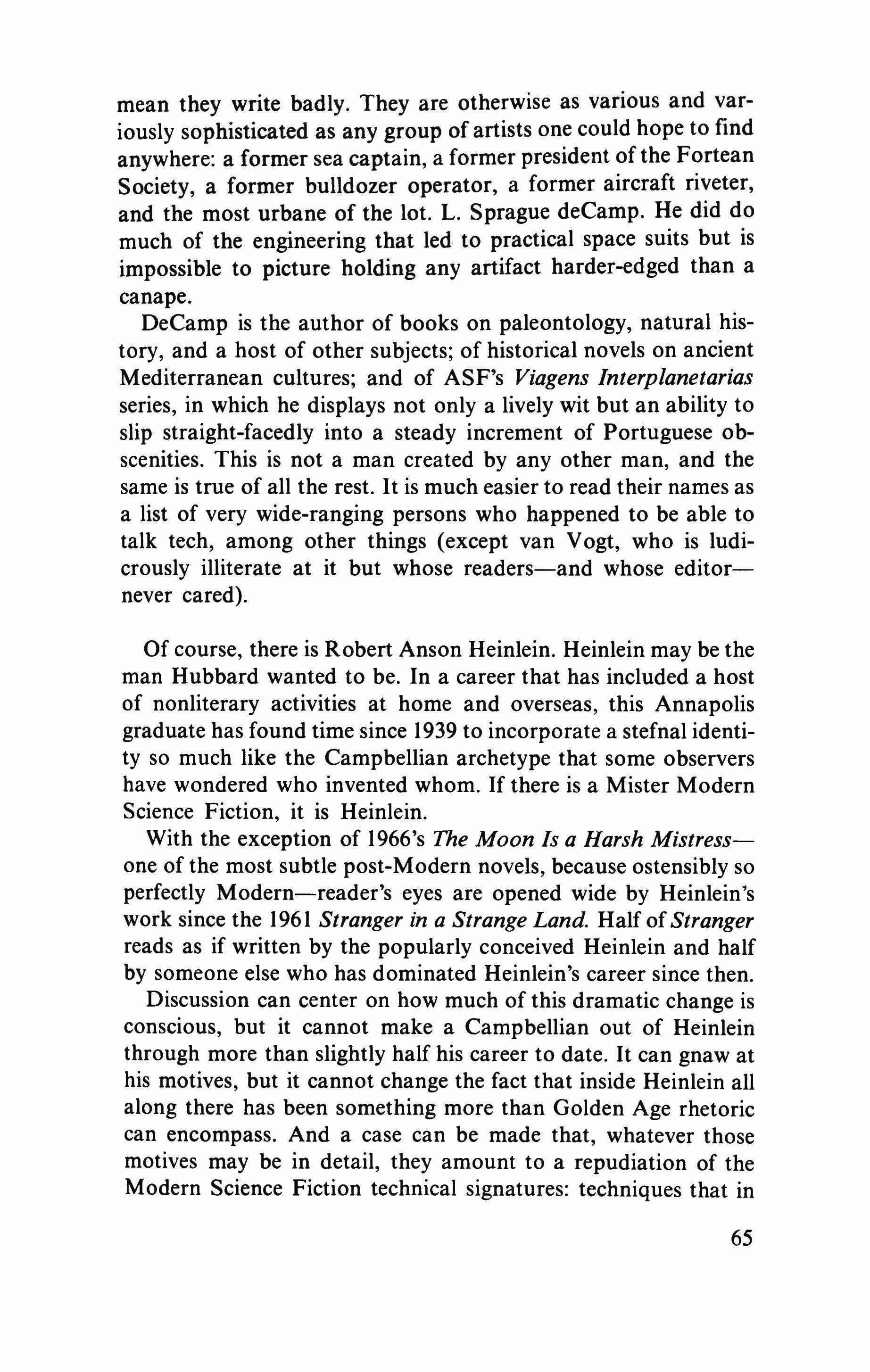
mean they write badly. They are otherwise as various and variously sophisticated as any group of artists one could hope to find anywhere: a former sea captain, a former president ofthe Fortean Society, a former bulldozer operator, a former aircraft riveter, and the most urbane of the lot. L. Sprague deCamp. He did do much of the engineering that led to practical space suits but is impossible to picture holding any artifact harder-edged than a canape.
DeCamp is the author of books on paleontology, natural history, and a host of other subjects; of historical novels on ancient Mediterranean cultures; and of ASF's Viagens Interplanetarias series, in which he displays not only a lively wit but an ability to slip straight-facedly into a steady increment of Portuguese obscenities. This is not a man created by any other man, and the same is true of all the rest. It is much easier to read their names as a list of very wide-ranging persons who happened to be able to talk tech, among other things (except van Vogt, who is ludicrously illiterate at it but whose readers-and whose editornever cared).
Of course, there is Robert Anson Heinlein. Heinlein may be the man Hubbard wanted to be. In a career that has included a host of nonliterary activities at home and overseas, this Annapolis graduate has found time since 1939 to incorporate a stefnal identity so much like the Campbellian archetype that some observers have wondered who invented whom. If there is a Mister Modern Science Fiction, it is Heinlein.
With the exception of 1966's The Moon Is a Harsh Mistressone of the most subtle post-Modern novels, because ostensibly so perfectly Modern-reader's eyes are opened wide by Heinlein's work since the 1961 Stranger in a Strange Land. Half ofStranger reads as if written by the popularly conceived Heinlein and half by someone else who has dominated Heinlein's career since then. Discussion can center on how much of this dramatic change is conscious, but it cannot make a Campbellian out of Heinlein through more than slightly half his career to date. It can gnaw at his motives, but it cannot change the fact that inside Heinlein all along there has been something more than Golden Age rhetoric can encompass. And a case can be made that, whatever those motives may be in detail, they amount to a repudiation of the Modern Science Fiction technical signatures: techniques that in
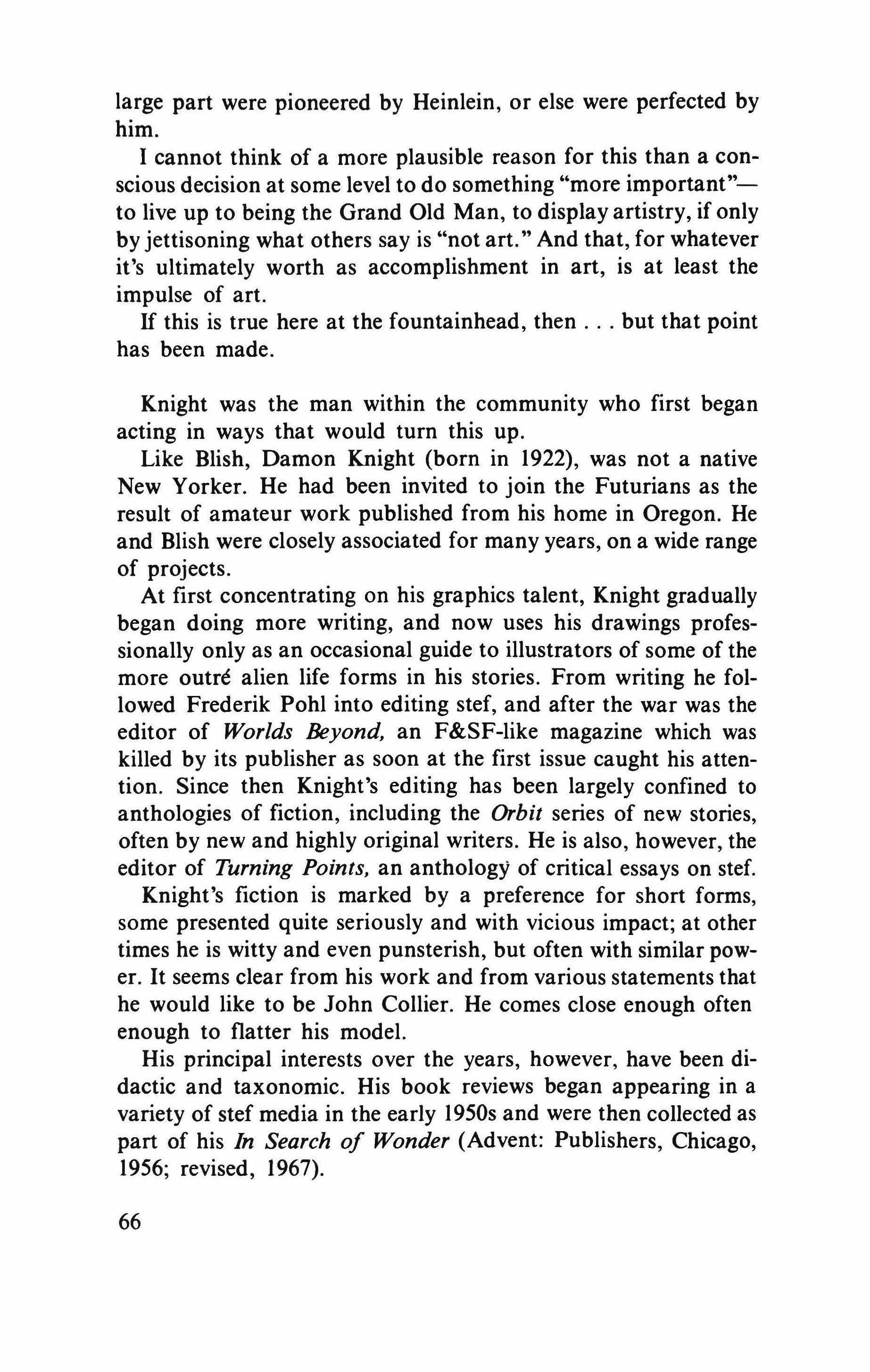
large part were pioneered by Heinlein, or else were perfected by him.
I cannot think of a more plausible reason for this than a conscious decision at some level to do something "more important"to live up to being the Grand Old Man, to display artistry, if only byjettisoning what others say is "not art." And that, for whatever it's ultimately worth as accomplishment in art, is at least the impulse of art.
If this is true here at the fountainhead, then but that point has been made.
Knight was the man within the community who first began acting in ways that would turn this up.
Like Blish, Damon Knight (born in 1922), was not a native New Yorker. He had been invited to join the Futurians as the result of amateur work published from his home in Oregon. He and Blish were closely associated for many years, on a wide range of projects.
At first concentrating on his graphics talent, Knight gradually began doing more writing, and now uses his drawings professionally only as an occasional guide to illustrators of some of the more outre alien life forms in his stories. From writing he followed Frederik Pohl into editing stef, and after the war was the editor of Worlds Beyond, an F&SF-like magazine which was killed by its publisher as soon at the first issue caught his attention. Since then Knight's editing has been largely confined to anthologies of fiction, including the Orbit series of new stories, often by new and highly original writers. He is also, however, the editor of Turning Points, an anthology of critical essays on stef.
Knight's fiction is marked by a preference for short forms, some presented quite seriously and with vicious impact; at other times he is witty and even punsterish, but often with similar power. It seems clear from his work and from various statements that he would like to be John Collier. He comes close enough often enough to flatter his model.
His principal interests over the years, however, have been didactic and taxonomic. His book reviews began appearing in a variety of stef media in the early 1950s and were then collected as part of his In Search of Wonder (Advent: Publishers, Chicago, 1956; revised, 1967).

Catching the stef book market on the rise, Knight was the first critic to consistently treat book reviewing as something more than an opportunity to repeat the PR handouts of the publishers. His initial reputation was made in a fanzine essay demolishing van Vogt-up to that time a demigod-and he took some almost equally sharp looks at others in the pantheon. * His best work, however, was done in filleting the offerings ofalmost good writers: persons who produced something which appeared to be perfectly acceptable stef on the surface, but which was somehow troublesomely not quite right, and fell apart at the touch of Knight's scalpel. That is, he had standards; they were visibly useful, and they were now all available in one volume.
Most codified or institutionalized views of stef from within the field are Knight-influenced. The presumption that magazine-born stef was subject to general standards of literacy and logic is certainly his, as developed in concert with Blish. (Advent: Publishers also brought out The Issue at Hand and More Issues at Hand, 1964 and 1970-the collected reviews and essays of "William Atheling, Jr.")
Eye-catchingly deft, Knight was the perfect media critic at the exact best time. It was not so much what he said on any given occasion; it was the fact that he consistently operated from the position that it was time to take the field seriously, and that he refused to accept alternative views.
With Blish, and with former Futurian Judith Merril, Knight then announced the first professional stef writers' workshop, at Milford, Pennsylvania, where all three then resided with their families. The announcement was made at the 1956 New York world convention, where In Search of Wonder had just been awarded the first and only Hugo ever given a critical work, and the conference was scheduled for the week after the convention. Milford was within easy travel distance from New York, and the first of what was to become an annual series of Milford conferences was heavily attended.
Most of the writers would have willingly traveled farther to be
·It's an excellent essay, its impact now stolen by the fact that van Vogt has had to devote the last twenty-five years to climbing back up from it, and so is not perceived as the giant he was. A converted writer of "true" confessions, van Vogt is sui generis, still obviously vulnerable to academic criticisms but fully capable of entertaining his readers inordinately. Others, Knight included, have experimented with some of his technical inventions, but he remains the master.
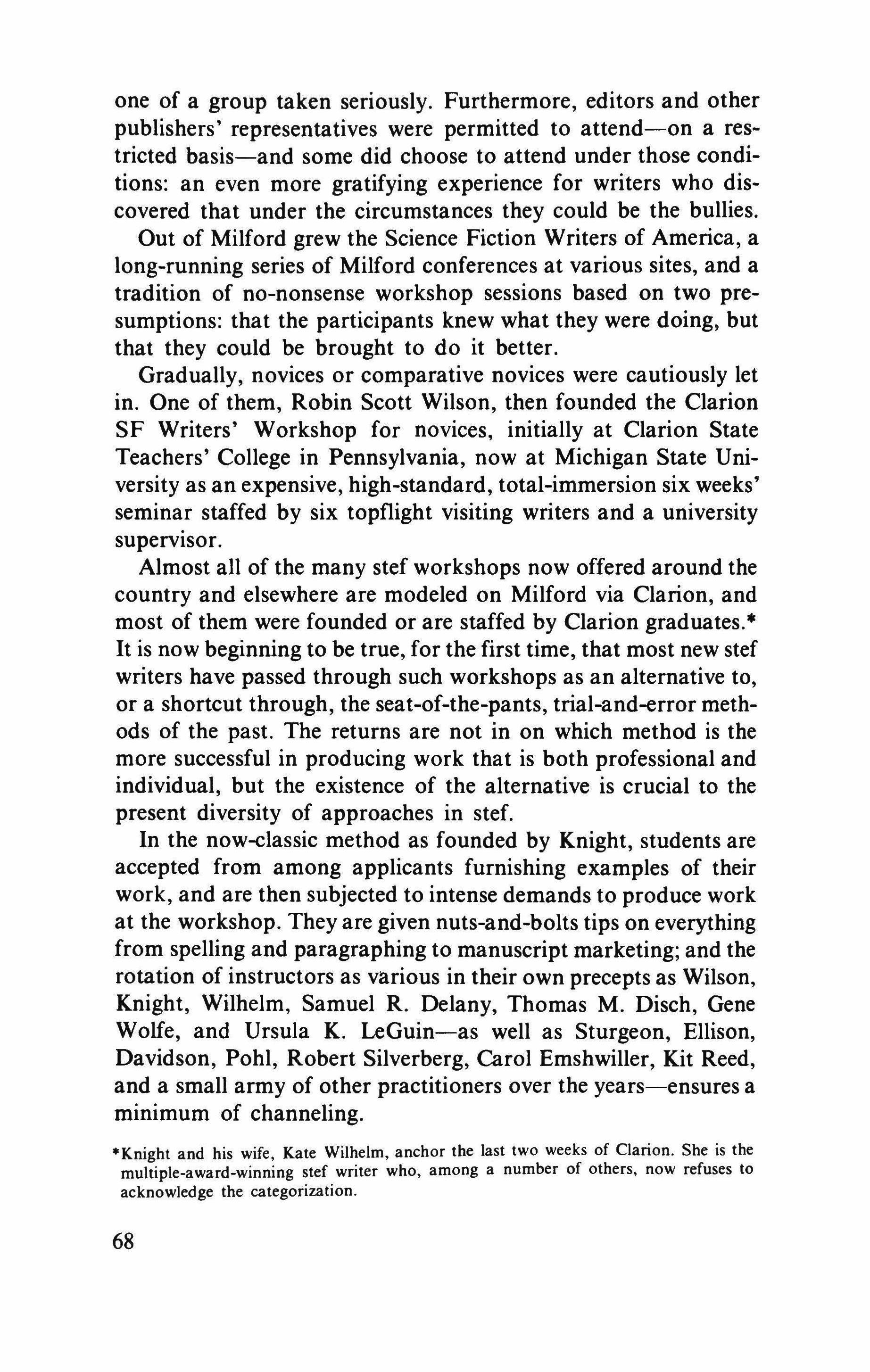
one of a group taken seriously. Furthermore, editors and other publishers' representatives were permitted to attend-on a restricted basis-and some did choose to attend under those conditions: an even more gratifying experience for writers who discovered that under the circumstances they could be the bullies.
Out of Milford grew the Science Fiction Writers of America, a long-running series of Milford conferences at various sites, and a tradition of no-nonsense workshop sessions based on two presumptions: that the participants knew what they were doing, but that they could be brought to do it better.
Gradually, novices or comparative novices were cautiously let in. One of them, Robin Scott Wilson, then founded the Clarion SF Writers' Workshop for novices, initially at Clarion State Teachers' College in Pennsylvania, now at Michigan State University as an expensive, high-standard, total-immersion six weeks' seminar staffed by six topflight visiting writers and a university supervisor.
Almost all of the many stef workshops now offered around the country and elsewhere are modeled on Milford via Clarion, and most of them were founded or are staffed by Clarion graduates." It is now beginning to be true, for the first time, that most new stef writers have passed through such workshops as an alternative to, or a shortcut through, the seat-of-the-pants, trial-and-error methods of the past. The returns are not in on which method is the more successful in producing work that is both professional and individual, but the existence of the alternative is crucial to the present diversity of approaches in stef.
In the now-classic method as founded by Knight, students are accepted from among applicants furnishing examples of their work, and are then subjected to intense demands to produce work at the workshop. They are given nuts-and-bolts tips on everything from spelling and paragraphing to manuscript marketing; and the rotation of instructors as various in their own precepts as Wilson, Knight, Wilhelm, Samuel R. Delany, Thomas M. Disch, Gene Wolfe, and Ursula K. LeGuin-as well as Sturgeon, Ellison, Davidson, Pohl, Robert Silverberg, Carol Emshwiller, Kit Reed, and a small army of other practitioners over the years-ensures a minimum of channeling.
*Knight and his wife, Kate Wilhelm, anchor the last two weeks of Clarion. She is the multiple-award-winning stef writer who, among a number of others, now refuses to acknowledge the categorization.
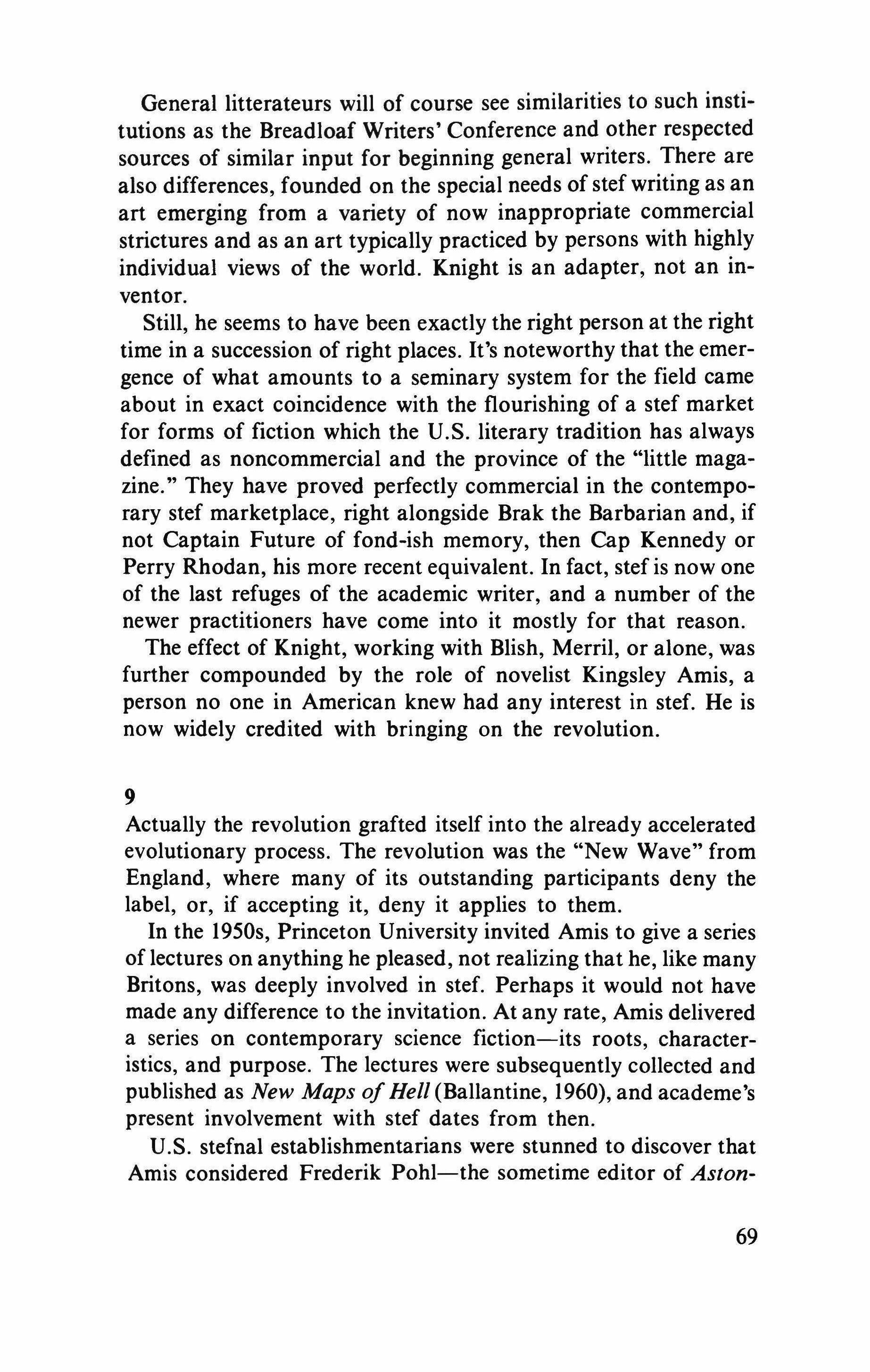
General litterateurs will of course see similarities to such institutions as the Breadloaf Writers' Conference and other respected sources of similar input for beginning general writers. There are also differences, founded on the special needs of stef writing as an art emerging from a variety of now inappropriate commercial strictures and as an art typically practiced by persons with highly individual views of the world. Knight is an adapter, not an inventor.
Still, he seems to have been exactly the right person at the right time in a succession of right places. It's noteworthy that the emergence of what amounts to a seminary system for the field came about in exact coincidence with the flourishing of a stef market for forms of fiction which the U.S. literary tradition has always defined as noncommercial and the province of the "little magazine." They have proved perfectly commercial in the contemporary stef marketplace, right alongside Brak the Barbarian and, if not Captain Future of fond-ish memory, then Cap Kennedy or Perry Rhodan, his more recent equivalent. In fact, stef is now one of the last refuges of the academic writer, and a number of the newer practitioners have come into it mostly for that reason.
The effect of Knight, working with Blish, Merril, or alone, was further compounded by the role of novelist Kingsley Amis, a person no one in American knew had any interest in stef. He is now widely credited with bringing on the revolution.
9
Actually the revolution grafted itself into the already accelerated evolutionary process. The revolution was the "New Wave" from England, where many of its outstanding participants deny the label, or, if accepting it, deny it applies to them.
In the 1950s, Princeton University invited Amis to give a series of lectures on anything he pleased, not realizing that he, like many Britons, was deeply involved in stef. Perhaps it would not have made any difference to the invitation. At any rate, Amis delivered a series on contemporary science fiction-its roots, characteristics, and purpose. The lectures were subsequently collected and published as New Maps ofHell (Ballantine, 1960), and academe's present involvement with stef dates from then.
U.S. stefnal establishmentarians were stunned to discover that Amis considered Frederik Pohl-the sometime editor of Aston-
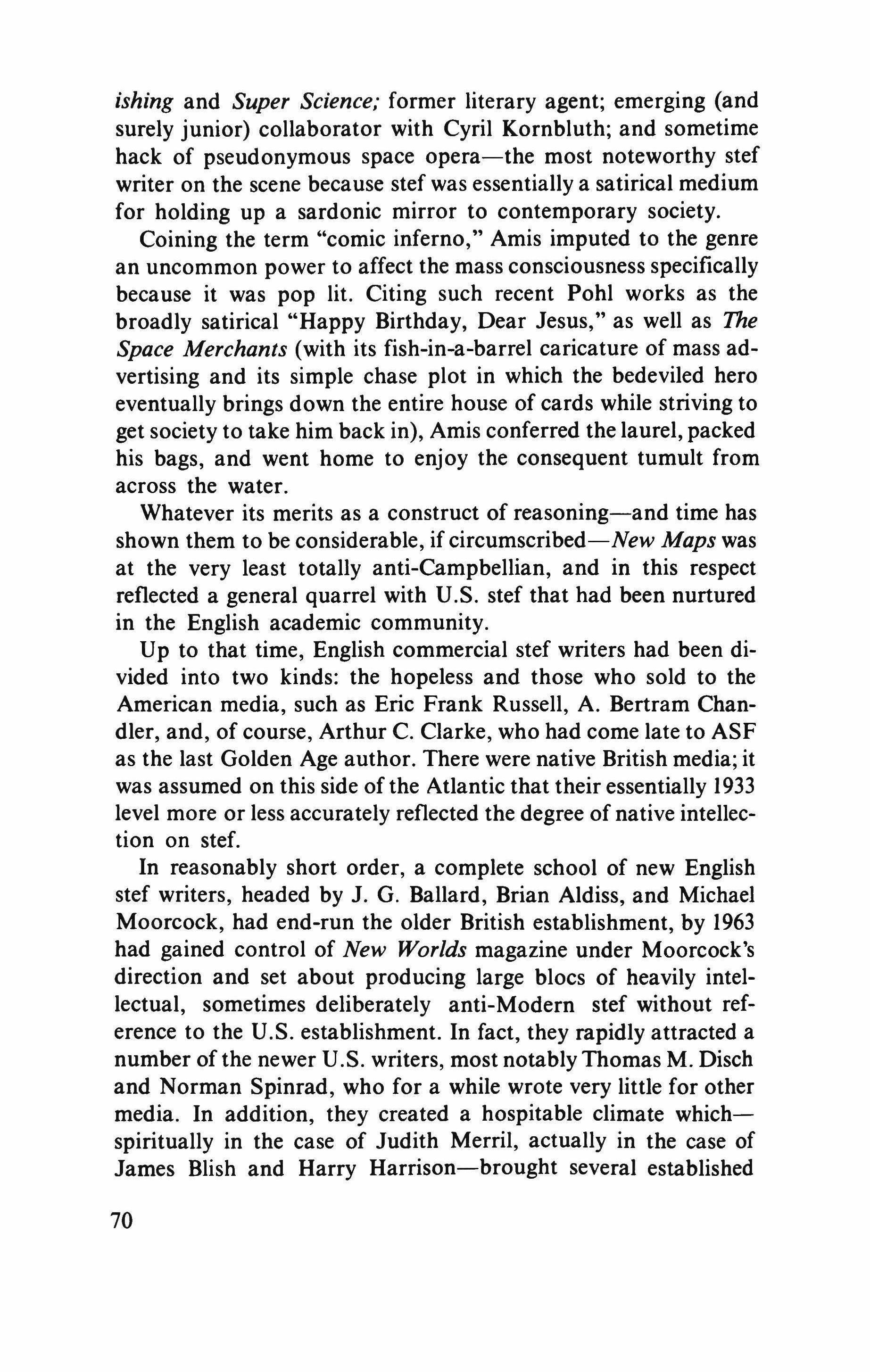
ishing and Super Science; former literary agent; emerging (and surely junior) collaborator with Cyril Kornbluth; and sometime hack of pseudonymous space opera-the most noteworthy stef writer on the scene because stef was essentially a satirical medium for holding up a sardonic mirror to contemporary society.
Coining the term "comic inferno," Amis imputed to the genre an uncommon power to affect the mass consciousness specifically because it was pop lit. Citing such recent Pohi works as the broadly satirical "Happy Birthday, Dear Jesus," as well as The Space Merchants (with its fish-in-a-barrel caricature of mass advertising and its simple chase plot in which the bedeviled hero eventually brings down the entire house of cards while striving to get society to take him back in), Amis conferred the laurel, packed his bags, and went home to enjoy the consequent tumult from across the water.
Whatever its merits as a construct of reasoning-and time has shown them to be considerable, if circumscribed-New Maps was at the very least totally anti-Campbellian, and in this respect reflected a general quarrel with U.S. stef that had been nurtured in the English academic community.
Up to that time, English commercial stef writers had been divided into two kinds: the hopeless and those who sold to the American media, such as Eric Frank Russell, A. Bertram Chandler, and, of course, Arthur C. Clarke, who had come late to ASF as the last Golden Age author. There were native British media; it was assumed on this side of the Atlantic that their essentially 1933 level more or less accurately reflected the degree of native intellection on stef.
In reasonably short order, a complete school of new English stef writers, headed by J. G. Ballard, Brian Aldiss, and Michael Moorcock, had end-run the older British establishment, by 1963 had gained control of New Worlds magazine under Moorcock's direction and set about producing large blocs of heavily intellectual, sometimes deliberately anti-Modern stef without reference to the U.S. establishment. In fact, they rapidly attracted a number of the newer U.S. writers, most notably Thomas M. Disch and Norman Spinrad, who for a while wrote very little for other media. In addition, they created a hospitable climate whichspiritually in the case of Judith Merril, actually in the case of James Blish and Harry Harrison-brought several established
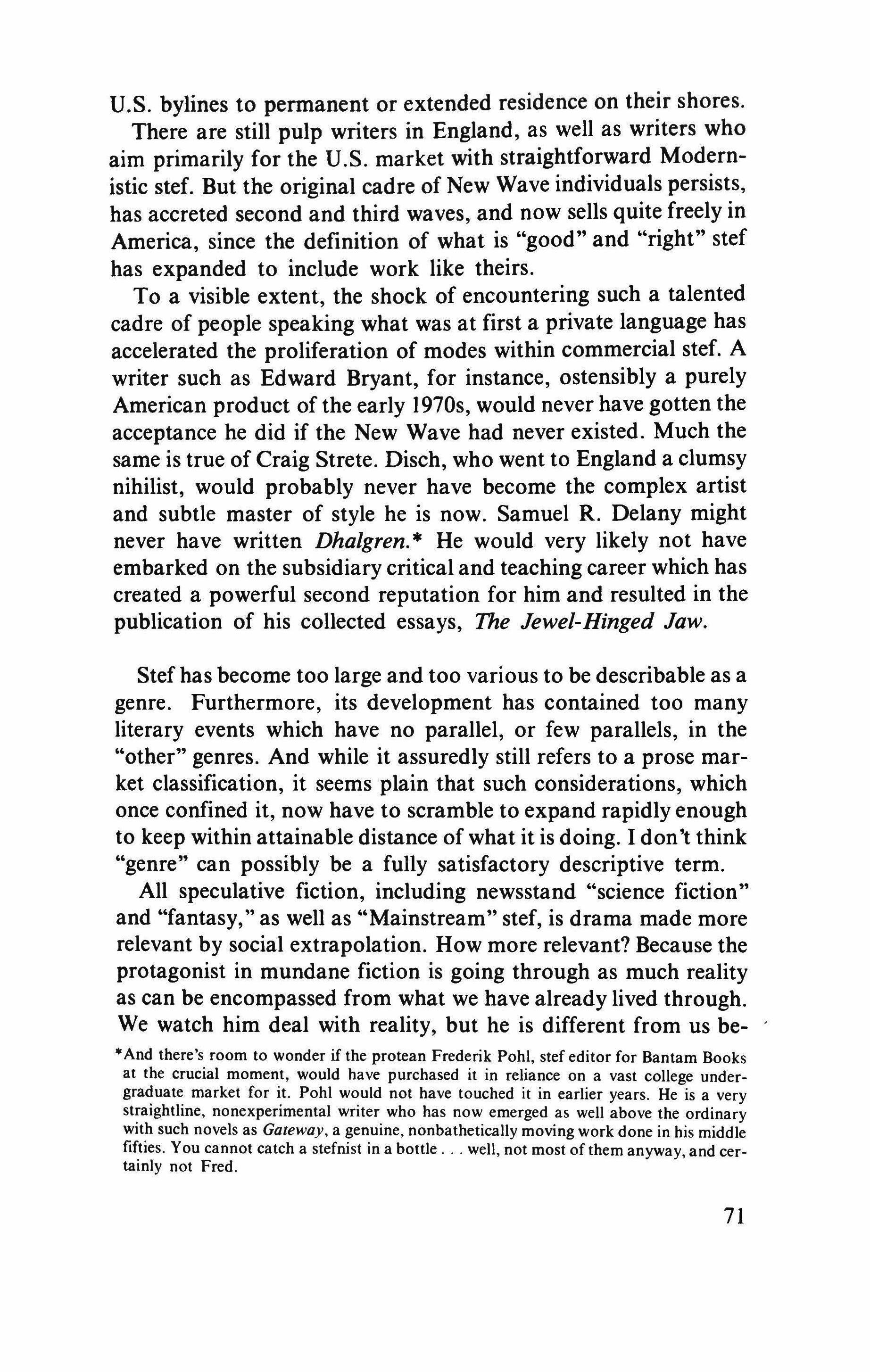
u.s. bylines to permanent or extended residence on their shores. There are still pulp writers in England, as well as writers who aim primarily for the U.S. market with straightforward Modernistic stef. But the original cadre of New Wave individuals persists, has accreted second and third waves, and now sells quite freely in America, since the definition of what is "good" and "right" stef has expanded to include work like theirs.
To a visible extent, the shock of encountering such a talented cadre of people speaking what was at first a private language has accelerated the proliferation of modes within commercial stef. A writer such as Edward Bryant, for instance, ostensibly a purely American product of the early 1970s, would never have gotten the acceptance he did if the New Wave had never existed. Much the same is true of Craig Strete. Disch, who went to England a clumsy nihilist, would probably never have become the complex artist and subtle master of style he is now. Samuel R. Delany might never have written Dhalgren. * He would very likely not have embarked on the subsidiary critical and teaching career which has created a powerful second reputation for him and resulted in the publication of his collected essays, The Jewel-Hinged Jaw.
Stef has become too large and too various to be describable as a genre. Furthermore, its development has contained too many literary events which have no parallel, or few parallels, in the "other" genres. And while it assuredly still refers to a prose market classification, it seems plain that such considerations, which once confined it, now have to scramble to expand rapidly enough to keep within attainable distance of what it is doing. I don't think "genre" can possibly be a fully satisfactory descriptive term.
All speculative fiction, including newsstand "science fiction" and "fantasy," as well as "Mainstream" stef, is drama made more relevant by social extrapolation. How more relevant? Because the protagonist in mundane fiction is going through as much reality as can be encompassed from what we have already lived through. We watch him deal with reality, but he is different from us be-
And there's room to wonder if the protean Frederik Pohl, stef editor for Bantam Books at the crucial moment, would have purchased it in reliance on a vast college undergraduate market for it. Pohl would not have touched it in earlier years. He is a very st�aightline, nonexperimental writer who has now emerged as well above the ordinary WIth such novels as Gateway, a genuine, nonbathetically moving work done in his middle fifties. You cannot catch a stefnist in a bottle well, not most ofthem anyway, and certainly not Fred.
cause he is so meticulously characterized as to point up the host of differences between what we are and what he is-what we might like to be, but in all truth cannot. Meanwhile, the protagonist in speculative fiction is going through realities that might be waiting for us; that are presented in meticulous detail because they must be, in order to be acceptable at all, since we cannot actually go forward and touch one in the "real" world, or find a credible witness who can swear to its "real" existence. The speculative realities are detailed; the protagonist is less so; he must be a little blank in detail, so that there is room for us to believe we might yet successfully choose that role for ourselves. So, yes, in that sense, drama made more relevant.
And there you have it. Genre labels are blatantly transientconvenient, utilitarian, and applicable only in short-run situations. If you want to call an aspect of speculative fiction "science fiction" so you can handle it as a commodity, nothing in Heaven or on Earth prevents it. But it does not arise from a specific impulse to do science fiction. Or genre fantasy. Or science fantasy or science adventure. It arises from the broad compulsion to speculate: an imperative as old as the day the second intelligent individual on this planet opened his or her eyes and found the first intelligent individual standing there in possession of reality and in command of the rules of behavior.
All the rest-the future, the imaginary island, the machine, the incantation, the demon, the Universe, the Mainstream which somehow does not contain an analogous stream displayingjust as much breadth and depth-all the rest is detail.

A Science fiction glossary" with an appendix on Fannisb terms
ASF Astounding Stories ofSuper-Science magazine; later, in its most fruitful period, Astounding Science Fiction; now Analog.
Fantasy A commercial genre, identified by magazine titles such as Unknown, Weird Tales, Fantasy Fiction, and The Avon Fantasy Reader. Also The Magazine of Fantasy and Science Fiction (F&SF). Even in magazines with frank fantasy titles, some stories may be science fiction, set in milieus where temporal power derives from manipulations of physical laws rather than obedient concatenation of mystic symbols. Work in fantasy magazines must
-Not in alphabetical order.
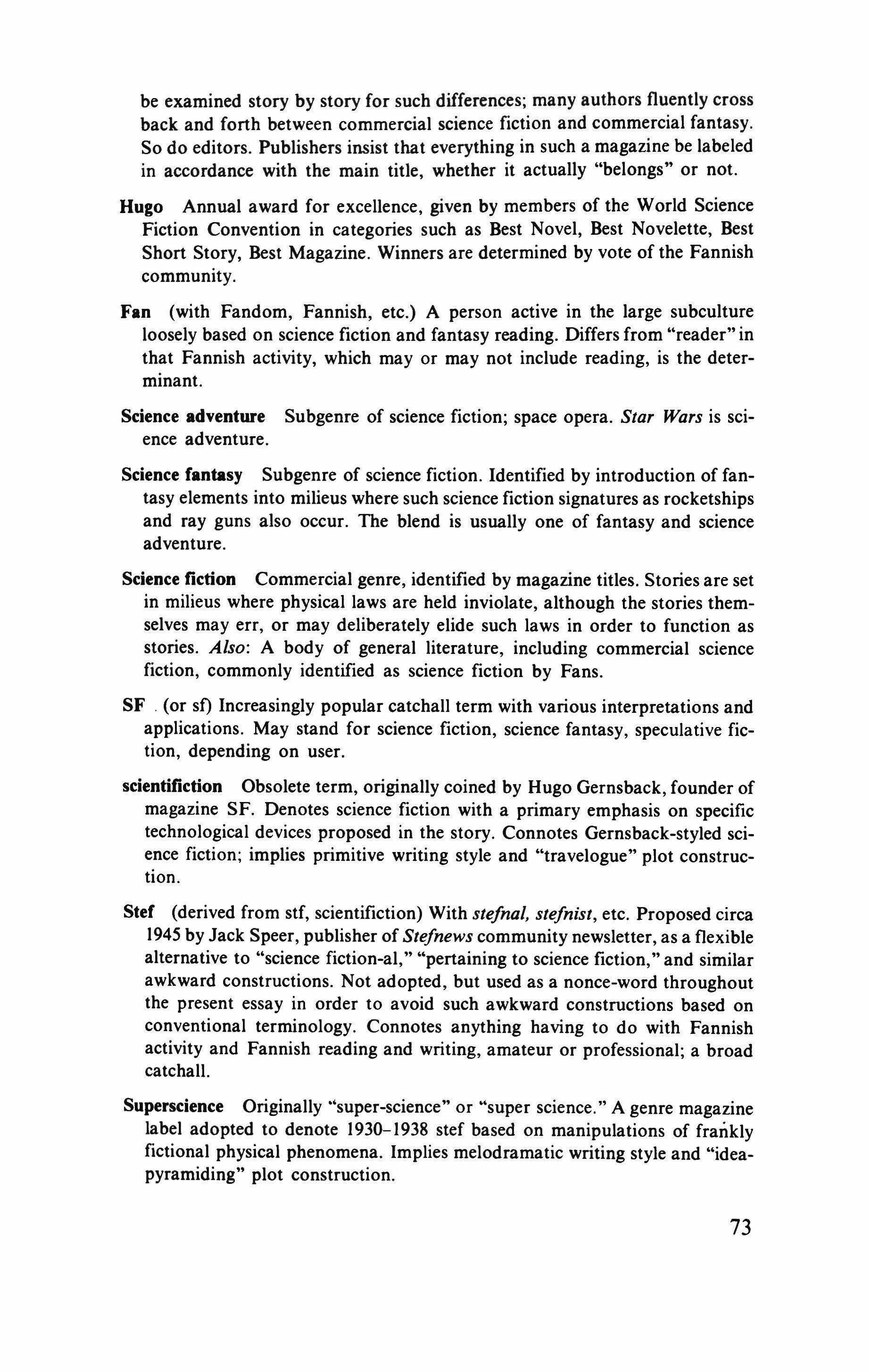
be examined story by story for such differences; many authors fluently cross back and forth between commercial science fiction and commercial fantasy. So do editors. Publishers insist that everything in such a magazine be labeled in accordance with the main title, whether it actually "belongs" or not.
Hugo Annual award for excellence, given by members of the World Science Fiction Convention in categories such as Best Novel, Best Novelette, Best Short Story, Best Magazine. Winners are determined by vote of the Fannish community.
Fan (with Fandom, Fannish, etc.) A person active in the large subculture loosely based on science fiction and fantasy reading. Differs from "reader" in that Fannish activity, which mayor may not include reading, is the determinant.
Science adventure Subgenre of science fiction; space opera. Star Wars is science adventure.
Science fantasy Subgenre of science fiction. Identified by introduction of fantasy elements into milieus where such science fiction signatures as rocketships and ray guns also occur. The blend is usually one of fantasy and science adventure.
Science fiction Commercial genre, identified by magazine titles. Stories are set in milieus where physical laws are held inviolate, although the stories themselves may err, or may deliberately elide such laws in order to function as stories. Also: A body of general literature, including commercial science fiction, commonly identified as science fiction by Fans.
SF (or sf) Increasingly popular catchall term with various interpretations and applications. May stand for science fiction, science fantasy, speculative fiction, depending on user.
scientifiction Obsolete term, originally coined by Hugo Gernsback, founder of magazine SF. Denotes science fiction with a primary emphasis on specific technological devices proposed in the story. Connotes Gernsback-styled science fiction; implies primitive writing style and "travelogue" plot construction.
Stef (derived from stf, scientifiction) With stefnal, stefnist, etc. Proposed circa 1945 by Jack Speer, publisher of Stefnews community newsletter, as a flexible alternative to "science fiction-al," "pertaining to science fiction," and similar awkward constructions. Not adopted, but used as a nonce-word throughout the present essay in order to avoid such awkward constructions based on conventional terminology. Connotes anything having to do with Fannish activity and Fannish reading and writing, amateur or professional; a broad catchall.
Superscience Originally "super-science" or "super science." A genre magazine label adopted to denote 1930-1938 stef based on manipulations of frankly fictional physical phenomena. Implies melodramatic writing style and "ideapyramiding" plot construction.
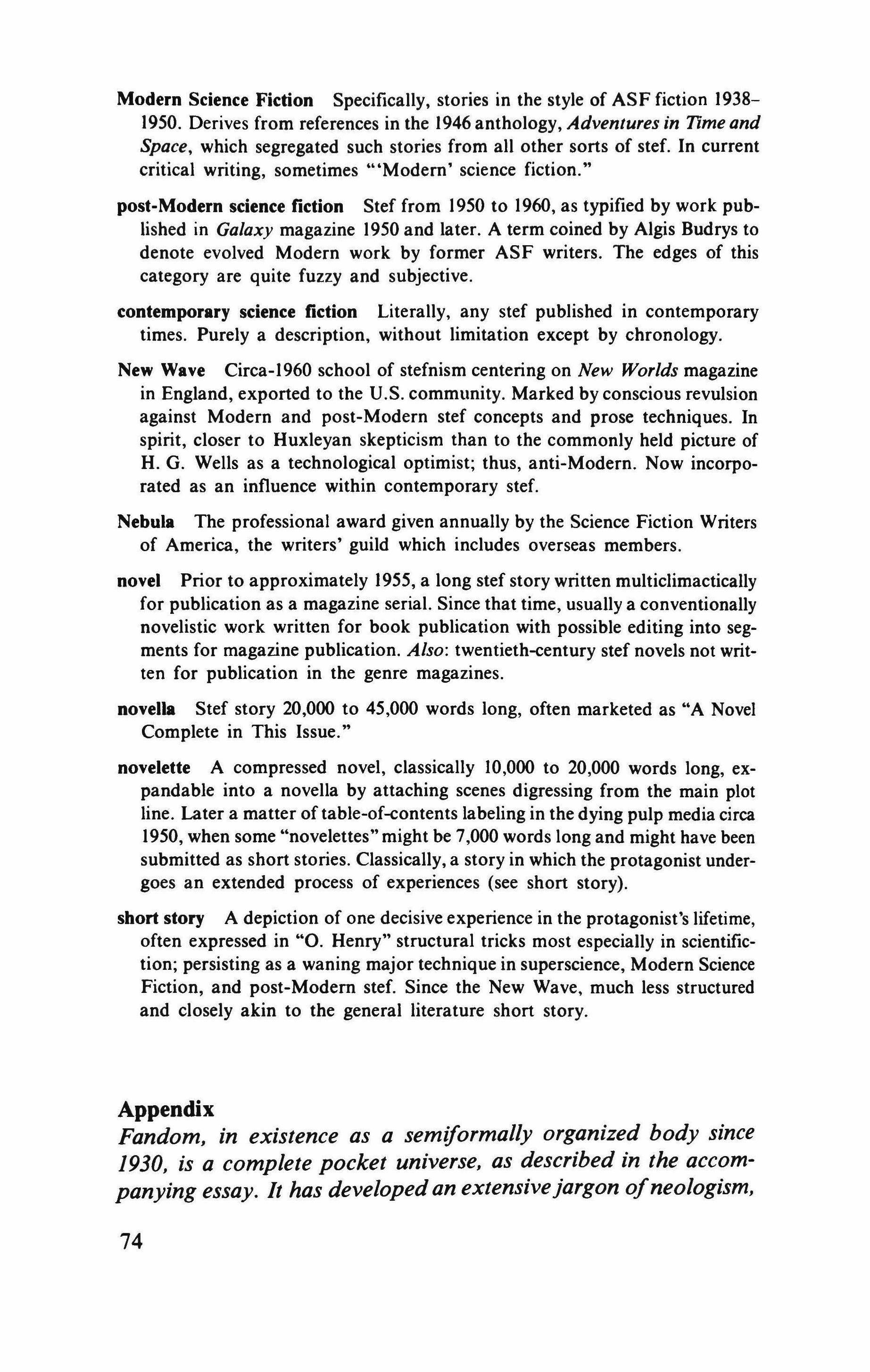
Modern Science Fiction Specifically, stories in the style of ASF fiction 19381950. Derives from references in the 1946 anthology, Adventures in TIme and Space, which segregated such stories from all other sorts of stef. In current critical writing, sometimes "'Modem' science fiction."
post-Modern science fiction Stef from 1950 to 1960, as typified by work published in Galaxy magazine 1950 and later. A term coined by Algis Budrys to denote evolved Modern work by former ASF writers. The edges of this category are quite fuzzy and subjective.
contemporary science fiction Literally, any stef published in contemporary times. Purely a description, without limitation except by chronology.
New Wave Circa-1960 school of stefnism centering on New Worlds magazine in England, exported to the U.S. community. Marked by conscious revulsion against Modem and post-Modern stef concepts and prose techniques. In spirit, closer to Huxleyan skepticism than to the commonly held picture of H. G. Wells as a technological optimist; thus, anti-Modern. Now incorporated as an influence within contemporary stef.
Nebula The professional award given annually by the Science Fiction Writers of America, the writers' guild which includes overseas members.
novel Prior to approximately 1955, a long stef story written multiclimactically for publication as a magazine serial. Since that time, usually a conventionally novelistic work written for book publication with possible editing into segments for magazine publication. Also: twentieth-century stef novels not written for publication in the genre magazines.
novella Stef story 20,000 to 45,000 words long, often marketed as "A Novel Complete in This Issue."
novelette A compressed novel, classically 10,000 to 20,000 words long, expandable into a novella by attaching scenes digressing from the main plot line. Later a matter of table-of-contents labeling in the dying pulp media circa 1950, when some "novelettes" might be 7,000 words long and might have been submitted as short stories. Classically, a story in which the protagonist undergoes an extended process of experiences (see short story).
short story A depiction of one decisive experience in the protagonist's lifetime, often expressed in "0. Henry" structural tricks most especially in scientifiction; persisting as a waning major technique in superscience, Modern Science Fiction, and post-Modern stef. Since the New Wave, much less structured and closely akin to the general literature short story.
Fandom, in existence as a semiformally organized body since 1930, is a complete pocket universe, as described in the accompanying essay. It has developed an extensivejargon ofneologism,

elision, and institutionalized typographical error, as well as aeronymy. All the terms listed below are now extant; usage by individual Fans varies infrequency and intensity, and terms go in and out offashion rapidly. Viability depends on utility.
BNF (obs.?) Big Name Fan. See smof.
crifanac (obs.?) Critical fan activity. Connotes impulsive involvement in large projects.
fUlwol The condition of focusing one's entire life-style on Fannish interests. From "Fandom is a way of life."
fijagh A more avocational approach. Fandom is just a goddam hobby.
filksong A song, to a borrowed or original tune, whose verses recount signal events in Fandom or in stef literature. Also: Amateur or professional selfcontained stef poetry set to music. An extensive filksinging subcommunity exists within Fandom.
gafiate To lose interest, particularly in Fandom or stef. From "Getting away from it all," the condition of gafia.
letterhack A fan whose prominence may be based entirely on the frequency with which he or she has letters published.
neofan Fledgling.
poctsard A postcard with a Fannish message.
prozine A professional stef magazine, as distinguished from fanzine.
sereon Serious, constructive. (Adj.)
smof Secret Master of Fandom. Implies exceptional and sometimes subtle influence in community affairs. Not totally synonymous with BNF, which may imply unseemly pushiness. See letterhack.
Trekkie (contemptuous) A sercon fan of the promotional material and events based on the Star Trek TV series, as distiguished from someone who simply enjoys watching rerun episodes. Trufans do not consider Star Trek conventions to be stefnal events, although they may attend them.
troran A secure member of Fandom.
-vention (also -clave, or -con). Combining form, as in Denvention, Nycon, MidAmericon. The exception is Boskone, a regional or world convention held annually in Boston; the Fannish pun alludes to an alien culture depicted in E. E. Smith's "Lensman" stef series. World conventions have occurred in Australia, England, Germany, and Canada in addition to the U.S. The world is now divided into zones, and Fans within the designated zone may bid on hosting the Worldcon in their city in the statutory rotation. Most regional and local-cons or -claves are rehearsals for Worldcon bids, but some, such as Midwescon, are simply annual relaxacons for old friends.
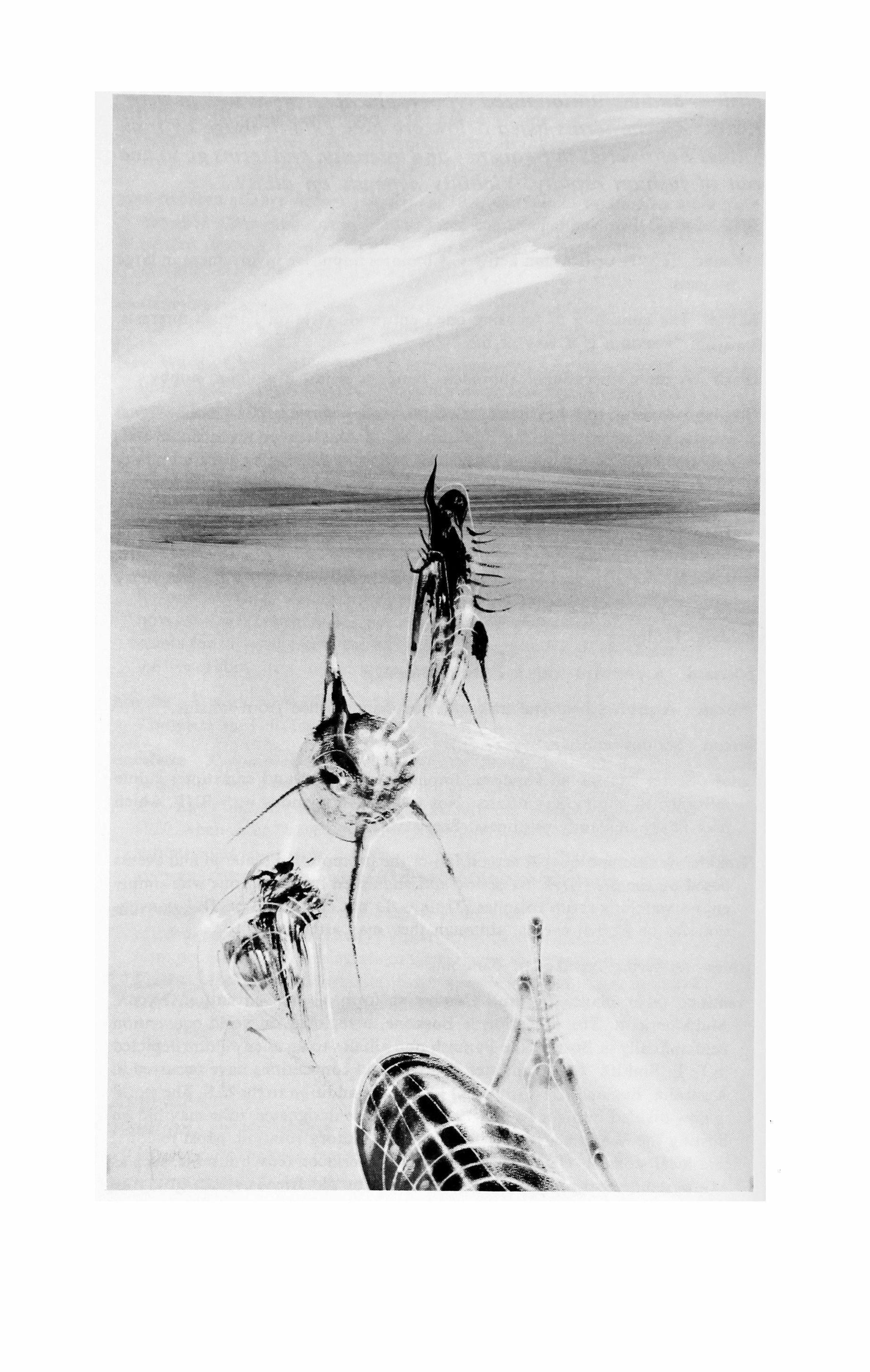
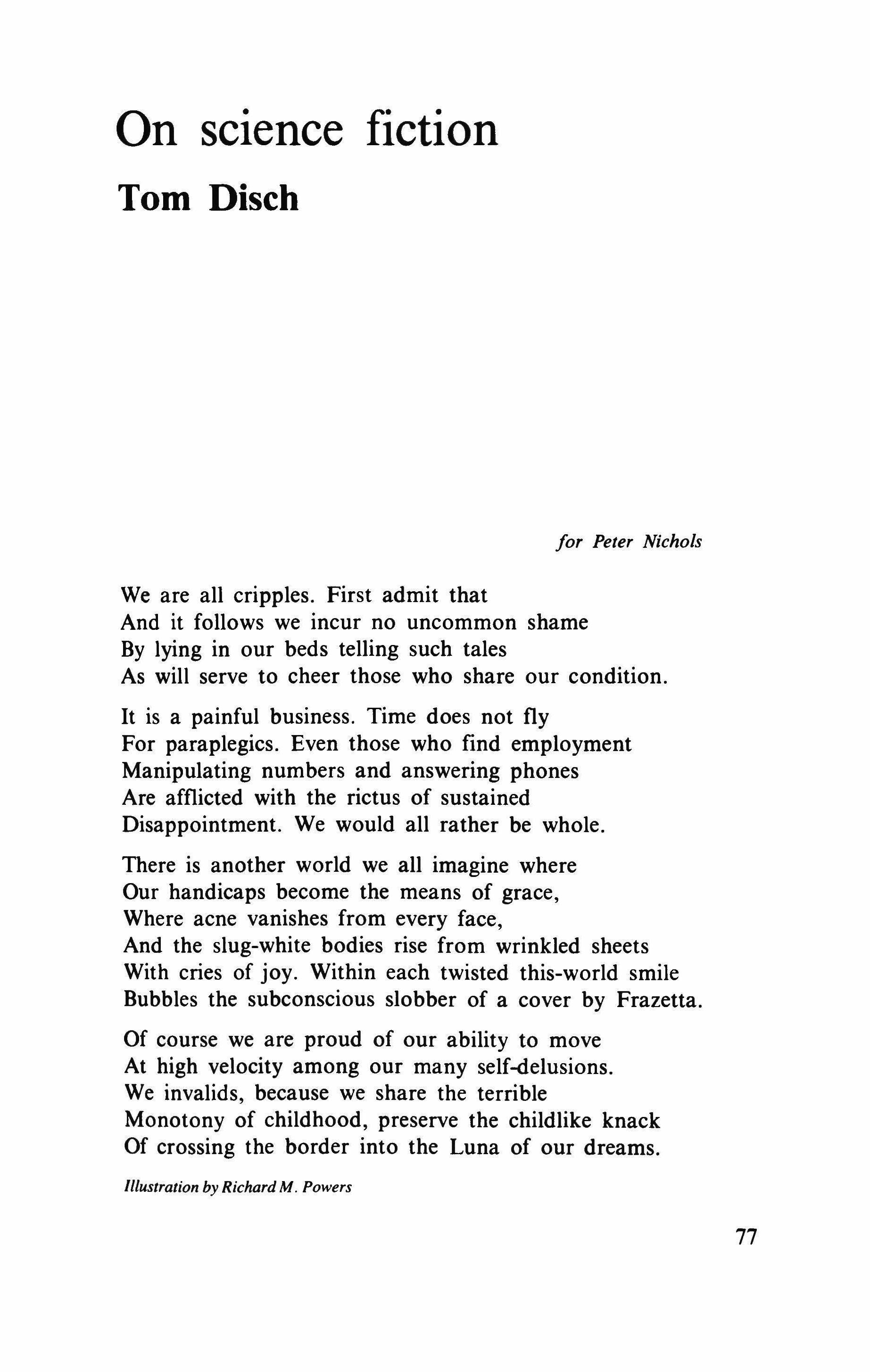
for Peter Nichols
We are all cripples. First admit that And it follows we incur no uncommon shame By lying in our beds telling such tales As will serve to cheer those who share our condition.
It is a painful business. Time does not fly For paraplegics. Even those who find employment Manipulating numbers and answering phones Are afflicted with the rictus of sustained Disappointment. We would all rather be whole.
There is another world we all imagine where Our handicaps become the means of grace, Where acne vanishes from every face, And the slug-white bodies rise from wrinkled sheets With cries of joy. Within each twisted this-world smile Bubbles the subconscious slobber of a cover by Frazetta.
Of course we are proud of our ability to move At high velocity among our many self-delusions. We invalids, because we share the terrible Monotony of childhood, preserve the childlike knack Of crossing the border into the Luna of our dreams.
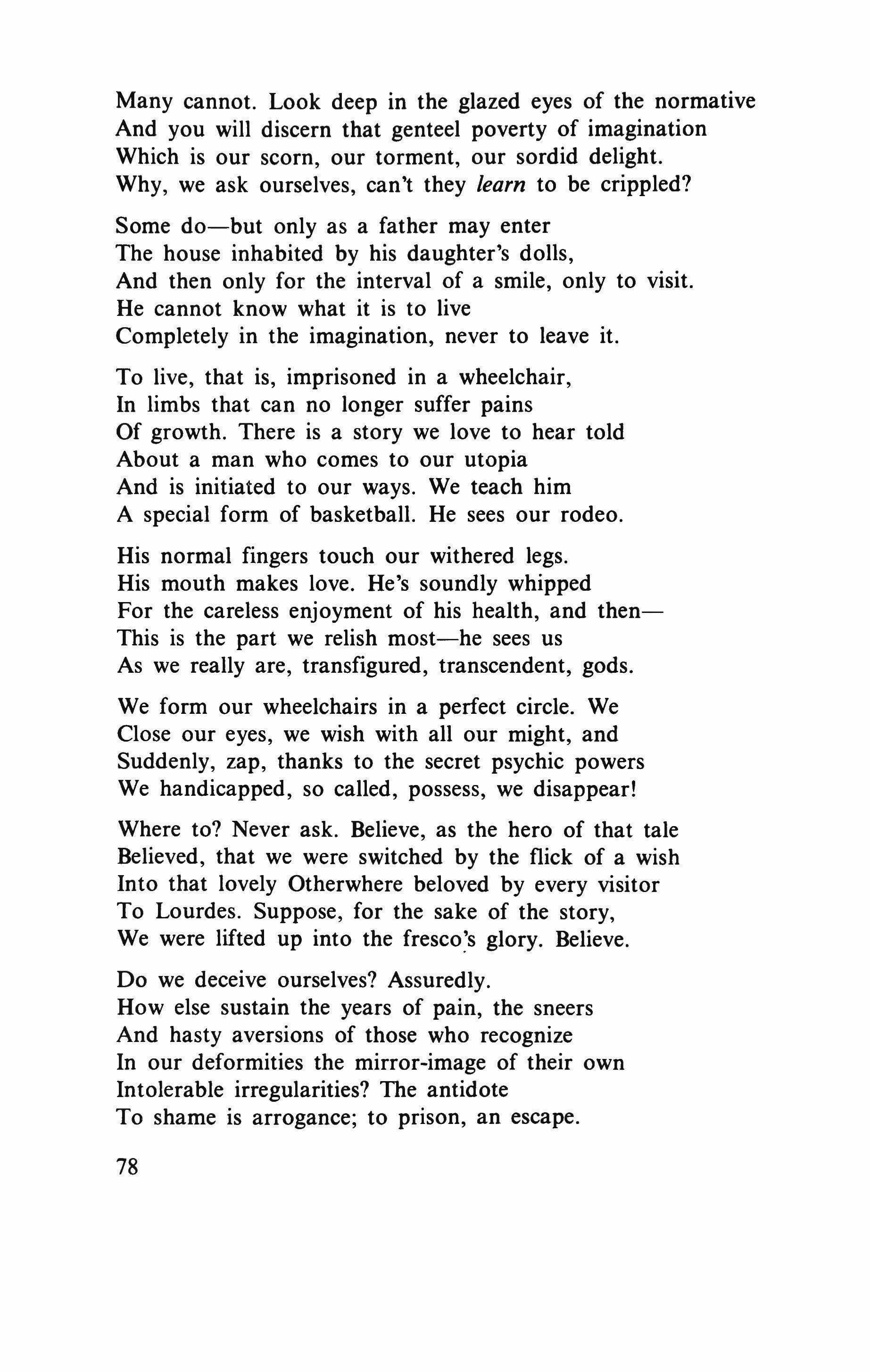
Many cannot. Look deep in the glazed eyes of the normative And you will discern that genteel poverty of imagination Which is our scorn, our torment, our sordid delight. Why, we ask ourselves, can't they learn to be crippled?
Some do-but only as a father may enter The house inhabited by his daughter's dolls, And then only for the interval of a smile, only to visit. He cannot know what it is to live Completely in the imagination, never to leave it.
To live, that is, imprisoned in a wheelchair, In limbs that can no longer suffer pains
Of growth. There is a story we love to hear told About a man who comes to our utopia And is initiated to our ways. We teach him A special form of basketball. He sees our rodeo.
His normal fingers touch our withered legs. His mouth makes love. He's soundly whipped For the careless enjoyment of his health, and thenThis is the part we relish most-he sees us As we really are, transfigured, transcendent, gods.
We form our wheelchairs in a perfect circle. We Close our eyes, we wish with all our might, and Suddenly, zap, thanks to the secret psychic powers We handicapped, so called, possess, we disappear!
Where to? Never ask. Believe, as the hero of that tale Believed, that we were switched by the flick of a wish Into that lovely Otherwhere beloved by every visitor To Lourdes. Suppose, for the sake of the story, We were lifted up into the fresco's glory. Believe.
Do we deceive ourselves? Assuredly. How else sustain the years of pain, the sneers And hasty aversions of those who recognize In our deformities the mirror-image of their own Intolerable irregularities? The antidote To shame is arrogance; to prison, an escape.
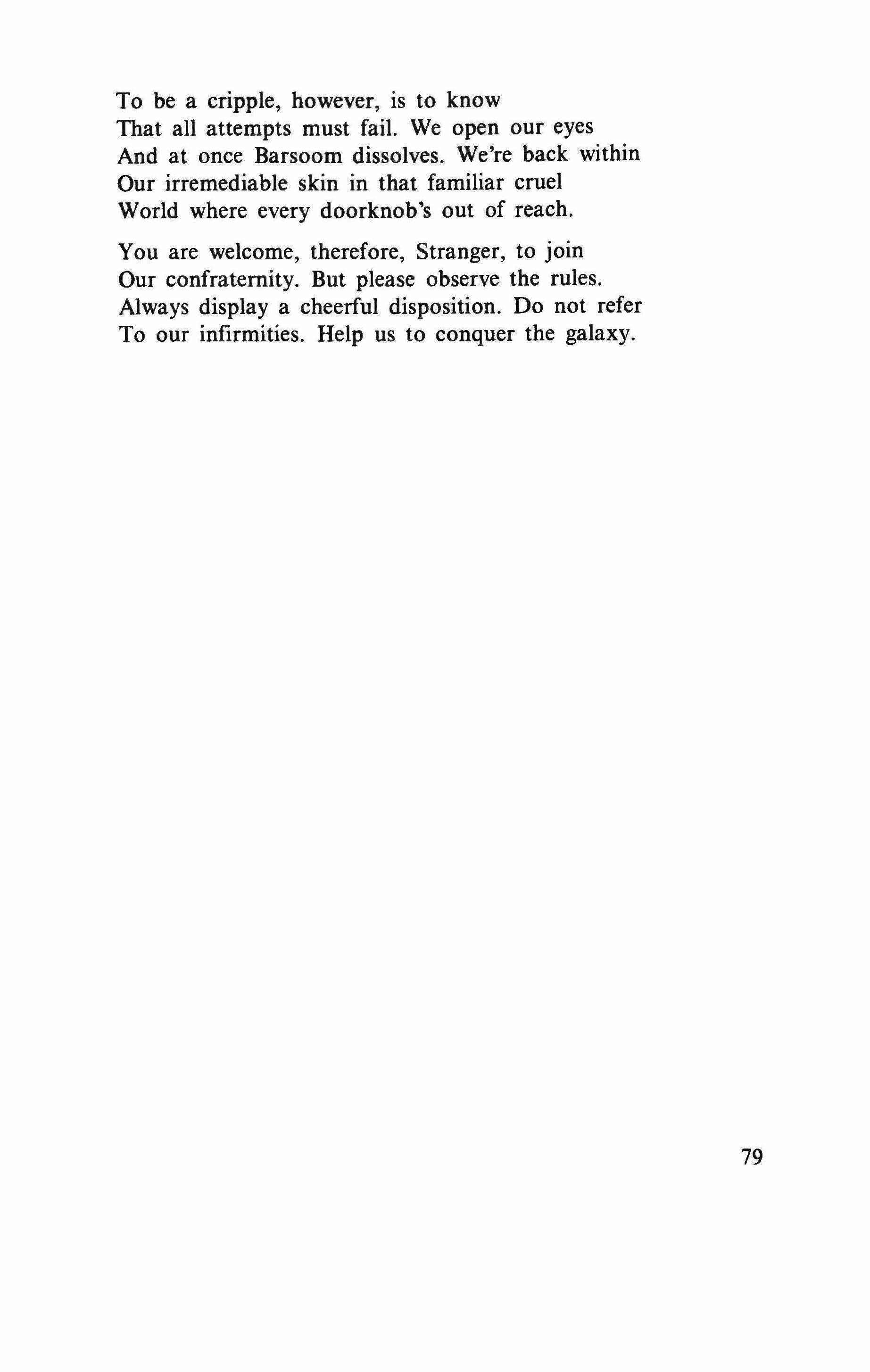
To be a cripple, however, is to know That all attempts must fail. We open our eyes And at once Barsoom dissolves. We're back within Our irremediable skin in that familiar cruel World where every doorknob's out of reach.
You are welcome, therefore, Stranger, to join Our confraternity. But please observe the rules. Always display a cheerful disposition. Do not refer To our infirmities. Help us to conquer the galaxy.
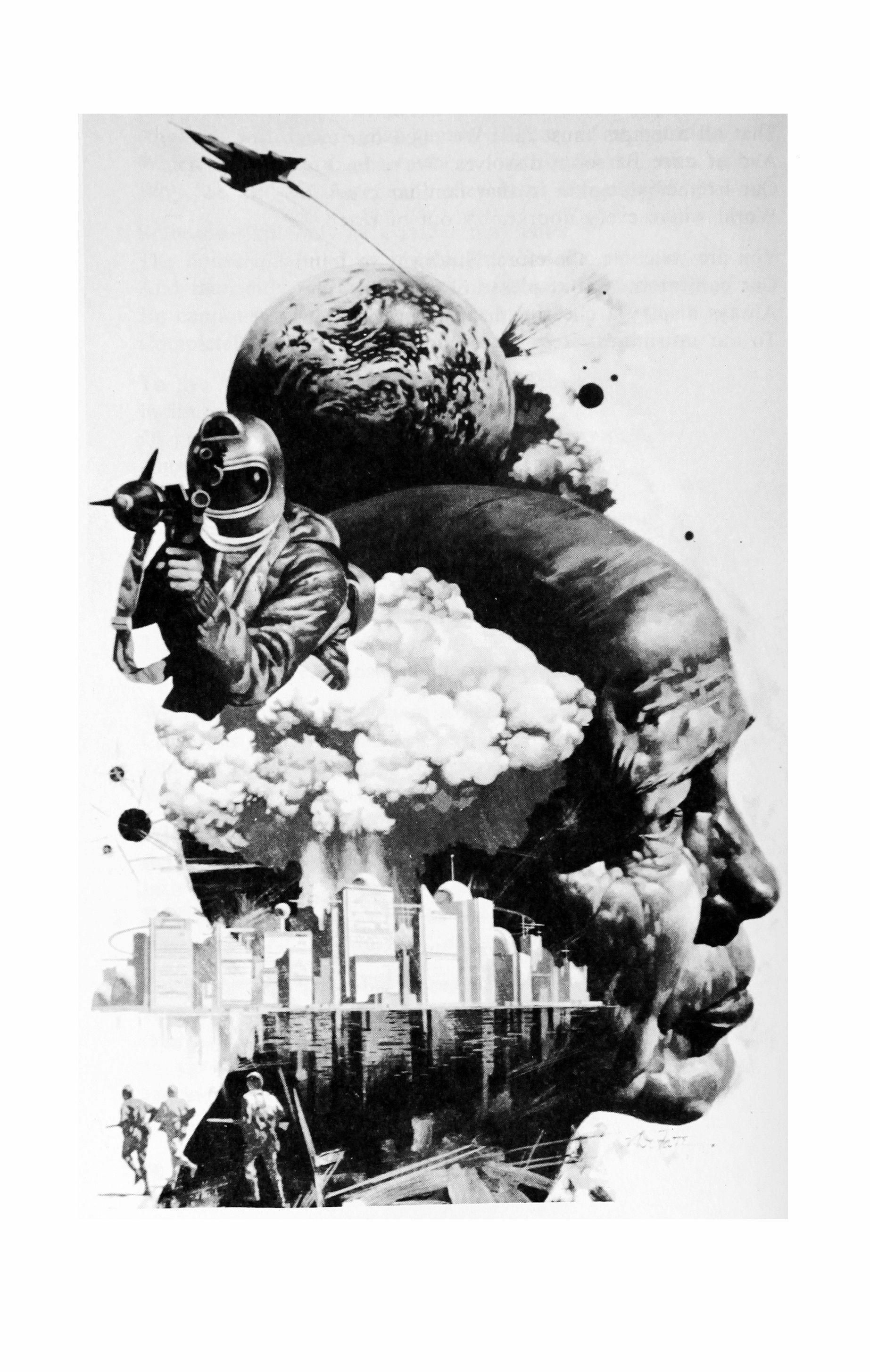

Synopsis of first section
The novel begins about a decade and a half after a series of mutations in common fungi have altered their reproductive capacities and resistances, causing a global failure of grain crops, the gradual demise of most plant life, and occasional disease effects in humans. The result is a restructuring of civilization. Populations have been moved into concentrated areas, principally near large bodies of water, so as to make more efficient the distribution of food products, grown on hydroponic farms or in enclosed areas. In America, the central part of the continent is called the Interior, is off limits by martial law, and is presumed to be an unpopulated waste. Population stability is strictly controlled by law, making interstate travel illegal, and societal organization focuses on producing the food necessary for survival.
Robert Russell is a scientist engaged in experiments in the culture of termites as a food source, reasoning that their ability to digest cellulose and convert it into a usable and even rich food makes this enterprise potentially valuable. His project, operated at a lumberyard on the northern Mississippi, is suspended for reasons of government priorities. He learns at the same time that central New York State, which is his original home, is being selected by the government as a test area for controlled repopula-
by Vincent Diltate
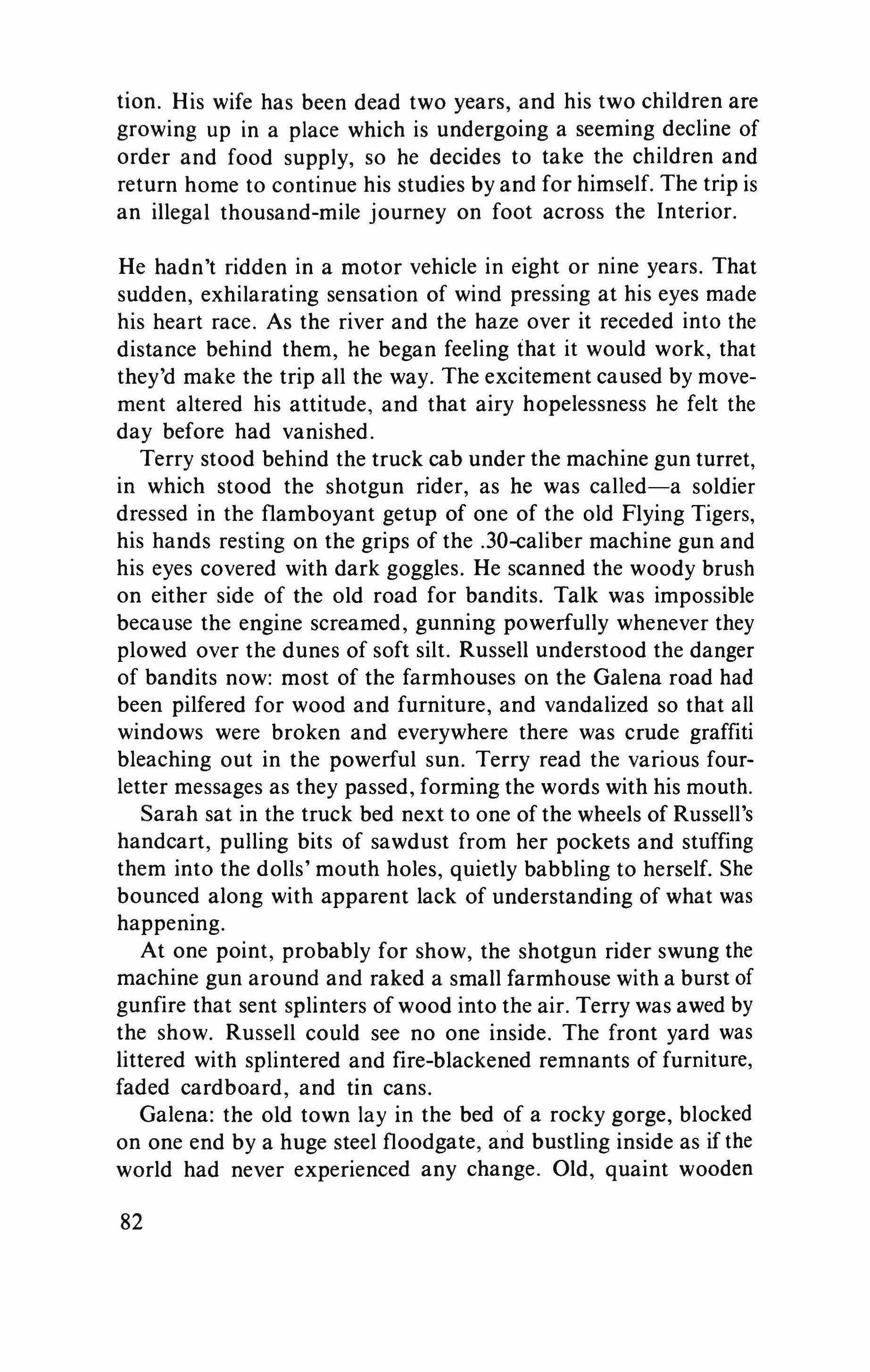
tion. His wife has been dead two years, and his two children are growing up in a place which is undergoing a seeming decline of order and food supply, so he decides to take the children and return home to continue his studies by and for himself. The trip is an illegal thousand-mile journey on foot across the Interior.
He hadn't ridden in a motor vehicle in eight or nine years. That sudden, exhilarating sensation of wind pressing at his eyes made his heart race. As the river and the haze over it receded into the distance behind them, he began feeling that it would work, that they'd make the trip all the way. The excitement caused by movement altered his attitude, and that airy hopelessness he felt the day before had vanished.
Terry stood behind the truck cab under the machine gun turret, in which stood the shotgun rider, as he was called-a soldier dressed in the flamboyant getup of one of the old Flying Tigers, his hands resting on the grips of the .30-caliber machine gun and his eyes covered with dark goggles. He scanned the woody brush on either side of the old road for bandits. Talk was impossible because the engine screamed, gunning powerfully whenever they plowed over the dunes of soft silt. Russell understood the danger of bandits now: most of the farmhouses on the Galena road had been pilfered for wood and furniture, and vandalized so that all windows were broken and everywhere there was crude graffiti bleaching out in the powerful sun. Terry read the various fourletter messages as they passed, forming the words with his mouth.
Sarah sat in the truck bed next to one of the wheels of Russell's handcart, pulling bits of sawdust from her pockets and stuffing them into the dolls' mouth holes, quietly babbling to herself. She bounced along with apparent lack of understanding of what was happening.
At one point, probably for show, the shotgun rider swung the machine gun around and raked a small farmhouse with a burst of gunfire that sent splinters of wood into the air. Terry was awed by the show. Russell could see no one inside. The front yard was littered with splintered and fire-blackened remnants of furniture, faded cardboard, and tin cans.
Galena: the old town lay in the bed of a rocky gorge, blocked on one end by a huge steel floodgate, and bustling inside as if the world had never experienced any change. Old, quaint wooden
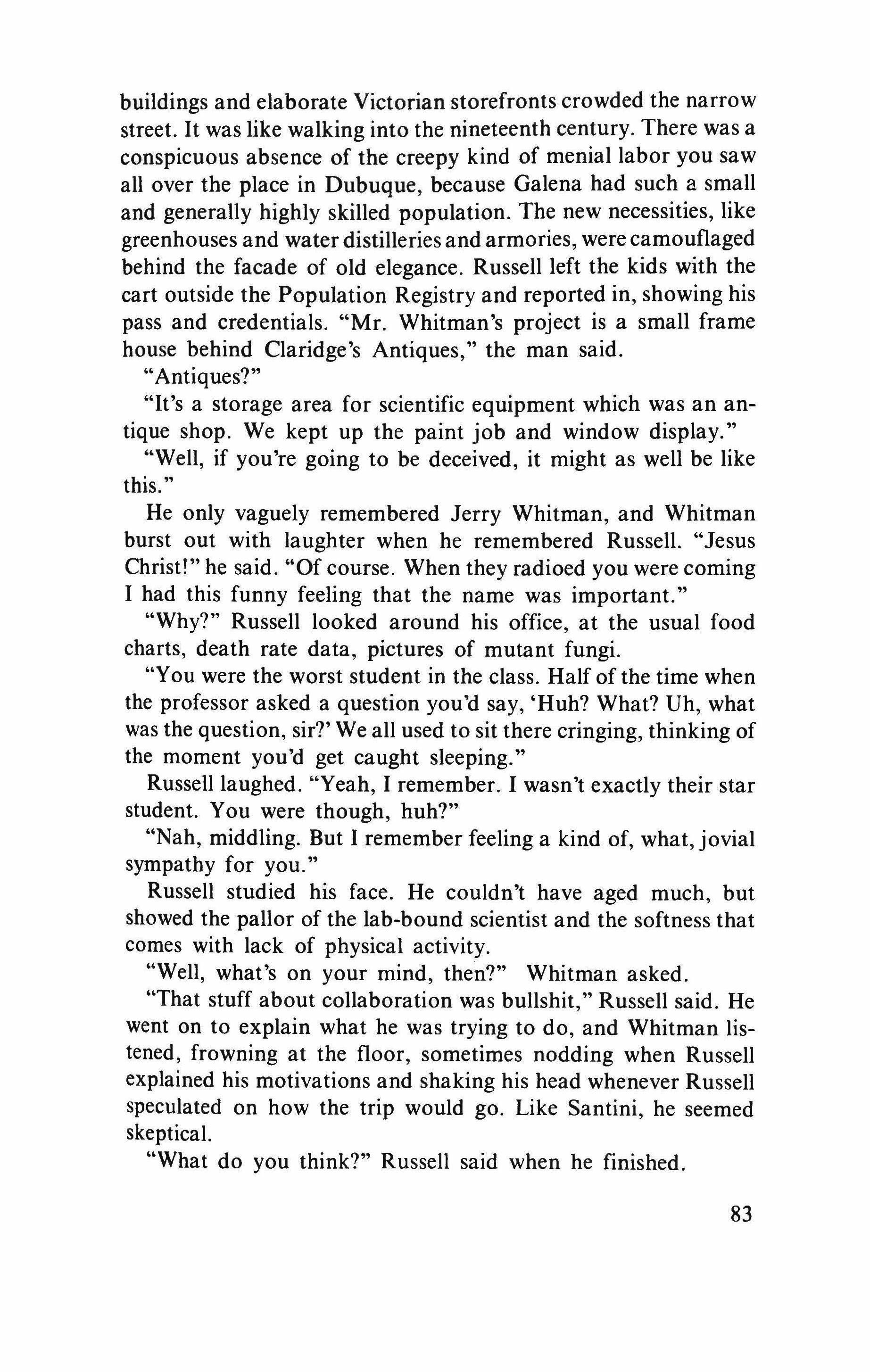
buildings and elaborate Victorian storefronts crowded the narrow street. It was like walking into the nineteenth century. There was a conspicuous absence of the creepy kind of menial labor you saw all over the place in Dubuque, because Galena had such a small and generally highly skilled population. The new necessities, like greenhouses and water distilleries and armories, were camouflaged behind the facade of old elegance. Russell left the kids with the cart outside the Population Registry and reported in, showing his pass and credentials. "Mr. Whitman's project is a small frame house behind Claridge's Antiques," the man said.
"It's a storage area for scientific equipment which was an antique shop. We kept up the paint job and window display."
"Well, if you're going to be deceived, it might as well be like this.
He only vaguely remembered Jerry Whitman, and Whitman burst out with laughter when he remembered Russell. "Jesus Christ!" he said. "Of course. When they radioed you were coming I had this funny feeling that the name was important."
"Why?" Russell looked around his office, at the usual food charts, death rate data, pictures of mutant fungi.
"You were the worst student in the class. Half of the time when the professor asked a question you'd say, 'Huh? What? Uh, what was the question, sir?' We all used to sit there cringing, thinking of the moment you'd get caught sleeping."
Russell laughed. "Yeah, I remember. I wasn't exactly their star student. You were though, huh?"
"Nah, middling. But I remember feeling a kind of, what, jovial sympathy for you."
Russell studied his face. He couldn't have aged much, but showed the pallor of the lab-bound scientist and the softness that comes with lack of physical activity.
"Well, what's on your mind, then?" Whitman asked.
"That stuff about collaboration was bullshit," Russell said. He went on to explain what he was trying to do, and Whitman listened, frowning at the floor, sometimes nodding when Russell explained his motivations and shaking his head whenever Russell speculated on how the trip would go. Like Santini, he seemed skeptical.
"What do you think?" Russell said when he finished.
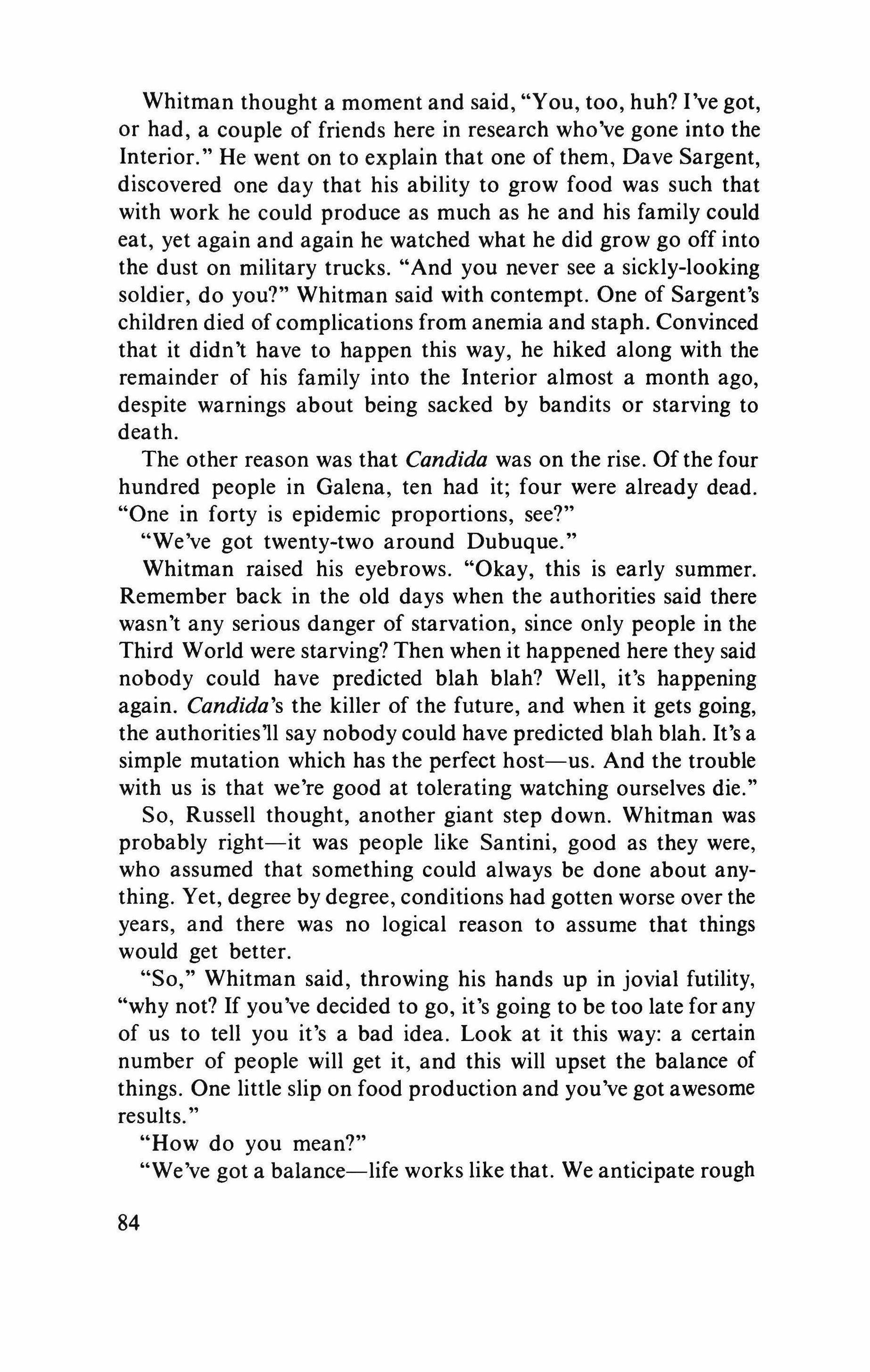
Whitman thought a moment and said, "You, too, huh? I've got, or had, a couple of friends here in research who've gone into the Interior." He went on to explain that one of them, Dave Sargent, discovered one day that his ability to grow food was such that with work he could produce as much as he and his family could eat, yet again and again he watched what he did grow go off into the dust on military trucks. "And you never see a sickly-looking soldier, do you?" Whitman said with contempt. One of Sargent's children died of complications from anemia and staph. Convinced that it didn't have to happen this way, he hiked along with the remainder of his family into the Interior almost a month ago, despite warnings about being sacked by bandits or starving to death.
The other reason was that Candida was on the rise. Of the four hundred people in Galena, ten had it; four were already dead. "One in forty is epidemic proportions, see?"
"We've got twenty-two around Dubuque."
Whitman raised his eyebrows. "Okay, this is early summer. Remember back in the old days when the authorities said there wasn't any serious danger of starvation, since only people in the Third World were starving? Then when it happened here they said nobody could have predicted blah blah? Well, it's happening again. Candida's the killer of the future, and when it gets going, the authorities'll say nobody could have predicted blah blah. It's a simple mutation which has the perfect host-us. And the trouble with us is that we're good at tolerating watching ourselves die."
So, Russell thought, another giant step down. Whitman was probably right-it was people like Santini, good as they were, who assumed that something could always be done about anything. Yet, degree by degree, conditions had gotten worse over the years, and there was no logical reason to assume that things would get better.
"So," Whitman said, throwing his hands up in jovial futility, "why not? If you've decided to go, it's going to be too late for any of us to tell you it's a bad idea. Look at it this way: a certain number of people will get it, and this will upset the balance of things. One little slip on food production and you've got awesome results.
"How do you mean?"
"We've got a balance-life works like that. We anticipate rough
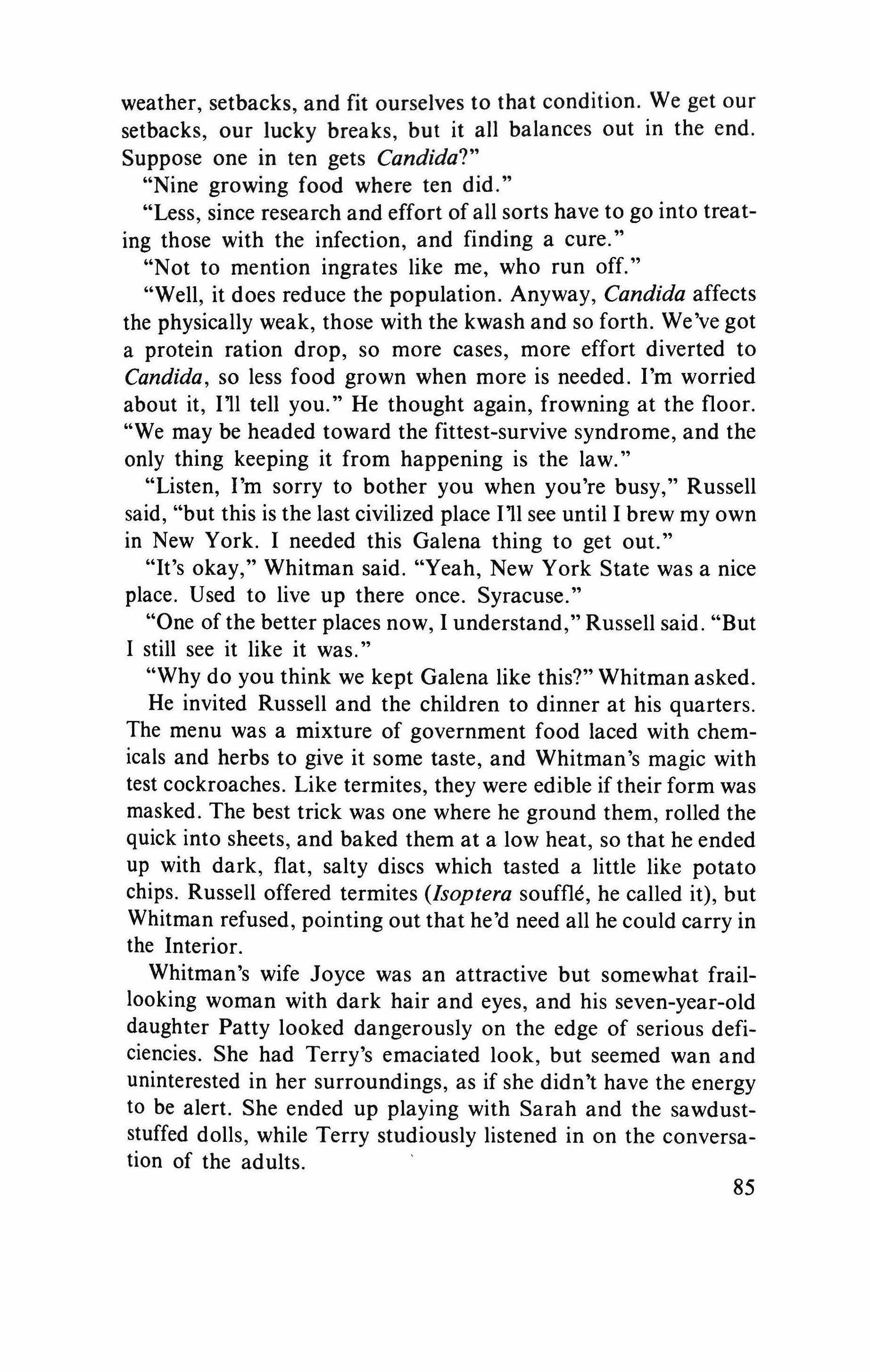
weather, setbacks, and fit ourselves to that condition. We get our setbacks, our lucky breaks, but it all balances out in the end.
Suppose one in ten gets Candida?"
"Nine growing food where ten did."
"Less, since research and effort of all sorts have to go into treating those with the infection, and finding a cure."
"Not to mention ingrates like me, who run off."
"Well, it does reduce the population. Anyway, Candida affects the physically weak, those with the kwash and so forth. We've got a protein ration drop, so more cases, more effort diverted to Candida, so less food grown when more is needed. I'm worried about it, I'll tell you." He thought again, frowning at the floor. "We may be headed toward the fittest-survive syndrome, and the only thing keeping it from happening is the law."
"Listen, I'm sorry to bother you when you're busy," Russell said, "but this is the last civilized place I'll see until I brew my own in New York. I needed this Galena thing to get out."
"It's okay," Whitman said. "Yeah, New York State was a nice place. Used to live up there once. Syracuse."
"One of the better places now, I understand," Russell said. "But I still see it like it was."
"Why do you think we kept Galena like this?" Whitman asked. He invited Russell and the children to dinner at his quarters. The menu was a mixture of government food laced with chemicals and herbs to give it some taste, and Whitman's magic with test cockroaches. Like termites, they were edible if their form was masked. The best trick was one where he ground them, rolled the quick into sheets, and baked them at a low heat, so that he ended up with dark, flat, salty discs which tasted a little like potato chips. Russell offered termites (lsoptera souffle, he called it), but Whitman refused, pointing out that he'd need all he could carry in the Interior.
Whitman's wife Joyce was an attractive but somewhat fraillooking woman with dark hair and eyes, and his seven-year-old daughter Patty looked dangerously on the edge of serious deficiencies. She had Terry's emaciated look, but seemed wan and uninterested in her surroundings, as if she didn't have the energy to be alert. She ended up playing with Sarah and the sawduststuffed dolls, while Terry studiously listened in on the conversation of the adults.
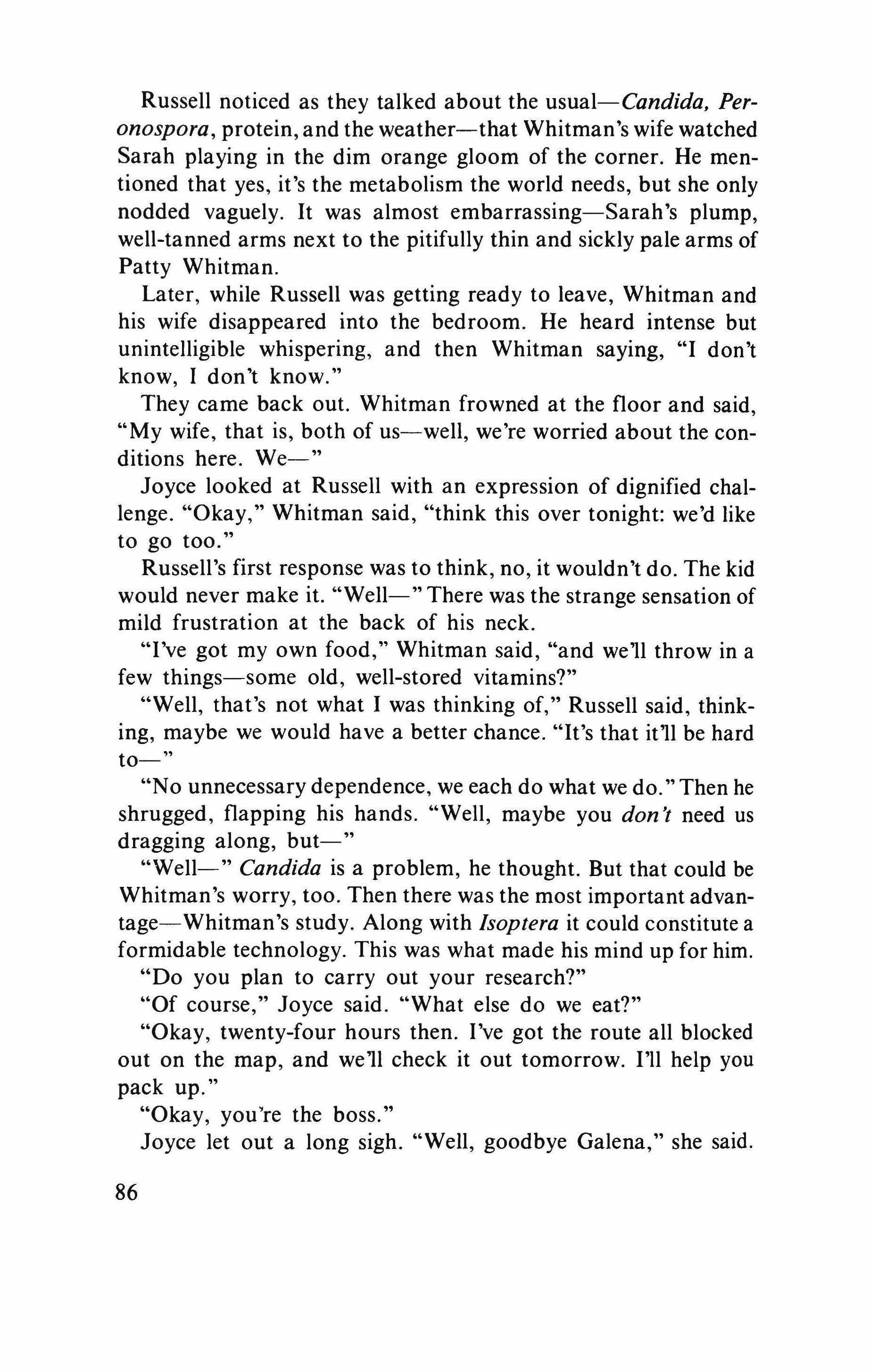
Russell noticed as they talked about the usual-Candida, Peronospora, protein, and the weather-that Whitman's wife watched Sarah playing in the dim orange gloom of the corner. He mentioned that yes, it's the metabolism the world needs, but she only nodded vaguely. It was almost embarrassing-Sarah's plump, well-tanned arms next to the pitifully thin and sickly pale arms of Patty Whitman.
Later, while Russell was getting ready to leave, Whitman and his wife disappeared into the bedroom. He heard intense but unintelligible Whispering, and then Whitman saying, "I don't know, I don't know."
They came back out. Whitman frowned at the floor and said, "My wife, that is, both of us-well, we're worried about the conditions here. We-"
Joyce looked at Russell with an expression of dignified challenge. "Okay," Whitman said, "think this over tonight: we'd like to go too."
Russell's first response was to think, no, it wouldn't do. The kid would never make it. "Well-" There was the strange sensation of mild frustration at the back of his neck.
"I've got my own food," Whitman said, "and well throw in a few things-some old, well-stored vitamins?"
"Well, that's not what I was thinking of," Russell said, thinking, maybe we would have a better chance. "It's that it'll be hard to-"
"N0 unnecessary dependence, we each do what we do." Then he shrugged, flapping his hands. "Well, maybe you don't need us dragging along, but-"
"Well-" Candida is a problem, he thought. But that could be Whitman's worry, too. Then there was the most important advantage-Whitman's study. Along with Isoptera it could constitute a formidable technology. This was what made his mind up for him.
"Do you plan to carry out your research?"
"Of course," Joyce said. "What else do we eat?"
"Okay, twenty-four hours then. I've got the route all blocked out on the map, and well check it out tomorrow. I'll help you pack up."
"Okay, you're the boss."
Joyce let out a long sigh. "Well, goodbye Galena," she said.
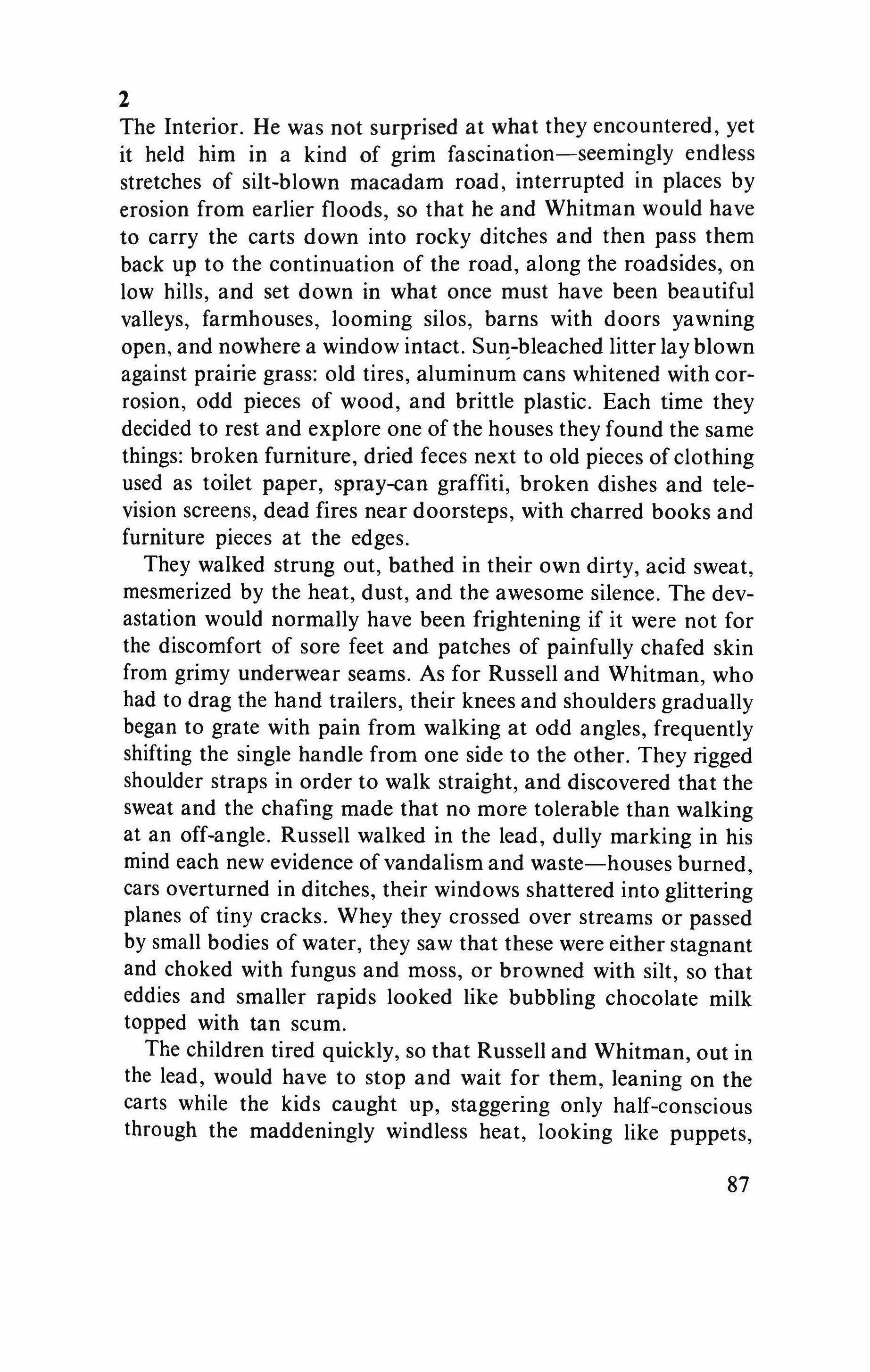
The Interior. He was not surprised at what they encountered, yet it held him in a kind of grim fascination-seemingly endless stretches of silt-blown macadam road, interrupted in places by erosion from earlier floods, so that he and Whitman would have to carry the carts down into rocky ditches and then pass them back up to the continuation of the road, along the roadsides, on low hills, and set down in what once must have been beautiful valleys, farmhouses, looming silos, barns with doors yawning open, and nowhere a window intact. Sun-bleached litter lay blown against prairie grass: old tires, aluminum cans whitened with corrosion, odd pieces of wood, and brittle plastic. Each time they decided to rest and explore one of the houses they found the same things: broken furniture, dried feces next to old pieces of clothing used as toilet paper, spray-can graffiti, broken dishes and television screens, dead fires near doorsteps, with charred books and furniture pieces at the edges.
They walked strung out, bathed in their own dirty, acid sweat, mesmerized by the heat, dust, and the awesome silence. The devastation would normally have been frightening if it were not for the discomfort of sore feet and patches of painfully chafed skin from grimy underwear seams. As for Russell and Whitman, who had to drag the hand trailers, their knees and shoulders gradually began to grate with pain from walking at odd angles, frequently shifting the single handle from one side to the other. They rigged shoulder straps in order to walk straight, and discovered that the sweat and the chafing made that no more tolerable than walking at an off-angle. Russell walked in the lead, dully marking in his mind each new evidence of vandalism and waste-houses burned, cars overturned in ditches, their windows shattered into glittering planes of tiny cracks. Whey they crossed over streams or passed by small bodies of water, they saw that these were either stagnant and choked with fungus and moss, or browned with silt, so that eddies and smaller rapids looked like bubbling chocolate milk topped with tan scum.
The children tired quickly, so that Russell and Whitman, out in the lead, would have to stop and wait for them, leaning on the carts while the kids caught up, staggering only half-conscious through the maddeningly windless heat, looking like puppets,
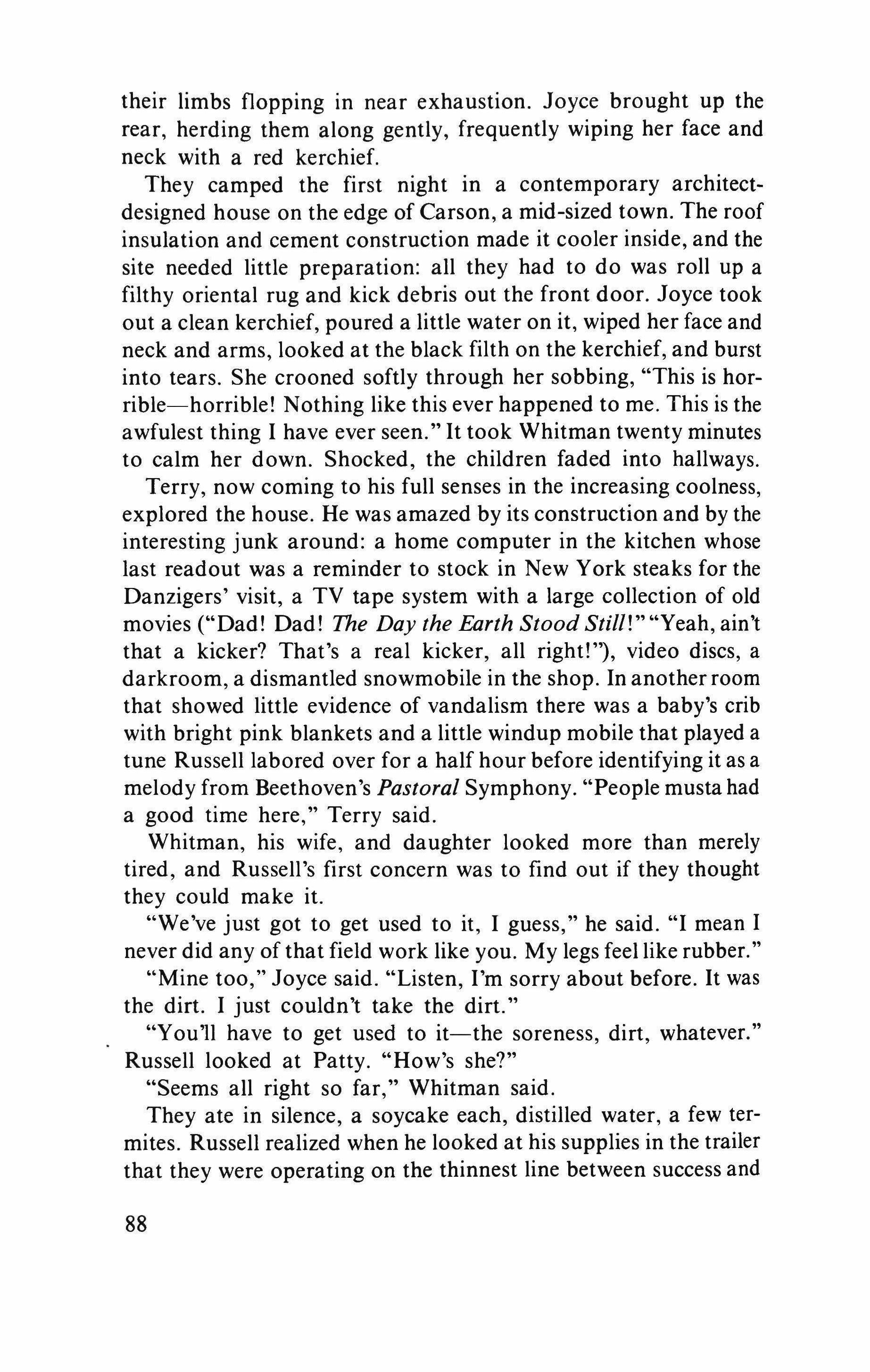
their limbs flopping in near exhaustion. Joyce brought up the rear, herding them along gently, frequently wiping her face and neck with a red kerchief.
They camped the first night in a contemporary architectdesigned house on the edge of Carson, a mid-sized town. The roof insulation and cement construction made it cooler inside, and the site needed little preparation: all they had to do was roll up a filthy oriental rug and kick debris out the front door. Joyce took out a clean kerchief, poured a little water on it, wiped her face and neck and arms, looked at the black filth on the kerchief, and burst into tears. She crooned softly through her sobbing, "This is horrible-horrible! Nothing like this ever happened to me. This is the awfulest thing I have ever seen." It took Whitman twenty minutes to calm her down. Shocked, the children faded into hallways.
Terry, now coming to his full senses in the increasing coolness, explored the house. He was amazed by its construction and by the interesting junk around: a home computer in the kitchen whose last readout was a reminder to stock in New York steaks for the Danzigers' visit, a TV tape system with a large collection of old movies ("Dad! Dad! The Day the Earth Stood Still!" "Yeah, ain't that a kicker? That's a real kicker, all right!''), video discs, a darkroom, a dismantled snowmobile in the shop. In another room that showed little evidence of vandalism there was a baby's crib with bright pink blankets and a little windup mobile that played a tune Russell labored over for a half hour before identifying it as a melody from Beethoven's Pastoral Symphony. "People musta had a good time here," Terry said.
Whitman, his wife, and daughter looked more than merely tired, and Russell's first concern was to find out if they thought they could make it.
"We've just got to get used to it, I guess," he said. "I mean I never did any of that field work like you. My legs feel like rubber."
"Mine too," Joyce said. "Listen, I'm sorry about before. It was the dirt. I just couldn't take the dirt."
"You11 have to get used to it-the soreness, dirt, whatever." Russell looked at Patty. "How's she?"
"Seems all right so far," Whitman said.
They ate in silence, a soycake each, distilled water, a few termites. Russell realized when he looked at his supplies in the trailer that they were operating on the thinnest line between success and
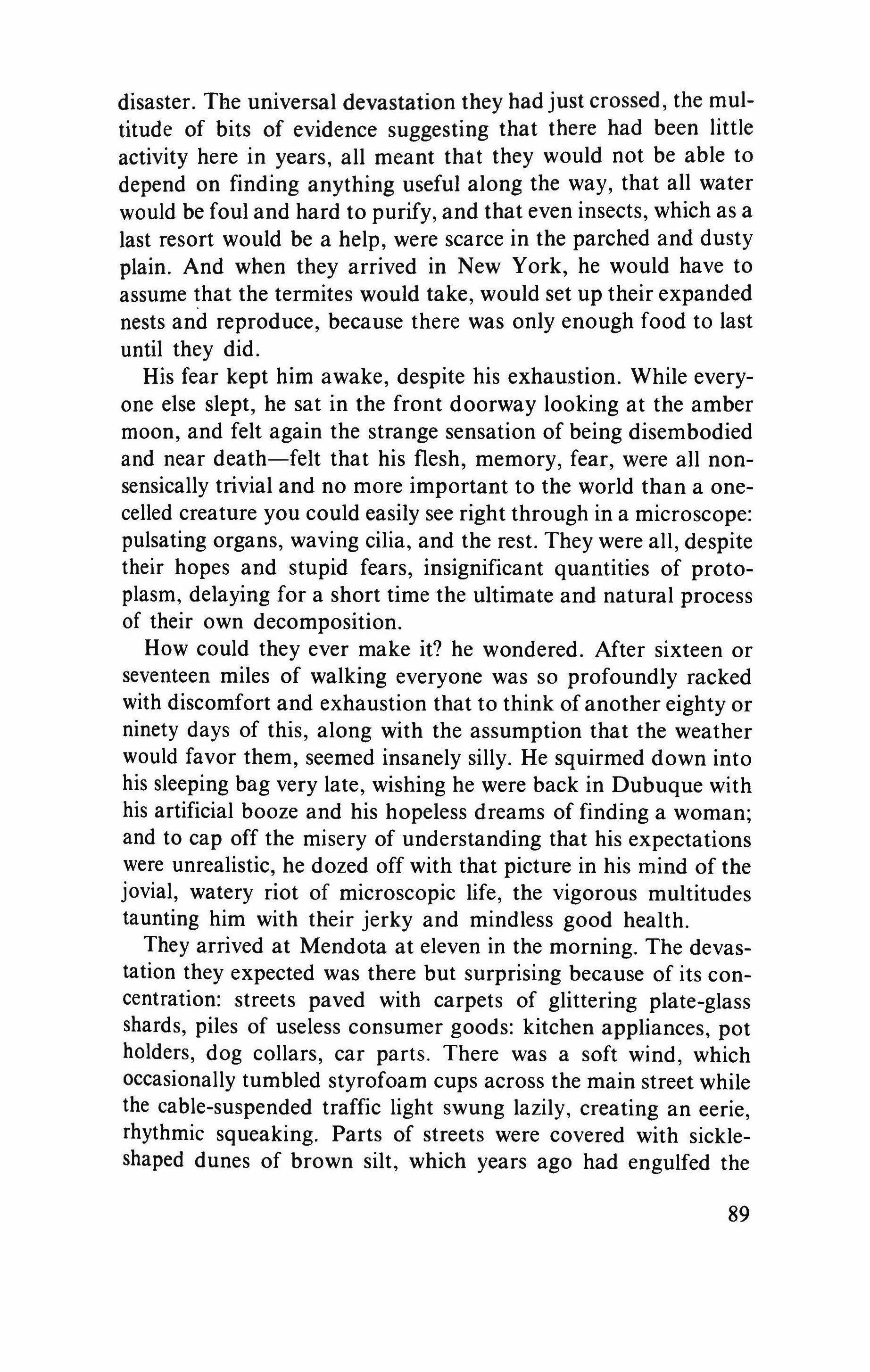
disaster. The universal devastation they had just crossed, the multitude of bits of evidence suggesting that there had been little activity here in years, all meant that they would not be able to depend on finding anything useful along the way, that all water would be foul and hard to purify, and that even insects, which as a last resort would be a help, were scarce in the parched and dusty plain. And when they arrived in New York, he would have to assume that the termites would take, would set up their expanded nests and reproduce, because there was only enough food to last until they did.
His fear kept him awake, despite his exhaustion. While everyone else slept, he sat in the front doorway looking at the amber moon, and felt again the strange sensation of being disembodied and near death-felt that his flesh, memory, fear, were all nonsensically trivial and no more important to the world than a onecelled creature you could easily see right through in a microscope: pulsating organs, waving cilia, and the rest. They were all, despite their hopes and stupid fears, insignificant quantities of protoplasm, delaying for a short time the ultimate and natural process of their own decomposition.
How could they ever make it? he wondered. After sixteen or seventeen miles of walking everyone was so profoundly racked with discomfort and exhaustion that to think of another eighty or ninety days of this, along with the assumption that the weather would favor them, seemed insanely silly. He squirmed down into his sleeping bag very late, wishing he were back in Dubuque with his artificial booze and his hopeless dreams of finding a woman; and to cap off the misery of understanding that his expectations were unrealistic, he dozed off with that picture in his mind of the jovial, watery riot of microscopic life, the vigorous multitudes taunting him with their jerky and mindless good health.
They arrived at Mendota at eleven in the morning. The devastation they expected was there but surprising because of its concentration: streets paved with carpets of glittering plate-glass shards, piles of useless consumer goods: kitchen appliances, pot holders, dog collars, car parts. There was a soft wind, which occasionally tumbled styrofoam cups across the main street while the cable-suspended traffic light swung lazily, creating an eerie, rhythmic squeaking. Parts of streets were covered with sickleshaped dunes of brown silt, which years ago had engulfed the
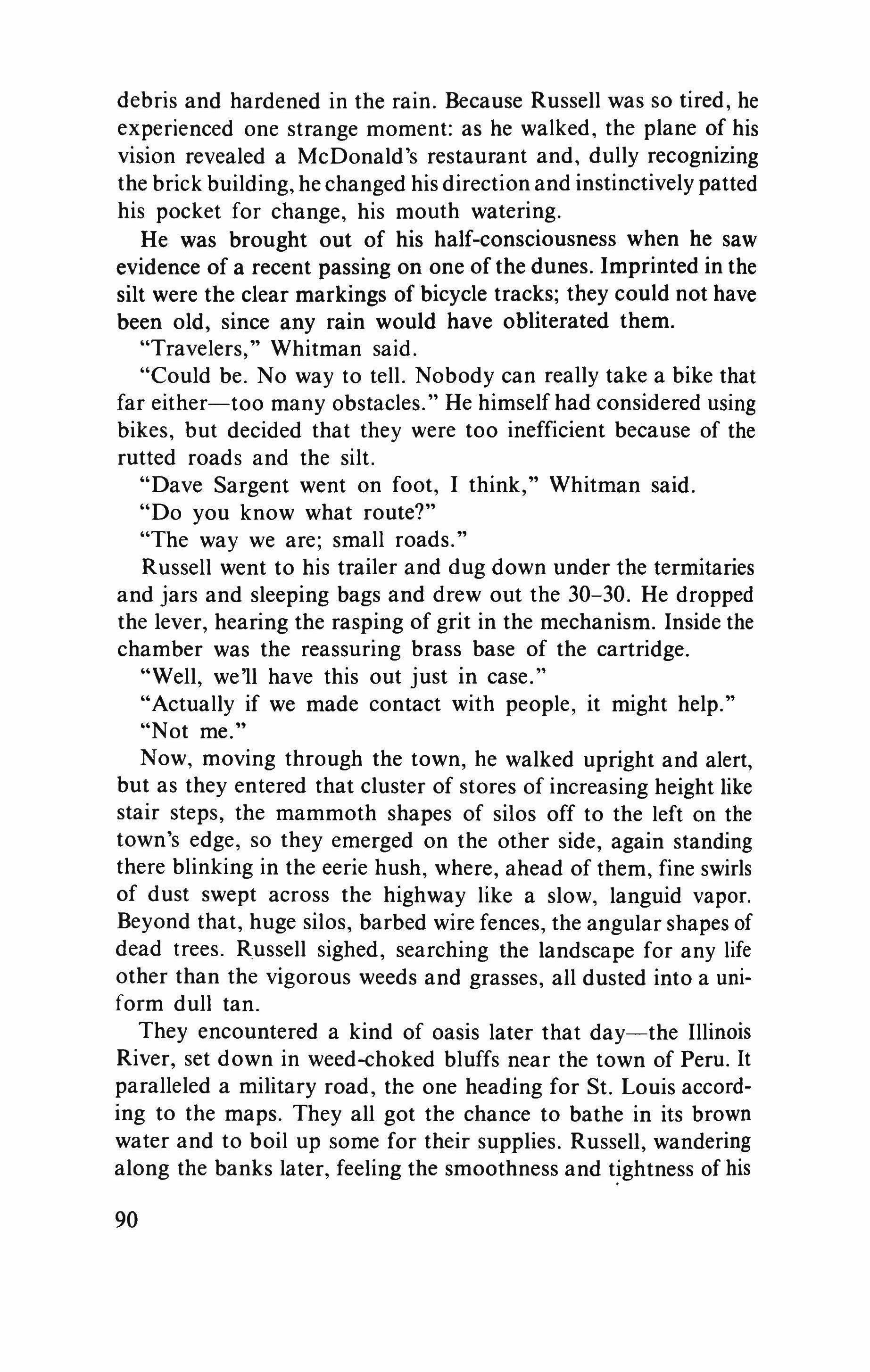
debris and hardened in the rain. Because Russell was so tired, he experienced one strange moment: as he walked, the plane of his vision revealed a McDonald's restaurant and, dully recognizing the brick building, he changed his direction and instinctively patted his pocket for change, his mouth watering.
He was brought out of his half-consciousness when he saw evidence of a recent passing on one of the dunes. Imprinted in the silt were the clear markings of bicycle tracks; they could not have been old, since any rain would have obliterated them.
"Travelers," Whitman said.
"Could be. No way to tell. Nobody can really take a bike that far either-too many obstacles." He himself had considered using bikes, but decided that they were too inefficient because of the rutted roads and the silt.
"Dave Sargent went on foot, I think," Whitman said.
"Do you know what route?"
"The way we are; small roads."
Russell went to his trailer and dug down under the termitaries and jars and sleeping bags and drew out the 30-30. He dropped the lever, hearing the rasping of grit in the mechanism. Inside the chamber was the reassuring brass base of the cartridge.
"Well, we'll have this out just in case."
"Actually if we made contact with people, it might help."
"Not me."
Now, moving through the town, he walked upright and alert, but as they entered that cluster of stores of increasing height like stair steps, the mammoth shapes of silos off to the left on the town's edge, so they emerged on the other side, again standing there blinking in the eerie hush, where, ahead of them, fine swirls of dust swept across the highway like a slow, languid vapor. Beyond that, huge silos, barbed wire fences, the angular shapes of dead trees. Russell sighed, searching the landscape for any life other than the vigorous weeds and grasses, all dusted into a uniform dull tan.
They encountered a kind of oasis later that day-the Illinois River, set down in weed-choked bluffs near the town of Peru. It paralleled a military road, the one heading for St. Louis according to the maps. They all got the chance to bathe in its brown water and to boil up some for their supplies. Russell, wandering along the banks later, feeling the smoothness and t�ghtness of his
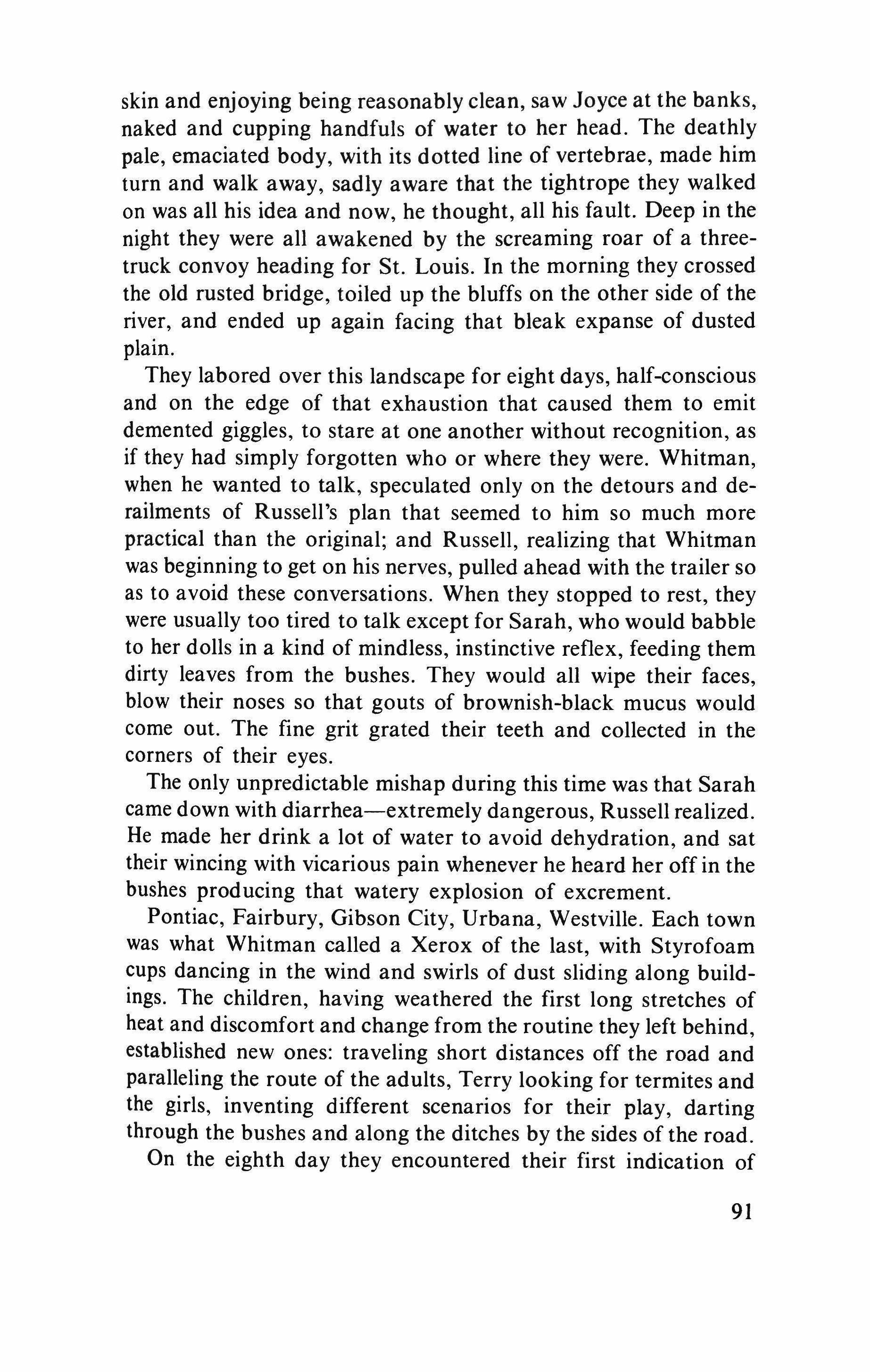
skin and enjoying being reasonably clean, saw Joyce at the banks, naked and cupping handfuls of water to her head. The deathly pale, emaciated body, with its dotted line of vertebrae, made him turn and walk away, sadly aware that the tightrope they walked on was all his idea and now, he thought, all his fault. Deep in the night they were all awakened by the screaming roar of a threetruck convoy heading for St. Louis. In the morning they crossed the old rusted bridge, toiled up the bluffs on the other side of the river, and ended up again facing that bleak expanse of dusted plain.
They labored over this landscape for eight days, half-conscious and on the edge of that exhaustion that caused them to emit demented giggles, to stare at one another without recognition, as if they had simply forgotten who or where they were. Whitman, when he wanted to talk, speculated only on the detours and derailments of Russell's plan that seemed to him so much more practical than the original; and Russell, realizing that Whitman was beginning to get on his nerves, pulled ahead with the trailer so as to avoid these conversations. When they stopped to rest, they were usually too tired to talk except for Sarah, who would babble to her dolls in a kind of mindless, instinctive reflex, feeding them dirty leaves from the bushes. They would all wipe their faces, blow their noses so that gouts of brownish-black mucus would corne out. The fine grit grated their teeth and collected in the corners of their eyes.
The only unpredictable mishap during this time was that Sarah carne down with diarrhea-extremely dangerous, Russell realized. He made her drink a lot of water to avoid dehydration, and sat their wincing with vicarious pain whenever he heard her off in the bushes producing that watery explosion of excrement.
Pontiac, Fairbury, Gibson City, Urbana, Westville. Each town was what Whitman called a Xerox of the last, with Styrofoam cups dancing in the wind and swirls of dust sliding along buildings. The children, having weathered the first long stretches of heat and discomfort and change from the routine they left behind, established new ones: traveling short distances off the road and paralleling the route of the adults, Terry looking for termites and the girls, inventing different scenarios for their play, darting through the bushes and along the ditches by the sides of the road.
On the eighth day they encountered their first indication of
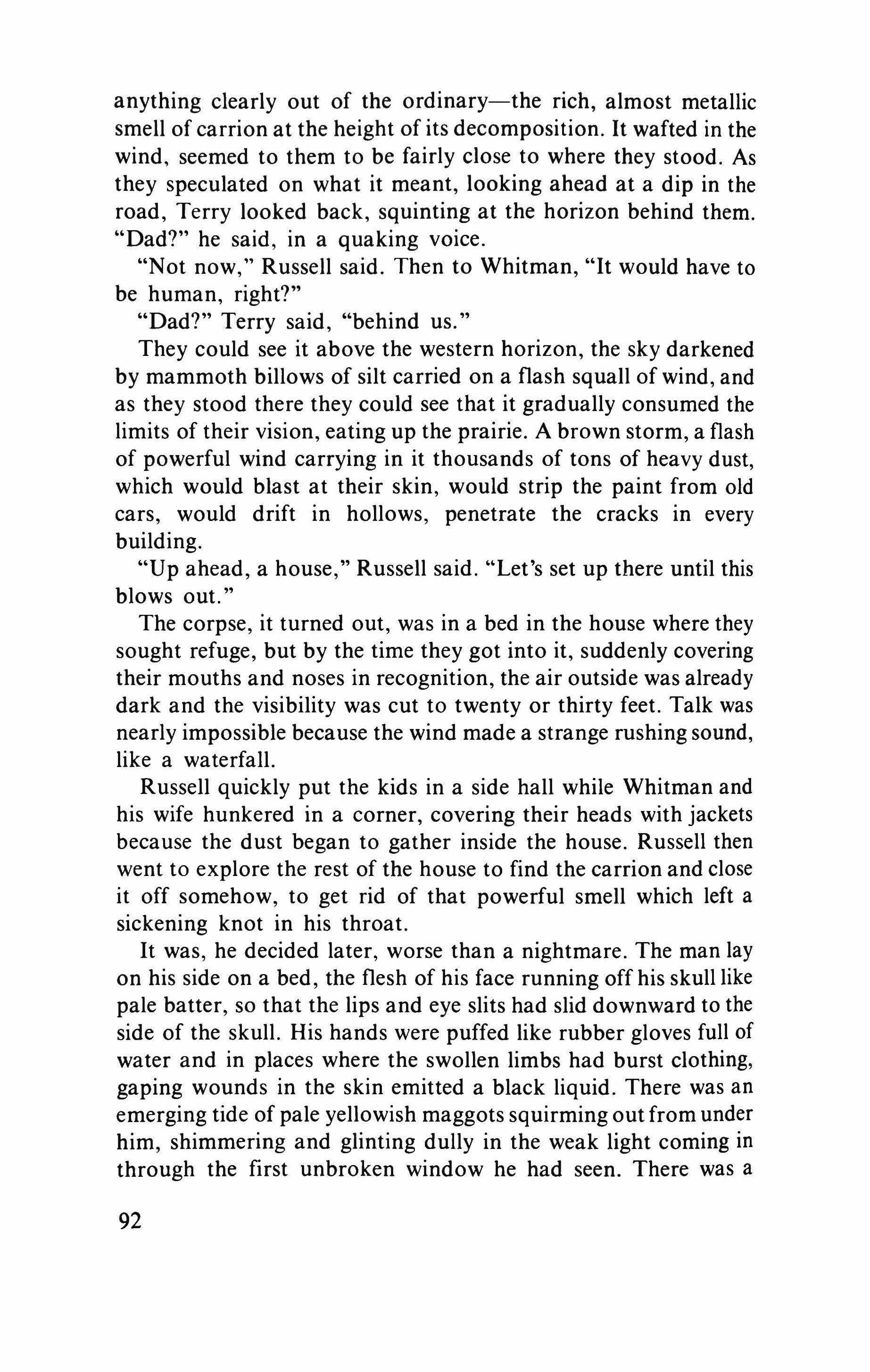
anything clearly out of the ordinary-the rich, almost metallic smell of carrion at the height of its decomposition. It wafted in the wind, seemed to them to be fairly close to where they stood. As they speculated on what it meant, looking ahead at a dip in the road, Terry looked back, squinting at the horizon behind them. "Dad?" he said, in a quaking voice.
"Not now," Russell said. Then to Whitman, "It would have to be human, right?"
"Dad?" Terry said, "behind us."
They could see it above the western horizon, the sky darkened by mammoth billows of silt carried on a flash squall of wind, and as they stood there they could see that it gradually consumed the limits of their vision, eating up the prairie. A brown storm, a flash of powerful wind carrying in it thousands of tons of heavy dust, which would blast at their skin, would strip the paint from old cars, would drift in hollows, penetrate the cracks in every building.
"Up ahead, a house," Russell said. "Let's set up there until this blows out."
The corpse, it turned out, was in a bed in the house where they sought refuge, but by the time they got into it, suddenly covering their mouths and noses in recognition, the air outside was already dark and the visibility was cut to twenty or thirty feet. Talk was nearly impossible because the wind made a strange rushing sound, like a waterfall.
Russell quickly put the kids in a side hall while Whitman and his wife hunkered in a corner, covering their heads with jackets because the dust began to gather inside the house. Russell then went to explore the rest of the house to find the carrion and close it off somehow, to get rid of that powerful smell which left a sickening knot in his throat.
It was, he decided later, worse than a nightmare. The man lay on his side on a bed, the flesh of his face running off his skull like pale batter, so that the lips and eye slits had slid downward to the side of the skull. His hands were puffed like rubber gloves full of water and in places where the swollen limbs had burst clothing, gaping wounds in the skin emitted a black liquid. There was an emerging tide of pale yellowish maggots squirming out from under him, shimmering and glinting dully in the weak light coming in through the first unbroken window he had seen. There was a
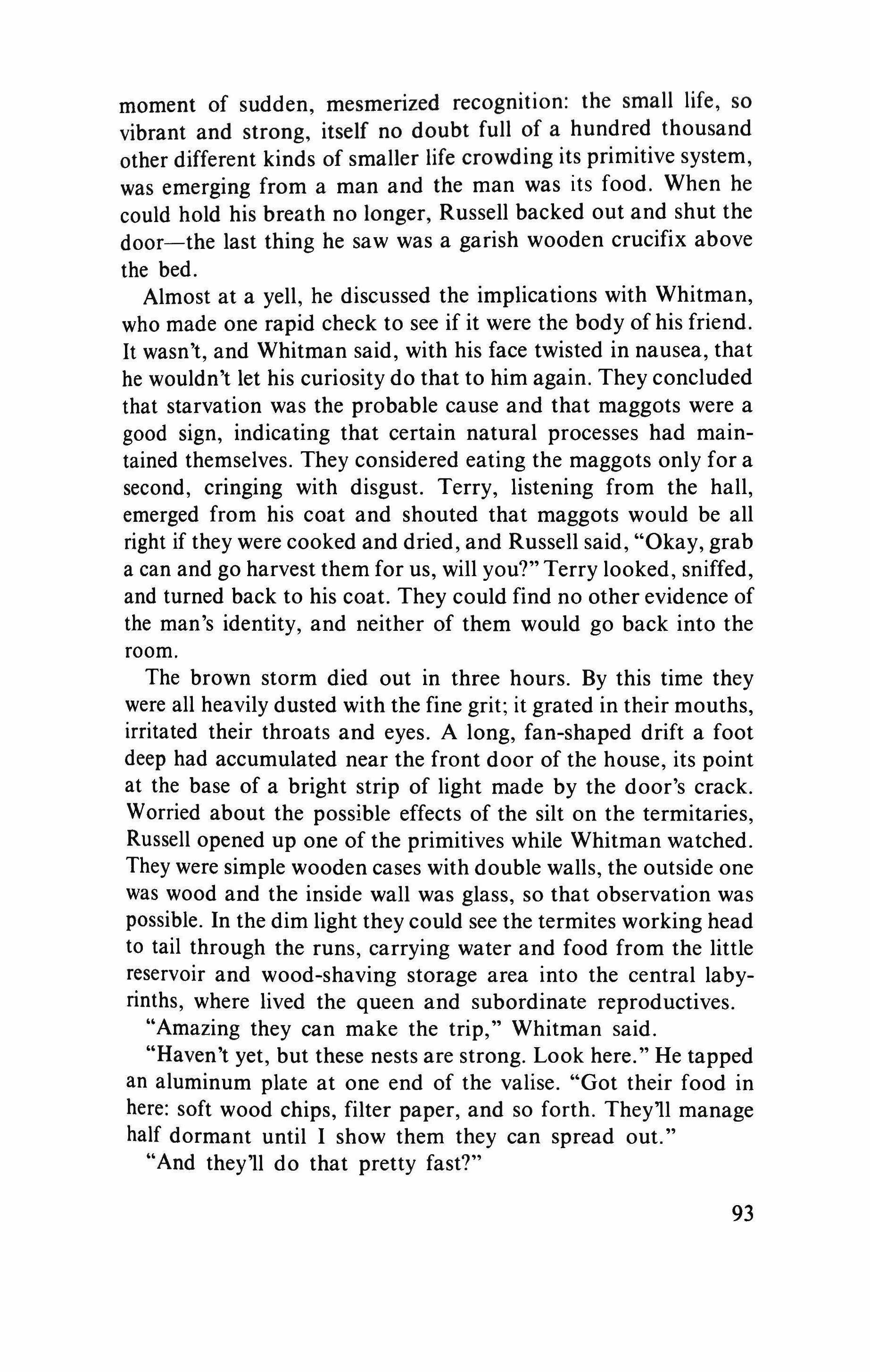
moment of sudden, mesmerized recogrution: the small life, so vibrant and strong, itself no doubt full of a hundred thousand other different kinds of smaller life crowding its primitive system, was emerging from a man and the man was its food. When he could hold his breath no longer, Russell backed out and shut the door-the last thing he saw was a garish wooden crucifix above the bed.
Almost at a yell, he discussed the implications with Whitman, who made one rapid check to see if it were the body of his friend. It wasn't, and Whitman said, with his face twisted in nausea, that he wouldn't let his curiosity do that to him again. They concluded that starvation was the probable cause and that maggots were a good sign, indicating that certain natural processes had maintained themselves. They considered eating the maggots only for a second, cringing with disgust. Terry, listening from the hall, emerged from his coat and shouted that maggots would be all right if they were cooked and dried, and Russell said, "Okay, grab a can and go harvest them for us, will you?" Terry looked, sniffed, and turned back to his coat. They could find no other evidence of the man's identity, and neither of them would go back into the room.
The brown storm died out in three hours. By this time they were all heavily dusted with the fine grit; it grated in their mouths, irritated their throats and eyes. A long, fan-shaped drift a foot deep had accumulated near the front door of the house, its point at the base of a bright strip of light made by the door's crack. Worried about the possible effects of the silt on the termitaries, Russell opened up one of the primitives while Whitman watched. They were simple wooden cases with double walls, the outside one was wood and the inside wall was glass, so that observation was possible. In the dim light they could see the termites working head to tail through the runs, carrying water and food from the little reservoir and wood-shaving storage area into the central labyrinths, where lived the queen and subordinate reproductives.
"Amazing they can make the trip," Whitman said.
"Haven't yet, but these nests are strong. Look here." He tapped an aluminum plate at one end of the valise. "Got their food in here: soft wood chips, filter paper, and so forth. They'll manage half dormant until I show them they can spread out."
"And they'll do that pretty fast?"

"Yeah. The main problem was the selection of particular species. There are eighteen hundred different ones. I took the hardiest primitives because they're the ones who digest cellulose; the more advanced ones culture fungus and moss. I left them, except for the Black Mound. Took them because of the strength of their nests."
"They don't taste half bad," Whitman said. "I prefer them to maggots."
They tacked on another two hours of walking, Russell in the lead pulling the trailer, Whitman struggling with his a few yards back. Because of the rain, the silt now had a thin layer of sticky muck on top, so that the thin wheels became thickly caked with it and shoes became heavy. The wind had cooled the air, so that by sunset, entering Wheaton, Illinois, they were grouped more closely rather than strung out, and were able to speak without becoming winded. The landscape did not change. Except for the dead traveler, whose image had burned itself into Russell's memory, there had been nothing remarkable, no hopeful sign for over a hundred miles. He knew that he should not expect one, that the Interior was uninhabited waste, yet his senses would sometimes buzz with a strange, inexplicable expectation-bike tracks, a dead man, and ahead maybe something else.
Which they found at sunset. A house which had been camped in recently, perhaps within the last three days. Whitman was almost breathless with optimism: was it Dave Sargent, the expert botanist? Or was this camp a kind of exploratory outpost for some settlement which was self-sustaining? Which would like nothing more than insect-culture technology?
Russell stood in the doorway with the coppery taste of fear in his mouth. For him it meant danger, the possibility of attack. Their food had to be worth more than gold, and their rifle was only a minor reassurance. Yes, in the corner he saw a tin can with water still in it, and over there a nearly undisturbed fire site, except for the silt from the brown storm. Terry, out in the front yard, slipped on nearly fresh excrement under the layer of silt and close to a soiled chiffon slip, the kind young girls used to wear to country dances. They saw a window recently cleaned for better visibility.
"I don't like it," Russell said. Terry, wiping his heel against the prairie grass, darted glances around him as if the producer of
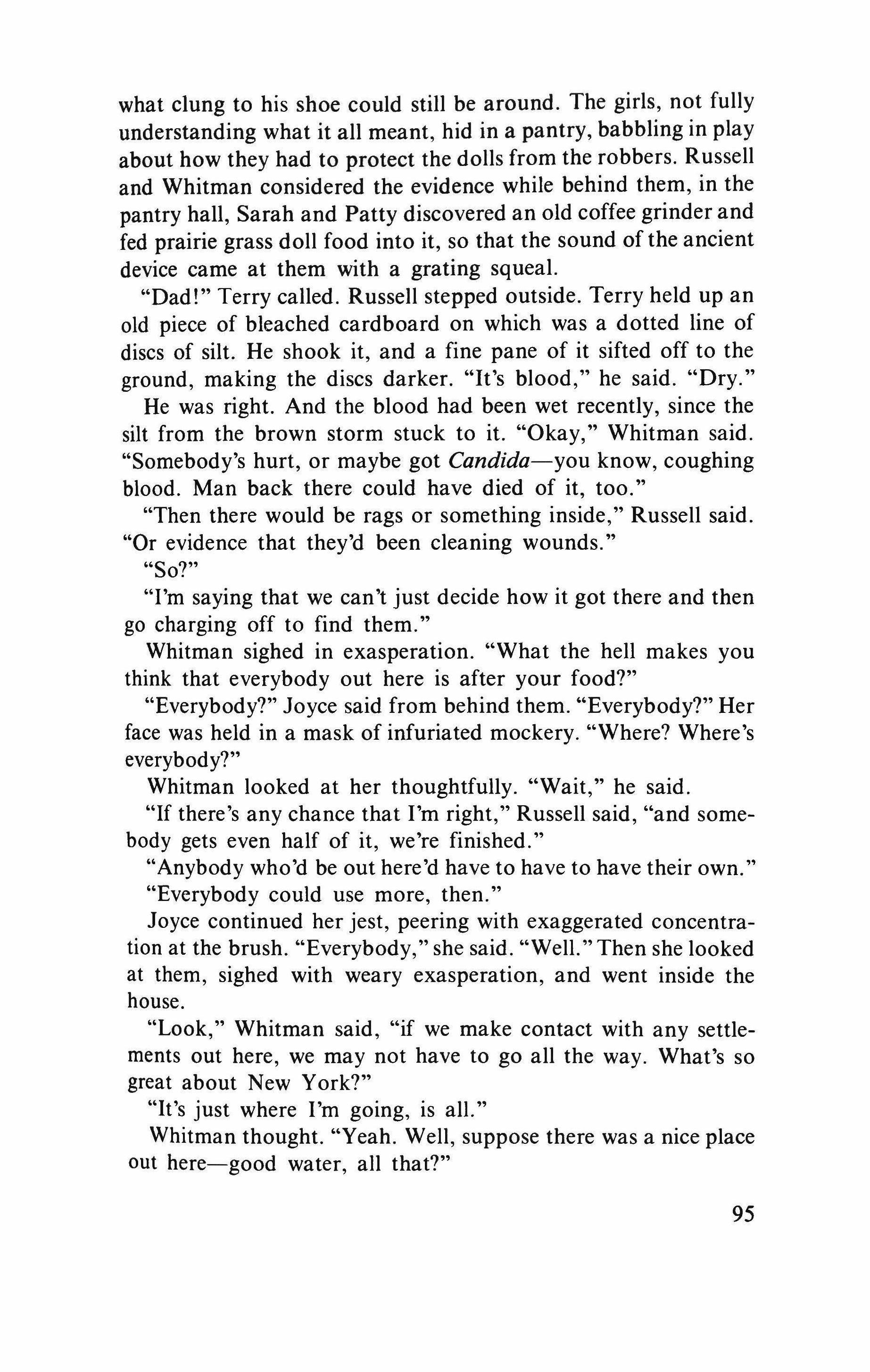
what clung to his shoe could still be around. The girls, not fully understanding what it all meant, hid in a pantry, babbling in play about how they had to protect the dolls from the robbers. Russell and Whitman considered the evidence while behind them, in the pantry hall, Sarah and Patty discovered an old coffee grinder and fed prairie grass doll food into it, so that the sound of the ancient device came at them with a grating squeal.
"Dad!" Terry called. Russell stepped outside. Terry held up an old piece of bleached cardboard on which was a dotted line of discs of silt. He shook it, and a fine pane of it sifted off to the ground, making the discs darker. "It's blood," he said. "Dry."
He was right. And the blood had been wet recently, since the silt from the brown storm stuck to it. "Okay," Whitman said. "Somebody's hurt, or maybe got Candida-you know, coughing blood. Man back there could have died of it, too."
"Then there would be rags or something inside," Russell said. "Or evidence that they'd been cleaning wounds."
"So?"
"I'm saying that we can't just decide how it got there and then go charging off to find them."
Whitman sighed in exasperation. "What the hell makes you think that everybody out here is after your food?"
"Everybody?" Joyce said from behind them. "Everybody?" Her face was held in a mask of infuriated mockery. "Where? Where's everybody?"
Whitman looked at her thoughtfully. "Wait," he said.
"If there's any chance that I'm right," Russell said, "and somebody gets even half of it, we're finished."
"Anybody who'd be out here'd have to have to have their own."
"Everybody could use more, then."
Joyce continued her jest, peering with exaggerated concentration at the brush. "Everybody," she said. "Well." Then she looked at them, sighed with weary exasperation, and went inside the house.
"Look," Whitman said, "if we make contact with any settlements out here, we may not have to go all the way. What's so great about New York?"
"It's just where I'm going, is all."
Whitman thought. "Yeah. Well, suppose there was a nice place out here-good water, all that?"

"I'm not trusting anybody," Russell said. "If they're anything like the people who live around the river, then I want nothing to do with them."
The last bit of evidence was the most enigmatic. On the front step of the house, partly embedded in a crack between two boards, there was a thick, translucent stain, not dry-a sort of leathery, gelatinous material. "Food?"
"Seems to be," Russell said. "Like-like bacon fat."
"Maybe some new preparation technique. Some way of refining food to make it portable?"
"Should I get the microscope?" Terry asked.
"No, we better stay mobile. I'd just as soon the trailers were ready to move."
They camped in the house, each family in a separate room. Russell slept with his hand on the rifle, within reach of the small bodies of the children. He was frequently awakened by strange sounds, one of which almost made him get up and poke the rifle into the living room before he realized that it was Whitman and his wife making love in the next room, a rhythmic thuddingfinally accentuated by sudden explosions of the woman's breath. Then there was suppressed masculine laughter. So, he thought, certain things endure after all. He was not reassured by the sound, nor did he feel any less alone than he had all his life.
In the morning their search for further evidence of life faded because the landscape held in it such a bleak consistency that they quickly seemed to forget they had seen anything except the stands of dead trees, the empty, musty silos, the ransacked houses, the bright, seemingly invulnerable hamburger stops and motels. Those tantalizing little suggestions, which had juiced Whitman's optimism as they had Russell's fear and suspicion, were behind them again, and now too insignificant to compete with what they saw stretching toward all horizons. Larger towns would make them cautious in their approach, but always they found the same central squares, churches, and courthouses with their bleached-out warning signs about private property and their dunes of silt penetrating small cracks in doorways. And the dried feces with soiled articles of clothing nearby. Yes, people had passed through, but when? Last year? Ten years ago, when that graffiti was sprayed on the wall of the library foyer commemorating a young man's sexual achievement with one Barbara Turkle? Likely she hasn't been
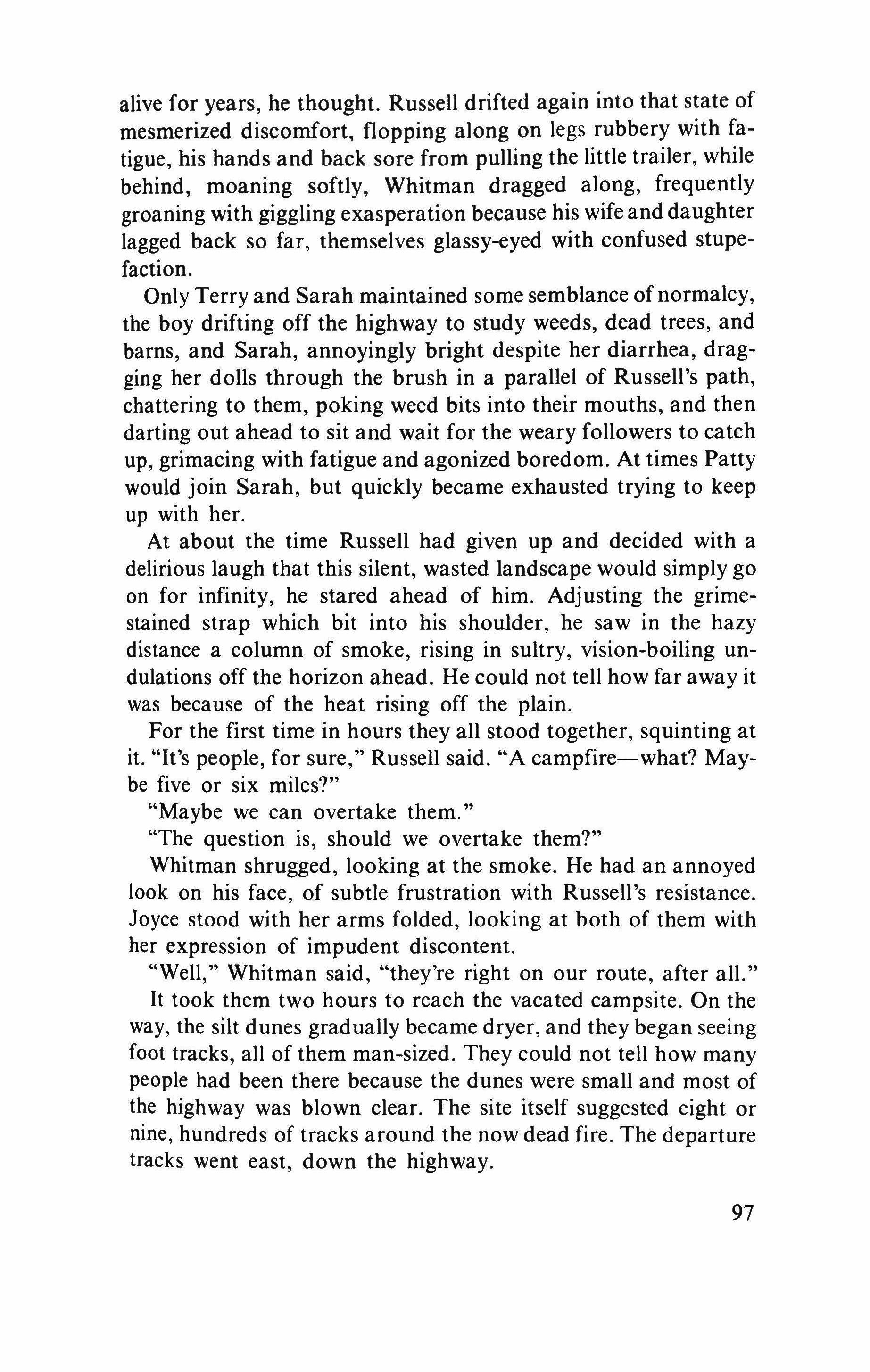
alive for years, he thought. Russell drifted again into that state of mesmerized discomfort, flopping along on legs rubbery with fatigue, his hands and back sore from pulling the little trailer, while behind, moaning softly, Whitman dragged along, frequently groaning with giggling exasperation because his wife and daughter lagged back so far, themselves glassy-eyed with confused stupefaction.
Only Terry and Sarah maintained some semblance of normalcy, the boy drifting off the highway to study weeds, dead trees, and barns, and Sarah, annoyingly bright despite her diarrhea, dragging her dolls through the brush in a parallel of Russell's path, chattering to them, poking weed bits into their mouths, and then darting out ahead to sit and wait for the weary followers to catch up, grimacing with fatigue and agonized boredom. At times Patty would join Sarah, but quickly became exhausted trying to keep up with her.
At about the time Russell had given up and decided with a delirious laugh that this silent, wasted landscape would simply go on for infinity, he stared ahead of him. Adjusting the grimestained strap which bit into his shoulder, he saw in the hazy distance a column of smoke, rising in sultry, vision-boiling undulations off the horizon ahead. He could not tell how far away it was because of the heat rising off the plain.
For the first time in hours they all stood together, squinting at it. "It's people, for sure," Russell said. "A campfire-what? Maybe five or six miles?"
"Maybe we can overtake them."
"The question is, should we overtake them?"
Whitman shrugged, looking at the smoke. He had an annoyed look on his face, of subtle frustration with Russell's resistance. Joyce stood with her arms folded, looking at both of them with her expression of impudent discontent.
"Well," Whitman said, "they're right on our route, after all."
It took them two hours to reach the vacated campsite. On the way, the silt dunes gradually became dryer, and they began seeing foot tracks, all of them man-sized. They could not tell how many people had been there because the dunes were small and most of the highway was blown clear. The site itself suggested eight or nine, hundreds of tracks around the now dead fire. The departure tracks went east, down the highway.
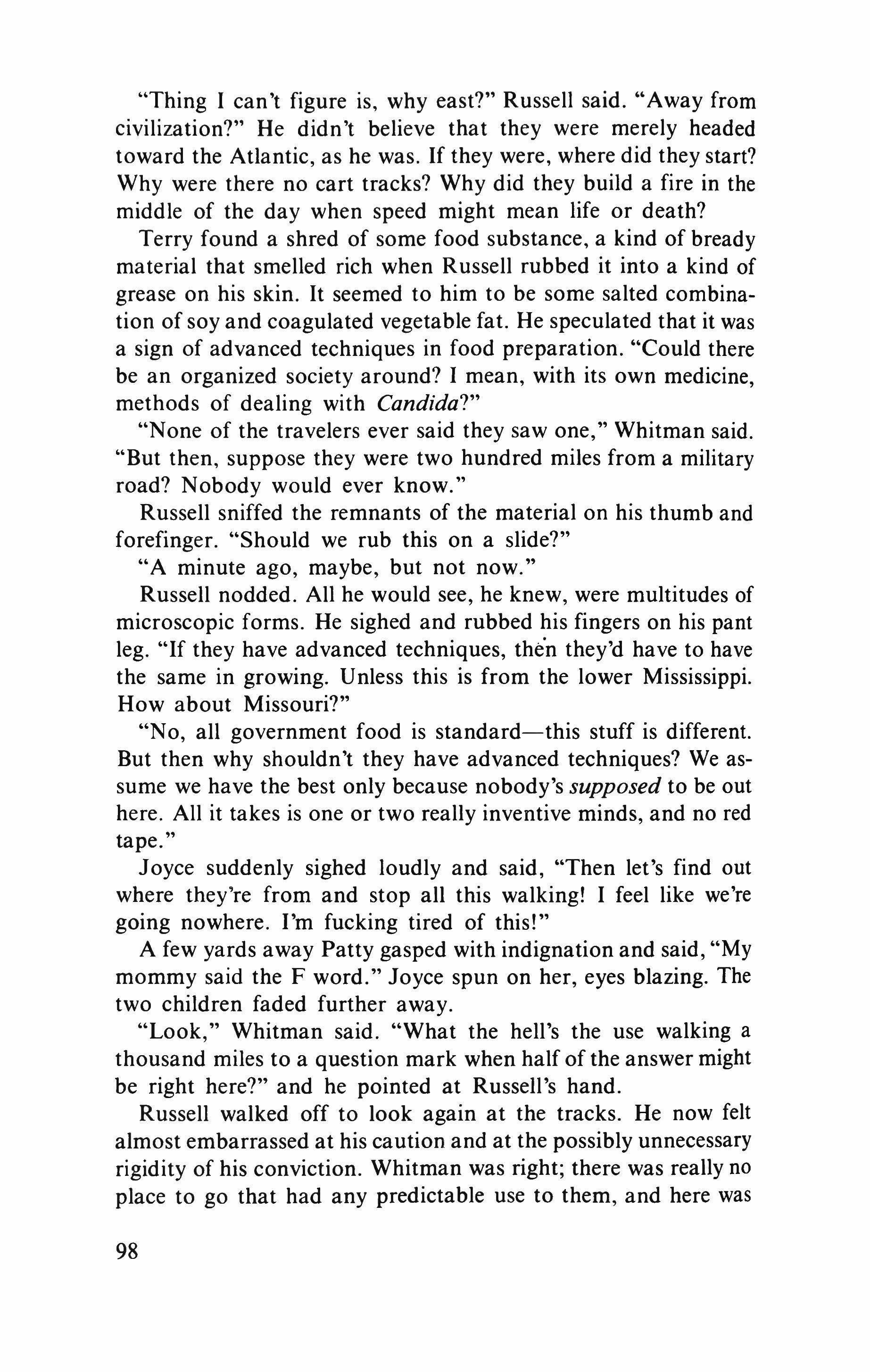
"Thing I can't figure is, why east?" Russell said. "Away from civilization?" He didn't believe that they were merely headed toward the Atlantic, as he was. If they were, where did they start? Why were there no cart tracks? Why did they build a fire in the middle of the day when speed might mean life or death?
Terry found a shred of some food substance, a kind of bready material that smelled rich when Russell rubbed it into a kind of grease on his skin. It seemed to him to be some salted combination of soy and coagulated vegetable fat. He speculated that it was a sign of advanced techniques in food preparation. "Could there be an organized society around? I mean, with its own medicine, methods of dealing with Candida?"
"None of the travelers ever said they saw one," Whitman said. "But then, suppose they were two hundred miles from a military road? Nobody would ever know."
Russell sniffed the remnants of the material on his thumb and forefinger. "Should we rub this on a slide?"
"A minute ago, maybe, but not now."
Russell nodded. All he would see, he knew, were multitudes of microscopic forms. He sighed and rubbed his fingers on his pant leg. "If they have advanced techniques, then they'd have to have the same in growing. Unless this is from the lower Mississippi. How about Missouri?"
"No, all government food is standard-this stuff is different. But then why shouldn't they have advanced techniques? We assume we have the best only because nobody's supposed to be out here. All it takes is one or two really inventive minds, and no red tape.
Joyce suddenly sighed loudly and said, "Then let's find out where they're from and stop all this walking! I feel like we're going nowhere. I'm fucking tired of this!"
A few yards away Patty gasped with indignation and said, "My mommy said the F word." Joyce spun on her, eyes blazing. The two children faded further away.
"Look," Whitman said. "What the hell's the use walking a thousand miles to a question mark when half of the answer might be right here?" and he pointed at Russell's hand.
Russell walked off to look again at the tracks. He now felt almost embarrassed at his caution and at the possibly unnecessary rigidity of his conviction. Whitman was right; there was really no place to go that had any predictable use to them, and here was

evidence of good reason to reconsider his plans. His instincts were against any change, but if there were any chance that he could avoid having the kids die simply because of his own convictions, then he supposed he should yield, regardless of his instincts. His feet hurt, his skin was chafed and grimy, and he stank. It was almost as if he would accept anything now because of the maddening discomfort. "Okay," he said, "what do you suggest?"
Whitman sighed with relief. Russell realized that Whitman wanted them together at that moment because Russell had the rifle. He wouldn't follow the men alone.
They followed the tracks in the silt, now moving faster because they had a purpose, and in his excitement Whitman pulled out ahead of Russell, so that his trailer rattled vigorously. But the encounter they expected was delayed: the men must have been moving fast themselves, and when their apparent route veered off on a fork toward the south, Russell balked.
"Now this is dangerous," he said. "How many days do we lose tracking these people?" He looked around. The sun was orange and low on the horizon. They'd have to stop soon.
"They have a reason for going this way," Whitman said. "It proves they aren't crossing to the east. I'd say if they turn south, on so small a road, they must be close to home."
"All right, let's go."
Their route took them toward a small town indicated on Russell's map as Haroldsville, on the Sugar River. Beyond that was Indianapolis, which he had planned to avoid, like all cities. The close quarters, he and Whitman agreed, were possibly dangerous. Russell had also felt uneasy about their route because of its closeness to the Great Lakes population centers. They had been traveling only about one hundred miles south of Chicago, and he was not sure which highways had been made into military roads or if the military had any reason to establish satellite bases in the larger cities, where there were nuclear plants and valuable industrial property. If they had, their movement through them could easily mean being in the sights of .30 caliber machine guns in the hands of eager young soldiers like the one who had sprayed the house near Galena for the pure hell of it.
Terry, up ahead on the Haroldsville road out of the habit of movement, came back and said, "I see the smoke again. It's down a hill in a town, few miles away, farmhouses and stuff around."
Russell followed Terry around a brush-choked curve in the
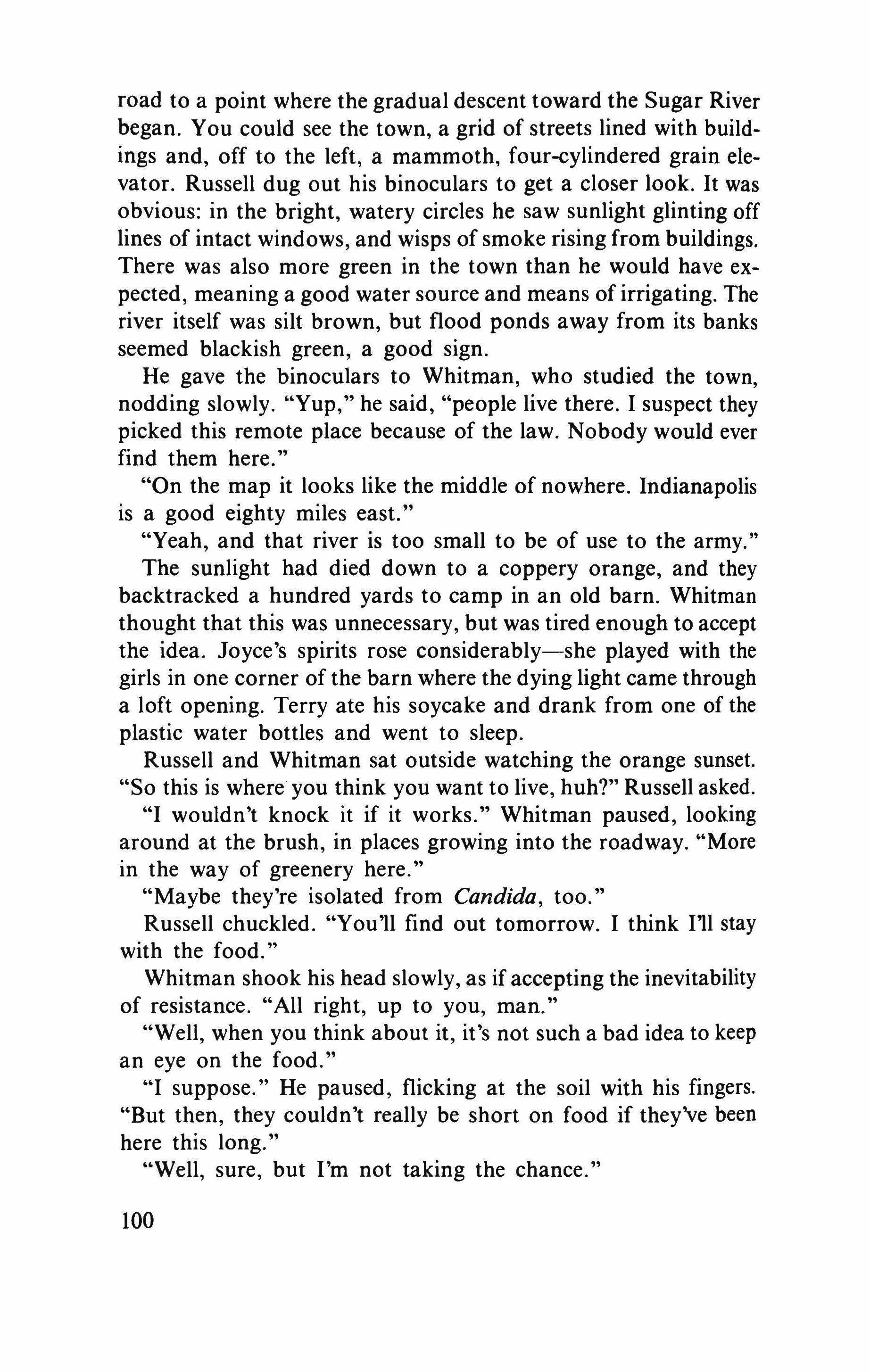
road to a point where the gradual descent toward the Sugar River began. You could see the town, a grid of streets lined with buildings and, off to the left, a mammoth, four-cylindered grain elevator. Russell dug out his binoculars to get a closer look. It was obvious: in the bright, watery circles he saw sunlight glinting off lines of intact windows, and wisps of smoke rising from buildings. There was also more green in the town than he would have expected, meaning a good water source and means of irrigating. The river itself was silt brown, but flood ponds away from its banks seemed blackish green, a good sign.
He gave the binoculars to Whitman, who studied the town, nodding slowly. "Yup," he said, "people live there. I suspect they picked this remote place because of the law. Nobody would ever find them here."
"On the map it looks like the middle of nowhere. Indianapolis is a good eighty miles east."
"Yeah, and that river is too small to be of use to the army."
The sunlight had died down to a coppery orange, and they backtracked a hundred yards to camp in an old barn. Whitman thought that this was unnecessary, but was tired enough to accept the idea. Joyce's spirits rose considerably-she played with the girls in one corner of the barn where the dying light came through a loft opening. Terry ate his soycake and drank from one of the plastic water bottles and went to sleep.
Russell and Whitman sat outside watching the orange sunset. "So this is where you think you want to live, huh?" Russell asked.
"I wouldn't knock it if it works." Whitman paused, looking around at the brush, in places growing into the roadway. "More in the way of greenery here."
"Maybe they're isolated from Candida, too."
Russell chuckled. "You'll find out tomorrow. I think I'll stay with the food."
Whitman shook his head slowly, as if accepting the inevitability of resistance. "All right, up to you, man."
"Well, when you think about it, it's not such a bad idea to keep an eye on the food."
"I suppose." He paused, flicking at the soil with his fingers. "But then, they couldn't really be short on food if they've been here this long."
"Well, sure, but I'm not taking the chance."
100
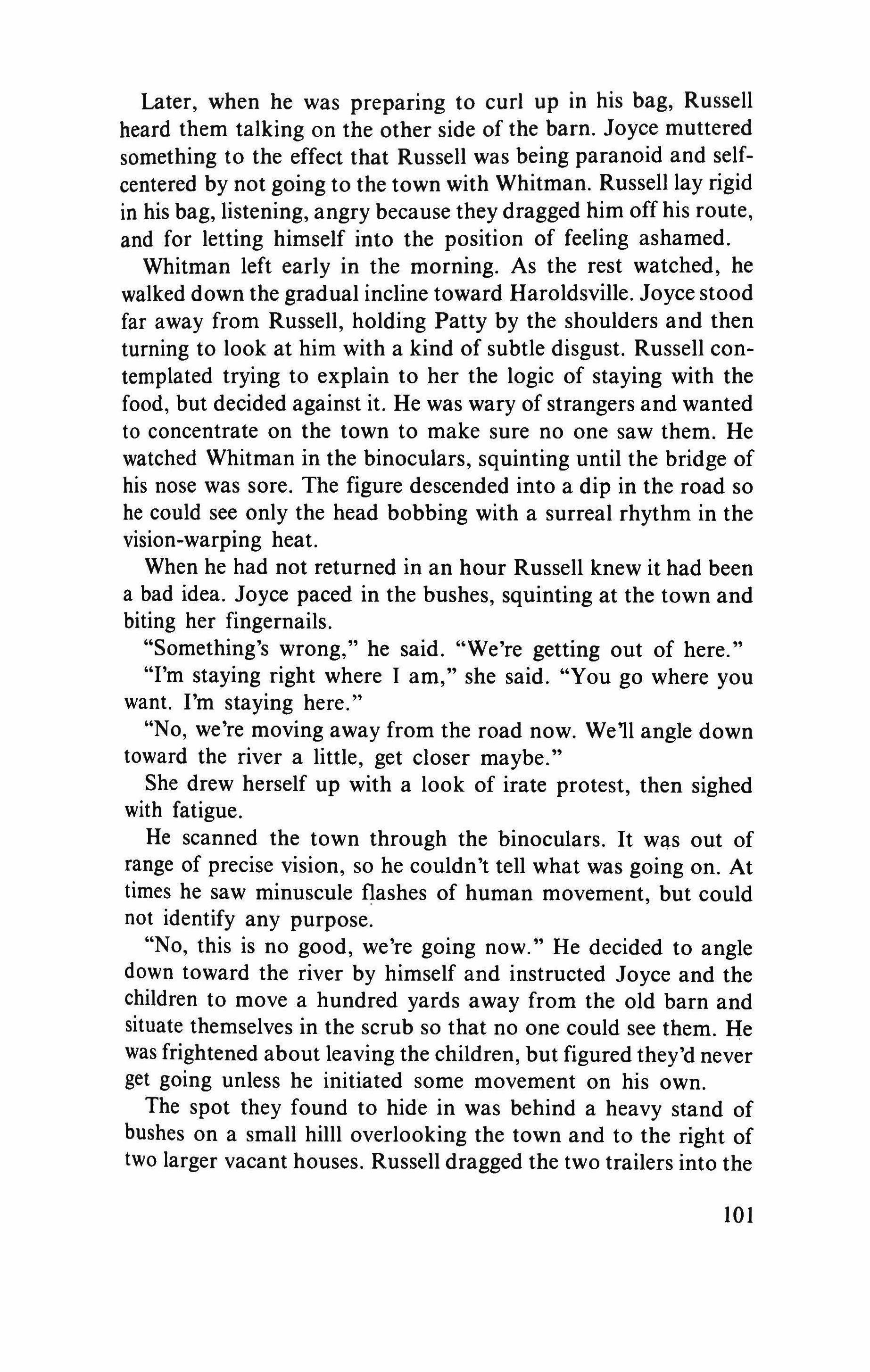
Later, when he was preparing to curl up in his bag, Russell heard them talking on the other side of the barn. Joyce muttered something to the effect that Russell was being paranoid and selfcentered by not going to the town with Whitman. Russell lay rigid in his bag, listening, angry because they dragged him off his route, and for letting himself into the position of feeling ashamed.
Whitman left early in the morning. As the rest watched, he walked down the gradual incline toward Haroldsville. Joyce stood far away from Russell, holding Patty by the shoulders and then turning to look at him with a kind of subtle disgust. Russell contemplated trying to explain to her the logic of staying with the food, but decided against it. He was wary of strangers and wanted to concentrate on the town to make sure no one saw them. He watched Whitman in the binoculars, squinting until the bridge of his nose was sore. The figure descended into a dip in the road so he could see only the head bobbing with a surreal rhythm in the vision-warping heat.
When he had not returned in an hour Russell knew it had been a bad idea. Joyce paced in the bushes, squinting at the town and biting her fingernails.
"Something's wrong," he said. "We're getting out of here."
"I'm staying right where lam," she said. "You go where you want. I'm staying here."
"No, we're moving away from the road now. Well angle down toward the river a little, get closer maybe."
She drew herself up with a look of irate protest, then sighed with fatigue.
He scanned the town through the binoculars. It was out of range of precise vision, so he couldn't tell what was going on. At times he saw minuscule flashes of human movement, but could not identify any purpose.
"No, this is no good, we're going now." He decided to angle down toward the river by himself and instructed Joyce and the children to move a hundred yards away from the old barn and situate themselves in the scrub so that no one could see them. He was frightened about leaving the children, but figured they'd never get going unless he initiated some movement on his own.
The spot they found to hide in was behind a heavy stand of bushes on a small hilll overlooking the town and to the right of two larger vacant houses. Russell dragged the two trailers into the
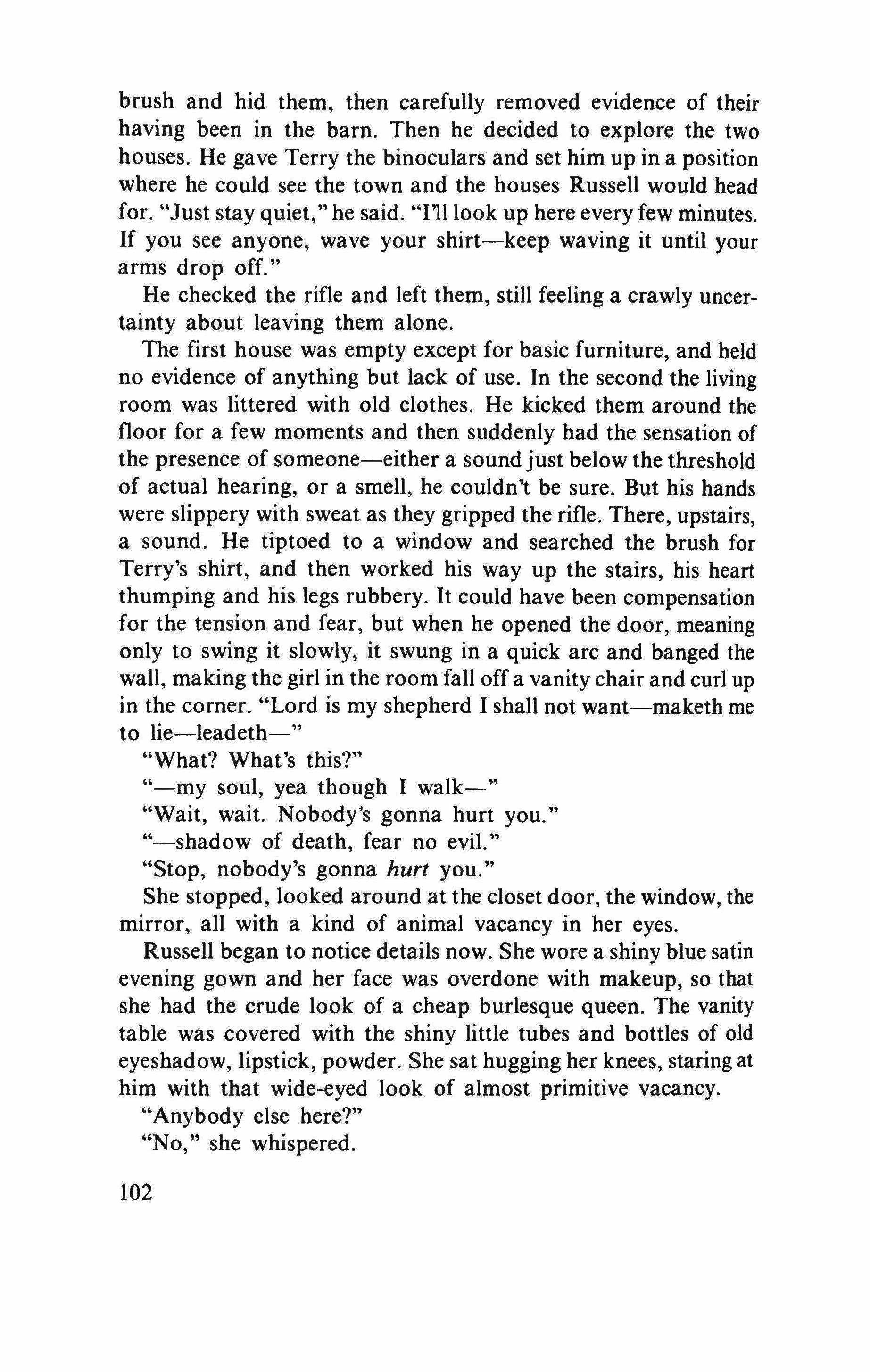
brush and hid them, then carefully removed evidence of their having been in the barn. Then he decided to explore the two houses. He gave Terry the binoculars and set him up in a position where he could see the town and the houses Russell would head for. "Just stay quiet," he said. "111 look up here every few minutes. If you see anyone, wave your shirt-keep waving it until your arms drop off."
He checked the rifle and left them, still feeling a crawly uncertainty about leaving them alone.
The first house was empty except for basic furniture, and held no evidence of anything but lack of use. In the second the living room was littered with old clothes. He kicked them around the floor for a few moments and then suddenly had the sensation of the presence of someone-either a sound just below the threshold of actual hearing, or a smell, he couldn't be sure. But his hands were slippery with sweat as they gripped the rifle. There, upstairs, a sound. He tiptoed to a window and searched the brush for Terry's shirt, and then worked his way up the stairs, his heart thumping and his legs rubbery. It could have been compensation for the tension and fear, but when he opened the door, meaning only to swing it slowly, it swung in a quick arc and banged the wall, making the girl in the room fall off a vanity chair and curl up in the comer. "Lord is my shepherd I shall not want-maketh me to lie-Ieadeth-"
"What? What's this?"
"-my soul, yea though I walk-"
"Wait, wait. Nobody's gonna hurt you."
"-shadow of death, fear no evil."
"Stop, nobody's gonna hurt you."
She stopped, looked around at the closet door, the window, the mirror, all with a kind of animal vacancy in her eyes.
Russell began to notice details now. She wore a shiny blue satin evening gown and her face was overdone with makeup, so that she had the crude look of a cheap burlesque queen. The vanity table was covered with the shiny little tubes and bottles of old eyeshadow, lipstick, powder. She sat hugging her knees, staring at him with that wide-eyed look of almost primitive vacancy.
"Anybody else here?"
"N0," she whispered.

He stepped to the window to check the bushes for Terry's shirt, and then turned back to her. "Are you from that town?"
She nodded. He realized that he was still pointing the rifle at her and lowered it. "Sorry."
He spent ten minutes trying to extract information from her. Yes, there were people in the town, three hundred or so. Her name was Delta Jensen. "Delta?" he asked. She explained that Father Davidson had renamed many of the people. She even knew a boy named Sinai Muncie. Their town was a Christian community, devoted to the will of the Lord, she said. They believed that the famine had been visited upon mankind by an angry God who was sick in his soul to see the evil on the earth, and that-
"Wait," Russell said. "Look, we didn't know anybody survived in the Interior." And he thought, survive? He looked at her face and arms and the satin-covered shapes of hefty thighs. She had the old, seemingly impossible bloom of breasty good health. "What keeps you alive, then? I mean, what about Peronospora, you know, all that?"
She screwed her face up. "Perona- What's that?"
"C'mon, what caused all this-uh, famine? What do your people do to survive?"
"Oh, we got all kinds of stuff. Father Davidson, he- Well, the school gym's a closed-up vegetable patch, a greenhouse I guess."
"Everybody does that. What about fish, that river?" "Fish?" She thought a moment, then said, "Listen, don't tell."
"Tell what?"
"That I was doin' this-all this lipstick 'n stuff, this old dress. He'd really be mad if he knew I was doin' this."
"No, I won't tell anybody."
"Look, I can take you down to town and introduce you to him. We can show you what we have. Do you have food? Where are you going?"
He explained briefly.
"Termites?" She thought, then wrinkled the bridge of her nose. "Gosh, that sounds awful."
"You got any termites here?"
"All the hymnals in the church got them last year, but we sprayed them."

"What else do you do?"
"They have these plastic domes they used to use on houses for skylights? Thousands of them. Each one has a plant under it so they can grow outside, like potatoes. They irrigate with underground hoses poked full of holes."
"That one I haven't heard of. What about Candida?"
"What's that?"
She slowly stood up, still darting glances around, as if looking for an escape. At first Russell had thought her a teenager because of the complete lack of finesse with which she had smeared her face, but she seemed older now, and there was no mistaking the proportions of her body, which, in the satin gown, shimmered with husky vitality.
"What else do you do-for food I mean?"
"Soy in railroad warehouses? Uh, leaf vegetables indoors, chard, spinach, stuff like that. And asparagus, big enclosed beds -'cause it's edible right when it comes up. It doesn't die before you eat it."
"That's a good one," he said. "Now that's a good idea. Keep the soil leached. That's a good one."
"We even have a couple of cows-but we gotta take them all over the place to feed them."
"How old are you. I mean, if you don't mind my asking."
"Twenty-two, I think. I was brought here from Indianapolis. My mom was with Father Davidson."
He assured her once more that no harm would come to her and asked if she'd like to meet the people with him. She maintained that same cautious, wary, and distracted expression until he identified them as three children and a woman.
"Okay, but I'll have to change first."
"I'll wait downstairs."
He checked again for Terry's shirt, thinking that the fact of her ignorance of Candida had to be important. It was like stumbling into the middle-twentieth century. Delta Jensen came down in faded jeans and a plaid blouse through which he could see the pale shape of a chaste brassiere. Without the ridiculous makeup she looked even healthier, like a midwestern cheerleader from the old days.
As they walked she told him that they could come and live in
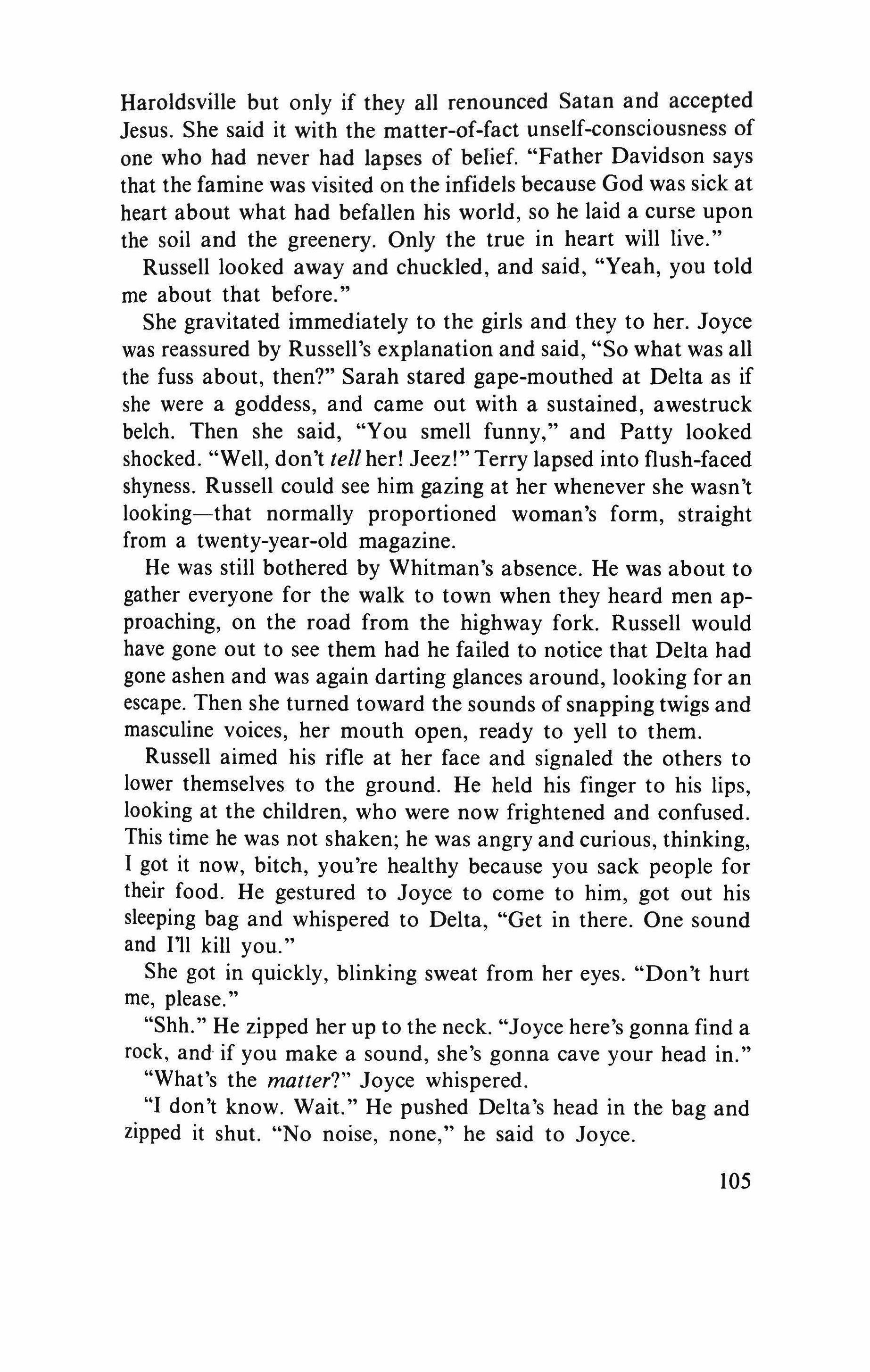
Haroldsville but only if they all renounced Satan and accepted Jesus. She said it with the matter-of-fact unself-consciousness of one who had never had lapses of belief. "Father Davidson says that the famine was visited on the infidels because God was sick at heart about what had befallen his world, so he laid a curse upon the soil and the greenery. Only the true in heart will live."
Russell looked away and chuckled, and said, "Yeah, you told me about that before."
She gravitated immediately to the girls and they to her. Joyce was reassured by Russell's explanation and said, "So what was all the fuss about, then?" Sarah stared gape-mouthed at Delta as if she were a goddess, and came out with a sustained, awestruck belch. Then she said, "You smell funny," and Patty looked shocked. "Well, don't tell her! Jeez!" Terry lapsed into flush-faced shyness. Russell could see him gazing at her whenever she wasn't looking-that normally proportioned woman's form, straight from a twenty-year-old magazine.
He was still bothered by Whitman's absence. He was about to gather everyone for the walk to town when they heard men approaching, on the road from the highway fork. Russell would have gone out to see them had he failed to notice that Delta had gone ashen and was again darting glances around, looking for an escape. Then she turned toward the sounds of snapping twigs and masculine voices, her mouth open, ready to yell to them.
Russell aimed his rifle at her face and signaled the others to lower themselves to the ground. He held his finger to his lips, looking at the children, who were now frightened and confused. This time he was not shaken; he was angry and curious, thinking, I got it now, bitch, you're healthy because you sack people for their food. He gestured to Joyce to come to him, got out his sleeping bag and whispered to Delta, "Get in there. One sound and 111 kill you."
She got in quickly, blinking sweat from her eyes. "Don't hurt me, please."
"Shh." He zipped her up to the neck. "Joyce here's gonna find a rock, and if you make a sound, she's gonna cave your head in."
"What's the matter?" Joyce whispered.
"I don't know. Wait." He pushed Delta's head in the bag and zipped it shut. "No noise, none," he said to Joyce.

In the binoculars he saw the men, five of them, one in the lead with a rifle, three bound neck to neck and shuffling along wearily, and another fairly jaunty man in the rear. Russell reeled in disbelief when he studied the three middle men. The habit of deduction was automatic, and when it all came to him he was overcome with rubber-legged revulsion.
The faces of the three men in the middle were bruised and blackened around the eyes, under which were stains of dried blood. To make them docile, the other two had blinded them, and the only explanation was that this thriving little community with its healthy boys and girls had found a justification for eating human flesh.
He thought then that such a conclusion had to be wrong, that there could have been other explanations; but if he was right, then it meant that Delta had been setting them up. As the men receded down the gentle, bright slope toward Haroldsville, the man in the rear lazily herding the middle three with a long stick, Russell returned to Joyce and the children. She was still confounded by the situation, and Russell considered how to tell her. There was no sense in telling her in front of the children.
"We're moving further away from the road," he said. In the confusion, Joyce didn't protest. "We'll leave the trailers hidden where they are. I think we'll set up in one of those old houses down there. Better protection." Joyce shrugged in weary agreement, and gathered up the children.
Then Russell released Delta Jensen, when he opened the sleeping bag and his suspicions were confirmed by the smell-a rich, dense animal smell wafting up at him in a warm cloud, like eat's breath.
"Out," he said.
She now looked at him with a kind of objective resignation to whatever martyrdom Russell had in mind. "I am not afraid," she said. 'The Lord will protect me."
"So that's why you smell like that, huh? People who eat a lot of meat have that smell."
He pushed her in the direction of the houses. "You're all freaks -you eat human flesh. You're as sick as anybody could ever get."
She started to cry as she walked, and Russell stopped talking. When they got to the first house he checked on the children and
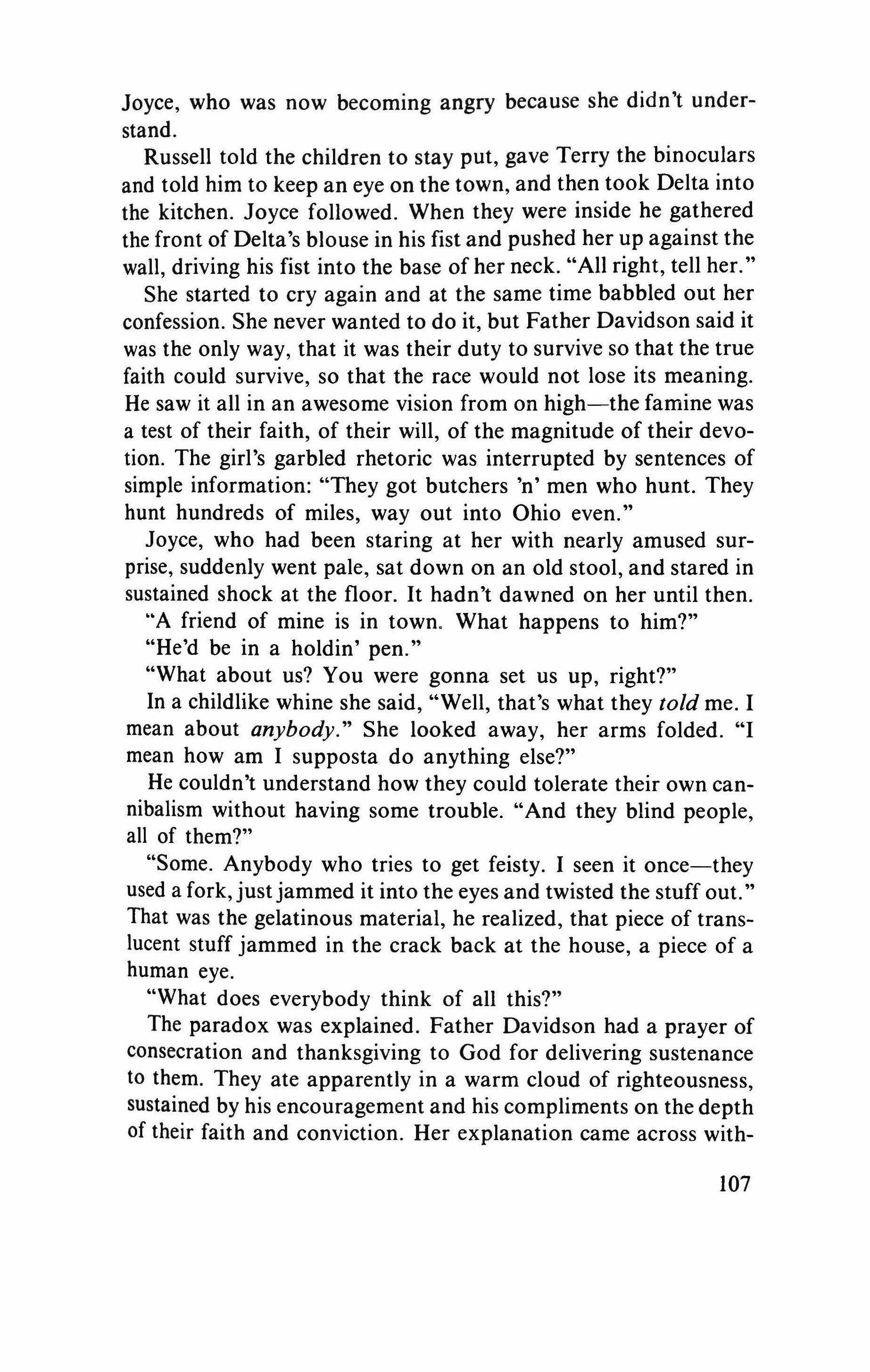
Joyce, who was now becoming angry because she didn't understand.
Russell told the children to stay put, gave Terry the binoculars and told him to keep an eye on the town, and then took Delta into the kitchen. Joyce followed. When they were inside he gathered the front of Delta's blouse in his fist and pushed her up against the wall, driving his fist into the base of her neck. "All right, tell her."
She started to cry again and at the same time babbled out her confession. She never wanted to do it, but Father Davidson said it was the only way, that it was their duty to survive so that the true faith could survive, so that the race would not lose its meaning. He saw it all in an awesome vision from on high-the famine was a test of their faith, of their will, of the magnitude of their devotion. The girl's garbled rhetoric was interrupted by sentences of simple information: "They got butchers 'n' men who hunt. They hunt hundreds of miles, way out into Ohio even."
Joyce, who had been staring at her with nearly amused surprise, suddenly went pale, sat down on an old stool, and stared in sustained shock at the floor. It hadn't dawned on her until then.
"A friend of mine is in town. What happens to him?"
"He'd be in a holdin ' pen."
"What about us? You were gonna set us up, right?"
In a childlike whine she said, "Well, that's what they told me. I mean about anybody." She looked away, her arms folded. "I mean how am I supposta do anything else?"
He couldn't understand how they could tolerate their own cannibalism without having some trouble. "And they blind people, all of them?"
"Some. Anybody who tries to get feisty. I seen it once-they used a fork,justjammed it into the eyes and twisted the stuff out." That was the gelatinous material, he realized, that piece of translucent stuff jammed in the crack back at the house, a piece of a human eye.
"What does everybody think of all this?"
The paradox was explained. Father Davidson had a prayer of consecration and thanksgiving to God for delivering sustenance to them. They ate apparently in a warm cloud of righteousness, sustained by his encouragement and his compliments on the depth of their faith and conviction. Her explanation came across with-
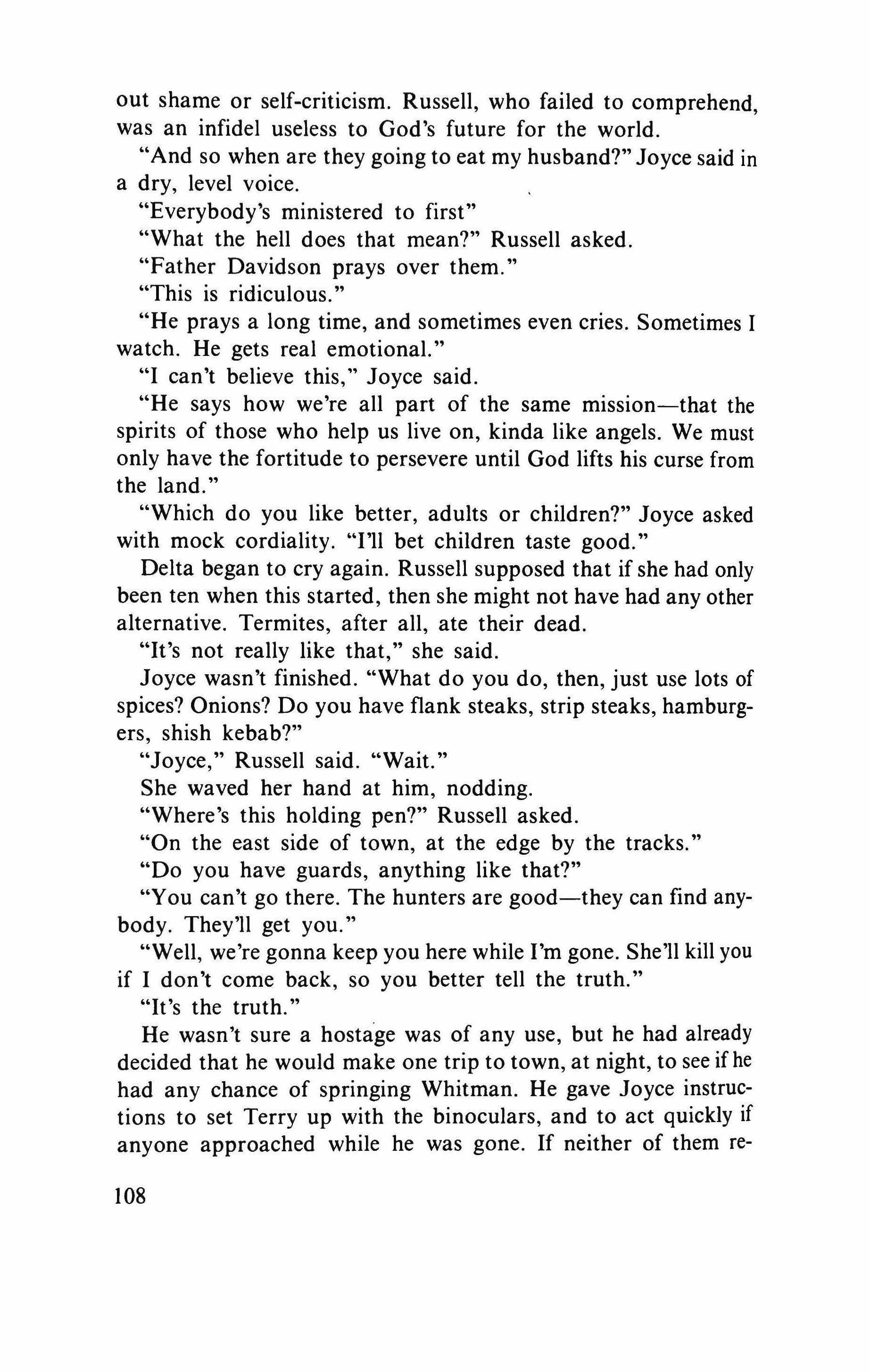
out shame or self-criticism. Russell, who failed to comprehend, was an infidel useless to God's future for the world.
"And so when are they going to eat my husband?" Joyce said in a dry, level voice.
"Everybody's ministered to first"
"What the hell does that mean?" Russell asked.
"Father Davidson prays over them."
"This is ridiculous."
"He prays a long time, and sometimes even cries. Sometimes I watch. He gets real emotional."
"I can't believe this," Joyce said.
"He says how we're all part of the same mission-that the spirits of those who help us live on, kinda like angels. We must only have the fortitude to persevere until God lifts his curse from the land."
"Which do you like better, adults or children?" Joyce asked with mock cordiality. "I'll bet children taste good."
Delta began to cry again. Russell supposed that if she had only been ten when this started, then she might not have had any other alternative. Termites, after all, ate their dead.
"It's not really like that," she said.
Joyce wasn't finished. "What do you do, then, just use lots of spices? Onions? Do you have flank steaks, strip steaks, hamburgers, shish kebab?"
"Joyce," Russell said. "Wait."
She waved her hand at him, nodding.
"Where's this holding pen?" Russell asked.
"On the east side of town, at the edge by the tracks."
"Do you have guards, anything like that?"
"You can't go there. The hunters are good-they can find anybody. They'll get you."
"Well, we're gonna keep you here while I'm gone. She'll kill you if 1 don't come back, so you better tell the truth."
"It's the truth."
He wasn't sure a hostage was of any use, but he had already decided that he would make one trip to town, at night, to see if he had any chance of springing Whitman. He gave Joyce instructions to set Terry up with the binoculars, and to act quickly if anyone approached while he was gone. If neither of them re-
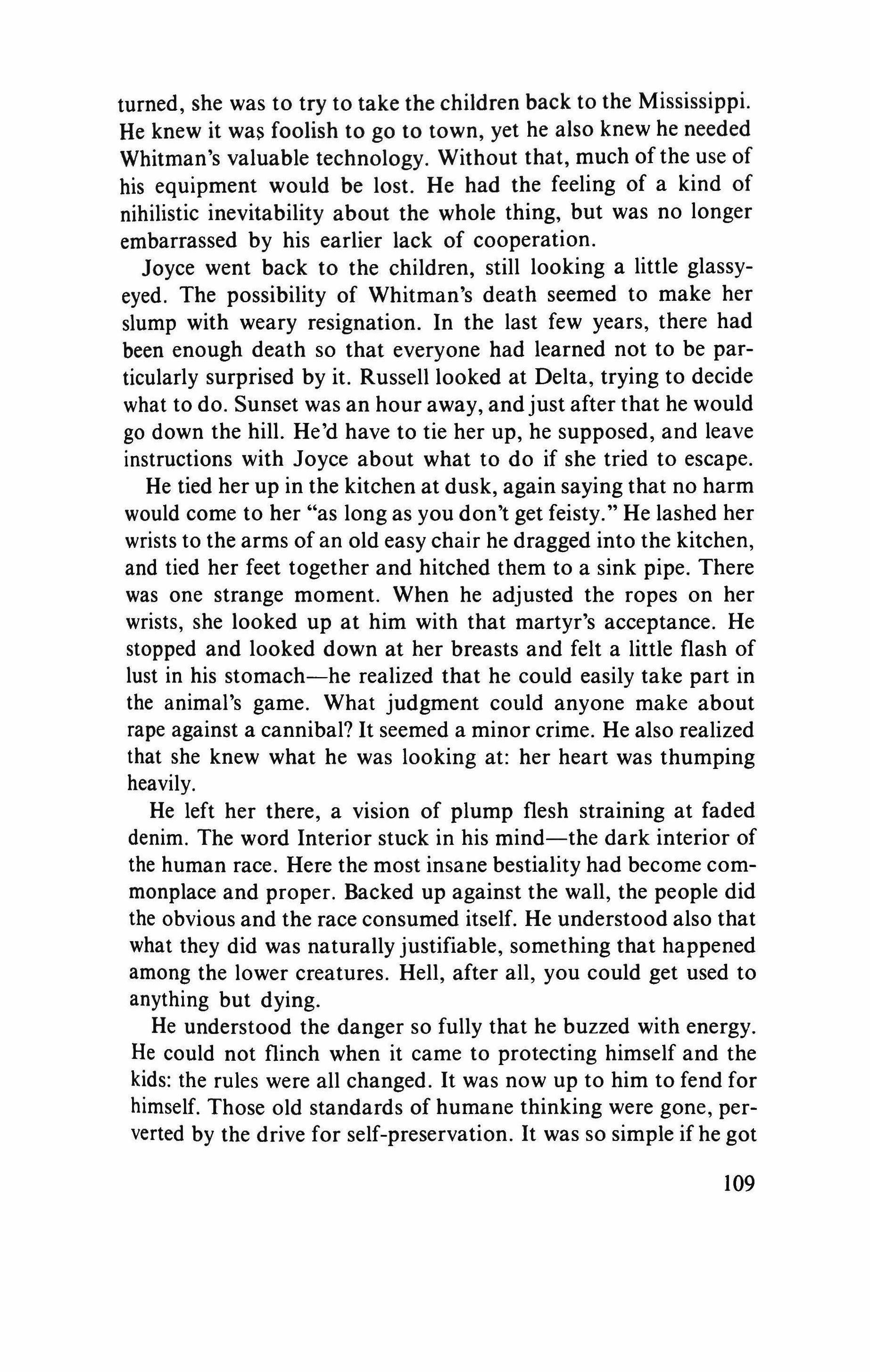
turned, she was to try to take the children back to the Mississippi. He knew it was foolish to go to town, yet he also knew he needed Whitman's valuable technology. Without that, much ofthe use of his equipment would be lost. He had the feeling of a kind of nihilistic inevitability about the whole thing, but was no longer embarrassed by his earlier lack of cooperation.
Joyce went back to the children, still looking a little glassyeyed. The possibility of Whitman's death seemed to make her slump with weary resignation. In the last few years, there had been enough death so that everyone had learned not to be particularly surprised by it. Russell looked at Delta, trying to decide what to do. Sunset was an hour away, and just after that he would go down the hill. He'd have to tie her up, he supposed, and leave instructions with Joyce about what to do if she tried to escape.
He tied her up in the kitchen at dusk, again saying that no harm would come to her "as long as you don't get feisty." He lashed her wrists to the arms of an old easy chair he dragged into the kitchen, and tied her feet together and hitched them to a sink pipe. There was one strange moment. When he adjusted the ropes on her wrists, she looked up at him with that martyr's acceptance. He stopped and looked down at her breasts and felt a little flash of lust in his stomach-he realized that he could easily take part in the animal's game. What judgment could anyone make about rape against a cannibal? It seemed a minor crime. He also realized that she knew what he was looking at: her heart was thumping heavily.
He left her there, a vision of plump flesh straining at faded denim. The word Interior stuck in his mind-the dark interior of the human race. Here the most insane bestiality had become commonplace and proper. Backed up against the wall, the people did the obvious and the race consumed itself. He understood also that what they did was naturally justifiable, something that happened among the lower creatures. Hell, after all, you could get used to anything but dying.
He understood the danger so fully that he buzzed with energy. He could not flinch when it came to protecting himself and the kids: the rules were all changed. It was now up to him to fend for himself. Those old standards of humane thinking were gone, perverted by the drive for self-preservation. It was so simple if he got
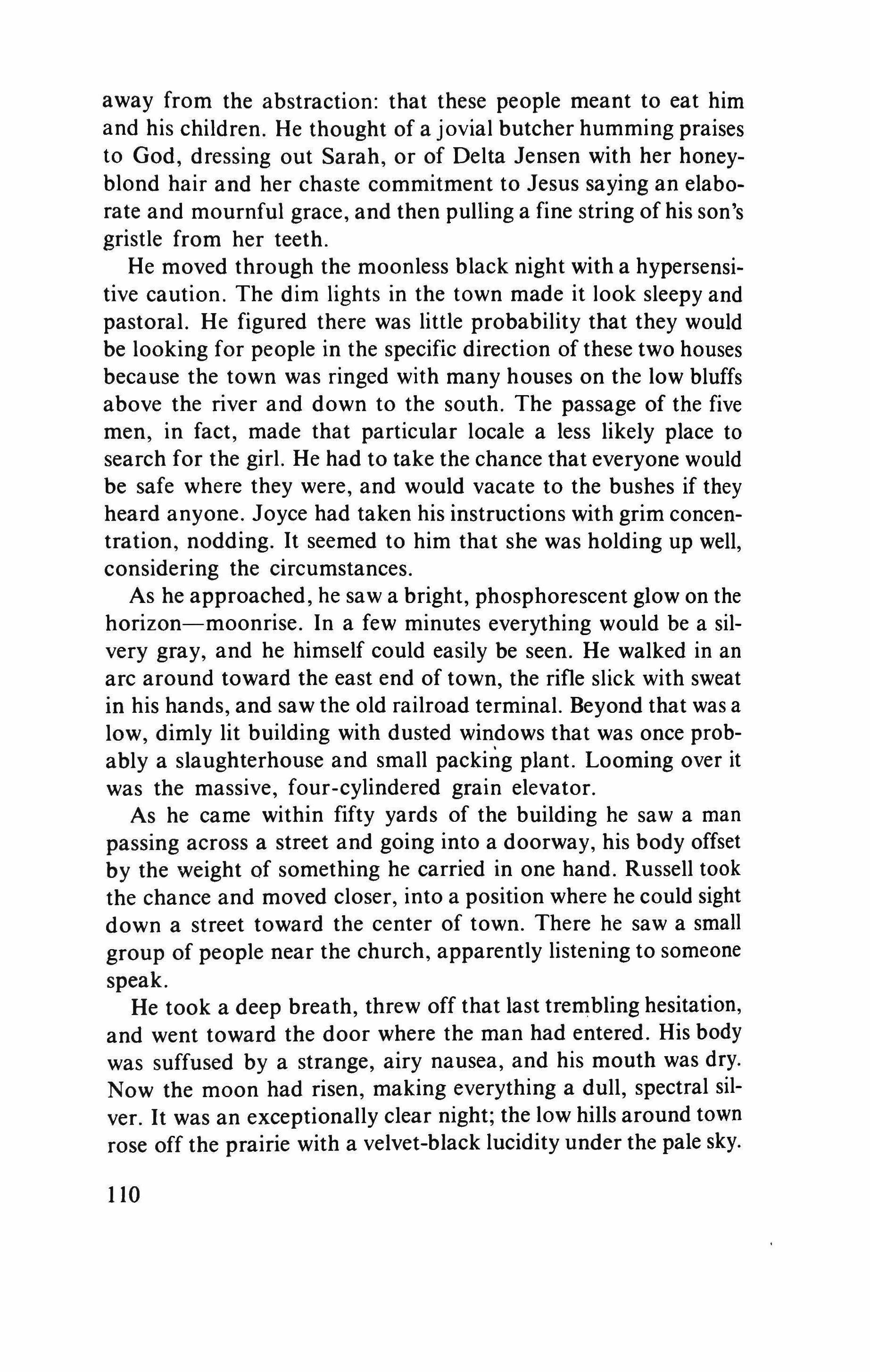
away from the abstraction: that these people meant to eat him and his children. He thought of a jovial butcher humming praises to God, dressing out Sarah, or of Delta Jensen with her honeyblond hair and her chaste commitment to Jesus saying an elaborate and mournful grace, and then pulling a fine string of his son's gristle from her teeth.
He moved through the moonless black night with a hypersensitive caution. The dim lights in the town made it look sleepy and pastoral. He figured there was little probability that they would be looking for people in the specific direction of these two houses because the town was ringed with many houses on the low bluffs above the river and down to the south. The passage of the five men, in fact, made that particular locale a less likely place to search for the girl. He had to take the chance that everyone would be safe where they were, and would vacate to the bushes if they heard anyone. Joyce had taken his instructions with grim concentration, nodding. It seemed to him that she was holding up well, considering the circumstances.
As he approached, he saw a bright, phosphorescent glow on the horizon-moonrise. In a few minutes everything would be a silvery gray, and he himself could easily be seen. He walked in an arc around toward the east end of town, the rifle slick with sweat in his hands, and saw the old railroad terminal. Beyond that was a low, dimly lit building with dusted windows that was once probably a slaughterhouse and small packing plant. Looming over it was the massive, four-cylindered grain elevator.
As he came within fifty yards of the building he saw a man passing across a street and going into a doorway, his body offset by the weight of something he carried in one hand. Russell took the chance and moved closer, into a position where he could sight down a street toward the center of town. There he saw a small group of people near the church, apparently listening to someone speak.
He took a deep breath, threw off that last trembling hesitation, and went toward the door where the man had entered. His body was suffused by a strange, airy nausea, and his mouth was dry. Now the moon had risen, making everything a dull, spectral silver. It was an exceptionally clear night; the low hills around town rose off the prairie with a velvet-black lucidity under the pale sky.
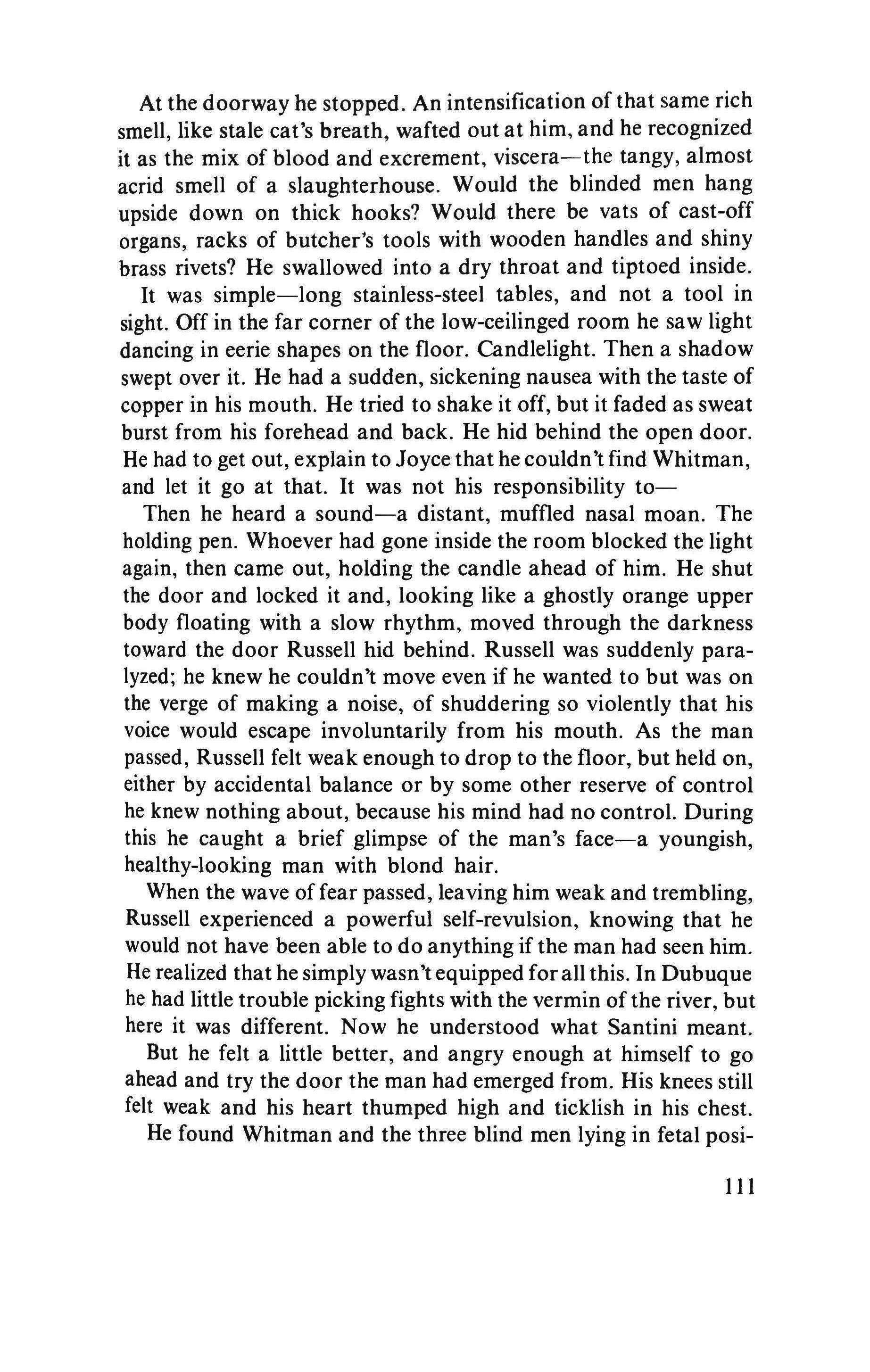
At the doorway he stopped. An intensification of that same rich smell, like stale eat's breath, wafted out at him, and he recognized it as the mix of blood and excrement, viscera-the tangy, almost acrid smell of a slaughterhouse. Would the blinded men hang upside down on thick hooks? Would there be vats of cast-off organs, racks of butcher's tools with wooden handles and shiny brass rivets? He swallowed into a dry throat and tiptoed inside.
It was simple-long stainless-steel tables, and not a tool in sight. Off in the far corner of the low-ceilinged room he saw light dancing in eerie shapes on the floor. Candlelight. Then a shadow swept over it. He had a sudden, sickening nausea with the taste of copper in his mouth. He tried to shake it off, but it faded as sweat burst from his forehead and back. He hid behind the open door. He had to get out, explain to Joyce that he couldn't find Whitman, and let it go at that. It was not his responsibility to-
Then he heard a sound-a distant, muffled nasal moan. The holding pen. Whoever had gone inside the room blocked the light again, then came out, holding the candle ahead of him. He shut the door and locked it and, looking like a ghostly orange upper body floating with a slow rhythm, moved through the darkness toward the door Russell hid behind. Russell was suddenly paralyzed; he knew he couldn't move even if he wanted to but was on the verge of making a noise, of shuddering so violently that his voice would escape involuntarily from his mouth. As the man passed, Russell felt weak enough to drop to the floor, but held on, either by accidental balance or by some other reserve of control he knew nothing about, because his mind had no control. During this he caught a brief glimpse of the man's face-a youngish, healthy-looking man with blond hair.
When the wave of fear passed, leaving him weak and trembling, Russell experienced a powerful self-revulsion, knowing that he would not have been able to do anything if the man had seen him. He realized that he simply wasn't equipped for all this. In Dubuque he had little trouble picking fights with the vermin ofthe river, but here it was different. Now he understood what Santini meant.
But he felt a little better, and angry enough at himself to go ahead and try the door the man had emerged from. His knees still felt weak and his heart thumped high and ticklish in his chest.
He found Whitman and the three blind men lying in fetal posi-
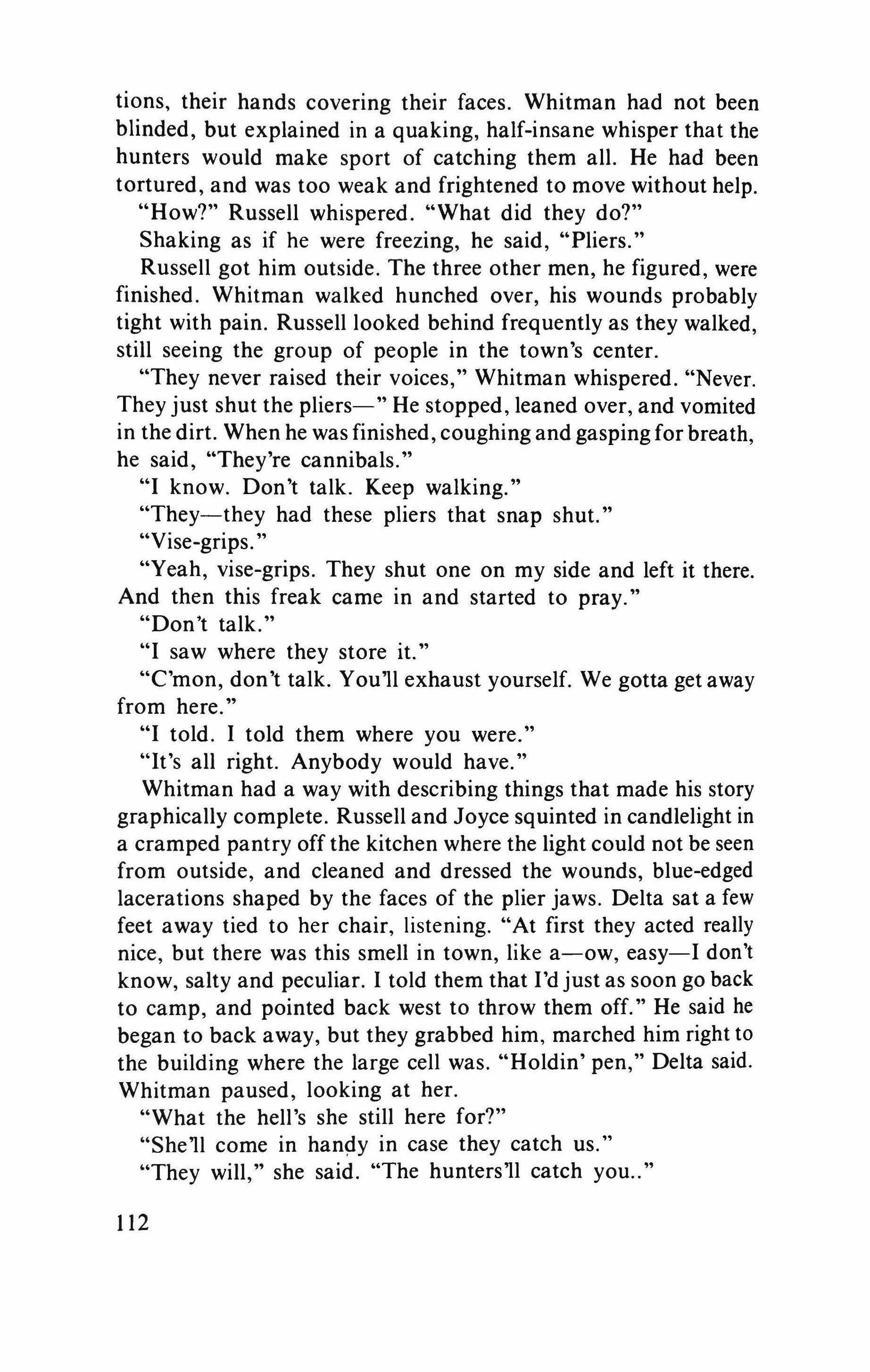
tions, their hands covering their faces. Whitman had not been blinded, but explained in a quaking, half-insane whisper that the hunters would make sport of catching them all. He had been tortured, and was too weak and frightened to move without help.
"How?" Russell whispered. "What did they do?"
Shaking as if he were freezing, he said, "Pliers."
Russell got him outside. The three other men, he figured, were finished. Whitman walked hunched over, his wounds probably tight with pain. Russell looked behind frequently as they walked, still seeing the group of people in the town's center.
"They never raised their voices," Whitman whispered. "Never. They just shut the pliers-" He stopped, leaned over, and vomited in the dirt. When he was finished, coughing and gasping for breath, he said, "They're cannibals."
"I know. Don't talk. Keep walking."
"They-they had these pliers that snap shut."
"Vise-grips. "
"Yeah, vise-grips. They shut one on my side and left it there. And then this freak came in and started to pray."
"Don't talk."
"I saw where they store it."
"C'mon, don't talk. You'll exhaust yourself. We gotta get away from here."
"I told. 1 told them where you were."
"It's all right. Anybody would have."
Whitman had a way with describing things that made his story graphically complete. Russell and Joyce squinted in candlelight in a cramped pantry off the kitchen where the light could not be seen from outside, and cleaned and dressed the wounds, blue-edged lacerations shaped by the faces of the plier jaws. Delta sat a few feet away tied to her chair, listening. "At first they acted really nice, but there was this smell in town, like a-ow, easy-I don't know, salty and peculiar. 1 told them that I'd just as soon go back to camp, and pointed back west to throw them off." He said he began to back away, but they grabbed him, marched him right to the building where the large cell was. "Holdin' pen," Delta said. Whitman paused, looking at her.
"What the hell's she still here for?"
"She'll come in handy in case they catch us."
"They will," she said. "The hunters'll catch you

"Shut up," Joyce said.
"Anyway," Whitman said, "I passed an open door and I saw these shapes hanging, dark, with cheesecloth fabric on the outside, and strings of big sausages, sort of an off-pink."
Of course, Russell thought, they wouldn't just slice steaks. They'd camouflage the reality of what they were doing by curing the meat dry, or grinding and spicing it up into a more palatable form.
Then Whitman was visited by Father Davidson, who, he said, sat down, thoughtfully crossed his legs and said, "Young man, do you know the degree of iniquity that has been visited upon our planet? Do you know the degree of suffering that has been caused by the forces of evil on this earth?" He was, Whitman said, a tall, fatherly man with white hair, who looked like those old movie character actors whose roles were ministers and country doctors, grandfathers and benevolent sources of moral advice. "The last seed of the survival of Christ's word is here," he said, "and we have taken upon ourselves the awesome responsibility of carrying the staff of Christian truth through this hour of turmoil."
When Whitman would not reveal the location of his traveling companions, a hunter drew out the pliers and gripped the flesh of his side, squeezing so hard that he held the pliers in both hands between his knees. "And-and his arms vibrated, you know what I mean? He did it so hard that his arms were vibrating?" When the hunter did this a second time, Whitman nearly fainted. The worst part of it was that Whitman was trying to answer the man, but simply had no voice.
Davidson went on with something like "The sacrifice you make will help ensure the survival of your own spirit." Then, in an intense whisper, "Consider the alternative-an aimless, short life plagued by the natural evils that tempt and beset each and every one of us."
Davidson continued with other things Whitman could no longer hear, and the hunter continued to mutilate the flesh of his side. Then he managed to say, "Right up there, that north road, that north road," and the hunter said something about being short handed. They quit and left after Davidson recited some prayer, his hand on Whitman's head. He heard the hunter say something to the effect that finding the rest would be "no problem."
An hour later they brought in the three blind men, who were so
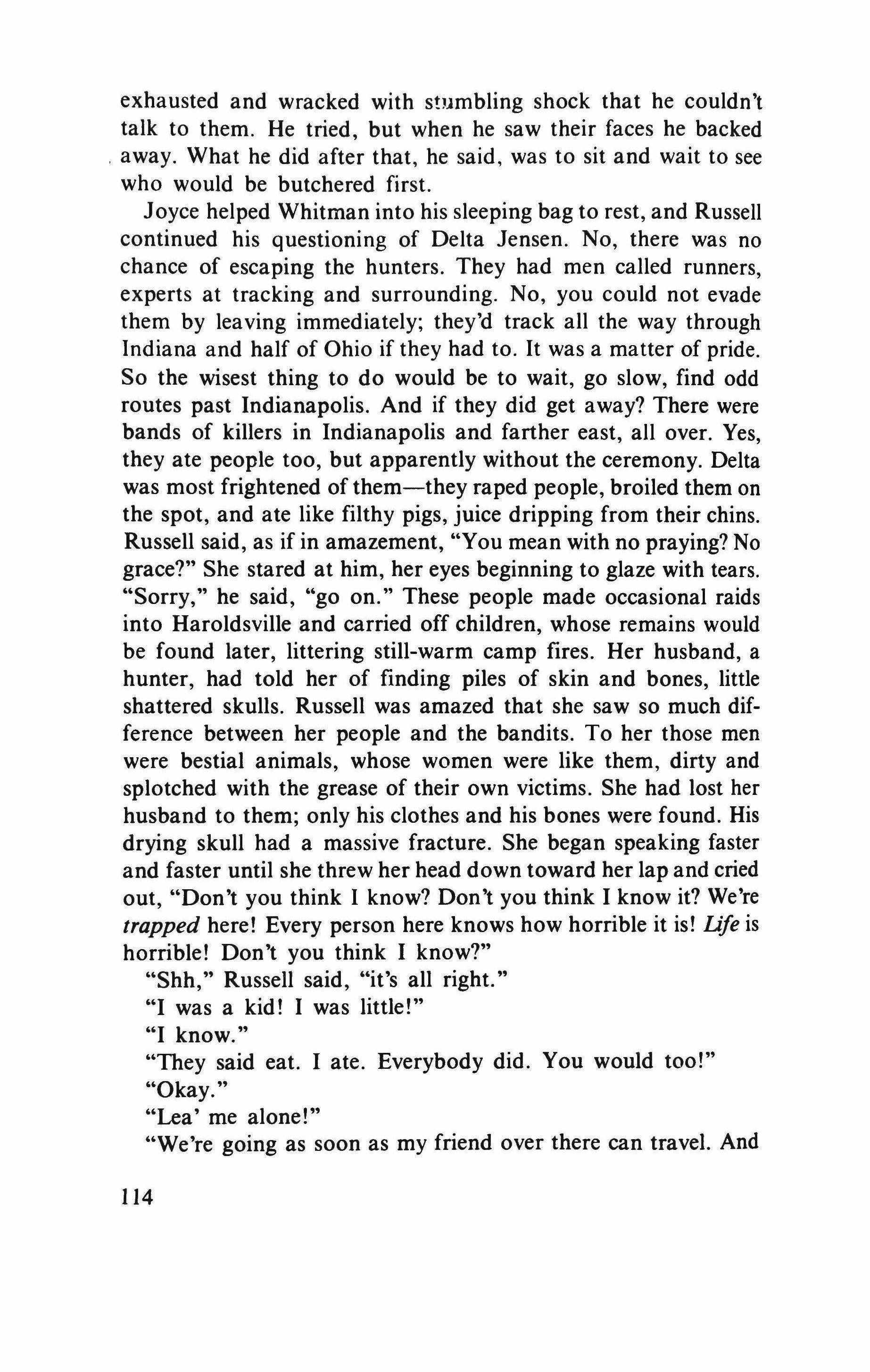
exhausted and wracked with stumbling shock that he couldn't talk to them. He tried, but when he saw their faces he backed away. What he did after that, he said, was to sit and wait to see who would be butchered first.
Joyce helped Whitman into his sleeping bag to rest, and Russell continued his questioning of Delta Jensen. No, there was no chance of escaping the hunters. They had men called runners, experts at tracking and surrounding. No, you could not evade them by leaving immediately; they'd track all the way through Indiana and half of Ohio if they had to. It was a matter of pride. So the wisest thing to do would be to wait, go slow, find odd routes past Indianapolis. And if they did get away? There were bands of killers in Indianapolis and farther east, all over. Yes, they ate people too, but apparently without the ceremony. Delta was most frightened of them-they raped people, broiled them on the spot, and ate like filthy pigs, juice dripping from their chins. Russell said, as if in amazement, "You mean with no praying? No grace?" She stared at him, her eyes beginning to glaze with tears. "Sorry," he said, "go on." These people made occasional raids into Haroldsville and carried off children, whose remains would be found later, littering still-warm camp fires. Her husband, a hunter, had told her of finding piles of skin and bones, little shattered skulls. Russell was amazed that she saw so much difference between her people and the bandits. To her those men were bestial animals, whose women were like them, dirty and splotched with the grease of their own victims. She had lost her husband to them; only his clothes and his bones were found. His drying skull had a massive fracture. She began speaking faster and faster until she threw her head down toward her lap and cried out, "Don't you think I know? Don't you think I know it? We're trapped here! Every person here knows how horrible it is! life is horrible! Don't you think I know?"
"Shh," Russell said, "it's all right."
"I was a kid! I was little!"
"I know."
"They said eat. I ate. Everybody did. You would too!" "Okay."
"Lea' me alone!"
"We're going as soon as my friend over there can travel. And 114
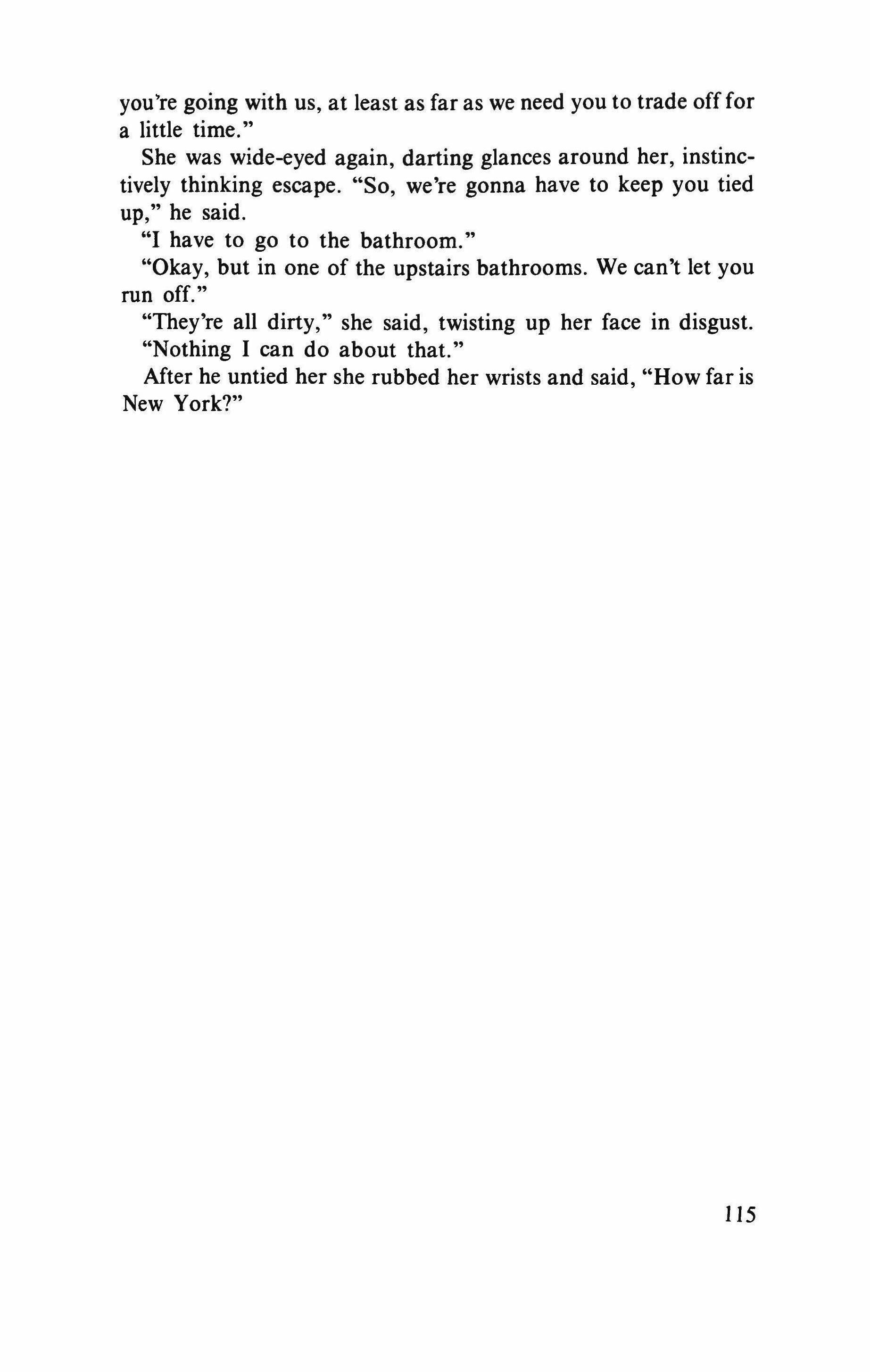
you're going with us, at least as far as we need you to trade off for a little time."
She was wide-eyed again, darting glances around her, instinctively thinking escape. "So, we're gonna have to keep you tied up," he said.
"I have to go to the bathroom."
"Okay, but in one of the upstairs bathrooms. We can't let you run off."
"They're all dirty," she said, twisting up her face in disgust. "Nothing 1 can do about that."
After he untied her she rubbed her wrists and said, "How far is New York?"
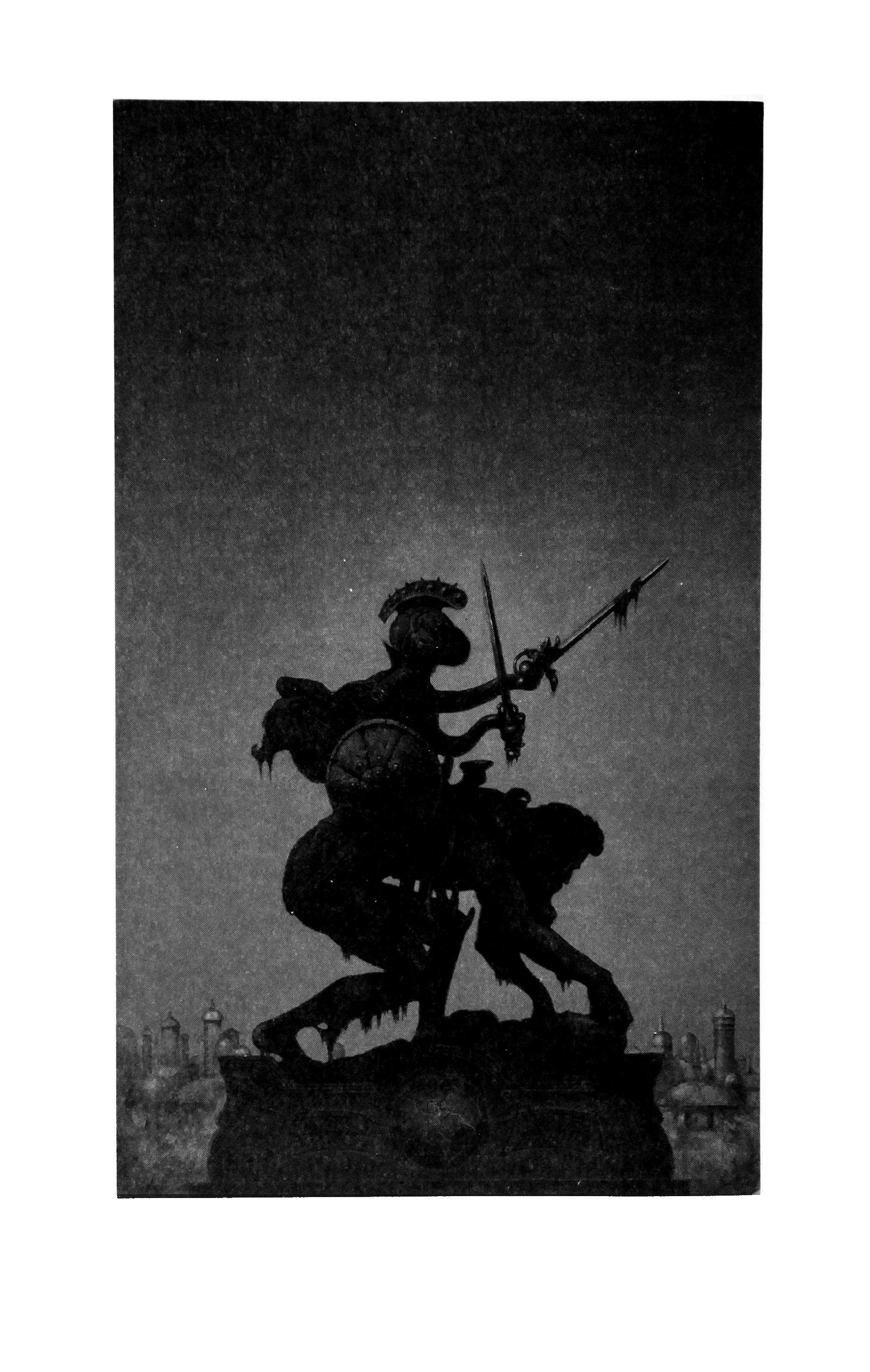
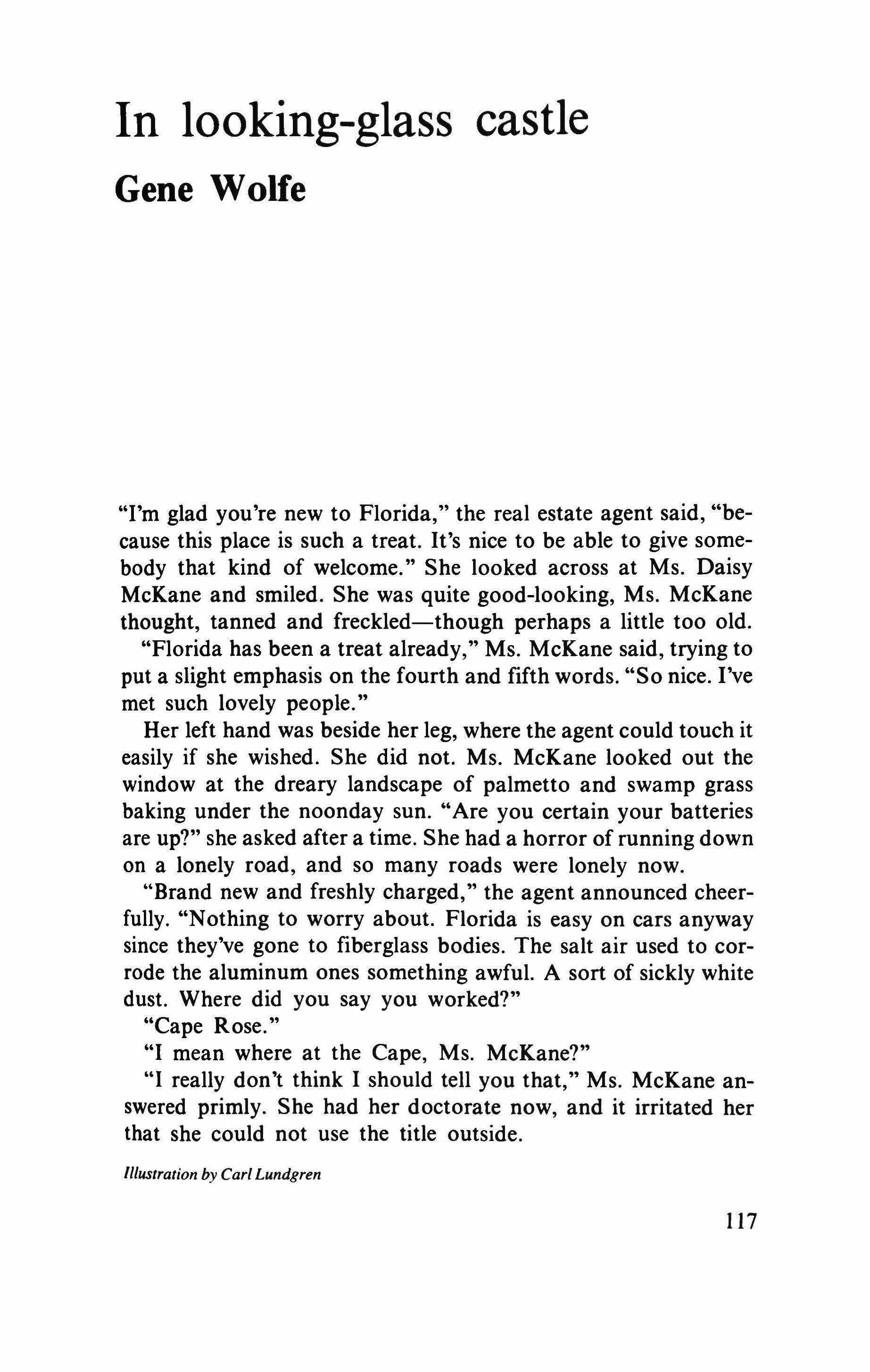
"I'm glad you're new to Florida," the real estate agent said, "because this place is such a treat. It's nice to be able to give somebody that kind of welcome." She looked across at Ms. Daisy McKane and smiled. She was quite good-looking, Ms. McKane thought, tanned and freckled-though perhaps a little too old.
"Florida has been a treat already," Ms. McKane said, trying to put a slight emphasis on the fourth and fifth words. "So nice. I've met such lovely people."
Her left hand was beside her leg, where the agent could touch it easily if she wished. She did not. Ms. McKane looked out the window at the dreary landscape of palmetto and swamp grass baking under the noonday sun. "Are you certain your batteries are up?" she asked after a time. She had a horror of running down on a lonely road, and so many roads were lonely now.
"Brand new and freshly charged," the agent announced cheerfully. "Nothing to worry about. Florida is easy on cars anyway since they've gone to fiberglass bodies. The salt air used to corrode the aluminum ones something awful. A sort of sickly white dust. Where did you say you worked?"
"Cape Rose."
"I mean where at the Cape, Ms. McKane?"
"I really don't think 1 should tell you that," Ms. McKane answered primly. She had her doctorate now, and it irritated her that she could not use the title outside.
Illustration by Carl Lundgren
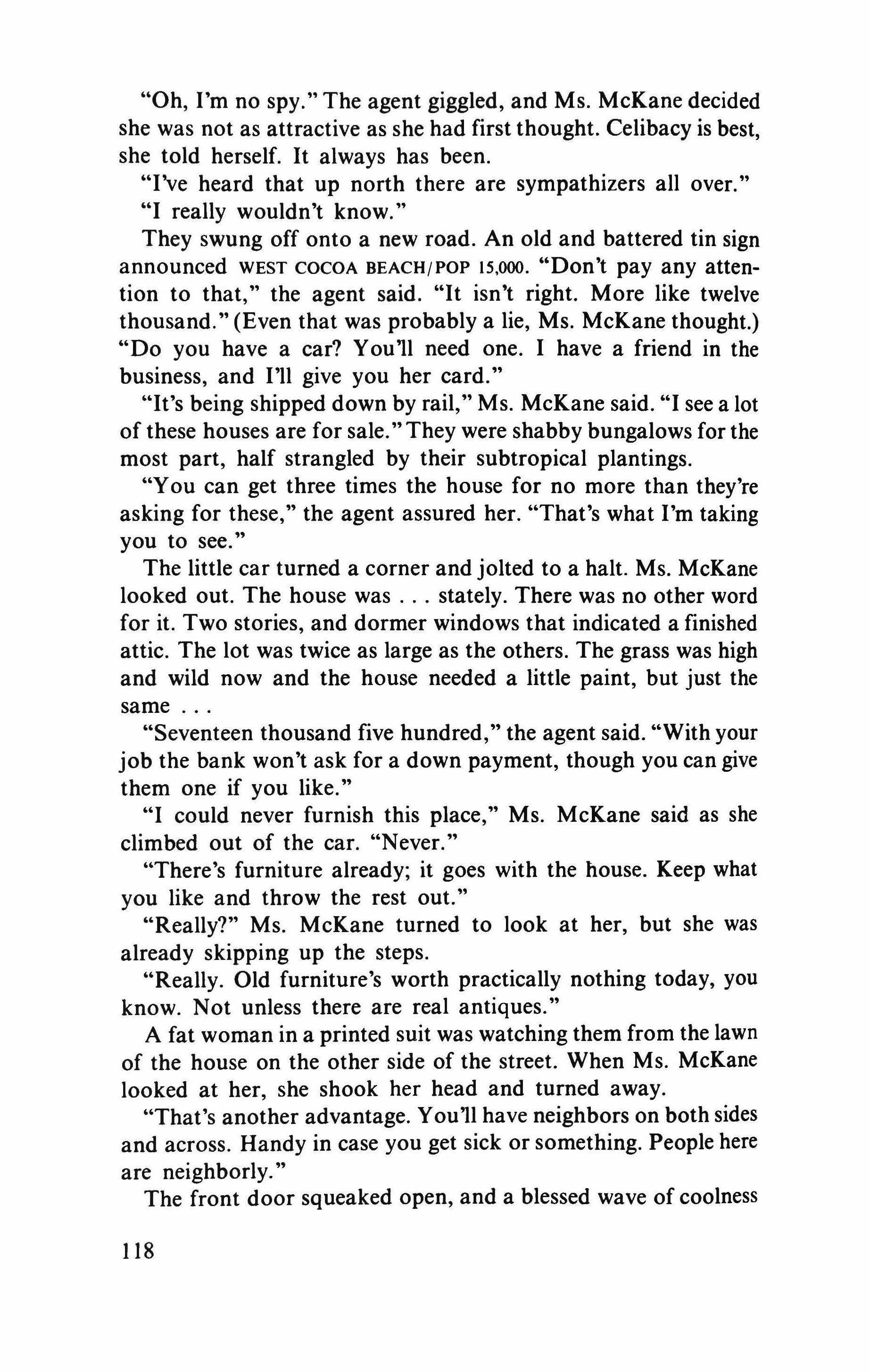
"Oh, I'm no spy." The agent giggled, and Ms. McKane decided she was not as attractive as she had first thought. Celibacy is best, she told herself. It always has been.
"I've heard that up north there are sympathizers all over."
"I really wouldn't know."
They swung off onto a new road. An old and battered tin sign announced WEST COCOA BEACH/POP 15,000. "Don't pay any attention to that," the agent said. "It isn't right. More like twelve thousand." (Even that was probably a lie, Ms. McKane thought.)
"Do you have a car? You'll need one. I have a friend in the business, and I'll give you her card."
"It's being shipped down by rail," Ms. McKane said. "I see a lot of these houses are for sale." They were shabby bungalows for the most part, half strangled by their subtropical plantings.
"You can get three times the house for no more than they're asking for these," the agent assured her. "That's what I'm taking you to see."
The little car turned a corner and jolted to a halt. Ms. McKane looked out. The house was stately. There was no other word for it. Two stories, and dormer windows that indicated a finished attic. The lot was twice as large as the others. The grass was high and wild now and the house needed a little paint, but just the same
"Seventeen thousand five hundred," the agent said. "With your job the bank won't ask for a down payment, though you can give them one if you like."
"I could never furnish this place," Ms. McKane said as she climbed out of the car. "Never."
"There's furniture already; it goes with the house. Keep what you like and throw the rest out."
"Really?" Ms. McKane turned to look at her, but she was already skipping up the steps.
"Really. Old furniture's worth practically nothing today, you know. Not unless there are real antiques."
A fat woman in a printed suit was watching them from the lawn of the house on the other side of the street. When Ms. McKane looked at her, she shook her head and turned away.
"That's another advantage. You'll have neighbors on both sides and across. Handy in case you get sick or something. People here are neighborly."
The front door squeaked open, and a blessed wave of coolness
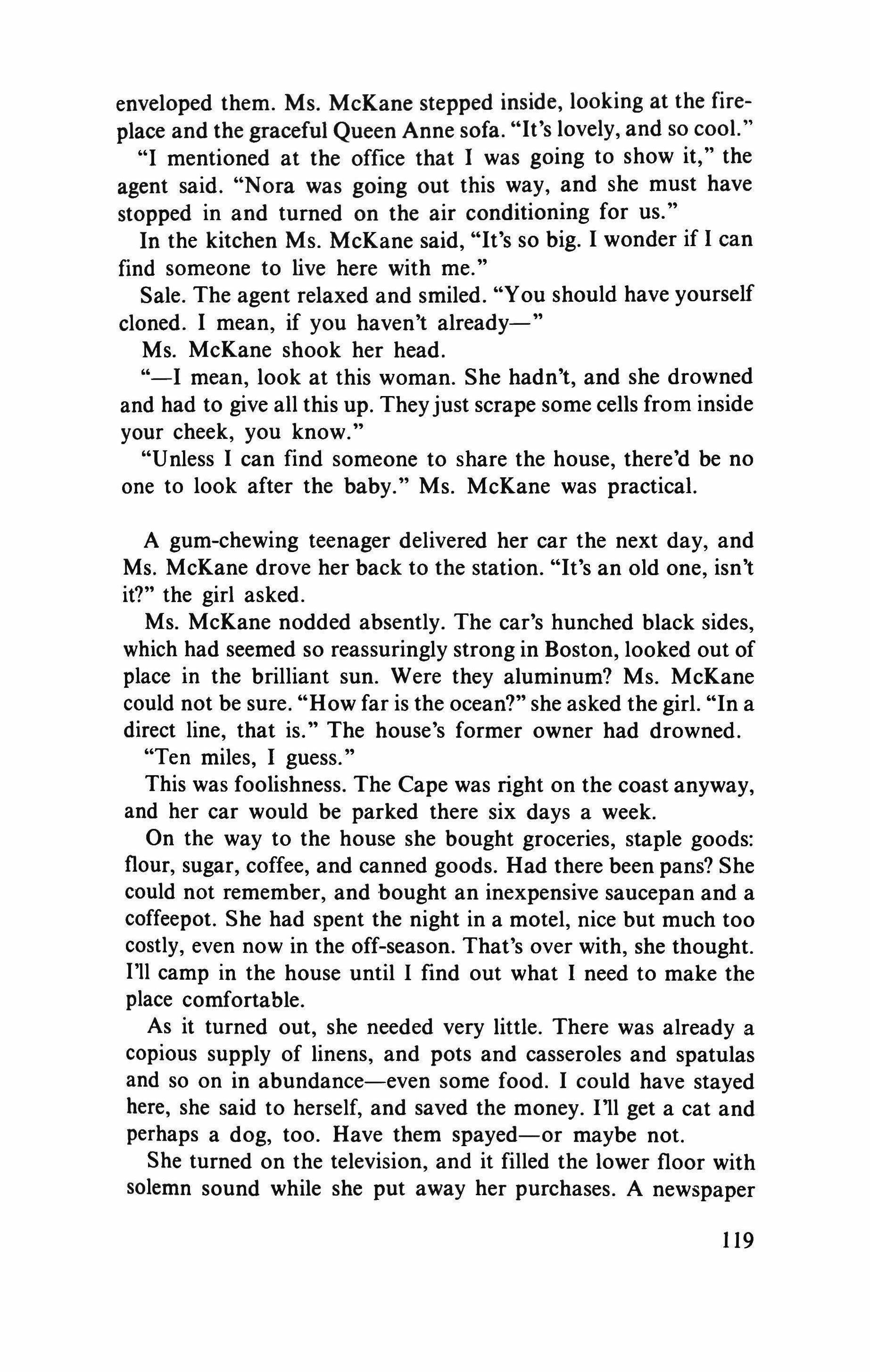
enveloped them. Ms. McKane stepped inside, looking at the fireplace and the graceful Queen Anne sofa. "It's lovely, and so cool."
"I mentioned at the office that I was going to show it," the agent said. "Nora was going out this way, and she must have stopped in and turned on the air conditioning for us."
In the kitchen Ms. McKane said, "It's so big. I wonder if I can find someone to live here with me."
Sale. The agent relaxed and smiled. "You should have yourself cloned. I mean, if you haven't already-"
Ms. McKane shook her head.
"-I mean, look at this woman. She hadn't, and she drowned and had to give all this up. Theyjust scrape some cells from inside your cheek, you know."
"Unless I can find someone to share the house, there'd be no one to look after the baby." Ms. McKane was practical.
A gum-chewing teenager delivered her car the next day, and Ms. McKane drove her back to the station. "It's an old one, isn't it?" the girl asked.
Ms. McKane nodded absently. The car's hunched black sides, which had seemed so reassuringly strong in Boston, looked out of place in the brilliant sun. Were they aluminum? Ms. McKane could not be sure. "How far is the ocean?" she asked the girl. "In a direct line, that is." The house's former owner had drowned.
"Ten miles, I guess."
This was foolishness. The Cape was right on the coast anyway, and her car would be parked there six days a week.
On the way to the house she bought groceries, staple goods: flour, sugar, coffee, and canned goods. Had there been pans? She could not remember, and bought an inexpensive saucepan and a coffeepot. She had spent the night in a motel, nice but much too costly, even now in the off-season. That's over with, she thought. I'll camp in the house until I find out what I need to make the place comfortable.
As it turned out, she needed very little. There was already a copious supply of linens, and pots and casseroles and spatulas and so on in abundance-even some food. I could have stayed here, she said to herself, and saved the money. 111 get a cat and perhaps a dog, too. Have them spayed-or maybe not.
She turned on the television, and it filled the lower floor with solemn sound while she put away her purchases. A newspaper
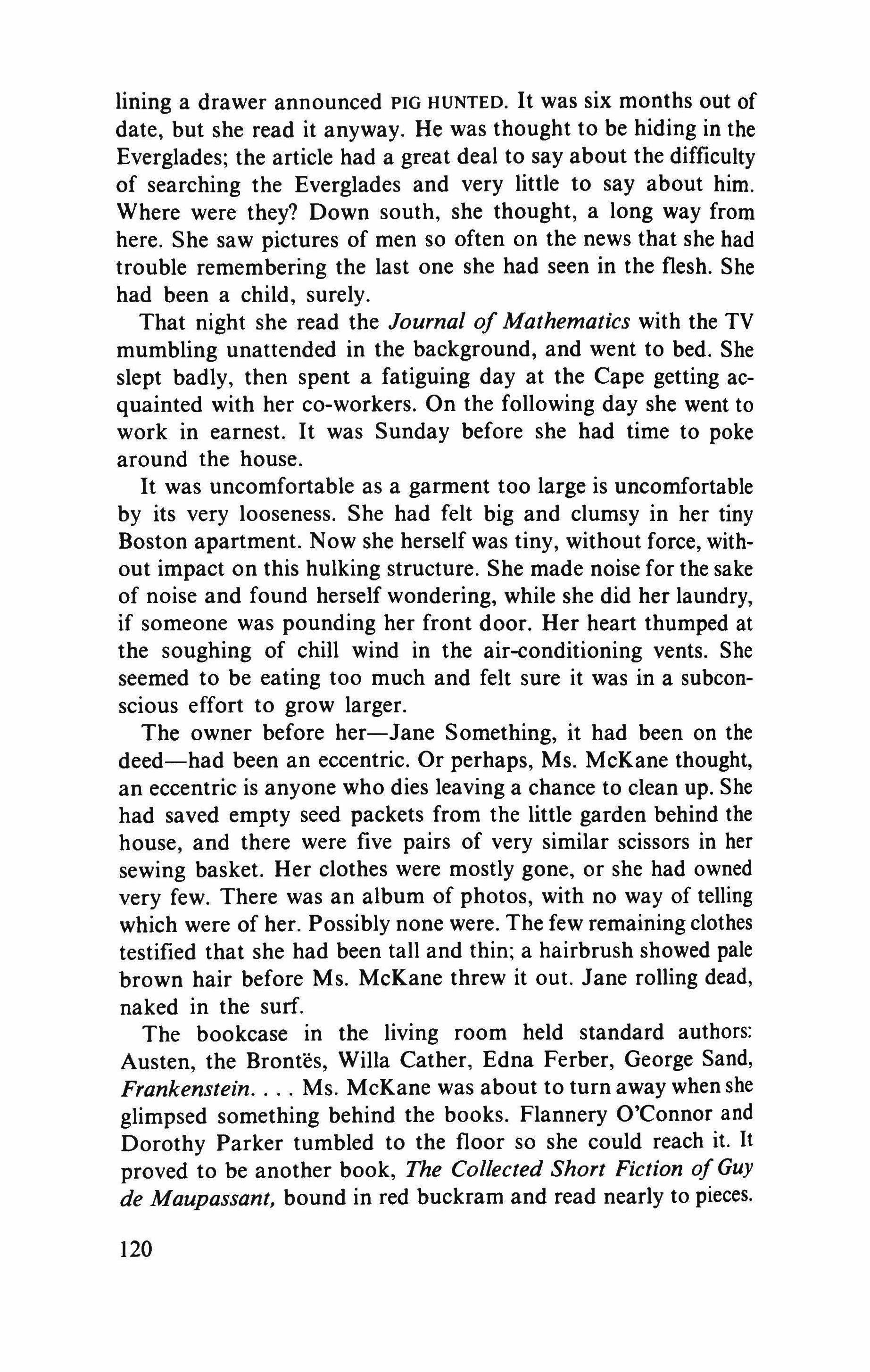
lining a drawer announced PIG HUNTED. It was six months out of date, but she read it anyway. He was thought to be hiding in the Everglades; the article had a great deal to say about the difficulty of searching the Everglades and very little to say about him. Where were they? Down south, she thought, a long way from here. She saw pictures of men so often on the news that she had trouble remembering the last one she had seen in the flesh. She had been a child, surely.
That night she read the Journal of Mathematics with the TV mumbling unattended in the background, and went to bed. She slept badly, then spent a fatiguing day at the Cape getting acquainted with her co-workers. On the following day she went to work in earnest. It was Sunday before she had time to poke around the house.
It was uncomfortable as a garment too large is uncomfortable by its very looseness. She had felt big and clumsy in her tiny Boston apartment. Now she herself was tiny, without force, without impact on this hulking structure. She made noise for the sake of noise and found herself wondering, while she did her laundry, if someone was pounding her front door. Her heart thumped at the soughing of chill wind in the air-conditioning vents. She seemed to be eating too much and felt sure it was in a subconscious effort to grow larger.
The owner before her-Jane Something, it had been on the deed-had been an eccentric. Or perhaps, Ms. McKane thought, an eccentric is anyone who dies leaving a chance to clean up. She had saved empty seed packets from the little garden behind the house, and there were five pairs of very similar scissors in her sewing basket. Her clothes were mostly gone, or she had owned very few. There was an album of photos, with no way of telling which were of her. Possibly none were. The few remaining clothes testified that she had been tall and thin; a hairbrush showed pale brown hair before Ms. McKane threw it out. Jane rolling dead, naked in the surf.
The bookcase in the living room held standard authors: Austen, the Brontes, Willa Cather, Edna Ferber, George Sand, Frankenstein Ms. McKane was about to turn away when she glimpsed something behind the books. Flannery O'Connor and Dorothy Parker tumbled to the floor so she could reach it. It proved to be another book, The Collected Short Fiction of Guy de Maupassant, bound in red buckram and read nearly to pieces.
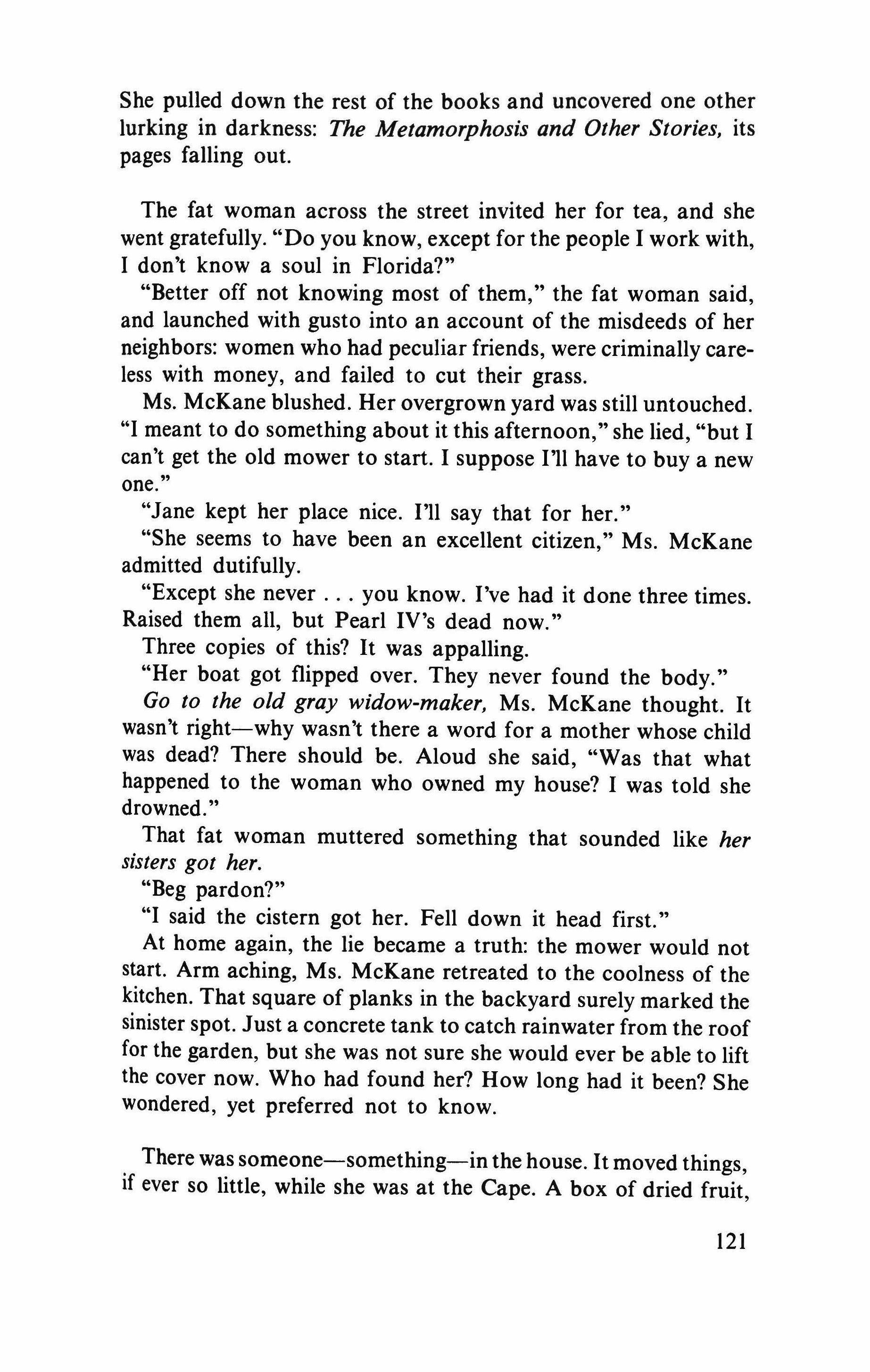
She pulled down the rest of the books and uncovered one other lurking in darkness: The Metamorphosis and Other Stories, its pages falling out.
The fat woman across the street invited her for tea, and she went gratefully. "Do you know, except for the people I work with, 1 don't know a soul in Florida?"
"Better off not knowing most of them," the fat woman said, and launched with gusto into an account of the misdeeds of her neighbors: women who had peculiar friends, were criminally careless with money, and failed to cut their grass.
Ms. McKane blushed. Her overgrown yard was still untouched. "I meant to do something about it this afternoon," she lied, "but I can't get the old mower to start. I suppose I'll have to buy a new one."
"Jane kept her place nice. I'll say that for her."
"She seems to have been an excellent citizen," Ms. McKane admitted dutifully.
"Except she never you know. I've had it done three times. Raised them all, but Pearl IV's dead now."
Three copies of this? It was appalling.
"Her boat got flipped over. They never found the body."
Go to the old gray widow-maker, Ms. McKane thought. It wasn't right-why wasn't there a word for a mother whose child was dead? There should be. Aloud she said, "Was that what happened to the woman who owned my house? I was told she drowned."
That fat woman muttered something that sounded like her sisters got her.
"Beg pardon?"
"I said the cistern got her. Fell down it head first."
At home again, the lie became a truth: the mower would not start. Arm aching, Ms. McKane retreated to the coolness of the kitchen. That square of planks in the backyard surely marked the sinister spot. Just a concrete tank to catch rainwater from the roof for the garden, but she was not sure she would ever be able to lift the cover now. Who had found her? How long had it been? She wondered, yet preferred not to know.
There was someone-something-in the house. It moved things, if ever so little, while she was at the Cape. A box of dried fruit,
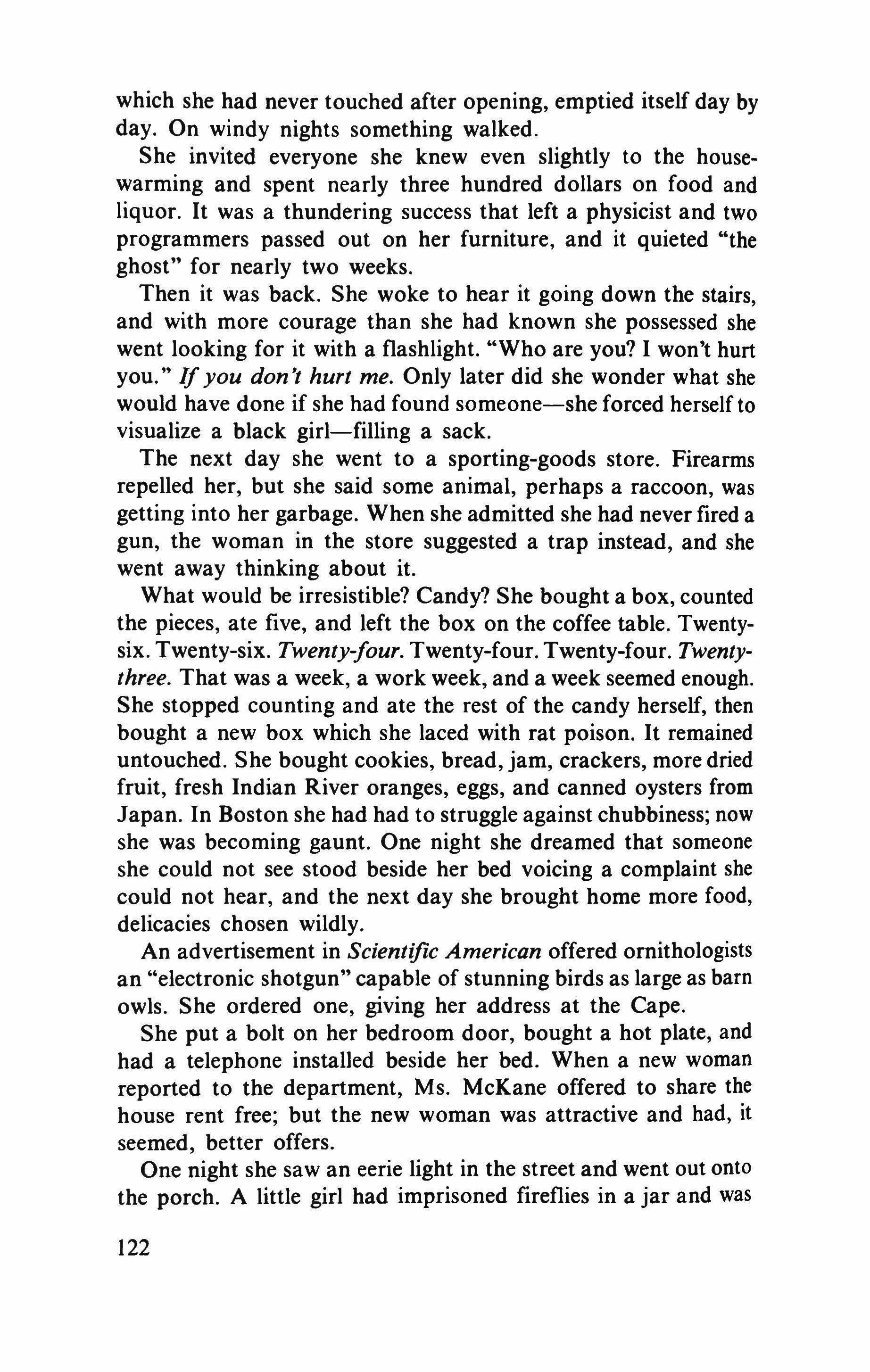
which she had never touched after opening, emptied itself day by day. On windy nights something walked.
She invited everyone she knew even slightly to the housewarming and spent nearly three hundred dollars on food and liquor. It was a thundering success that left a physicist and two programmers passed out on her furniture, and it quieted "the ghost" for nearly two weeks.
Then it was back. She woke to hear it going down the stairs, and with more courage than she had known she possessed she went looking for it with a flashlight. "Who are you? I won't hurt you." If you don't hurt me. Only later did she wonder what she would have done if she had found someone-she forced herself to visualize a black girl-filling a sack.
The next day she went to a sporting-goods store. Firearms repelled her, but she said some animal, perhaps a raccoon, was getting into her garbage. When she admitted she had never fired a gun, the woman in the store suggested a trap instead, and she went away thinking about it.
What would be irresistible? Candy? She bought a box, counted the pieces, ate five, and left the box on the coffee table. Twentysix. Twenty-six. Twenty-four. Twenty-four. Twenty-four. Twentythree. That was a week, a work week, and a week seemed enough. She stopped counting and ate the rest of the candy herself, then bought a new box which she laced with rat poison. It remained untouched. She bought cookies, bread, jam, crackers, more dried fruit, fresh Indian River oranges, eggs, and canned oysters from Japan. In Boston she had had to struggle against chubbiness; now she was becoming gaunt. One night she dreamed that someone she could not see stood beside her bed voicing a complaint she could not hear, and the next day she brought home more food, delicacies chosen wildly.
An advertisement in Scientific American offered ornithologists an "electronic shotgun" capable of stunning birds as large as barn owls. She ordered one, giving her address at the Cape.
She put a bolt on her bedroom door, bought a hot plate, and had a telephone installed beside her bed. When a new woman reported to the department, Ms. McKane offered to share the house rent free; but the new woman was attractive and had, it seemed, better offers.
One night she saw an eerie light in the street and went out onto the porch. A little girl had imprisoned fireflies in a jar and was
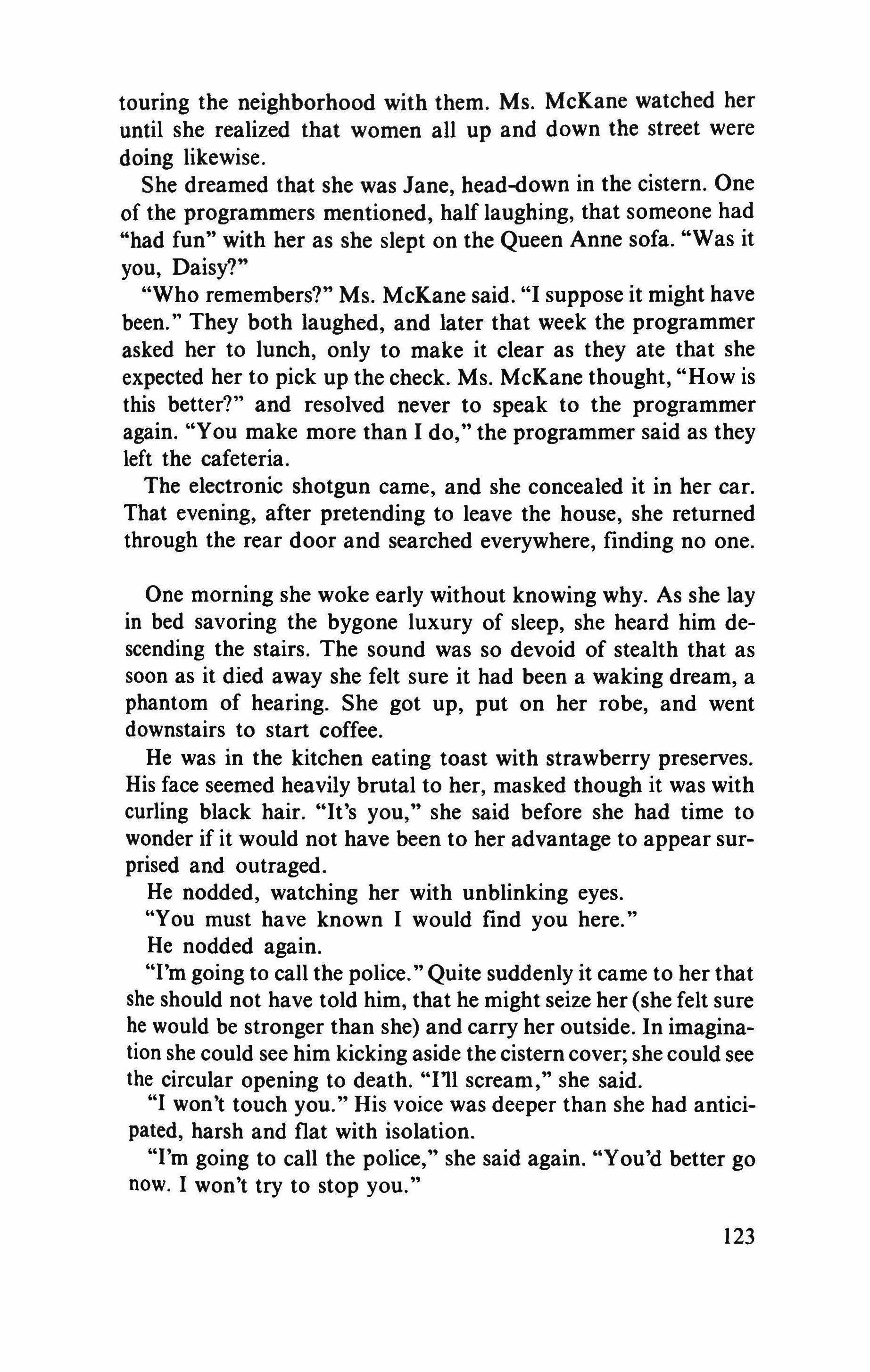
touring the neighborhood with them. Ms. McKane watched her until she realized that women all up and down the street were doing likewise.
She dreamed that she was Jane, head-down in the cistern. One of the programmers mentioned, half laughing, that someone had "had fun" with her as she slept on the Queen Anne sofa. "Was it you, Daisy?"
"Who remembers?" Ms. McKane said. "I suppose it might have been." They both laughed, and later that week the programmer asked her to lunch, only to make it clear as they ate that she expected her to pick up the check. Ms. McKane thought, "How is this better?" and resolved never to speak to the programmer again. "You make more than I do," the programmer said as they left the cafeteria.
The electronic shotgun came, and she concealed it in her car. That evening, after pretending to leave the house, she returned through the rear door and searched everywhere, finding no one.
One morning she woke early without knowing why. As she lay in bed savoring the bygone luxury of sleep, she heard him descending the stairs. The sound was so devoid of stealth that as soon as it died away she felt sure it had been a waking dream, a phantom of hearing. She got up, put on her robe, and went downstairs to start coffee.
He was in the kitchen eating toast with strawberry preserves. His face seemed heavily brutal to her, masked though it was with curling black hair. "It's you," she said before she had time to wonder if it would not have been to her advantage to appear surprised and outraged.
He nodded, watching her with unblinking eyes.
"You must have known 1 would find you here."
He nodded again.
"I'm going to call the police." Quite suddenly it came to her that she should not have told him, that he might seize her (she felt sure he would be stronger than she) and carry her outside. In imagination she could see him kicking aside the cistern cover; she could see the circular opening to death. "I'll scream," she said.
"I won't touch you." His voice was deeper than she had anticipated, harsh and flat with isolation.
"I'm going to call the police," she said again. "You'd better go now. I won't try to stop you."
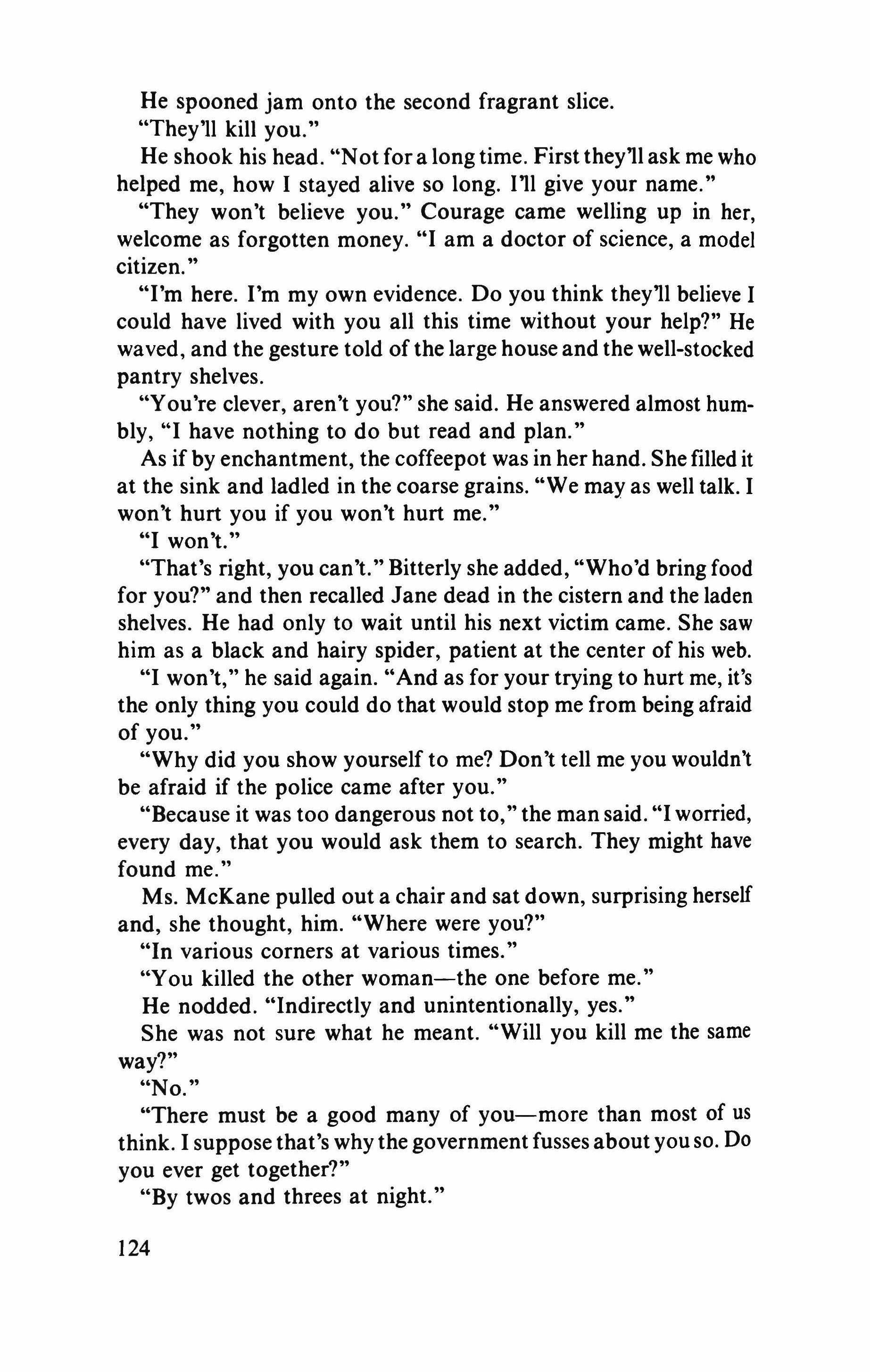
He spooned jam onto the second fragrant slice.
"They'll kill you."
He shook his head. "Not for a long time. First they'll ask me who helped me, how I stayed alive so long. I'll give your name."
"They won't believe you." Courage came welling up in her, welcome as forgotten money. "I am a doctor of science, a model citizen.
"I'm here. I'm my own evidence. Do you think they'll believe I could have lived with you all this time without your help?" He waved, and the gesture told of the large house and the well-stocked pantry shelves.
"You're clever, aren't you?" she said. He answered almost humbly, "I have nothing to do but read and plan."
As if by enchantment, the coffeepot was in her hand. She filled it at the sink and ladled in the coarse grains. "We may as well talk. I won't hurt you if you won't hurt me."
"I won't."
"That's right, you can't." Bitterly she added, "Who'd bring food for you?" and then recalled Jane dead in the cistern and the laden shelves. He had only to wait until his next victim came. She saw him as a black and hairy spider, patient at the center of his web.
"I won't," he said again. "And as for your trying to hurt me, it's the only thing you could do that would stop me from being afraid of you."
"Why did you show yourself to me? Don't tell me you wouldn't be afraid if the police came after you."
"Because it was too dangerous not to," the man said. "I worried, every day, that you would ask them to search. They might have found me."
Ms. McKane pulled out a chair and sat down, surprising herself and, she thought, him. "Where were you?"
"In various corners at various times."
"You killed the other woman-the one before me."
He nodded. "Indirectly and unintentionally, yes."
She was not sure what he meant. "Will you kill me the same way?"
"No.
"There must be a good many of you-more than most of us think. 1 suppose that's why the government fusses about you so. Do you ever get together?"
"By twos and threes at night."
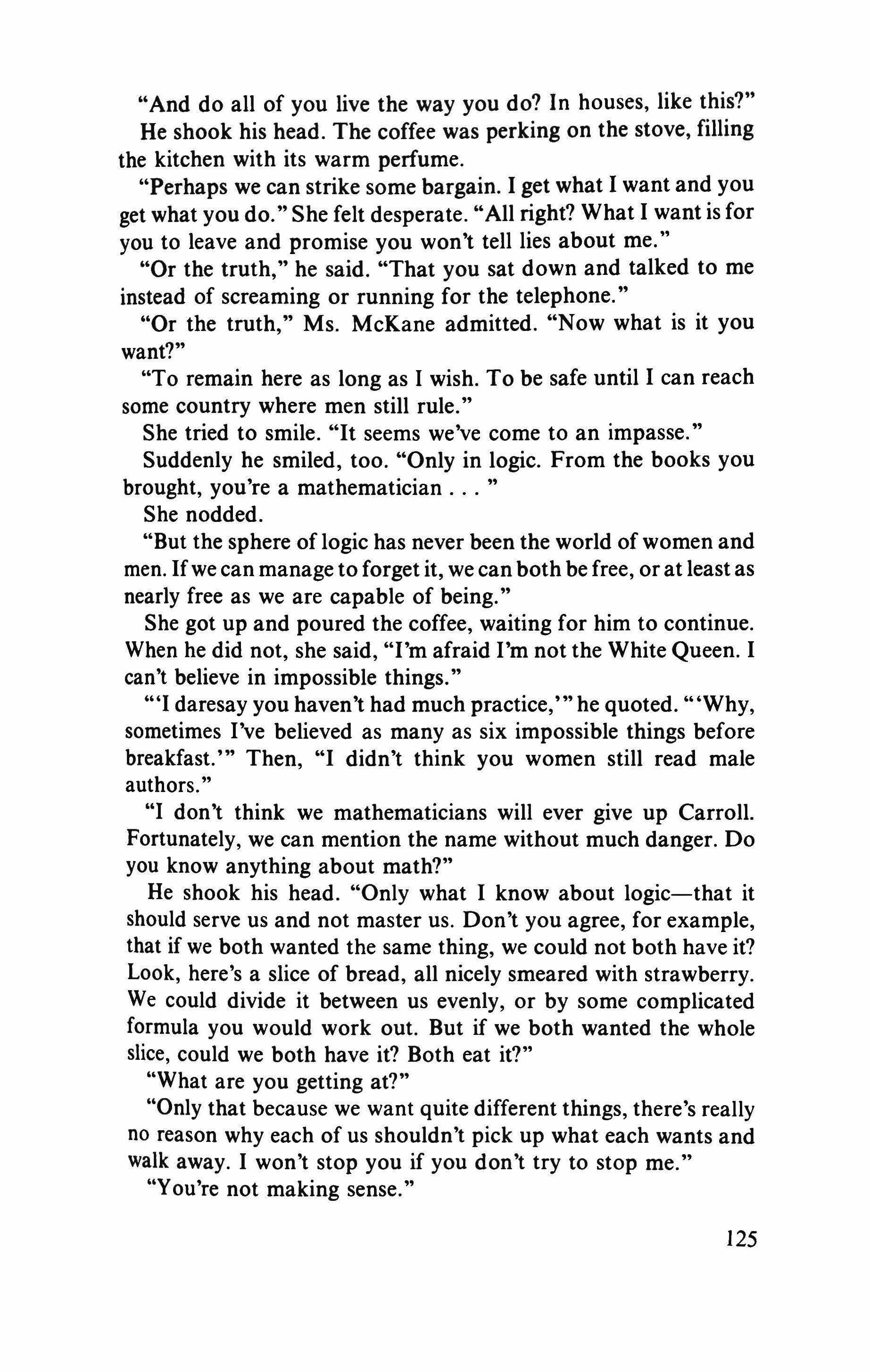
"And do all of you live the way you do? In houses, like this?"
He shook his head. The coffee was perking on the stove, filling the kitchen with its warm perfume.
"Perhaps we can strike some bargain. I get what I want and you get what you do." She felt desperate. "All right? What I want is for you to leave and promise you won't tell lies about me."
"Or the truth," he said. "That you sat down and talked to me instead of screaming or running for the telephone."
"Or the truth," Ms. McKane admitted. "Now what is it you want?"
"T0 remain here as long as I wish. To be safe until I can reach some country where men still rule."
She tried to smile. "It seems we've come to an impasse."
Suddenly he smiled, too. "Only in logic. From the books you brought, you're a mathematician
She nodded.
"But the sphere of logic has never been the world of women and men. If we can manage to forget it, we can both be free, or at least as nearly free as we are capable of being."
She got up and poured the coffee, waiting for him to continue. When he did not, she said, "I'm afraid I'm not the White Queen. I can't believe in impossible things."
'''I daresay you haven't had much practice,"'he quoted. '''Why, sometimes I've believed as many as six impossible things before breakfast. '" Then, "I didn't think you women still read male authors."
"I don't think we mathematicians will ever give up Carroll. Fortunately, we can mention the name without much danger. Do you know anything about math?"
He shook his head. "Only what 1 know about logic-that it should serve us and not master us. Don't you agree, for example, that if we both wanted the same thing, we could not both have it? Look, here's a slice of bread, all nicely smeared with strawberry. We could divide it between us evenly, or by some complicated formula you would work out. But if we both wanted the whole slice, could we both have it? Both eat it?"
"What are you getting at?"
"Only that because we want quite different things, there's really no reason why each of us shouldn't pick up what each wants and walk away. 1 won't stop you if you don't try to stop me."
"You're not making sense."
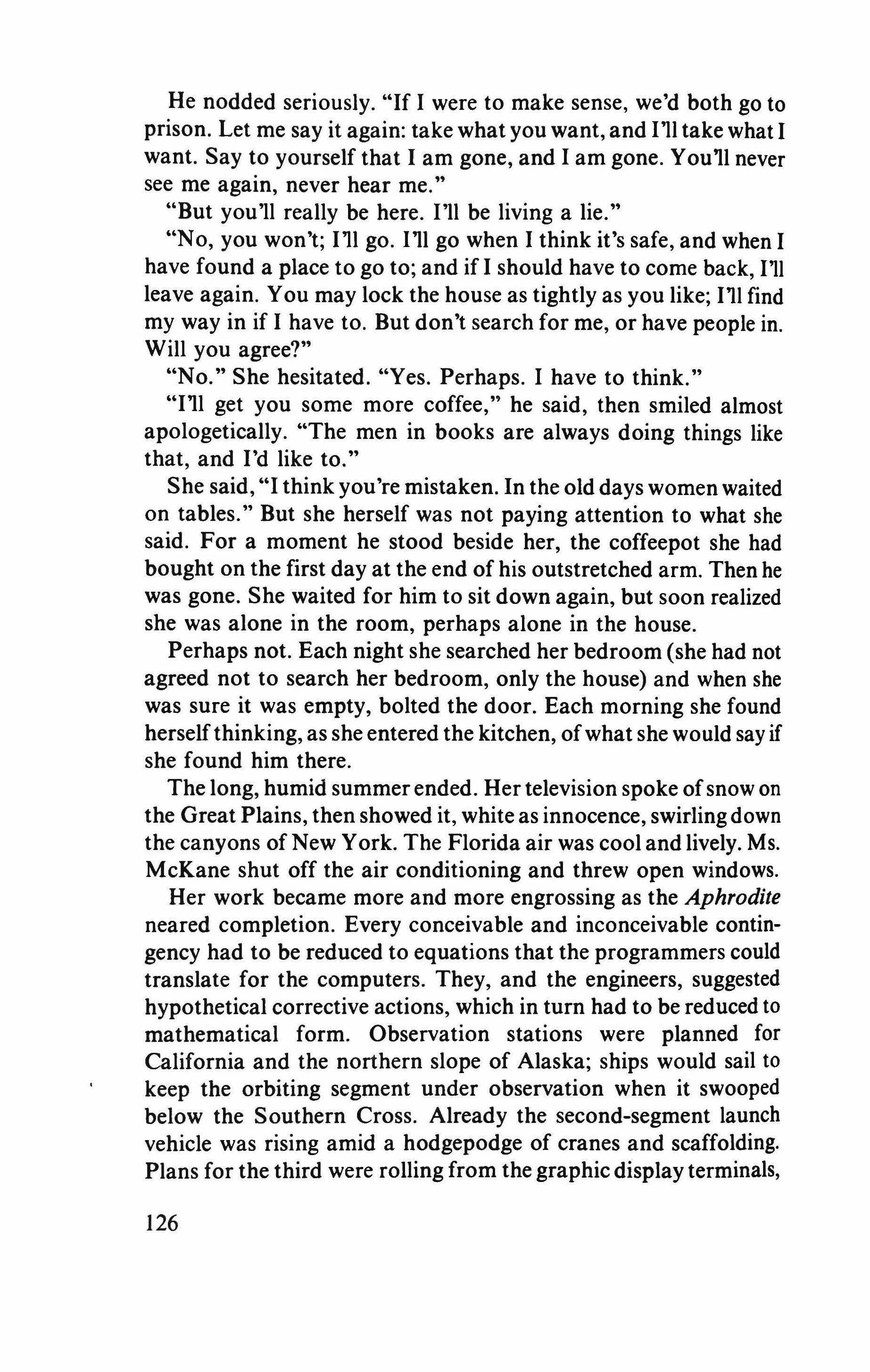
He nodded seriously. "If I were to make sense, we'd both go to prison. Let me say it again: take what you want, and 111 take what I want. Say to yourself that I am gone, and I am gone. You'll never see me again, never hear me."
"But you'11 really be here. I'll be living a lie."
"No, you won't; I'll go. I'll go when I think it's safe, and when I have found a place to go to; and if I should have to come back, I'll leave again. You may lock the house as tightly as you like; I'll find my way in if I have to. But don't search for me, or have people in. Will you agree?"
"N0." She hesitated. "Yes. Perhaps. I have to think."
"I'll get you some more coffee," he said, then smiled almost apologetically. "The men in books are always doing things like that, and I'd like to."
She said, "I think you're mistaken. In the old days women waited on tables." But she herself was not paying attention to what she said. For a moment he stood beside her, the coffeepot she had bought on the first day at the end of his outstretched arm. Then he was gone. She waited for him to sit down again, but soon realized she was alone in the room, perhaps alone in the house.
Perhaps not. Each night she searched her bedroom (she had not agreed not to search her bedroom, only the house) and when she was sure it was empty, bolted the door. Each morning she found herselfthinking, as she entered the kitchen, ofwhat she would say if she found him there.
The long, humid summer ended. Her television spoke of snow on the Great Plains, then showed it, white as innocence, swirling down the canyons of New York. The Florida air was cool and lively. Ms. McKane shut off the air conditioning and threw open windows. Her work became more and more engrossing as the Aphrodite neared completion. Every conceivable and inconceivable contingency had to be reduced to equations that the programmers could translate for the computers. They, and the engineers, suggested hypothetical corrective actions, which in turn had to be reduced to mathematical form. Observation stations were planned for California and the northern slope of Alaska; ships would sail to keep the orbiting segment under observation when it swooped below the Southern Cross. Already the second-segment launch vehicle was rising amid a hodgepodge of cranes and scaffolding. Plans for the third were rolling from the graphicdisplay terminals,
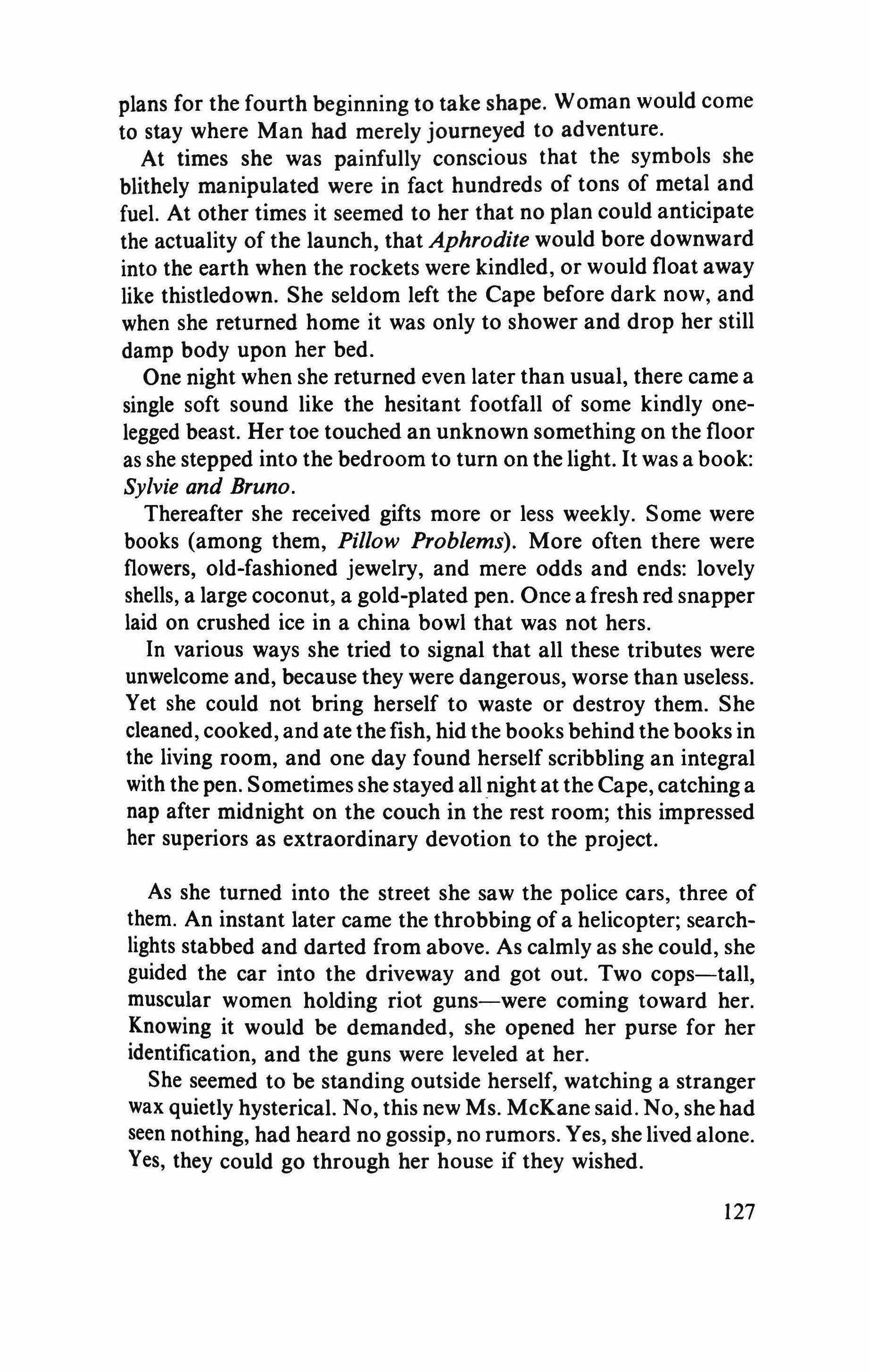
plans for the fourth beginning to take shape. Woman would come to stay where Man had merely journeyed to adventure.
At times she was painfully conscious that the symbols she blithely manipulated were in fact hundreds of tons of metal and fuel. At other times it seemed to her that no plan could anticipate the actuality of the launch, that Aphrodite would bore downward into the earth when the rockets were kindled, or would float away like thistledown. She seldom left the Cape before dark now, and when she returned home it was only to shower and drop her still damp body upon her bed.
One night when she returned even later than usual, there came a single soft sound like the hesitant footfall of some kindly onelegged beast. Her toe touched an unknown something on the floor as she stepped into the bedroom to tum on the light. It was a book: Sylvie and Bruno.
Thereafter she received gifts more or less weekly. S orne were books (among them, Pillow Problems). More often there were flowers, old-fashioned jewelry, and mere odds and ends: lovely shells, a large coconut, a gold-plated pen. Once a fresh red snapper laid on crushed ice in a china bowl that was not hers.
In various ways she tried to signal that all these tributes were unwelcome and, because they were dangerous, worse than useless. Yet she could not bring herself to waste or destroy them. She cleaned, cooked, and ate the fish, hid the books behind the books in the living room, and one day found herself scribbling an integral with the pen. Sometimes she stayed all night at the Cape, catching a nap after midnight on the couch in the rest room; this impressed her superiors as extraordinary devotion to the project.
As she turned into the street she saw the police cars, three of them. An instant later came the throbbing of a helicopter; searchlights stabbed and darted from above. As calmly as she could, she guided the car into the driveway and got out. Two cops-tall, muscular women holding riot guns-were coming toward her. Knowing it would be demanded, she opened her purse for her identification, and the guns were leveled at her.
She seemed to be standing outside herself, watching a stranger wax quietly hysterical. No, this new Ms. McKane said. No, she had seen nothing, had heard no gossip, no rumors. Yes, she lived alone. Yes, they could go through her house if they wished.
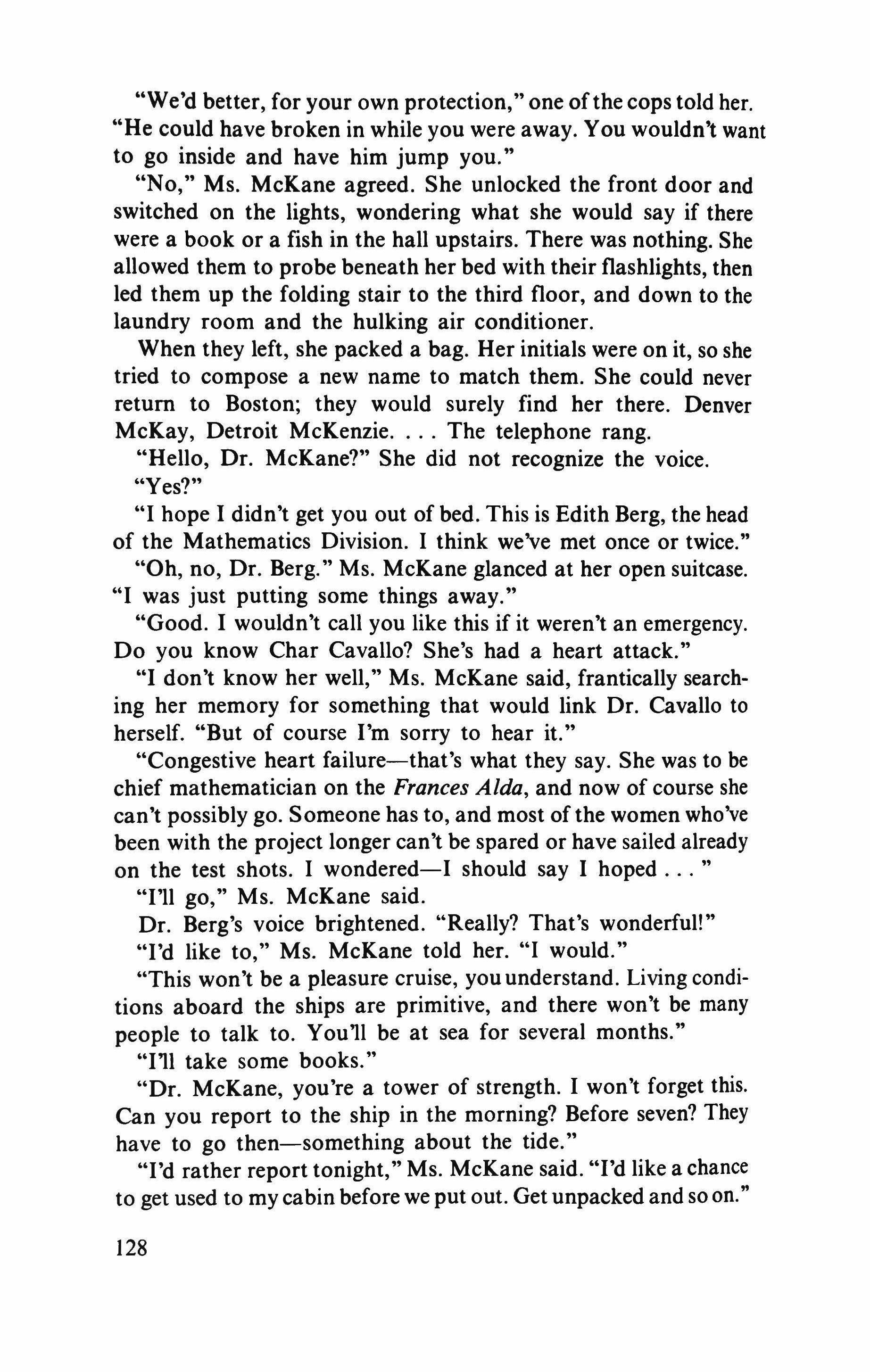
"We'd better, for your own protection," one ofthe cops told her. "He could have broken in while you were away. You wouldn't want to go inside and have him jump you."
"No," Ms. McKane agreed. She unlocked the front door and switched on the lights, wondering what she would say if there were a book or a fish in the hall upstairs. There was nothing. She allowed them to probe beneath her bed with their flashlights, then led them up the folding stair to the third floor, and down to the laundry room and the hulking air conditioner.
When they left, she packed a bag. Her initials were on it, so she tried to compose a new name to match them. She could never return to Boston; they would surely find her there. Denver McKay, Detroit McKenzie The telephone rang.
"Hello, Dr. McKane?" She did not recognize the voice.
"Yes?"
"I hope 1 didn't get you out of bed. This is Edith Berg, the head of the Mathematics Division. 1 think we've met once or twice."
"Oh, no, Dr. Berg." Ms. McKane glanced at her open suitcase. "I was just putting some things away."
"Good. 1 wouldn't call you like this if it weren't an emergency. Do you know Char Cavallo? She's had a heart attack."
"I don't know her well," Ms. McKane said, frantically searching her memory for something that would link Dr. Cavallo to herself. "But of course I'm sorry to hear it."
"Congestive heart failure-that's what they say. She was to be chief mathematician on the Frances Aida, and now of course she can't possibly go. Someone has to, and most ofthe women who've been with the project longer can't be spared or have sailed already on the test shots. 1 wondered-I should say 1 hoped "
"111 go," Ms. McKane said.
Dr. Berg's voice brightened. "Really? That's wonderful!"
"I'd like to," Ms. McKane told her. "I would."
"This won't be a pleasure cruise, you understand. Living conditions aboard the ships are primitive, and there won't be many people to talk to. You'11 be at sea for several months."
"I'll take some books."
"Dr. McKane, you're a tower of strength. 1 won't forget this. Can you report to the ship in the morning? Before seven? They have to go then-something about the tide."
"I'd rather report tonight," Ms. McKane said. "I'd like a chance to get used to my cabin before we put out. Get unpacked and so on."
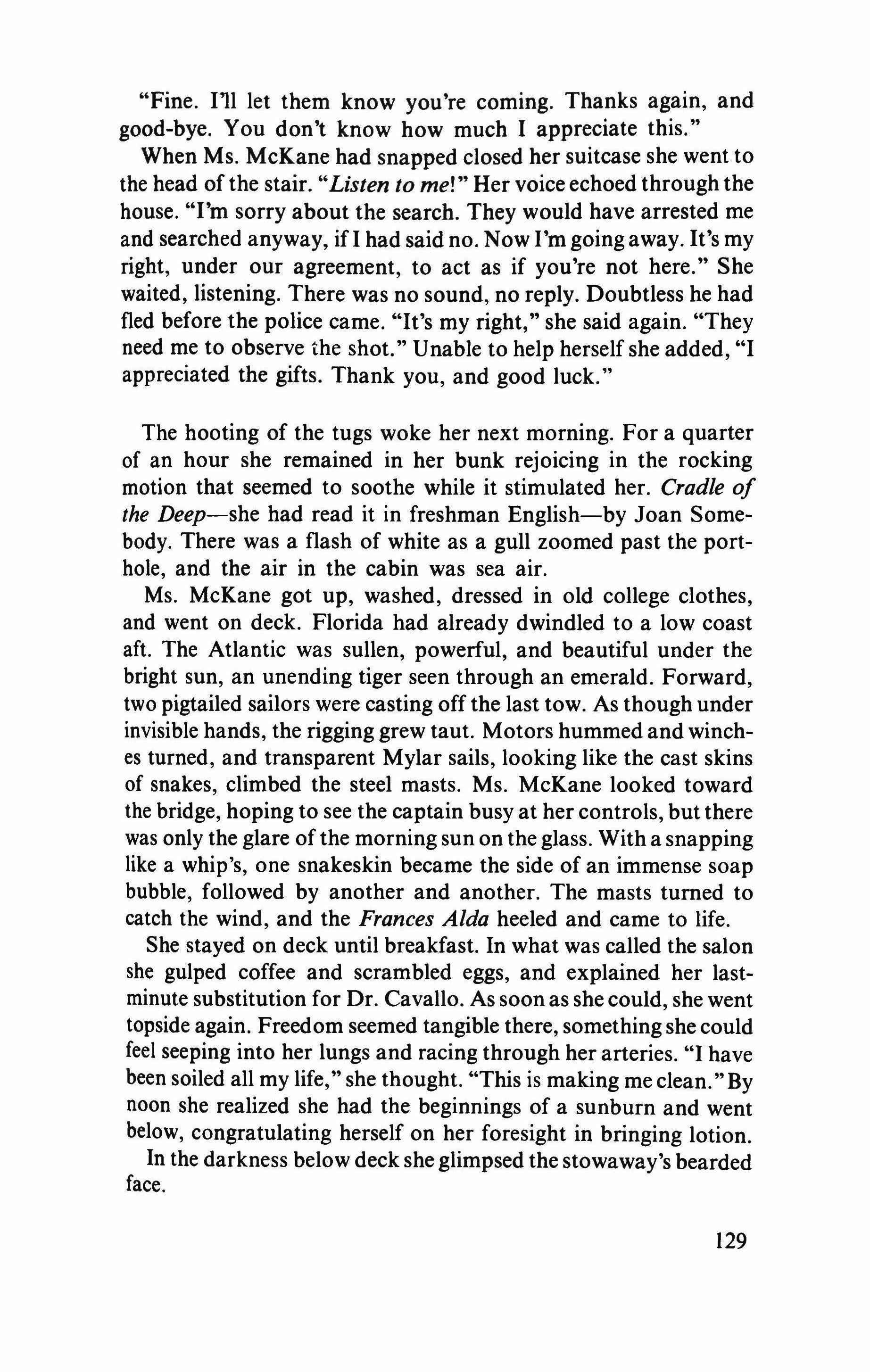
"Fine. I'll let them know you're coming. Thanks again, and good-bye. You don't know how much I appreciate this."
When Ms. McKane had snapped closed her suitcase she went to the head of the stair. "Listen to me!" Her voice echoed through the house. "I'm sorry about the search. They would have arrested me and searched anyway, if I had said no. Now I'm going away. It's my right, under our agreement, to act as if you're not here." She waited, listening. There was no sound, no reply. Doubtless he had fled before the police came. "It's my right," she said again. "They need me to observe the shot." Unable to help herself she added, "I appreciated the gifts. Thank you, and good luck."
The hooting of the tugs woke her next morning. For a quarter of an hour she remained in her bunk rejoicing in the rocking motion that seemed to soothe while it stimulated her. Cradle of the Deep-she had read it in freshman English-by Joan Somebody. There was a flash of white as a gull zoomed past the porthole, and the air in the cabin was sea air.
Ms. McKane got up, washed, dressed in old college clothes, and went on deck. Florida had already dwindled to a low coast aft. The Atlantic was sullen, powerful, and beautiful under the bright sun, an unending tiger seen through an emerald. Forward, two pigtailed sailors were casting off the last tow. As though under invisible hands, the rigging grew taut. Motors hummed and winches turned, and transparent Mylar sails, looking like the cast skins of snakes, climbed the steel masts. Ms. McKane looked toward the bridge, hoping to see the captain busy at her controls, but there was only the glare of the morning sun on the glass. With a snapping like a whip's, one snakeskin became the side of an immense soap bubble, followed by another and another. The masts turned to catch the wind, and the Frances Aida heeled and came to life.
She stayed on deck until breakfast. In what was called the salon she gulped coffee and scrambled eggs, and explained her lastminute substitution for Dr. Cavallo. As soon as she could, she went topside again. Freedom seemed tangible there, something she could feel seeping into her lungs and racing through her arteries. "I have been soiled all my life," she thought. "This is making me clean. By noon she realized she had the beginnings of a sunburn and went below, congratulating herself on her foresight in bringing lotion.
In the darkness below deck she glimpsed the stowaway's bearded face.
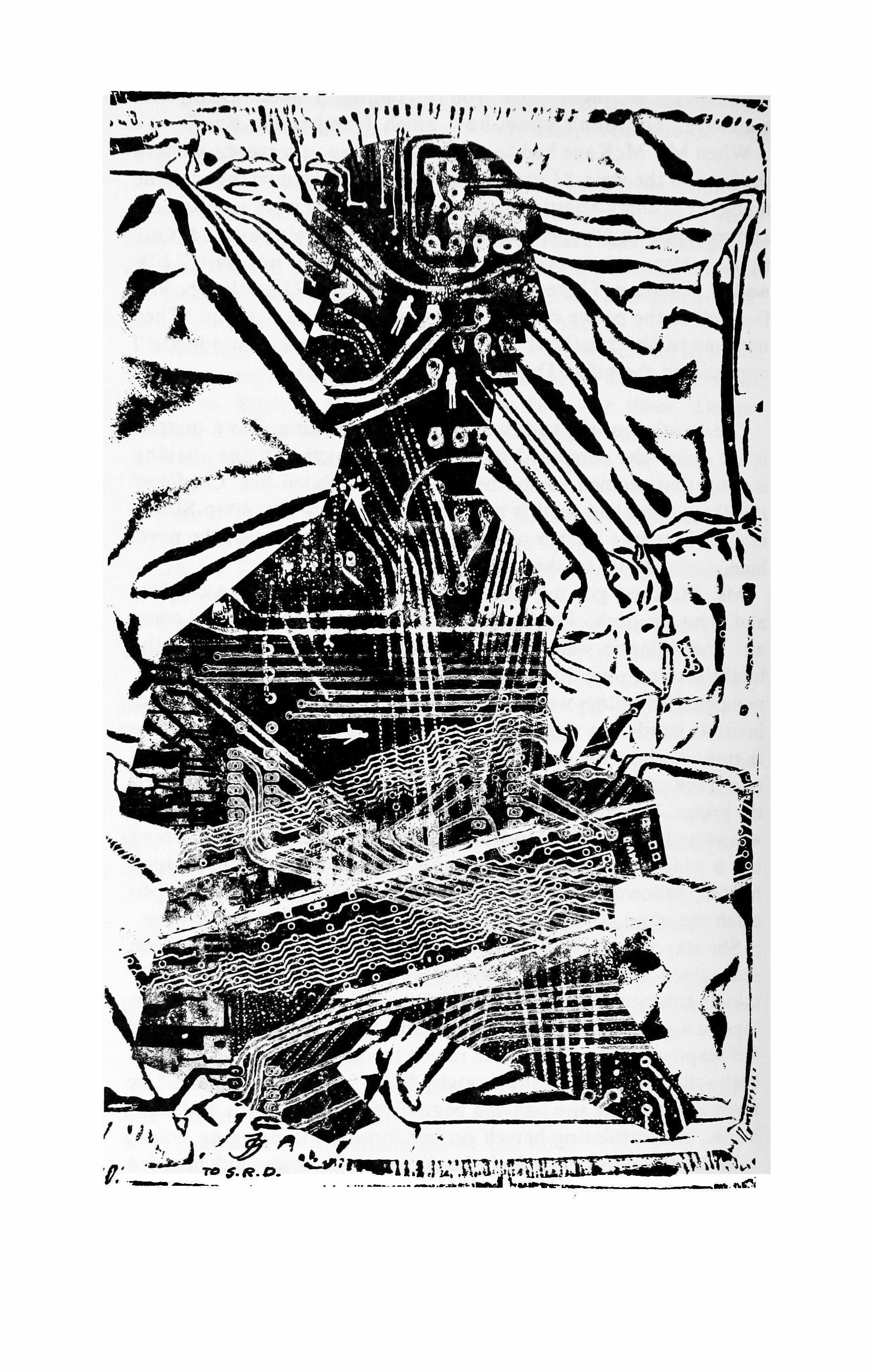
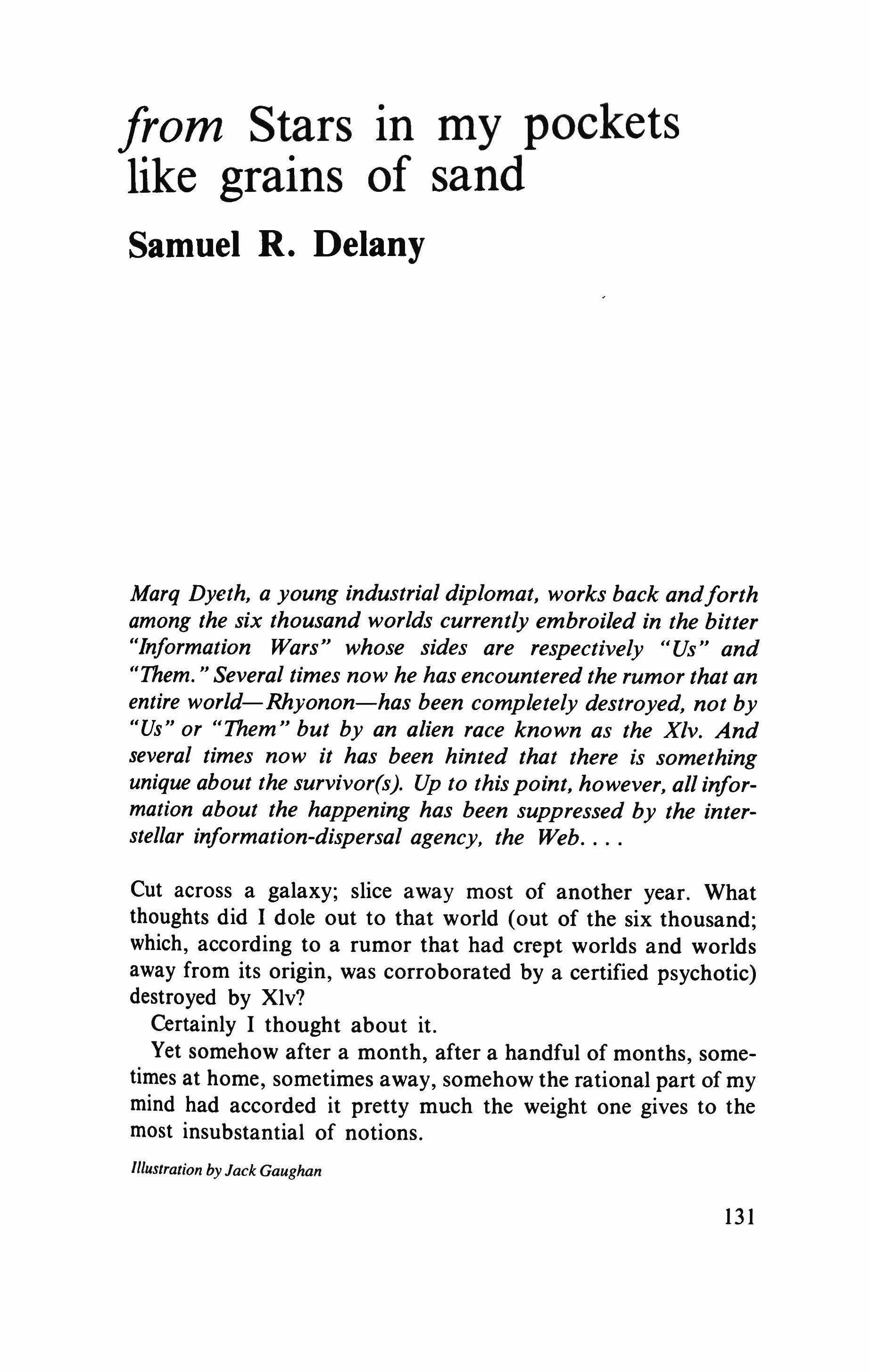
Marq Dyeth, a young industrial diplomat, works back andforth among the six thousand worlds currently embroiled in the bitter "Information Wars" whose sides are respectively "Us" and "Them." Several times now he has encountered the rumor that an entire world-Rhyonon-has been completely destroyed, not by "Us" or "Them" but by an alien race known as the Xlv. And several times now it has been hinted that there is something unique about the survivor(s). Up to this point, however, all information about the happening has been suppressed by the interstellar information-dispersal agency, the Web
Cut across a galaxy; slice away most of another year. What thoughts did I dole out to that world (out of the six thousand; which, according to a rumor that had crept worlds and worlds away from its origin, was corroborated by a certified psychotic) destroyed by Xlv?
Certainly I thought about it.
Yet somehow after a month, after a handful of months, sometimes at home, sometimes away, somehow the rational part of my mind had accorded it pretty much the weight one gives to the most insubstantial of notions.
lllustration by Jack Gaughan
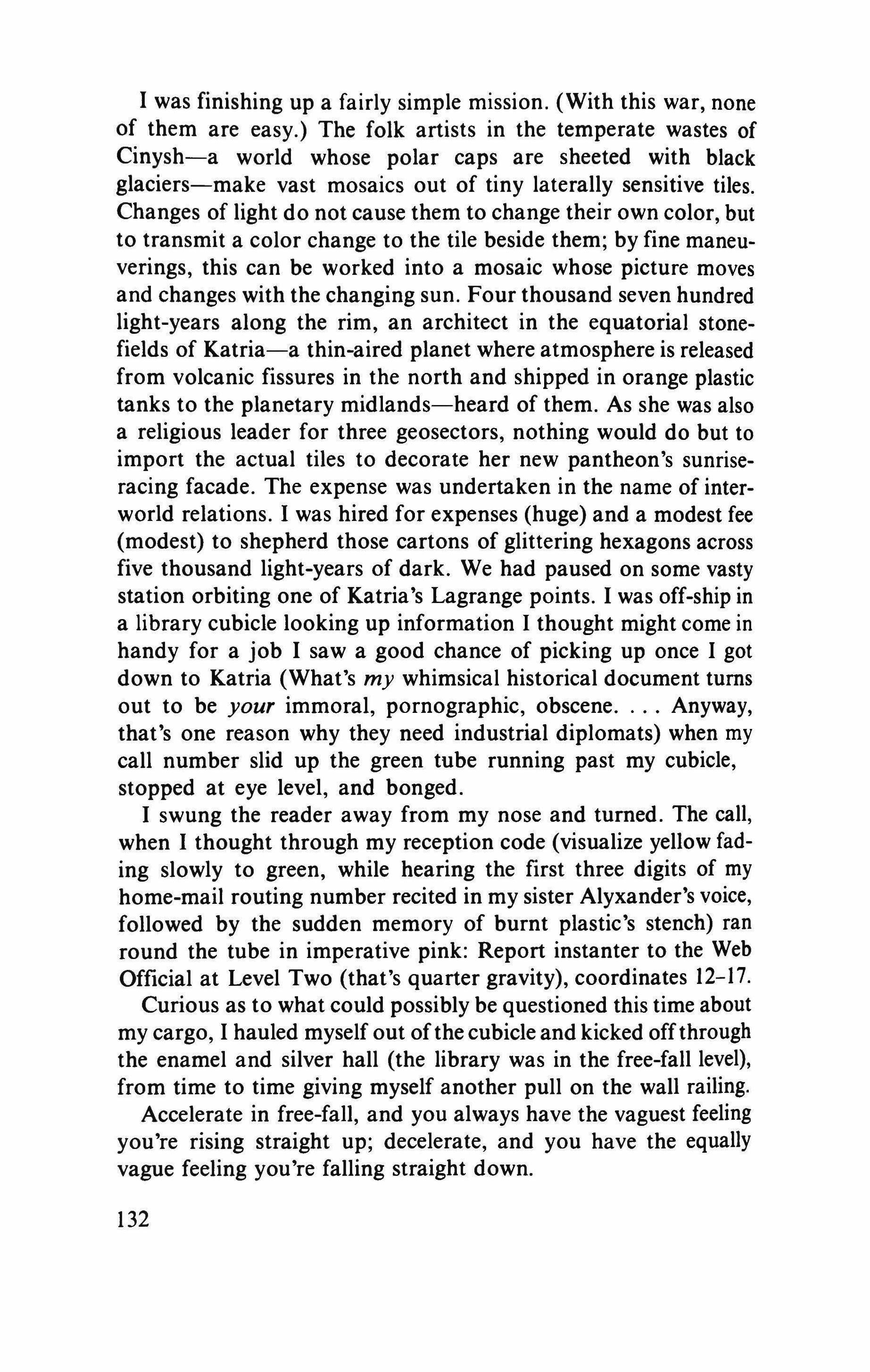
I was finishing up a fairly simple mission. (With this war, none of them are easy.) The folk artists in the temperate wastes of Cinysh-a world whose polar caps are sheeted with black glaciers-make vast mosaics out of tiny laterally sensitive tiles. Changes of light do not cause them to change their own color, but to transmit a color change to the tile beside them; by fine maneuverings, this can be worked into a mosaic whose picture moves and changes with the changing sun. Four thousand seven hundred light-years along the rim, an architect in the equatorial stonefields of Katria-a thin-aired planet where atmosphere is released from volcanic fissures in the north and shipped in orange plastic tanks to the planetary midlands-heard of them. As she was also a religious leader for three geosectors, nothing would do but to import the actual tiles to decorate her new pantheon's sunriseracing facade. The expense was undertaken in the name of interworld relations. I was hired for expenses (huge) and a modest fee (modest) to shepherd those cartons of glittering hexagons across five thousand light-years of dark. We had paused on some vasty station orbiting one of Katria's Lagrange points. I was off-ship in a library cubicle looking up information I thought might come in handy for a job I saw a good chance of picking up once I got down to Katria (What's my whimsical historical document turns out to be your immoral, pornographic, obscene Anyway, that's one reason why they need industrial diplomats) when my call number slid up the green tube running past my cubicle, stopped at eye level, and bonged.
I swung the reader away from my nose and turned. The call, when I thought through my reception code (visualize yellow fading slowly to green, while hearing the first three digits of my home-mail routing number recited in my sister Alyxander's voice, followed by the sudden memory of burnt plastic'S stench) ran round the tube in imperative pink: Report instanter to the Web Official at Level Two (that's quarter gravity), coordinates 12-17.
Curious as to what could possibly be questioned this time about my cargo, I hauled myself out ofthe cubicle and kicked offthrough the enamel and silver hall (the library was in the free-fall level), from time to time giving myself another pull on the wall railing. Accelerate in free-fall, and you always have the vaguest feeling you're rising straight up; decelerate, and you have the equally vague feeling you're falling straight down.
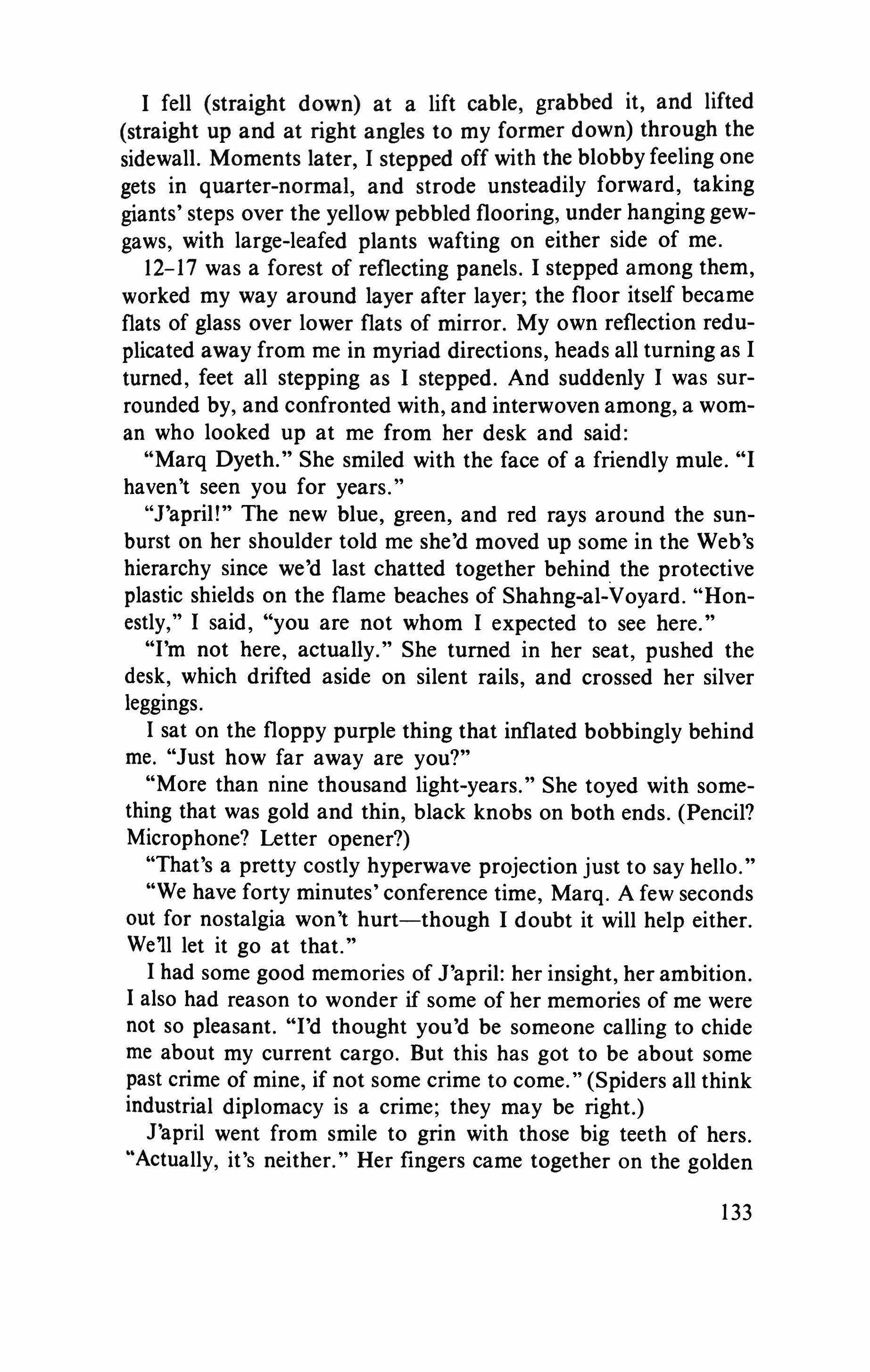
I fell (straight down) at a lift cable, grabbed it, and lifted (straight up and at right angles to my former down) through the sidewall. Moments later, I stepped off with the blobby feeling one gets in quarter-normal, and strode unsteadily forward, taking giants' steps over the yellow pebbled flooring, under hanging gewgaws, with large-leafed plants wafting on either side of me.
12-17 was a forest of reflecting panels. 1 stepped among them, worked my way around layer after layer; the floor itself became flats of glass over lower flats of mirror. My own reflection reduplicated away from me in myriad directions, heads all turning as I turned, feet all stepping as I stepped. And suddenly I was surrounded by, and confronted with, and interwoven among, a woman who looked up at me from her desk and said:
"Marq Dyeth." She smiled with the face of a friendly mule. "I haven't seen you for years."
"J'april!" The new blue, green, and red rays around the sunburst on her shoulder told me she'd moved up some in the Web's hierarchy since we'd last chatted together behind the protective plastic shields on the flame beaches of Shahng-al-Voyard. "Honestly," I said, "you are not whom I expected to see here."
"I'm not here, actually." She turned in her seat, pushed the desk, which drifted aside on silent rails, and crossed her silver leggings.
I sat on the floppy purple thing that inflated bobbingly behind me. "Just how far away are you?"
"More than nine thousand light-years." She toyed with something that was gold and thin, black knobs on both ends. (Pencil? Microphone? Letter opener?)
"That's a pretty costly hyperwave projection just to say hello."
"We have forty minutes' conference time, Marq. A few seconds out for nostalgia won't hurt-though 1 doubt it will help either. We'll let it go at that."
I had some good memories of J'april: her insight, her ambition. I also had reason to wonder if some of her memories of me were not so pleasant. "I'd thought you'd be someone calling to chide me about my current cargo. But this has got to be about some past crime of mine, if not some crime to come." (Spiders all think industrial diplomacy is a crime; they may be right.)
J'april went from smile to grin with those big teeth of hers. "Actually, it's neither." Her fingers came together on the golden
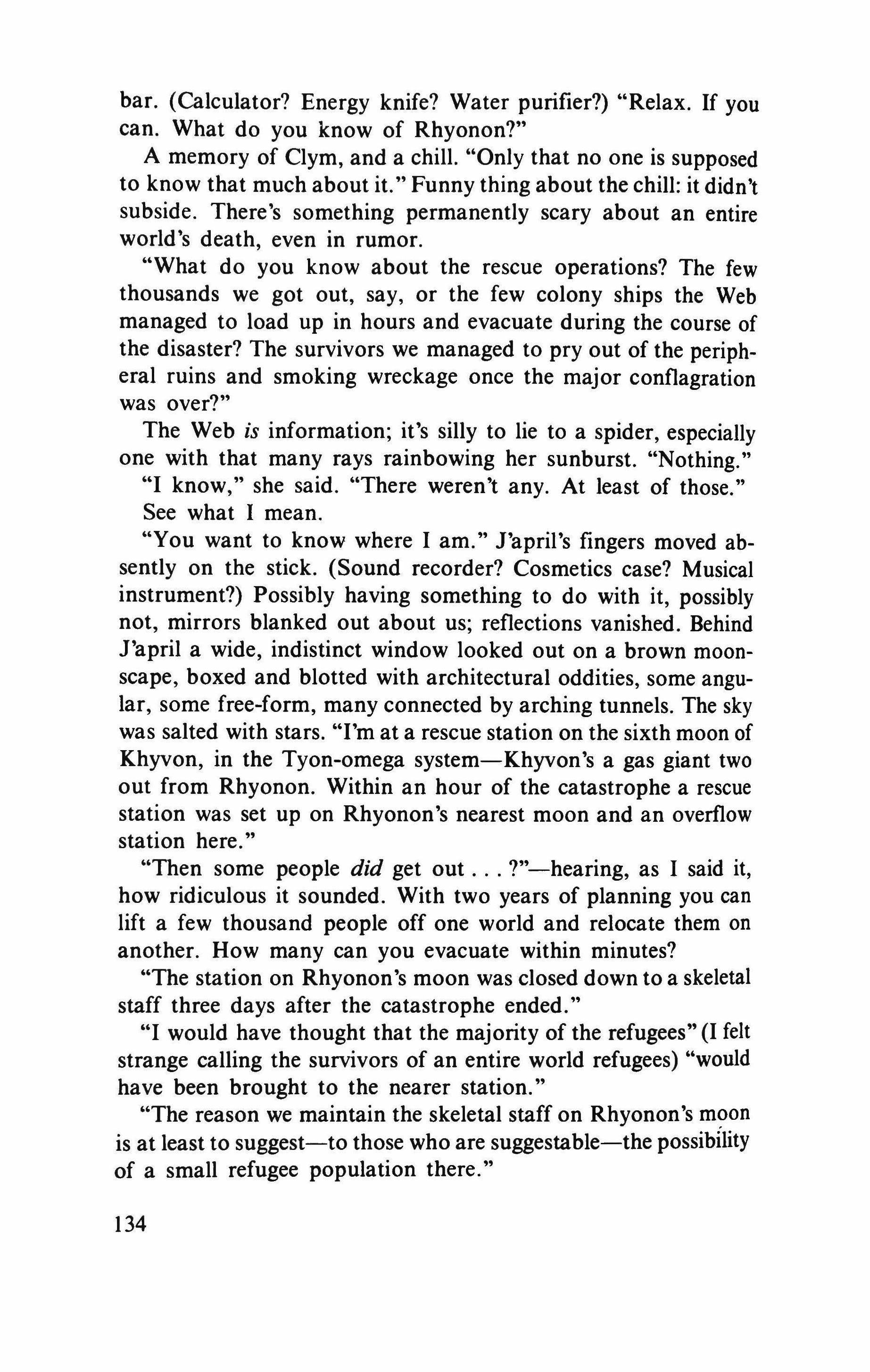
bar. (Calculator? Energy knife? Water purifier?) "Relax. If you can. What do you know of Rhyonon?"
A memory of Clym, and a chill. "Only that no one is supposed to know that much about it." Funny thing about the chill: it didn't subside. There's something permanently scary about an entire world's death, even in rumor.
"What do you know about the rescue operations? The few thousands we got out, say, or the few colony ships the Web managed to load up in hours and evacuate during the course of the disaster? The survivors we managed to pry out of the peripheral ruins and smoking wreckage once the major conflagration was over?"
The Web is information; it's silly to lie to a spider, especially one with that many rays rainbowing her sunburst. "Nothing."
"I know," she said. "There weren't any. At least of those."
See what I mean.
"You want to know where lam." J'april's fingers moved absently on the stick. (Sound recorder? Cosmetics case? Musical instrument?) Possibly having something to do with it, possibly not, mirrors blanked out about us; reflections vanished. Behind J'april a wide, indistinct window looked out on a brown moonscape, boxed and blotted with architectural oddities, some angular, some free-form, many connected by arching tunnels. The sky was salted with stars. "I'm at a rescue station on the sixth moon of Khyvon, in the Tyon-omega system-Khyvon's a gas giant two out from Rhyonon. Within an hour of the catastrophe a rescue station was set up on Rhyonon's nearest moon and an overflow station here."
"Then some people did get out ?"-hearing, as I said it, how ridiculous it sounded. With two years of planning you can lift a few thousand people off one world and relocate them on another. How many can you evacuate within minutes?
"The station on Rhyonon's moon was closed down to a skeletal staff three days after the catastrophe ended."
"I would have thought that the majority of the refugees" (I felt strange calling the survivors of an entire world refugees) "would have been brought to the nearer station."
"The reason we maintain the skeletal staff on Rhyonon's moon is at least to suggest-to those who are suggestable-the possibility of a small refugee population there."
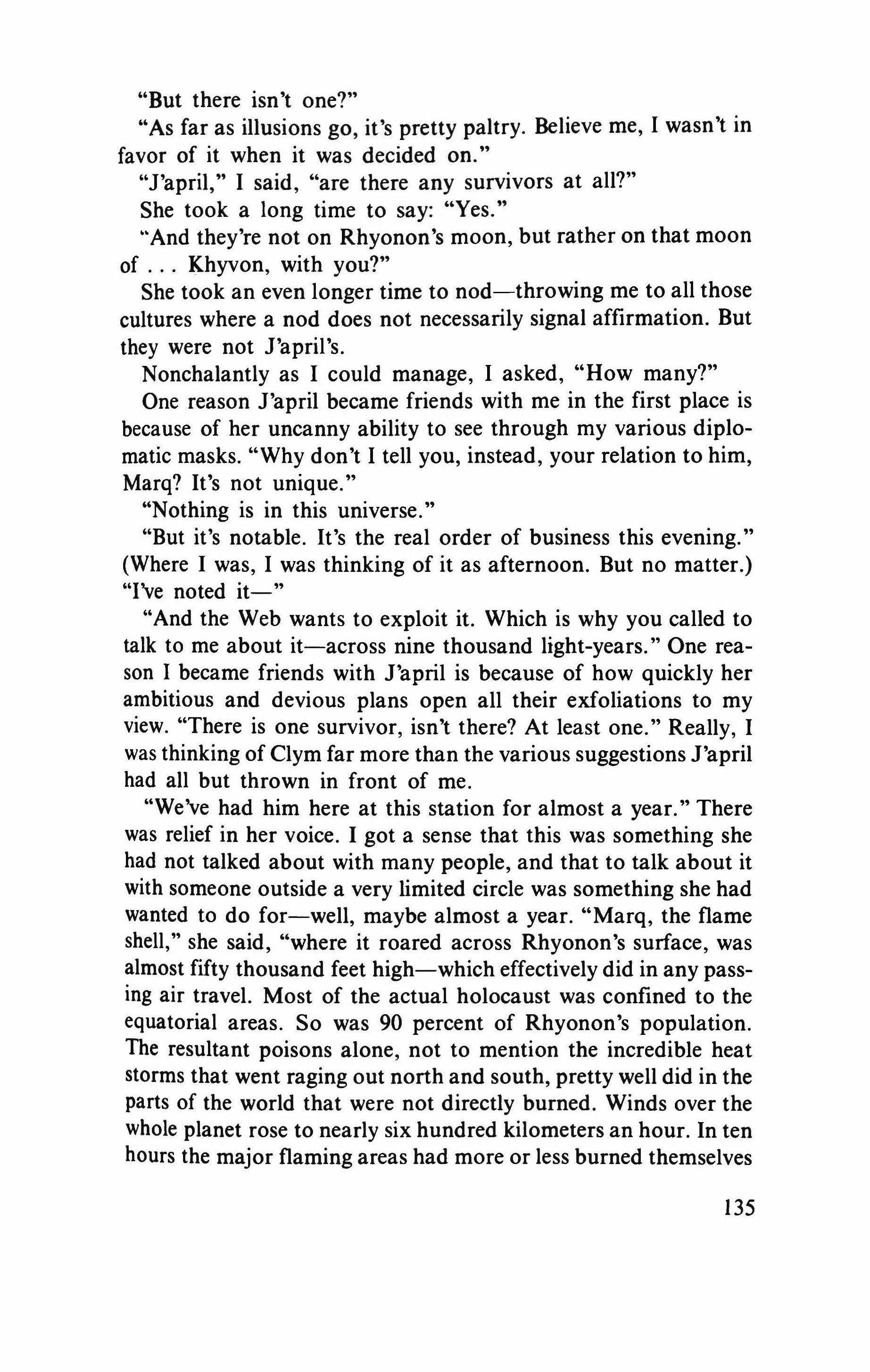
"But there isn't one?"
"As far as illusions go, it's pretty paltry. Believe me, I wasn't in favor of it when it was decided on."
"J'april," I said, "are there any survivors at all?"
She took a long time to say: "Yes."
"And they're not on Rhyonon's moon, but rather on that moon of Khyvon, with you?"
She took an even longer time to nod-throwing me to all those cultures where a nod does not necessarily signal affirmation. But they were not J'april's.
Nonchalantly as I could manage, I asked, "How many?"
One reason J'april became friends with me in the first place is because of her uncanny ability to see through my various diplomatic masks. "Why don't I tell you, instead, your relation to him, Marq? It's not unique."
"Nothing is in this universe."
"But it's notable. It's the real order of business this evening." (Where I was, I was thinking of it as afternoon. But no matter.) "I've noted it-"
"And the Web wants to exploit it. Which is why you called to talk to me about it-across nine thousand light-years." One reason I became friends with J'april is because of how quickly her ambitious and devious plans open all their exfoliations to my view. "There is one survivor, isn't there? At least one." Really, I was thinking of Clym far more than the various suggestions J'april had all but thrown in front of me.
"We've had him here at this station for almost a year." There was relief in her voice. I got a sense that this was something she had not talked about with many people, and that to talk about it with someone outside a very limited circle was something she had wanted to do for-well, maybe almost a year. "Marq, the flame shell," she said, "where it roared across Rhyonon's surface, was almost fifty thousand feet high-which effectively did in any passing air travel. Most of the actual holocaust was confined to the equatorial areas. So was 90 percent of Rhyonon's population, The resultant poisons alone, not to mention the incredible heat storms that went raging out north and south, pretty well did in the parts of the world that were not directly burned. Winds over the whole planet rose to nearly six hundred kilometers an hour. In ten hours the major flaming areas had more or less burned themselves
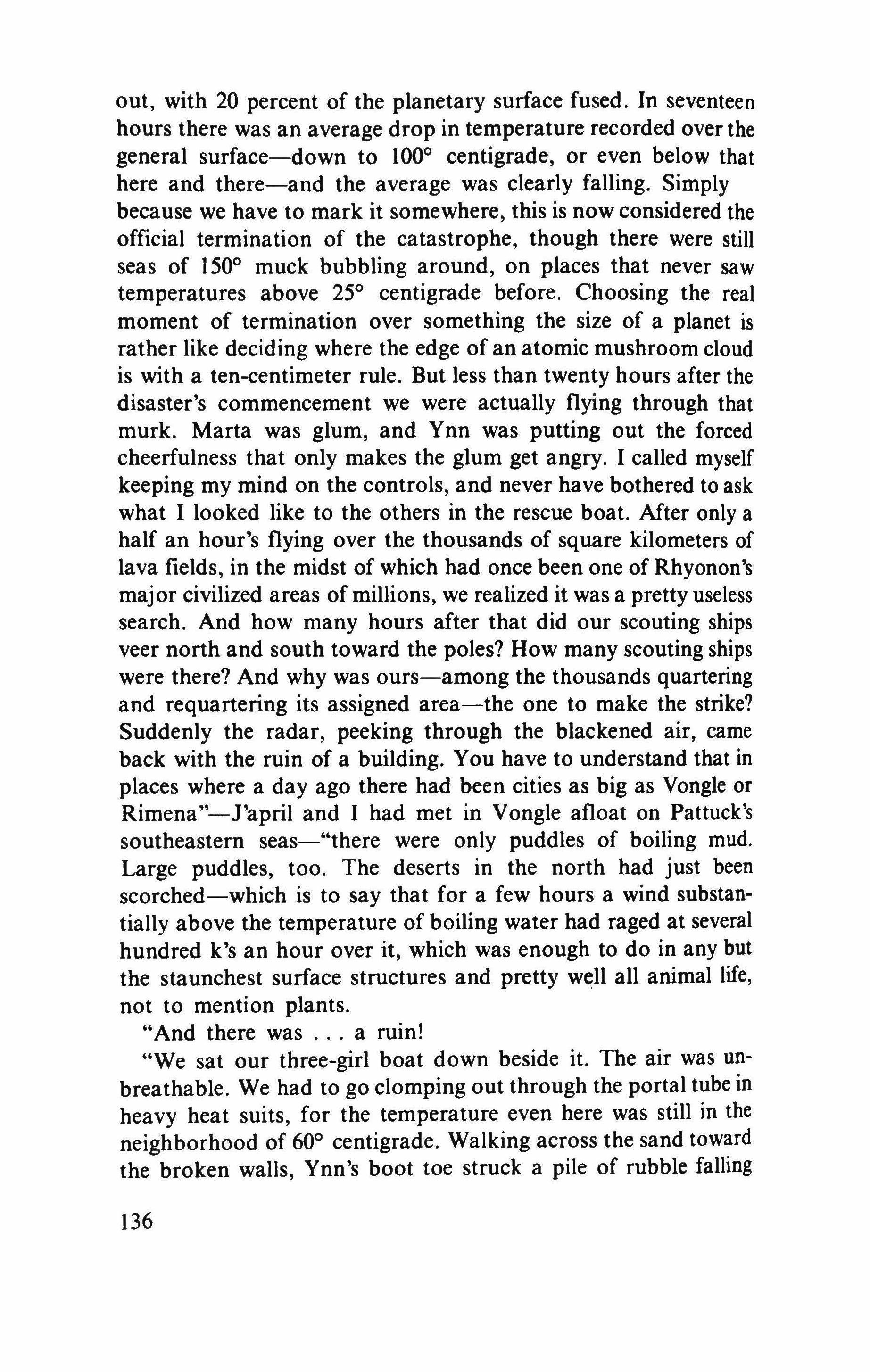
out, with 20 percent of the planetary surface fused. In seventeen hours there was an average drop in temperature recorded over the general surface-down to 100° centigrade, or even below that here and there-and the average was clearly falling. Simply because we have to mark it somewhere, this is now considered the official termination of the catastrophe, though there were still seas of 150° muck bubbling around, on places that never saw temperatures above 25° centigrade before. Choosing the real moment of termination over something the size of a planet is rather like deciding where the edge of an atomic mushroom cloud is with a ten-centimeter rule. But less than twenty hours after the disaster's commencement we were actually flying through that murk. Marta was glum, and Ynn was putting out the forced cheerfulness that only makes the glum get angry. I called myself keeping my mind on the controls, and never have bothered to ask what I looked like to the others in the rescue boat. After only a half an hour's flying over the thousands of square kilometers of lava fields, in the midst of which had once been one of Rhyonon's major civilized areas of millions, we realized it was a pretty useless search. And how many hours after that did our scouting ships veer north and south toward the poles? How many scouting ships were there? And why was ours-among the thousands quartering and requartering its assigned area-the one to make the strike? Suddenly the radar, peeking through the blackened air, came back with the ruin of a building. You have to understand that in places where a day ago there had been cities as big as Vongle or Rimena"-J'april and I had met in Vongle afloat on Pattuck's southeastern seas-"there were only puddles of boiling mud.
Large puddles, too. The deserts in the north had just been scorched-which is to say that for a few hours a wind substantially above the temperature of boiling water had raged at several hundred k's an hour over it, which was enough to do in any but the staunchest surface structures and pretty well all animal life, not to mention plants.
"And there was a ruin!
"We sat our three-girl boat down beside it. The air was unbreathable. We had to go clomping out through the portal tube in heavy heat suits, for the temperature even here was still in the neighborhood of 60° centigrade. Walking across the sand toward the broken walls, Ynn's boot toe struck a pile of rubble falling
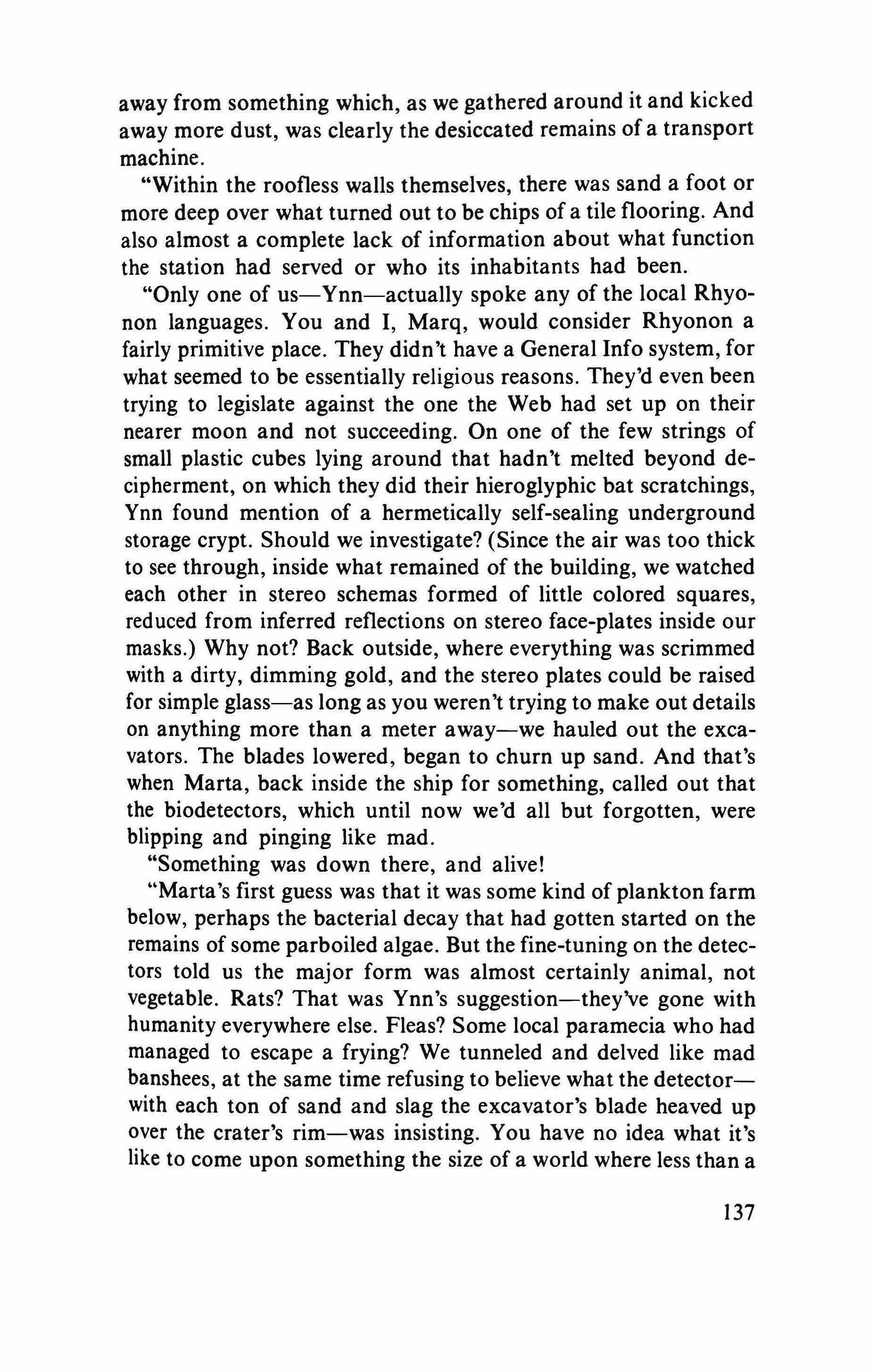
away from something which, as we gathered around it and kicked away more dust, was clearly the desiccated remains of a transport machine.
"Within the roofless walls themselves, there was sand a foot or more deep over what turned out to be chips of a tile flooring. And also almost a complete lack of information about what function the station had served or who its inhabitants had been.
"Only one of us-Ynn-actually spoke any of the local Rhyonon languages. You and I, Marq, would consider Rhyonon a fairly primitive place. They didn't have a General Info system, for what seemed to be essentially religious reasons. They'd even been trying to legislate against the one the Web had set up on their nearer moon and not succeeding. On one of the few strings of small plastic cubes lying around that hadn't melted beyond decipherment, on which they did their hieroglyphic bat scratchings, Ynn found mention of a hermetically self-sealing underground storage crypt. Should we investigate? (Since the air was too thick to see through, inside what remained of the building, we watched each other in stereo schemas formed of little colored squares, reduced from inferred reflections on stereo face-plates inside our masks.) Why not? Back outside, where everything was scrimmed with a dirty, dimming gold, and the stereo plates could be raised for simple glass-as long as you weren't trying to make out details on anything more than a meter away-we hauled out the excavators. The blades lowered, began to churn up sand. And that's when Marta, back inside the ship for something, called out that the biodetectors, which until now we'd all but forgotten, were blipping and pinging like mad.
"Something was down there, and alive!
"Marta's first guess was that it was some kind of plankton farm below, perhaps the bacterial decay that had gotten started on the remains of some parboiled algae. But the fine-tuning on the detectors told us the major form was almost certainly animal, not vegetable. Rats? That was Ynn's suggestion-they've gone with humanity everywhere else. Fleas? Some local paramecia who had managed to escape a frying? We tunneled and delved like mad banshees, at the same time refusing to believe what the detectorwith each ton of sand and slag the excavator's blade heaved up over the crater's rim-was insisting. You have no idea what it's like to come upon something the size of a world where less than a
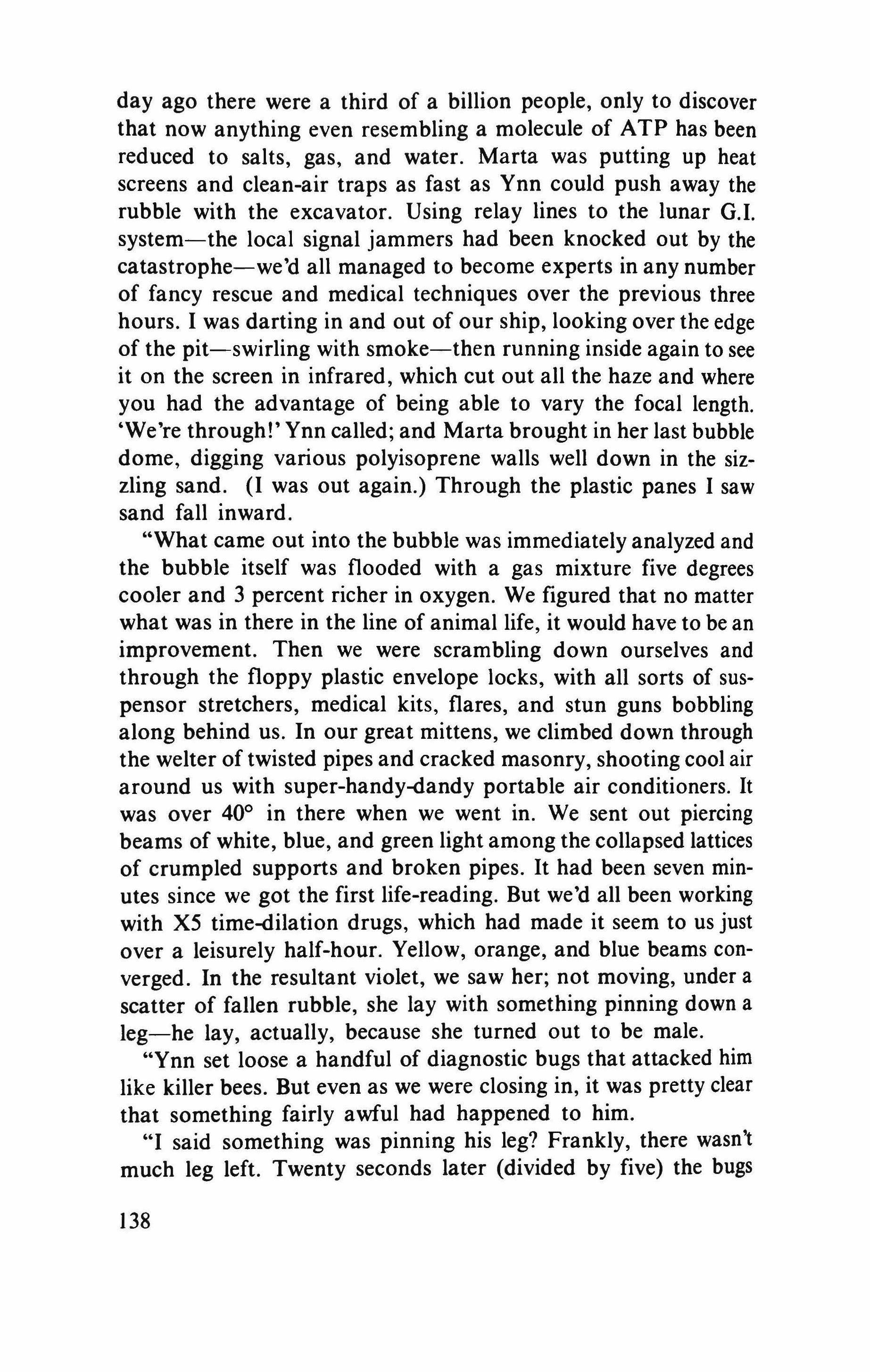
day ago there were a third of a billion people, only to discover that now anything even resembling a molecule of ATP has been reduced to salts, gas, and water. Marta was putting up heat screens and clean-air traps as fast as Ynn could push away the rubble with the excavator. Using relay lines to the lunar G.I. system-the local signal jammers had been knocked out by the catastrophe-we'd all managed to become experts in any number of fancy rescue and medical techniques over the previous three hours. I was darting in and out of our ship, looking over the edge of the pit-swirling with smoke-then running inside again to see it on the screen in infrared, which cut out all the haze and where you had the advantage of being able to vary the focal length. 'We're through!' Ynn called; and Marta brought in her last bubble dome, digging various polyisoprene walls well down in the sizzling sand. (I was out again.) Through the plastic panes I saw sand fall inward.
"What came out into the bubble was immediatelyanalyzed and the bubble itself was flooded with a gas mixture five degrees cooler and 3 percent richer in oxygen. We figured that no matter what was in there in the line of animal life, it would have to be an improvement. Then we were scrambling down ourselves and through the floppy plastic envelope locks, with all sorts of suspensor stretchers, medical kits, flares, and stun guns bobbling along behind us. In our great mittens, we climbed down through the welter of twisted pipes and cracked masonry, shooting cool air around us with super-handy-dandy portable air conditioners. It was over 40° in there when we went in. We sent out piercing beams of white, blue, and green light among the collapsed lattices of crumpled supports and broken pipes. It had been seven minutes since we got the first life-reading. But we'd all been working with X5 time-dilation drugs, which had made it seem to us just over a leisurely half-hour. Yellow, orange, and blue beams converged. In the resultant violet, we saw her; not moving, under a scatter of fallen rubble, she lay with something pinning down a leg-he lay, actually, because she turned out to be male.
"Ynn set loose a handful of diagnostic bugs that attacked him like killer bees. But even as we were closing in, it was pretty clear that something fairly awful had happened to him.
"I said something was pinning his leg? Frankly, there wasn't much leg left. Twenty seconds later (divided by five) the bugs
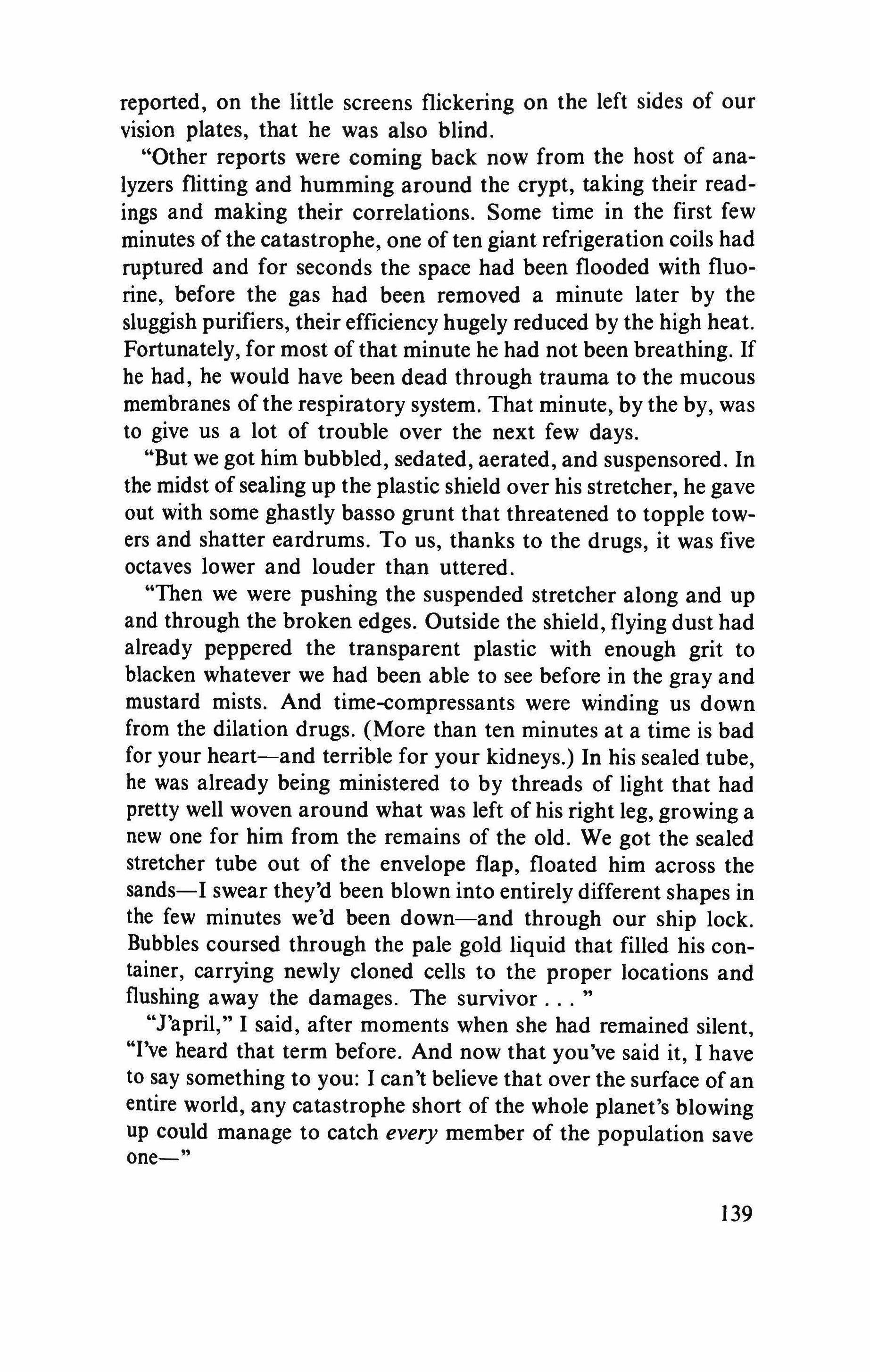
reported, on the little screens flickering on the left sides of our vision plates, that he was also blind.
"Other reports were coming back now from the host of analyzers flitting and humming around the crypt, taking their readings and making their correlations. Some time in the first few minutes of the catastrophe, one of ten giant refrigeration coils had ruptured and for seconds the space had been flooded with fluorine, before the gas had been removed a minute later by the sluggish purifiers, their efficiency hugely reduced by the high heat. Fortunately, for most of that minute he had not been breathing. If he had, he would have been dead through trauma to the mucous membranes of the respiratory system. That minute, by the by, was to give us a lot of trouble over the next few days.
"But we got him bubbled, sedated, aerated, and suspensored. In the midst of sealing up the plastic shield over his stretcher, he gave out with some ghastly basso grunt that threatened to topple towers and shatter eardrums. To us, thanks to the drugs, it was five octaves lower and louder than uttered.
"Then we were pushing the suspended stretcher along and up and through the broken edges. Outside the shield, flying dust had already peppered the transparent plastic with enough grit to blacken whatever we had been able to see before in the gray and mustard mists. And time-compressants were winding us down from the dilation drugs. (More than ten minutes at a time is bad for your heart-and terrible for your kidneys.) In his sealed tube, he was already being ministered to by threads of light that had pretty well woven around what was left of his right leg, growing a new one for him from the remains of the old. We got the sealed stretcher tube out of the envelope flap, floated him across the sands-I swear they'd been blown into entirely different shapes in the few minutes we'd been down-and through our ship lock. Bubbles coursed through the pale gold liquid that filled his container, carrying newly cloned cells to the proper locations and flushing away the damages. The survivor
"J'april," I said, after moments when she had remained silent, "I've heard that term before. And now that you've said it, I have to say something to you: lean't believe that over the surface of an entire world, any catastrophe short of the whole planet's blowing up could manage to catch every member of the population save one-"
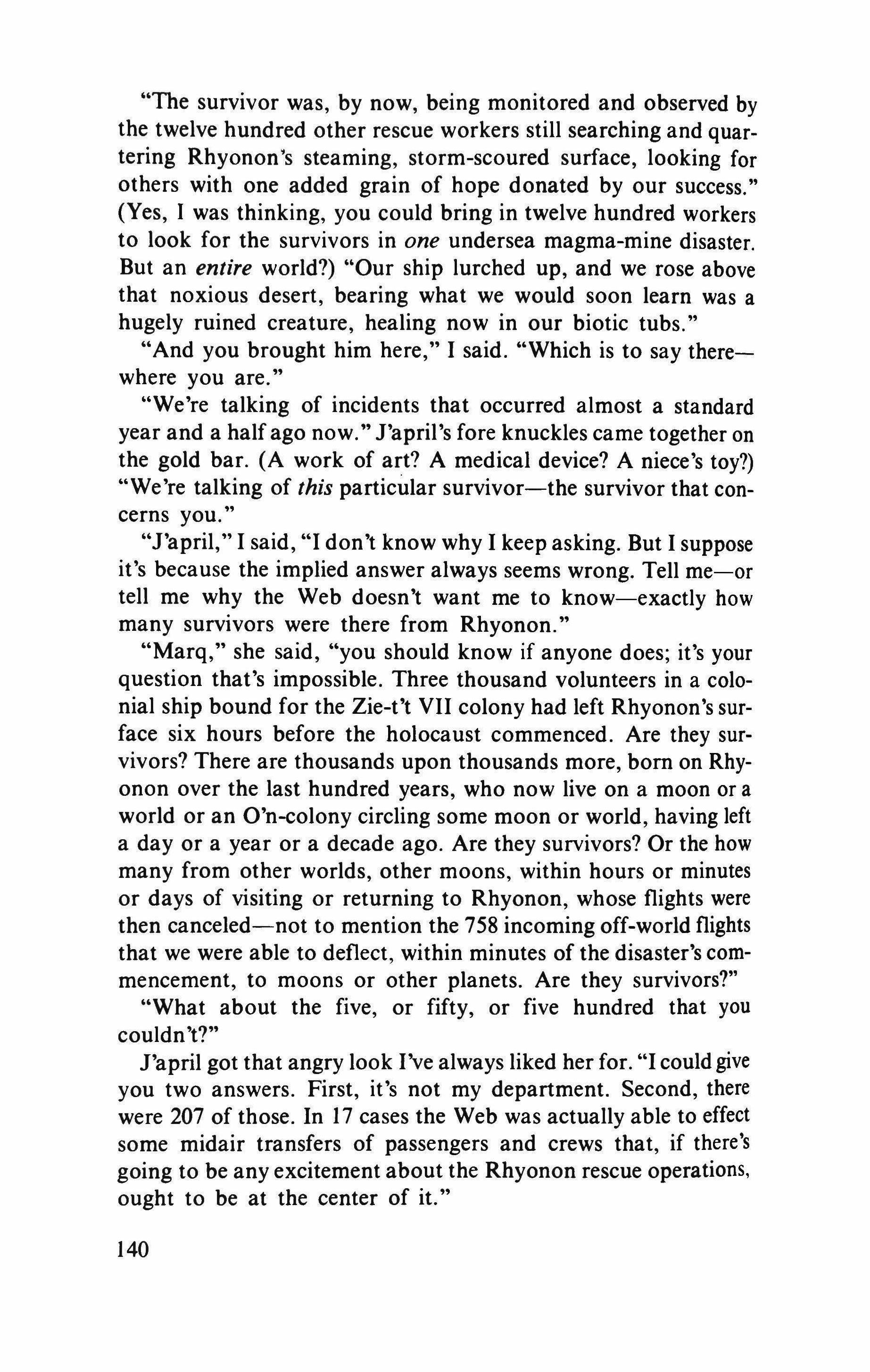
"The survivor was, by now, being monitored and observed by the twelve hundred other rescue workers still searching and quartering Rhyonon's steaming, storm-scoured surface, looking for others with one added grain of hope donated by our success." (Yes, 1 was thinking, you could bring in twelve hundred workers to look for the survivors in one undersea magma-mine disaster. But an entire world?) "Our ship lurched up, and we rose above that noxious desert, bearing what we would soon learn was a hugely ruined creature, healing now in our biotic tubs."
"And you brought him here," 1 said. "Which is to say therewhere you are."
"We're talking of incidents that occurred almost a standard year and a half ago now." J'april's fore knuckles came together on the gold bar. (A work of art? A medical device? A niece's toy?) "We're talking of this particular survivor-the survivor that concerns you."
"J'april," 1 said, "I don't know why I keep asking. But I suppose it's because the implied answer always seems wrong. Tell me-or tell me why the Web doesn't want me to know-exactly how many survivors were there from Rhyonon."
"Marq," she said, "you should know if anyone does; it's your question that's impossible. Three thousand volunteers in a colonial ship bound for the Zie-t't VII colony had left Rhyonon's surface six hours before the holocaust commenced. Are they survivors? There are thousands upon thousands more, born on Rhyonon over the last hundred years, who now live on a moon or a world or an O'n-colony circling some moon or world, having left a day or a year or a decade ago. Are they survivors? Or the how many from other worlds, other moons, within hours or minutes or days of visiting or returning to Rhyonon, whose flights were then canceled-not to mention the 758 incoming off-world flights that we were able to deflect, within minutes of the disaster's commencement, to moons or other planets. Are they survivors?"
"What about the five, or fifty, or five hundred that you couldn't?"
J'april got that angry look I've always liked her for. "I could give you two answers. First, it's not my department. Second, there were 207 of those. In 17 cases the Web was actually able to effect some midair transfers of passengers and crews that, if there's going to be any excitement about the Rhyonon rescue operations, ought to be at the center of it."
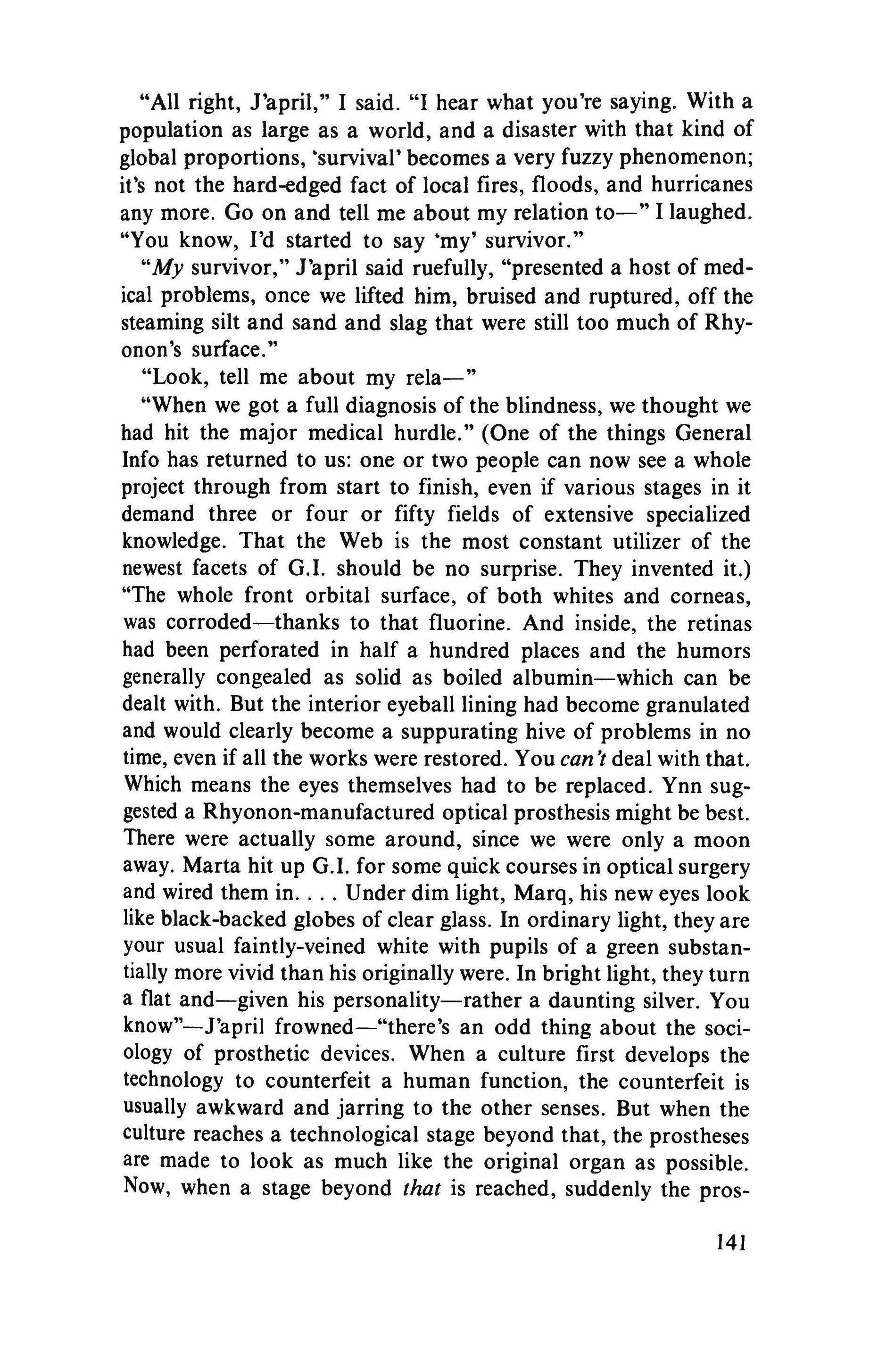
"All right, J'april," I said. "I hear what you're saying. With a population as large as a world, and a disaster with that kind of global proportions, "survival' becomes a very fuzzy phenomenon; it's not the hard-edged fact of local fires, floods, and hurricanes any more. Go on and tell me about my relation to-" I laughed. "You know, I'd started to say "my' survivor."
"My survivor," J'april said ruefully, "presented a host of medical problems, once we lifted him, bruised and ruptured, off the steaming silt and sand and slag that were still too much of Rhyonon's surface."
"Look, tell me about my rela-"
"When we got a full diagnosis of the blindness, we thought we had hit the major medical hurdle." (One of the things General Info has returned to us: one or two people can now see a whole project through from start to finish, even if various stages in it demand three or four or fifty fields of extensive specialized knowledge. That the Web is the most constant utilizer of the newest facets of G.I. should be no surprise. They invented it.)
"The whole front orbital surface, of both whites and corneas, was corroded-thanks to that fluorine. And inside, the retinas had been perforated in half a hundred places and the humors generally congealed as solid as boiled albumin-which can be dealt with. But the interior eyeball lining had become granulated and would clearly become a suppurating hive of problems in no time, even if all the works were restored. You can't deal with that. Which means the eyes themselves had to be replaced. Ynn suggested a Rhyonon-manufactured optical prosthesis might be best. There were actually some around, since we were only a moon away. Marta hit up G.I. for some quick courses in optical surgery and wired them in Under dim light, Marq, his new eyes look like black-backed globes of clear glass. In ordinary light, they are your usual faintly-veined white with pupils of a green substantially more vivid than his originally were. In bright light, they turn a flat and-given his personality-rather a daunting silver. You know"-J'april frowned-"there's an odd thing about the sociology of prosthetic devices. When a culture first develops the technology to counterfeit a human function, the counterfeit is usually awkward and jarring to the other senses. But when the culture reaches a technological stage beyond that, the prostheses are made to look as much like the original organ as possible. Now, when a stage beyond that is reached, suddenly the pros-

theses are consciously constructed to call attention to themselves in aesthetically interesting ways. In fact, limited technological stages can be meaningfully described as exhibitingjust such variations as l've-"
"J'april," I said, "you are telling me in your own inimitable way Rhyonon's culture had reached a level two stages beyond that needed to create a functional optical prosthesis. But we only have a limited amount of conference time. You haven't told me-"
"We set his waking for an hour after our own the next morning. Rest is still the best cure for the kind of bodily trauma he had suffered-new leg, new eyes. We came into the rotunda of the rescue station here, wondering if the pale blue walls and the wallwindow, beyond which sprawled only lunar schist and craters, were really conducive to the best revival. Had we done certain neurological tests? Certainly. Had we done certain others? Well, now we'd done enough to determine that we had no major deficiencies to deal with. There were signs of some very minor prenatal brain damage that may have been due to potassium starvation in the bearing parent. But neural paths had been established to compensate. We had neither a genius nor an idiot on our hands. That we knew. How did we go about telling a man in the huge range humans have generally set out for themselves as normal that his world is gone?
"A hundred lights, each a different color, died in the froth of glycerine that washed him in his man-shaped tub. Tubes drained off the puce and fuchsia biles that, in a sort of antidigestive process, had, by their chemical actions, healed him; had, by their tidal actions, exercised him. Molecular gradients had been read across sheets of tissue; neural charges had been positioned down to the synapse and detonated.
"His right arm twitched.
"For a moment his knuckles were four bubbly islands in the trough's syrup. His knee flexed from thick liquid.
"Then, dripping, he sat up.
"You understand, Marq, that I had never seen such a waking before, but G.I. had given me the recalls to call on one of seventeen experts each of whom had watched this process many timeswatched the coughing, the shaking head, the neural twitches as the nerves came on again, the unsteady motor orientation of an old nervous system taking over a radically reprocessed body, the

ten-to-twenty minutes' limping to accommodate the inevitable discrepancies in neural firing times of the nerves in the new leg, the two-to-five hours of increased blinking to acclimate to the just connected optic nerve.
"He sat, to the waist, in foam.
"He coughed.
"He raised his hands.
"With two thick and awkward forefingers he rubbed away the juices from each lid in a single downward motion. The tub began to tip, and Ynn automatically stepped forward to give him a hand, which clearly, as he stepped forward among the railings and handholds now, he didn't need.
"He didn't stagger at all.
"His eyes-bright green in our light-were wide. With all that lubricating syrup, physiologically he wouldn't need to blink for a full three minutes. Still, almost any human waking from such a bathing blinks a lot.
"He didn't.
"He looked about, as Marta made a gesture with her hand beside her face that showed she was empathizing with the queasiness we knew he felt but didn't show. He took a support ring in each large hand-he was very tall-and stood, for all the world (The world ? Which world?) like a man waiting. No questions, no curious glances, no self-orienting looks; his naked thighs streamed and the drain gurgled behind his wide heels.
"I said softly to Ynn, 'Perhaps that brain damage ?'
"Ynn said sharply to him: 'Who are you? Tell us your name. We want to help you,' in the most common of Rhyonon's six languages. We knew that 74 percent of Rhyonon's population wasor had been-bilingual, with the most common language either the first or second tongue of that three-quarters.
"He was looking somewhere between Marta and me-not with any particular intensity. Still, because he so clearly wasn't paying attention to what Ynn was saying, it made me want to look over my shoulder to see what he was seeing, even though 1 knew it was only blue plastifoam.
"Ynn said: 'Who are you? Tell us your name. We want to help you,' in the second most common of Rhyonon's six languages.
"He said, 'Korga the Porter Rat
"The last was a term 1 didn't know, though I'd been pro-
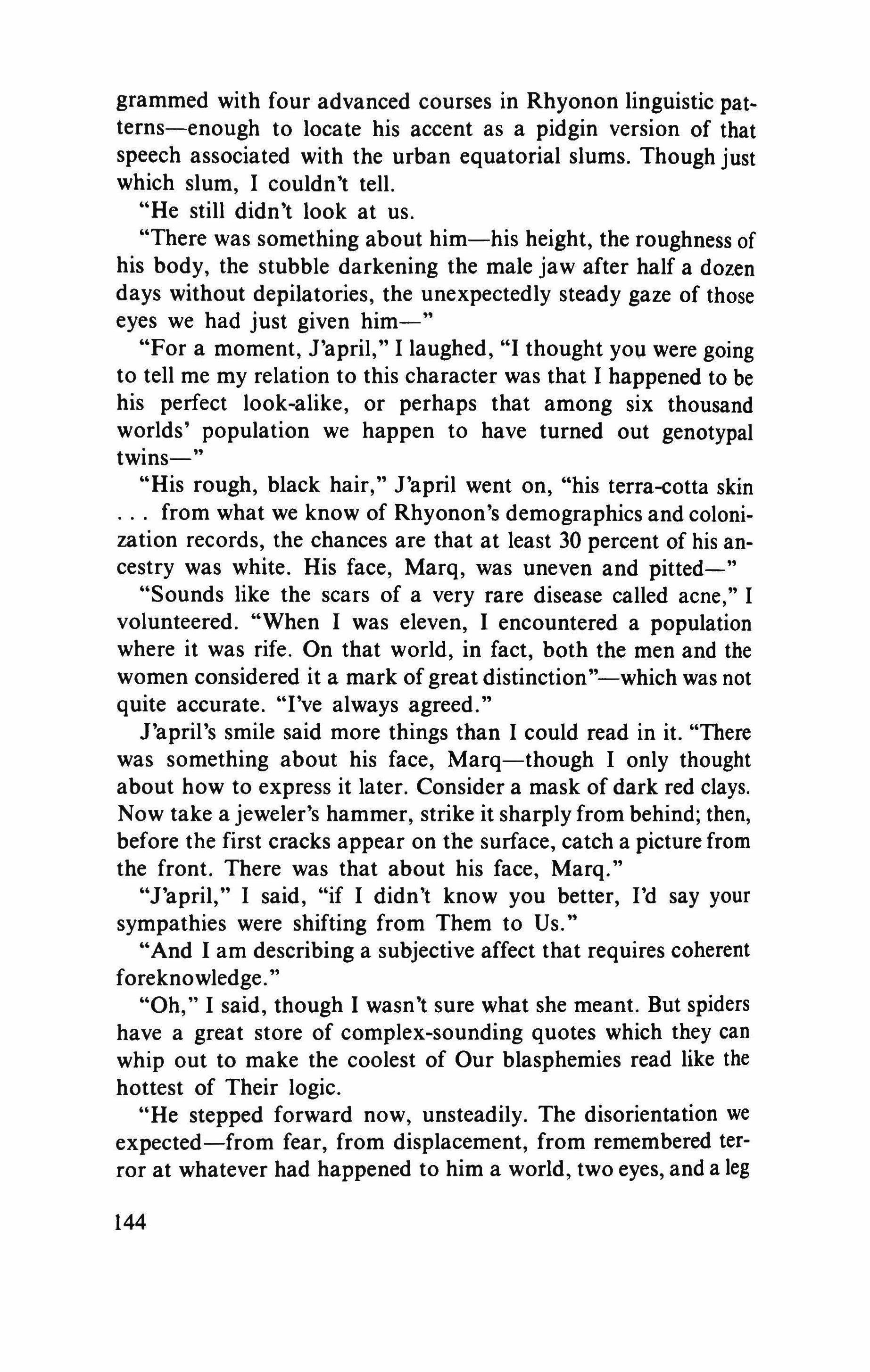
grammed with four advanced courses in Rhyonon linguistic patterns-enough to locate his accent as a pidgin version of that speech associated with the urban equatorial slums. Though just which slum, 1 couldn't tell.
"He still didn't look at us.
"There was something about him-his height, the roughness of his body, the stubble darkening the male jaw after half a dozen days without depilatories, the unexpectedly steady gaze of those eyes we had just given him-"
"For a moment, J'april," 1 laughed, "I thought you were going to tell me my relation to this character was that 1 happened to be his perfect look-alike, or perhaps that among six thousand worlds' population we happen to have turned out genotypal twins-"
"His rough, black hair," J'april went on, "his terra-cotta skin from what we know of Rhyonon's demographics and colonization records, the chances are that at least 30 percent of his ancestry was white. His face, Marq, was uneven and pitted-"
"Sounds like the scars of a very rare disease called acne," 1 volunteered. "When 1 was eleven, 1 encountered a population where it was rife. On that world, in fact, both the men and the women considered it a mark of great distinction"-which was not quite accurate. "I've always agreed."
J'april's smile said more things than 1 could read in it. "There was something about his face, Marq-though 1 only thought about how to express it later. Consider a mask of dark red clays. Now take a jeweler's hammer, strike it sharply from behind; then, before the first cracks appear on the surface, catch a picture from the front. There was that about his face, Marq."
"J'april," 1 said, "if 1 didn't know you better, I'd say your sympathies were shifting from Them to Us."
"And 1 am describing a subjective affect that requires coherent foreknowledge.
"Oh," 1 said, though 1 wasn't sure what she meant. But spiders have a great store of complex-sounding quotes which they can whip out to make the coolest of Our blasphemies read like the hottest of Their logic.
"He stepped forward now, unsteadily. The disorientation we expected-from fear, from displacement, from remembered terror at whatever had happened to him a world, two eyes, and a leg
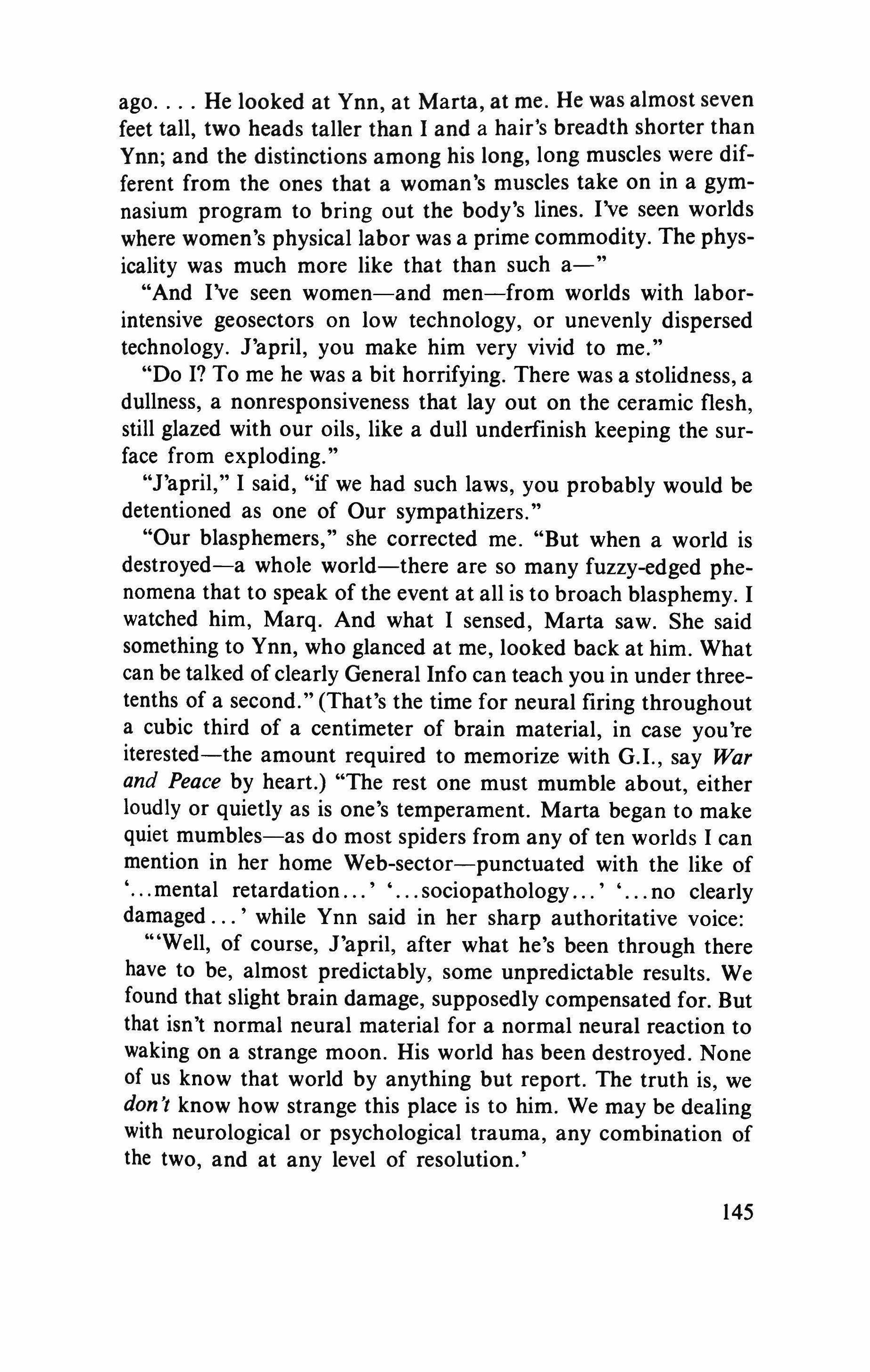
ago
He looked at Ynn, at Marta, at me. He was almost seven feet tall, two heads taller than I and a hair's breadth shorter than Ynn; and the distinctions among his long, long muscles were different from the ones that a woman's muscles take on in a gymnasium program to bring out the body's lines. I've seen worlds where women's physical labor was a prime commodity. The physicality was much more like that than such a-"
"And I've seen women-and men-from worlds with laborintensive geosectors on low technology, or unevenly dispersed technology. J'april, you make him very vivid to me."
"Do I? To me he was a bit horrifying. There was a stolidness, a dullness, a nonresponsiveness that layout on the ceramic flesh, still glazed with our oils, like a dull underfinish keeping the surface from exploding."
"J'april," I said, "if we had such laws, you probably would be detentioned as one of Our sympathizers."
"Our blasphemers," she corrected me. "But when a world is destroyed-a whole world-there are so many fuzzy-edged phenomena that to speak of the event at all is to broach blasphemy. I watched him, Marq. And what I sensed, Marta saw. She said something to Ynn, who glanced at me, looked back at him. What can be talked of clearly General Info can teach you in under threetenths of a second." (That'S the time for neural firing throughout a cubic third of a centimeter of brain material, in case you're iterested-the amount required to memorize with G.I., say War and Peace by heart.) "The rest one must mumble about, either loudly or quietly as is one's temperament. Marta began to make quiet mumbles-as do most spiders from any of ten worlds I can mention in her home Web-sector-punctuated with the like of mental retardation sociopathology ' no clearly damaged while Ynn said in her sharp authoritative voice:
"'Well, of course, J'april, after what he's been through there have to be, almost predictably, some unpredictable results. We found that slight brain damage, supposedly compensated for. But that isn't normal neural material for a normal neural reaction to waking on a strange moon. His world has been destroyed. None of us know that world by anything but report. The truth is, we don't know how strange this place is to him. We may be dealing with neurological or psychological trauma, any combination of the two, and at any level of resolution.'
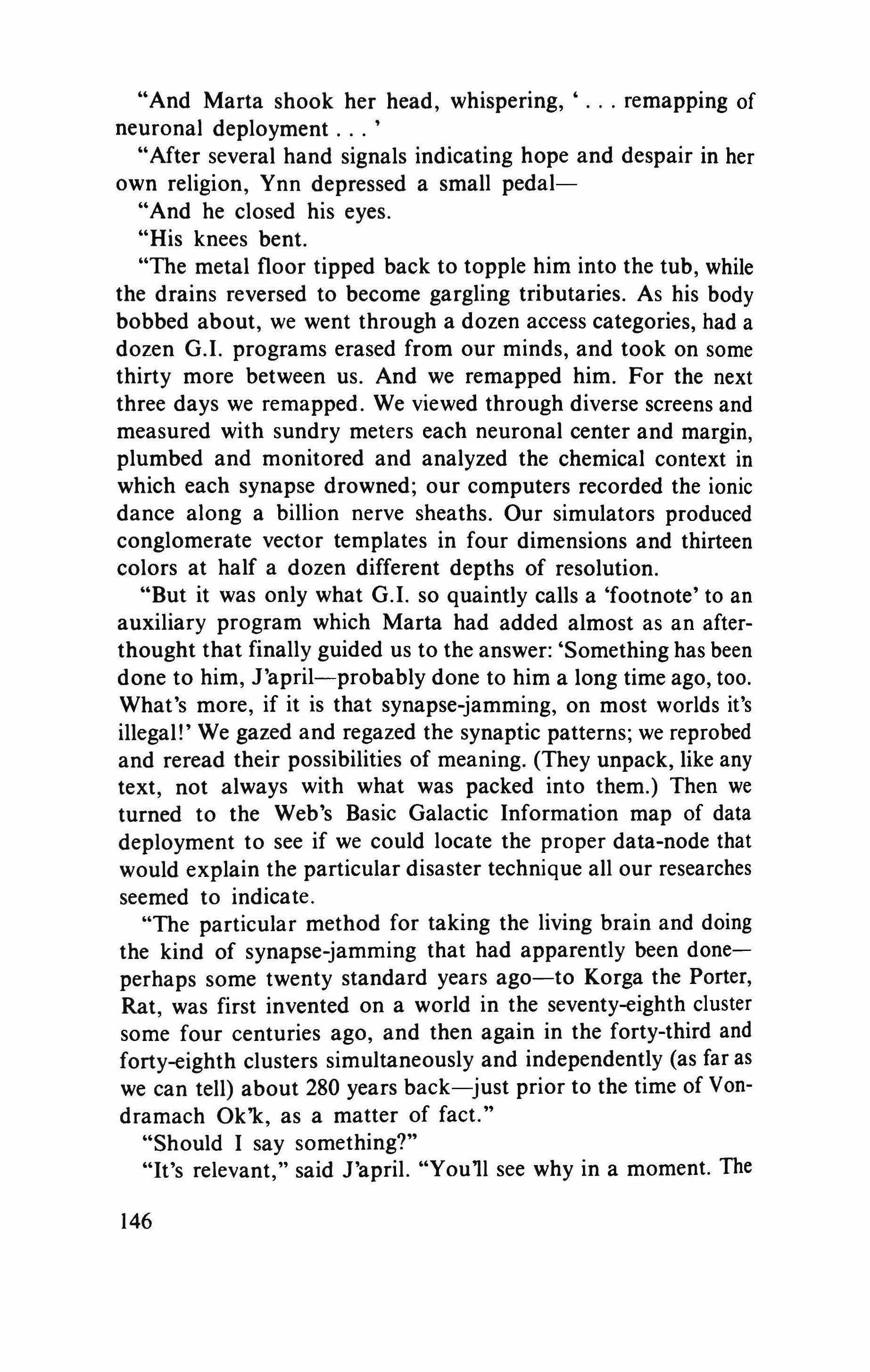
"And Marta shook her head, whispering, remapping of neuronal deployment
"After several hand signals indicating hope and despair in her own religion, Ynn depressed a small pedal
"And he closed his eyes.
"His knees bent.
"The metal floor tipped back to topple him into the tub, while the drains reversed to become gargling tributaries. As his body bobbed about, we went through a dozen access categories, had a dozen G.I. programs erased from our minds, and took on some thirty more between us. And we remapped him. For the next three days we remapped. We viewed through diverse screens and measured with sundry meters each neuronal center and margin, plumbed and monitored and analyzed the chemical context in which each synapse drowned; our computers recorded the ionic dance along a billion nerve sheaths. Our simulators produced conglomerate vector templates in four dimensions and thirteen colors at half a dozen different depths of resolution.
"But it was only what G.I. so quaintly calls a 'footnote' to an auxiliary program which Marta had added almost as an afterthought that finally guided us to the answer: 'Something has been done to him, J'april-probably done to him a long time ago, too. What's more, if it is that synapse-jamming, on most worlds it's illegal!' We gazed and regazed the synaptic patterns; we reprobed and reread their possibilities of meaning. (They unpack, like any text, not always with what was packed into them.) Then we turned to the Web's Basic Galactic Information map of data deployment to see if we could locate the proper data-node that would explain the particular disaster technique all our researches seemed to indicate.
"The particular method for taking the living brain and doing the kind of synapse-jamming that had apparently been doneperhaps some twenty standard years ago-to Korga the Porter, Rat, was first invented on a world in the seventy-eighth cluster some four centuries ago, and then again in the forty-third and forty-eighth clusters simultaneously and independently (as far as we can tell) about 280 years back-just prior to the time of Vondramach Ok'k, as a matter of fact."
"Should I say something?"
"It's relevant," said J'april. "You11 see why in a moment. The
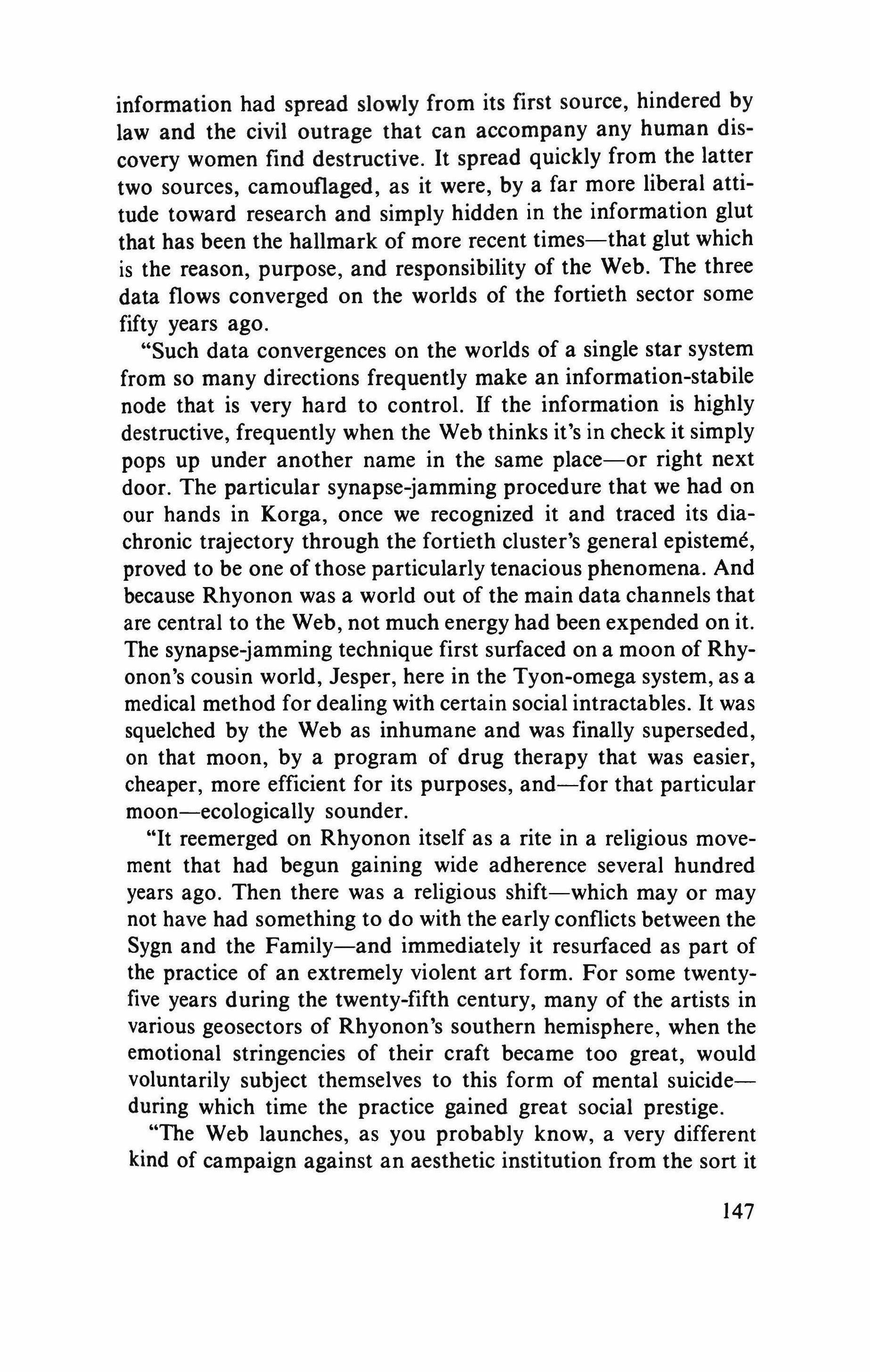
information had spread slowly from its first source, hindered by law and the civil outrage that can accompany any human discovery women find destructive. It spread quickly from the latter two sources, camouflaged, as it were, by a far more liberal attitude toward research and simply hidden in the information glut that has been the hallmark of more recent times-that glut which is the reason, purpose, and responsibility of the Web. The three data flows converged on the worlds of the fortieth sector some fifty years ago.
"Such data convergences on the worlds of a single star system from so many directions frequently make an information-stabile node that is very hard to control. If the information is highly destructive, frequently when the Web thinks it's in check it simply pops up under another name in the same place-or right next door. The particular synapse-jamming procedure that we had on our hands in Korga, once we recognized it and traced its diachronic trajectory through the fortieth cluster's general episteme, proved to be one of those particularly tenacious phenomena. And because Rhyonon was a world out of the main data channels that are central to the Web, not much energy had been expended on it. The synapse-jamming technique first surfaced on a moon of Rhyonon's cousin world, Jesper, here in the Tyon-omega system, as a medical method for dealing with certain social intractables. It was squelched by the Web as inhumane and was finally superseded, on that moon, by a program of drug therapy that was easier, cheaper, more efficient for its purposes, and-for that particular moon-ecologically sounder.
"It reemerged on Rhyonon itself as a rite in a religious movement that had begun gaining wide adherence several hundred years ago. Then there was a religious shift-which mayor may not have had something to do with the early conflicts between the Sygn and the Family-and immediately it resurfaced as part of the practice of an extremely violent art form. For some twentyfive years during the twenty-fifth century, many of the artists in various geosectors of Rhyonon's southern hemisphere, when the emotional stringencies of their craft became too great, would voluntarily subject themselves to this form of mental suicideduring which time the practice gained great social prestige.
"The Web launches, as you probably know, a very different kind of campaign against an aesthetic institution from the sort it

launches against a medical one; some say the former is no campaign at all. We try to contour an alternative aesthetic stream away from conceptualization and toward representation. Periods of high-resolution representative art, in whatever field, seem to be local phenomena on any world at all. They never last. But the swing, when we tried it on Rhyonon, was enough, according to our records, to make us think we had won.
"Again, you must remember that Rhyonon was, as are most of the worlds in the fortieth sector, a terribly unimportant world in the Web's scheme ofthings. It was uncommitted in a war that had already taken over a notable percentage of the 6,200 worlds. It had no General Info system, and its approach to off-world information in general was unsympathetic, to say the least.
"The synapse-jamming technique came back once more, this time as a gesture of public philanthropy. The destitute of Rhyonon's most impoverished social classes, about thirty standard years back, had apparently been allowed, by inter-geosector law, government-subsidized access to this most sophisticated technique of 'radical anxiety termination,' as the institute now administering it was known."
I nodded. "If museums are open to the public, then we must also make available all the strategies the artist uses by which to contour the particular problems of her life. I've encountered the syndrome before."
"It's not a privileged one,"J'april said, which was a spider's way of checking a tendency toward treason in a mere I'd started to say "worldling." But industrial diplomats are, even in the presumably multilensed eyes of the spider (though we know as many or more worlds as/than our arachnid cousins), not privileged either.
"So now we had a good statistical context within which to read the signs we had been presented with. Given what we now knew of Rhyonon, his language deployment, and Korga's-"
"You're referring to the world in the masculine," I interrupted. "I'm still used to hearing worlds in the neuter. I'm sorry. Go on."
J'april merely blinked. "Given Korga's accent and the general situation, we had established a good statistical probability that our man, though found at the pole, was from the sociopathic dregs of one of Rhyonon's equatorial slums. At some time in the past a benevolent society had apparently offered him a chance at what had been until recently, on his world, the privileged ave
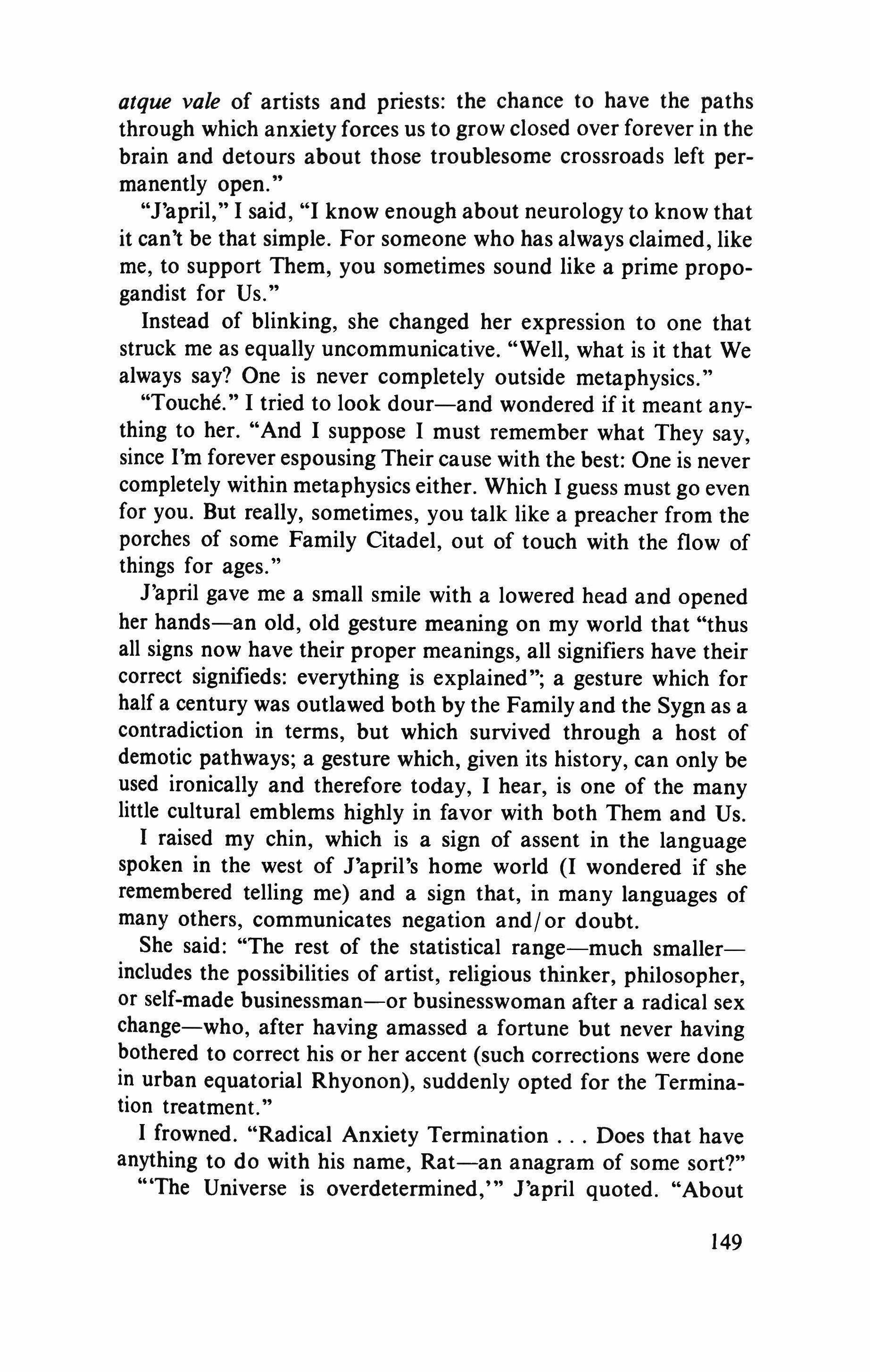
atque vale of artists and priests: the chance to have the paths through which anxiety forces us to grow closed over forever in the brain and detours about those troublesome crossroads left permanently open."
''J'april,'' I said, "I know enough about neurology to know that it can't be that simple. For someone who has always claimed, like me, to support Them, you sometimes sound like a prime propogandist for Us."
Instead of blinking, she changed her expression to one that struck me as equally uncommunicative. "Well, what is it that We always say? One is never completely outside metaphysics."
"Touche." I tried to look dour-and wondered if it meant anything to her. "And I suppose I must remember what They say, since I'm forever espousing Their cause with the best: One is never completely within metaphysics either. Which I guess must go even for you. But really, sometimes, you talk like a preacher from the porches of some Family Citadel, out of touch with the flow of things for ages."
J'april gave me a small smile with a lowered head and opened her hands-an old, old gesture meaning on my world that "thus all signs now have their proper meanings, all signifiers have their correct signifieds: everything is explained"; a gesture which for half a century was outlawed both by the Family and the Sygn as a contradiction in terms, but which survived through a host of demotic pathways; a gesture which, given its history, can only be used ironically and therefore today, I hear, is one of the many little cultural emblems highly in favor with both Them and Us.
I raised my chin, which is a sign of assent in the language spoken in the west of J'april's home world (I wondered if she remembered telling me) and a sign that, in many languages of many others, communicates negation and/ or doubt.
She said: "The rest of the statistical range-much smallerincludes the possibilities of artist, religious thinker, philosopher, or self-made businessman-or businesswoman after a radical sex change-who, after having amassed a fortune but never having bothered to correct his or her accent (such corrections were done in urban equatorial Rhyonon), suddenly opted for the Termination treatment."
I frowned. "Radical Anxiety Termination Does that have anything to do with his name, Rat-an anagram of some sort?" "'The Universe is overdetermined,'" J'april quoted. "About
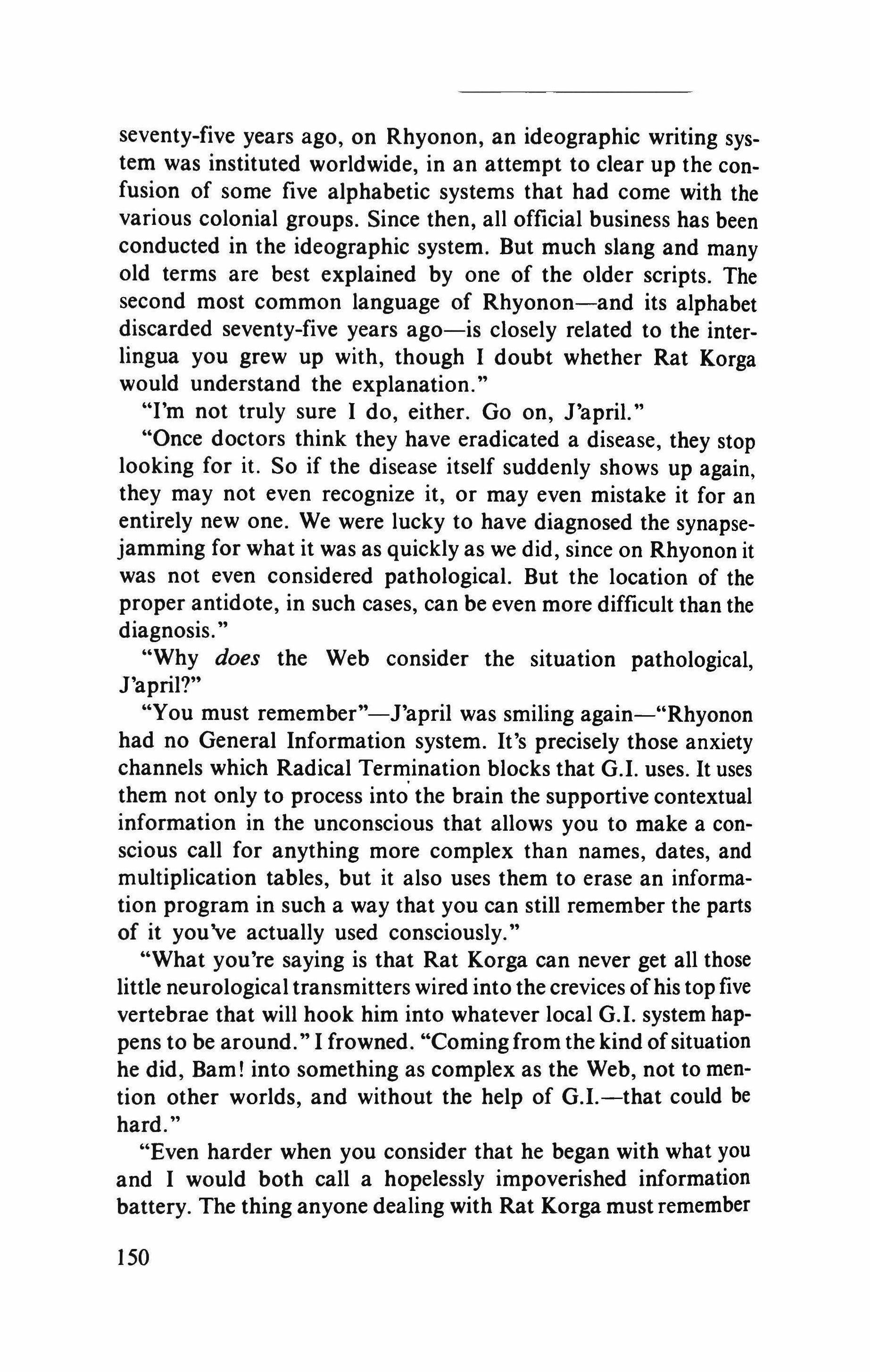
seventy-five years ago, on Rhyonon, an ideographic writing system was instituted worldwide, in an attempt to clear up the confusion of some five alphabetic systems that had come with the various colonial groups. Since then, all official business has been conducted in the ideographic system. But much slang and many old terms are best explained by one of the older scripts. The second most common language of Rhyonon-and its alphabet discarded seventy-five years ago-is closely related to the interlingua you grew up with, though I doubt whether Rat Korga would understand the explanation."
"I'm not truly sure I do, either. Go on, J'april."
"Once doctors think they have eradicated a disease, they stop looking for it. So if the disease itself suddenly shows up again, they may not even recognize it, or may even mistake it for an entirely new one. We were lucky to have diagnosed the synapsejamming for what it was as quickly as we did, since on Rhyonon it was not even considered pathological. But the location of the proper antidote, in such cases, can be even more difficult than the diagnosis.
"Why does the Web consider the situation pathological, J'april?"
"You must remember"-J'april was smiling again-"Rhyonon had no General Information system. It's precisely those anxiety channels which Radical Termination blocks that G.I. uses. It uses them not only to process into' the brain the supportive contextual information in the unconscious that allows you to make a conscious call for anything more complex than names, dates, and multiplication tables, but it also uses them to erase an information program in such a way that you can still remember the parts of it you've actually used consciously."
"What you're saying is that Rat Korga can never get all those little neurological transmitters wired into the crevices ofhis top five vertebrae that will hook him into whatever local G.I. system happens to be around." I frowned. "Coming from the kind ofsituation he did, Bam! into something as complex as the Web, not to mention other worlds, and without the help of G.I.-that could be hard.
"Even harder when you consider that he began with what you and I would both call a hopelessly impoverished information battery. The thing anyone dealing with Rat Korga must remember 150
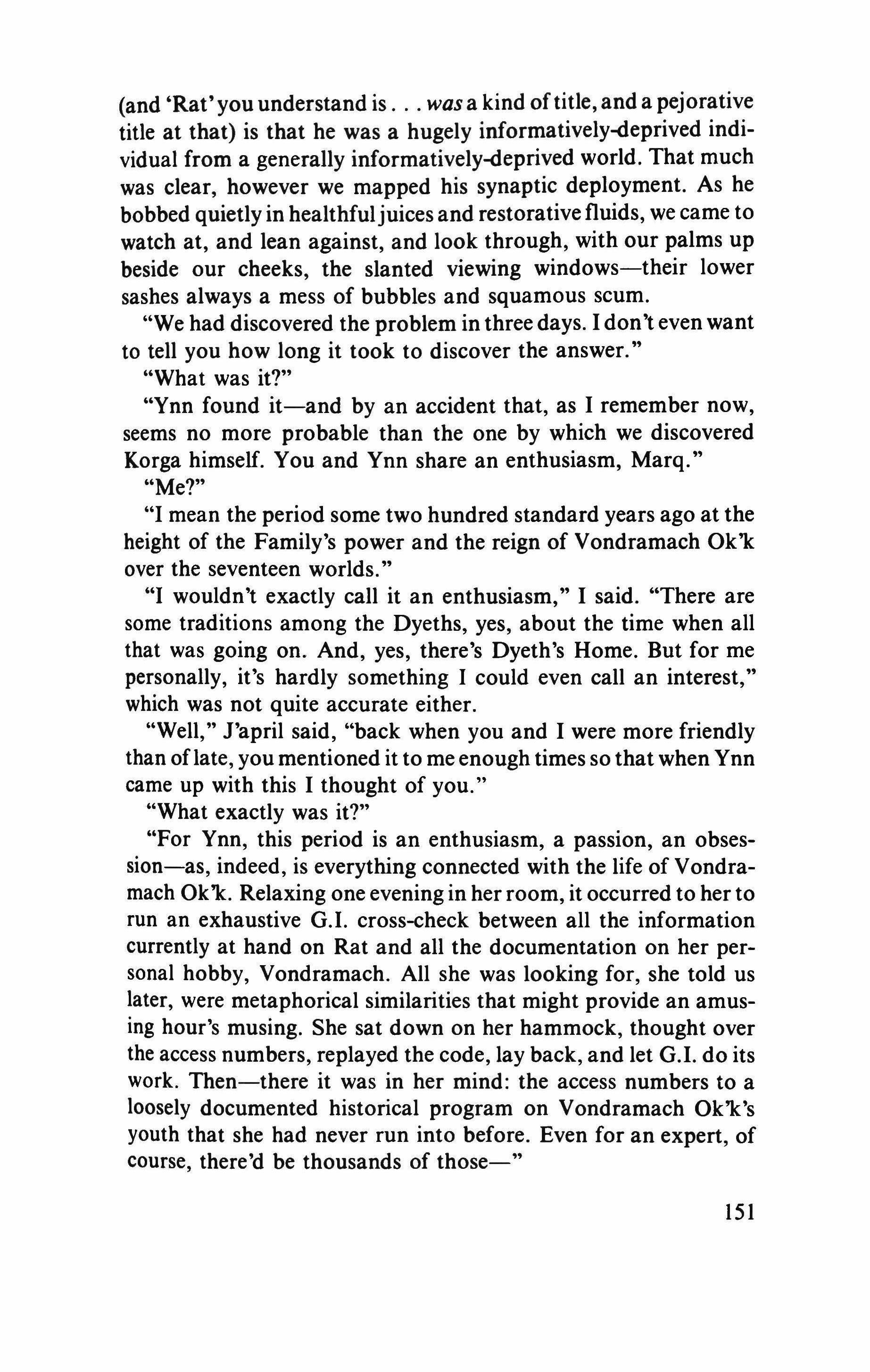
(and 'Rat'you understand is was a kind oftitle, and a pejorative title at that) is that he was a hugely informatively-deprived individual from a generally informatively-deprived world. That much was clear, however we mapped his synaptic deployment. As he bobbed quietly in healthfuljuices and restorative fluids, we came to watch at, and lean against, and look through, with our palms up beside our cheeks, the slanted viewing windows-their lower sashes always a mess of bubbles and squamous scum.
"We had discovered the problem in three days. 1 don't even want to tell you how long it took to discover the answer."
"What was it?"
"Ynn found it-and by an accident that, as 1 remember now, seems no more probable than the one by which we discovered Korga himself. You and Ynn share an enthusiasm, Marq."
"Me?"
"I mean the period some two hundred standard years ago at the height of the Family's power and the reign of Vondramach Ok'k over the seventeen worlds."
"I wouldn't exactly call it an enthusiasm," 1 said. "There are some traditions among the Dyeths, yes, about the time when all that was going on. And, yes, there's Dyeth's Home. But for me personally, it's hardly something I could even call an interest," which was not quite accurate either.
"Well," J'april said, "back when you and 1 were more friendly than oflate, you mentioned it to me enough times so that when Ynn came up with this 1 thought of you."
"What exactly was it?"
"For Ynn, this period is an enthusiasm, a passion, an obsession-as, indeed, is everything connected with the life of Vondramach Ok'k. Relaxing one evening in her room, it occurred to her to run an exhaustive G.I. cross-check between all the information currently at hand on Rat and all the documentation on her personal hobby, Vondramach. All she was looking for, she told us later, were metaphorical similarities that might provide an amusing hour's musing. She sat down on her hammock, thought over the access numbers, replayed the code, lay back, and let G.I. do its work. Then-there it was in her mind: the access numbers to a loosely documented historical program on Vondramach Ok'k's youth that she had never run into before. Even for an expert, of course, there'd be thousands of those-"
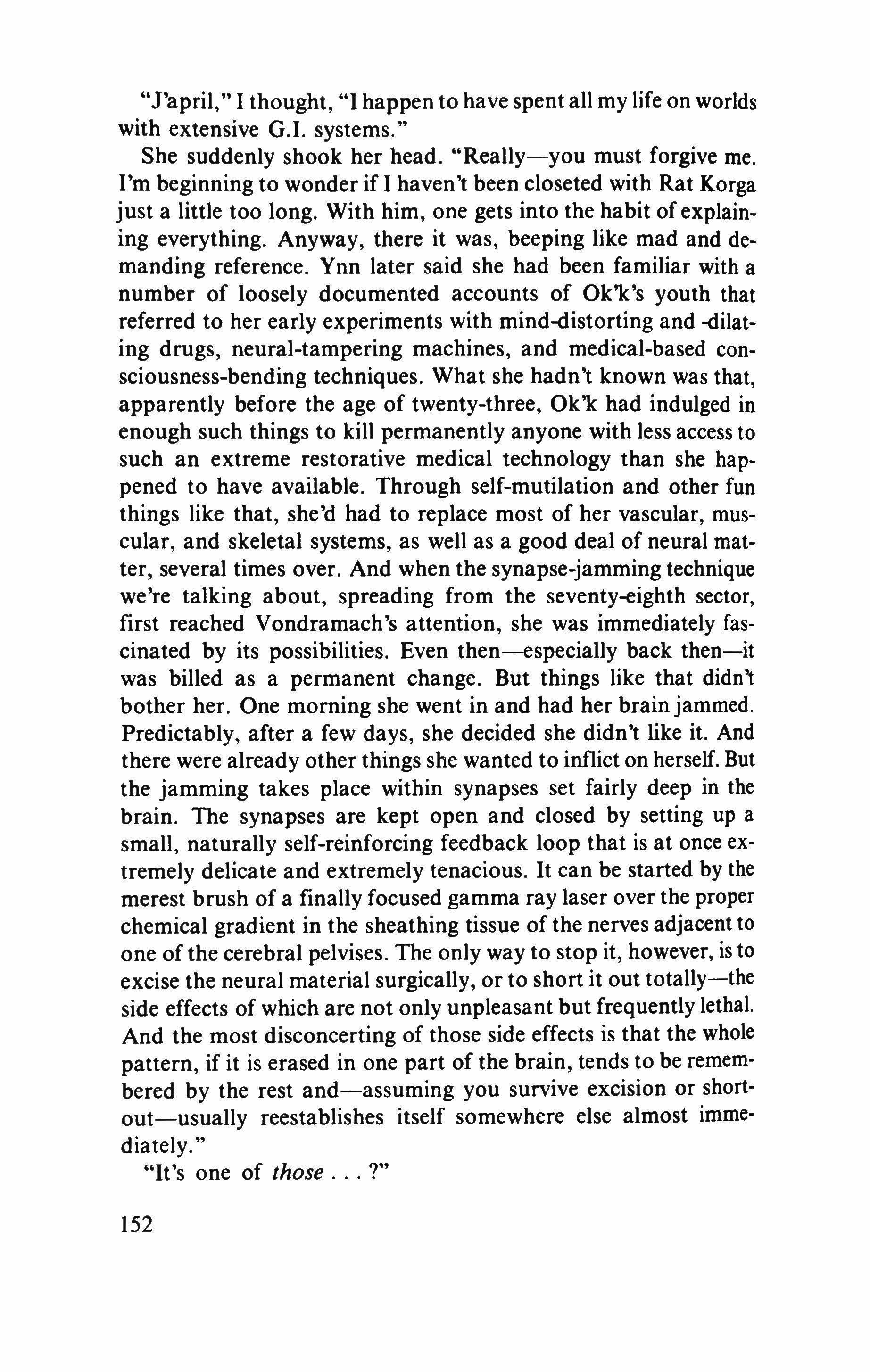
"J'april," 1 thought, "I happen to have spent all my life on worlds with extensive G.I. systems."
She suddenly shook her head. "Really-you must forgive me. I'm beginning to wonder if 1 haven't been closeted with Rat Korga just a little too long. With him, one gets into the habit of explaining everything. Anyway, there it was, beeping like mad and demanding reference. Ynn later said she had been familiar with a number of loosely documented accounts of Ok'k's youth that referred to her early experiments with mind-distorting and -dilating drugs, neural-tampering machines, and medical-based consciousness-bending techniques. What she hadn't known was that, apparently before the age of twenty-three, Ok'k had indulged in enough such things to kill permanently anyone with less access to such an extreme restorative medical technology than she happened to have available. Through self-mutilation and other fun things like that, she'd had to replace most of her vascular, muscular, and skeletal systems, as well as a good deal of neural matter, several times over. And when the synapse-jamming technique we're talking about, spreading from the seventy-eighth sector, first reached Vondramach's attention, she was immediately fascinated by its possibilities. Even then-especially back then-it was billed as a permanent change. But things like that didn't bother her. One morning she went in and had her brain jammed. Predictably, after a few days, she decided she didn't like it. And there were already other things she wanted to inflict on herself. But the jamming takes place within synapses set fairly deep in the brain. The synapses are kept open and closed by setting up a small, naturally self-reinforcing feedback loop that is at once extremely delicate and extremely tenacious. It can be started by the merest brush of a finally focused gamma ray laser over the proper chemical gradient in the sheathing tissue of the nerves adjacent to one of the cerebral pelvises. The only way to stop it, however, is to excise the neural material surgically, or to short it out totally-the side effects of which are not only unpleasant but frequently lethal. And the most disconcerting of those side effects is that the whole pattern, if it is erased in one part of the brain, tends to be remembered by the rest and-assuming you survive excision or shortout-usually reestablishes itself somewhere else almost immediately."
"It's one of those 1"
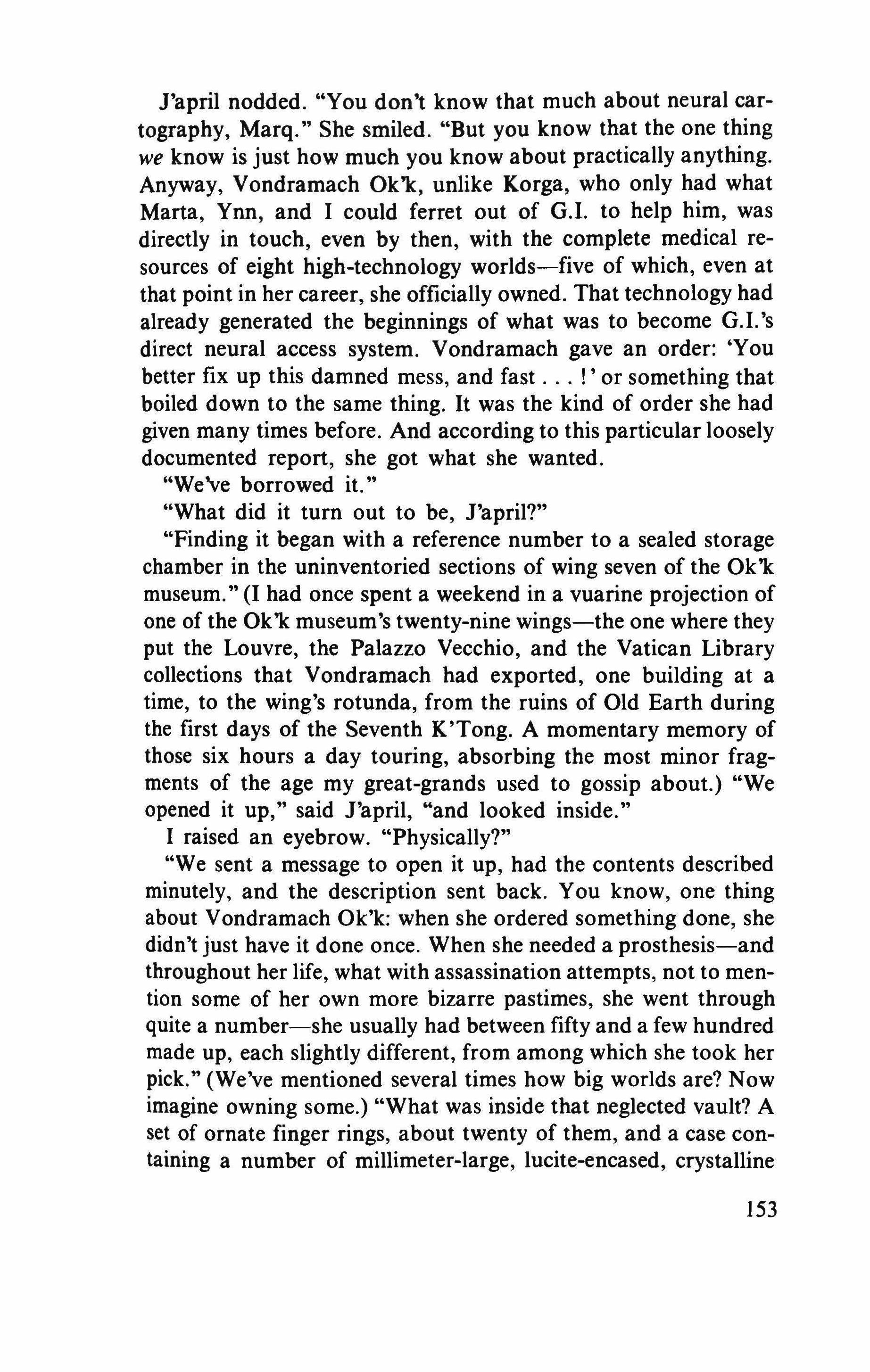
J'april nodded. "You don't know that much about neural cartography, Marq." She smiled. "But you know that the one thing we know is just how much you know about practically anything. Anyway, Vondramach Ok'k, unlike Korga, who only had what Marta, Ynn, and 1 could ferret out of G.1. to help him, was directly in touch, even by then, with the complete medical resources of eight high-technology worlds-five of which, even at that point in her career, she officially owned. That technology had already generated the beginnings of what was to become G.1.'s direct neural access system. Vondramach gave an order: 'You better fix up this damned mess, and fast !' or something that boiled down to the same thing. It was the kind of order she had given many times before. And according to this particular loosely documented report, she got what she wanted.
"We've borrowed it."
"What did it turn out to be, J'april?"
"Finding it began with a reference number to a sealed storage chamber in the uninventoried sections of wing seven of the Ok'k museum. " (I had once spent a weekend in a vuarine projection of one of the Ok'k museum's twenty-nine wings-the one where they put the Louvre, the Palazzo Vecchio, and the Vatican Library collections that Vondramach had exported, one building at a time, to the wing's rotunda, from the ruins of Old Earth during the first days of the Seventh K'Tong. A momentary memory of those six hours a day touring, absorbing the most minor fragments of the age my great-grands used to gossip about.) "We opened it up," said J'april, "and looked inside."
I raised an eyebrow. "Physically?"
"We sent a message to open it up, had the contents described minutely, and the description sent back. You know, one thing about Vondramach Ok'k: when she ordered something done, she didn't just have it done once. When she needed a prosthesis-and throughout her life, what with assassination attempts, not to mention some of her own more bizarre pastimes, she went through quite a number-she usually had between fifty and a few hundred made up, each slightly different, from among which she took her pick." (We've mentioned several times how big worlds are? Now imagine owning some.) "What was inside that neglected vault? A set of ornate finger rings, about twenty of them, and a case containing a number of millimeter-large, lucite-encased, crystalline
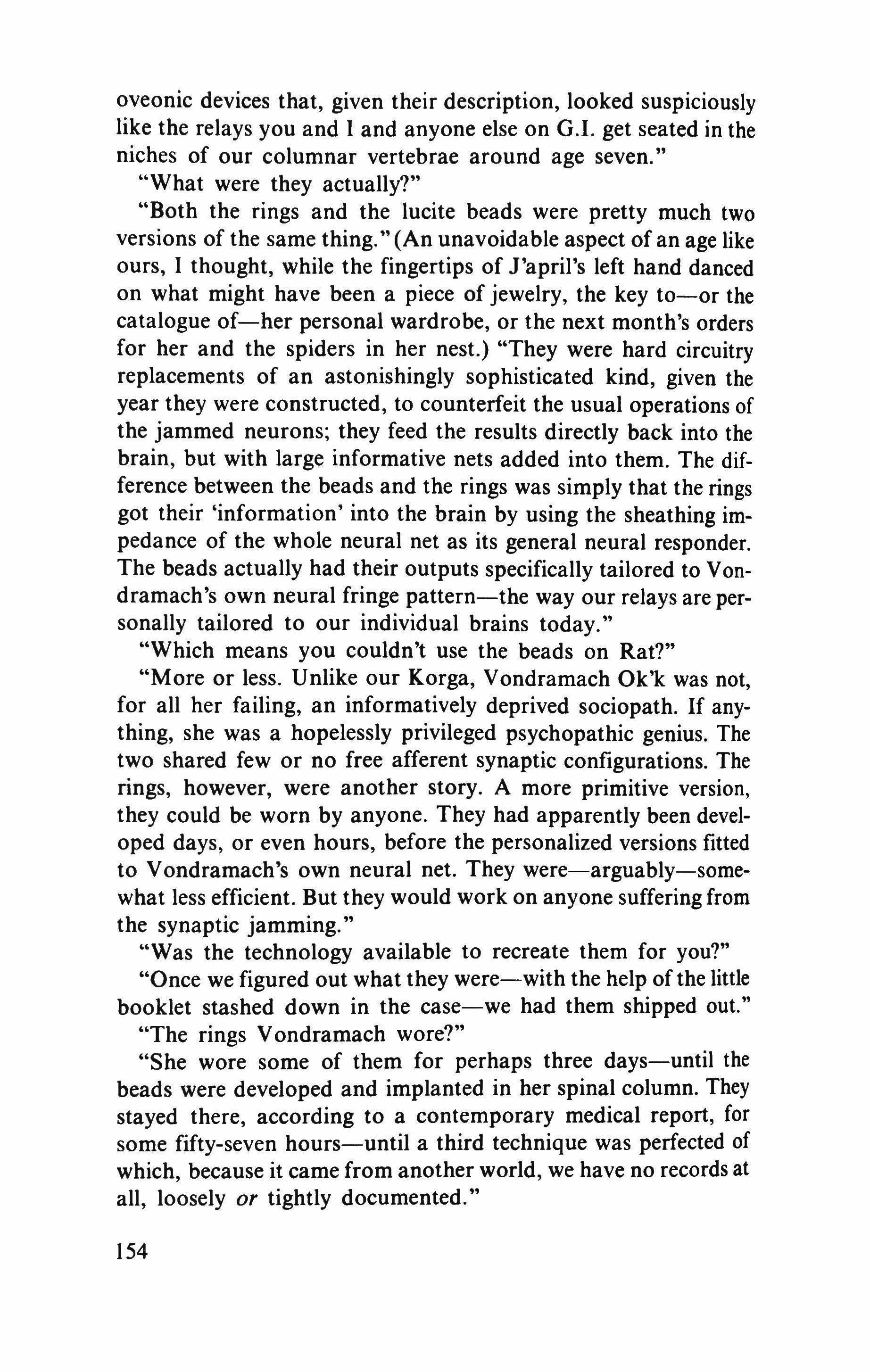
oveonic devices that, given their description, looked suspiciously like the relays you and I and anyone else on G.I. get seated in the niches of our columnar vertebrae around age seven."
"What were they actually?"
"Both the rings and the lucite beads were pretty much two versions of the same thing." (An unavoidable aspect of an age like ours, I thought, while the fingertips of J'april's left hand danced on what might have been a piece of jewelry, the key to-or the catalogue of-her personal wardrobe, or the next month's orders for her and the spiders in her nest.) "They were hard circuitry replacements of an astonishingly sophisticated kind, given the year they were constructed, to counterfeit the usual operations of the jammed neurons; they feed the results directly back into the brain, but with large informative nets added into them. The difference between the beads and the rings was simply that the rings got their 'information' into the brain by using the sheathing impedance of the whole neural net as its general neural responder. The beads actually had their outputs specifically tailored to Vondramach's own neural fringe pattern-the way our relays are personally tailored to our individual brains today."
"Which means you couldn't use the beads on Rat?"
"More or less. Unlike our Korga, Vondramach Ok'k was not, for all her failing, an informatively deprived sociopath. If anything, she was a hopelessly privileged psychopathic genius. The two shared few or no free afferent synaptic configurations. The rings, however, were another story. A more primitive version, they could be worn by anyone. They had apparently been developed days, or even hours, before the personalized versions fitted to Vondramach's own neural net. They were-arguably-somewhat less efficient. But they would work on anyone suffering from the synaptic jamming."
"Was the technology available to recreate them for you?"
"Once we figured out what they were-with the help of the little booklet stashed down in the case-we had them shipped out."
"The rings Vondramach wore?"
"She wore some of them for perhaps three days-until the beads were developed and implanted in her spinal column. They stayed there, according to a contemporary medical report, for some fifty-seven hours-until a third technique was perfected of which, because it came from another world, we have no records at all, loosely or tightly documented."
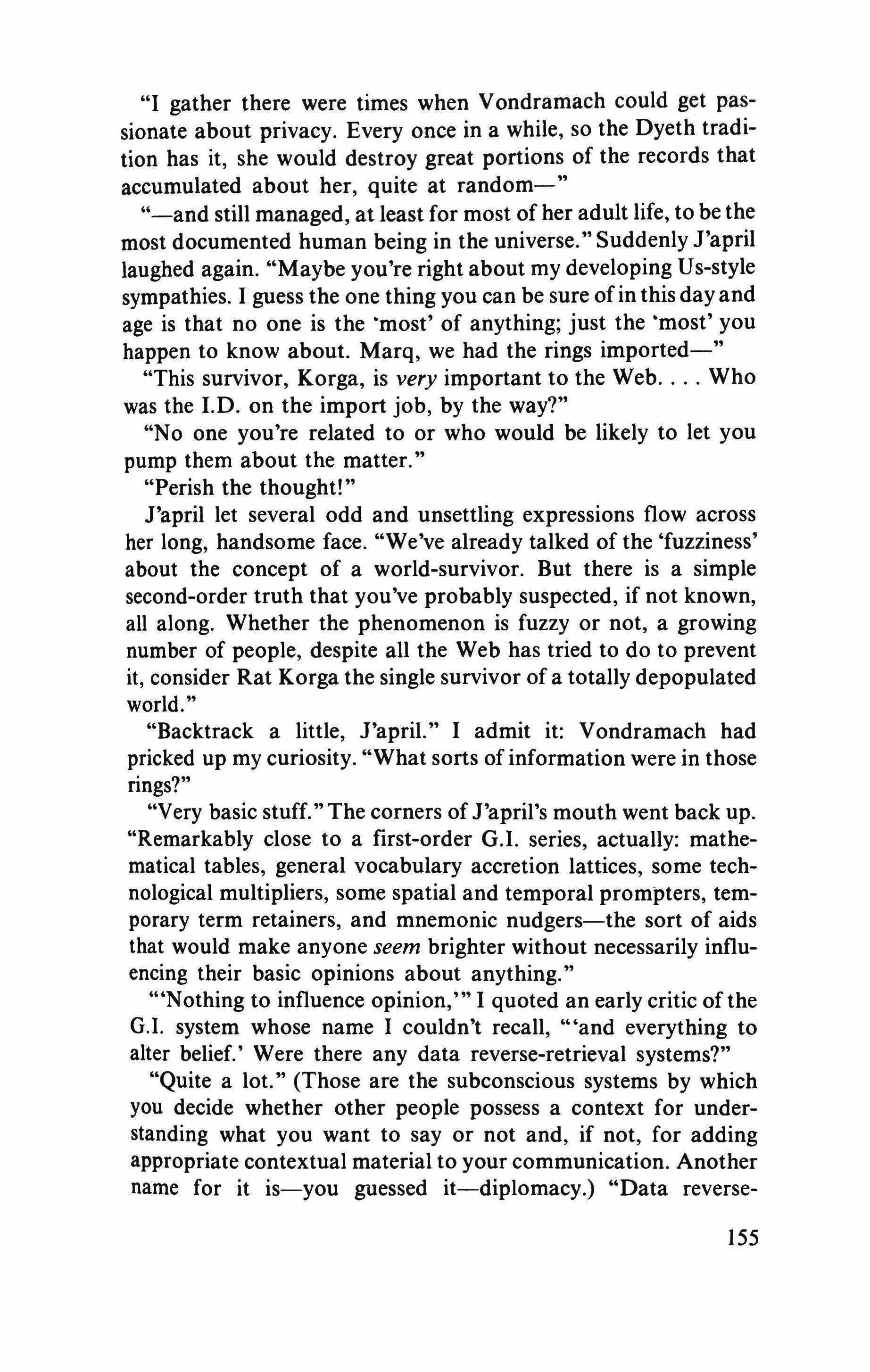
"I gather there were times when Vondramach could get passionate about privacy. Every once in a while, so the Dyeth tradition has it, she would destroy great portions of the records that accumulated about her, quite at random-"
"-and still managed, at least for most of her adult life, to be the most documented human being in the universe." Suddenly J'april laughed again. "Maybe you're right about my developing Us-style sympathies. I guess the one thing you can be sure ofin this day and age is that no one is the "most' of anything; just the "most' you happen to know about. Marq, we had the rings imported-"
"This survivor, Korga, is very important to the Web Who was the 1.0. on the import job, by the way?"
"No one you're related to or who would be likely to let you pump them about the matter."
"Perish the thought!"
J'april let several odd and unsettling expressions flow across her long, handsome face. "We've already talked of the 'fuzziness' about the concept of a world-survivor. But there is a simple second-order truth that you've probably suspected, if not known, all along. Whether the phenomenon is fuzzy or not, a growing number of people, despite all the Web has tried to do to prevent it, consider Rat Korga the single survivor of a totally depopulated world."
"Backtrack a little, J'april." I admit it: Vondramach had pricked up my curiosity. "What sorts of information were in those rings?"
"Very basic stuff." The corners of J'april's mouth went back up. "Remarkably close to a first-order G.I. series, actually: mathematical tables, general vocabulary accretion lattices, some technological multipliers, some spatial and temporal prompters, temporary term retainers, and mnemonic nudgers-the sort of aids that would make anyone seem brighter without necessarily influencing their basic opinions about anything."
"'Nothing to influence opinion," I quoted an early critic ofthe G.!. system whose name I couldn't recall, "'and everything to alter belief.' Were there any data reverse-retrieval systems?"
"Quite a lot." (Those are the subconscious systems by which you decide whether other people possess a context for understanding what you want to say or not and, if not, for adding appropriate contextual material to your communication. Another name for it is-you guessed it-diplomacy.) "Data reverse-
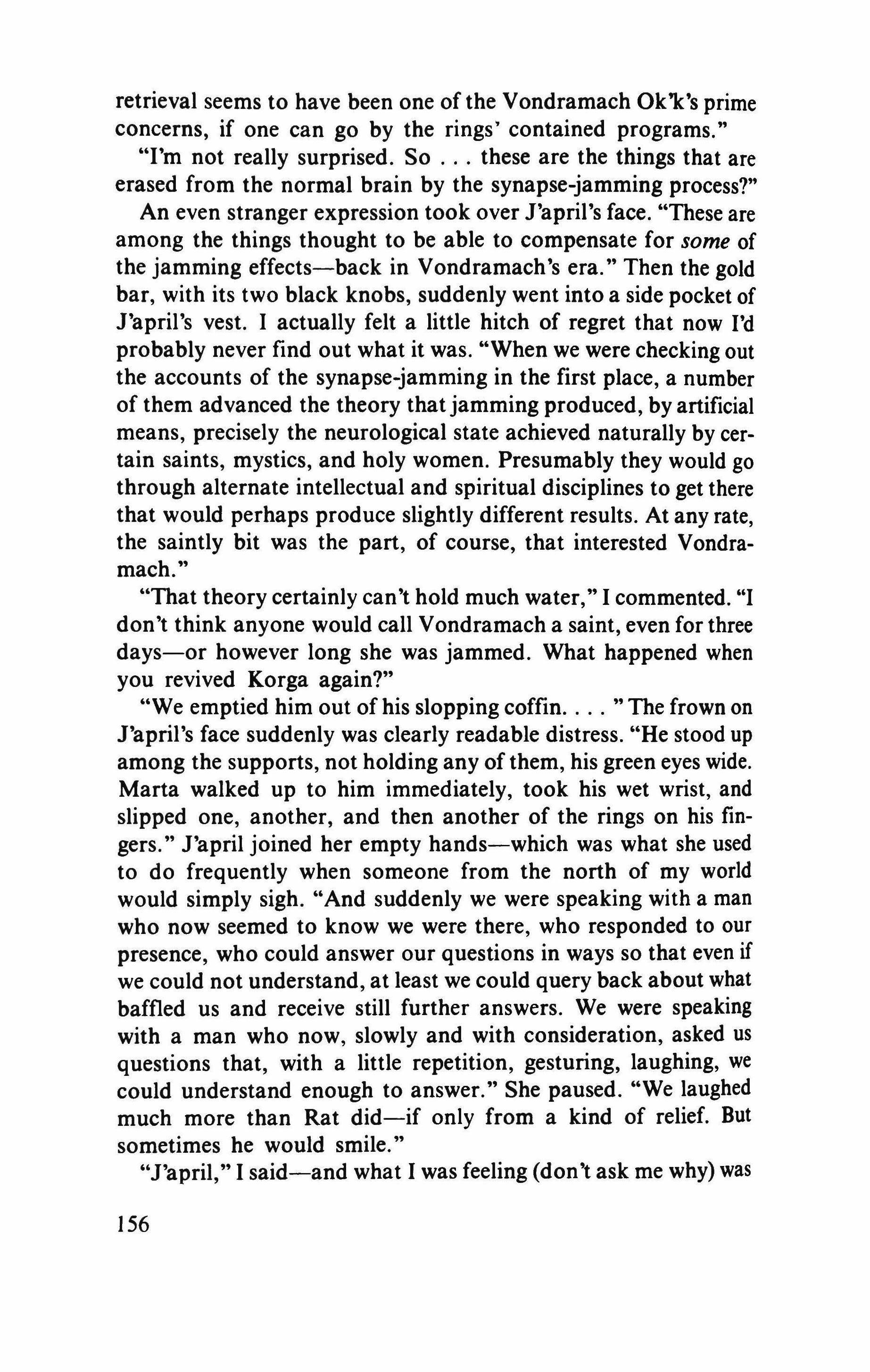
retrieval seems to have been one ofthe Vondramach Ok'k's prime concerns, if one can go by the rings' contained programs."
"I'm not really surprised. So these are the things that are erased from the normal brain by the synapse-jamming process?"
An even stranger expression took over J'april's face. "These are among the things thought to be able to compensate for some of the jamming effects-back in Vondramach's era." Then the gold bar, with its two black knobs, suddenly went into a side pocket of J'april's vest. I actually felt a little hitch of regret that now I'd probably never find out what it was. "When we were checking out the accounts of the synapse-jamming in the first place, a number of them advanced the theory thatjamming produced, by artificial means, precisely the neurological state achieved naturally by certain saints, mystics, and holy women. Presumably they would go through alternate intellectual and spiritual disciplines to get there that would perhaps produce slightly different results. At any rate, the saintly bit was the part, of course, that interested Vondramach."
"That theory certainly can't hold much water," I commented. "I don't think anyone would call Vondramach a saint, even for three days-or however long she was jammed. What happened when you revived Korga again?"
"We emptied him out of his slopping coffin "The frown on J'april's face suddenly was clearly readable distress. "He stood up among the supports, not holding any of them, his green eyes wide. Marta walked up to him immediately, took his wet wrist, and slipped one, another, and then another of the rings on his fingers." J'april joined her empty hands-which was what she used to do frequently when someone from the north of my world would simply sigh. "And suddenly we were speaking with a man who now seemed to know we were there, who responded to our presence, who could answer our questions in ways so that even if we could not understand, at least we could query back about what baffled us and receive still further answers. We were speaking with a man who now, slowly and with consideration, asked us questions that, with a little repetition, gesturing, laughing, we could understand enough to answer." She paused. "We laughed much more than Rat did-if only from a kind of relief. But sometimes he would smile."
"J'april," 1 said-and what 1 was feeling (don't ask me why) was
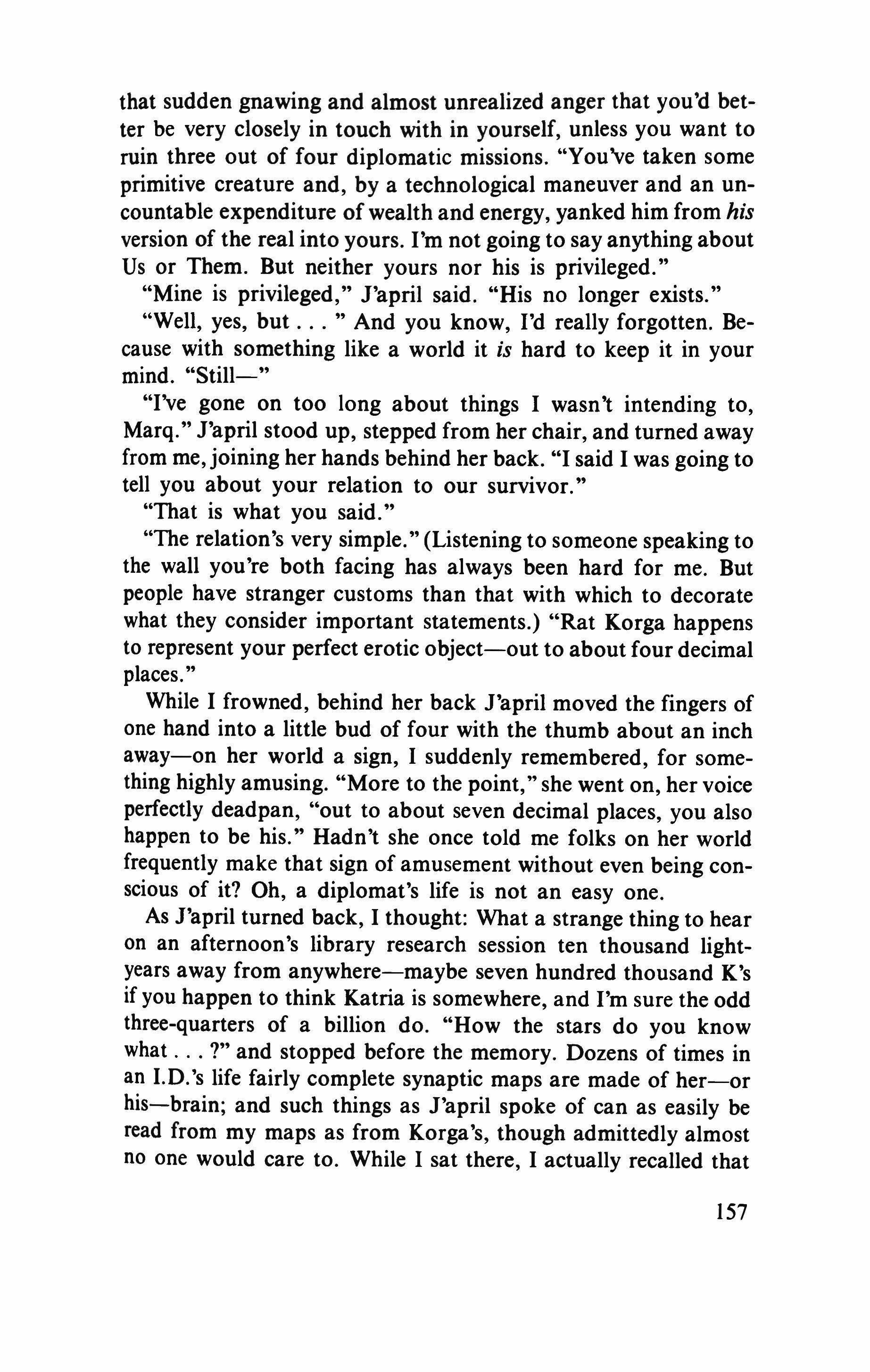
that sudden gnawing and almost unrealized anger that you'd better be very closely in touch with in yourself, unless you want to ruin three out of four diplomatic missions. "You've taken some primitive creature and, by a technological maneuver and an uncountable expenditure of wealth and energy, yanked him from his version of the real into yours. I'm not going to say anything about Us or Them. But neither yours nor his is privileged."
"Mine is privileged," J'april said. "His no longer exists."
"Well, yes, but And you know, I'd really forgotten. Because with something like a world it is hard to keep it in your mind. "Still-"
"I've gone on too long about things I wasn't intending to, Marq." J'april stood up, stepped from her chair, and turned away from me, joining her hands behind her back. "I said I was going to tell you about your relation to our survivor."
"That is what you said."
"The relation's very simple." (Listening to someone speaking to the wall you're both facing has always been hard for me. But people have stranger customs than that with which to decorate what they consider important statements.) "Rat Korga happens to represent your perfect erotic object-out to about four decimal places. "
While I frowned, behind her back J'april moved the fingers of one hand into a little bud of four with the thumb about an inch away-on her world a sign, I suddenly remembered, for something highly amusing. "More to the point," she went on, her voice perfectly deadpan, "out to about seven decimal places, you also happen to be his." Hadn't she once told me folks on her world frequently make that sign of amusement without even being conscious of it? Oh, a diplomat'S life is not an easy one.
As J'april turned back, I thought: What a strange thing to hear on an afternoon's library research session ten thousand lightyears away from anywhere-maybe seven hundred thousand K's if you happen to think Katria is somewhere, and I'm sure the odd three-quarters of a billion do. "How the stars do you know what T" and stopped before the memory. Dozens of times in an 1.0.'s life fairly complete synaptic maps are made of her-or his-brain; and such things as J'april spoke of can as easily be read from my maps as from Korga's, though admittedly almost no one would care to. While I sat there, I actually recalled that
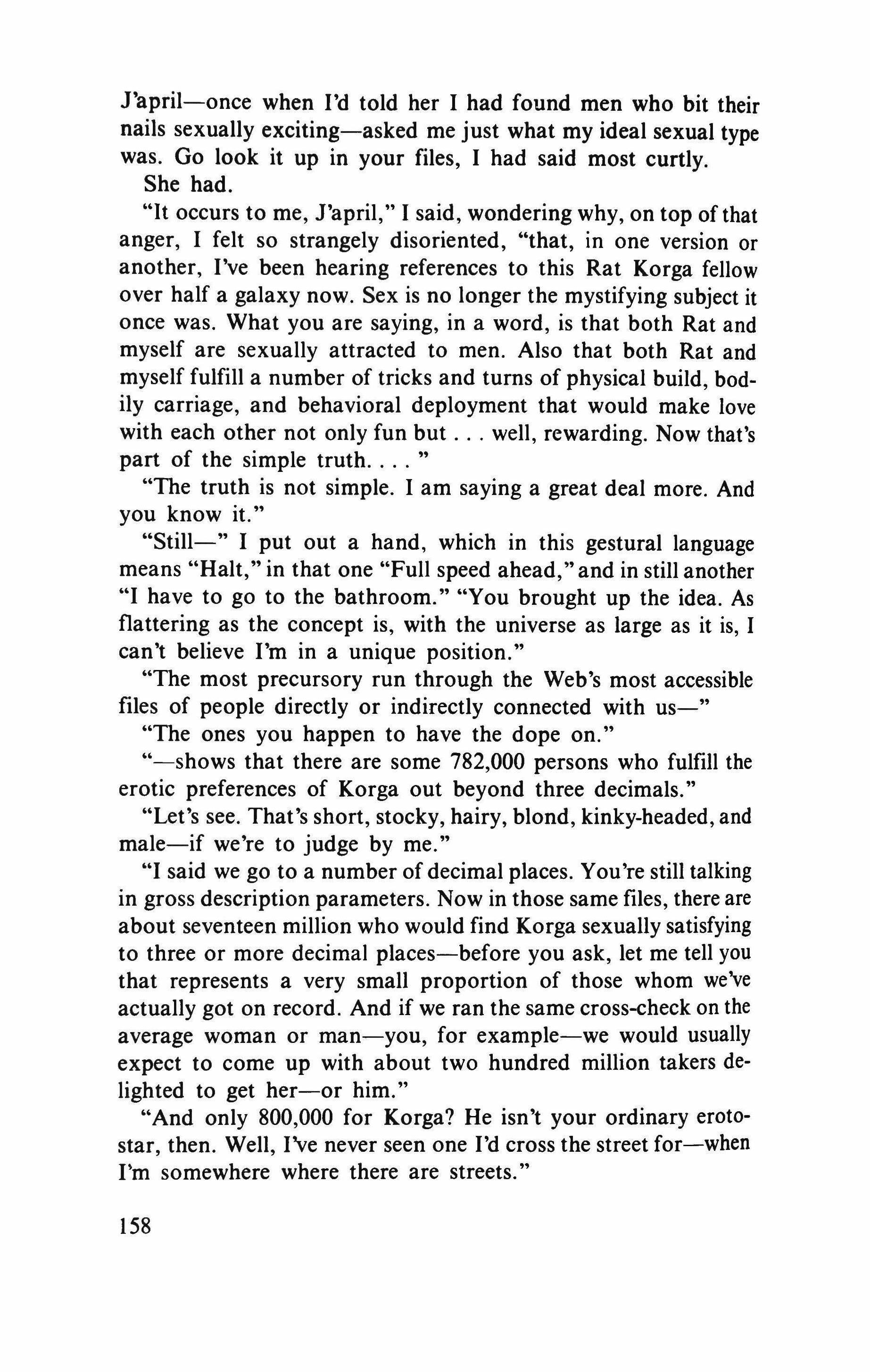
J'april-once when I'd told her 1 had found men who bit their nails sexually exciting-asked me just what my ideal sexual type was. Go look it up in your files, I had said most curtly.
She had.
"It occurs to me, J'april," I said, wondering why, on top ofthat anger, 1 felt so strangely disoriented, "that, in one version or another, I've been hearing references to this Rat Korga fellow over half a galaxy now. Sex is no longer the mystifying subject it once was. What you are saying, in a word, is that both Rat and myself are sexually attracted to men. Also that both Rat and myself fulfill a number of tricks and turns of physical build, bodily carriage, and behavioral deployment that would make love with each other not only fun but well, rewarding. Now that's part of the simple truth
"The truth is not simple. 1 am saying a great deal more. And you know it."
"Still-" 1 put out a hand, which in this gestural language means "Halt," in that one "Full speed ahead," and in still another "I have to go to the bathroom." "You brought up the idea. As flattering as the concept is, with the universe as large as it is, I can't believe I'm in a unique position."
"The most precursory run through the Web's most accessible files of people directly or indirectly connected with us-"
"The ones you happen to have the dope on."
"-shows that there are some 782,000 persons who fulfill the erotic preferences of Korga out beyond three decimals."
"Let's see. That's short, stocky, hairy, blond, kinky-headed, and male-if we're to judge by me."
"I said we go to a number of decimal places. You're still talking in gross description parameters. Now in those same files, there are about seventeen million who would find Korga sexually satisfying to three or more decimal places-before you ask, let me tell you that represents a very small proportion of those whom we've actually got on record. And if we ran the same cross-check on the average woman or man-you, for example-we would usually expect to come up with about two hundred million takers delighted to get her-or him."
"And only 800,000 for Korga? He isn't your ordinary erotostar, then. Well, I've never seen one I'd cross the street for-when I'm somewhere where there are streets."
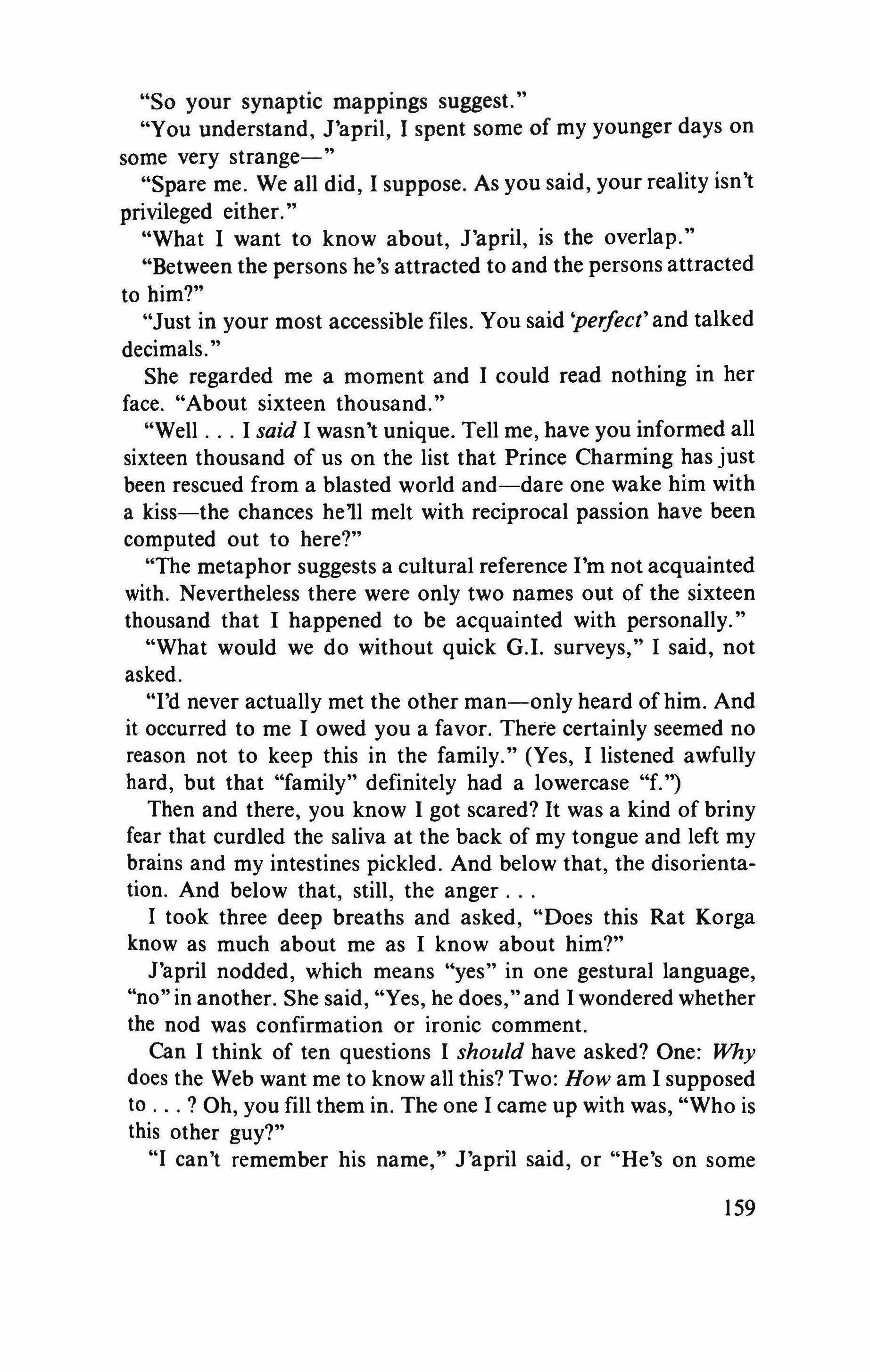
"So your synaptic mappings suggest."
"You understand, J'april, I spent some of my younger days on some very strange-"
"Spare me. We all did, I suppose. As you said, your reality isn't privileged either."
"What I want to know about, J'april, is the overlap."
"Between the persons he's attracted to and the persons attracted to him?"
"Just in your most accessible files. You said 'perfect' and talked decimals.
She regarded me a moment and I could read nothing in her face. "About sixteen thousand."
"Well I said I wasn't unique. Tell me, have you informed all sixteen thousand of us on the list that Prince Charming has just been rescued from a blasted world and-dare one wake him with a kiss-the chances he'll melt with reciprocal passion have been computed out to here?"
"The metaphor suggests a cultural reference I'm not acquainted with. Nevertheless there were only two names out of the sixteen thousand that I happened to be acquainted with personally."
"What would we do without quick G.!. surveys," I said, not asked.
"I'd never actually met the other man-only heard of him. And it occurred to me I owed you a favor. There certainly seemed no reason not to keep this in the family." (Yes, I listened awfully hard, but that "family" definitely had a lowercase "f.'J
Then and there, you know I got scared? It was a kind of briny fear that curdled the saliva at the back of my tongue and left my brains and my intestines pickled. And below that, the disorientation. And below that, still, the anger
1 took three deep breaths and asked, "Does this Rat Korga know as much about me as 1 know about him?"
J'april nodded, which means "yes" in one gestural language, "no" in another. She said, "Yes, he does," and 1 wondered whether the nod was confirmation or ironic comment.
Can 1 think of ten questions 1 should have asked? One: Why does the Web want me to know all this? Two: How am 1 supposed to ? Oh, you fill them in. The one 1 came up with was, "Who is this other guy?"
"I can't remember his name," J'april said, or "He's on some
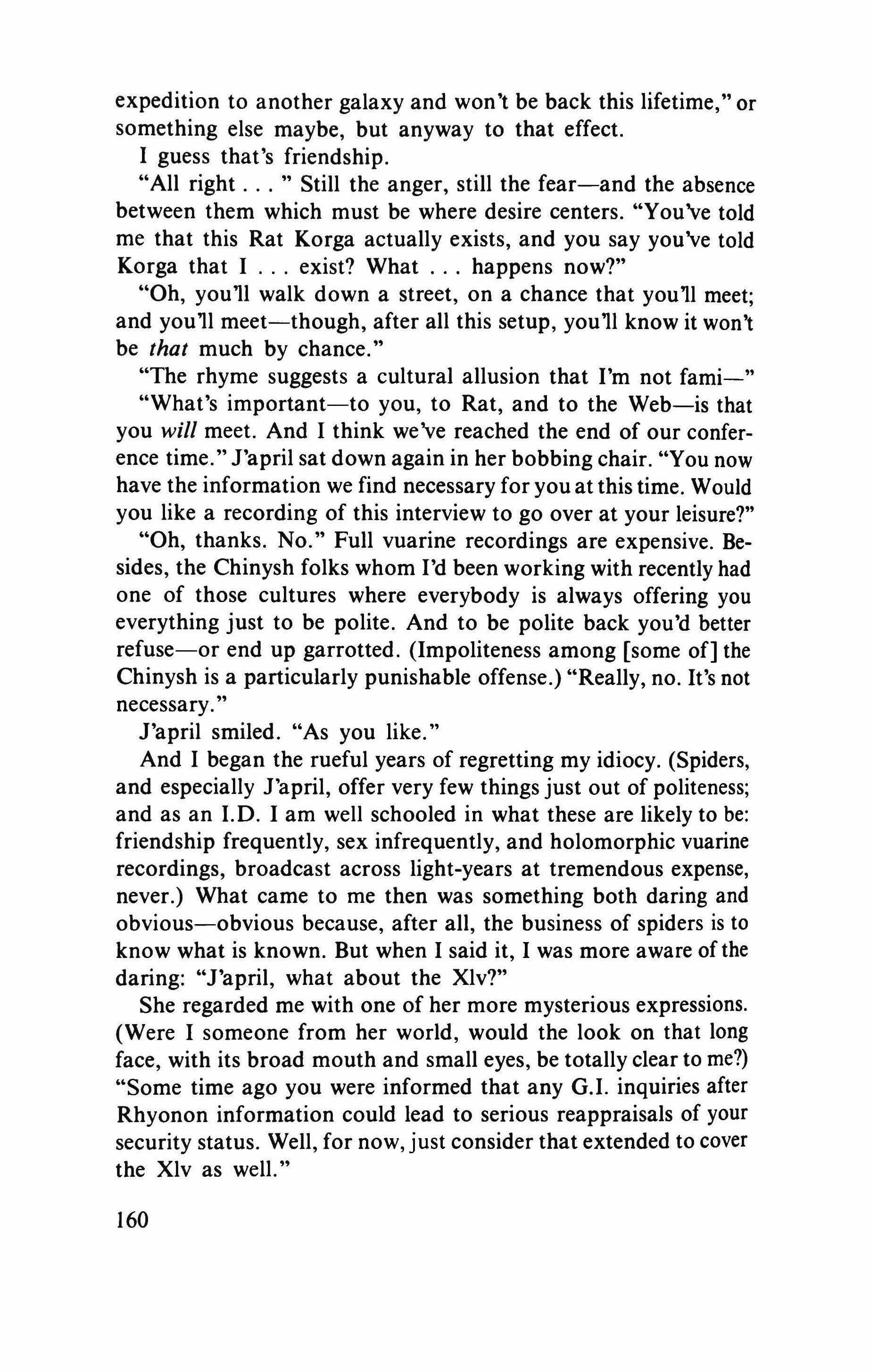
expedition to another galaxy and won't be back this lifetime," or something else maybe, but anyway to that effect.
I guess that's friendship.
"All right Still the anger, still the fear-and the absence between them which must be where desire centers. "You've told me that this Rat Korga actually exists, and you say you've told Korga that I exist? What happens now?"
"Oh, you'll walk down a street, on a chance that you'll meet; and you'll meet-though, after all this setup, you'll know it won't be that much by chance."
"The rhyme suggests a cultural allusion that I'm not fami-"
"What's important-to you, to Rat, and to the Web-is that you will meet. And I think we've reached the end of our conference time." J'april sat down again in her bobbing chair. "You now have the information we find necessary for you at this time. Would you like a recording of this interview to go over at your leisure?"
"Oh, thanks. No." Full vuarine recordings are expensive. Besides, the Chinysh folks whom I'd been working with recently had one of those cultures where everybody is always offering you everything just to be polite. And to be polite back you'd better refuse-or end up garrotted. (Impoliteness among [some of] the Chinysh is a particularly punishable offense.) "Really, no. It's not necessary.
J'april smiled. "As you like."
And I began the rueful years of regretting my idiocy. (Spiders, and especially J'april, offer very few things just out of politeness; and as an 1.0. I am well schooled in what these are likely to be: friendship frequently, sex infrequently, and holomorphic vuarine recordings, broadcast across light-years at tremendous expense, never.) What came to me then was something both daring and obvious-obvious because, after all, the business of spiders is to know what is known. But when I said it, I was more aware ofthe daring: "J'april, what about the Xlv?"
She regarded me with one of her more mysterious expressions. (Were I someone from her world, would the look on that long face, with its broad mouth and small eyes, be totally clear to me?)
"Some time ago you were informed that any G.I. inquiries after Rhyonon information could lead to serious reappraisals of your security status. Well, for now, just consider that extended to cover the Xlv as well."
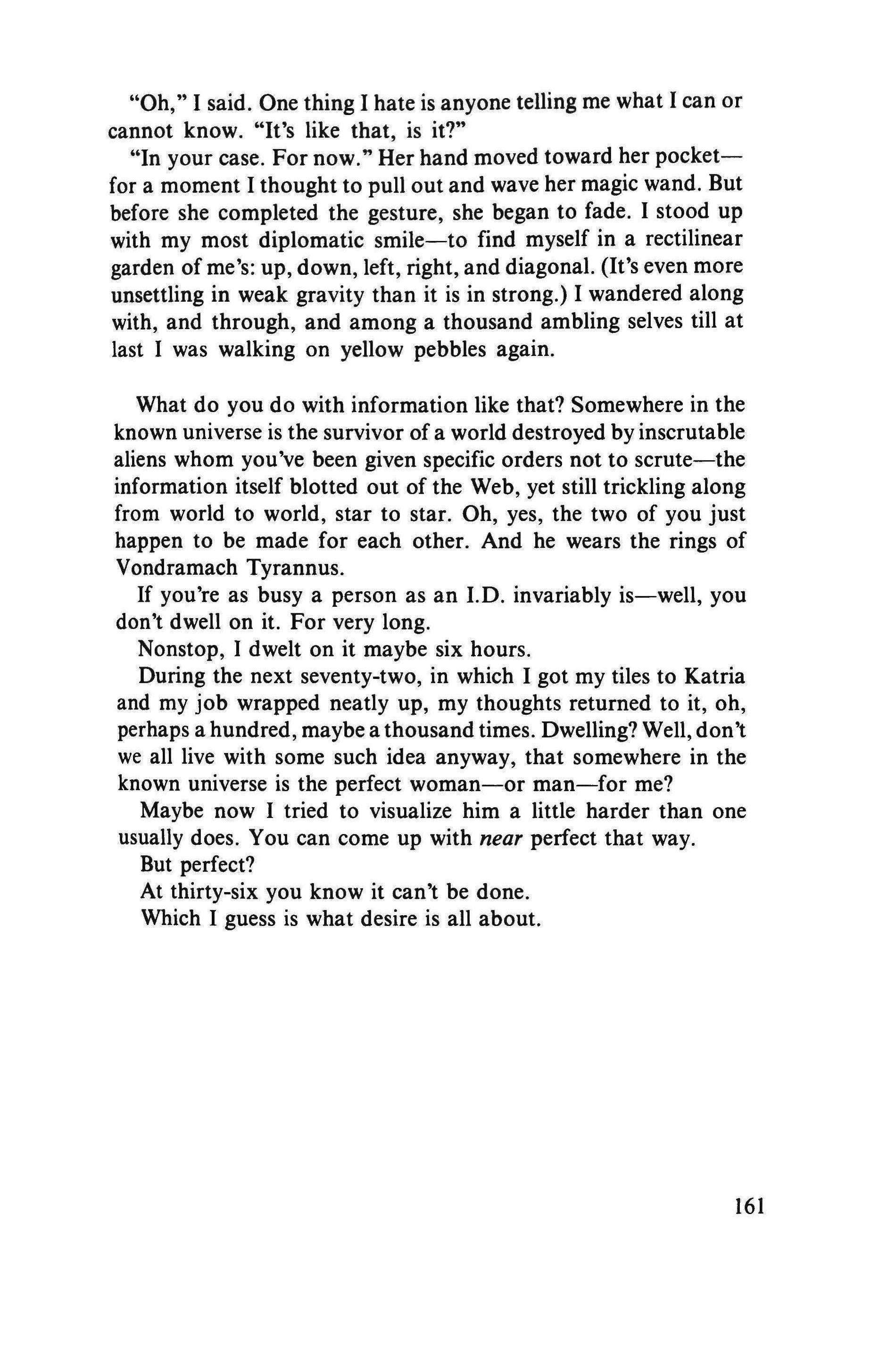
"Oh," I said. One thing I hate is anyone telling me what I can or cannot know. "It's like that, is it?"
"In your case. For now." Her hand moved toward her pocketfor a moment I thought to pull out and wave her magic wand. But before she completed the gesture, she began to fade. I stood up with my most diplomatic smile-to find myself in a rectilinear garden of me's: up, down, left, right, and diagonal. (It's even more unsettling in weak gravity than it is in strong.) I wandered along with, and through, and among a thousand ambling selves till at last I was walking on yellow pebbles again.
What do you do with information like that? Somewhere in the known universe is the survivor of a world destroyed by inscrutable aliens whom you've been given specific orders not to scrute-the information itself blotted out of the Web, yet still trickling along from world to world, star to star. Oh, yes, the two of you just happen to be made for each other. And he wears the rings of Vondramach Tyrannus.
If you're as busy a person as an I.D. invariably is-well, you don't dwell on it. For very long.
Nonstop, I dwelt on it maybe six hours.
During the next seventy-two, in which I got my tiles to Katria and my job wrapped neatly up, my thoughts returned to it, oh, perhaps a hundred, maybe a thousand times. Dwelling? Well, don't we all live with some such idea anyway, that somewhere in the known universe is the perfect woman-or man-for me?
Maybe now I tried to visualize him a little harder than one usually does. You can come up with near perfect that way.
But perfect?
At thirty-six you know it can't be done. Which I guess is what desire is all about.
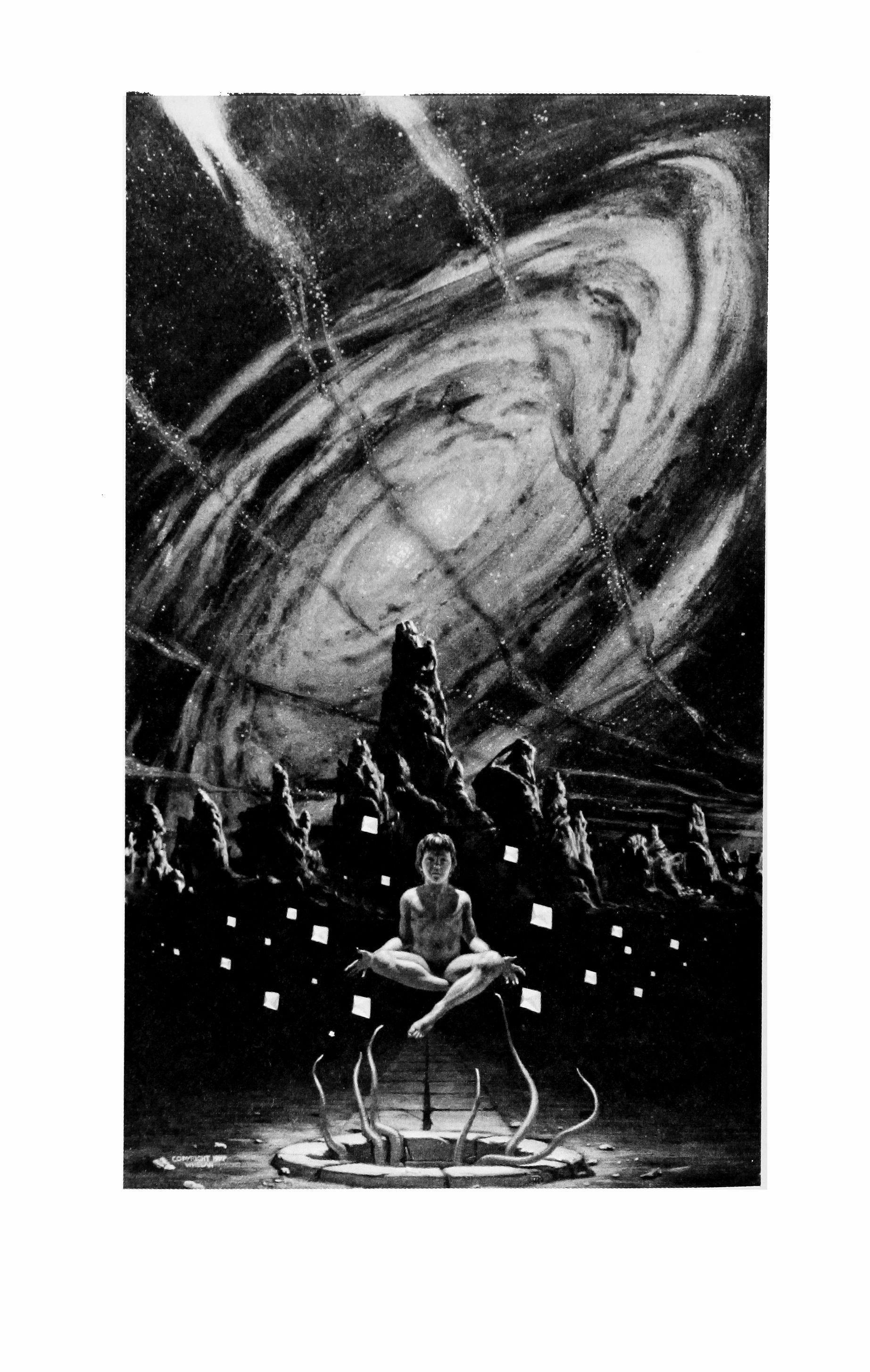
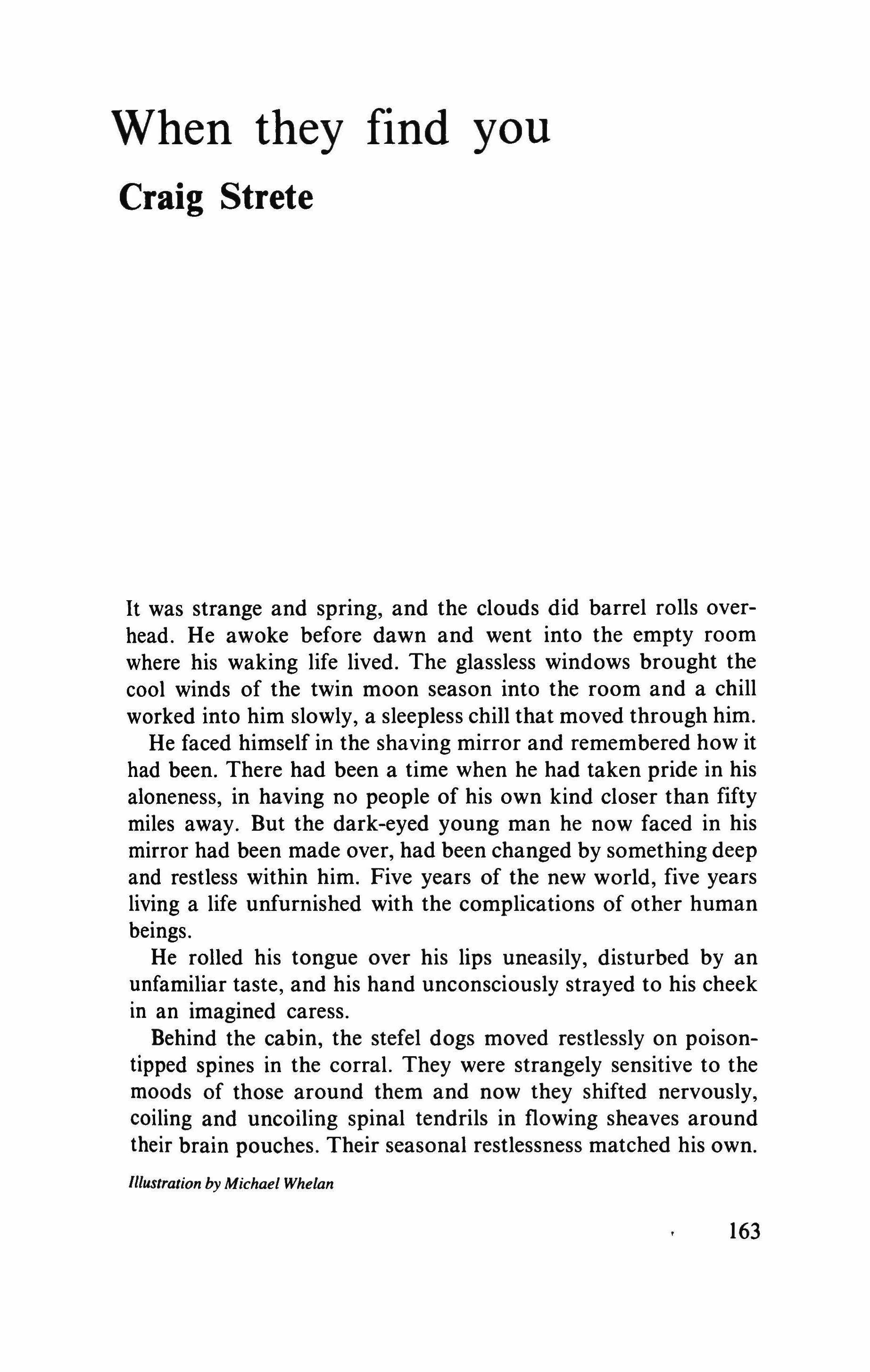
It was strange and spring, and the clouds did barrel rolls overhead. He awoke before dawn and went into the empty room where his waking life lived. The glassless windows brought the cool winds of the twin moon season into the room and a chill worked into him slowly, a sleepless chill that moved through him. He faced himself in the shaving mirror and remembered how it had been. There had been a time when he had taken pride in his aloneness, in having no people of his own kind closer than fifty miles away. But the dark-eyed young man he now faced in his mirror had been made over, had been changed by something deep and restless within him. Five years of the new world, five years living a life unfurnished with the complications of other human beings.
He rolled his tongue over his lips uneasily, disturbed by an unfamiliar taste, and his hand unconsciously strayed to his cheek in an imagined caress.
Behind the cabin, the stefel dogs moved restlessly on poisontipped spines in the corral. They were strangely sensitive to the moods of those around them and now they shifted nervously, coiling and uncoiling spinal tendrils in flowing sheaves around their brain pouches. Their seasonal restlessness matched his own.
Illustration by Michael Whelan
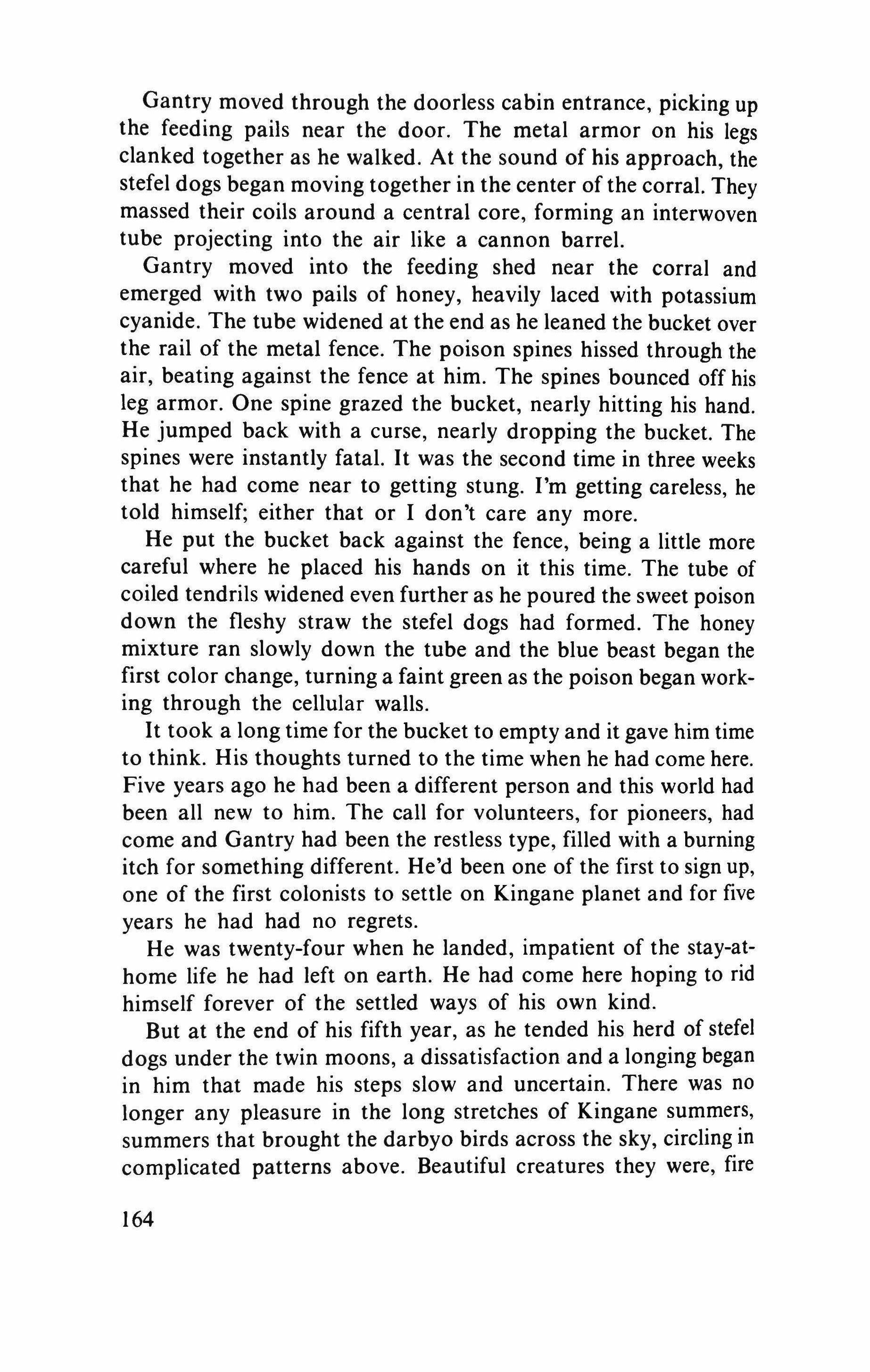
Gantry moved through the doorless cabin entrance, picking up the feeding pails near the door. The metal armor on his legs clanked together as he walked. At the sound of his approach, the stefel dogs began moving together in the center of the corral. They massed their coils around a central core, forming an interwoven tube projecting into the air like a cannon barrel.
Gantry moved into the feeding shed near the corral and emerged with two pails of honey, heavily laced with potassium cyanide. The tube widened at the end as he leaned the bucket over the rail of the metal fence. The poison spines hissed through the air, beating against the fence at him. The spines bounced off his leg armor. One spine grazed the bucket, nearly hitting his hand. He jumped back with a curse, nearly dropping the bucket. The spines were instantly fatal. It was the second time in three weeks that he had come near to getting stung. I'm getting careless, he told himself; either that or I don't care any more.
He put the bucket back against the fence, being a little more careful where he placed his hands on it this time. The tube of coiled tendrils widened even further as he poured the sweet poison down the fleshy straw the stefel dogs had formed. The honey mixture ran slowly down the tube and the blue beast began the first color change, turning a faint green as the poison began working through the cellular walls.
It took a long time for the bucket to empty and it gave him time to think. His thoughts turned to the time when he had come here. Five years ago he had been a different person and this world had been all new to him. The call for volunteers, for pioneers, had come and Gantry had been the restless type, filled with a burning itch for something different. He'd been one of the first to sign up, one of the first colonists to settle on Kingane planet and for five years he had had no regrets.
He was twenty-four when he landed, impatient of the stay-athome life he had left on earth. He had come here hoping to rid himself forever of the settled ways of his own kind.
But at the end of his fifth year, as he tended his herd of stefel dogs under the twin moons, a dissatisfaction and a longing began in him that made his steps slow and uncertain. There was no longer any pleasure in the long stretches of Kingane summers, summers that brought the darbyo birds across the sky, circling in complicated patterns above. Beautiful creatures they were, fire
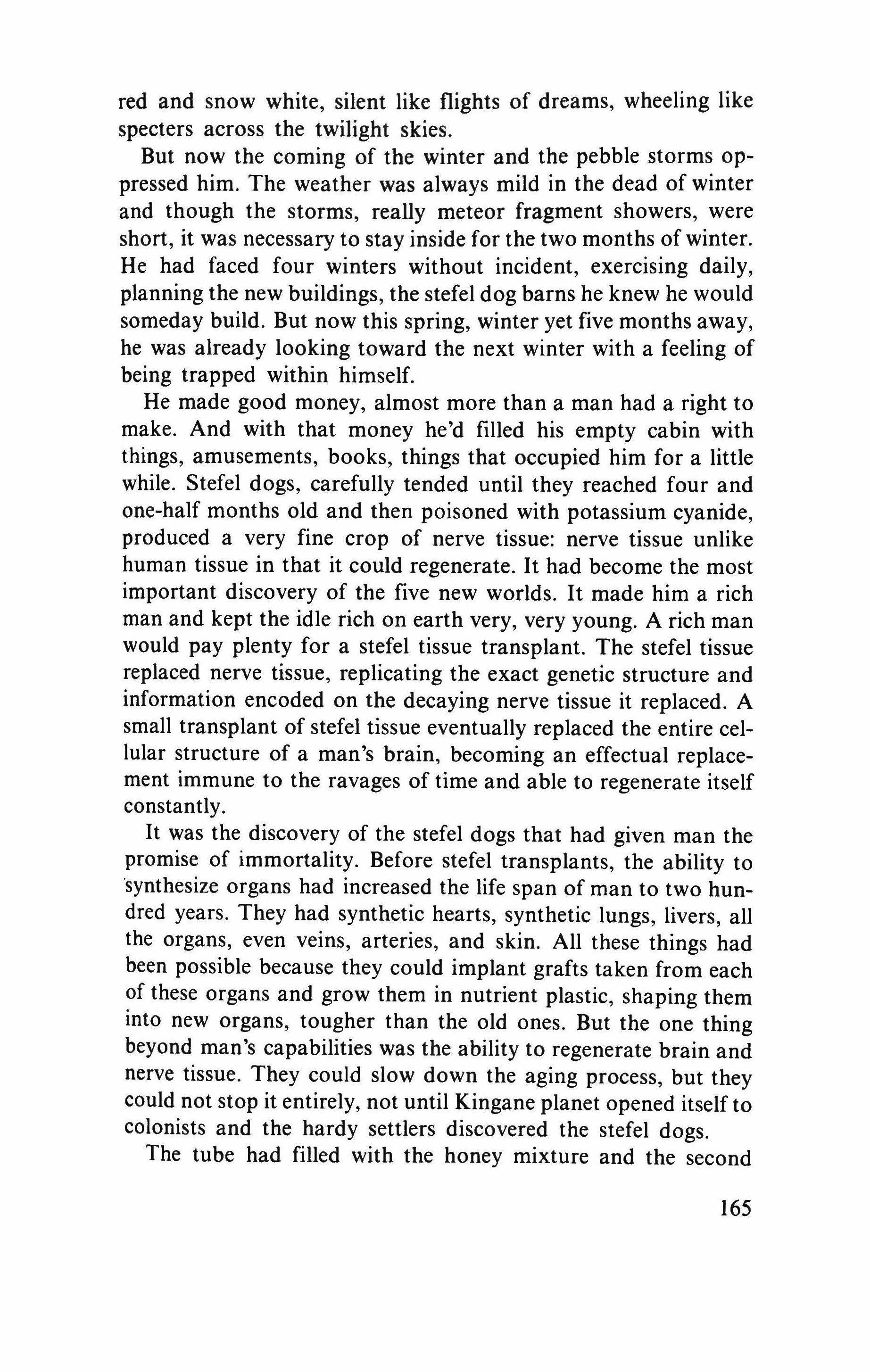
red and snow white, silent like flights of dreams, wheeling like specters across the twilight skies.
But now the coming of the winter and the pebble storms oppressed him. The weather was always mild in the dead of winter and though the storms, really meteor fragment showers, were short, it was necessary to stay inside for the two months of winter. He had faced four winters without incident, exercising daily, planning the new buildings, the stefel dog barns he knew he would someday build. But now this spring, winter yet five months away, he was already looking toward the next winter with a feeling of being trapped within himself.
He made good money, almost more than a man had a right to make. And with that money he'd filled his empty cabin with things, amusements, books, things that occupied him for a little while. Stefel dogs, carefully tended until they reached four and one-half months old and then poisoned with potassium cyanide, produced a very fine crop of nerve tissue: nerve tissue unlike human tissue in that it could regenerate. It had become the most important discovery of the five new worlds. It made him a rich man and kept the idle rich on earth very, very young. A rich man would pay plenty for a stefel tissue transplant. The stefel tissue replaced nerve tissue, replicating the exact genetic structure and information encoded on the decaying nerve tissue it replaced. A small transplant of stefel tissue eventually replaced the entire cellular structure of a man's brain, becoming an effectual replacement immune to the ravages of time and able to regenerate itself constantly.
It was the discovery of the stefel dogs that had given man the promise of immortality. Before stefel transplants, the ability to synthesize organs had increased the life span of man to two hundred years. They had synthetic hearts, synthetic lungs, livers, all the organs, even veins, arteries, and skin. All these things had been possible because they could implant grafts taken from each of these organs and grow them in nutrient plastic, shaping them into new organs, tougher than the old ones. But the one thing beyond man's capabilities was the ability to regenerate brain and nerve tissue. They could slow down the aging process, but they could not stop it entirely, not until Kingane planet opened itself to colonists and the hardy settlers discovered the stefel dogs.
The tube had filled with the honey mixture and the second
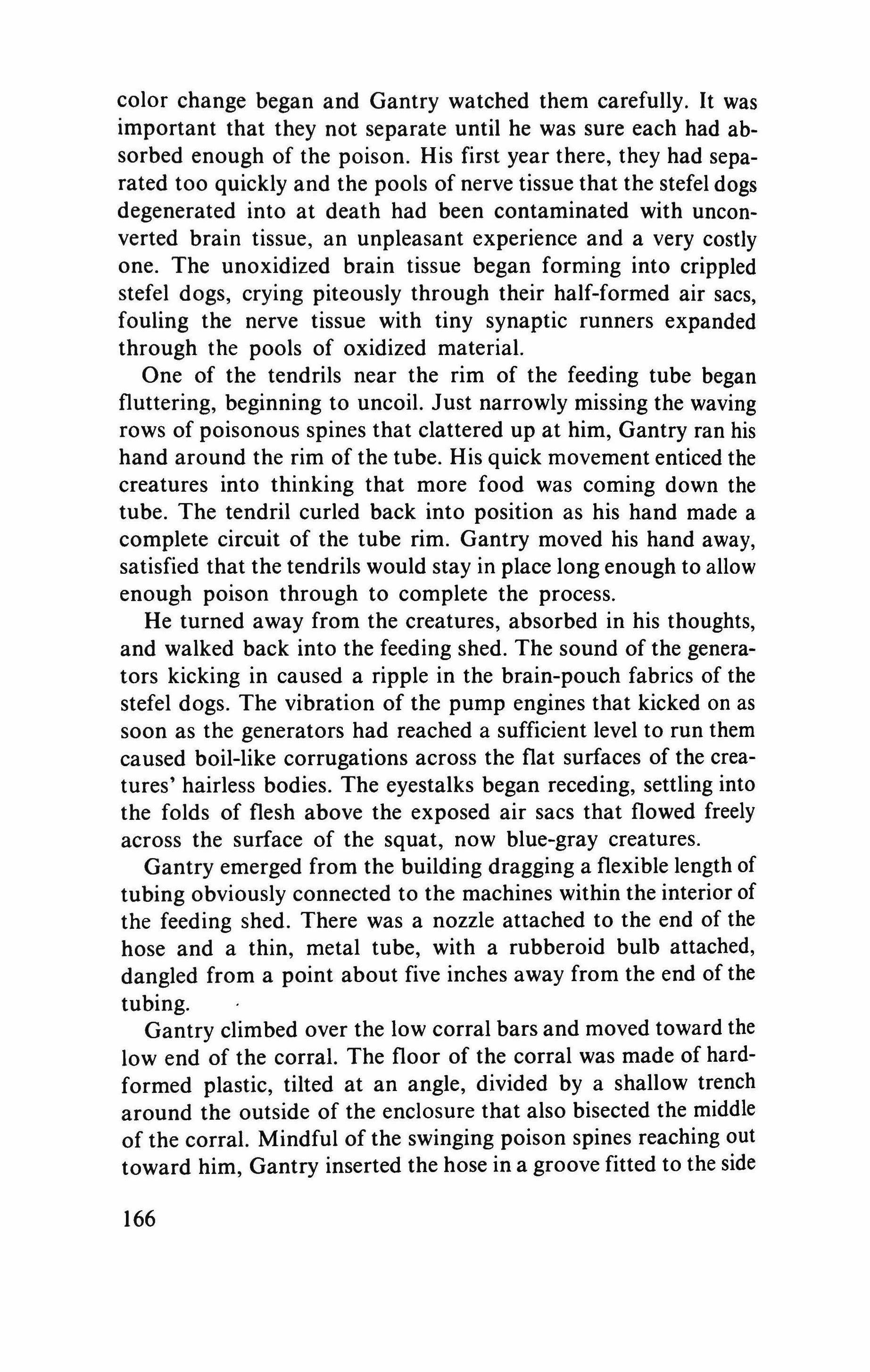
color change began and Gantry watched them carefully. It was important that they not separate until he was sure each had absorbed enough of the poison. His first year there, they had separated too quickly and the pools of nerve tissue that the stefel dogs degenerated into at death had been contaminated with unconverted brain tissue, an unpleasant experience and a very costly one. The unoxidized brain tissue began forming into crippled stefel dogs, crying piteously through their half-formed air sacs, fouling the nerve tissue with tiny synaptic runners expanded through the pools of oxidized material.
One of the tendrils near the rim of the feeding tube began fluttering, beginning to uncoil. Just narrowly missing the waving rows of poisonous spines that clattered up at him, Gantry ran his hand around the rim of the tube. His quick movement enticed the creatures into thinking that more food was coming down the tube. The tendril curled back into position as his hand made a complete circuit of the tube rim. Gantry moved his hand away, satisfied that the tendrils would stay in place long enough to allow enough poison through to complete the process.
He turned away from the creatures, absorbed in his thoughts, and walked back into the feeding shed. The sound of the generators kicking in caused a ripple in the brain-pouch fabrics of the stefel dogs. The vibration of the pump engines that kicked on as soon as the generators had reached a sufficient level to run them caused boil-like corrugations across the flat surfaces of the creatures' hairless bodies. The eyestalks began receding, settling into the folds of flesh above the exposed air sacs that flowed freely across the surface of the squat, now blue-gray creatures.
Gantry emerged from the building dragging a flexible length of tubing obviously connected to the machines within the interior of the feeding shed. There was a nozzle attached to the end of the hose and a thin, metal tube, with a rubberoid bulb attached, dangled from a point about five inches away from the end of the tubing.
Gantry climbed over the low corral bars and moved toward the low end of the corral. The floor of the corral was made of hardformed plastic, tilted at an angle, divided by a shallow trench around the outside of the enclosure that also bisected the middle of the corral. Mindful of the swinging poison spines reaching out toward him, Gantry inserted the hose in a groove fitted to the side
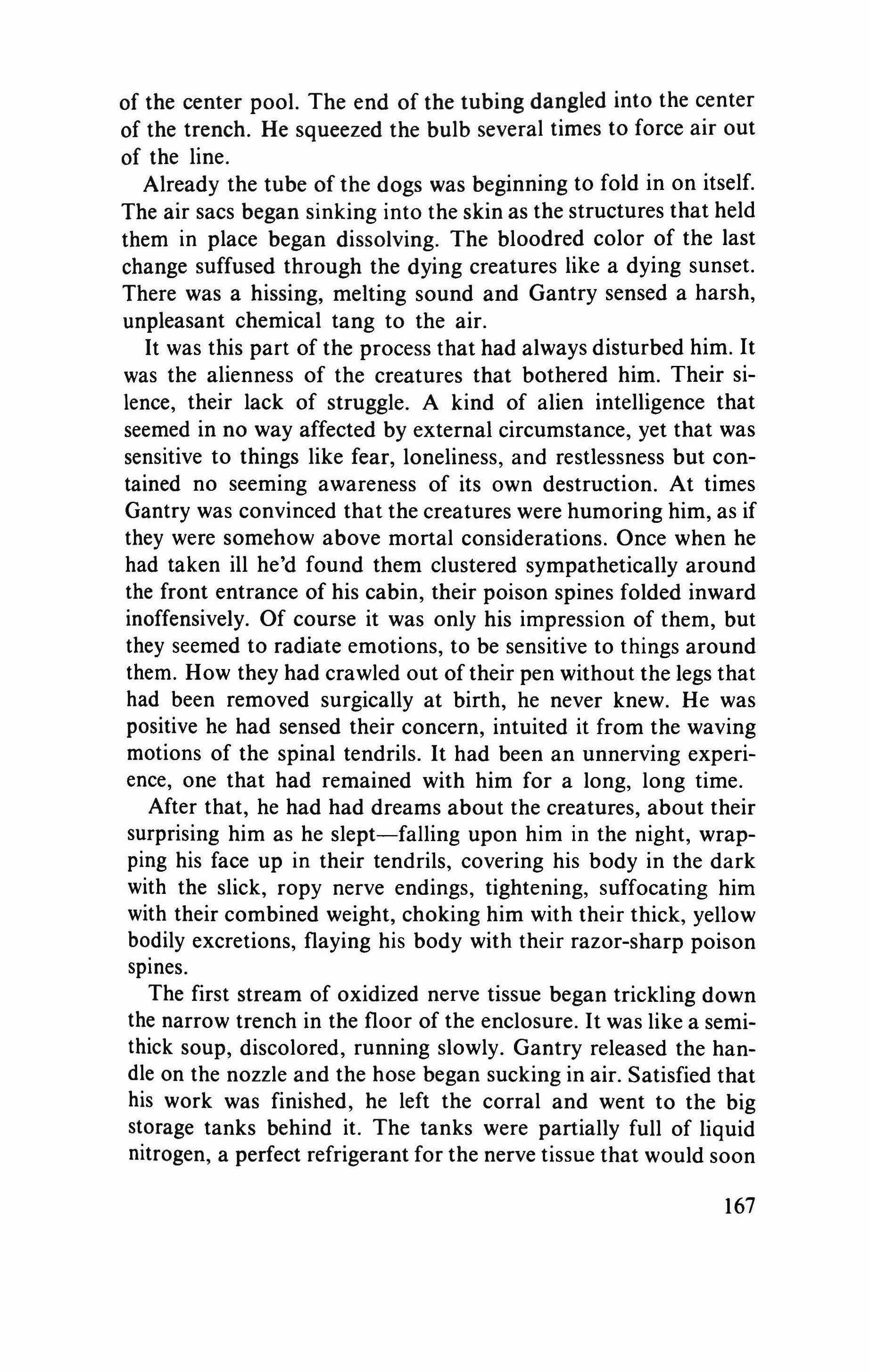
of the center pool. The end of the tubing dangled into the center of the trench. He squeezed the bulb several times to force air out of the line.
Already the tube of the dogs was beginning to fold in on itself. The air sacs began sinking into the skin as the structures that held them in place began dissolving. The bloodred color of the last change suffused through the dying creatures like a dying sunset. There was a hissing, melting sound and Gantry sensed a harsh, unpleasant chemical tang to the air.
It was this part of the process that had always disturbed him. It was the alienness of the creatures that bothered him. Their silence, their lack of struggle. A kind of alien intelligence that seemed in no way affected by external circumstance, yet that was sensitive to things like fear, loneliness, and restlessness but contained no seeming awareness of its own destruction. At times Gantry was convinced that the creatures were humoring him, as if they were somehow above mortal considerations. Once when he had taken ill he'd found them clustered sympathetically around the front entrance of his cabin, their poison spines folded inward inoffensively. Of course it was only his impression of them, but they seemed to radiate emotions, to be sensitive to things around them. How they had crawled out of their pen without the legs that had been removed surgically at birth, he never knew. He was positive he had sensed their concern, intuited it from the waving motions of the spinal tendrils. It had been an unnerving experience, one that had remained with him for a long, long time.
After that, he had had dreams about the creatures, about their surprising him as he slept-falling upon him in the night, wrapping his face up in their tendrils, covering his body in the dark with the slick, ropy nerve endings, tightening, suffocating him with their combined weight, choking him with their thick, yellow bodily excretions, flaying his body with their razor-sharp poison spines.
The first stream of oxidized nerve tissue began trickling down the narrow trench in the floor of the enclosure. It was like a semithick soup, discolored, running slowly. Gantry released the handle on the nozzle and the hose began sucking in air. Satisfied that his work was finished, he left the corral and went to the big storage tanks behind it. The tanks were partially full of liquid nitrogen, a perfect refrigerant for the nerve tissue that would soon

be flowing into the tanks. He checked the gauges in the tanks. They were satisfactory.
The screaming began, and Gantry knew it was time to leave. The screaming was not really unpleasant. It was rather melodious, a sort of birdlike trill as the air sacs began disintegrating but still he knew it for what it was, the death rattle of the creatures, and he was in no mood to listen to that. He moved away from the cabin, heading down the hill toward the sulfur water spring.
A family of Riyall were there before him. The Riyall were the native race of Kingane, strange aloof people divided into many different tribes. There were very few of them left. Diseases, unknown to Kingane before the coming of Earth people, had taken whole groups of them. And then there had been fighting when many of the more highly civilized of the wild Riyalls had put up a fight against the encroachments on their land. The first year Gantry had set down on Kingane he'd signed up in the militia, had engaged in several skirmishes with the revolting Riyall bands, and had personally killed several of them. He neither liked nor disliked them. They were humanoid, so genetically close to humans that it only required minor genetic surgery to make intermarriage possible-a thing that some of the settlers had been doing, as the loneliness of a world without women of their own kind weighed heavily upon them. It was not until his third year that the danger was really over. The last of the big Riyall bands had been exterminated in that year, leaving him free to spend all his time raising stefel dogs and building a small empire on the new world. Even now there were occasional incidents, cases where travelers had been found dead, horribly disfigured by the Riyalls.
It was therefore with some caution that he advanced toward the spring. He had left the house without his hand weapons. He had long since stopped wearing a gun, the long years of peace seemingly canceling the need for it.
They were aware of his coming, had been a minute before he knew they were even there. It was a big family group, one of the largest he'd seen in the last year or so. There were about thirty adults, a dozen or so young children, and a good-sized group of teenage youngsters. The group moved away from the water hole as he approached, falling silently back as he reached the spring.
Gantry raised his hand and drew one finger across his bared teeth. It was the sign that meant he came in peace. He moved

down by the spring. They stared at him silently, expressionlessly as he cupped his hands in the water and drank his fill from the sulfurous water.
Suddenly, as if they had all reached the same decision, they moved back toward the water, careful to maintain a guarded distance between themselves and Gantry. Gantry sat back on his heels and watched them drinking, filling their lizard-bladder containers with water from the spring. They were uninhibited people, both sexes stripping off their animal-hide clothes to slide into the water. Having decided to ignore him, the young ones were already playing and splashing.
Gantry watched them, watched as even the old ones got caught up in a water-splashing fight. And he envied them. They were simple people, always moving, rather childlike in their ways. The sight of a gray-haired old woman, naked as the day of her birth, splashing water like a five-year-old child, filled him with a kind of vicarious pleasure and, at the same time, a feeling that he was being left out.
His eyes appraised them. They were short, wiry people, about five foot eight on the average, with skins that ranged from white to a very dark reddish yellow. There seemed to be a great deal of variation in skin and hair color from one group to the next. Some groups, like the one in front of him, had orange hair mixed with black, a strange coloration that he found not at all displeasing. Their faces were basically human, except that facial expressions were not possible because the faces were flat planed. They could neither smile nor frown, lacking the facial muscles for either task. Neither could they close their eyelids or dilate their eyes. The eyes were their most disturbing feature. They had twin pupils, only one of which functioned in the daylight, while both functioned in the dark. They had a way of staring, enhanced by the lack of facial expressions and by their lidless eyes, that was unnerving.
They dressed plainly, wearing cured animal hides, mostly those of the snow-fur lizards that lived in the mountain regions, although occasionally one would have a shirt made of darbyo skin, ornately beaded with darbyo bones. Their only weakness seemed to be for shiny metal, which they pounded into bracelets-items highly prized by the Riyall as having magic properties that would aid the wearer.
Then, too, they had a fondness for alcohol, a fondness that led
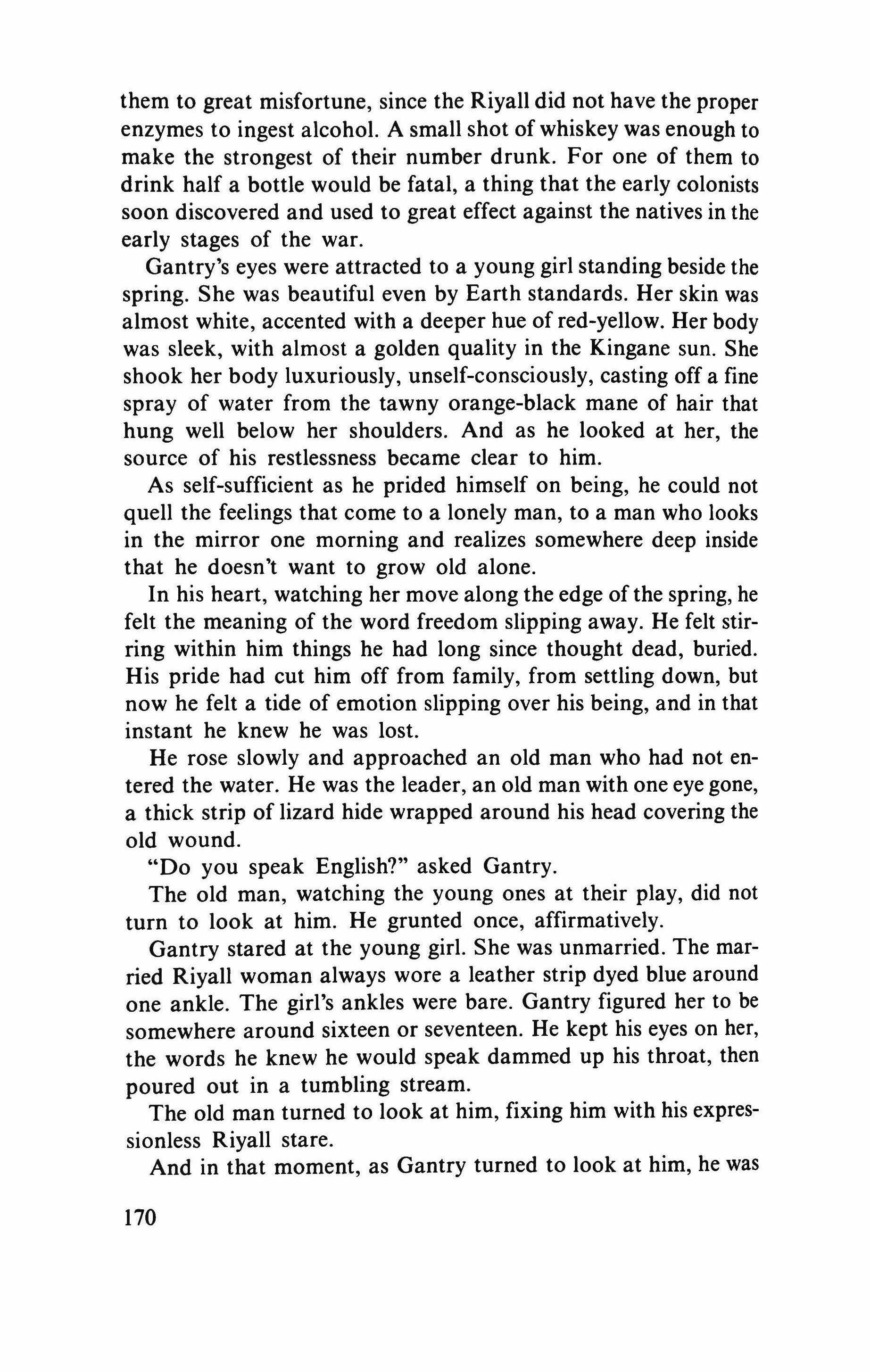
them to great misfortune, since the Riyall did not have the proper enzymes to ingest alcohol. A small shot of whiskey was enough to make the strongest of their number drunk. For one of them to drink half a bottle would be fatal, a thing that the early colonists soon discovered and used to great effect against the natives in the early stages of the war.
Gantry's eyes were attracted to a young girl standing beside the spring. She was beautiful even by Earth standards. Her skin was almost white, accented with a deeper hue of red-yellow. Her body was sleek, with almost a golden quality in the Kingane sun. She shook her body luxuriously, unself-consciously, casting off a fine spray of water from the tawny orange-black mane of hair that hung well below her shoulders. And as he looked at her, the source of his restlessness became clear to him.
As self-sufficient as he prided himself on being, he could not quell the feelings that come to a lonely man, to a man who looks in the mirror one morning and realizes somewhere deep inside that he doesn't want to grow old alone.
In his heart, watching her move along the edge of the spring, he felt the meaning of the word freedom slipping away. He felt stirring within him things he had long since thought dead, buried. His pride had cut him off from family, from settling down, but now he felt a tide of emotion slipping over his being, and in that instant he knew he was lost.
He rose slowly and approached an old man who had not entered the water. He was the leader, an old man with one eye gone, a thick strip of lizard hide wrapped around his head covering the old wound.
"Do you speak English?" asked Gantry.
The old man, watching the young ones at their play, did not turn to look at him. He grunted once, affirmatively.
Gantry stared at the young girl. She was unmarried. The married Riyall woman always wore a leather strip dyed blue around one ankle. The girl's ankles were bare. Gantry figured her to be somewhere around sixteen or seventeen. He kept his eyes on her, the words he knew he would speak dammed up his throat, then poured out in a tumbling stream.
The old man turned to look at him, fixing him with his expressionless Riyall stare.
And in that moment, as Gantry turned to look at him, he was
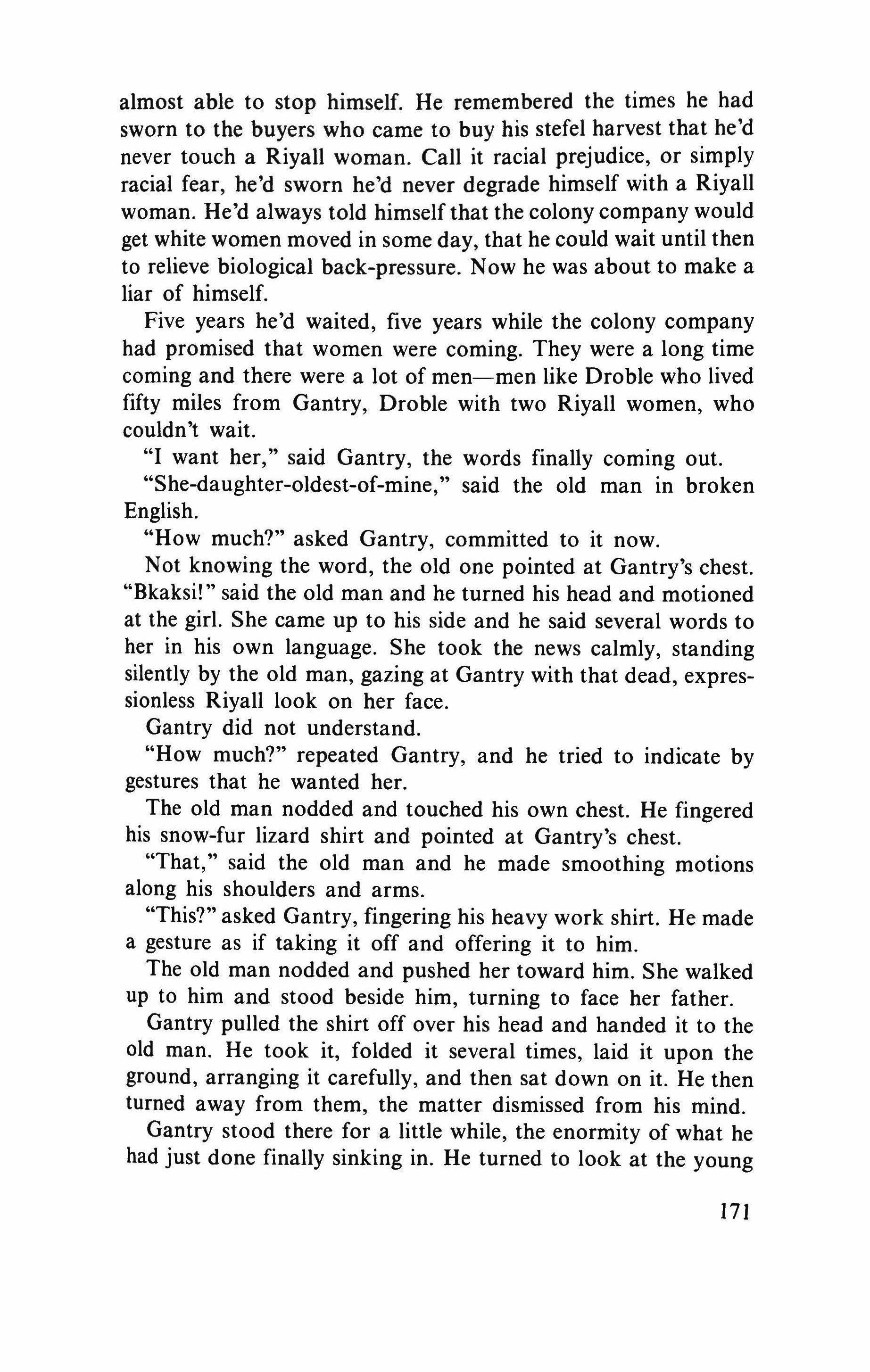
almost able to stop himself. He remembered the times he had sworn to the buyers who came to buy his stefel harvest that he'd never touch a Riyall woman. Call it racial prejudice, or simply racial fear, he'd sworn he'd never degrade himself with a Riyall woman. He'd always told himself that the colony company would get white women moved in some day, that he could wait until then to relieve biological back-pressure. Now he was about to make a liar of himself.
Five years he'd waited, five years while the colony company had promised that women were coming. They were a long time coming and there were a lot of men-men like Droble who lived fifty miles from Gantry, Droble with two Riyall women, who couldn't wait.
"I want her," said Gantry, the words finally coming out.
"She-daughter-oldest-of-mine," said the old man in broken English.
"How much?" asked Gantry, committed to it now.
Not knowing the word, the old one pointed at Gantry's chest. "Bkaksi!" said the old man and he turned his head and motioned at the girl. She came up to his side and he said several words to her in his own language. She took the news calmly, standing silently by the old man, gazing at Gantry with that dead, expressionless Riyall look on her face.
Gantry did not understand.
"How much?" repeated Gantry, and he tried to indicate by gestures that he wanted her.
The old man nodded and touched his own chest. He fingered his snow-fur lizard shirt and pointed at Gantry's chest.
"That," said the old man and he made smoothing motions along his shoulders and arms.
"This?" asked Gantry, fingering his heavy work shirt. He made a gesture as if taking it off and offering it to him.
The old man nodded and pushed her toward him. She walked up to him and stood beside him, turning to face her father.
Gantry pulled the shirt off over his head and handed it to the old man. He took it, folded it several times, laid it upon the ground, arranging it carefully, and then sat down on it. He then turned away from them, the matter dismissed from his mind.
Gantry stood there for a little while, the enormity of what he had just done finally sinking in. He turned to look at the young
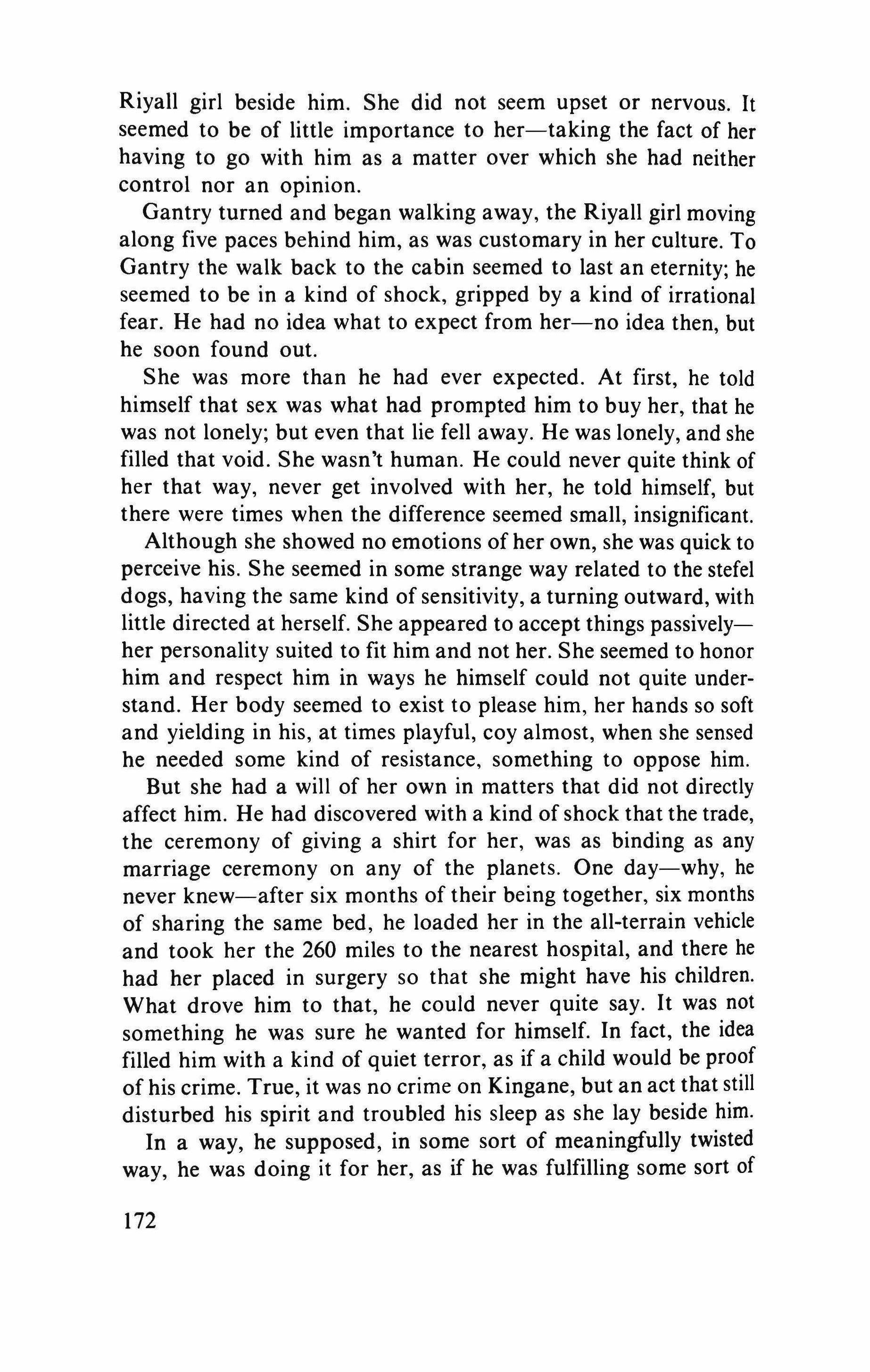
Riyall girl beside him. She did not seem upset or nervous. It seemed to be of little importance to her-taking the fact of her having to go with him as a matter over which she had neither control nor an opinion.
Gantry turned and began walking away, the Riyall girl moving along five paces behind him, as was customary in her culture. To Gantry the walk back to the cabin seemed to last an eternity; he seemed to be in a kind of shock, gripped by a kind of irrational fear. He had no idea what to expect from her-no idea then, but he soon found out.
She was more than he had ever expected. At first, he told himself that sex was what had prompted him to buy her, that he was not lonely; but even that lie fell away. He was lonely, and she filled that void. She wasn't human. He could never quite think of her that way, never get involved with her, he told himself, but there were times when the difference seemed small, insignificant.
Although she showed no emotions of her own, she was quick to perceive his. She seemed in some strange way related to the stefel dogs, having the same kind of sensitivity, a turning outward, with little directed at herself. She appeared to accept things passivelyher personality suited to fit him and not her. She seemed to honor him and respect him in ways he himself could not quite understand. Her body seemed to exist to please him, her hands so soft and yielding in his, at times playful, coy almost, when she sensed he needed some kind of resistance, something to oppose him.
But she had a will of her own in matters that did not directly affect him. He had discovered with a kind of shock that the trade, the ceremony of giving a shirt for her, was as binding as any marriage ceremony on any of the planets. One day-why, he never knew-after six months of their being together, six months of sharing the same bed, he loaded her in the all-terrain vehicle and took her the 260 miles to the nearest hospital, and there he had her placed in surgery so that she might have his children. What drove him to that, he could never quite say. It was not something he was sure he wanted for himself. In fact, the idea filled him with a kind of quiet terror, as if a child would be proof of his crime. True, it was no crime on Kingane, but an act that still disturbed his spirit and troubled his sleep as she lay beside him.
In a way, he supposed, in some sort of meaningfully twisted way, he was doing it for her, as if he was fulfilling some sort of
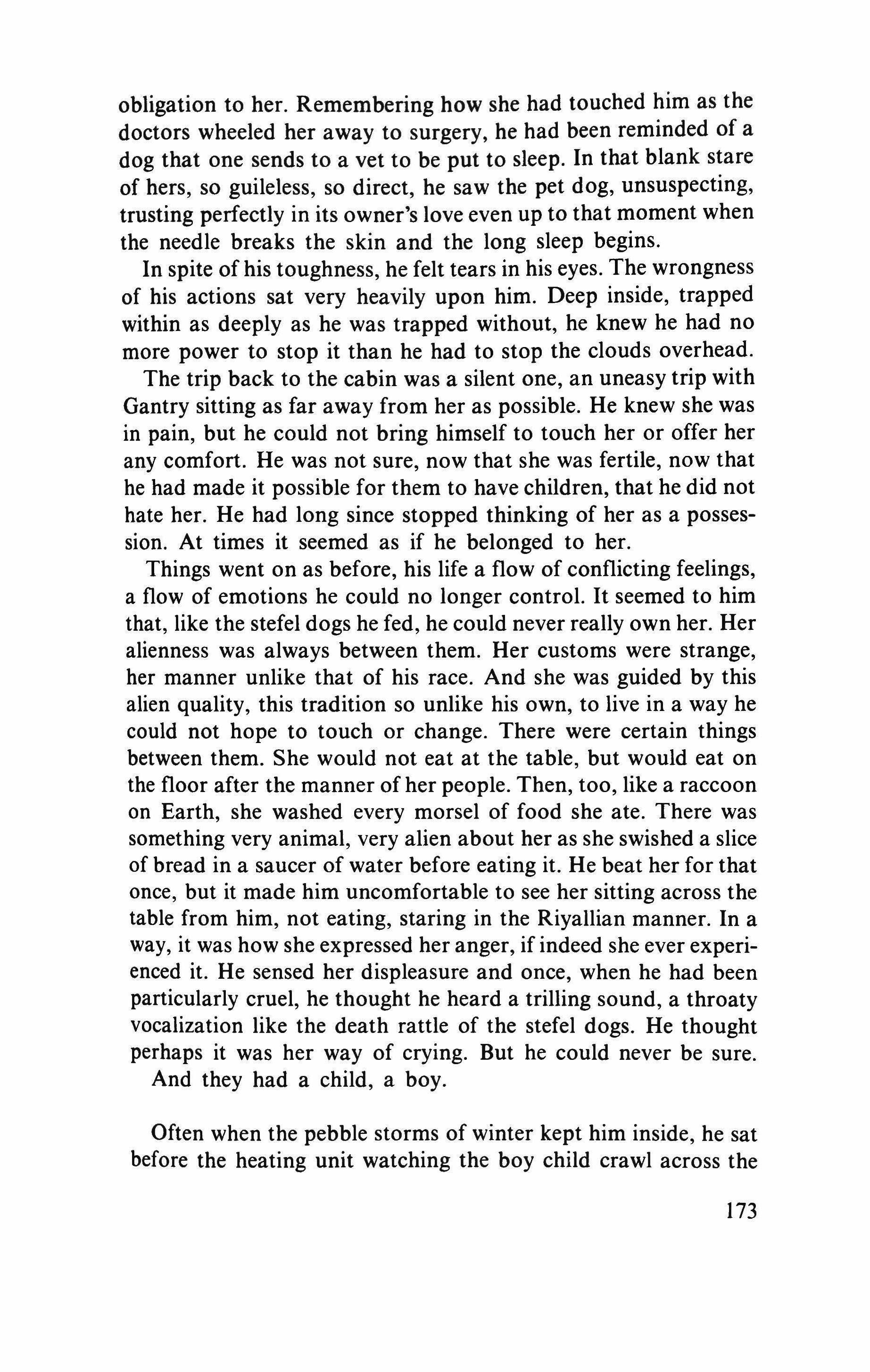
obligation to her. Remembering how she had touched him as the doctors wheeled her away to surgery, he had been reminded of a dog that one sends to a vet to be put to sleep. In that blank stare of hers, so guileless, so direct, he saw the pet dog, unsuspecting, trusting perfectly in its owner's love even up to that moment when the needle breaks the skin and the long sleep begins.
In spite of his toughness, he felt tears in his eyes. The wrongness of his actions sat very heavily upon him. Deep inside, trapped within as deeply as he was trapped without, he knew he had no more power to stop it than he had to stop the clouds overhead.
The trip back to the cabin was a silent one, an uneasy trip with Gantry sitting as far away from her as possible. He knew she was in pain, but he could not bring himself to touch her or offer her any comfort. He was not sure, now that she was fertile, now that he had made it possible for them to have children, that he did not hate her. He had long since stopped thinking of her as a possession. At times it seemed as if he belonged to her.
Things went on as before, his life a flow of conflicting feelings, a flow of emotions he could no longer control. It seemed to him that, like the stefel dogs he fed, he could never really own her. Her alienness was always between them. Her customs were strange, her manner unlike that of his race. And she was guided by this alien quality, this tradition so unlike his own, to live in a way he could not hope to touch or change. There were certain things between them. She would not eat at the table, but would eat on the floor after the manner of her people. Then, too, like a raccoon on Earth, she washed every morsel of food she ate. There was something very animal, very alien about her as she swished a slice of bread in a saucer of water before eating it. He beat her for that once, but it made him uncomfortable to see her sitting across the table from him, not eating, staring in the Riyallian manner. In a way, it was how she expressed her anger, if indeed she ever experienced it. He sensed her displeasure and once, when he had been particularly cruel, he thought he heard a trilling sound, a throaty vocalization like the death rattle of the stefel dogs. He thought perhaps it was her way of crying. But he could never be sure. And they had a child, a boy.
Often when the pebble storms of winter kept him inside, he sat before the heating unit watching the boy child crawl across the
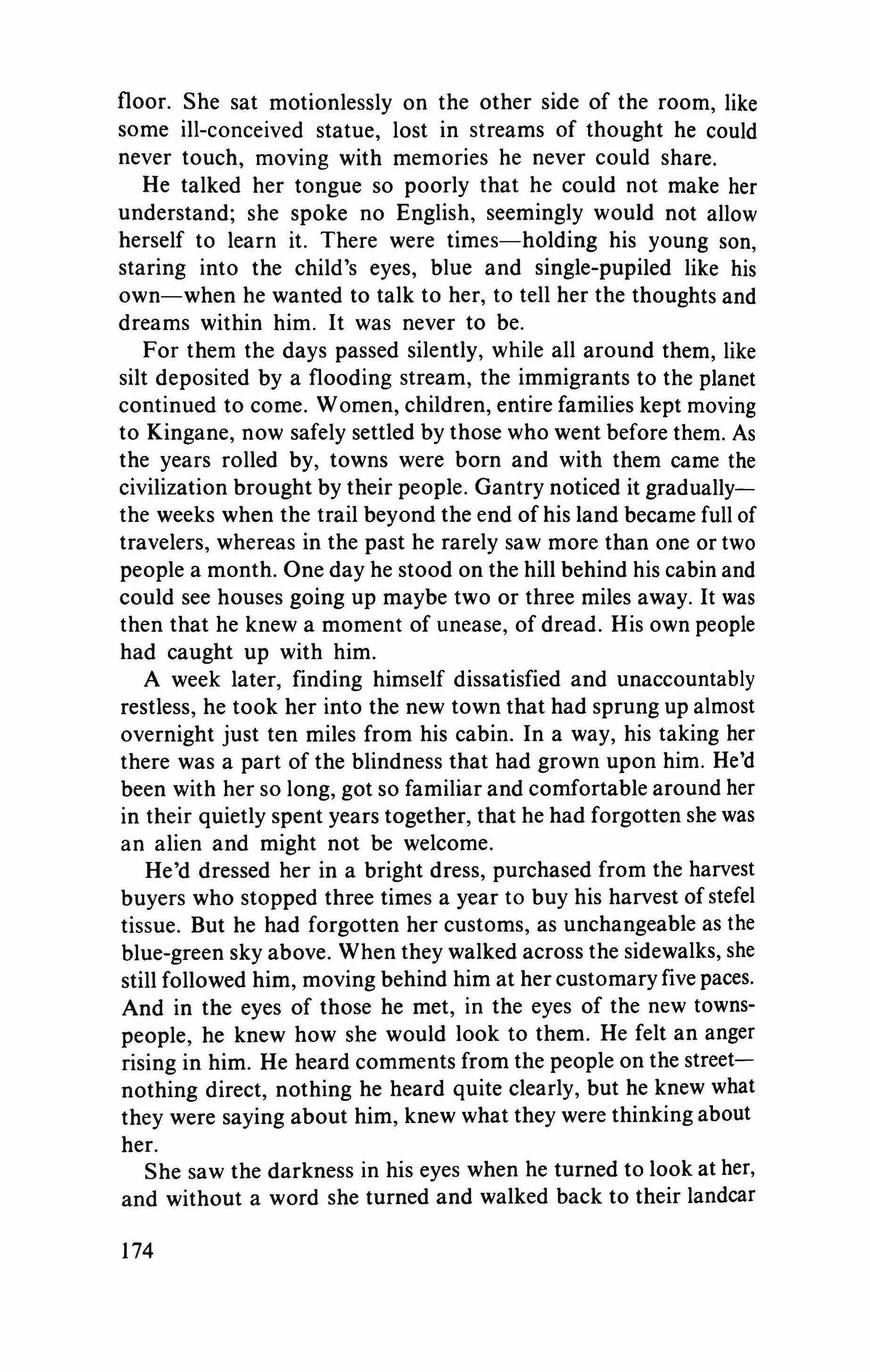
floor. She sat motionlessly on the other side of the room, like some ill-conceived statue, lost in streams of thought he could never touch, moving with memories he never could share.
He talked her tongue so poorly that he could not make her understand; she spoke no English, seemingly would not allow herself to learn it. There were times-holding his young son, staring into the child's eyes, blue and single-pupiled like his own-when he wanted to talk to her, to tell her the thoughts and dreams within him. It was never to be.
For them the days passed silently, while all around them, like silt deposited by a flooding stream, the immigrants to the planet continued to come. Women, children, entire families kept moving to Kingane, now safely settled by those who went before them. As the years rolled by, towns were born and with them came the civilization brought by their people. Gantry noticed it graduallythe weeks when the trail beyond the end of his land became full of travelers, whereas in the past he rarely saw more than one or two people a month. One day he stood on the hill behind his cabin and could see houses going up maybe two or three miles away. It was then that he knew a moment of unease, of dread. His own people had caught up with him.
A week later, finding himself dissatisfied and unaccountably restless, he took her into the new town that had sprung up almost overnight just ten miles from his cabin. In a way, his taking her there was a part of the blindness that had grown upon him. He'd been with her so long, got so familiar and comfortable around her in their quietly spent years together, that he had forgotten she was an alien and might not be welcome.
He'd dressed her in a bright dress, purchased from the harvest buyers who stopped three times a year to buy his harvest of stefel tissue. But he had forgotten her customs, as unchangeable as the blue-green sky above. When they walked across the sidewalks, she still followed him, moving behind him at her customary five paces. And in the eyes of those he met, in the eyes of the new townspeople, he knew how she would look to them. He felt an anger rising in him. He heard comments from the people on the streetnothing direct, nothing he heard quite clearly, but he knew what they were saying about him, knew what they were thinking about her.
She saw the darkness in his eyes when he turned to look at her, and without a word she turned and walked back to their landcar
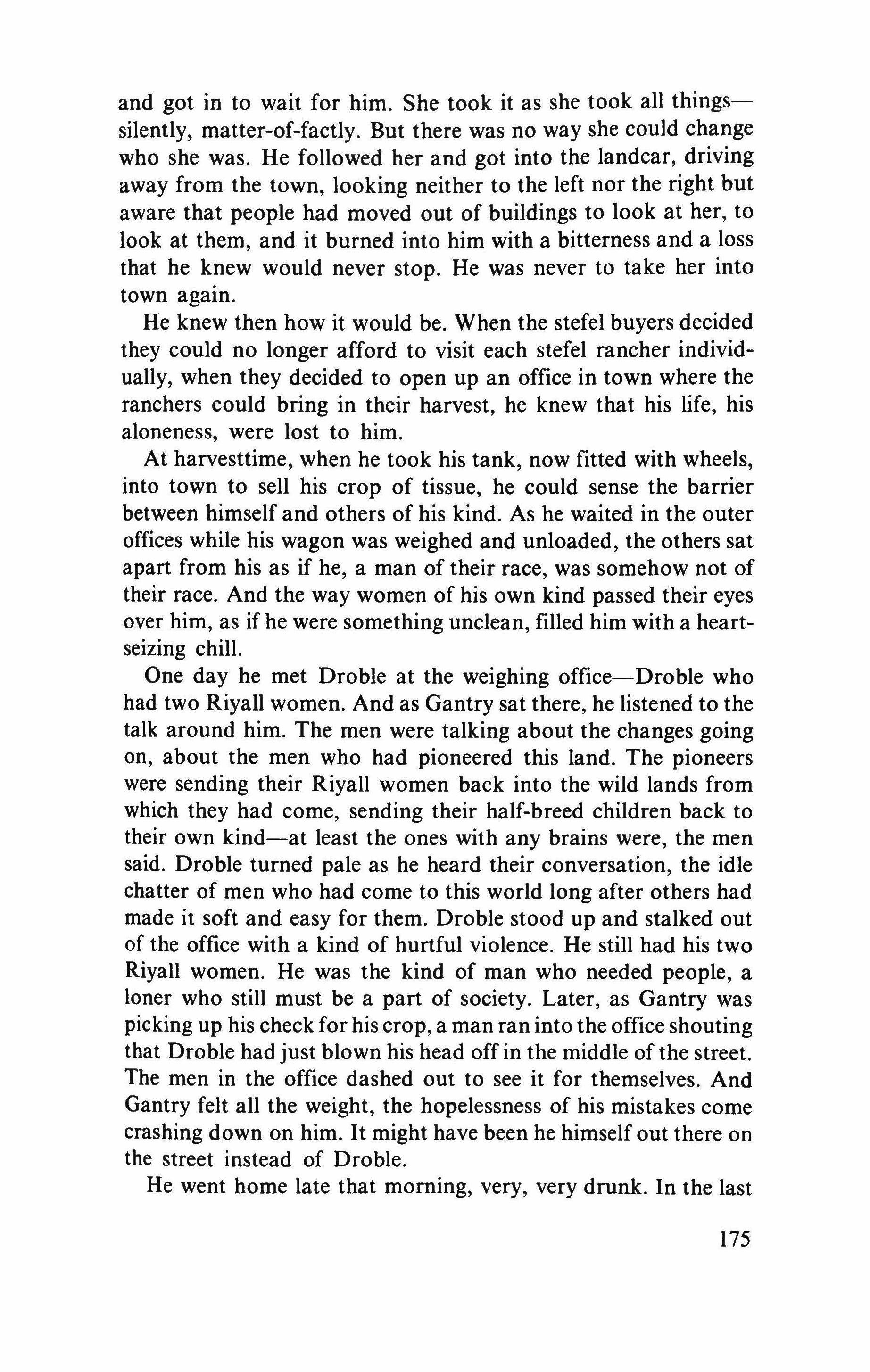
and got in to wait for him. She took it as she took all thingssilently, matter-of-factly. But there was no way she could change who she was. He followed her and got into the landcar, driving away from the town, looking neither to the left nor the right but aware that people had moved out of buildings to look at her, to look at them, and it burned into him with a bitterness and a loss that he knew would never stop. He was never to take her into town again.
He knew then how it would be. When the stefel buyers decided they could no longer afford to visit each stefel rancher individually, when they decided to open up an office in town where the ranchers could bring in their harvest, he knew that his life, his aloneness, were lost to him.
At harvesttime, when he took his tank, now fitted with wheels, into town to sell his crop of tissue, he could sense the barrier between himself and others of his kind. As he waited in the outer offices while his wagon was weighed and unloaded, the others sat apart from his as if he, a man of their race, was somehow not of their race. And the way women of his own kind passed their eyes over him, as if he were something unclean, filled him with a heartseizing chill.
One day he met Droble at the weighing office-Droble who had two Riyall women. And as Gantry sat there, he listened to the talk around him. The men were talking about the changes going on, about the men who had pioneered this land. The pioneers were sending their Riyall women back into the wild lands from which they had come, sending their half-breed children back to their own kind-at least the ones with any brains were, the men said. Droble turned pale as he heard their conversation, the idle chatter of men who had come to this world long after others had made it soft and easy for them. Droble stood up and stalked out of the office with a kind of hurtful violence. He still had his two Riyall women. He was the kind of man who needed people, a loner who still must be a part of society. Later, as Gantry was picking up his check for his crop, a man ran into the office shouting that Droble had just blown his head off in the middle ofthe street. The men in the office dashed out to see it for themselves. And Gantry felt all the weight, the hopelessness of his mistakes come crashing down on him. It might have been he himself out there on the street instead of Droble.
He went home late that morning, very, very drunk. In the last
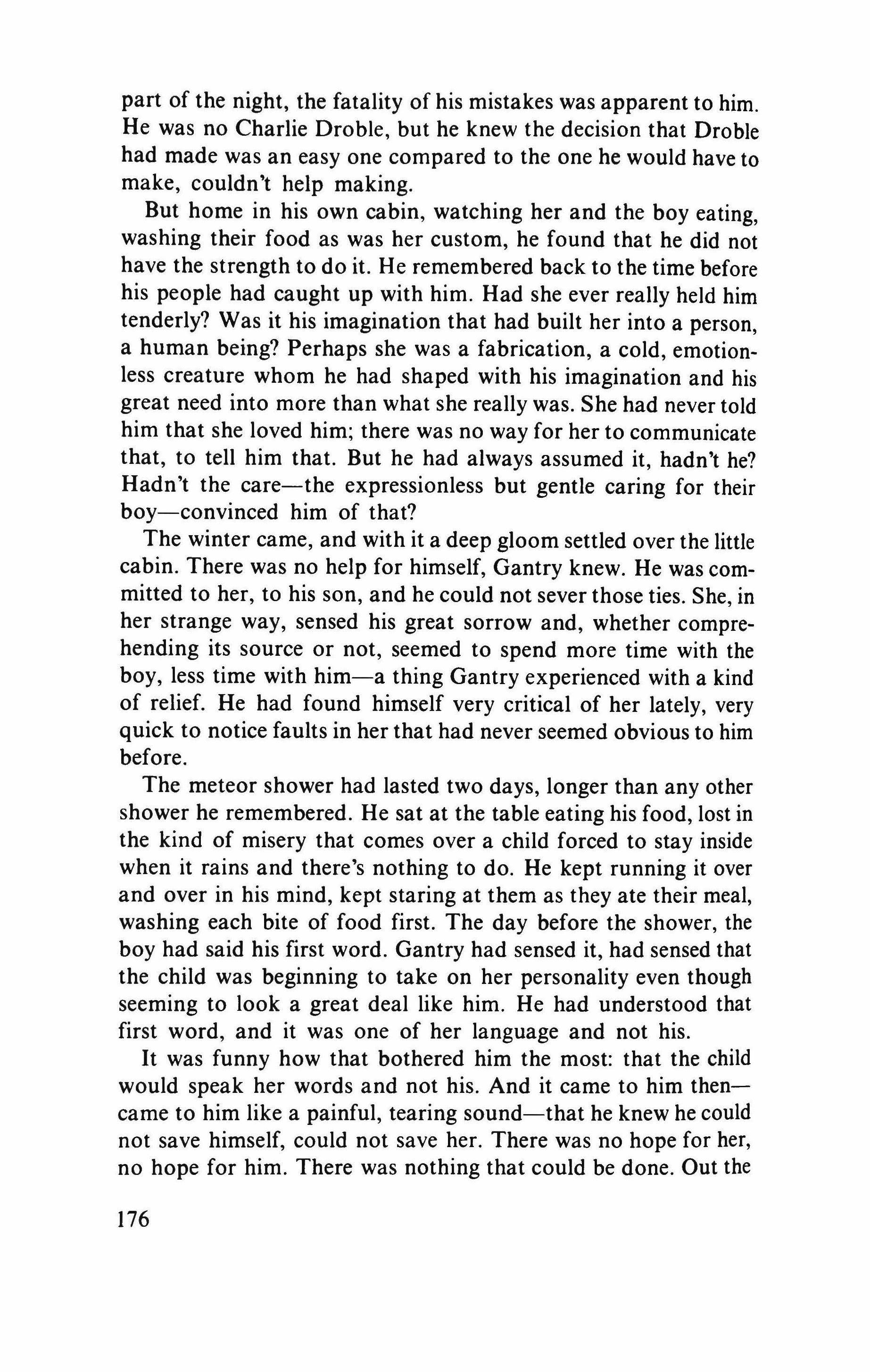
part of the night, the fatality of his mistakes was apparent to him. He was no Charlie Droble, but he knew the decision that Droble had made was an easy one compared to the one he would have to make, couldn't help making.
But home in his own cabin, watching her and the boy eating, washing their food as was her custom, he found that he did not have the strength to do it. He remembered back to the time before his people had caught up with him. Had she ever really held him tenderly? Was it his imagination that had built her into a person, a human being? Perhaps she was a fabrication, a cold, emotionless creature whom he had shaped with his imagination and his great need into more than what she really was. She had never told him that she loved him; there was no way for her to communicate that, to tell him that. But he had always assumed it, hadn't he? Hadn't the care-the expressionless but gentle caring for their boy-convinced him of that?
The winter came, and with it a deep gloom settled over the little cabin. There was no help for himself, Gantry knew. He was committed to her, to his son, and he could not sever those ties. She, in her strange way, sensed his great sorrow and, whether comprehending its source or not, seemed to spend more time with the boy, less time with him-a thing Gantry experienced with a kind of relief. He had found himself very critical of her lately, very quick to notice faults in her that had never seemed obvious to him before.
The meteor shower had lasted two days, longer than any other shower he remembered. He sat at the table eating his food, lost in the kind of misery that comes over a child forced to stay inside when it rains and there's nothing to do. He kept running it over and over in his mind, kept staring at them as they ate their meal, washing each bite of food first. The day before the shower, the boy had said his first word. Gantry had sensed it, had sensed that the child was beginning to take on her personality even though seeming to look a great deal like him. He had understood that first word, and it was one of her language and not his.
It was funny how that bothered him the most: that the child would speak her words and not his. And it came to him thencame to him like a painful, tearing sound-that he knew he could not save himself, could not save her. There was no hope for her, no hope for him. There was nothing that could be done. Out the

window he could see the shells of houses going up at the edge of his land, houses waiting till the summer and the right time to be built. His people had caught up with him.
He got up from the table slowly, his food untouched, and moved toward them. She knew what was to happen and in that unreadable face he found the knowledge of what he was about to do. He lifted the boy away from the mat on the floor and, cradling him against his chest, turned and walked back to the table. She sat motionlessly in the corner and then he knew, he finally knew, that she was capable of emotion, that she had feelings.
He pulled a chair up beside his own, and sat the boy gently down upon it. He turned to her, and without a word she knew that the boy's place would hereafter be at the table-knew it by the sad, unrelenting look on his face.
He took a piece of bread and put it unwashed into the boy's mouth. And then he heard something and turned to look at her. Her face was turned away, her shoulders motionless.
But he heard it again, and this time he knew what it was-that melodious, birdlike sound, the way the creatures of Kingane cried, the sound the creatures of Kingane made when they were dying.
His back was hardened against it, and he would not relent, having made the judgment for the boy. But after the way of his own kind, his shoulders shook and he made a harsh, broken, rasping sound, the way the creatures of Earth cried, the sound the creatures of Earth made when they were dying.
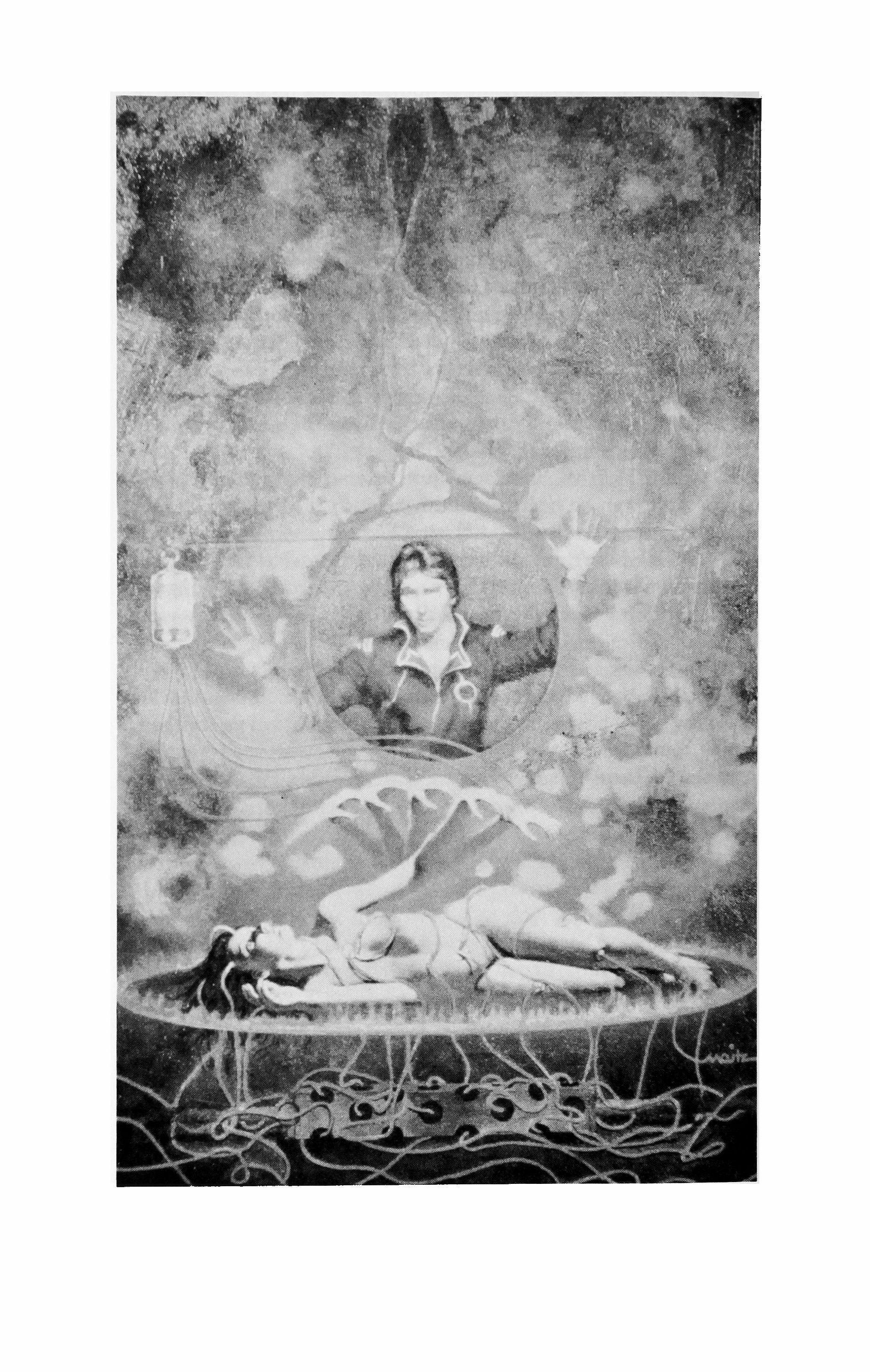
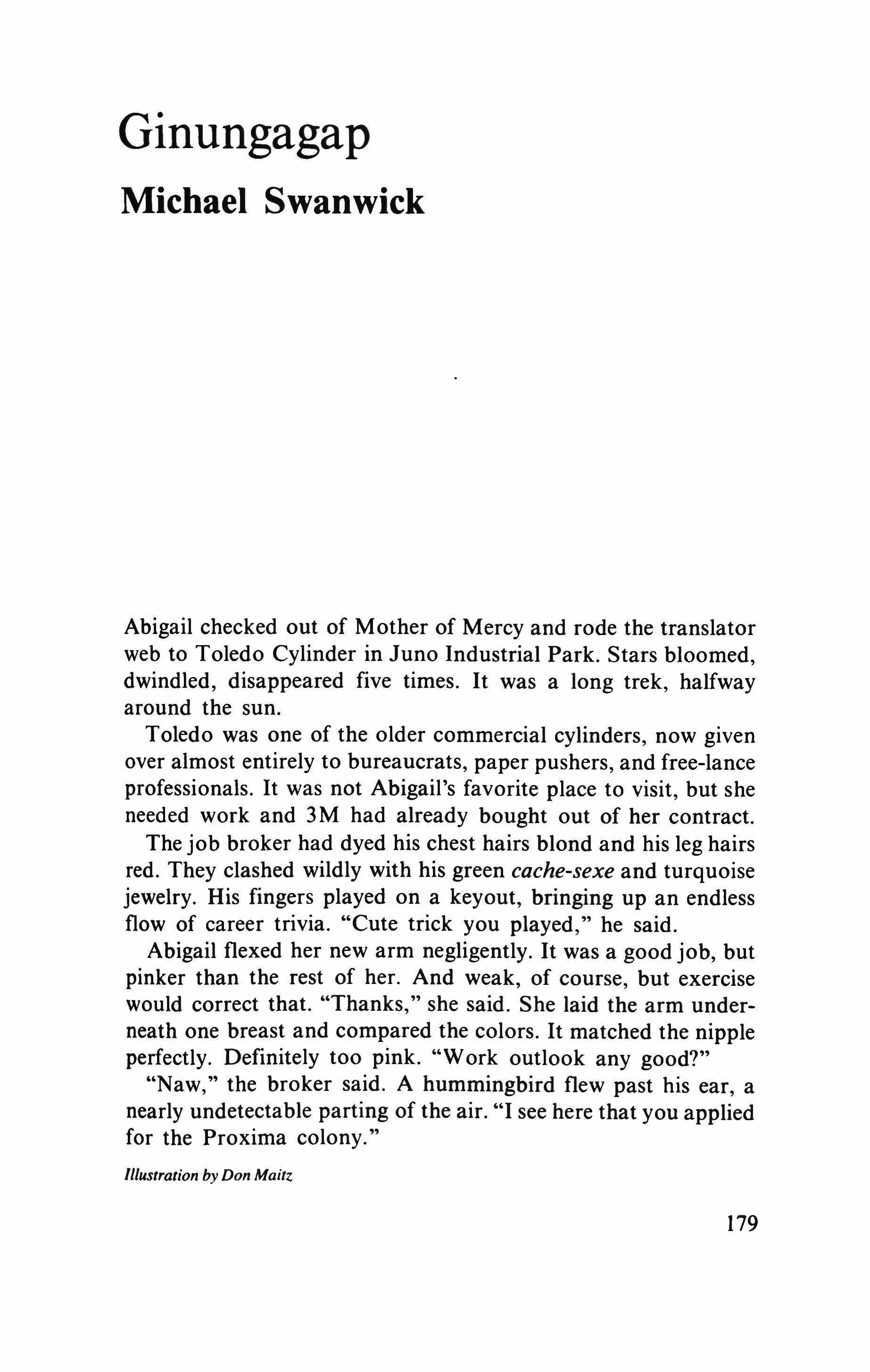
Abigail checked out of Mother of Mercy and rode the translator web to Toledo Cylinder in Juno Industrial Park. Stars bloomed, dwindled, disappeared five times. It was a long trek, halfway around the sun.
Toledo was one of the older commercial cylinders, now given over almost entirely to bureaucrats, paper pushers, and free-lance professionals. It was not Abigail's favorite place to visit, but she needed work and 3 M had already bought out of her contract.
The job broker had dyed his chest hairs blond and his leg hairs red. They clashed wildly with his green cache-sexe and turquoise jewelry. His fingers played on a keyout, bringing up an endless flow of career trivia. "Cute trick you played," he said.
Abigail flexed her new arm negligently. It was a good job, but pinker than the rest of her. And weak, of course, but exercise would correct that. "Thanks," she said. She laid the arm underneath one breast and compared the colors. It matched the nipple perfectly. Definitely too pink. "Work outlook any good?"
"Naw," the broker said. A hummingbird flew past his ear, a nearly undetectable parting of the air. "I see here that you applied for the Proxima colony."
Illustration by Don Mair:
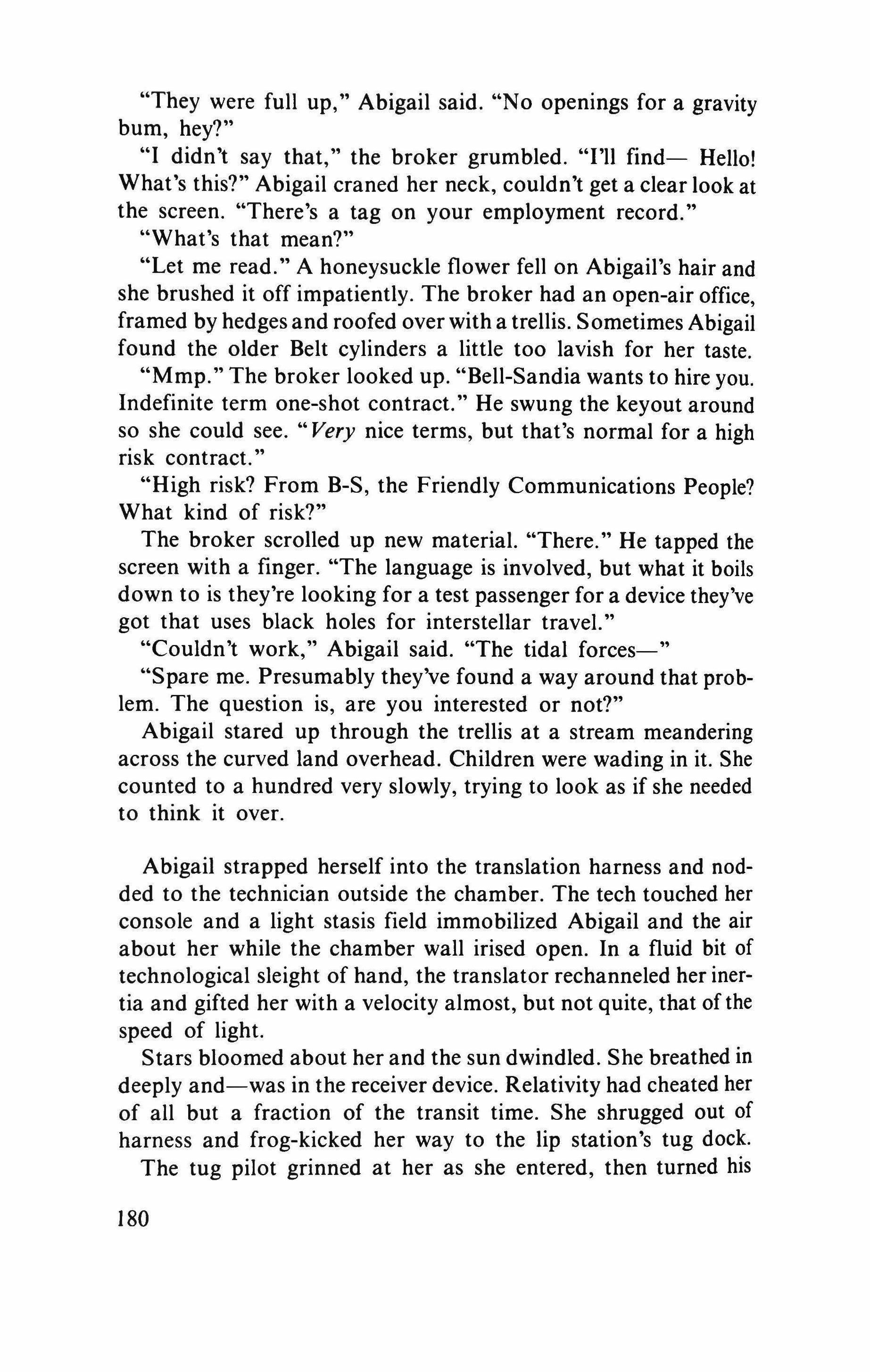
"They were full up," Abigail said. "No openings for a gravity bum, hey?"
"I didn't say that," the broker grumbled. "I'll find- Hello! What's this?" Abigail craned her neck, couldn't get a clear look at the screen. "There's a tag on your employment record."
"What's that mean?"
"Let me read." A honeysuckle flower fell on Abigail's hair and she brushed it off impatiently. The broker had an open-air office, framed by hedges and roofed over with a trellis. Sometimes Abigail found the older Belt cylinders a little too lavish for her taste.
"Mmp." The broker looked up. "Bell-Sandia wants to hire you. Indefinite term one-shot contract." He swung the keyout around so she could see. "Very nice terms, but that's normal for a high risk contract."
"High risk? From B-S, the Friendly Communications People? What kind of risk?"
The broker scrolled up new material. "There." He tapped the screen with a finger. "The language is involved, but what it boils down to is they're looking for a test passenger for a device they've got that uses black holes for interstellar travel."
"Couldn't work," Abigail said. "The tidal forces-" "Spare me. Presumably they've found a way around that problem. The question is, are you interested or not?"
Abigail stared up through the trellis at a stream meandering across the curved land overhead. Children were wading in it. She counted to a hundred very slowly, trying to look as if she needed to think it over.
Abigail strapped herself into the translation harness and nodded to the technician outside the chamber. The tech touched her console and a light stasis field immobilized Abigail and the air about her while the chamber wall irised open. In a fluid bit of technological sleight of hand, the translator rechanneled her inertia and gifted her with a velocity almost, but not quite, that of the speed of light.
Stars bloomed about her and the sun dwindled. She breathed in deeply and-was in the receiver device. Relativity had cheated her of all but a fraction of the transit time. She shrugged out of harness and frog-kicked her way to the lip station's tug dock.
The tug pilot grinned at her as she entered, then turned his
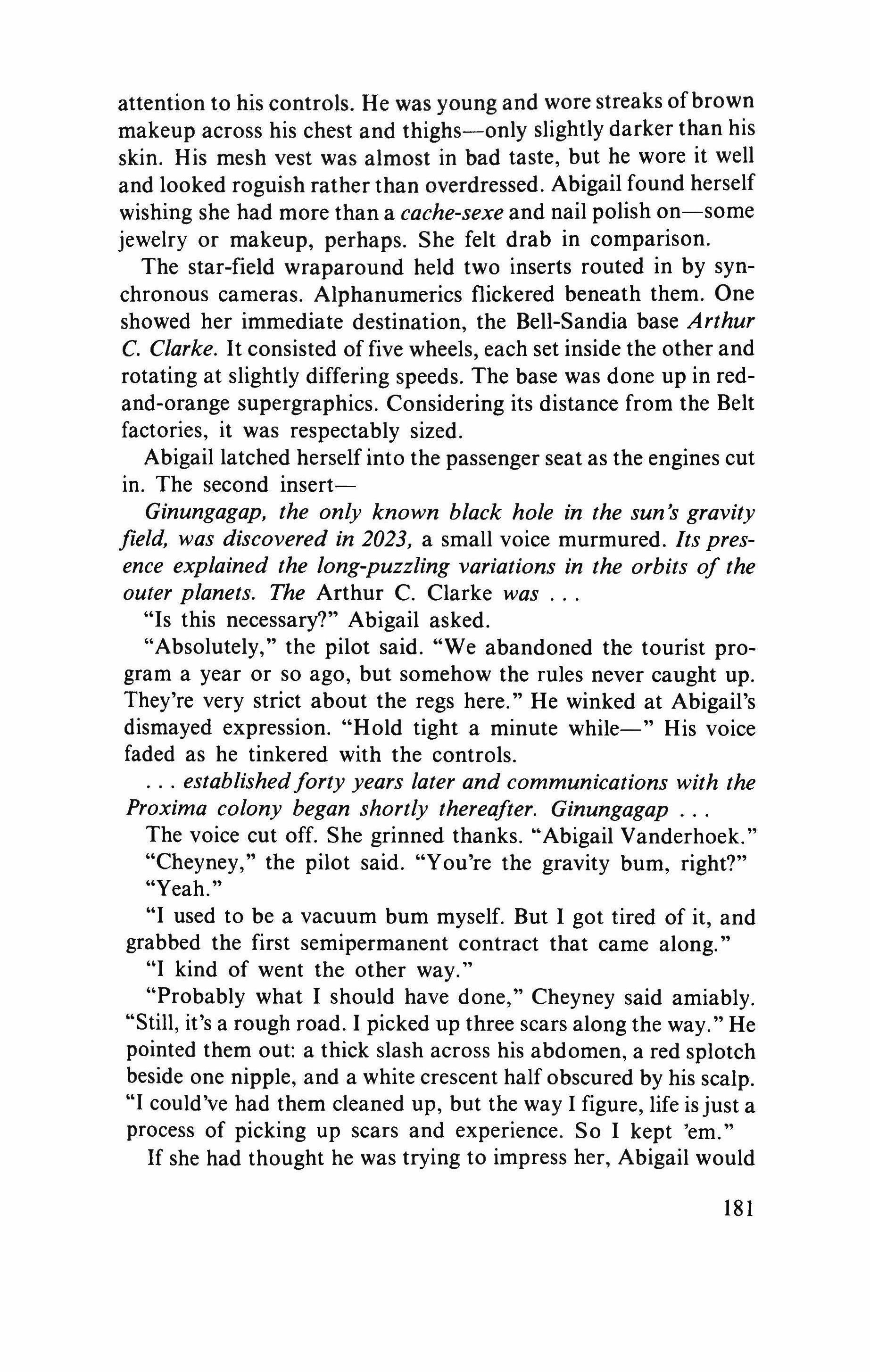
attention to his controls. He was young and wore streaks ofbrown makeup across his chest and thighs-only slightly darker than his skin. His mesh vest was almost in bad taste, but he wore it well and looked roguish rather than overdressed. Abigail found herself wishing she had more than a cache-sexe and nail polish on-some jewelry or makeup, perhaps. She felt drab in comparison.
The star-field wraparound held two inserts routed in by synchronous cameras. Alphanumerics flickered beneath them. One showed her immediate destination, the Bell-Sandia base Arthur C. Clarke. It consisted of five wheels, each set inside the other and rotating at slightly differing speeds. The base was done up in redand-orange supergraphics. Considering its distance from the Belt factories, it was respectably sized.
Abigail latched herself into the passenger seat as the engines cut in. The second insert-
Ginungagap, the only known black hole in the sun s gravity field, was discovered in 2023, a small voice murmured. Its presence explained the long-puzzling variations in the orbits of the outer planets. The Arthur C. Clarke was
"Is this necessary?" Abigail asked.
"Absolutely," the pilot said. "We abandoned the tourist program a year or so ago, but somehow the rules never caught up. They're very strict about the regs here." He winked at Abigail's dismayed expression. "Hold tight a minute while-" His voice faded as he tinkered with the controls establishedforty years later and communications with the Proxima colony began shortly thereafter. Ginungagap
The voice cut off. She grinned thanks. "Abigail Vanderhoek."
"Cheyney," the pilot said. "You're the gravity bum, right?"
"Yeah.
"I used to be a vacuum bum myself. But I got tired of it, and grabbed the first semipermanent contract that came along."
"I kind of went the other way."
"Probably what I should have done," Cheyney said amiably. "Still, it's a rough road. I picked up three scars along the way." He pointed them out: a thick slash across his abdomen, a red splotch beside one nipple, and a white crescent half obscured by his scalp. "I could've had them cleaned up, but the way I figure, life is just a process of picking up scars and experience. So I kept 'em."
If she had thought he was trying to impress her, Abigail would
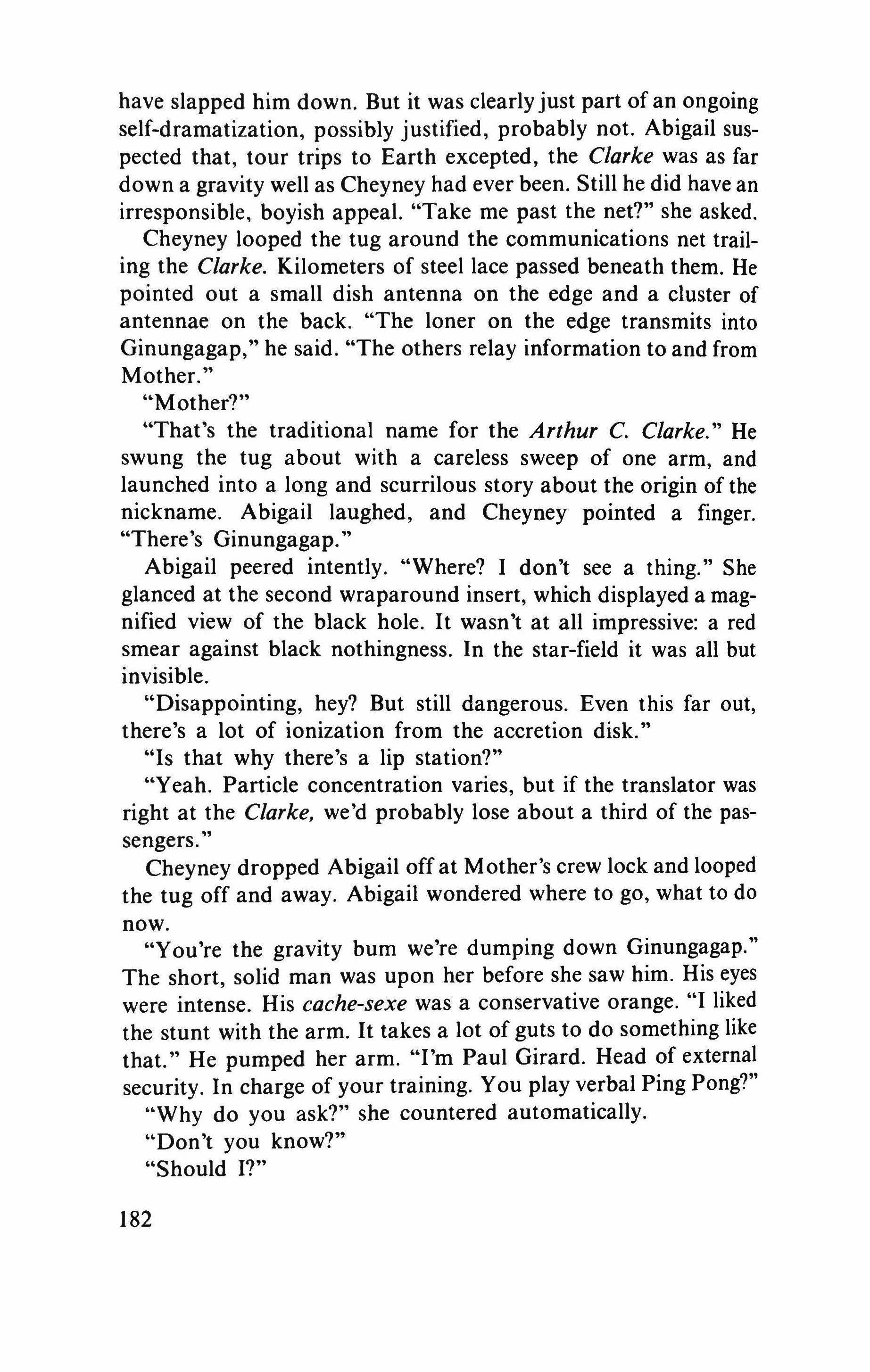
have slapped him down. But it was clearlyjust part of an ongoing self-dramatization, possibly justified, probably not. Abigail suspected that, tour trips to Earth excepted, the Clarke was as far down a gravity well as Cheyney had ever been. Still he did have an irresponsible. boyish appeal. "Take me past the net?" she asked.
Cheyney looped the tug around the communications net trailing the Clarke. Kilometers of steel lace passed beneath them. He pointed out a small dish antenna on the edge and a cluster of antennae on the back. "The loner on the edge transmits into Ginungagap," he said. "The others relay information to and from Mother."
"That's the traditional name for the Arthur C. Clarke." He swung the tug about with a careless sweep of one arm, and launched into a long and scurrilous story about the origin of the nickname. Abigail laughed, and Cheyney pointed a finger. "There's Ginungagap."
Abigail peered intently. "Where? I don't see a thing." She glanced at the second wraparound insert, which displayed a magnified view of the black hole. It wasn't at all impressive: a red smear against black nothingness. In the star-field it was all but invisible.
"Disappointing, hey? But still dangerous. Even this far out, there's a lot of ionization from the accretion disk."
"Is that why there's a lip station?"
"Yeah. Particle concentration varies, but if the translator was right at the Clarke, we'd probably lose about a third of the passengers."
Cheyney dropped Abigail off at Mother's crew lock and looped the tug off and away. Abigail wondered where to go, what to do now.
"You're the gravity bum we're dumping down Ginungagap." The short, solid man was upon her before she saw him. His eyes were intense. His cache-sexe was a conservative orange. "I liked the stunt with the arm. It takes a lot of guts to do something like that." He pumped her arm. "I'm Paul Girard. Head of external security. In charge of your training. You play verbal Ping Pong?"
"Why do you ask?" she countered automatically.
"Don't you know?"
"Should I?" 182
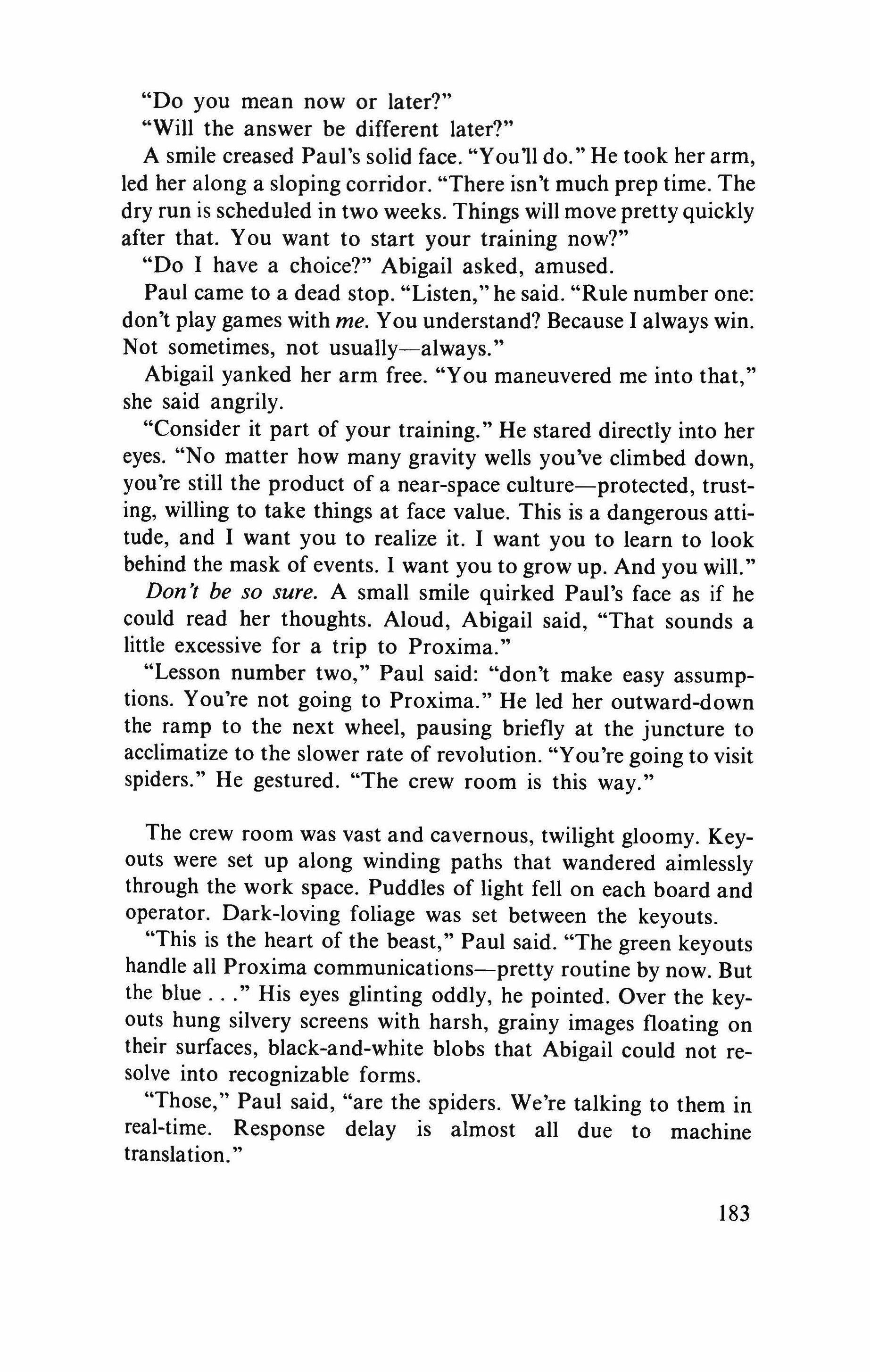
"Do you mean now or later?"
"Will the answer be different later?"
A smile creased Paul's solid face. "You11 do." He took her arm, led her along a sloping corridor. "There isn't much prep time. The dry run is scheduled in two weeks. Things will move pretty quickly after that. You want to start your training now?"
"Do I have a choice?" Abigail asked, amused.
Paul came to a dead stop. "Listen," he said. "Rule number one: don't play games with me. You understand? Because I always win. Not sometimes, not usually-always."
Abigail yanked her arm free. "You maneuvered me into that," she said angrily.
"Consider it part of your training." He stared directly into her eyes. "No matter how many gravity wells you've climbed down, you're still the product of a near-space culture-protected, trusting, willing to take things at face value. This is a dangerous attitude, and I want you to realize it. I want you to learn to look behind the mask of events. I want you to grow up. And you will."
Don't be so sure. A small smile quirked Paul's face as if he could read her thoughts. Aloud, Abigail said, "That sounds a little excessive for a trip to Proxima."
"Lesson number two," Paul said: "don't make easy assumptions. You're not going to Proxima." He led her outward-down the ramp to the next wheel, pausing briefly at the juncture to acclimatize to the slower rate of revolution. "You're going to visit spiders." He gestured. 'The crew room is this way."
The crew room was vast and cavernous, twilight gloomy. Keyouts were set up along winding paths that wandered aimlessly through the work space. Puddles of light fell on each board and operator. Dark-loving foliage was set between the keyouts.
"This is the heart of the beast," Paul said. "The green keyouts handle all Proxima communications-pretty routine by now. But the blue His eyes glinting oddly, he pointed. Over the keyouts hung silvery screens with harsh, grainy images floating on their surfaces, black-and-white blobs that Abigail could not resolve into recognizable forms.
"Those," Paul said, "are the spiders. We're talking to them in real-time. Response delay is almost all due to machine translation.
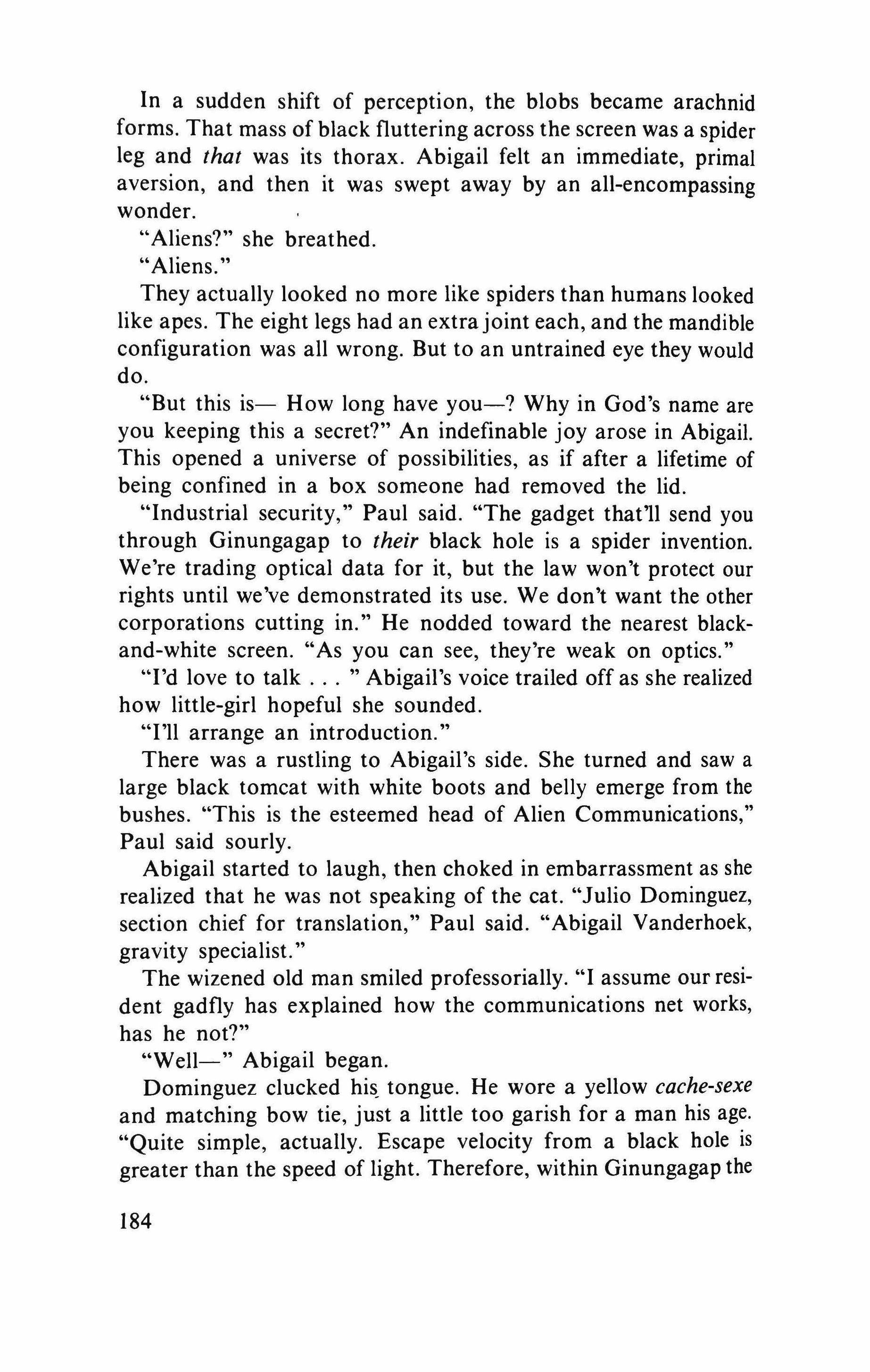
In a sudden shift of perception, the blobs became arachnid forms. That mass of black fluttering across the screen was a spider leg and that was its thorax. Abigail felt an immediate, primal aversion, and then it was swept away by an all-encompassing wonder.
"Aliens?" she breathed.
"Aliens.
They actually looked no more like spiders than humans looked like apes. The eight legs had an extra joint each, and the mandible configuration was all wrong. But to an untrained eye they would do.
"But this is- How long have you-? Why in God's name are you keeping this a secret?" An indefinable joy arose in Abigail. This opened a universe of possibilities, as if after a lifetime of being confined in a box someone had removed the lid.
"Industrial security," Paul said. "The gadget that'll send you through Ginungagap to their black hole is a spider invention. We're trading optical data for it, but the law won't protect our rights until we've demonstrated its use. We don't want the other corporations cutting in." He nodded toward the nearest blackand-white screen. "As you can see, they're weak on optics."
"I'd love to talk Abigail's voice trailed off as she realized how little-girl hopeful she sounded.
"I'll arrange an introduction."
There was a rustling to Abigail's side. She turned and saw a large black tomcat with white boots and belly emerge from the bushes. "This is the esteemed head of Alien Communications," Paul said sourly.
Abigail started to laugh, then choked in embarrassment as she realized that he was not speaking of the cat. "Julio Dominguez, section chief for translation," Paul said. "Abigail Vanderhoek, gravity specialist."
The wizened old man smiled professorially. "I assume our resident gadfly has explained how the communications net works, has he not?"
"Well-" Abigail began.
Dominguez clucked his tongue. He wore a yellow cache-sexe and matching bow tie, just a little too garish for a man his age. "Quite simple, actually. Escape velocity from a black hole is greater than the speed of light. Therefore, within Ginungagap the
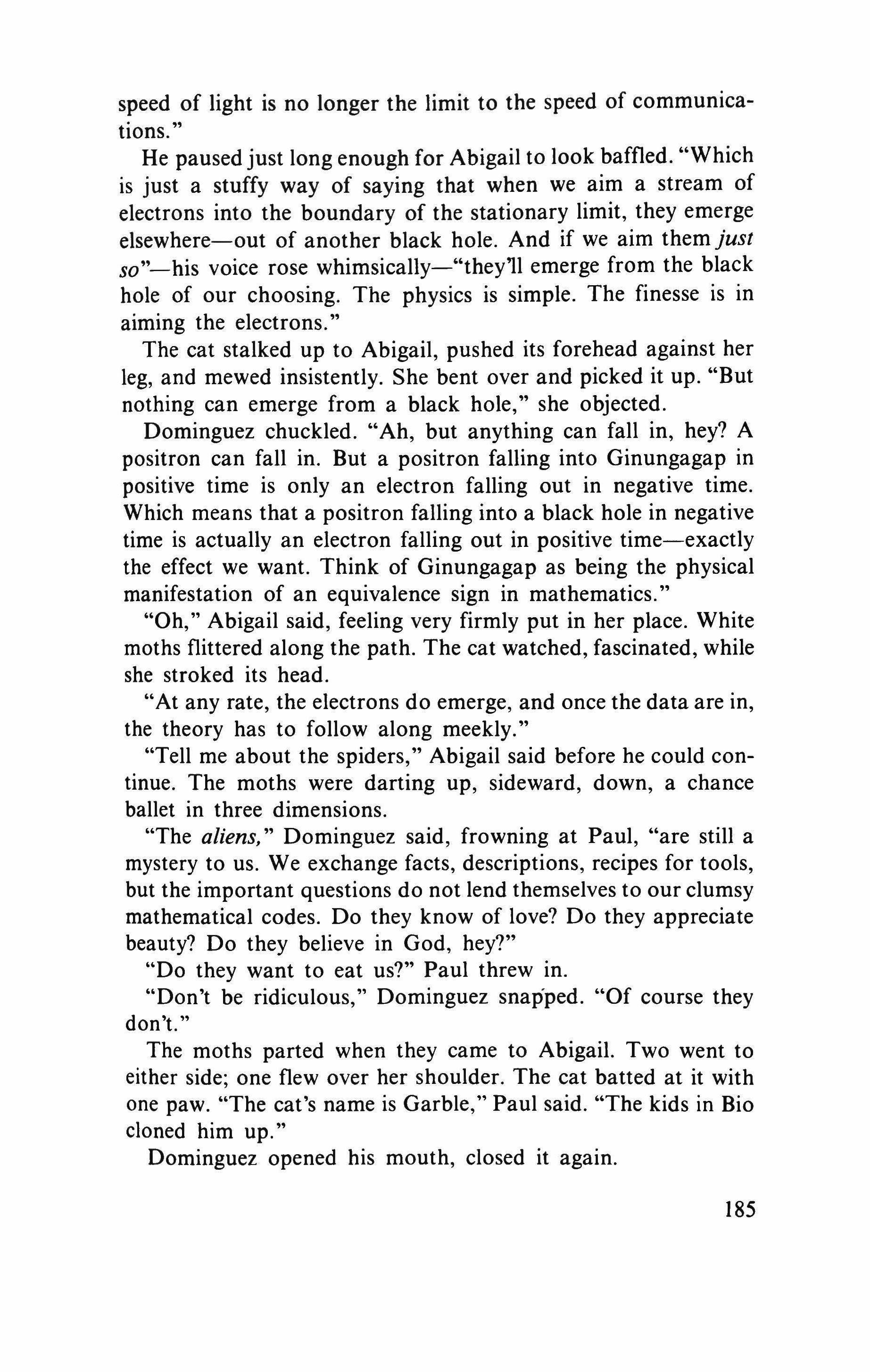
speed of light is no longer the limit to the speed of communications.
He paused just long enough for Abigail to look baffled. "Which is just a stuffy way of saying that when we aim a stream of electrons into the boundary of the stationary limit, they emerge elsewhere-out of another black hole. And if we aim them just so"-his voice rose whimsically-"they11 emerge from the black hole of our choosing. The physics is simple. The finesse is in aiming the electrons."
The cat stalked up to Abigail, pushed its forehead against her leg, and mewed insistently. She bent over and picked it up. "But nothing can emerge from a black hole," she objected.
Dominguez chuckled. "Ah, but anything can fall in, hey? A positron can fall in. But a positron falling into Ginungagap in positive time is only an electron falling out in negative time. Which means that a positron falling into a black hole in negative time is actually an electron falling out in positive time-exactly the effect we want. Think of Ginungagap as being the physical manifestation of an equivalence sign in mathematics."
"Oh," Abigail said, feeling very firmly put in her place. White moths flittered along the path. The cat watched, fascinated, while she stroked its head.
"At any rate, the electrons do emerge, and once the data are in, the theory has to follow along meekly."
"Tell me about the spiders," Abigail said before he could continue. The moths were darting up, sideward, down, a chance ballet in three dimensions.
"The aliens," Dominguez said, frowning at Paul, "are still a mystery to us. We exchange facts, descriptions, recipes for tools, but the important questions do not lend themselves to our clumsy mathematical codes. Do they know of love? Do they appreciate beauty? Do they believe in God, hey?"
"Do they want to eat us?" Paul threw in.
"Don't be ridiculous," Dominguez snapped. "Of course they don't.
The moths parted when they came to Abigail. Two went to either side; one flew over her shoulder. The cat batted at it with one paw. "The eat's name is Garble," Paul said. "The kids in Bio cloned him up."
Dominguez opened his mouth, closed it again.
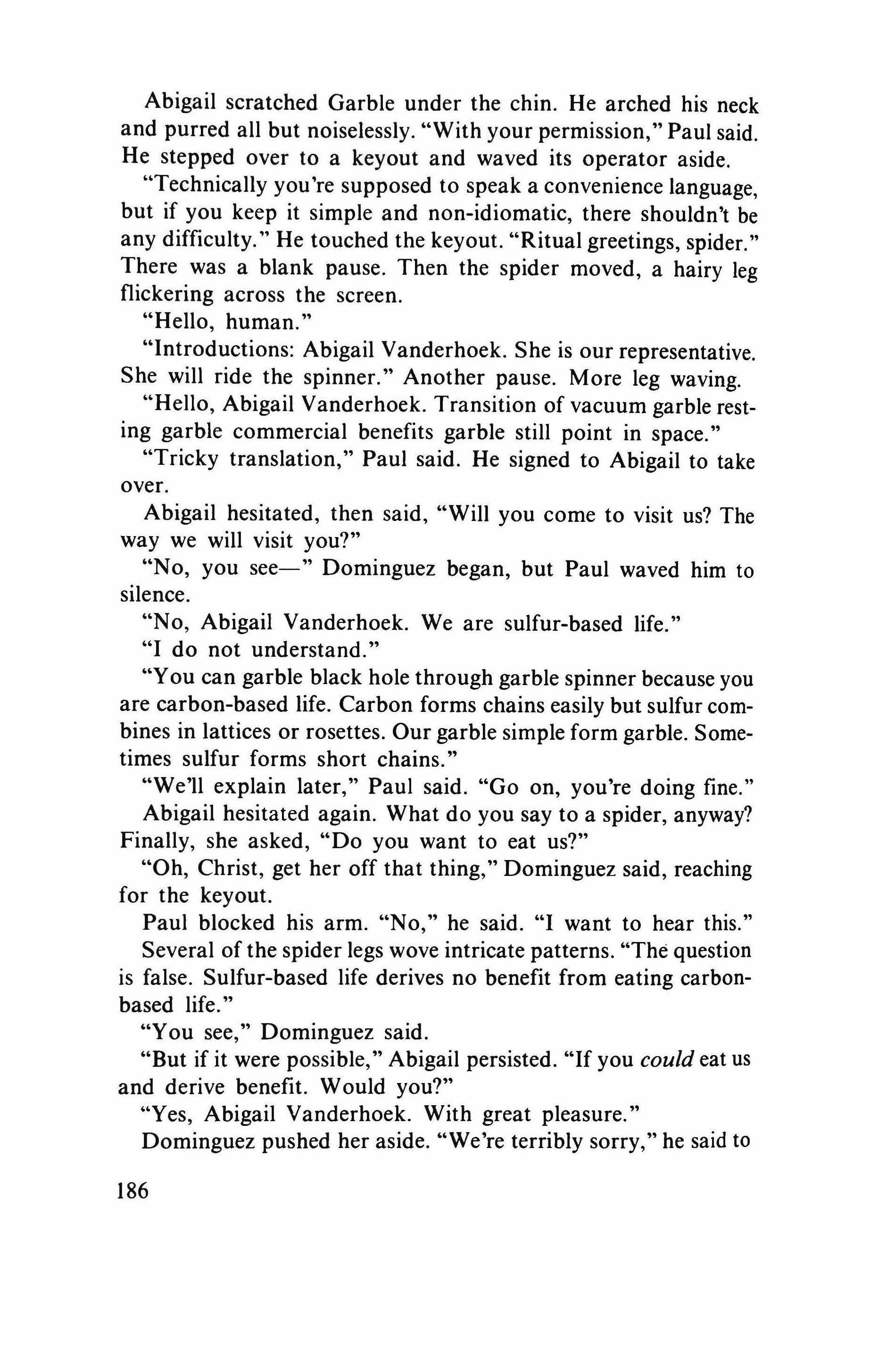
Abigail scratched Garble under the chin. He arched his neck and purred all but noiselessly. "With your permission," Paul said. He stepped over to a keyout and waved its operator aside.
"Technically you're supposed to speak a convenience language, but if you keep it simple and non-idiomatic, there shouldn't be any difficulty." He touched the keyout. "Ritual greetings, spider." There was a blank pause. Then the spider moved, a hairy leg flickering across the screen.
"Hello, human."
"Introductions: Abigail Vanderhoek. She is our representative. She will ride the spinner." Another pause. More leg waving.
"Hello, Abigail Vanderhoek. Transition of vacuum garble resting garble commercial benefits garble still point in space."
"Tricky translation," Paul said. He signed to Abigail to take over.
Abigail hesitated, then said, "Will you come to visit us? The way we will visit you?"
"No, you see-" Dominguez began, but Paul waved him to silence.
"N0, Abigail Vanderhoek. We are sulfur-based life."
"I do not understand."
"Y ou can garble black hole through garble spinner because you are carbon-based life. Carbon forms chains easily but sulfur combines in lattices or rosettes. Our garble simple form garble. Sometimes sulfur forms short chains."
"We'll explain later," Paul said. "Go on, you're doing fine."
Abigail hesitated again. What do you say to a spider, anyway? Finally, she asked, "Do you want to eat us?"
"Oh, Christ, get her off that thing," Dominguez said, reaching for the keyout.
Paul blocked his arm. "No," he said. "I want to hear this."
Several of the spider legs wove intricate patterns. "The question is false. Sulfur-based life derives no benefit from eating carbonbased life."
"You see," Dominguez said.
"But if it were possible," Abigail persisted. "If you could eat us and derive benefit. Would you?"
"Yes, Abigail Vanderhoek. With great pleasure."
Dominguez pushed her aside. "We're terribly sorry," he said to

the alien. "This is a horrible, horrible misunderstanding. You!" he shouted to the operator. "Get back on and clear this mess up."
Paul was grinning wickedly. "Come," he said to Abigail. "We've accomplished enough here for one day."
As they started to walk away, Garble twisted in Abigail's arms and leaped free. He hit the floor on all fours and disappeared into the greenery. "Would they really eat us?" Abigail asked. Then amended it to, "Does that mean they're hostile?"
Paul shrugged. "Maybe they thought we'd be insulted if they didn't offer to eat us." He led her to her quarters. "Tomorrow we start training for real. In the meantime, you might make up a list of all the ways the spiders could hurt us if we set up transportation and they are hostile. Then another list of all the reasons we shouldn't trust them." He paused. "I've done it myself. You'll find that the lists get rather extensive."
Abigail's quarters weren't flashy, but they fit her well. A full star field was routed to the walls, floor, and ceiling, only partially obscured by a trellis inner frame that supported fox-grape vines. Somebody had done research into her tastes.
"Hi." The cheery greeting startled her. She whirled, saw that her hammock was occupied.
Cheyney sat up, swung his legs over the edge of the hammock, causing it to rock lightly. "Come on in." He touched an invisible control and the star field blue-shifted down to a deep, erotic purple.
"Just what do you think you're doing here?" Abigail asked.
"I had a few hours free," Cheyney said, "so I thought I'd drop by and seduce you."
"Well, Cheyney, I appreciate your honesty," Abigail said. "So I won't say no."
"Thank you."
"I'll say maybe some other time. Now get lost. I'm tired."
"Okay." Cheyney hopped down, walked jauntily to the door. He paused. "You said 'Later,' right?"
"I said maybe later."
"Later. Gotcha." He winked and was gone.
Abigail threw herself into the hammock, red-shifted the star field until the universe was a sparse smattering of dying embers.
187
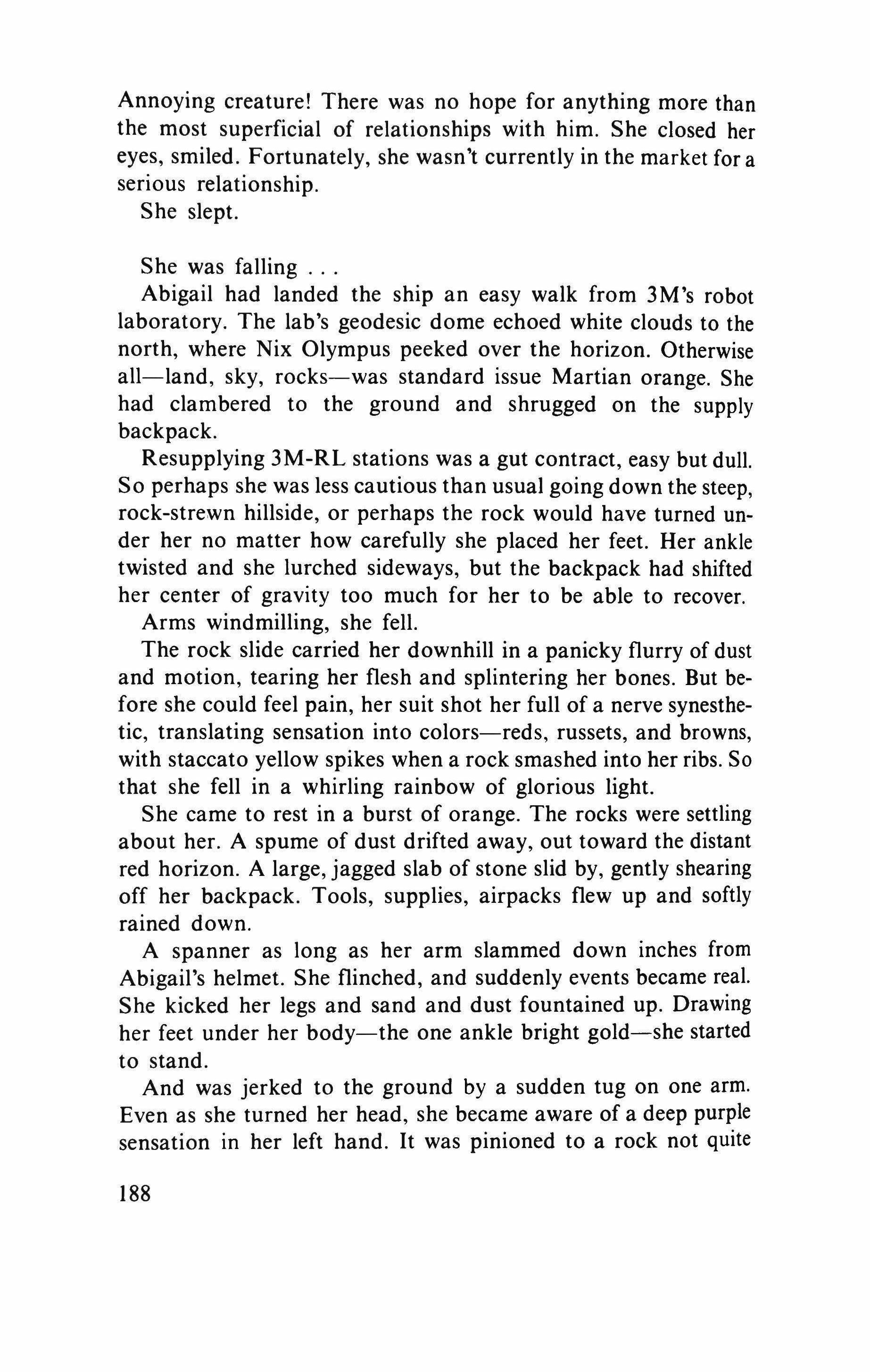
Annoying creature! There was no hope for anything more than the most superficial of relationships with him. She closed her eyes, smiled. Fortunately, she wasn't currently in the market for a serious relationship.
She slept.
She was falling
Abigail had landed the ship an easy walk from 3M's robot laboratory. The lab's geodesic dome echoed white clouds to the north, where Nix Olympus peeked over the horizon. Otherwise all-land, sky, rocks-was standard issue Martian orange. She had clambered to the ground and shrugged on the supply backpack.
Resupplying 3M-RL stations was a gut contract, easy but dull. So perhaps she was less cautious than usual going down the steep, rock-strewn hillside, or perhaps the rock would have turned under her no matter how carefully she placed her feet. Her ankle twisted and she lurched sideways, but the backpack had shifted her center of gravity too much for her to be able to recover.
Arms windmilling, she fell.
The rock slide carried her downhill in a panicky flurry of dust and motion, tearing her flesh and splintering her bones. But before she could feel pain, her suit shot her full of a nerve synesthetic, translating sensation into colors-reds, russets, and browns, with staccato yellow spikes when a rock smashed into her ribs. So that she fell in a whirling rainbow of glorious light.
She came to rest in a burst of orange. The rocks were settling about her. A spume of dust drifted away, out toward the distant red horizon. A large, jagged slab of stone slid by, gently shearing off her backpack. Tools, supplies, airpacks flew up and softly rained down.
A spanner as long as her arm slammed down inches from Abigail's helmet. She flinched, and suddenly events became real. She kicked her legs and sand and dust fountained up. Drawing her feet under her body-the one ankle bright gold-she started to stand.
And was jerked to the ground by a sudden tug on one arm. Even as she turned her head, she became aware of a deep purple sensation in her left hand. It was pinioned to a rock not quite
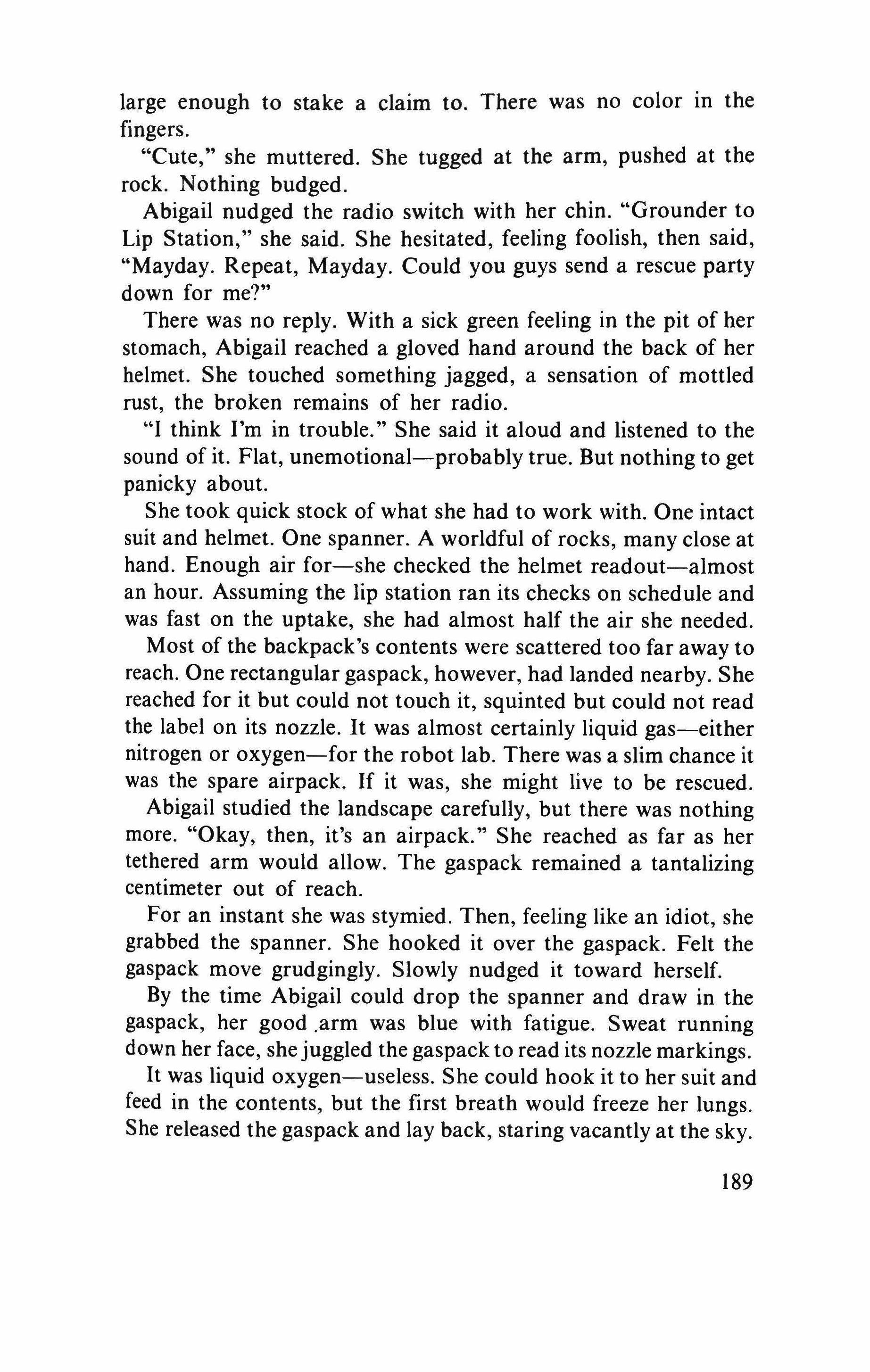
large enough to stake a claim to. There was no color in the fingers.
"Cute," she muttered. She tugged at the arm, pushed at the rock. Nothing budged.
Abigail nudged the radio switch with her chin. "Grounder to Lip Station," she said. She hesitated, feeling foolish, then said, "Mayday. Repeat, Mayday. Could you guys send a rescue party down for me?"
There was no reply. With a sick green feeling in the pit of her stomach, Abigail reached a gloved hand around the back of her helmet. She touched something jagged, a sensation of mottled rust, the broken remains of her radio.
"I think I'm in trouble." She said it aloud and listened to the sound of it. Flat, unemotional-probably true. But nothing to get panicky about.
She took quick stock of what she had to work with. One intact suit and helmet. One spanner. A worldful of rocks, many close at hand. Enough air for-she checked the helmet readout-almost an hour. Assuming the lip station ran its checks on schedule and was fast on the uptake, she had almost half the air she needed.
Most of the backpack's contents were scattered too far away to reach. One rectangular gaspack, however, had landed nearby. She reached for it but could not touch it, squinted but could not read the label on its nozzle. It was almost certainly liquid gas-either nitrogen or oxygen-for the robot lab. There was a slim chance it was the spare airpack. If it was, she might live to be rescued.
Abigail studied the landscape carefully, but there was nothing more. "Okay, then, it's an airpack." She reached as far as her tethered arm would allow. The gaspack remained a tantalizing centimeter out of reach.
For an instant she was stymied. Then, feeling like an idiot, she grabbed the spanner. She hooked it over the gaspack. Felt the gaspack move grudgingly. Slowly nudged it toward herself. By the time Abigail could drop the spanner and draw in the gaspack, her good .arrn was blue with fatigue. Sweat running down her face, she juggled the gaspack to read its nozzle markings. It was liquid oxygen-useless. She could hook it to her suit and feed in the contents, but the first breath would freeze her lungs. She released the gaspack and lay back, staring vacantly at the sky.
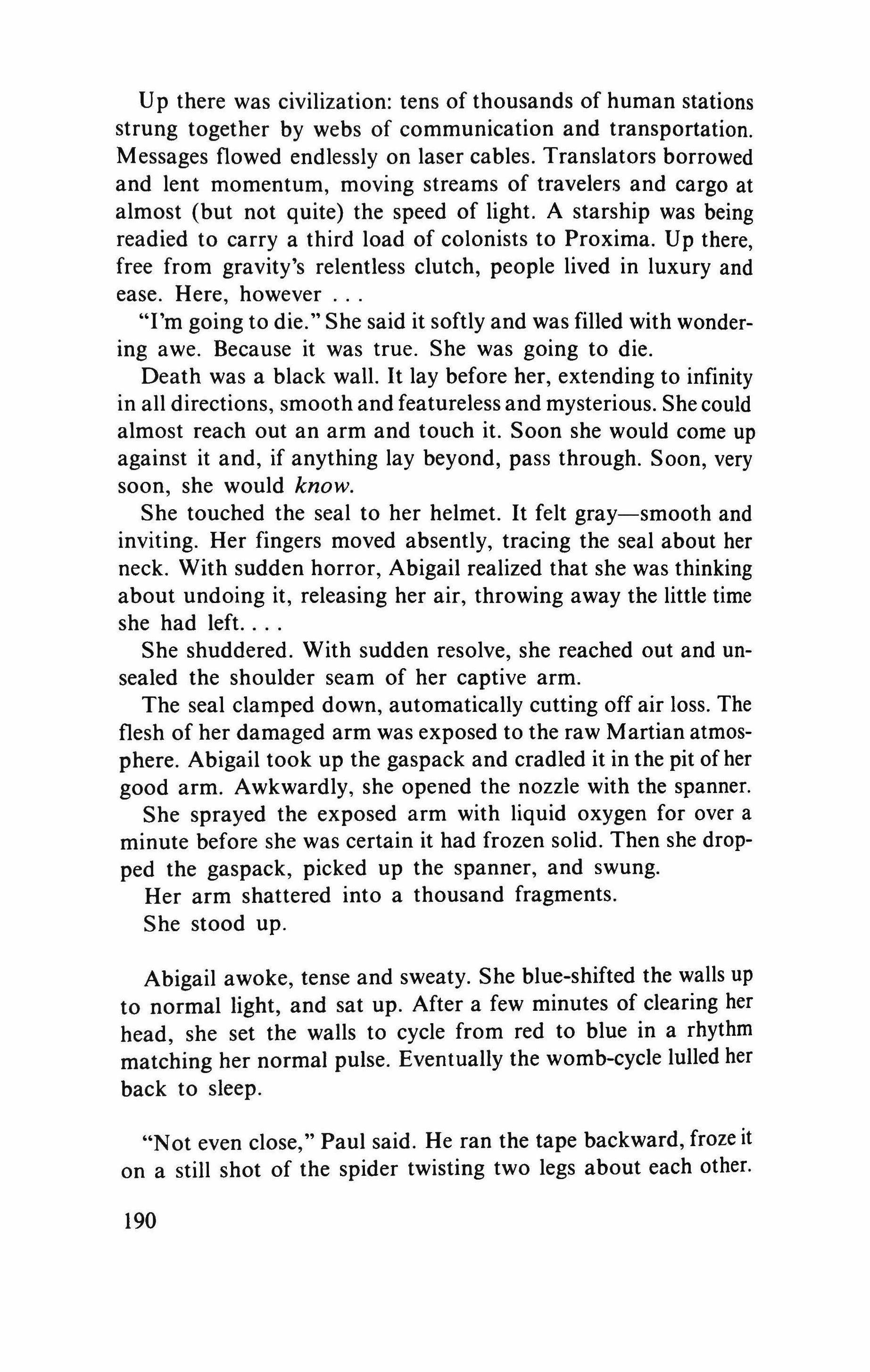
Up there was civilization: tens of thousands of human stations strung together by webs of communication and transportation. Messages flowed endlessly on laser cables. Translators borrowed and lent momentum, moving streams of travelers and cargo at almost (but not quite) the speed of light. A starship was being readied to carry a third load of colonists to Proxima. Up there, free from gravity's relentless clutch, people lived in luxury and ease. Here, however
"I'm going to die." She said it softly and was filled with wondering awe. Because it was true. She was going to die.
Death was a black wall. It lay before her, extending to infinity in all directions, smooth and featureless and mysterious. She could almost reach out an arm and touch it. Soon she would come up against it and, if anything lay beyond, pass through. Soon, very soon, she would know.
She touched the seal to her helmet. It felt gray-smooth and inviting. Her fingers moved absently, tracing the seal about her neck. With sudden horror, Abigail realized that she was thinking about undoing it, releasing her air, throwing away the little time she had left.
She shuddered. With sudden resolve, she reached out and unsealed the shoulder seam of her captive arm.
The seal clamped down, automatically cutting off air loss. The flesh of her damaged arm was exposed to the raw Martian atmosphere. Abigail took up the gaspack and cradled it in the pit of her good arm. Awkwardly, she opened the nozzle with the spanner.
She sprayed the exposed arm with liquid oxygen for over a minute before she was certain it had frozen solid. Then she dropped the gaspack, picked up the spanner, and swung.
Her arm shattered into a thousand fragments.
She stood up.
Abigail awoke, tense and sweaty. She blue-shifted the walls up to normal light, and sat up. After a few minutes of clearing her head, she set the walls to cycle from red to blue in a rhythm matching her normal pulse. Eventually the womb-cycle lulled her back to sleep.
"Not even close," Paul said. He ran the tape backward, froze it on a still shot of the spider twisting two legs about each other.
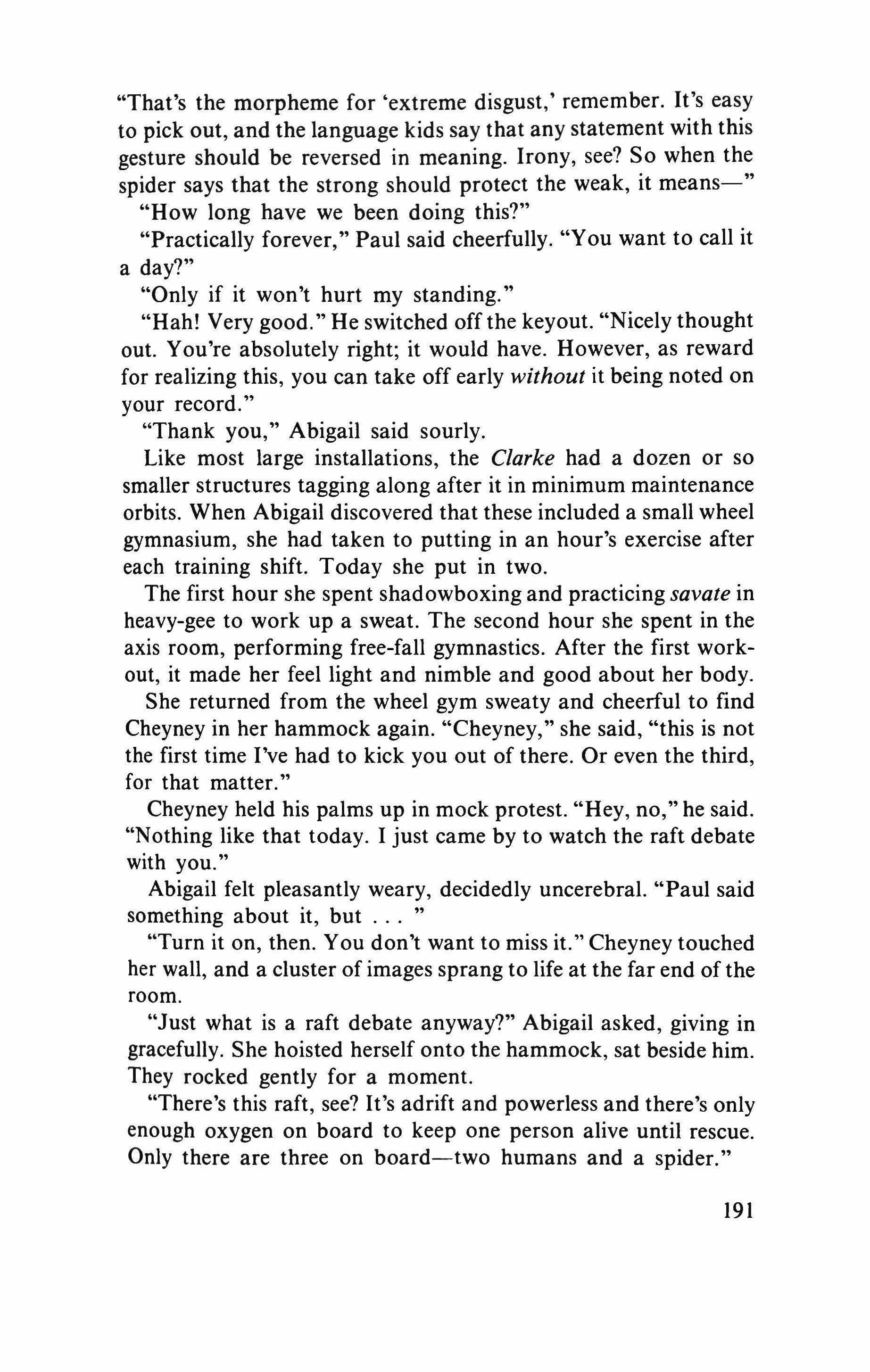
"That's the morpheme for 'extreme disgust,' remember. It's easy to pick out, and the language kids say that any statement with this gesture should be reversed in meaning. Irony, see? So when the spider says that the strong should protect the weak, it means-"
"How long have we been doing this?"
"Practically forever," Paul said cheerfully. "You want to call it a day?"
"Only if it won't hurt my standing."
"Hah! Very good." He switched off the keyout. "Nicely thought out. You're absolutely right; it would have. However, as reward for realizing this, you can take off early without it being noted on your record."
"Thank you," Abigail said sourly.
Like most large installations, the Clarke had a dozen or so smaller structures tagging along after it in minimum maintenance orbits. When Abigail discovered that these included a small wheel gymnasium, she had taken to putting in an hour's exercise after each training shift. Today she put in two.
The first hour she spent shadowboxing and practicing savate in heavy-gee to work up a sweat. The second hour she spent in the axis room, performing free-fall gymnastics. After the first workout, it made her feel light and nimble and good about her body.
She returned from the wheel gym sweaty and cheerful to find Cheyney in her hammock again. "Cheyney," she said, "this is not the first time I've had to kick you out of there. Or even the third, for that matter."
Cheyney held his palms up in mock protest. "Hey, no," he said. "Nothing like that today. I just came by to watch the raft debate with you."
Abigail felt pleasantly weary, decidedly uncerebral. "Paul said something about it, but
"Turn it on, then. You don't want to miss it." Cheyney touched her wall, and a cluster of images sprang to life at the far end of the room.
"Just what is a raft debate anyway?" Abigail asked, giving in gracefully. She hoisted herself onto the hammock, sat beside him. They rocked gently for a moment.
"There's this raft, see? It's adrift and powerless and there's only enough oxygen on board to keep one person alive until rescue. Only there are three on board-two humans and a spider."
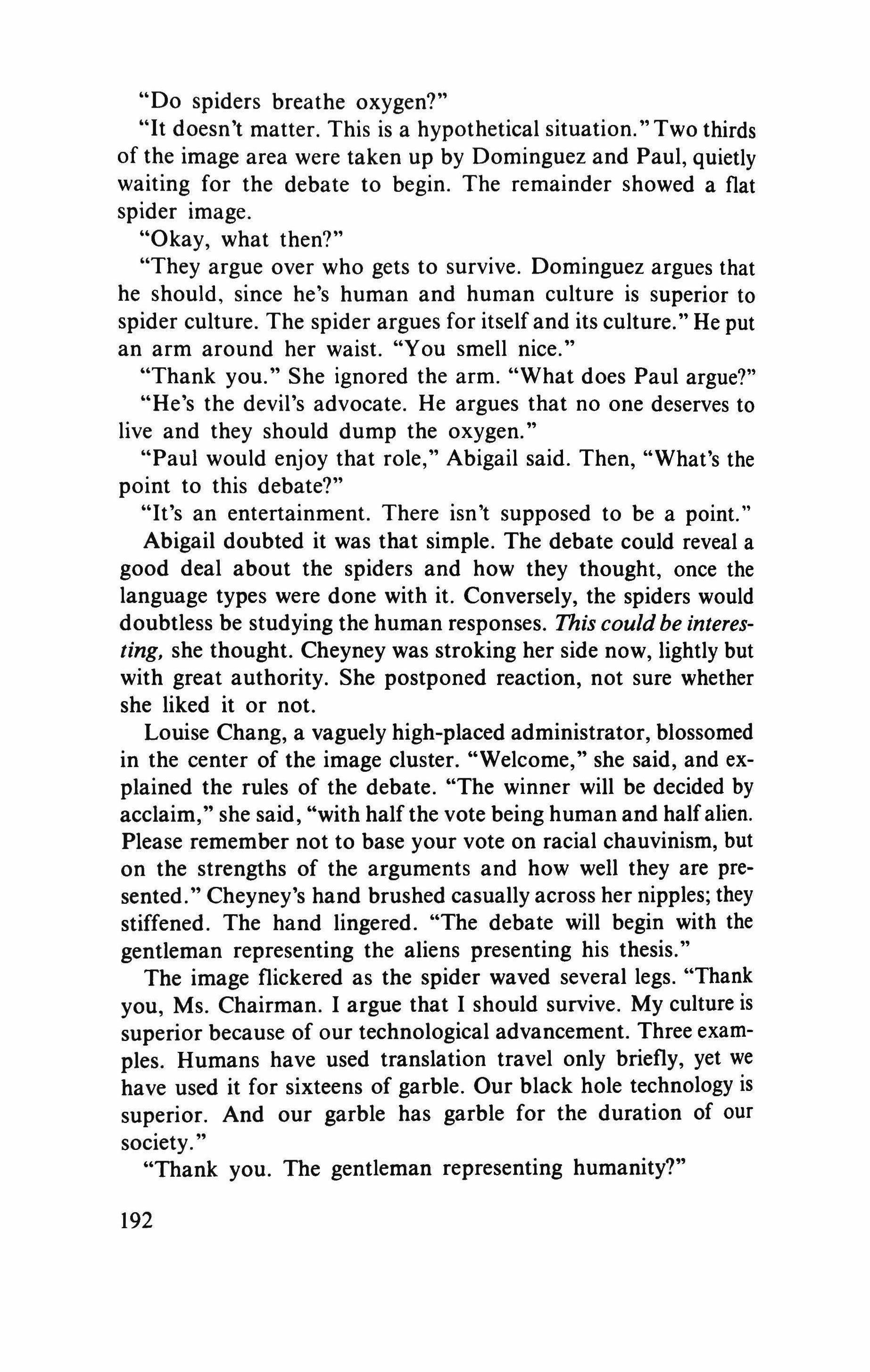
"Do spiders breathe oxygen?"
"It doesn't matter. This is a hypothetical situation." Two thirds of the image area were taken up by Dominguez and Paul, quietly waiting for the debate to begin. The remainder showed a flat spider image.
"Okay, what then?"
"They argue over who gets to survive. Dominguez argues that he should, since he's human and human culture is superior to spider culture. The spider argues for itself and its culture." He put an arm around her waist. "You smell nice."
"Thank you." She ignored the arm. "What does Paul argue?"
"He's the devil's advocate. He argues that no one deserves to live and they should dump the oxygen."
"Paul would enjoy that role," Abigail said. Then, "What's the point to this debate?"
"It's an entertainment. There isn't supposed to be a point."
Abigail doubted it was that simple. The debate could reveal a good deal about the spiders and how they thought, once the language types were done with it. Conversely, the spiders would doubtless be studying the human responses. This could be interesting, she thought. Cheyney was stroking her side now, lightly but with great authority. She postponed reaction, not sure whether she liked it or not.
Louise Chang, a vaguely high-placed administrator, blossomed in the center of the image cluster. "Welcome," she said, and explained the rules of the debate. "The winner will be decided by acclaim," she said, "with half the vote being human and halfalien. Please remember not to base your vote on racial chauvinism, but on the strengths of the arguments and how well they are presented." Cheyney's hand brushed casually across her nipples; they stiffened. The hand lingered. "The debate will begin with the gentleman representing the aliens presenting his thesis."
The image flickered as the spider waved several legs. "Thank you, Ms. Chairman. I argue that I should survive. My culture is superior because of our technological advancement. Three examples. Humans have used translation travel only briefly, yet we have used it for sixteens of garble. Our black hole technology is superior. And our garble has garble for the duration of our society.
"Thank you. The gentleman representing humanity?"
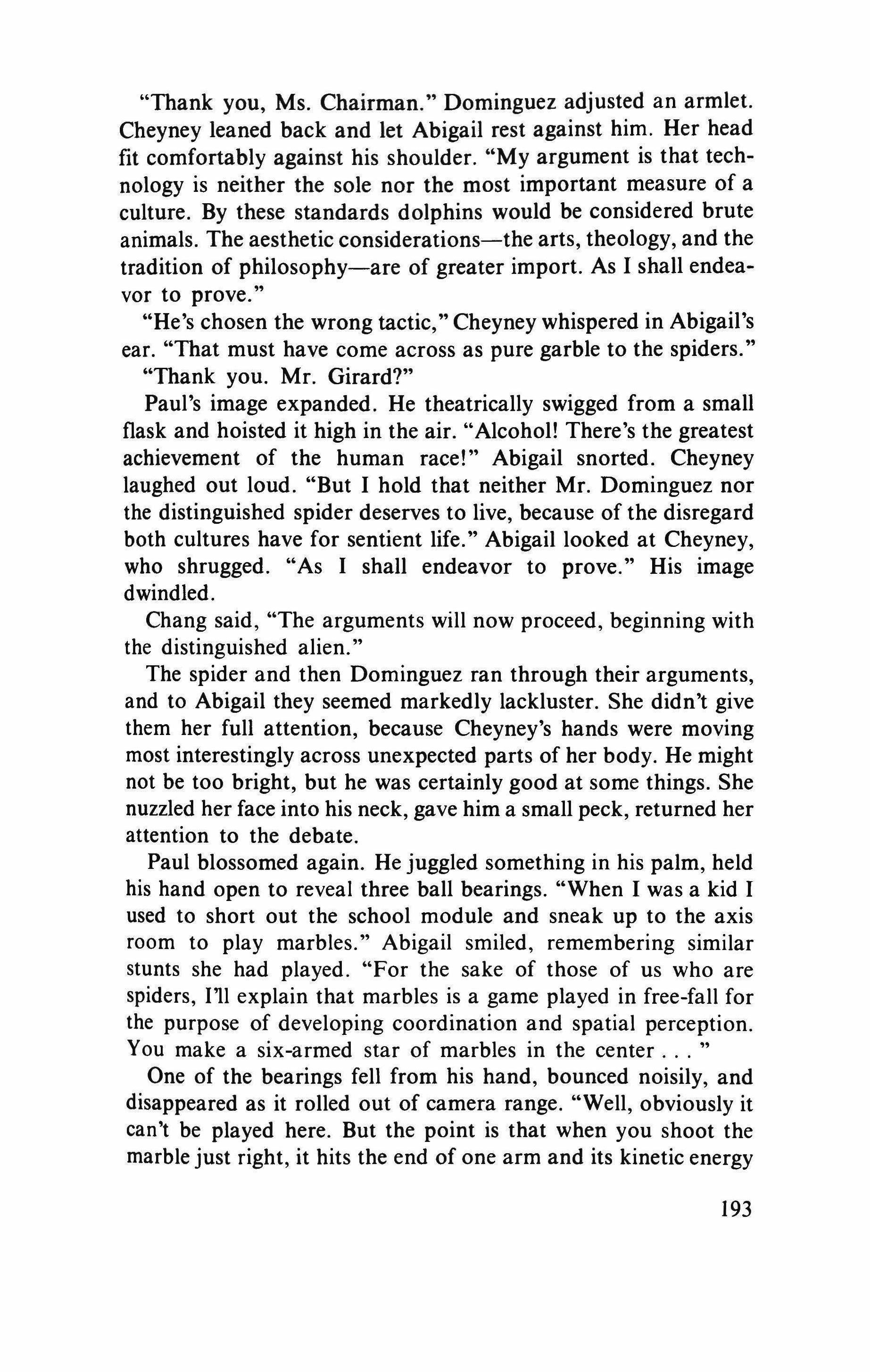
"Thank you, Ms. Chairman." Dominguez adjusted an armlet. Cheyney leaned back and let Abigail rest against him. Her head fit comfortably against his shoulder. "My argument is that technology is neither the sole nor the most important measure of a culture. By these standards dolphins would be considered brute animals. The aesthetic considerations-the arts, theology, and the tradition of philosophy-are of greater import. As I shall endeavor to prove."
"He's chosen the wrong tactic," Cheyney whispered in Abigail's ear. "That must have come across as pure garble to the spiders."
"Thank you. Mr. Girard?"
Paul's image expanded. He theatrically swigged from a small flask and hoisted it high in the air. "Alcohol! There's the greatest achievement of the human race!" Abigail snorted. Cheyney laughed out loud. "But I hold that neither Mr. Dominguez nor the distinguished spider deserves to live, because of the disregard both cultures have for sentient life." Abigail looked at Cheyney, who shrugged. "As I shall endeavor to prove." His image dwindled.
Chang said, "The arguments will now proceed, beginning with the distinguished alien."
The spider and then Dominguez ran through their arguments, and to Abigail they seemed markedly lackluster. She didn't give them her full attention, because Cheyney's hands were moving most interestingly across unexpected parts of her body. He might not be too bright, but he was certainly good at some things. She nuzzled her face into his neck, gave him a small peck, returned her attention to the debate.
Paul blossomed again. He juggled something in his palm, held his hand open to reveal three ball bearings. "When I was a kid I used to short out the school module and sneak up to the axis room to play marbles." Abigail smiled, remembering similar stunts she had played. "For the sake of those of us who are spiders, 111 explain that marbles is a game played in free-fall for the purpose of developing coordination and spatial perception. You make a six-armed star of marbles in the center "
One of the bearings fell from his hand, bounced noisily, and disappeared as it rolled out of camera range. "Well, obviously it can't be played here. But the point is that when you shoot the marble just right, it hits the end of one arm and its kinetic energy
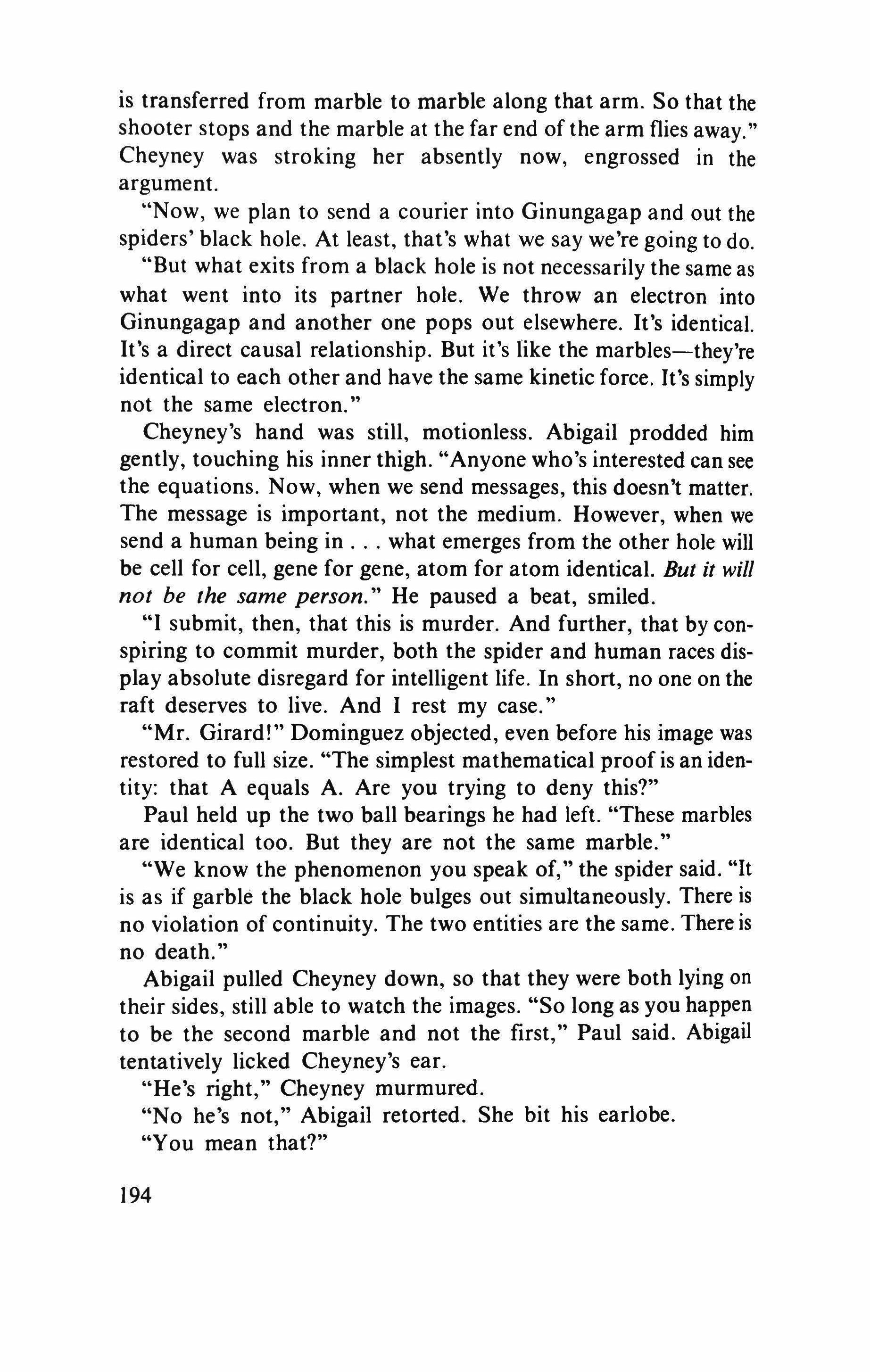
is transferred from marble to marble along that arm. So that the shooter stops and the marble at the far end of the arm flies away."
Cheyney was stroking her absently now, engrossed in the argument.
"Now, we plan to send a courier into Ginungagap and out the spiders' black hole. At least, that's what we say we're going to do.
"But what exits from a black hole is not necessarily the same as what went into its partner hole. We throw an electron into Ginungagap and another one pops out elsewhere. It's identical. It's a direct causal relationship. But it's like the marbles-they're identical to each other and have the same kinetic force. It's simply not the same electron."
Cheyney's hand was still, motionless. Abigail prodded him gently, touching his inner thigh. "Anyone who's interested can see the equations. Now, when we send messages, this doesn't matter. The message is important, not the medium. However, when we send a human being in what emerges from the other hole will be cell for cell, gene for gene, atom for atom identical. But it will not be the same person." He paused a beat, smiled.
"I submit, then, that this is murder. And further, that by conspiring to commit murder, both the spider and human races display absolute disregard for intelligent life. In short, no one on the raft deserves to live. And I rest my case."
"Mr. Girard!" Dominguez objected, even before his image was restored to full size. "The simplest mathematical proof is an identity: that A equals A. Are you trying to deny this?"
Paul held up the two ball bearings he had left. "These marbles are identical too. But they are not the same marble."
"We know the phenomenon you speak of," the spider said. "It is as if garble the black hole bulges out simultaneously. There is no violation of continuity. The two entities are the same. There is no death."
Abigail pulled Cheyney down, so that they were both lying on their sides, still able to watch the images. "So long as you happen to be the second marble and not the first," Paul said. Abigail tentatively licked Cheyney's ear.
"He's right," Cheyney murmured.
"No he's not," Abigail retorted. She bit his earlobe.
"You mean that?"
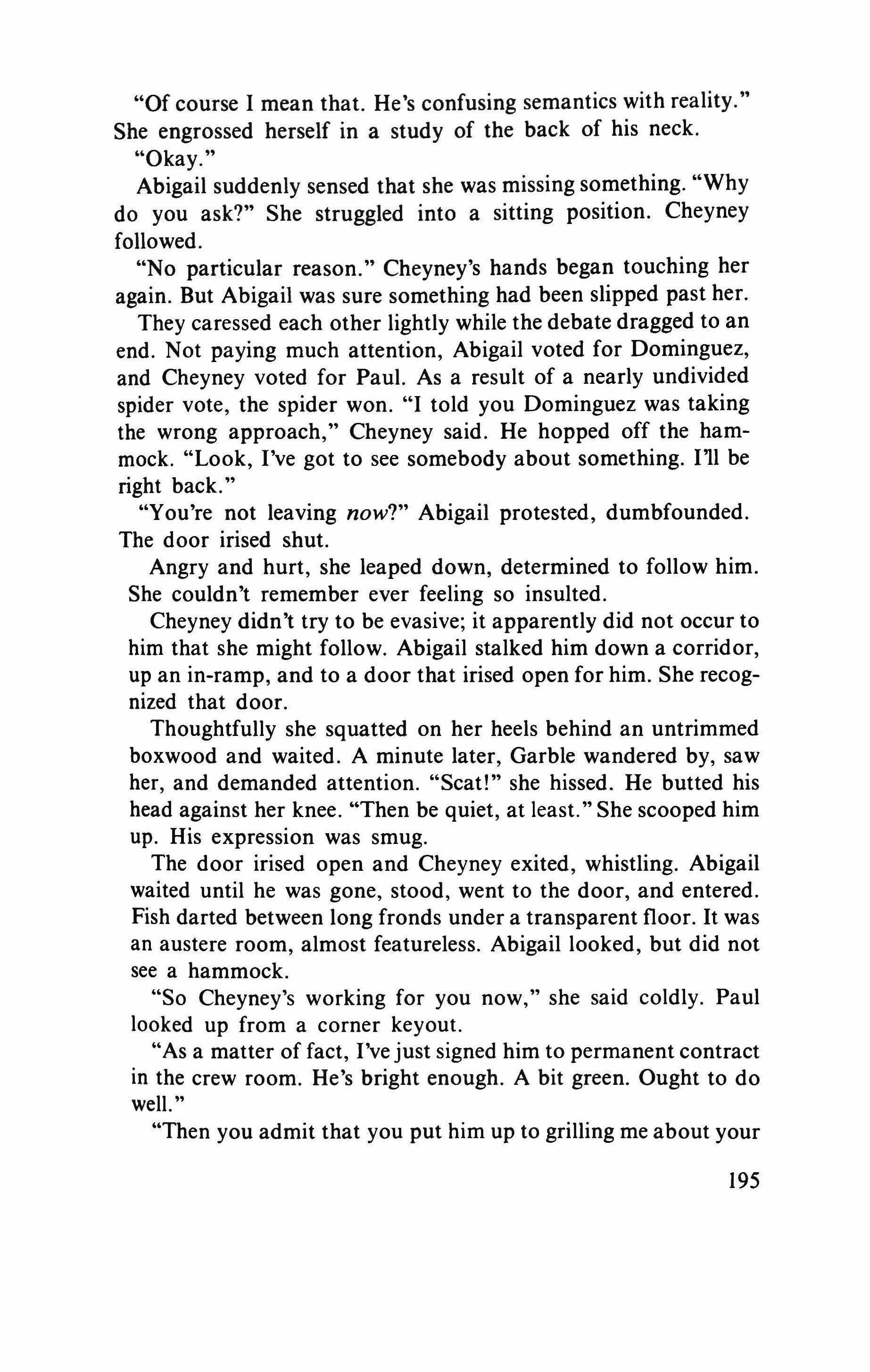
"Of course 1 mean that. He's confusing semantics with reality." She engrossed herself in a study of the back of his neck.
Abigail suddenly sensed that she was missing something. "Why do you ask?" She struggled into a sitting position. Cheyney followed.
"No particular reason." Cheyney's hands began touching her again. But Abigail was sure something had been slipped past her. They caressed each other lightly while the debate dragged to an end. Not paying much attention, Abigail voted for Dominguez, and Cheyney voted for Paul. As a result of a nearly undivided spider vote, the spider won. "I told you Dominguez was taking the wrong approach," Cheyney said. He hopped off the hammock. "Look, I've got to see somebody about something. I'll be right back."
"You're not leaving now?" Abigail protested, dumbfounded. The door irised shut.
Angry and hurt, she leaped down, determined to follow him. She couldn't remember ever feeling so insulted. Cheyney didn't try to be evasive; it apparently did not occur to him that she might follow. Abigail stalked him down a corridor, up an in-ramp, and to a door that irised open for him. She recognized that door.
Thoughtfully she squatted on her heels behind an untrimmed boxwood and waited. A minute later, Garble wandered by, saw her, and demanded attention. "Scat!" she hissed. He butted his head against her knee. "Then be quiet, at least." She scooped him up. His expression was smug.
The door irised open and Cheyney exited, whistling. Abigail waited until he was gone, stood, went to the door, and entered. Fish darted between long fronds under a transparent floor. It was an austere room, almost featureless. Abigail looked, but did not see a hammock.
"So Cheyney's working for you now," she said coldly. Paul looked up from a corner keyout.
"As a matter of fact, I've just signed him to permanent contract in the crew room. He's bright enough. A bit green. Ought to do well.
"Then you admit that you put him up to grilling me about your 195
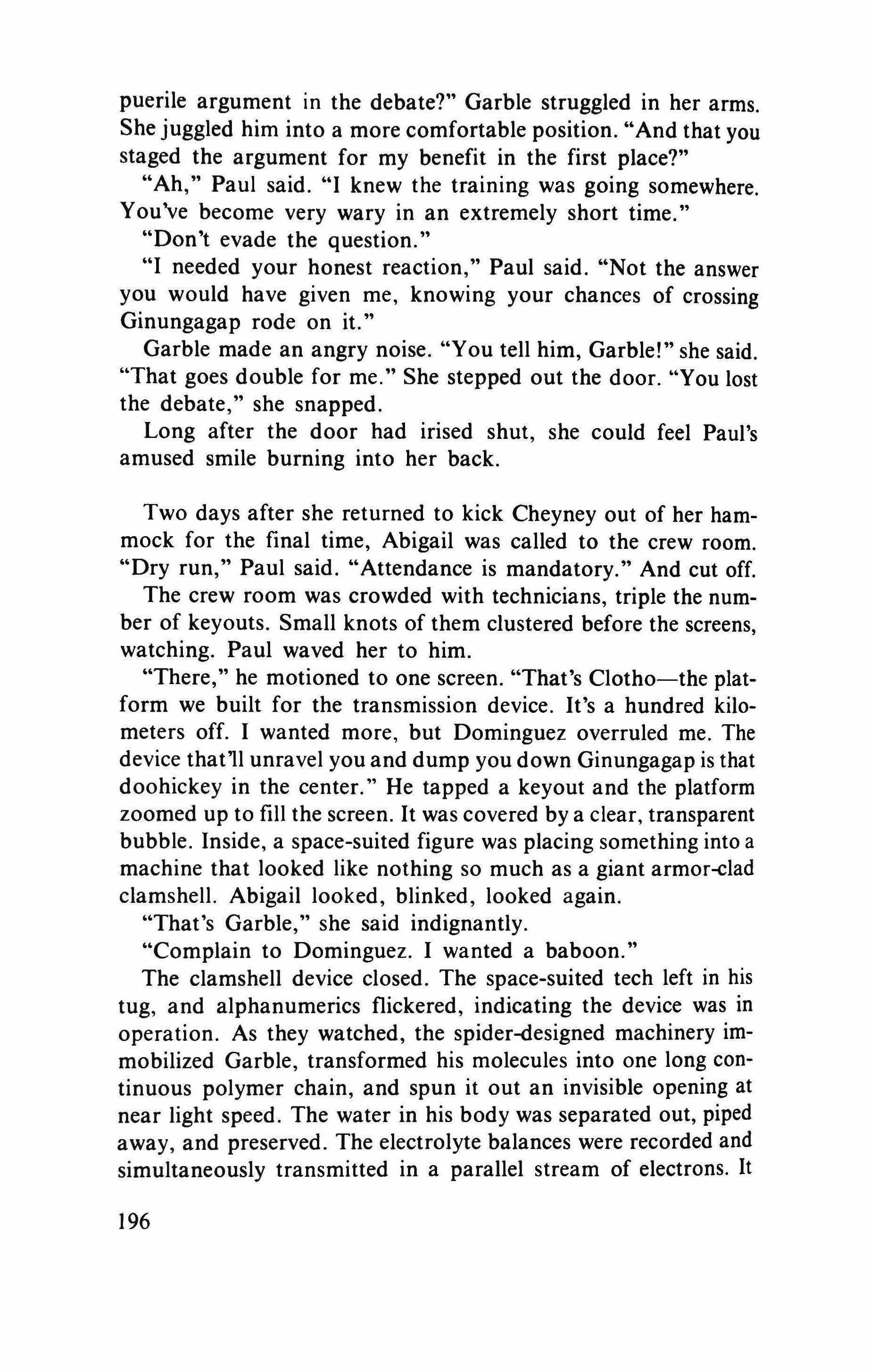
puerile argument in the debate?" Garble struggled in her arms. She juggled him into a more comfortable position. "And that you staged the argument for my benefit in the first place?"
"Ah," Paul said. "I knew the training was going somewhere. You've become very wary in an extremely short time."
"Don't evade the question."
"I needed your honest reaction," Paul said. "Not the answer you would have given me, knowing your chances of crossing Ginungagap rode on it."
Garble made an angry noise. "You tell him, Garble!" she said. "That goes double for me." She stepped out the door. "You lost the debate," she snapped.
Long after the door had irised shut, she could feel Paul's amused smile burning into her back.
Two days after she returned to kick Cheyney out of her hammock for the final time, Abigail was called to the crew room. "Dry run," Paul said. "Attendance is mandatory." And cut off.
The crew room was crowded with technicians, triple the number of keyouts. Small knots of them clustered before the screens, watching. Paul waved her to him.
"There," he motioned to one screen. "That's Clotho-the platform we built for the transmission device. It's a hundred kilometers off. I wanted more, but Dominguez overruled me. The device that'll unravel you and dump you down Ginungagap is that doohickey in the center." He tapped a keyout and the platform zoomed up to fill the screen. It was covered by a clear, transparent bubble. Inside, a space-suited figure was placing something into a machine that looked like nothing so much as a giant armor-clad clamshell. Abigail looked, blinked, looked again.
"That's Garble," she said indignantly.
"Complain to Dominguez. I wanted a baboon."
The clamshell device closed. The space-suited tech left in his tug, and alphanumerics flickered, indicating the device was in operation. As they watched, the spider-designed machinery immobilized Garble, transformed his molecules into one long continuous polymer chain, and spun it out an invisible opening at near light speed. The water in his body was separated out, piped away, and preserved. The electrolyte balances were recorded and simultaneously transmitted in a parallel stream of electrons. It
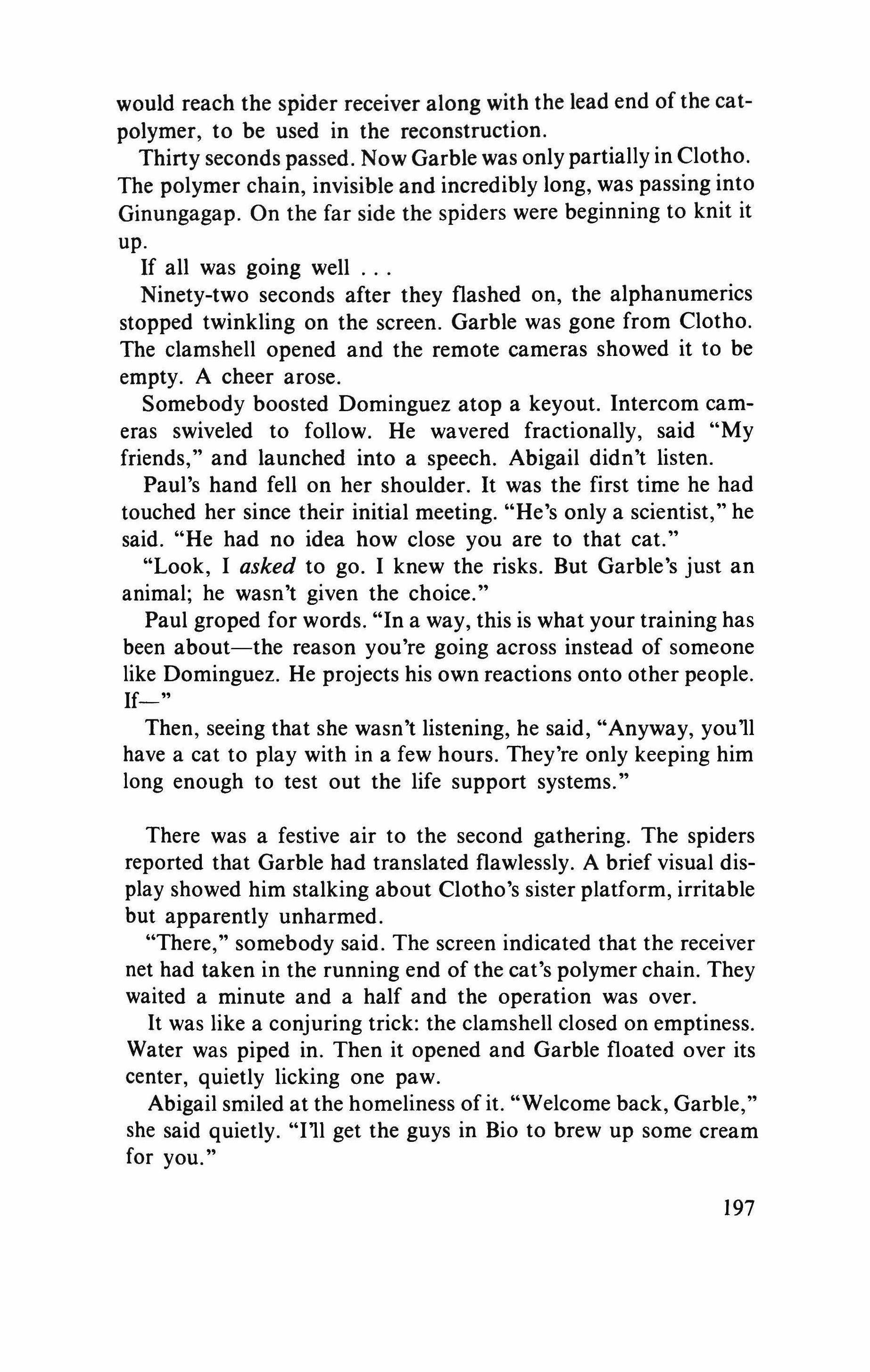
would reach the spider receiver along with the lead end of the catpolymer, to be used in the reconstruction.
Thirty seconds passed. Now Garble was onlypartially in Clotho. The polymer chain, invisible and incredibly long, was passing into Ginungagap. On the far side the spiders were beginning to knit it up.
If all was going well
Ninety-two seconds after they flashed on, the alphanumerics stopped twinkling on the screen. Garble was gone from Clotho. The clamshell opened and the remote cameras showed it to be empty. A cheer arose.
Somebody boosted Dominguez atop a keyout. Intercom cameras swiveled to follow. He wavered fractionally, said "My friends," and launched into a speech. Abigail didn't listen.
Paul's hand fell on her shoulder. It was the first time he had touched her since their initial meeting. "He's only a scientist," he said. "He had no idea how close you are to that cat."
"Look, I asked to go. I knew the risks. But Garble's just an animal; he wasn't given the choice."
Paul groped for words. "In a way, this is what your training has been about-the reason you're going across instead of someone like Dominguez. He projects his own reactions onto other people. If-"
Then, seeing that she wasn't listening, he said, "Anyway, you'll have a cat to play with in a few hours. They're only keeping him long enough to test out the life support systems."
There was a festive air to the second gathering. The spiders reported that Garble had translated flawlessly. A brief visual display showed him stalking about Clotho's sister platform, irritable but apparently unharmed.
"There," somebody said. The screen indicated that the receiver net had taken in the running end of the cat's polymer chain. They waited a minute and a half and the operation was over.
It was like a conjuring trick: the clamshell closed on emptiness. Water was piped in. Then it opened and Garble floated over its center, quietly licking one paw.
Abigail smiled at the homeliness of it. "Welcome back, Garble," she said quietly. "111 get the guys in Bio to brew up some cream for you."
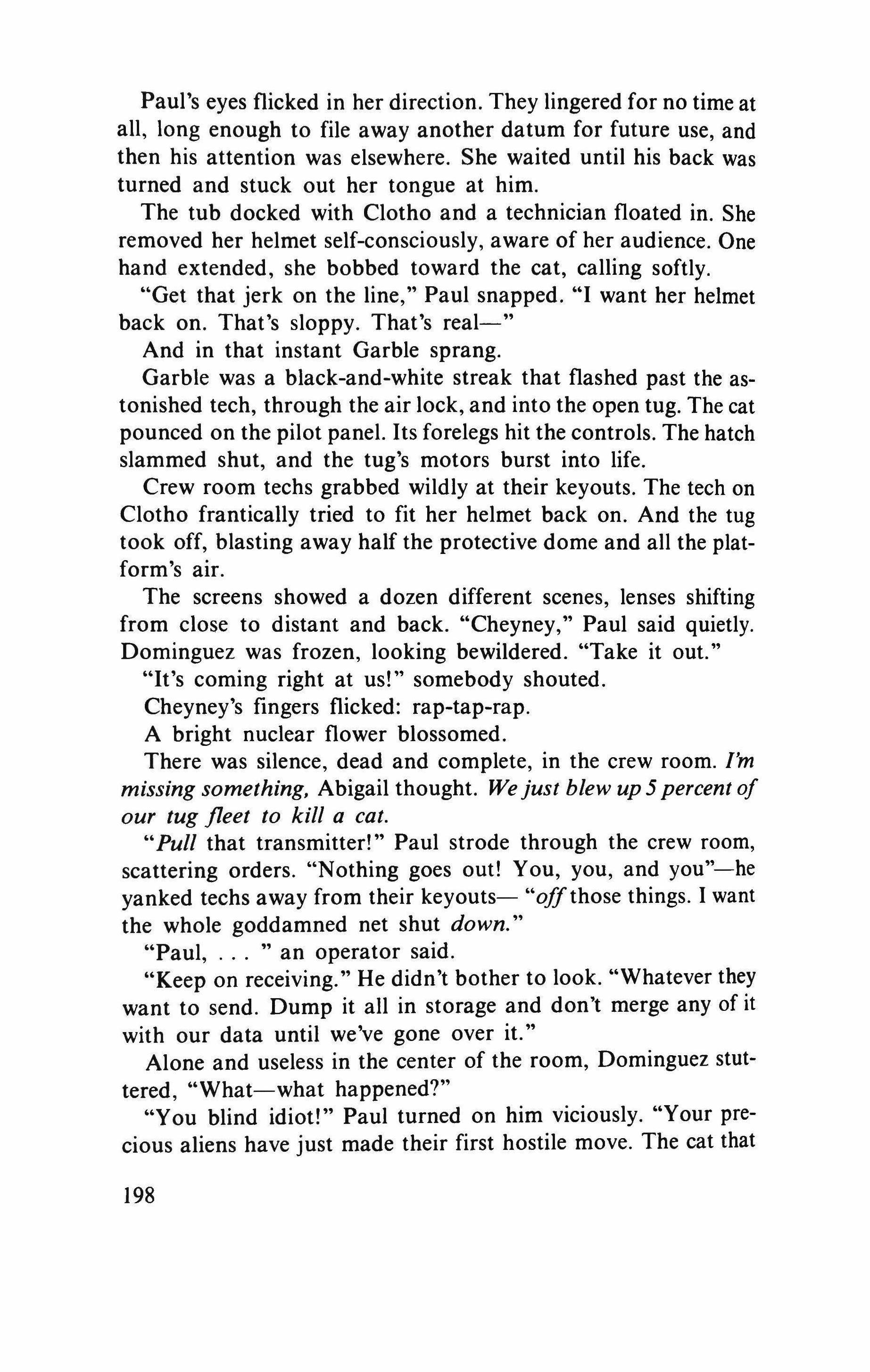
Paul's eyes flicked in her direction. They lingered for no time at all, long enough to file away another datum for future use, and then his attention was elsewhere. She waited until his back was turned and stuck out her tongue at him.
The tub docked with Clotho and a technician floated in. She removed her helmet self-consciously, aware of her audience. One hand extended, she bobbed toward the cat, calling softly.
"Get that jerk on the line," Paul snapped. "I want her helmet back on. That's sloppy. That's real-"
And in that instant Garble sprang.
Garble was a black-and-white streak that flashed past the astonished tech, through the air lock, and into the open tug. The cat pounced on the pilot panel. Its forelegs hit the controls. The hatch slammed shut, and the tug's motors burst into life.
Crew room techs grabbed wildly at their keyouts. The tech on Clotho frantically tried to fit her helmet back on. And the tug took off, blasting away half the protective dome and all the platform's air.
The screens showed a dozen different scenes, lenses shifting from close to distant and back. "Cheyney," Paul said quietly. Dominguez was frozen, looking bewildered. "Take it out."
"It's coming right at us!" somebody shouted.
Cheyney's fingers flicked: rap-tap-rap.
A bright nuclear flower blossomed.
There was silence, dead and complete, in the crew room. I'm missing something, Abigail thought. We just blew up 5 percent of our tug fleet to kill a cat.
"Pull that transmitter!" Paul strode through the crew room, scattering orders. "Nothing goes out! You, you, and you"-he yanked techs away from their keyouts- "offthose things. 1 want the whole goddamned net shut down."
"Paul, an operator said.
"Keep on receiving." He didn't bother to look. "Whatever they want to send. Dump it all in storage and don't merge any of it with our data until we've gone over it."
Alone and useless in the center of the room, Dominguez stuttered, "What-what happened?"
"You blind idiot!" Paul turned on him viciously. "Your precious aliens have just made their first hostile move. The cat that
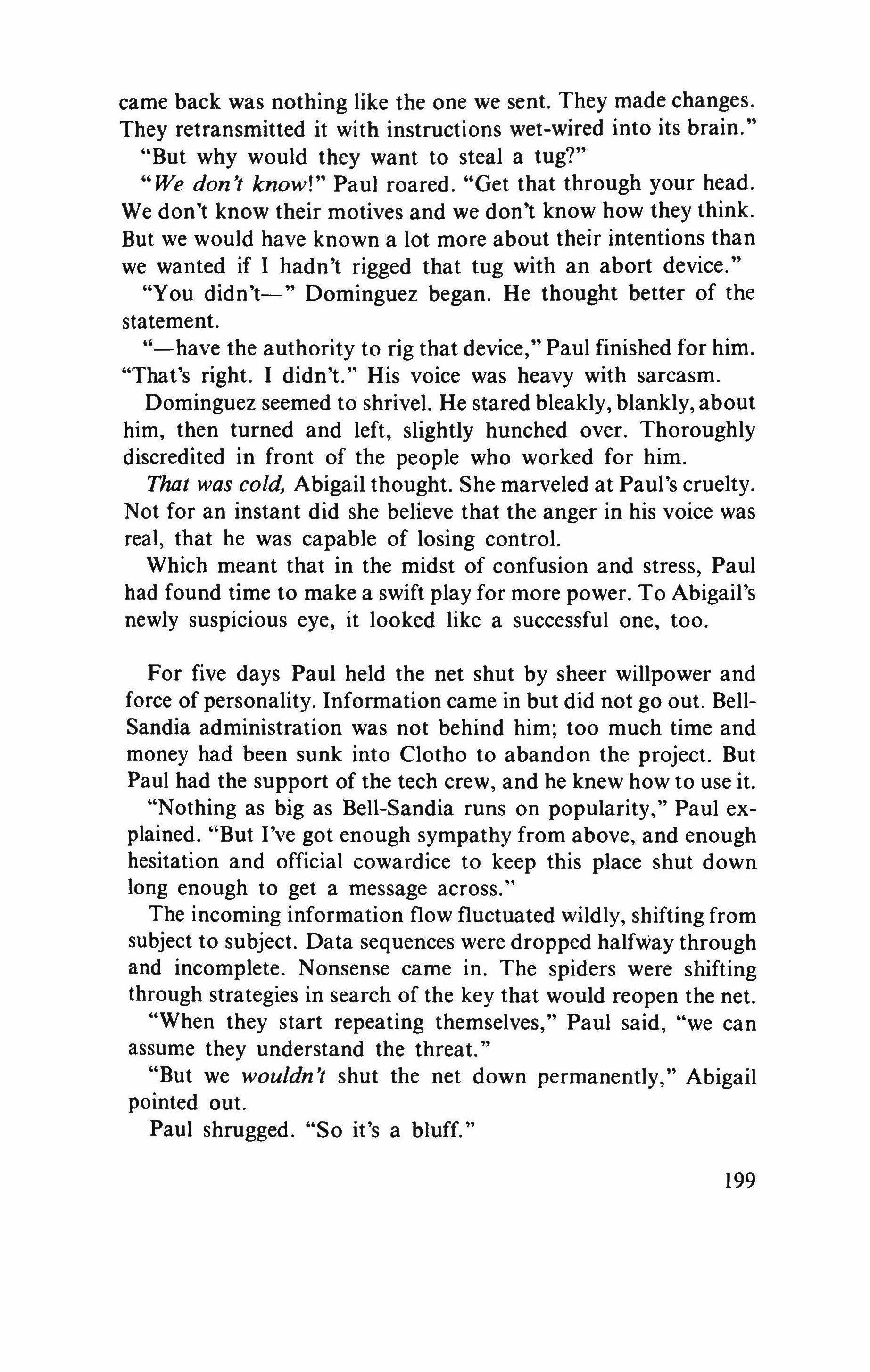
came back was nothing like the one we sent. They made changes. They retransmitted it with instructions wet-wired into its brain."
"But why would they want to steal a tug?"
"We don't know!" Paul roared. "Get that through your head. We don't know their motives and we don't know how they think. But we would have known a lot more about their intentions than we wanted if I hadn't rigged that tug with an abort device."
"You didn't-" Dominguez began. He thought better of the statement.
"-have the authority to rig that device," Paul finished for him. "That's right. I didn't." His voice was heavy with sarcasm.
Dominguez seemed to shrivel. He stared bleakly, blankly, about him, then turned and left, slightly hunched over. Thoroughly discredited in front of the people who worked for him.
That was cold, Abigail thought. She marveled at Paul's cruelty. Not for an instant did she believe that the anger in his voice was real, that he was capable of losing control.
Which meant that in the midst of confusion and stress, Paul had found time to make a swift play for more power. To Abigail's newly suspicious eye, it looked like a successful one, too.
For five days Paul held the net shut by sheer willpower and force of personality. Information came in but did not go out. BellSandia administration was not behind him; too much time and money had been sunk into Clotho to abandon the project. But Paul had the support of the tech crew, and he knew how to use it.
"Nothing as big as Bell-Sandia runs on popularity," Paul explained. "But I've got enough sympathy from above, and enough hesitation and official cowardice to keep this place shut down long enough to get a message across."
The incoming information flow fluctuated wildly, shifting from subject to subject. Data sequences were dropped halfway through and incomplete. Nonsense came in. The spiders were shifting through strategies in search of the key that would reopen the net.
"When they start repeating themselves," Paul said, "we can assume they understand the threat."
"But we wouldn't shut the net down permanently," Abigail pointed out.
Paul shrugged. "So it's a bluff."
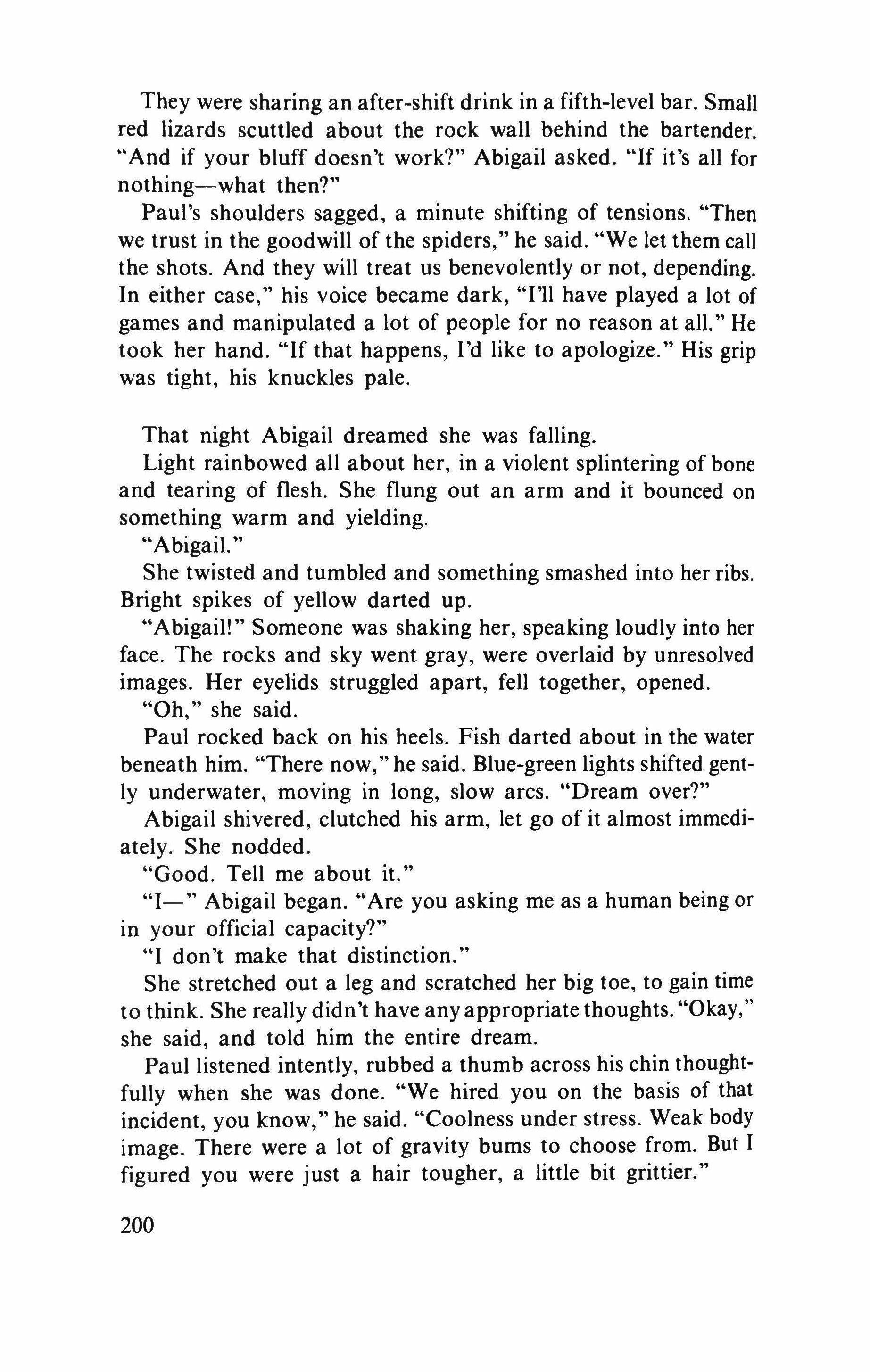
They were sharing an after-shift drink in a fifth-level bar. Small red lizards scuttled about the rock wall behind the bartender. "And if your bluff doesn't work?" Abigail asked. "If it's all for nothing-what then?"
Paul's shoulders sagged, a minute shifting of tensions. "Then we trust in the goodwill of the spiders," he said. "We let them call the shots. And they will treat us benevolently or not, depending. In either case," his voice became dark, "I'll have played a lot of games and manipulated a lot of people for no reason at all." He took her hand. "If that happens, I'd like to apologize." His grip was tight, his knuckles pale.
That night Abigail dreamed she was falling.
Light rainbowed all about her, in a violent splintering of bone and tearing of flesh. She flung out an arm and it bounced on something warm and yielding.
"Abigail.
She twisted and tumbled and something smashed into her ribs. Bright spikes of yellow darted up.
"Abigail!" Someone was shaking her, speaking loudly into her face. The rocks and sky went gray, were overlaid by unresolved images. Her eyelids struggled apart, fell together, opened.
"Oh," she said.
Paul rocked back on his heels. Fish darted about in the water beneath him. "There now," he said. Blue-green lights shifted gently underwater, moving in long, slow arcs. "Dream over?"
Abigail shivered, clutched his arm, let go of it almost immediately. She nodded.
"Good. Tell me about it."
"1-" Abigail began. "Are you asking me as a human being or in your official capacity?"
"I don't make that distinction."
She stretched out a leg and scratched her big toe, to gain time to think. She really didn't have any appropriate thoughts. "Okay," she said, and told him the entire dream.
Paul listened intently, rubbed a thumb across his chin thoughtfully when she was done. "We hired you on the basis of that incident, you know," he said. "Coolness under stress. Weak body image. There were a lot of gravity bums to choose from. But I figured you were just a hair tougher, a little bit grittier." 200
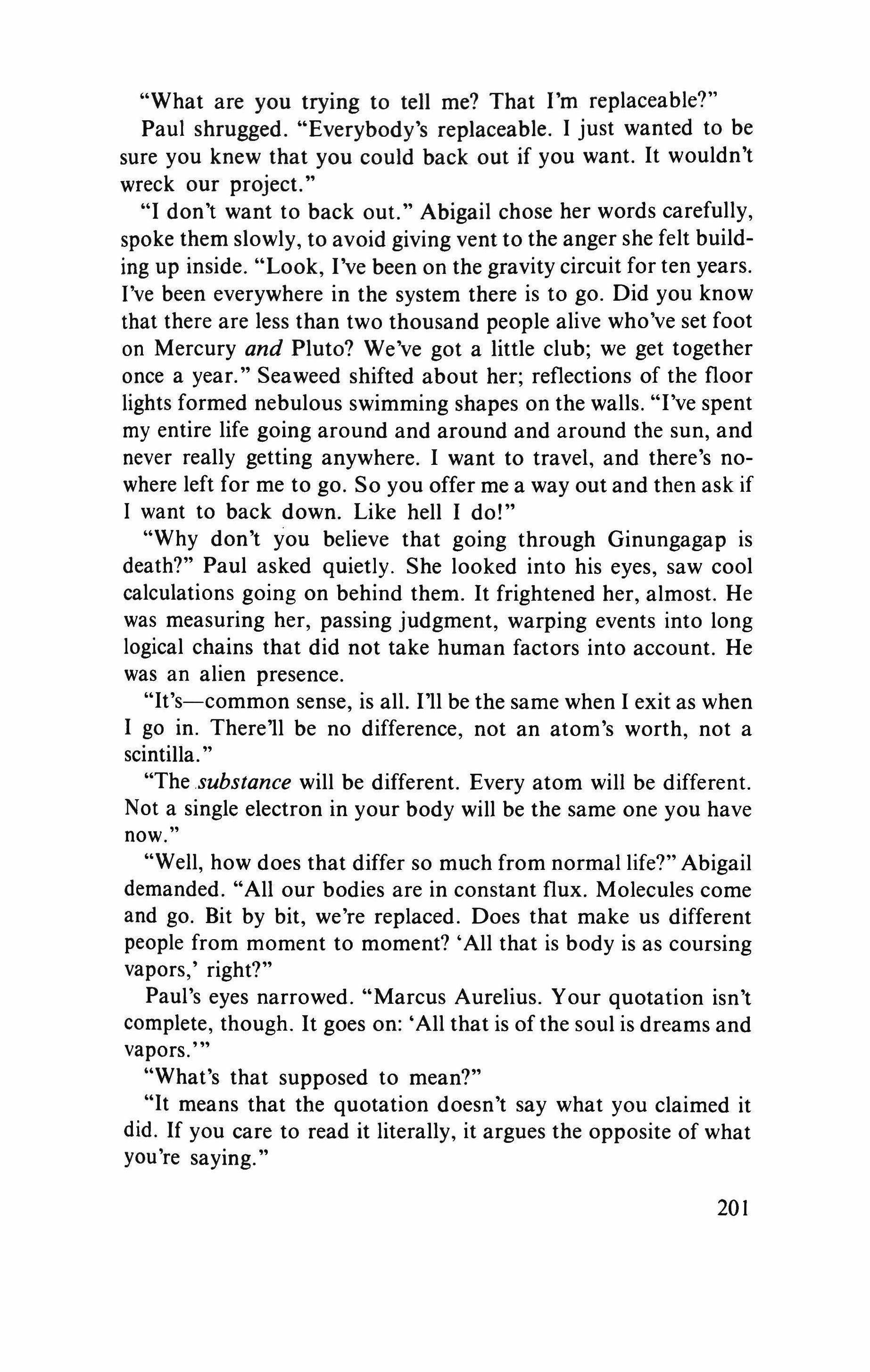
"What are you trying to tell me? That I'm replaceable?"
Paul shrugged. "Everybody's replaceable. I just wanted to be sure you knew that you could back out if you want. It wouldn't wreck our project."
"I don't want to back out." Abigail chose her words carefully, spoke them slowly, to avoid giving vent to the anger she felt building up inside. "Look, I've been on the gravity circuit for ten years. I've been everywhere in the system there is to go. Did you know that there are less than two thousand people alive who've set foot on Mercury and Pluto? We've got a little club; we get together once a year." Seaweed shifted about her; reflections of the floor lights formed nebulous swimming shapes on the walls. "I've spent my entire life going around and around and around the sun, and never really getting anywhere. I want to travel, and there's nowhere left for me to go. So you offer me a way out and then ask if I want to back down. Like hell I do!"
"Why don't you believe that going through Ginungagap is death?" Paul asked quietly. She looked into his eyes, saw cool calculations going on behind them. It frightened her, almost. He was measuring her, passing judgment, warping events into long logical chains that did not take human factors into account. He was an alien presence.
"It's-common sense, is all. I'll be the same when I exit as when I go in. There'll be no difference, not an atom's worth, not a scintilla.
"The substance will be different. Every atom will be different. Not a single electron in your body will be the same one you have now."
"Well, how does that differ so much from normal life?" Abigail demanded. "All our bodies are in constant flux. Molecules come and go. Bit by bit, we're replaced. Does that make us different people from moment to moment? 'All that is body is as coursing vapors,' right?"
Paul's eyes narrowed. "Marcus Aurelius. Your quotation isn't complete, though. It goes on: 'All that is of the soul is dreams and vapors."
"What's that supposed to mean?"
"It means that the quotation doesn't say what you claimed it did. If you care to read it literally, it argues the opposite of what you're saying."
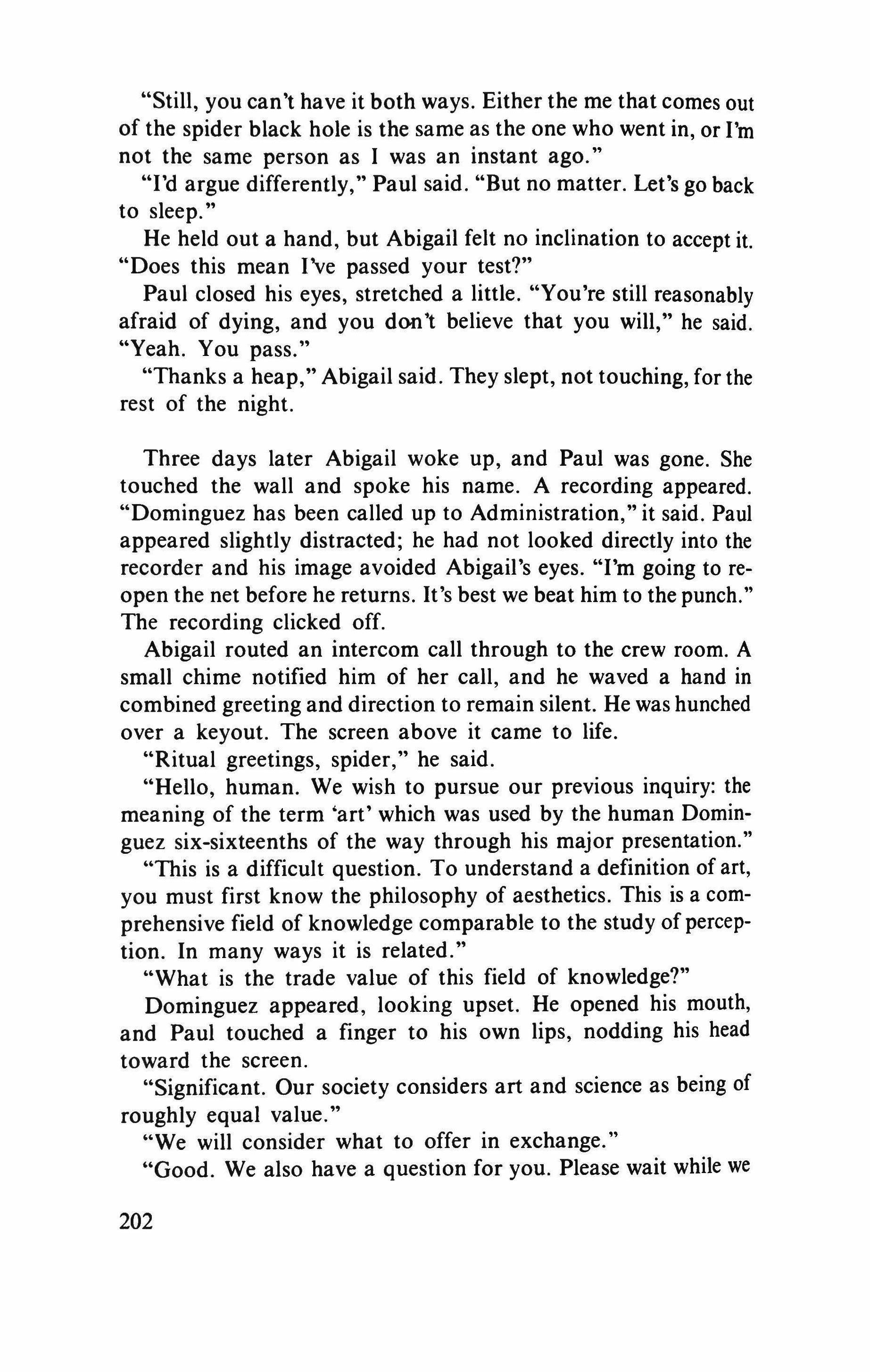
"Still, you can't have it both ways. Either the me that comes out of the spider black hole is the same as the one who went in, or I'm not the same person as I was an instant ago."
"I'd argue differently," Paul said. "But no matter. Let's go back to sleep."
He held out a hand, but Abigail felt no inclination to accept it. "Does this mean I've passed your test?"
Paul closed his eyes, stretched a little. "You're still reasonably afraid of dying, and you don't believe that you will," he said. "Yeah. You pass."
"Thanks a heap," Abigail said. They slept, not touching, for the rest of the night.
Three days later Abigail woke up, and Paul was gone. She touched the wall and spoke his name. A recording appeared. "Dominguez has been called up to Administration," it said. Paul appeared slightly distracted; he had not looked directly into the recorder and his image avoided Abigail's eyes. "I'm going to reopen the net before he returns. It's best we beat him to the punch." The recording clicked off.
Abigail routed an intercom call through to the crew room. A small chime notified him of her call, and he waved a hand in combined greeting and direction to remain silent. He was hunched over a keyout. The screen above it came to life.
"Ritual greetings, spider," he said.
"Hello, human. We wish to pursue our previous inquiry: the meaning of the term 'art' which was used by the human Dominguez six-sixteenths of the way through his major presentation."
"This is a difficult question. To understand a definition of art, you must first know the philosophy of aesthetics. This is a comprehensive field of knowledge comparable to the study of perception. In many ways it is related."
"What is the trade value of this field of knowledge?"
Dominguez appeared, looking upset. He opened his mouth, and Paul touched a finger to his own lips, nodding his head toward the screen.
"Significant. Our society considers art and science as being of roughly equal value."
"We will consider what to offer in exchange."
"Good. We also have a question for you. Please wait while we
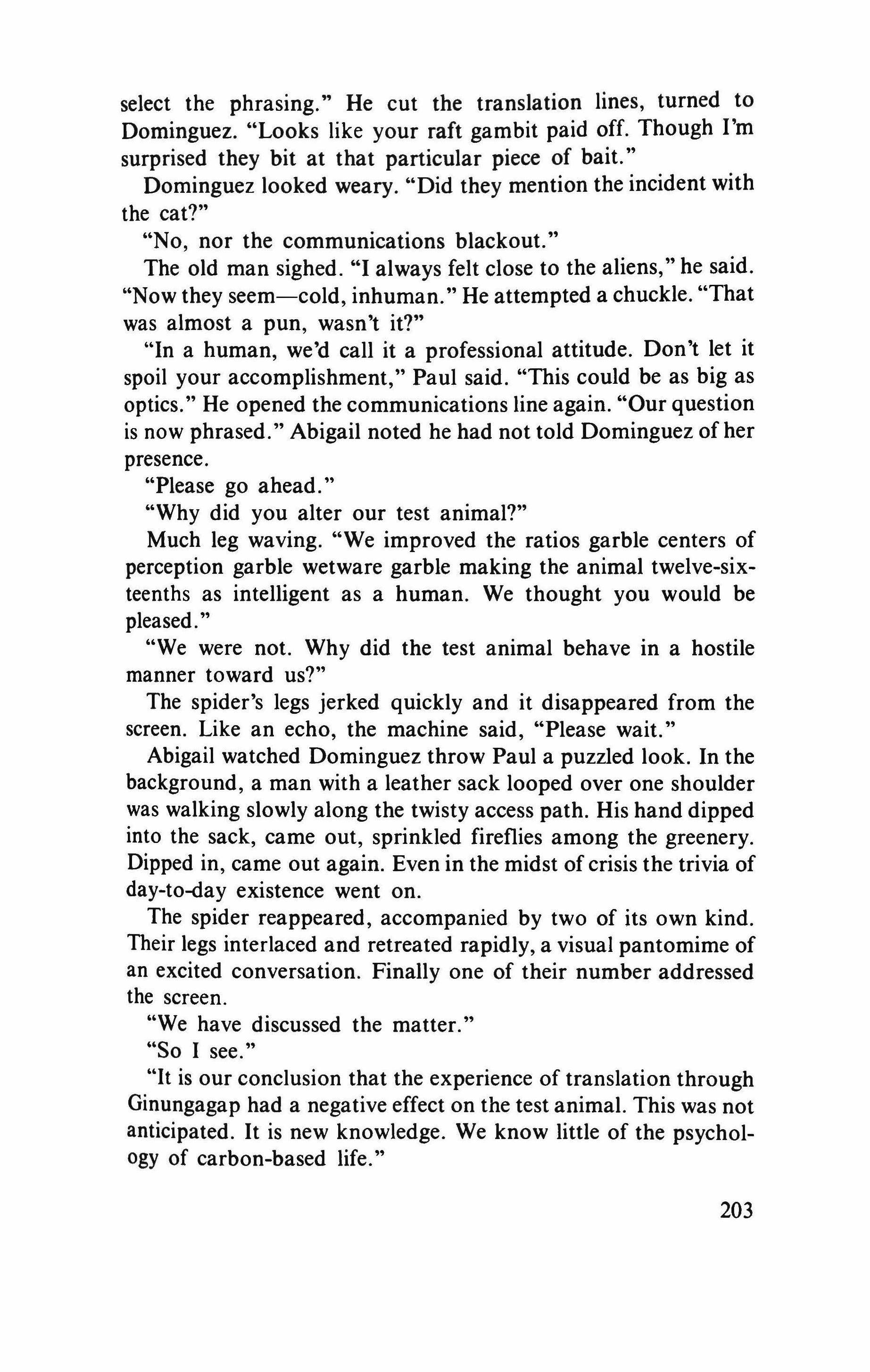
select the phrasing." He cut the translation lines, turned to Dominguez. "Looks like your raft gambit paid off. Though I'm surprised they bit at that particular piece of bait."
Dominguez looked weary. "Did they mention the incident with the cat?"
"No, nor the communications blackout."
The old man sighed. "I always felt close to the aliens," he said. "Now they seem-cold, inhuman." He attempted a chuckle. "That was almost a pun, wasn't it?"
"In a human, we'd call it a professional attitude. Don't let it spoil your accomplishment," Paul said. "This could be as big as optics." He opened the communications line again. "Our question is now phrased." Abigail noted he had not told Dominguez of her presence.
"Please go ahead."
"Why did you alter our test animal?"
Much leg waving. "We improved the ratios garble centers of perception garble wetware garble making the animal twelve-sixteenths as intelligent as a human. We thought you would be pleased."
"We were not. Why did the test animal behave in a hostile manner toward us?"
The spider's legs jerked quickly and it disappeared from the screen. Like an echo, the machine said, "Please wait."
Abigail watched Dominguez throw Paul a puzzled look. In the background, a man with a leather sack looped over one shoulder was walking slowly along the twisty access path. His hand dipped into the sack, came out, sprinkled fireflies among the greenery. Dipped in, came out again. Even in the midst of crisis the trivia of day-to-day existence went on.
The spider reappeared, accompanied by two of its own kind. Their legs interlaced and retreated rapidly, a visual pantomime of an excited conversation. Finally one of their number addressed the screen.
"We have discussed the matter."
"So I see."
"It is our conclusion that the experience of translation through Ginungagap had a negative effect on the test animal. This was not anticipated. It is new knowledge. We know little of the psychology of carbon-based life."
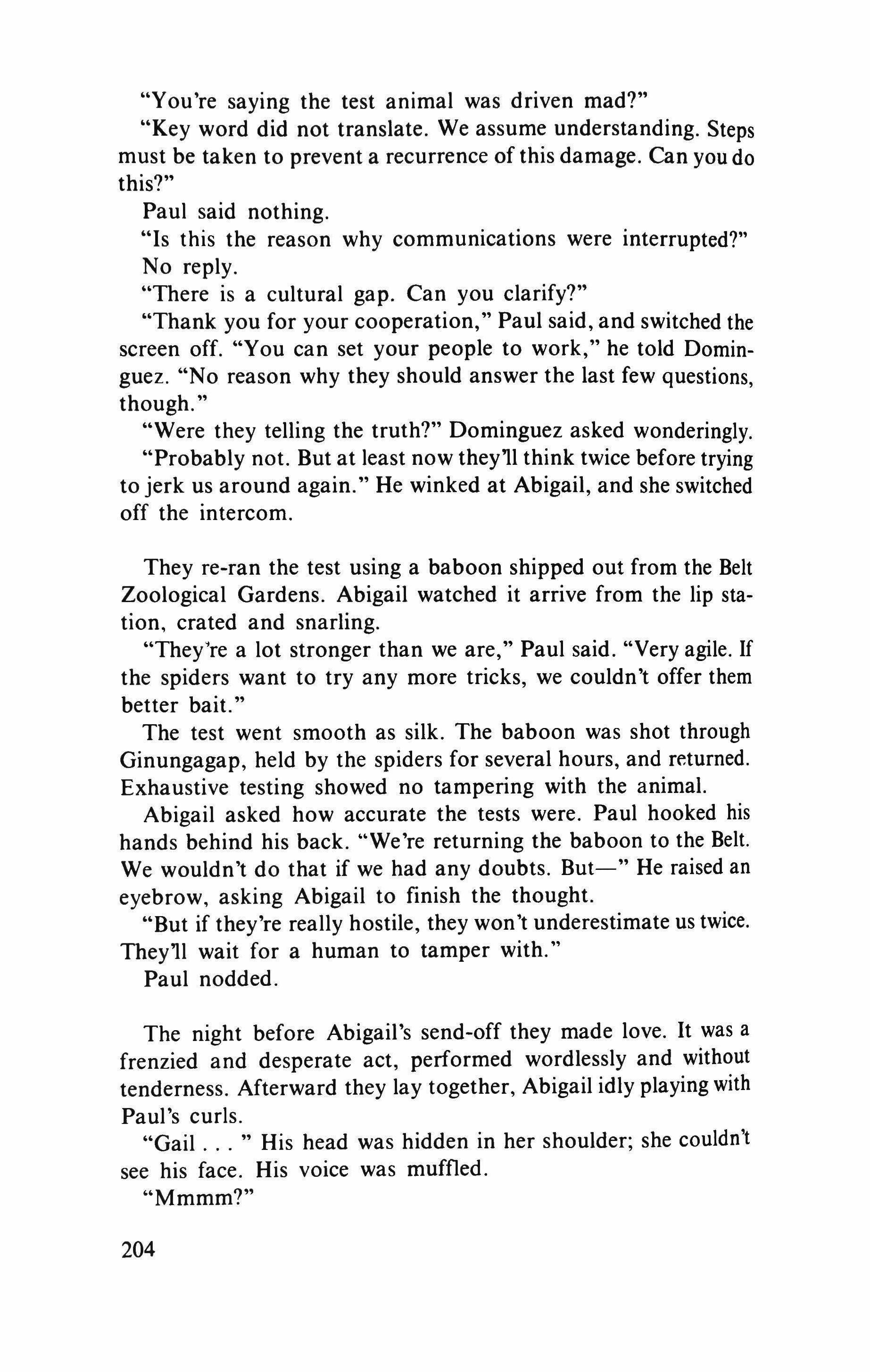
"You're saying the test animal was driven mad?"
"Key word did not translate. We assume understanding. Steps must be taken to prevent a recurrence of this damage. Can you do this?"
Paul said nothing.
"Is this the reason why communications were interrupted?" No reply.
"There is a cultural gap. Can you clarify?"
"Thank you for your cooperation," Paul said, and switched the screen off. "You can set your people to work," he told Dominguez. "No reason why they should answer the last few questions, though.
"Were they telling the truth?" Dominguez asked wonderingly.
"Probably not. But at least now they'll think twice before trying to jerk us around again." He winked at Abigail, and she switched off the intercom.
They re-ran the test using a baboon shipped out from the Belt Zoological Gardens. Abigail watched it arrive from the lip station, crated and snarling.
"They're a lot stronger than we are," Paul said. "Very agile. If the spiders want to try any more tricks, we couldn't offer them better bait."
The test went smooth as silk. The baboon was shot through Ginungagap, held by the spiders for several hours, and returned. Exhaustive testing showed no tampering with the animal.
Abigail asked how accurate the tests were. Paul hooked his hands behind his back. "We're returning the baboon to the Belt. We wouldn't do that if we had any doubts. But-" He raised an eyebrow, asking Abigail to finish the thought.
"But if they're really hostile, they won't underestimate us twice. They'll wait for a human to tamper with."
Paul nodded.
The night before Abigail's send-off they made love. It was a frenzied and desperate act, performed wordlessly and without tenderness. Afterward they lay together, Abigail idly playing with Paul's curls.
"Gail His head was hidden in her shoulder; she couldn't see his face. His voice was muffled.
"Mmmm?"
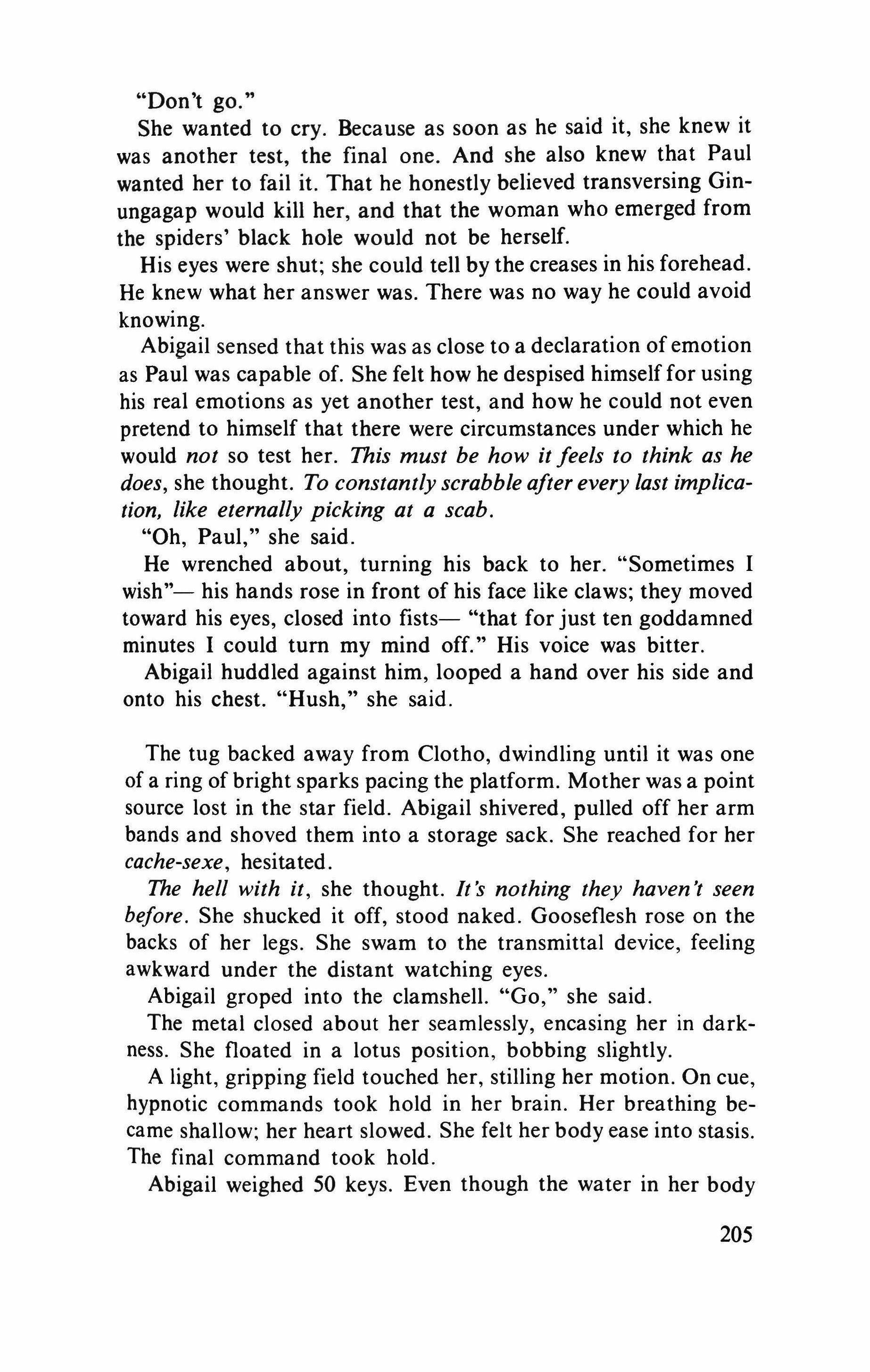
"Don't go."
She wanted to cry. Because as soon as he said it, she knew it was another test, the final one. And she also knew that Paul wanted her to fail it. That he honestly believed transversing Ginungagap would kill her, and that the woman who emerged from the spiders' black hole would not be herself.
His eyes were shut; she could tell by the creases in his forehead. He knew what her answer was. There was no way he could avoid knowing.
Abigail sensed that this was as close to a declaration of emotion as Paul was capable of. She felt how he despised himself for using his real emotions as yet another test, and how he could not even pretend to himself that there were circumstances under which he would not so test her. This must be how it feels to think as he does, she thought. To constantly scrabble after every last implication, like eternally picking at a scab.
"Oh, Paul," she said.
He wrenched about, turning his back to her. "Sometimes I wish"- his hands rose in front of his face like claws; they moved toward his eyes, closed into fists- "that for just ten goddamned minutes I could tum my mind off." His voice was bitter.
Abigail huddled against him, looped a hand over his side and onto his chest. "Hush," she said.
The tug backed away from Clotho, dwindling until it was one of a ring of bright sparks pacing the platform. Mother was a point source lost in the star field. Abigail shivered, pulled off her arm bands and shoved them into a storage sack. She reached for her cache-sexe, hesitated.
The hell with it, she thought. It s nothing they haven't seen before. She shucked it off, stood naked. Gooseflesh rose on the backs of her legs. She swam to the transmittal device, feeling awkward under the distant watching eyes.
Abigail groped into the clamshell. "Go," she said.
The metal closed about her seamlessly, encasing her in darkness. She floated in a lotus position, bobbing slightly.
A light, gripping field touched her, stilling her motion. On cue, hypnotic commands took hold in her brain. Her breathing became shallow; her heart slowed. She felt her body ease into stasis. The final command took hold.
Abigail weighed 50 keys. Even though the water in her body
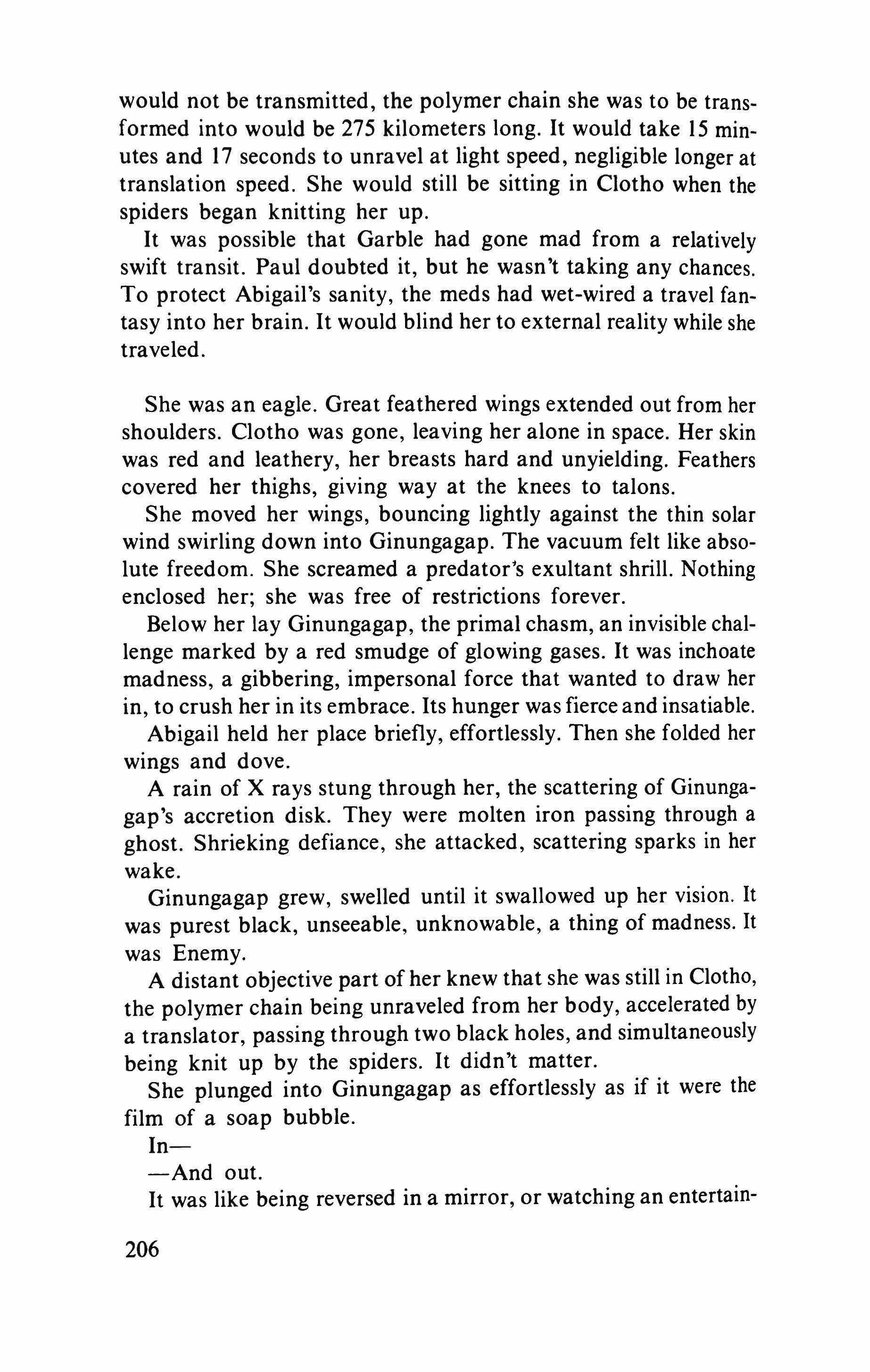
would not be transmitted, the polymer chain she was to be transformed into would be 275 kilometers long. It would take 15 minutes and 17 seconds to unravel at light speed, negligible longer at translation speed. She would still be sitting in Clotho when the spiders began knitting her up.
It was possible that Garble had gone mad from a relatively swift transit. Paul doubted it, but he wasn't taking any chances. To protect Abigail's sanity, the meds had wet-wired a travel fantasy into her brain. It would blind her to external reality while she traveled.
She was an eagle. Great feathered wings extended out from her shoulders. Clotho was gone, leaving her alone in space. Her skin was red and leathery, her breasts hard and unyielding. Feathers covered her thighs, giving way at the knees to talons.
She moved her wings, bouncing lightly against the thin solar wind swirling down into Ginungagap. The vacuum felt like absolute freedom. She screamed a predator's exultant shrill. Nothing enclosed her; she was free of restrictions forever.
Below her lay Ginungagap, the primal chasm, an invisible challenge marked by a red smudge of glowing gases. It was inchoate madness, a gibbering, impersonal force that wanted to draw her in, to crush her in its embrace. Its hunger was fierce and insatiable.
Abigail held her place briefly, effortlessly. Then she folded her wings and dove.
A rain of X rays stung through her, the scattering of Ginungagap's accretion disk. They were molten iron passing through a ghost. Shrieking defiance, she attacked, scattering sparks in her wake.
Ginungagap grew, swelled until it swallowed up her vision. It was purest black, unseeable, unknowable, a thing of madness. It was Enemy.
A distant objective part of her knew that she was still in Clotho, the polymer chain being unraveled from her body, accelerated by a translator, passing through two black holes, and simultaneously being knit up by the spiders. It didn't matter.
She plunged into Ginungagap as effortlessly as if it were the film of a soap bubble.
In-
-And out.
It was like being reversed in a mirror, or watching an entertain-

ment run backward. She was instantly flying out the way she came. The sky was a mottled mass of violet light.
The stars before her brightened from violet to blue. She craned her neck, looked back at Ginungagap, saw its disk-shaped nothingness recede, and screamed in frustration because it had escaped her. She spread her wings to slow her flight and-was sitting in a dark place. Her hand reached out, touched metal, recognized the inside of a clamshell device.
A hairline crack of light looped over her, widened. The clamshell opened.
Oceans of color bathed her face. Abigail straightened, and the act of doing so lifted her up gently. She stared through the transparent bubble at a phosphorescent foreverness of light.
My God, she thought. The stars.
The stars were thicker, more numerous than she was used to seeing them-large and bright and glittery rich. She was probably someplace significant, in a star cluster or the center of the galaxy; she couldn't guess. She felt irrationally happy to simply be; she took a deep breath, then laughed.
"Abigail Vanderhoek."
She turned to face the voice, and found that it came from a machine. Spiders crouched beside it, legs moving silently. Outside, in the hard vacuum, were more spiders.
"We regret any pain this may cause," the machine said.
Then the spiders rushed forward. She had no time to react. Sharp mandibles loomed before her, then dipped to her neck. Impossibly swift, they sliced through her throat, severed her spine. A sudden jerk and her head was separated from her body.
It happened in an instant. She felt brief pain, and the dissociation of actually seeing her decapitated body just beginning to react. And then she died.
A spark. A light. I'm alive, she thought. Consciousness returned like an ancient cathode tube warming up. Abigail stretched slowly, bobbing gently in the air, collecting her thoughts. She was in the sister-Clotho again-not in pain, her head and neck firmly on her shoulders. There were spiders in the platform, and a few floating outside.
"Abigail Vanderhoek," the machine said. "We are ready to begin negotiations."
Abigail said nothing.
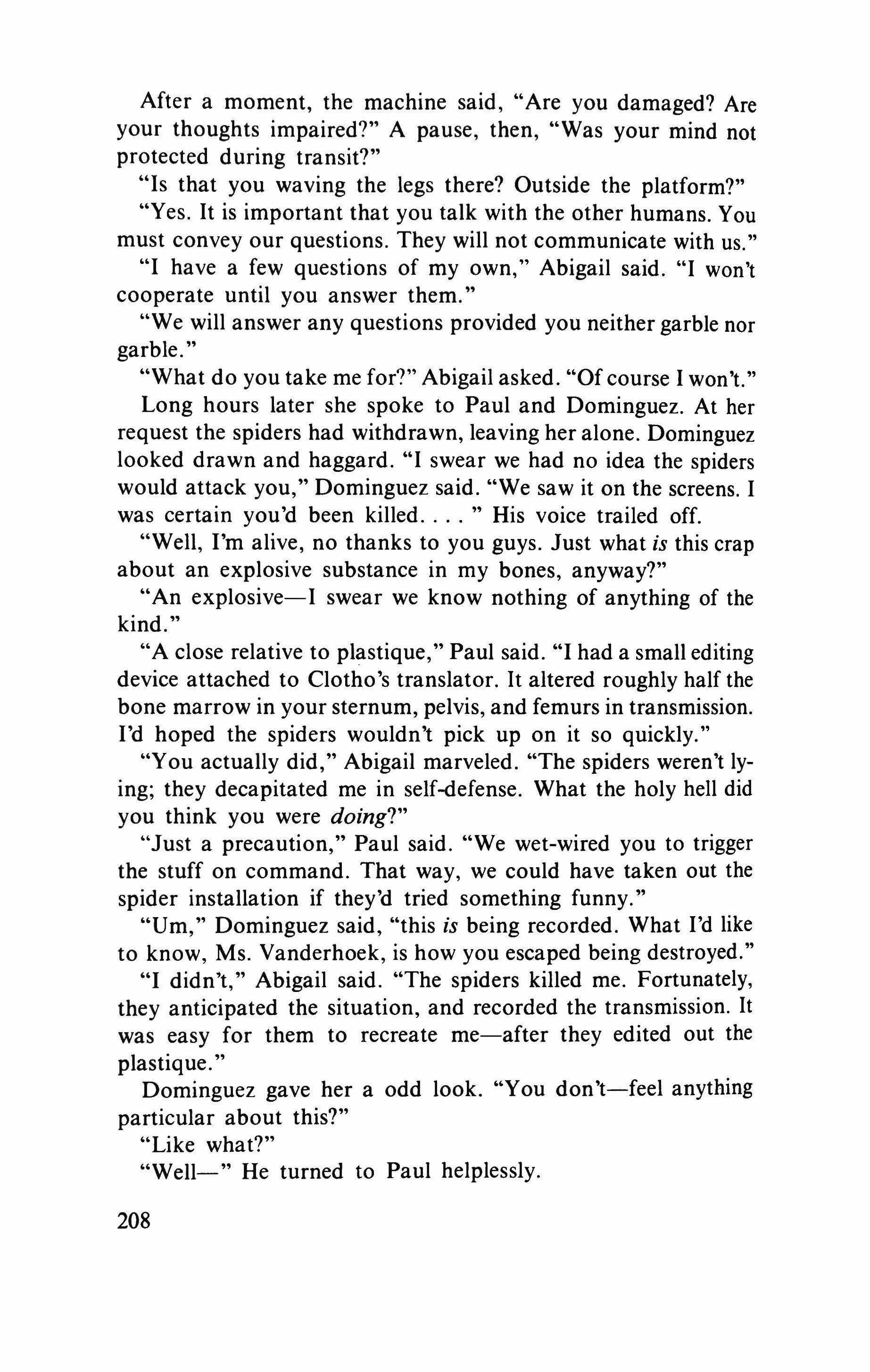
After a moment, the machine said, "Are you damaged? Are your thoughts impaired?" A pause, then, "Was your mind not protected during transit?"
"Is that you waving the legs there? Outside the platform?"
"Yes. It is important that you talk with the other humans. You must convey our questions. They will not communicate with us."
"I have a few questions of my own," Abigail said. "I won't cooperate until you answer them."
"We will answer any questions provided you neither garble nor garble. "
"What do you take me for?" Abigail asked. "Of course I won't."
Long hours later she spoke to Paul and Dominguez. At her request the spiders had withdrawn, leaving her alone. Dominguez looked drawn and haggard. "I swear we had no idea the spiders would attack you," Dominguez said. "We saw it on the screens. I was certain you'd been killed His voice trailed off.
"Well, I'm alive, no thanks to you guys. Just what is this crap about an explosive substance in my bones, anyway?"
"An explosive-I swear we know nothing of anything of the kind.
"A close relative to plastique," Paul said. "I had a small editing device attached to Clotho's translator. It altered roughly half the bone marrow in your sternum, pelvis, and femurs in transmission. I'd hoped the spiders wouldn't pick up on it so quickly."
"You actually did," Abigail marveled. "The spiders weren't lying; they decapitated me in self-defense. What the holy hell did you think you were doing?"
"Just a precaution," Paul said. "We wet-wired you to trigger the stuff on command. That way, we could have taken out the spider installation if they'd tried something funny."
"Urn," Dominguez said, "this is being recorded. What I'd like to know, Ms. Vanderhoek, is how you escaped being destroyed."
"I didn't," Abigail said. "The spiders killed me. Fortunately, they anticipated the situation, and recorded the transmission. It was easy for them to recreate me-after they edited out the plastique.
Dominguez gave her a odd look. "You don't-feel anything particular about this?"
"Like what?"
"Well-" He turned to Paul helplessly.
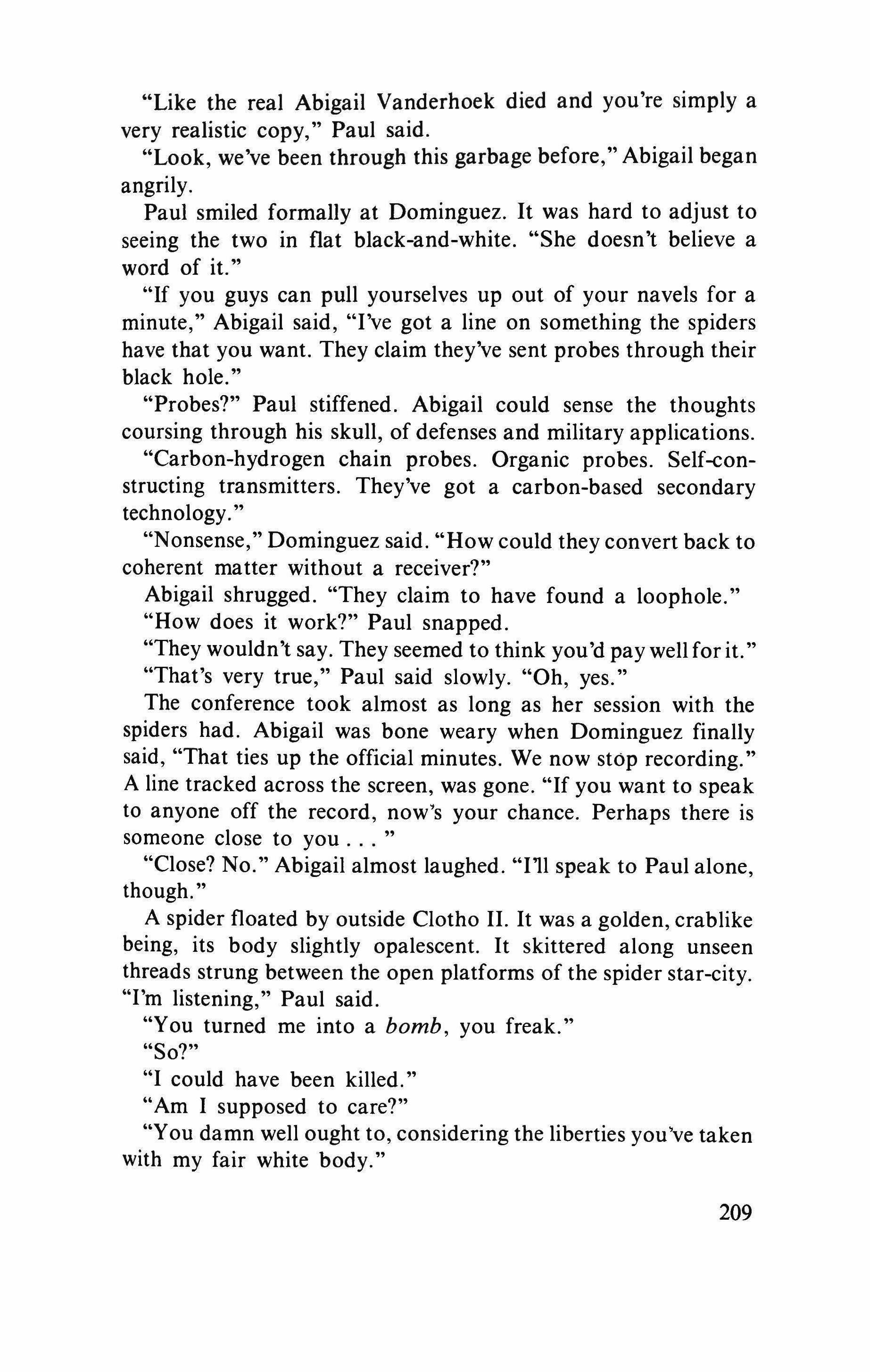
"Like the real Abigail Vanderhoek died and you're simply a very realistic copy," Paul said.
"Look, we've been through this garbage before," Abigail began angrily.
Paul smiled formally at Dominguez. It was hard to adjust to seeing the two in flat black-and-white. "She doesn't believe a word of it."
"If you guys can pull yourselves up out of your navels for a minute," Abigail said, "I've got a line on something the spiders have that you want. They claim they've sent probes through their black hole."
"Probes?" Paul stiffened. Abigail could sense the thoughts coursing through his skull, of defenses and military applications.
"Carbon-hydrogen chain probes. Organic probes. Self-constructing transmitters. They've got a carbon-based secondary technology.
"Nonsense," Dominguez said. "How could they convert back to coherent matter without a receiver?"
Abigail shrugged. "They claim to have found a loophole."
"How does it work?" Paul snapped.
"They wouldn't say. They seemed to think you'd pay well for it."
"That's very true," Paul said slowly. "Oh, yes."
The conference took almost as long as her session with the spiders had. Abigail was bone weary when Dominguez finally said, "That ties up the official minutes. We now stop recording." A line tracked across the screen, was gone. "If you want to speak to anyone off the record, now's your chance. Perhaps there is someone close to you
"Close? No." Abigail almost laughed. "111 speak to Paul alone, though. "
A spider floated by outside Clotho II. It was a golden, crablike being, its body slightly opalescent. It skittered along unseen threads strung between the open platforms of the spider star-city. "I'm listening," Paul said.
"You turned me into a bomb, you freak."
"So?"
"I could have been killed."
"Am I supposed to care?"
"You damn well ought to, considering the liberties you've taken with my fair white body."
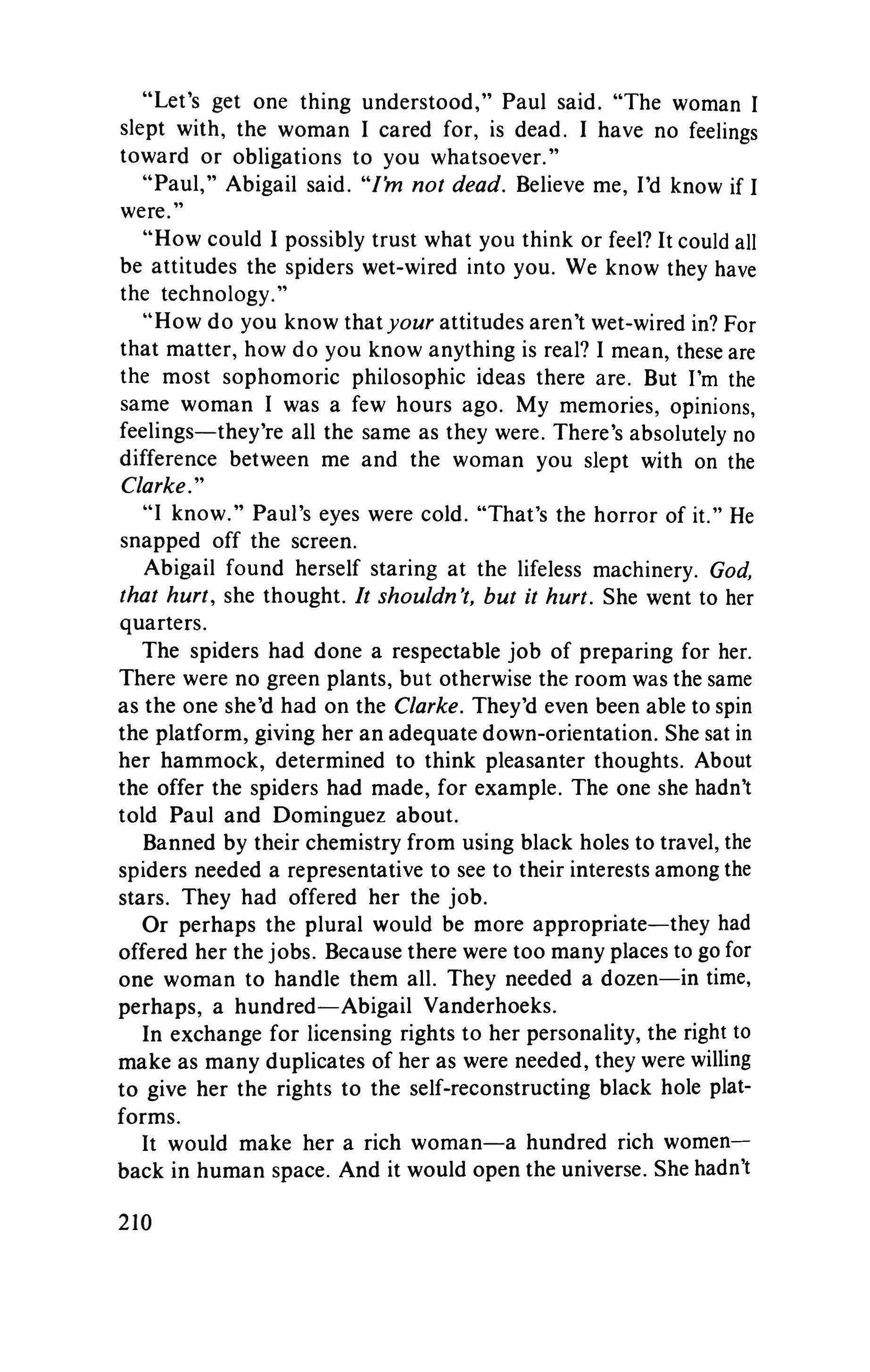
"Let's get one thing understood," Paul said. "The woman I slept with, the woman I cared for, is dead. I have no feelings toward or obligations to you whatsoever."
"Paul," Abigail said. "Tm not dead. Believe me, I'd know if I were.
"How could I possibly trust what you think or feel? It could all be attitudes the spiders wet-wired into you. We know they have the technology."
"How do you know that your attitudes aren't wet-wired in? For that matter, how do you know anything is real? I mean, these are the most sophomoric philosophic ideas there are. But I'm the same woman I was a few hours ago. My memories, opinions, feelings-they're all the same as they were. There's absolutely no difference between me and the woman you slept with on the Clarke."
"I know." Paul's eyes were cold. "That's the horror of it." He snapped off the screen.
Abigail found herself staring at the lifeless machinery. God, that hurt, she thought. It shouldn't, but it hurt. She went to her quarters.
The spiders had done a respectable job of preparing for her. There were no green plants, but otherwise the room was the same as the one she'd had on the Clarke. They'd even been able to spin the platform, giving her an adequate down-orientation. She sat in her hammock, determined to think pleasanter thoughts. About the offer the spiders had made, for example. The one she hadn't told Paul and Dominguez about.
Banned by their chemistry from using black holes to travel, the spiders needed a representative to see to their interests among the stars. They had offered her the job.
Or perhaps the plural would be more appropriate-they had offered her the jobs. Because there were too many places to go for one woman to handle them all. They needed a dozen-in time, perhaps, a hundred-Abigail Vanderhoeks.
In exchange for licensing rights to her personality, the right to make as many duplicates of her as were needed, they were willing to give her the rights to the self-reconstructing black hole platforms.
It would make her a rich woman-a hundred rich womenback in human space. And it would open the universe. She hadn't

committed herself yet, but there was no way she was going to turn down the offer. The chance to see a thousand stars? No, she would not pass it by.
When she got old, too, they could create another Abigail from their recording, burn her new memories into it, and destroy her old body.
I'm going to see the stars, she thought. I'm going to liveforever. She couldn't understand why she didn't feel elated, wondered at the sudden rush of melancholy that ran through her like the precursor of tears.
Garble jumped into her lap, offered his belly to be scratched. The spiders had recorded him, too. They had been glad to restore him to his unaltered state when she made the request. She stroked his stomach and buried her face in his fur.
"Pretty little cat," she told him. "I thought you were dead."

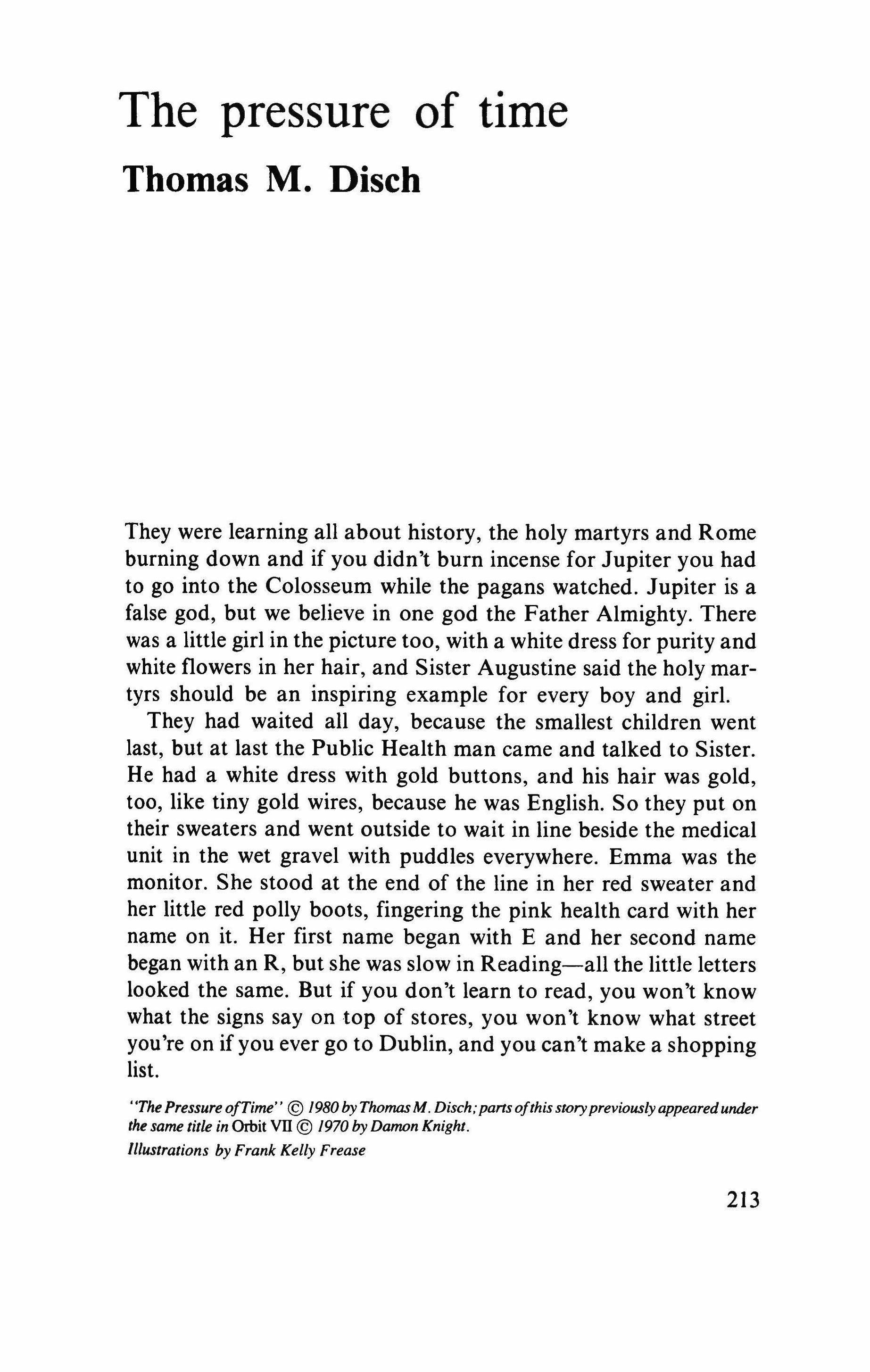
They were learning all about history, the holy martyrs and Rome burning down and if you didn't burn incense for Jupiter you had to go into the Colosseum while the pagans watched. Jupiter is a false god, but we believe in one god the Father Almighty. There was a little girl in the picture too, with a white dress for purity and white flowers in her hair, and Sister Augustine said the holy martyrs should be an inspiring example for every boy and girl. They had waited all day, because the smallest children went last, but at last the Public Health man came and talked to Sister. He had a white dress with gold buttons, and his hair was gold, too, like tiny gold wires, because he was English. So they put on their sweaters and went outside to wait in line beside the medical unit in the wet gravel with puddles everywhere. Emma was the monitor. She stood at the end of the line in her red sweater and her little red polly boots, fingering the pink health card with her name on it. Her first name began with E and her second name began with an R, but she was slow in Reading-all the little letters looked the same. But if you don't learn to read, you won't know what the signs say on top of stores, you won't know what street you're on if you ever go to Dublin, and you can't make a shopping list.
"The Pressure a/Time" © 1980 by Thomas M. Disch;parts a/this storypreviouslyappearedunder the same title in Orbit VD © 1970 by Damon Knight. lllustrations by Frank Kelly Frease

She went in the door and the man with the gold beard took her card and jiggled it in his machine, and then Mary Ellen Poorlick screamed like a banshee. The man who stuck the needles in tried to talk to her, but with his funny accent you couldn't understand a word. Jamie Baro was next, then Emma, and she couldn't look away from the needle, as long as her own middle finger. If she had to be a holy martyr, she knew she'd have run away when the lions came out of their cages instead of singing along with the others, but the door was closed behind her now, and the man said, "Try and relax now, Emma." He was a fairy, because fairies have gold hair like that, and in any case all the English are bent as a pin. That's what Leonard said. He put something cold on her arm, while the needle filled up with more white stuff, and she clenched herself tight all over, and he stuck it right into her arm.
She knew the very next thing after that that she must have done something wrong then, because she was in the Principal's Office, and Sister Mary Margaret was putting water on her face, but worse than that her Cousin Bridie was there with one of the babies. Bridie was saying, "Oh, tension! Her mother is another great one for tensions."
She tried to sit up in the day-nap cot, but Sister Mary Margaret pushed her flat again. "You'd better rest a minute, my dear. You're not well."
Emma touched her arm where it hurt. There was a Band-Aid on it.
Cousin Bridie said, "We're taking up your time, Sister," and Sister Mary Margaret said, "Nonsense," and handed Emma a cone of water to drink.
"Say thank you," said Cousin Bridie. Emma said thank you. "You see, it's all over now, and there wasn't anything to fuss about, was there? The pain is always in the waiting, not in the thing we've waited for."
Cousin Bridie sighed and rocked the baby. Her lips were unhappy, the way they got when she was cooking dinner, but when she listened to music her face was pretty, or when there was a funny show on the telly, and when she was like that you could talk to her and she was nicer than almost any other grown-up. But not when her lips were like that.
So she rested and then Sister Mary Margaret said, "Emma, your cousin is here to take you home with her for a little while.

You have to promise to be very good. Sister Augustine tells me you're one of the best-behaved children."
Emma looked down at the Band-Aid. "Did I do something then?"
"What do you mean, Emma?"
"Something wrong-out there?"
"Oh, this is nothing to do with the polio shot. We can't help things like that. It's because your grandfather-or rather your great-grandfather, I believe?"
"Yes," said Cousin Bridie.
"Your great-grandfather has finally passed on, as we all must, and you're to stay with your cousin during the wake. Only three or four days. We'll all have to say prayers for him to help him out of purgatory, though I'm sure he won't need many. He was a very good man."
"He was a patriot," Cousin Bridie said. She began to cry.
"Comfort yourself, Mrs. Anckers. I'm sure death came as a blessing. He was an old man and he suffered great pain. Pray to Our Lady. Think of the sorrow that must have been hers. We must all expect to lose our fathers and mothers, but she lost a child, her only child, so that He might pay the price for our sins."
Cousin Bridie stopped crying.
"Now, if Emma is feeling well enough, I must be getting back to my class. Your family is in my prayers." She touched a finger to Emma's arm, close to the hurt, and smiled and left.
Bridie put the baby in the pram that was standing in a puddle outside the door. The wheels made snaky tracks on the dry pavement. You could hear a classroom, inside, singing Old Black Joe. Emma loved Music best, taking after her father in that. Her father was dead.
Cousin Bridie took her hand crossing the street, though she didn't need to. Emma was six going on seven and walked home every day by herself or sometimes with the Kramer boy. She asked, "How old is Granny?"
"Eighty-six.
"Is that old to die?"
"You might say so. In Ireland."
"But not in England?"
"Who's been talking to you about England?" "Nobody. "
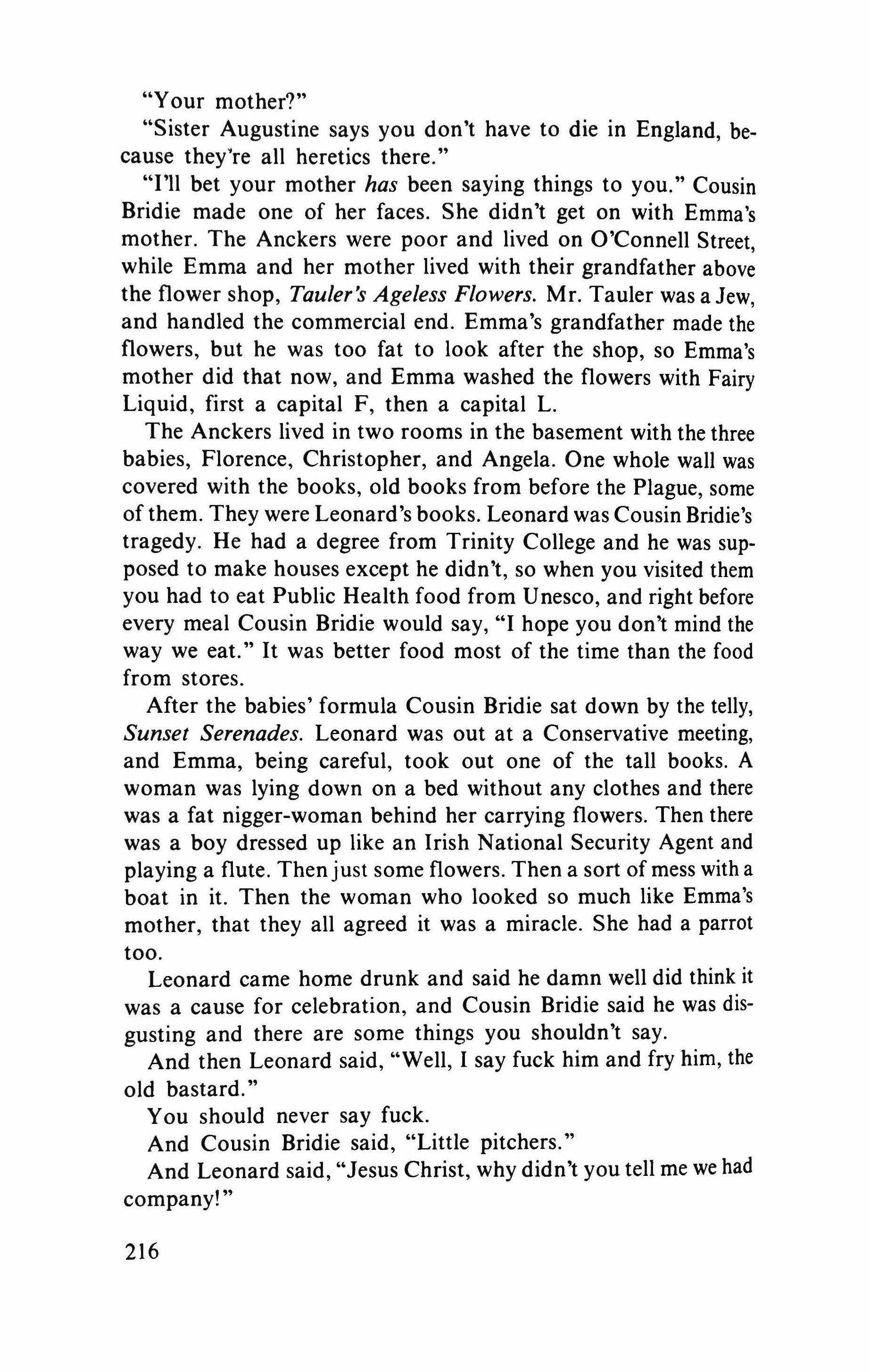
"Your mother?"
"Sister Augustine says you don't have to die in England, because they're all heretics there."
"I'll bet your mother has been saying things to you." Cousin Bridie made one of her faces. She didn't get on with Emma's mother. The Anckers were poor and lived on O'Connell Street, while Emma and her mother lived with their grandfather above the flower shop, Tauler's Ageless Flowers. Mr. Tauler was a Jew, and handled the commercial end. Emma's grandfather made the flowers, but he was too fat to look after the shop, so Emma's mother did that now, and Emma washed the flowers with Fairy Liquid, first a capital F, then a capital L.
The Anckers lived in two rooms in the basement with the three babies, Florence, Christopher, and Angela. One whole wall was covered with the books, old books from before the Plague, some of them. They were Leonard's books. Leonard was Cousin Bridie's tragedy. He had a degree from Trinity College and he was supposed to make houses except he didn't, so when you visited them you had to eat Public Health food from Unesco, and right before every meal Cousin Bridie would say, "I hope you don't mind the way we eat." It was better food most of the time than the food from stores.
After the babies' formula Cousin Bridie sat down by the telly, Sunset Serenades. Leonard was out at a Conservative meeting, and Emma, being careful, took out one of the tall books. A woman was lying down on a bed without any clothes and there was a fat nigger-woman behind her carrying flowers. Then there was a boy dressed up like an Irish National Security Agent and playing a flute. Thenjust some flowers. Then a sort of mess with a boat in it. Then the woman who looked so much like Emma's mother, that they all agreed it was a miracle. She had a parrot too.
Leonard came home drunk and said he damn well did think it was a cause for celebration, and Cousin Bridie said he was disgusting and there are some things you shouldn't say.
And then Leonard said, "Well, I say fuck him and fry him, the old bastard."
You should never say fuck.
And Cousin Bridie said, "Little pitchers." And Leonard said, "Jesus Christ, why didn't you tell me we had company!"
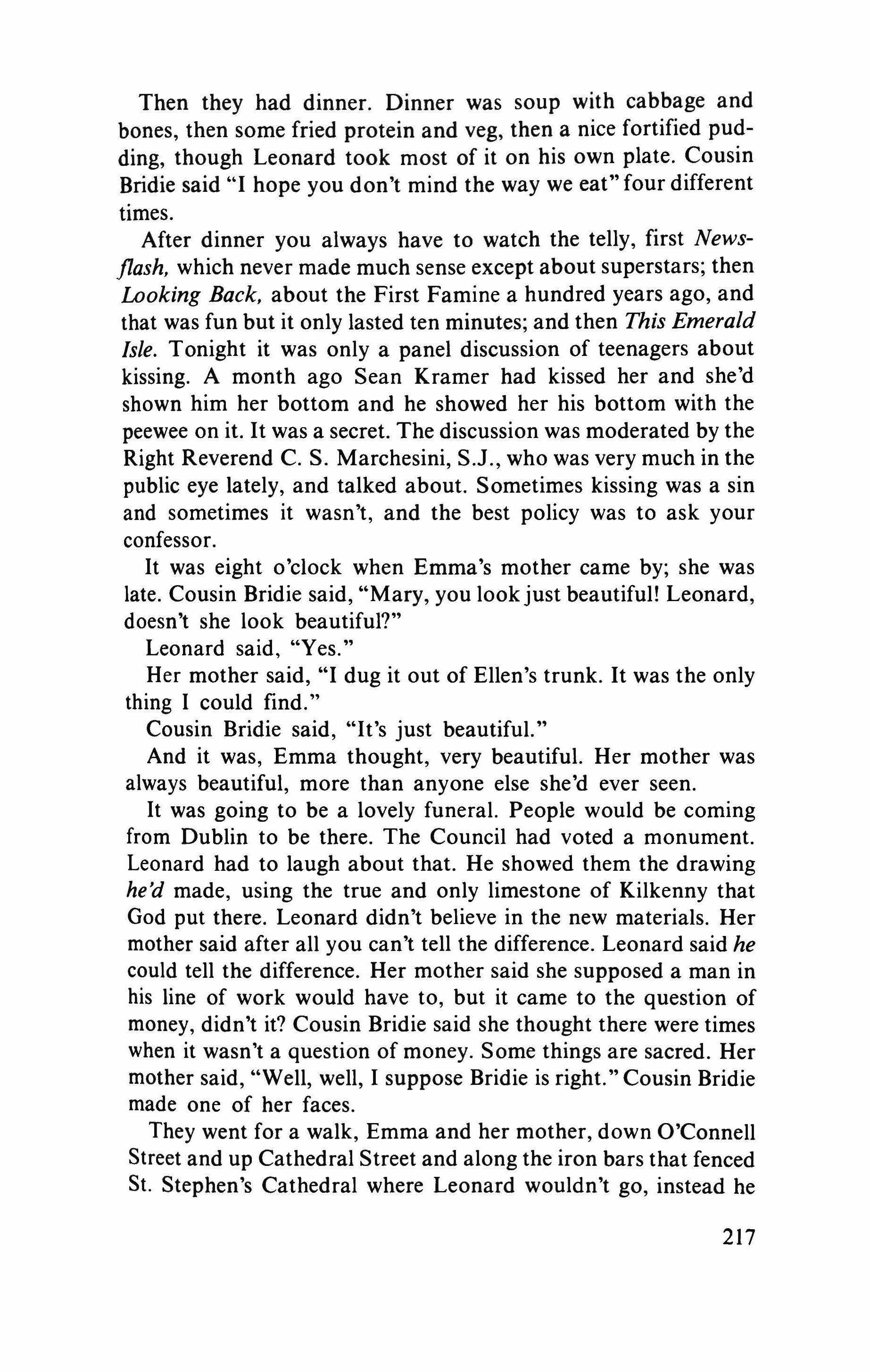
Then they had dinner. Dinner was soup with cabbage and bones, then some fried protein and veg, then a nice fortified pudding, though Leonard took most of it on his own plate. Cousin Bridie said "I hope you don't mind the way we eat" four different times.
After dinner you always have to watch the telly, first Newsflash, which never made much sense except about superstars; then Looking Back, about the First Famine a hundred years ago, and that was fun but it only lasted ten minutes; and then This Emerald Isle. Tonight it was only a panel discussion of teenagers about kissing. A month ago Sean Kramer had kissed her and she'd shown him her bottom and he showed her his bottom with the peewee on it. It was a secret. The discussion was moderated by the Right Reverend C. S. Marchesini, S.J., who was very much in the public eye lately, and talked about. Sometimes kissing was a sin and sometimes it wasn't, and the best policy was to ask your confessor.
It was eight 0 'clock when Emma's mother came by; she was late. Cousin Bridie said, "Mary, you look just beautiful! Leonard, doesn't she look beautiful?"
Leonard said, "Yes."
Her mother said, "I dug it out of Ellen's trunk. It was the only thing I could find."
Cousin Bridie said, "It's just beautiful."
And it was, Emma thought, very beautiful. Her mother was always beautiful, more than anyone else she'd ever seen.
It was going to be a lovely funeral. People would be coming from Dublin to be there. The Council had voted a monument.
Leonard had to laugh about that. He showed them the drawing he'd made, using the true and only limestone of Kilkenny that God put there. Leonard didn't believe in the new materials. Her mother said after all you can't tell the difference. Leonard said he could tell the difference. Her mother said she supposed a man in his line of work would have to, but it came to the question of money, didn't it? Cousin Bridie said she thought there were times when it wasn't a question of money. Some things are sacred. Her mother said, "Well, well, I suppose Bridie is right." Cousin Bridie made one of her faces.
They went for a walk, Emma and her mother, down O'Connell Street and up Cathedral Street and along the iron bars that fenced St. Stephen's Cathedral where Leonard wouldn't go, instead he
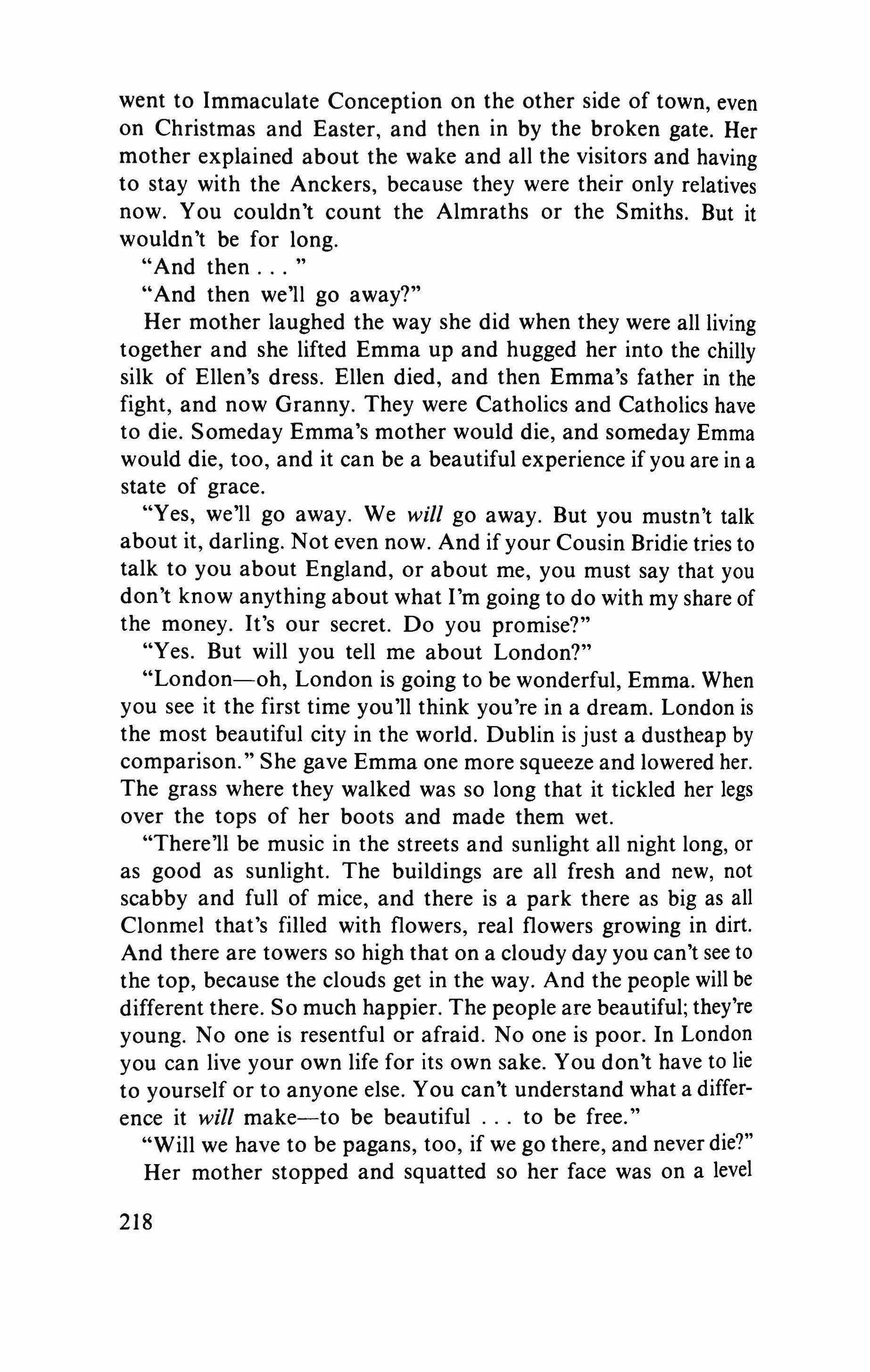
went to Immaculate Conception on the other side of town, even on Christmas and Easter, and then in by the broken gate. Her mother explained about the wake and all the visitors and having to stay with the Anckers, because they were their only relatives now. You couldn't count the Almraths or the Smiths. But it wouldn't be for long.
"And then
"And then we'll go away?"
Her mother laughed the way she did when they were all living together and she lifted Emma up and hugged her into the chilly silk of Ellen's dress. Ellen died, and then Emma's father in the fight, and now Granny. They were Catholics and Catholics have to die. Someday Emma's mother would die, and someday Emma would die, too, and it can be a beautiful experience if you are in a state of grace.
"Yes, we'll go away. We will go away. But you mustn't talk about it, darling. Not even now. And if your Cousin Bridie tries to talk to you about England, or about me, you must say that you don't know anything about what I'm going to do with my share of the money. It's our secret. Do you promise?"
"Yes. But will you tell me about London?"
"London-oh, London is going to be wonderful, Emma. When you see it the first time you'll think you're in a dream. London is the most beautiful city in the world. Dublin is just a dustheap by comparison." She gave Emma one more squeeze and lowered her. The grass where they walked was so long that it tickled her legs over the tops of her boots and made them wet.
"There'll be music in the streets and sunlight all night long, or as good as sunlight. The buildings are all fresh and new, not scabby and full of mice, and there is a park there as big as all Clonmel that's filled with flowers, real flowers growing in dirt. And there are towers so high that on a cloudy day you can't see to the top, because the clouds get in the way. And the people will be different there. So much happier. The people are beautiful; they're young. No one is resentful or afraid. No one is poor. In London you can live your own life for its own sake. You don't have to lie to yourself or to anyone else. You can't understand what a difference it will make-to be beautiful to be free."
"Will we have to be pagans, too, if we go there, and never die?"
Her mother stopped and squatted so her face was on a level

with Emma's. She smiled with her mouth open, and her hair was blowing across her eyes. She looked beautiful.
"Darling! darling!" And she laughed. "It's not as simple as that. They can't help it that they don't die, and we can't help it that we do."
"If I could answer that question, Emma"-she brushed her hair back, dark brown like Emma's, and stood up-"then Ireland would cease to exist."
They walked back to the gate on the path. A priest was standing by the second Station of the Cross, saying a rosary, swaying.
"Good evening, Mrs. Rosetti. So the end has come at last. He was a good man. The world will seem a little smaller now."
"Yes, a tragedy," Mrs. Rosetti mumbled, hurrying out the gate.
"Good evening, Emma," the priest called out.
"Good evening, Father."
She watched him flickering through the bars and holly prickles, as her mother hurried her along on the walk. How did he know her name was Emma? She'd never seen him before in her life.
His name was the Right Reverend C. S. Marchesini, S.J., from Dublin, and he gave the funeral sermon, Death, where is thy victory? St. Stephen's was filled almost like Sunday with just a few pews at the back empty. Emma sat between her mother and Mr. Tauler, the Jew who handled the commercial end, right at the front. Sister Augustine said you shouldn't call them Jews if they were baptized, but everyone did anyhow.
Emma had a black dress too today, but the hem was only tacked because the babies were teething all night and Cousin Bridie got drunk. When her mother came in the car, there was a quarrel. Leonard said he'd be damned if he'd set his foot in that travesty, and her mother said it would come as no surprise to anyone if he was. Cousin Bridie started crying and kept it up all the way to the church.
Just before the last hymn, everyone had to go look inside the coffin. Her mother lifted her up. He was wearing lipstick and smiling, and she thought he looked nice, because usually he didn't smile. He wasn't as fat either, and he didn't have his cane. Unless he was lying on top of it. He used to grab her with his cane, when she wasn't careful, slipping the crook around her neck. Her mother said that when she was a little girl he did the same thing to her. It
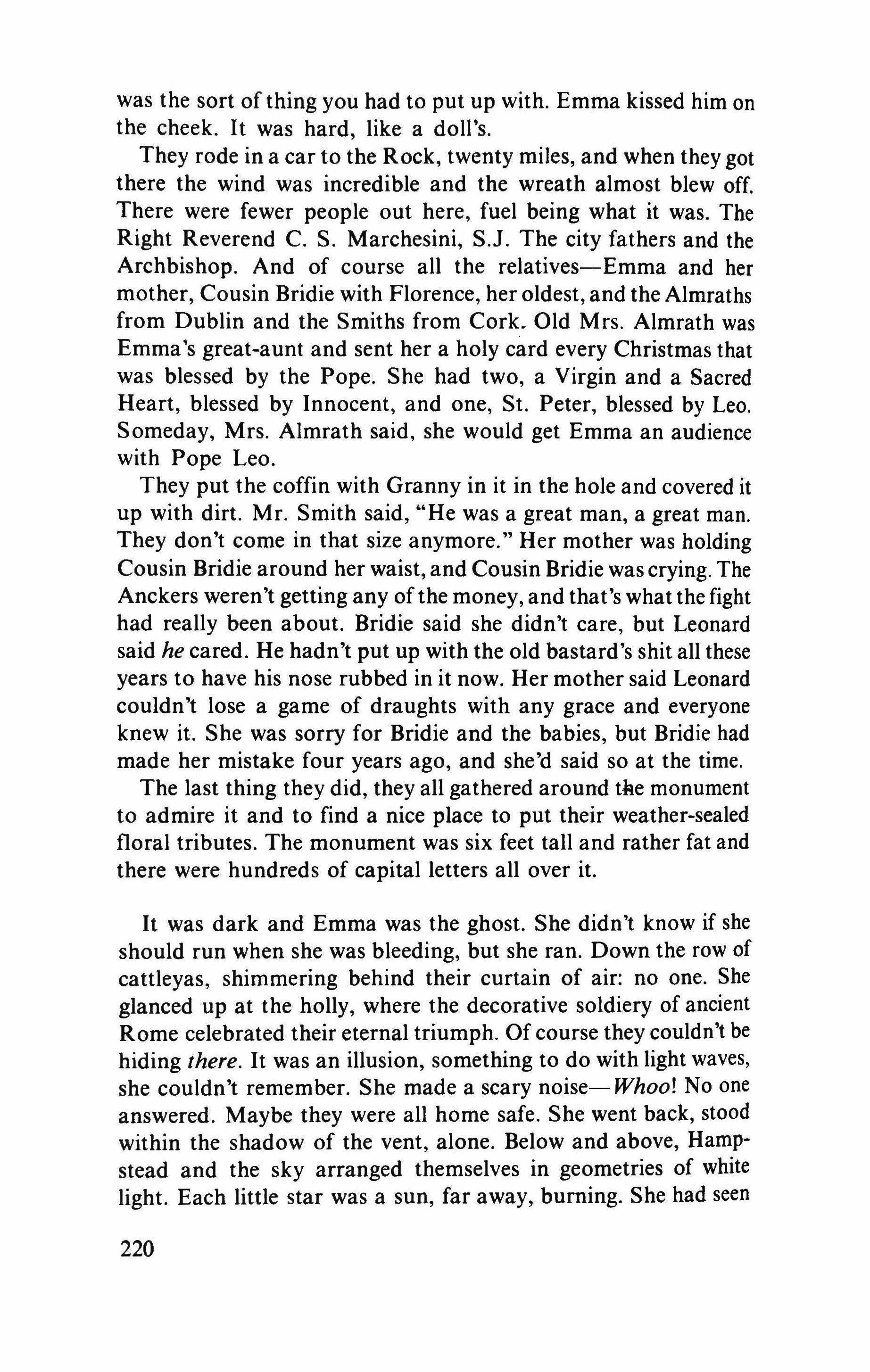
was the sort of thing you had to put up with. Emma kissed him on the cheek. It was hard, like a doll's.
They rode in a car to the Rock, twenty miles, and when they got there the wind was incredible and the wreath almost blew off. There were fewer people out here, fuel being what it was. The Right Reverend C. S. Marchesini, S.l. The city fathers and the Archbishop. And of course all the relatives-Emma and her mother, Cousin Bridie with Florence, her oldest, and the Almraths from Dublin and the Smiths from Cork. Old Mrs. Almrath was Emma's great-aunt and sent her a holy card every Christmas that was blessed by the Pope. She had two, a Virgin and a Sacred Heart, blessed by Innocent, and one, St. Peter, blessed by Leo. Someday, Mrs. Almrath said, she would get Emma an audience with Pope Leo.
They put the coffin with Granny in it in the hole and covered it up with dirt. Mr. Smith said, "He was a great man, a great man. They don't come in that size anymore." Her mother was holding Cousin Bridie around her waist, and Cousin Bridie was crying. The Anckers weren't getting any of the money, and that's what the fight had really been about. Bridie said she didn't care, but Leonard said he cared. He hadn't put up with the old bastard's shit all these years to have his nose rubbed in it now. Her mother said Leonard couldn't lose a game of draughts with any grace and everyone knew it. She was sorry for Bridie and the babies, but Bridie had made her mistake four years ago, and she'd said so at the time.
The last thing they did, they all gathered around tae monument to admire it and to find a nice place to put their weather-sealed floral tributes. The monument was six feet tall and rather fat and there were hundreds of capital letters all over it.
It was dark and Emma was the ghost. She didn't know if she should run when she was bleeding, but she ran. Down the row of cattleyas, shimmering behind their curtain of air: no one. She glanced up at the holly, where the decorative soldiery of ancient Rome celebrated their eternal triumph. Of course they couldn't be hiding there. It was an illusion, something to do with light waves, she couldn't remember. She made a scary noise- Whoo! No one answered. Maybe they were all home safe. She went back, stood within the shadow of the vent, alone. Below and above, Hampstead and the sky arranged themselves in geometries of white light. Each little star was a sun, far away, burning. She had seen
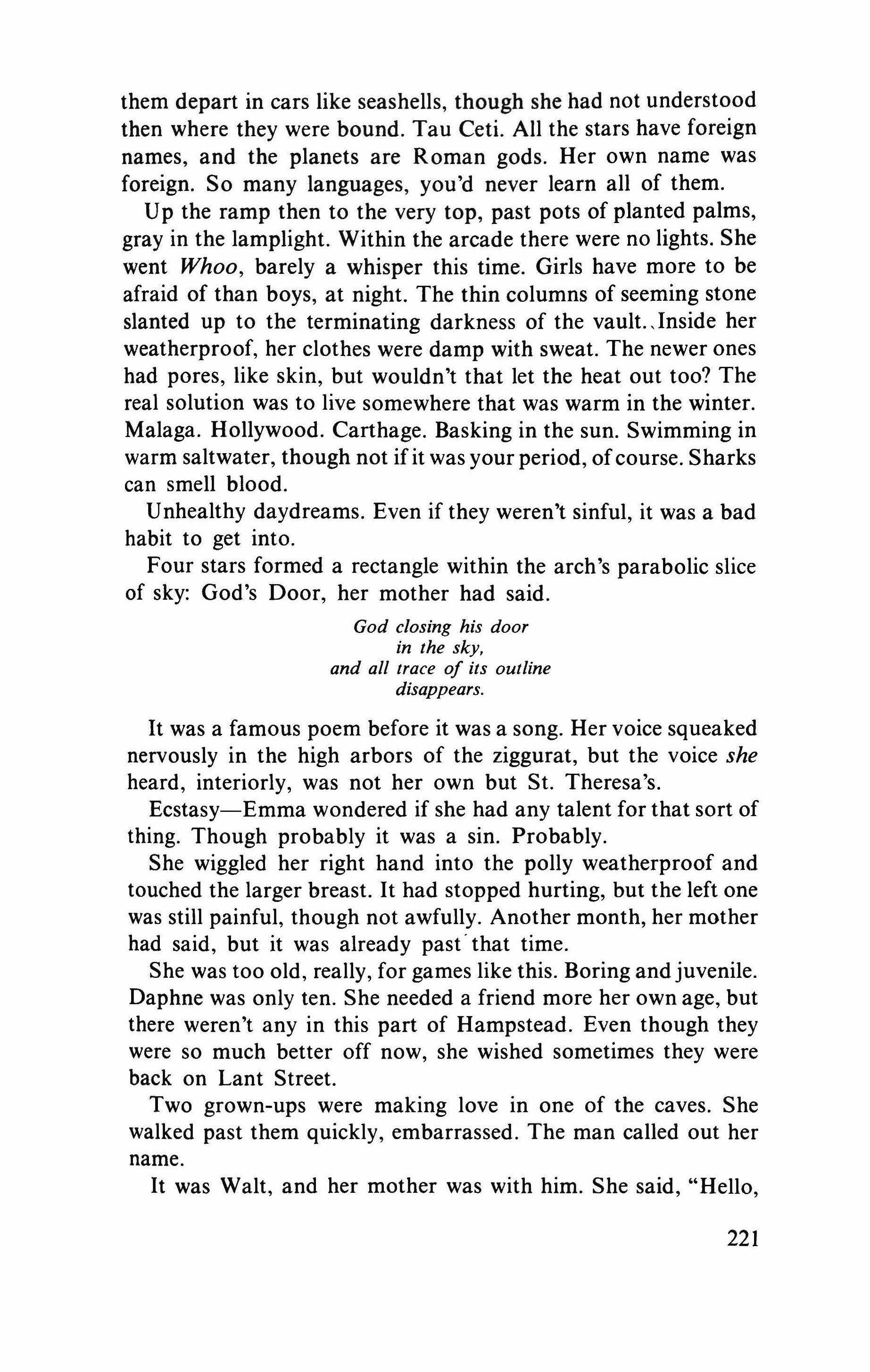
them depart in cars like seashells, though she had not understood then where they were bound. Tau Ceti. All the stars have foreign names, and the planets are Roman gods. Her own name was foreign. So many languages, you'd never learn all of them.
Up the ramp then to the very top, past pots of planted palms, gray in the lamplight. Within the arcade there were no lights. She went Whoo, barely a whisper this time. Girls have more to be afraid of than boys, at night. The thin columns of seeming stone slanted up to the terminating darkness of the vault..Inside her weatherproof, her clothes were damp with sweat. The newer ones had pores, like skin, but wouldn't that let the heat out too? The real solution was to live somewhere that was warm in the winter. Malaga. Hollywood. Carthage. Basking in the sun. Swimming in warm saltwater, though not if it was your period, of course. Sharks can smell blood.
Unhealthy daydreams. Even if they weren't sinful, it was a bad habit to get into.
Four stars formed a rectangle within the arch's parabolic slice of sky: God's Door, her mother had said.
God closing his door in the sky, and all trace of its outline disappears.
It was a famous poem before it was a song. Her voice squeaked nervously in the high arbors of the ziggurat, but the voice she heard, interiorly, was not her own but St. Theresa's.
Ecstasy-Emma wondered if she had any talent for that sort of thing. Though probably it was a sin. Probably.
She wiggled her right hand into the polly weatherproof and touched the larger breast. It had stopped hurting, but the left one was still painful, though not awfully. Another month, her mother had said, but it was already past' that time.
She was too old, really, for games like this. Boring and juvenile. Daphne was only ten. She needed a friend more her own age, but there weren't any in this part of Hampstead. Even though they were so much better off now, she wished sometimes they were back on Lant Street.
Two grown-ups were making love in one of the caves. She walked past them quickly, embarrassed. The man called out her name.
It was Walt, and her mother was with him. She said, "Hello,
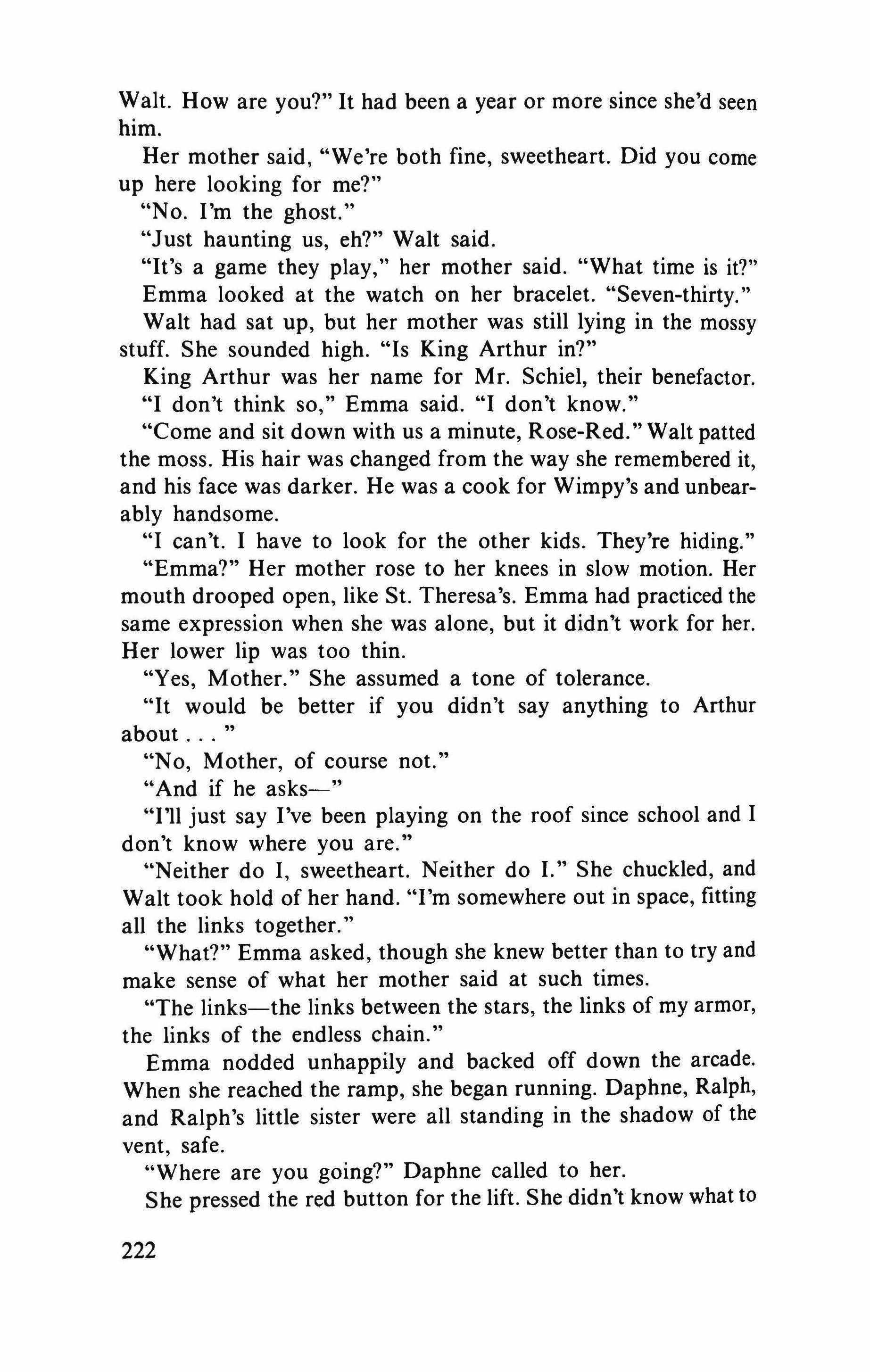
Walt. How are you?" It had been a year or more since she'd seen him.
Her mother said, "We're both fine, sweetheart. Did you come up here looking for me?"
"No. I'm the ghost."
"Just haunting us, eh?" Walt said.
"It's a game they play," her mother said. "What time is it?"
Emma looked at the watch on her bracelet. "Seven-thirty."
Walt had sat up, but her mother was still lying in the mossy stuff. She sounded high. "Is King Arthur in?"
King Arthur was her name for Mr. Schiel, their benefactor.
"I don't think so," Emma said. "I don't know."
"Come and sit down with us a minute, Rose-Red." Walt patted the moss. His hair was changed from the way she remembered it, and his face was darker. He was a cook for Wimpy's and unbearably handsome.
"I can't. I have to look for the other kids. They're hiding."
"Emma?" Her mother rose to her knees in slow motion. Her mouth drooped open, like St. Theresa's. Emma had practiced the same expression when she was alone, but it didn't work for her. Her lower lip was too thin.
"Yes, Mother." She assumed a tone of tolerance.
"It would be better if you didn't say anything to Arthur about "
"No, Mother, of course not."
"And if he asks-"
"111 just say I've been playing on the roof since school and I don't know where you are."
"Neither do I, sweetheart. Neither do I." She chuckled, and Walt took hold of her hand. "I'm somewhere out in space, fitting all the links together."
"What?" Emma asked, though she knew better than to try and make sense of what her mother said at such times.
"The links-the links between the stars, the links of my armor, the links of the endless chain."
Emma nodded unhappily and backed off down the arcade. When she reached the ramp, she began running. Daphne, Ralph, and Ralph's little sister were all standing in the shadow of the vent, safe.
"Where are you going?" Daphne called to her. She pressed the red button for the lift. She didn't know what to
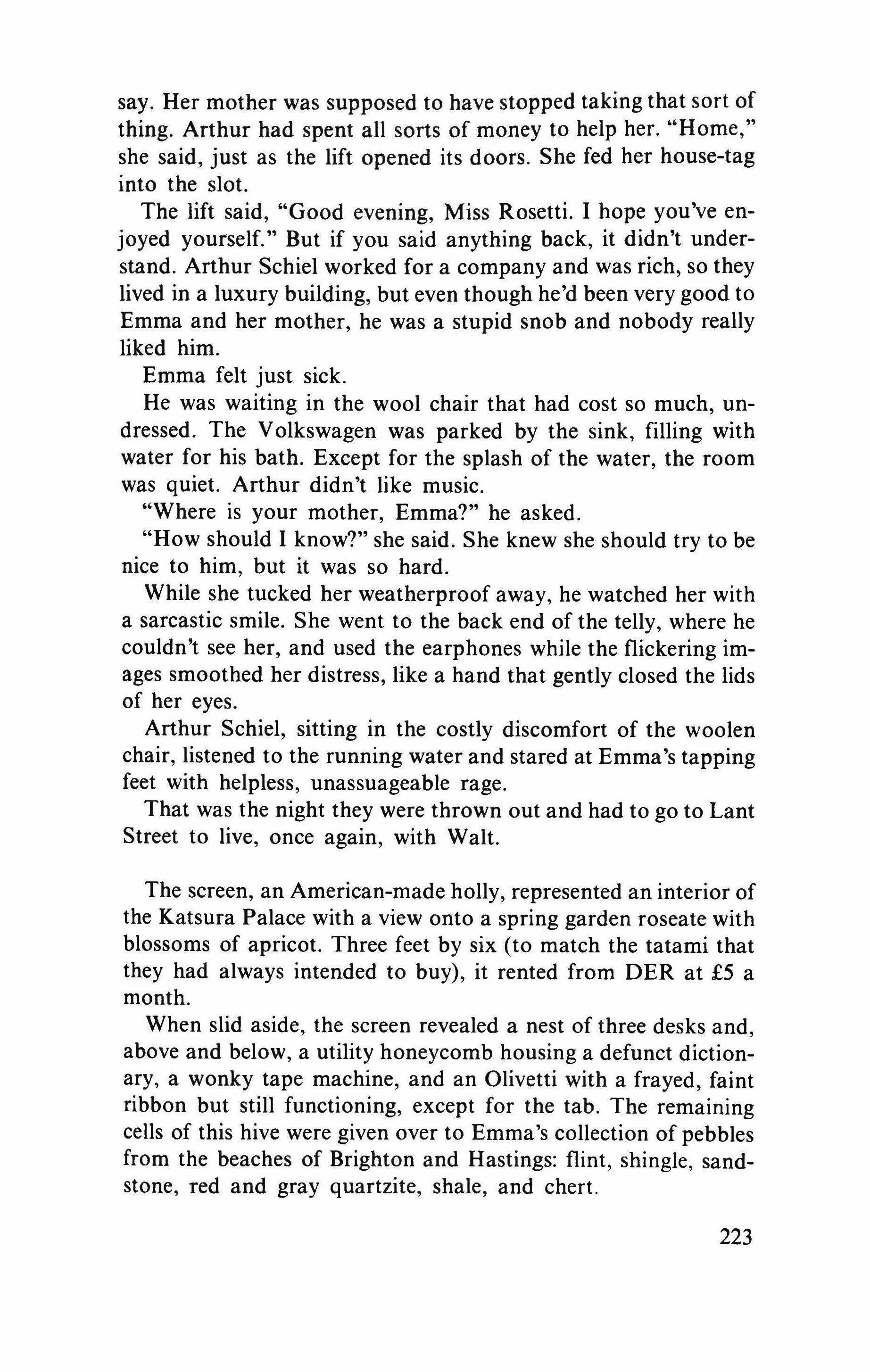
say. Her mother was supposed to have stopped taking that sort of thing. Arthur had spent all sorts of money to help her. "Home," she said, just as the lift opened its doors. She fed her house-tag into the slot.
The lift said, "Good evening, Miss Rosetti. I hope you've enjoyed yourself." But if you said anything back, it didn't understand. Arthur Schiel worked for a company and was rich, so they lived in a luxury building, but even though he'd been very good to Emma and her mother, he was a stupid snob and nobody really liked him.
Emma felt just sick.
He was waiting in the wool chair that had cost so much, undressed. The Volkswagen was parked by the sink, filling with water for his bath. Except for the splash of the water, the room was quiet. Arthur didn't like music.
"Where is your mother, Emma?" he asked.
"How should I know?" she said. She knew she should try to be nice to him, but it was so hard.
While she tucked her weatherproof away, he watched her with a sarcastic smile. She went to the back end of the telly, where he couldn't see her, and used the earphones while the flickering images smoothed her distress, like a hand that gently closed the lids of her eyes.
Arthur Schiel, sitting in the costly discomfort of the woolen chair, listened to the running water and stared at Emma's tapping feet with helpless, unassuageable rage.
That was the night they were thrown out and had to go to Lant Street to live, once again, with Walt.
The screen, an American-made holly, represented an interior of the Katsura Palace with a view onto a spring garden roseate with blossoms of apricot. Three feet by six (to match the tatami that they had always intended to buy), it rented from DER at £5 a month.
When slid aside, the screen revealed a nest of three desks and, above and below, a utility honeycomb housing a defunct dictionary, a wonky tape machine, and an Olivetti with a frayed, faint ribbon but still functioning, except for the tab. The remaining cells of this hive were given over to Emma's collection of pebbles from the beaches of Brighton and Hastings: flint, shingle, sandstone, red and gray quartzite, shale, and chert.
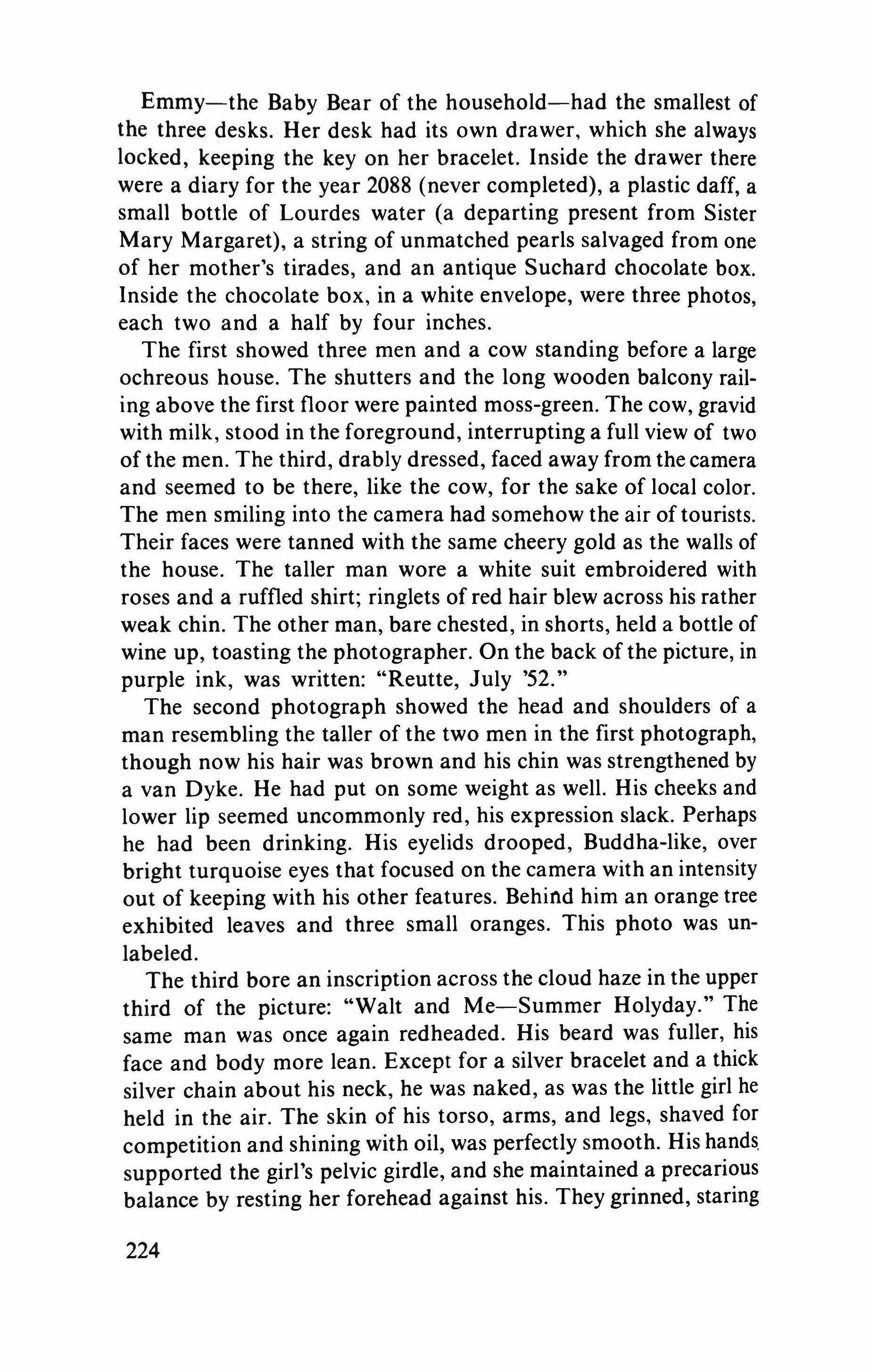
Emmy-the Baby Bear of the household-had the smallest of the three desks. Her desk had its own drawer, which she always locked, keeping the key on her bracelet. Inside the drawer there were a diary for the year 2088 (never completed), a plastic daff, a small bottle of Lourdes water (a departing present from Sister Mary Margaret), a string of unmatched pearls salvaged from one of her mother's tirades, and an antique Suchard chocolate box. Inside the chocolate box, in a white envelope, were three photos, each two and a half by four inches.
The first showed three men and a cow standing before a large ochreous house. The shutters and the long wooden balcony railing above the first floor were painted moss-green. The cow, gravid with milk, stood in the foreground, interrupting a full view of two of the men. The third, drably dressed, faced away from the camera and seemed to be there, like the cow, for the sake of local color. The men smiling into the camera had somehow the air of tourists. Their faces were tanned with the same cheery gold as the walls of the house. The taller man wore a white suit embroidered with roses and a ruffled shirt; ringlets of red hair blew across his rather weak chin. The other man, bare chested, in shorts, held a bottle of wine up, toasting the photographer. On the back of the picture, in purple ink, was written: "Reutte, July '52."
The second photograph showed the head and shoulders of a man resembling the taller of the two men in the first photograph, though now his hair was brown and his chin was strengthened by a van Dyke. He had put on some weight as well. His cheeks and lower lip seemed uncommonly red, his expression slack. Perhaps he had been drinking. His eyelids drooped, Buddha-like, over bright turquoise eyes that focused on the camera with an intensity out of keeping with his other features. Behind him an orange tree exhibited leaves and three small oranges. This photo was unlabeled.
The third bore an inscription across the cloud haze in the upper third of the picture: "Walt and Me-Summer Holyday." The same man was once again redheaded. His beard was fuller, his face and body more lean. Except for a silver bracelet and a thick silver chain about his neck, he was naked, as was the little girl he held in the air. The skin of his torso, arms, and legs, shaved for competition and shining with oil, was perfectly smooth. His hands, supported the girl's pelvic girdle, and she maintained a precarious balance by resting her forehead against his. They grinned, staring

into each other's eyes. In the middle distance, part of the promiscuous mass of bathers, Emma's mother could be discerned resting in a beach chair, modestly bikinied, her eyes averted from the playful pair in the foreground to regard the gray-green sea.
Often when she found herself alone in their two-room flat, Emma would slide away the screen, unlock the drawer, and take out the Suchard box. When she had finished looking at the photographs, she would kiss each in turn, lips pressed tightly together, before replacing them in the envelope. She was in love with Walt.
"Are there," old Mr. Harness asked, "any in the class who ?" The dry lips crumbled in an unspoken apology. The quick eyes, yellow as the basins of the school lav, caught her embarrassed glance and shifted away.
Would 1 have been silent, if he had asked? Emma wondered. Would I have faced the lions?
After all, even if they did find out she was a Catholic, they couldn't do anything worse than tease her a bit, the way they had at the other school.
"Of course," he mumbled, "my account may differ significantly from the what-would-you-say the official account of the Irish Church. It lacks the nihil obstat. Events such as these, possessing still some flavor of controversy, resist our efforts to order them by simple schemes."
Charmian Levin, sitting behind Emma, touched a penciltip to a knob of her spine. Emma stiffened and tucked in her blouse.
"History is never simple, of course, until we cease to care too terribly much. One might liken the mechanism of tolerance to the painter's trick of aerial perspective: with distance, we lose the edge and color of things. We gain, perhaps, the vista."
Charmian, who at fifteen was the oldest girl at Inverness, swiveled ninety degrees on her stool and, with a schooled gesture, fluttered the white banner of her hair. "Oh, August-such blague!"
The yellow eyes lowered to regard the girl's glasslike sandals. The old man wondered, with a small, sad spite, what part of his monthly salary they had cost.
"I was rather straying, wasn't I? To return, then, to the Papal Bull of 2034-"
Emma wrote in her notebook: "Papal Bull, 2034."
"-which was dubbed, almost immediately, the 'Mad Bull,' due to a short-lived effort, within the Roman hierarchy, to call the
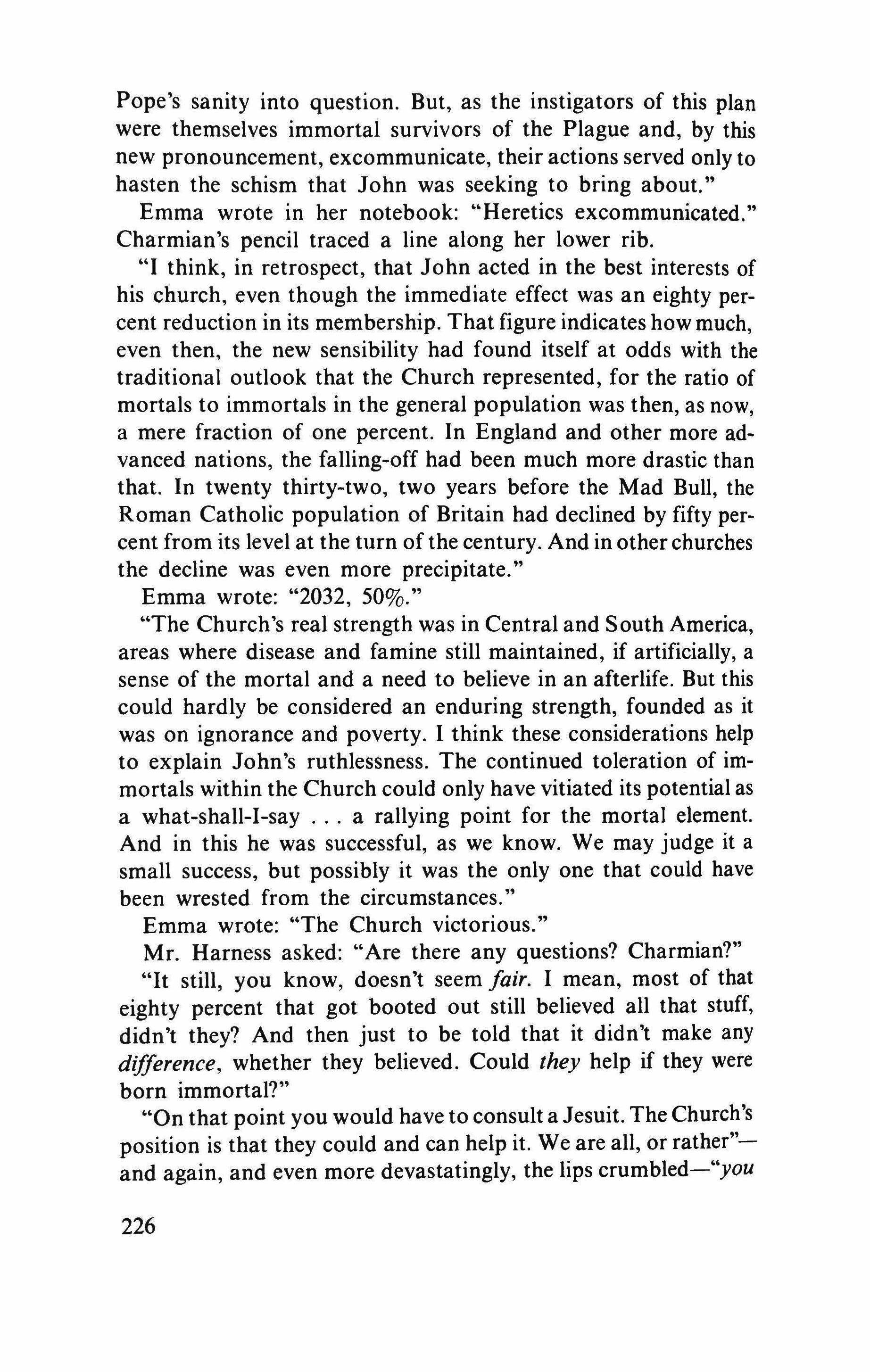
Pope's sanity into question. But, as the instigators of this plan were themselves immortal survivors of the Plague and, by this new pronouncement, excommunicate, their actions served only to hasten the schism that John was seeking to bring about."
Emma wrote in her notebook: "Heretics excommunicated." Charmian's pencil traced a line along her lower rib.
"I think, in retrospect, that John acted in the best interests of his church, even though the immediate effect was an eighty percent reduction in its membership. That figure indicates how much, even then, the new sensibility had found itself at odds with the traditional outlook that the Church represented, for the ratio of mortals to immortals in the general population was then, as now, a mere fraction of one percent. In England and other more advanced nations, the falling-off had been much more drastic than that. In twenty thirty-two, two years before the Mad Bull, the Roman Catholic population of Britain had declined by fifty percent from its level at the turn of the century. And in other churches the decline was even more precipitate."
Emma wrote: "2032, 50%."
"The Church's real strength was in Central and South America, areas where disease and famine still maintained, if artificially, a sense of the mortal and a need to believe in an afterlife. But this could hardly be considered an enduring strength, founded as it was on ignorance and poverty. I think these considerations help to explain John's ruthlessness. The continued toleration of immortals within the Church could only have vitiated its potential as a what-shall-I-say a rallying point for the mortal element. And in this he was successful, as we know. We may judge it a small success, but possibly it was the only one that could have been wrested from the circumstances."
Emma wrote: "The Church victorious."
Mr. Harness asked: "Are there any questions? Charmian?"
"It still, you know, doesn't seem fair. I mean, most of that eighty percent that got booted out still believed all that stuff, didn't they? And then just to be told that it didn't make any difference, whether they believed. Could they help if they were born immortal?"
"On that point you would have to consult a Jesuit. The Church's position is that they could and can help it. We are all, or rather"and again, and even more devastatingly, the lips crumbled-"you
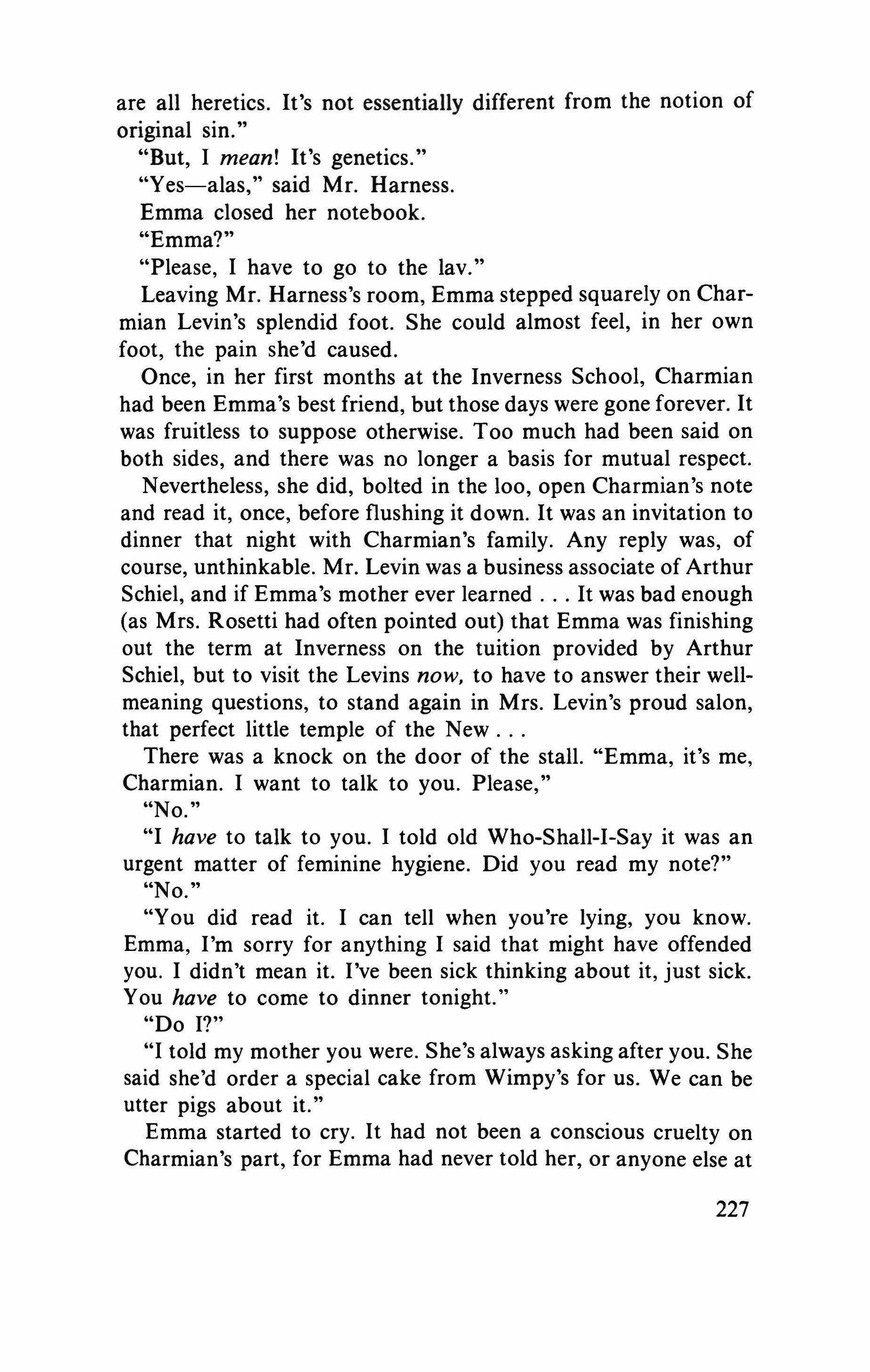
are all heretics. It's not essentially different from the notion of original sin."
"But, I mean! It's genetics."
"Yes-alas," said Mr. Harness. Emma closed her notebook.
"Emma?"
"Please, I have to go to the lav."
Leaving Mr. Harness's room, Emma stepped squarely on Charmian Levin's splendid foot. She could almost feel, in her own foot, the pain she'd caused.
Once, in her first months at the Inverness School, Charmian had been Emma's best friend, but those days were gone forever. It was fruitless to suppose otherwise. Too much had been said on both sides, and there was no longer a basis for mutual respect.
Nevertheless, she did, bolted in the 100, open Charmian's note and read it, once, before flushing it down. It was an invitation to dinner that night with Charmian's family. Any reply was, of course, unthinkable. Mr. Levin was a business associate of Arthur Schiel, and if Emma's mother ever learned It was bad enough (as Mrs. Rosetti had often pointed out) that Emma was finishing out the term at Inverness on the tuition provided by Arthur Schiel, but to visit the Levins now, to have to answer their wellmeaning questions, to stand again in Mrs. Levin's proud salon, that perfect little temple of the New
There was a knock on the door of the stall. "Emma, it's me, Charmian. I want to talk to you. Please,"
"No.
"I have to talk to you. I told old Who-Shall-I-Say it was an urgent matter of feminine hygiene. Did you read my note?"
"No.
"You did read it. I can tell when you're lying, you know. Emma, I'm sorry for anything I said that might have offended you. I didn't mean it. I've been sick thinking about it, just sick. You have to come to dinner tonight."
"Do I?"
"I told my mother you were. She's always asking after you. She said she'd order a special cake from Wimpy's for us. We can be utter pigs about it."
Emma started to cry. It had not been a conscious cruelty on Charmian's part, for Emma had never told her, or anyone else at
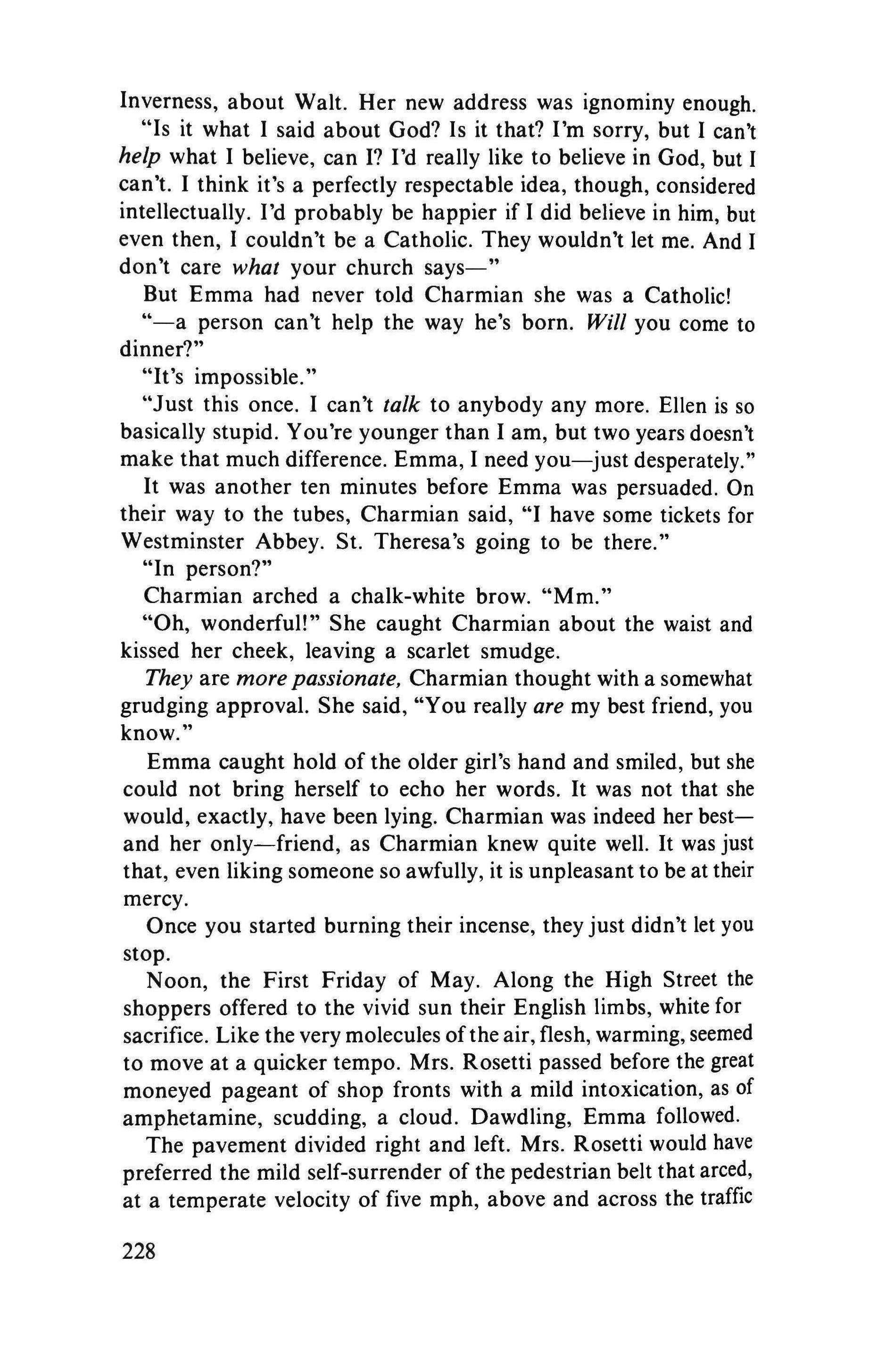
Inverness, about Walt. Her new address was ignominy enough.
"Is it what I said about God? Is it that? I'm sorry, but I can't help what I believe, can I? I'd really like to believe in God, but I can't. I think it's a perfectly respectable idea, though, considered intellectually. I'd probably be happier if I did believe in him, but even then, I couldn't be a Catholic. They wouldn't let me. And I don't care what your church says-"
But Emma had never told Charmian she was a Catholic! "-a person can't help the way he's born. Will you come to dinner?"
"It's impossible."
"Just this once. I can't talk to anybody any more. Ellen is so basically stupid. You're younger than I am, but two years doesn't make that much difference. Emma, I need you-just desperately."
It was another ten minutes before Emma was persuaded. On their way to the tubes, Charmian said, "I have some tickets for Westminster Abbey. St. Theresa's going to be there."
"In person?"
Charmian arched a chalk-white brow. "Mm."
"Oh, wonderful!" She caught Charmian about the waist and kissed her cheek, leaving a scarlet smudge.
They are more passionate, Charmian thought with a somewhat grudging approval. She said, "You really are my best friend, you know.
Emma caught hold of the older girl's hand and smiled, but she could not bring herself to echo her words. It was not that she would, exactly, have been lying. Charmian was indeed her bestand her only-friend, as Charmian knew quite well. It was just that, even liking someone so awfully, it is unpleasant to be at their mercy.
Once you started burning their incense, they just didn't let you stop.
Noon, the First Friday of May. Along the High Street the shoppers offered to the vivid sun their English limbs, white for sacrifice. Like the very molecules ofthe air, flesh, warming, seemed to move at a quicker tempo. Mrs. Rosetti passed before the great moneyed pageant of shop fronts with a mild intoxication, as of amphetamine, scudding, a cloud. Dawdling, Emma followed.
The pavement divided right and left. Mrs. Rosetti would have preferred the mild self-surrender of the pedestrian belt that arced, at a temperate velocity of five mph, above and across the traffic
stream, but Emma was able, with no stronger persuasion than a coaxing glance, to persuade her to take the left fork into the subway arcade. Fragments of advertising melodies lifted from, then sank into, the ground bass of the ventilation, and at intervals the murmuring twilight opened into abrupt, bright recessions of holography. The hollies were crude things usually (for it had always been more dowdy, this side Thames)-book-vending machines, a shower of gold celebrating Ascot Day, odorless images of food that boded to be as flavorless in the eating, and everywhere dense crowds of mannikins in polly and paper dresses, and cheap copies of the new African masks. Often the shops proclaimed themselves with nothing more than a painted sign-
BUY YOUR WET FISH HERE

or, even more sparely-
-an austerity that had been smart a decade before but was now, once again, merely drab.
There was, however, one shop in this arcade that could equal, in a small way, the brilliances of Oxford Street or Piccadilly, and it was this that had lured both mother and daughter down from the daylight world. The Bride Stripped Bare was admittedly only an affiliate-one of the smallest-of the great Fresno-based couturier, but here, in Southwark, it was something quite out of the way. Already, this early, a crowd was gathered before the two long windows, and Emma, who was small for her thirteen years, had difficulty worming her way to a vantage point.
The model this week was a Madagascan, shorter even than Emma (a fashion house of any pretension had to employ mortals), with the piquant name of Baiba. The model's close-cropped head seemed grotesquely large, though considered as a thing apart it would have been judged a very pretty head indeed, with a ravishing pug nose and, when she grinned, deltas of deep-grained wrinkles about her dark eyes. She could easily have been as old as Emma's mother, though, of course, she carried the burden of her years with much more grace. Four attendants, two men and two women, dressed her and undressed her in Stripped Bare swim wear, Stripped Bare evening dresses, and Stripped Bare pollies and origami, but the last item-an elaborate ensemble of mour-
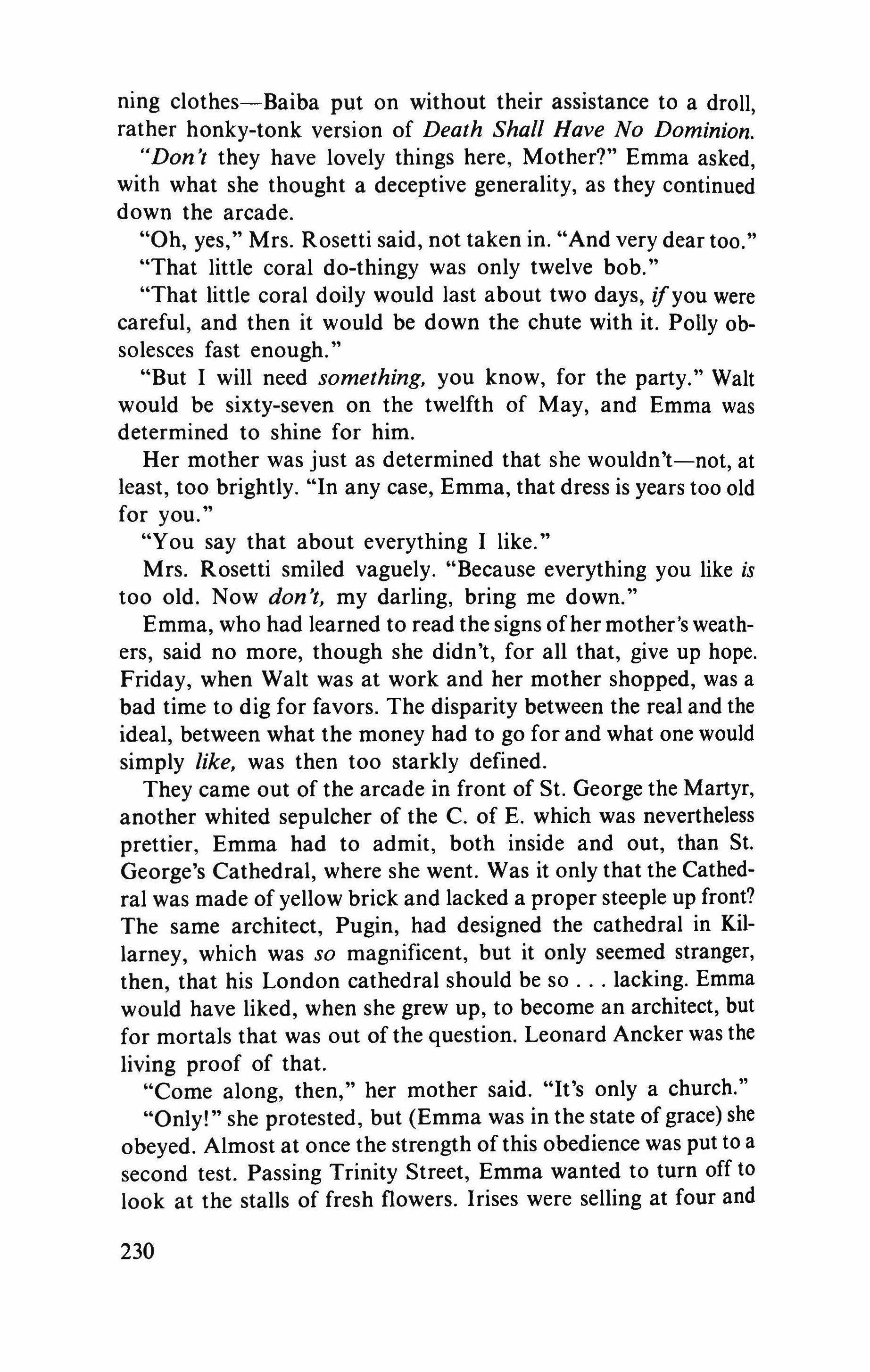
ning clothes-Baiba put on without their assistance to a droll, rather honky-tonk version of Death Shall Have No Dominion.
"Don't they have lovely things here, Mother?" Emma asked, with what she thought a deceptive generality, as they continued down the arcade.
"Oh, yes," Mrs. Rosetti said, not taken in. "And very dear too."
"That little coral do-thingy was only twelve bob."
"That little coral doily would last about two days, ifyou were careful, and then it would be down the chute with it. Polly obsolesces fast enough."
"But I will need something, you know, for the party." Walt would be sixty-seven on the twelfth of May, and Emma was determined to shine for him.
Her mother was just as determined that she wouldn't-not, at least, too brightly. "In any case, Emma, that dress is years too old for you."
"You say that about everything I like."
Mrs. Rosetti smiled vaguely. "Because everything you like is too old. Now don't, my darling, bring me down."
Emma, who had learned to read the signs ofher mother's weathers, said no more, though she didn't, for all that, give up hope. Friday, when Walt was at work and her mother shopped, was a bad time to dig for favors. The disparity between the real and the ideal, between what the money had to go for and what one would simply like, was then too starkly defined.
They came out of the arcade in front of St. George the Martyr, another whited sepulcher of the C. of E. which was nevertheless prettier, Emma had to admit, both inside and out, than St. George's Cathedral, where she went. Was it only that the Cathedral was made of yellow brick and lacked a proper steeple up front? The same architect, Pugin, had designed the cathedral in Killarney, which was so magnificent, but it only seemed stranger, then, that his London cathedral should be so lacking. Emma would have liked, when she grew up, to become an architect, but for mortals that was out of the question. Leonard Ancker was the living proof of that.
"Come along, then," her mother said. "It's only a church."
"Only!" she protested, but (Emma was in the state of grace) she obeyed. Almost at once the strength of this obedience was put to a second test. Passing Trinity Street, Emma wanted to turn off to look at the stalls of fresh flowers. Irises were selling at four and
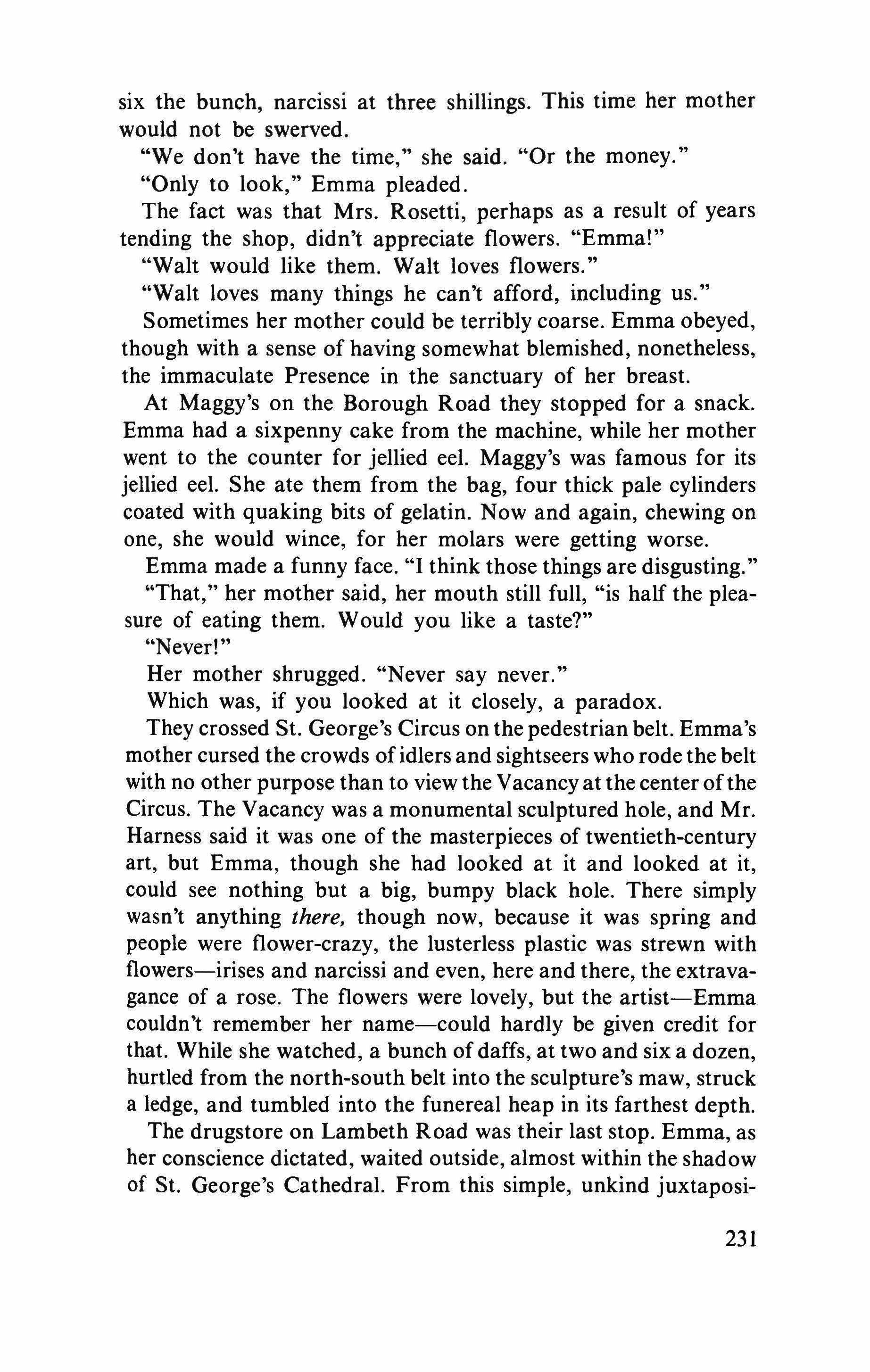
six the bunch, narcissi at three shillings. This time her mother would not be swerved.
"We don't have the time," she said. "Or the money."
"Only to look," Emma pleaded.
The fact was that Mrs. Rosetti, perhaps as a result of years tending the shop, didn't appreciate flowers. "Emma!"
"Walt would like them. Walt loves flowers."
"Walt loves many things he can't afford, including us."
Sometimes her mother could be terribly coarse. Emma obeyed, though with a sense of having somewhat blemished, nonetheless, the immaculate Presence in the sanctuary of her breast.
At Maggy's on the Borough Road they stopped for a snack. Emma had a sixpenny cake from the machine, while her mother went to the counter for jellied eel. Maggy's was famous for its jellied eel. She ate them from the bag, four thick pale cylinders coated with quaking bits of gelatin. Now and again, chewing on one, she would wince, for her molars were getting worse.
Emma made a funny face. "1 think those things are disgusting."
"That," her mother said, her mouth still full, "is half the pleasure of eating them. Would you like a taste?"
"Never!"
Her mother shrugged. "Never say never."
Which was, if you looked at it closely, a paradox. They crossed St. George's Circus on the pedestrian belt. Emma's mother cursed the crowds of idlers and sightseers who rode the belt with no other purpose than to view the Vacancy at the center ofthe Circus. The Vacancy was a monumental sculptured hole, and Mr. Harness said it was one of the masterpieces of twentieth-century art, but Emma, though she had looked at it and looked at it, could see nothing but a big, bumpy black hole. There simply wasn't anything there, though now, because it was spring and people were flower-crazy, the lusterless plastic was strewn with flowers-irises and narcissi and even, here and there, the extravagance of a rose. The flowers were lovely, but the artist-Emma couldn't remember her name-could hardly be given credit for that. While she watched, a bunch of daffs, at two and six a dozen, hurtled from the north-south belt into the sculpture's maw, struck a ledge, and tumbled into the funereal heap in its farthest depth. The drugstore on Lambeth Road was their last stop. Emma, as her conscience dictated, waited outside, almost within the shadow of St. George's Cathedral. From this simple, unkind juxtaposi-
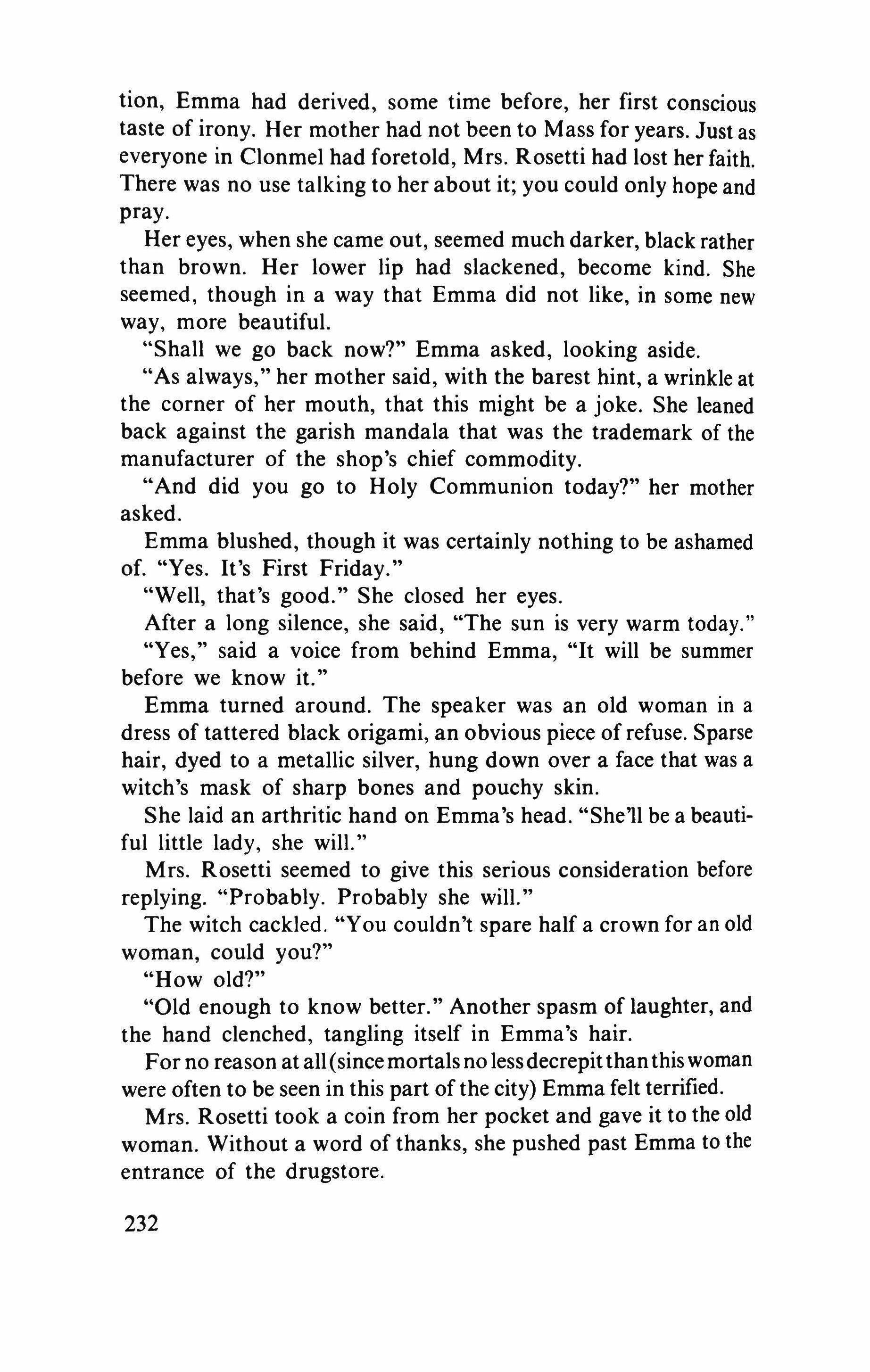
tion, Emma had derived, some time before, her first conscious taste of irony. Her mother had not been to Mass for years. Just as everyone in Cionmel had foretold, Mrs. Rosetti had lost her faith. There was no use talking to her about it; you could only hope and pray.
Her eyes, when she came out, seemed much darker, black rather than brown. Her lower lip had slackened, become kind. She seemed, though in a way that Emma did not like, in some new way, more beautiful.
"Shall we go back now?" Emma asked, looking aside.
"As always," her mother said, with the barest hint, a wrinkle at the corner of her mouth, that this might be a joke. She leaned back against the garish mandala that was the trademark of the manufacturer of the shop's chief commodity.
"And did you go to Holy Communion today?" her mother asked.
Emma blushed, though it was certainly nothing to be ashamed of. "Yes. It's First Friday."
"Well, that's good." She closed her eyes.
After a long silence, she said, "The sun is very warm today."
"Yes," said a voice from behind Emma, "It will be summer before we know it."
Emma turned around. The speaker was an old woman in a dress of tattered black origami, an obvious piece of refuse. Sparse hair, dyed to a metallic silver, hung down over a face that was a witch's mask of sharp bones and pouchy skin.
She laid an arthritic hand on Emma's head. "She'll be a beautiful little lady, she will."
Mrs. Rosetti seemed to give this serious consideration before replying. "Probably. Probably she will."
The witch cackled. "You couldn't spare half a crown for an old woman, could you?"
"How old?"
"Old enough to know better." Another spasm of laughter, and the hand clenched, tangling itself in Emma's hair.
For no reason at all(since mortals no lessdecrepitthanthis woman were often to be seen in this part of the city) Emma felt terrified.
Mrs. Rosetti took a coin from her pocket and gave it to the old woman. Without a word of thanks, she pushed past Emma to the entrance of the drugstore.
Mrs. Rosetti put a hand on her shoulder. "How old?" she insisted.
It was hard to tell if the woman meant her smile to be as nasty as it looked to Emma. "Fifty-four. And how old are you, my lovely?"
Mrs. Rosetti closed her eyes tightly. Emma took her hand and tried to pull her away.
The woman followed them along the pavement. "How old?" she shrilled. "How old?"
"Thirty-seven," Mrs. Rosetti said in a whisper.
"It wasn't you I meant!" The old woman lifted her head, triumphant in her malice, then returned and entered the shop.
They walked back to Lant Street in silence, following a roundabout path along the least busy streets. Mrs. Rosetti did not notice her daughter's tears.
The bitterness that Emma felt was insupportable, and she could not, at last, stifle the cry of outrage: "How could you! How could you do it!"
Mrs. Rosetti regarded Emma with puzzlement, almost with fear. "Do what, Emma?"
"How could you give her that money? It was enough for a dozen daffs. And you just threw it away!"
She slapped Emma's face.
"I hate you!" Emma shouted at her. "And Walt hates you too!"
After the girl had run away, Mrs. Rosetti took another twenty grams. She sat down, not knowing where, not caring, and let the spring sun invade the vast vacancies of her flesh, a beauty that tumbled into her farthest depth.
Dear Em,

May 6, Monday
It rains and then it rains and then it rains some more, and that seems to be all the news there is to tell about my holiday. Forgive mefor not writing sooner-I can't say there hasnt been time, but Ive been so depressed. Ellen is an impossible child and her father is only interested in his silly Ogham stones which are all exactly alike asfar as I can see. I cant imagine what the Natives must think of the three of us truging through these Bogs in chilly London cloathes to look at rocks!
All the time I have been thinking how different it all would be ifI were here with you. I really didn't know howfond we had become ofeach other until now, but perhaps I should only speakfor myself. (Is that a question? Ifit is you dont have to answer.) I do wish you were herejust for your own
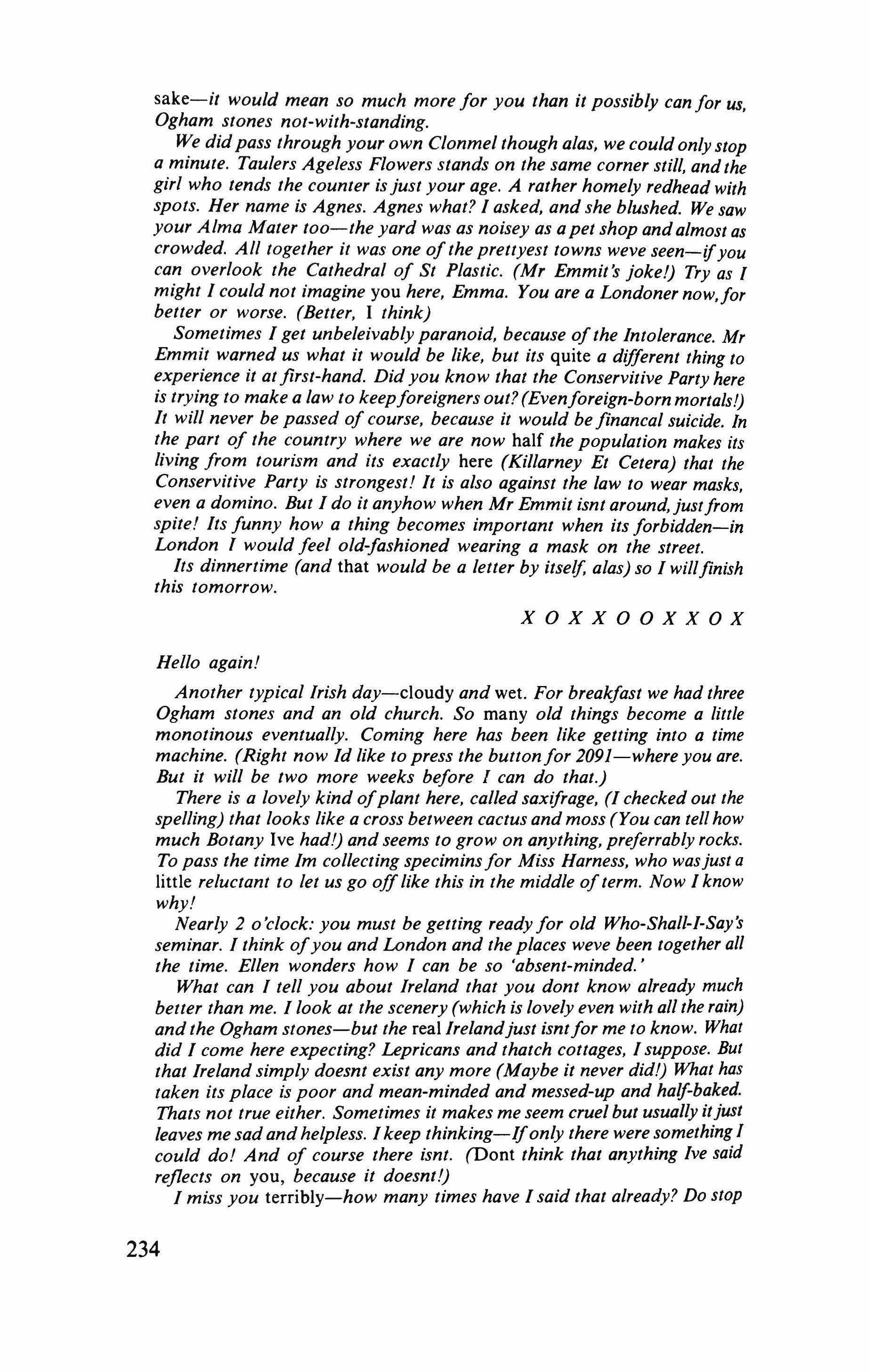
sake-it would mean so much more for you than it possibly can for us. Ogham stones not-with-standing. We didpass through your own Clonmel though alas. we couldonly stop a minute. Taulers Ageless Flowers stands on the same corner still. and the girl who tends the counter isjust your age. A rather homely redhead with spots. Her name is Agnes. Agnes what? I asked, and she blushed. We saw your Alma Mater too-the yard was as noisey as a pet shop andalmost as crowded. All together it was one of the prettyest towns weve seen-ifyou can overlook the Cathedral of St Plastic. (Mr Emmit's jokel) Try as [ might I could not imagine you here. Emma. You are a Londoner now.for better or worse. (Better. I think)
Sometimes I get unbeleivably paranoid. because ofthe Intolerance. Mr Emmit warned us what it would be like, but its quite a different thing to experience it at first-hand. Did you know that the Conservitive Party here is trying to make a law to keepforeigners out? (Evenforeign-bommortals!) It will never be passed of course. because it would befinancal suicide. In the part of the country where we are now half the population makes its living from tourism and its exactly here (Killarney Et Cetera) that the Conservitive Party is strongest! It is also against the law to wear masks. even a domino. But I do it anyhow when Mr Emmit isnt around.justfrom spite! Its funny how a thing becomes important when its forbidden-in London [ would feel old-fashioned wearing a mask on the street. Its dinnertime (and that would be a letter by itself, alas) so I willfinish this tomorrow.
Hello again!
Another typical Irish day-cloudy and wet. For breakfast we had three Ogham stones and an old church. So many old things become a little monotinous eventually. Coming here has been like getting into a time machine. (Right now Id like to press the buttonfor 2091-where you are. But it will be two more weeks before I can do that.)
There is a lovely kind ofplant here. called saxifrage, (I checked out the spelling) that looks like a cross between cactus and moss (You can tell how much Botany Ive had!) and seems to grow on anything. preferrably rocks.
To pass the time 1m collecting speciminsfor Miss Harness, who wasjust a little reluctant to let us go off like this in the middle of term. Now I know why!
Nearly 2 o'clock: you must be getting readyfor old Who-Shall-I-Say's seminar. I think ofyou and London and the places weve been together all the time. Ellen wonders how I can be so 'absent-minded.'
What can [ tell you about Ireland that you dont know already much better than me. I look at the scenery (which is lovely even with all the rain) and the Ogham stones-but the reallrelandjust isntfor me to know. What did I come here expecting? Lepricans and thatch cottages. I suppose. But that Ireland simply doesnt exist any more (Maybe it never didl) What has taken its place is poor and mean-minded and messed-up and half-baked. Thats not true either. Sometimes it makes me seem cruel but usually itjust leaves me sad and helpless. Ikeep thinking-Ifonly there were something I could do! And of course there isnt. (Dont think that anything lve said reflects on you, because it doesntl)
I miss you terribly-how many times have I said that already? Do stop
by and say hello to my mother ifyou have the chance. She really is your friend, you know. Explain why I havent written!
Yr devoted= Charmian
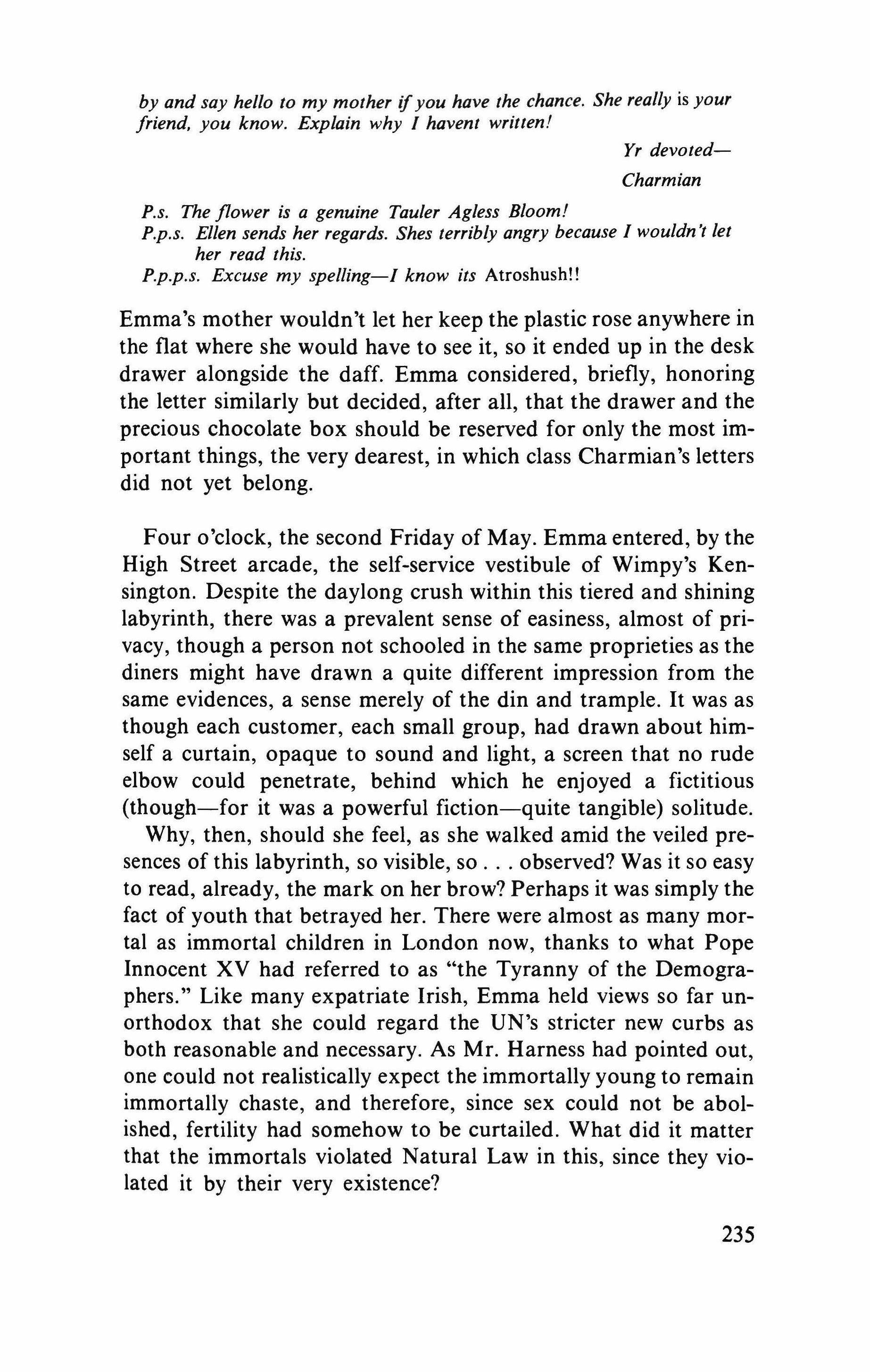
P.s. The flower is a genuine Tauler Agless Bloom!
P.p.s. Ellen sends her regards. Shes terribly angry because I wouldn't let her read this.
P.p.p.s. Excuse my spelling-l know its Atroshush!!
Emma's mother wouldn't let her keep the plastic rose anywhere in the flat where she would have to see it, so it ended up in the desk drawer alongside the daff. Emma considered, briefly, honoring the letter similarly but decided, after all, that the drawer and the precious chocolate box should be reserved for only the most important things, the very dearest, in which class Charmian's letters did not yet belong.
Four o'clock, the second Friday of May. Emma entered, by the High Street arcade, the self-service vestibule of Wimpy's Kensington. Despite the daylong crush within this tiered and shining labyrinth, there was a prevalent sense of easiness, almost of privacy, though a person not schooled in the same proprieties as the diners might have drawn a quite different impression from the same evidences, a sense merely of the din and trample. It was as though each customer, each small group, had drawn about himself a curtain, opaque to sound and light, a screen that no rude elbow could penetrate, behind which he enjoyed a fictitious (though-for it was a powerful fiction-quite tangible) solitude. Why, then, should she feel, as she walked amid the veiled presences of this labyrinth, so visible, so observed? Was it so easy to read, already, the mark on her brow? Perhaps it was simply the fact of youth that betrayed her. There were almost as many mortal as immortal children in London now, thanks to what Pope Innocent XV had referred to as "the Tyranny of the Demographers." Like many expatriate Irish, Emma held views so far unorthodox that she could regard the UN's stricter new curbs as both reasonable and necessary. As Mr. Harness had pointed out, one could not realistically expect the immortally young to remain immortally chaste, and therefore, since sex could not be abolished, fertility had somehow to be curtailed. What did it matter that the immortals violated Natural Law in this, since they violated it by their very existence?

It was unjust, of course, that the same strictures should be applied to Catholics against their conscience, but even so it wasn't hard to appreciate the immortals' view. There was so little room left, and what there was they wanted for themselves. They were, after all-and overwhelmingly-the majority, the great clamoring crowd in the Colosseum.
It came to her again, the sense of her own cowardice, her quick compliance. She would not be thinking such thoughts had she been in a state of grace.
Emma used Walt's spare ID to open the door to the corridor of privies operated by the catering division. All but two of the rooms were engaged (Fridays were a half holiday in Kensington), and in one of these the chamber orchestra from The Clean, Well-Lighted Place, Wimpy's third-floor dining hall, was taking its break. The flautist, Jorge, was a friend of Walt, but Emma had no wish to be recognized, for it was an indiscretion, if not actually against the rules, to be wandering in these regions without a reservation. Only the vestibule, where one served oneself and stood to eat, was open on a nonsubscription basis.
Ignoring the lift, Emma went down to the kitchen by the stairs. She paused at the bottom, as she might have held a gift box in her lap before opening it, perferring for the moment the pleasures of a mysterious potentiality to the real but diminished delight of the event. Then she went in.
A blast of spiced, steamy air passed over her face like a hot washrag. Walt, stripped to the waist, was pouring red peppers from a polly sack into a fierce little slicing machine. The glow of his naked back, the slow shift nf muscle as the sack was lifted higher, the very rag that bounc back his damp hair seemed to possess, in this sudden, unaccustomed vantage, a relevance to her own being-to, it almost seemed, her name-that would not have been revealed by a less vivid light at room temperature. It was as though this body, which he wore as consciously as other men wore clothes, had become articulate as speech-though a speech that was as yet foreign to her.
He turned and saw her. "Emma! What are you doing here?"
She tried not to seem to gape. "I "Is something wrong with Mary?"
At the sound of her mother's name the magic dissipated. "No, of course not. 1 sneaked in, just to visit." ("To visit you," she wanted to say.)
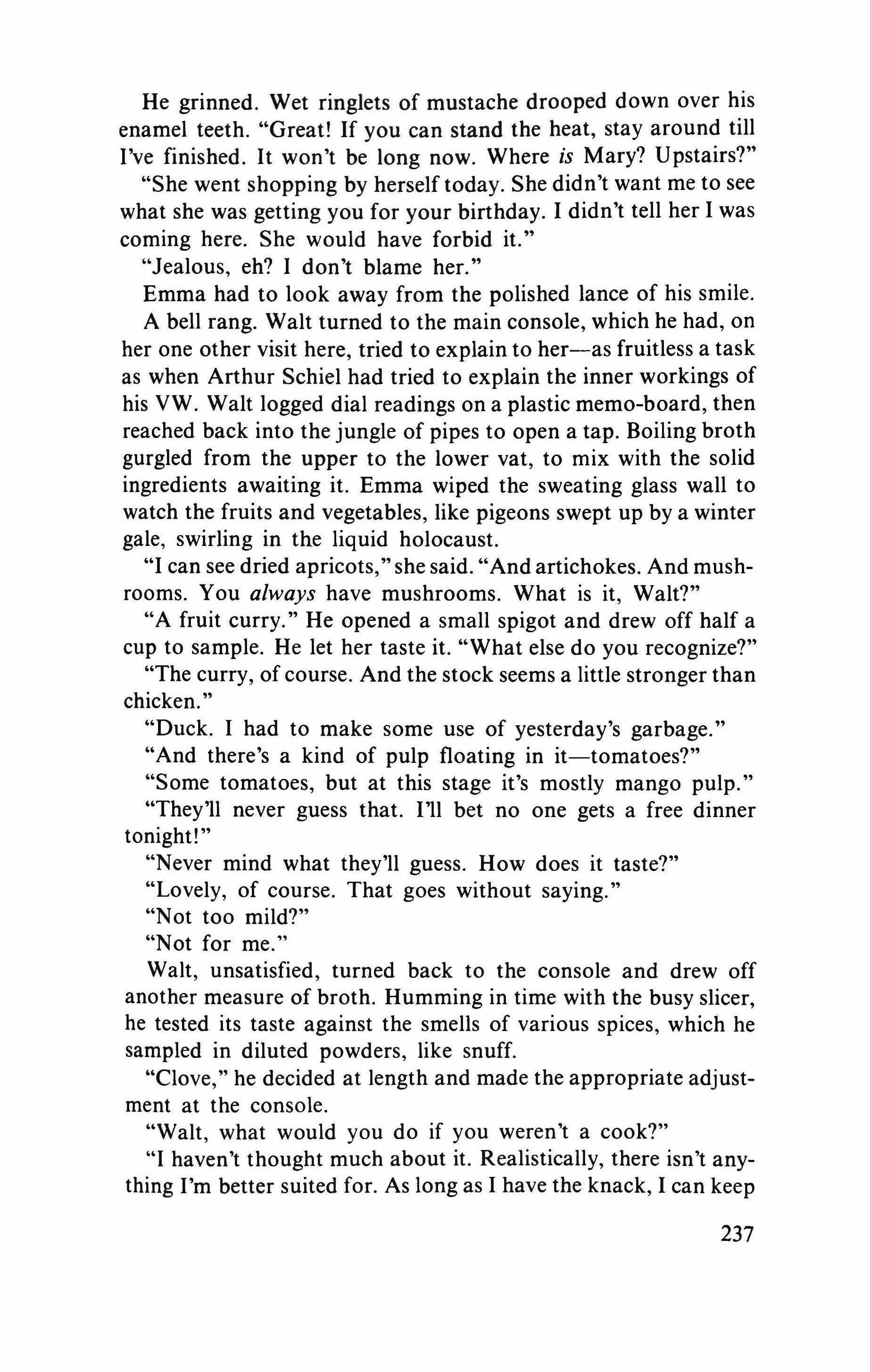
He grinned. Wet ringlets of mustache drooped down over his enamel teeth. "Great! If you can stand the heat, stay around till I've finished. It won't be long now. Where is Mary? Upstairs?"
"She went shopping by herselftoday. She didn't want me to see what she was getting you for your birthday. I didn't tell her I was coming here. She would have forbid it."
"Jealous, eh? I don't blame her."
Emma had to look away from the polished lance of his smile. A bell rang. Walt turned to the main console, which he had, on her one other visit here, tried to explain to her-as fruitless a task as when Arthur Schiel had tried to explain the inner workings of his VW. Walt logged dial readings on a plastic memo-board, then reached back into the jungle of pipes to open a tap. Boiling broth gurgled from the upper to the lower vat, to mix with the solid ingredients awaiting it. Emma wiped the sweating glass wall to watch the fruits and vegetables, like pigeons swept up by a winter gale, swirling in the liquid holocaust.
"I can see dried apricots," she said. "And artichokes. And mushrooms. You always have mushrooms. What is it, Walt?"
"A fruit curry." He opened a small spigot and drew off half a cup to sample. He let her taste it. "What else do you recognize?"
"The curry, of course. And the stock seems a little stronger than chicken."
"Duck. I had to make some use of yesterday's garbage."
"And there's a kind of pulp floating in it-tomatoes?"
"Some tomatoes, but at this stage it's mostly mango pulp."
"They'll never guess that. I'll bet no one gets a free dinner tonight!"
"Never mind what they'll guess. How does it taste?"
"Lovely, of course. That goes without saying."
"Not too mild?"
"Not for me."
Walt, unsatisfied, turned back to the console and drew off another measure of broth. Humming in time with the busy slicer, he tested its taste against the smells of various spices, which he sampled in diluted powders, like snuff.
"Clove," he decided at length and made the appropriate adjustment at the console.
"Walt, what would you do if you weren't a cook?"
"I haven't thought much about it. Realistically, there isn't anything I'm better suited for. As long as I have the knack, I can keep
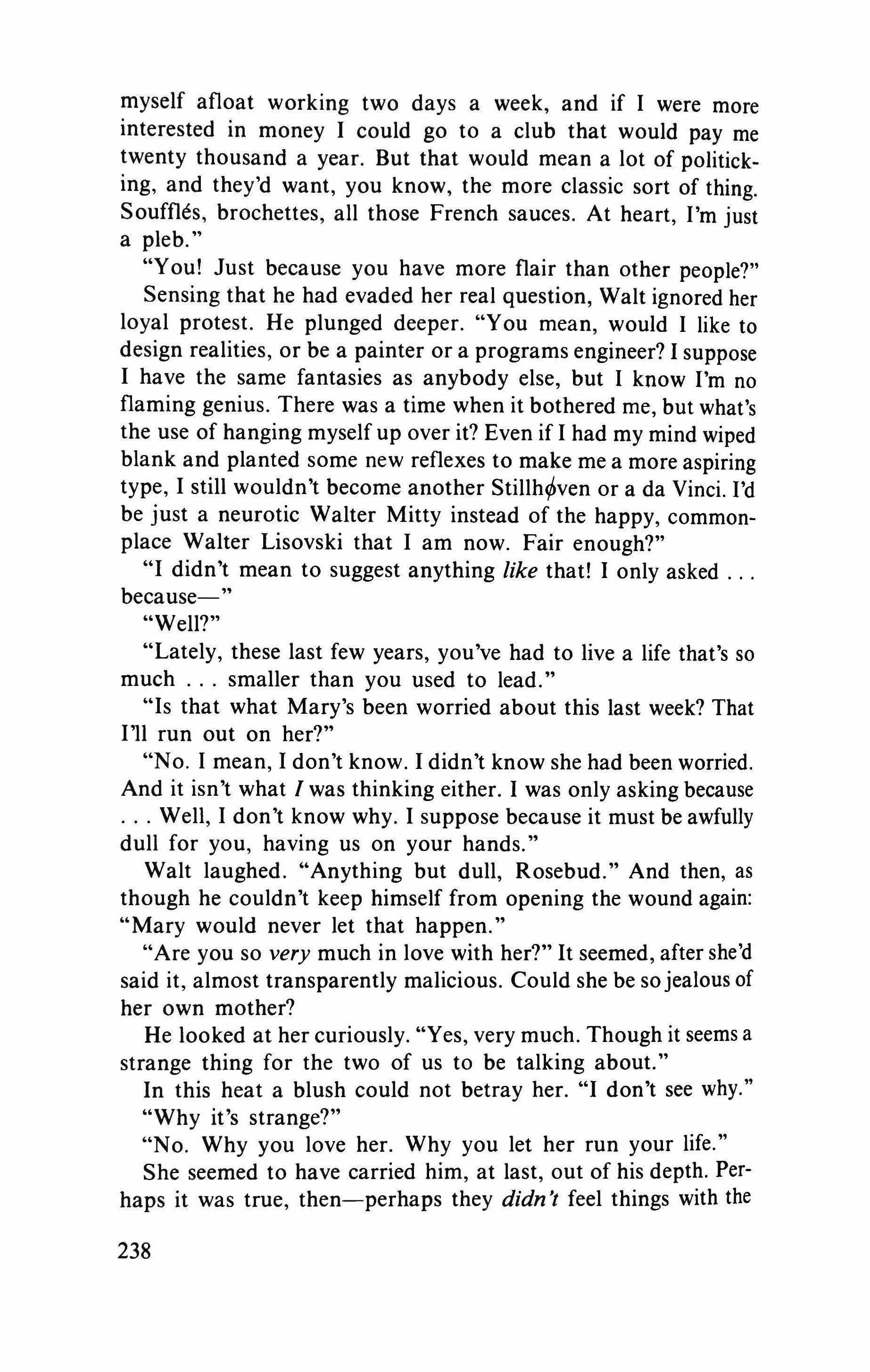
myself afloat working two days a week, and if I were more interested in money I could go to a club that would pay me twenty thousand a year. But that would mean a lot of politicking, and they'd want, you know, the more classic sort of thing. Souffles, brochettes, all those French sauces. At heart, I'm just a pleb."
"Yout Just because you have more flair than other people?"
Sensing that he had evaded her real question, Walt ignored her loyal protest. He plunged deeper. "You mean, would I like to design realities, or be a painter or a programs engineer? I suppose I have the same fantasies as anybody else, but I know I'm no flaming genius. There was a time when it bothered me, but what's the use of hanging myself up over it? Even if I had my mind wiped blank and planted some new reflexes to make me a more aspiring type, 1 still wouldn't become another Stillheven or a da Vinci. I'd be just a neurotic Walter Mitty instead of the happy, commonplace Walter Lisovski that 1 am now. Fair enough?"
"I didn't mean to suggest anything like that! I only asked because-"
"Well?"
"Lately, these last few years, you've had to live a life that's so much smaller than you used to lead."
"Is that what Mary's been worried about this last week? That 111 run out on her?"
"No. I mean, I don't know. I didn't know she had been worried. And it isn't what I was thinking either. I was only asking because Well, I don't know why. I suppose because it must be awfully dull for you, having us on your hands."
Walt laughed. "Anything but dull, Rosebud." And then, as though he couldn't keep himself from opening the wound again: "Mary would never let that happen."
"Are you so very much in love with her?" It seemed, after she'd said it, almost transparently malicious. Could she be so jealous of her own mother?
He looked at her curiously. "Yes, very much. Though it seems a strange thing for the two of us to be talking about."
In this heat a blush could not betray her. "I don't see why."
"Why it's strange?"
"N o. Why you love her. Why you let her run your life."
She seemed to have carried him, at last, out of his depth. Perhaps it was true, then-perhaps they didn't feel things with the
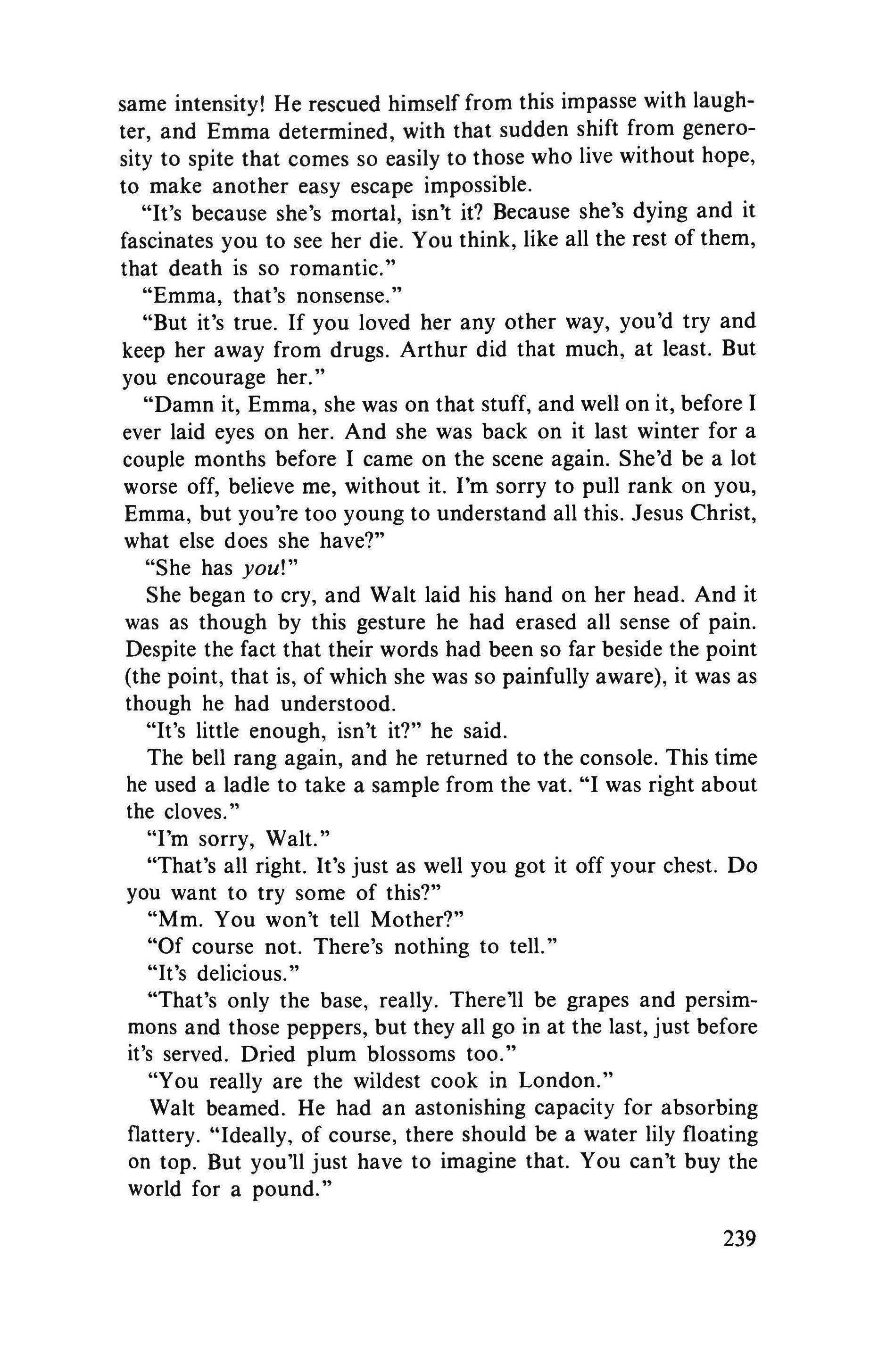
same intensity! He rescued himself from this impasse with laughter, and Emma determined, with that sudden shift from generosity to spite that comes so easily to those who live without hope, to make another easy escape impossible.
"It's because she's mortal, isn't it? Because she's dying and it fascinates you to see her die. You think, like all the rest of them, that death is so romantic."
"Emma, that's nonsense."
"But it's true. If you loved her any other way, you'd try and keep her away from drugs. Arthur did that much, at least. But you encourage her."
"Damn it, Emma, she was on that stuff, and well on it, before I ever laid eyes on her. And she was back on it last winter for a couple months before I came on the scene again. She'd be a lot worse off, believe me, without it. I'm sorry to pull rank on you, Emma, but you're too young to understand all this. Jesus Christ, what else does she have?"
"She has you!"
She began to cry, and Walt laid his hand on her head. And it was as though by this gesture he had erased all sense of pain. Despite the fact that their words had been so far beside the point (the point, that is, of which she was so painfully aware), it was as though he had understood.
"It's little enough, isn't it?" he said.
The bell rang again, and he returned to the console. This time he used a ladle to take a sample from the vat. "I was right about the cloves."
"I'm sorry, Walt."
"That's all right. It's just as well you got it off your chest. Do you want to try some of this?"
"Mm. You won't tell Mother?"
"Of course not. There's nothing to tell."
"It's delicious."
"That's only the base, really. There'll be grapes and persimmons and those peppers, but they all go in at the last, just before it's served. Dried plum blossoms too."
"You really are the wildest cook in London."
Walt beamed. He had an astonishing capacity for absorbing flattery. "Ideally, of course, there should be a water lily floating on top. But you'll just have to imagine that. You can't buy the world for a pound."
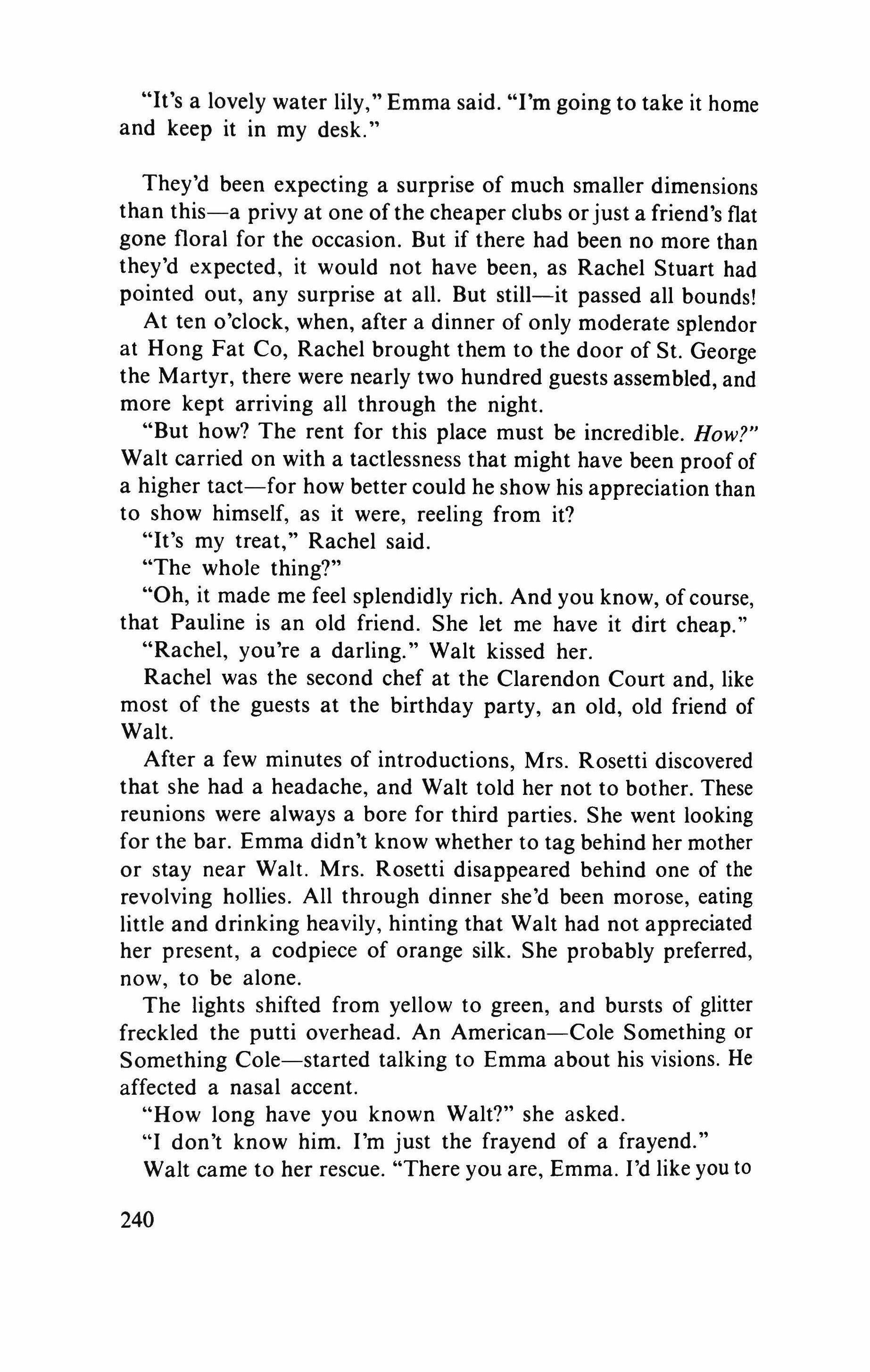
"It's a lovely water lily," Emma said. "I'm going to take it home and keep it in my desk."
They'd been expecting a surprise of much smaller dimensions than this-a privy at one of the cheaper clubs or just a friend's flat gone floral for the occasion. But if there had been no more than they'd expected, it would not have been, as Rachel Stuart had pointed out, any surprise at all. But still-it passed all bounds!
At ten o'clock, when, after a dinner of only moderate splendor at Hong Fat Co, Rachel brought them to the door of St. George the Martyr, there were nearly two hundred guests assembled, and more kept arriving all through the night.
"But how? The rent for this place must be incredible. How?" Walt carried on with a tactlessness that might have been proof of a higher tact-for how better could he show his appreciation than to show himself, as it were, reeling from it?
"It's my treat," Rachel said.
"The whole thing?"
"Oh, it made me feel splendidly rich. And you know, of course, that Pauline is an old friend. She let me have it dirt cheap."
"Rachel, you're a darling." Walt kissed her.
Rachel was the second chef at the Clarendon Court and, like most of the guests at the birthday party, an old, old friend of Walt.
After a few minutes of introductions, Mrs. Rosetti discovered that she had a headache, and Walt told her not to bother. These reunions were always a bore for third parties. She went looking for the bar. Emma didn't know whether to tag behind her mother or stay near Walt. Mrs. Rosetti disappeared behind one of the revolving hollies. All through dinner she'd been morose, eating little and drinking heavily, hinting that Walt had not appreciated her present, a codpiece of orange silk. She probably preferred, now, to be alone.
The lights shifted from yellow to green, and bursts of glitter freckled the putti overhead. An American-Cole Something or Something Cole-started talking to Emma about his visions. He affected a nasal accent.
"How long have you known Walt?" she asked.
"I don't know him. I'm just the frayend of a frayend."
Walt came to her rescue. "There you are, Emma. I'd like you to
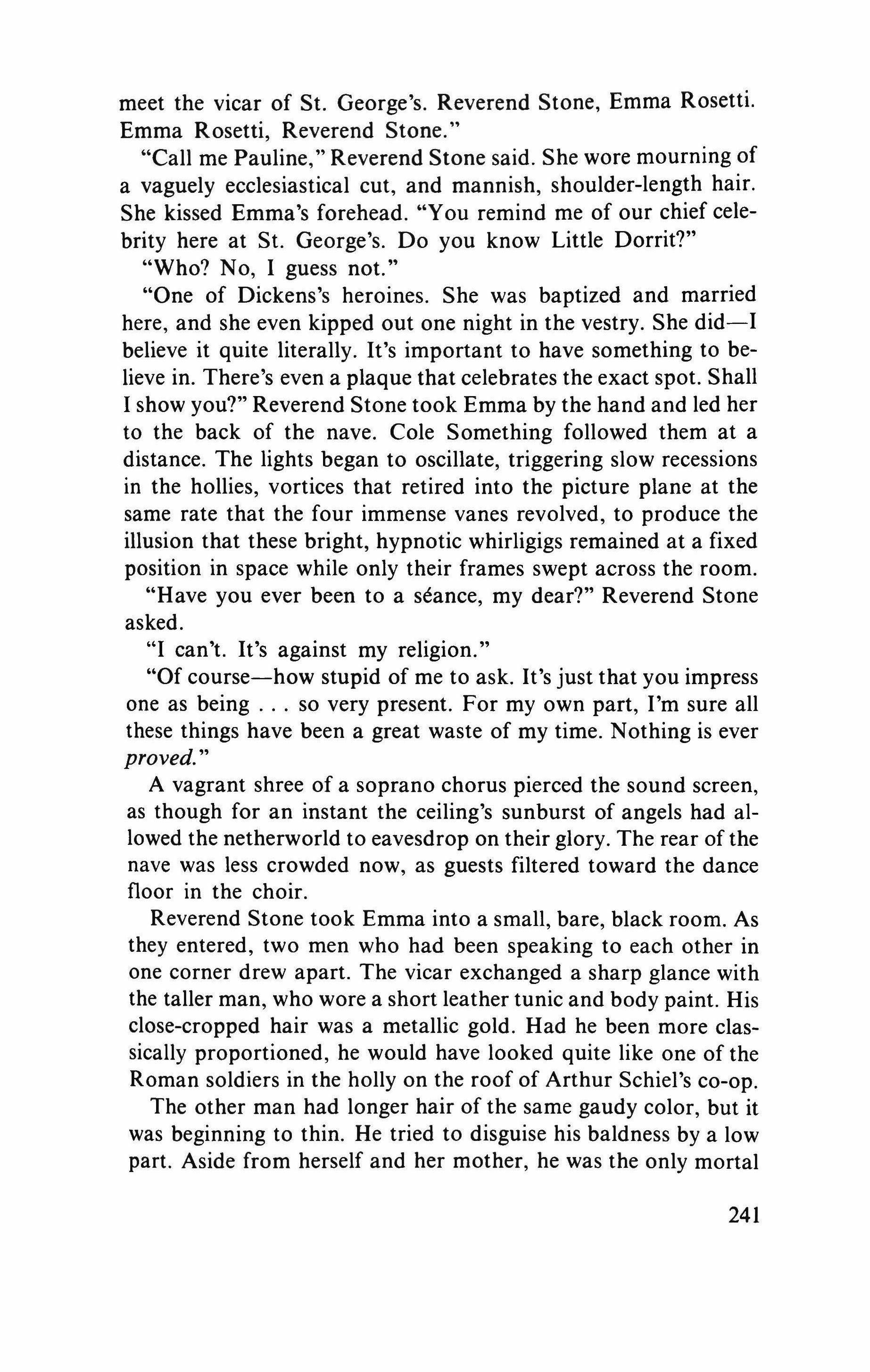
meet the vicar of St. George's. Reverend Stone, Emma Rosetti. Emma Rosetti, Reverend Stone."
"Call me Pauline," Reverend Stone said. She wore mourning of a vaguely ecclesiastical cut, and mannish, shoulder-length hair. She kissed Emma's forehead. "You remind me of our chief celebrity here at St. George's. Do you know Little Dorrit?"
"Who? No, I guess not."
"One of Dickens's heroines. She was baptized and married here, and she even kipped out one night in the vestry. She did-I believe it quite literally. It's important to have something to believe in. There's even a plaque that celebrates the exact spot. Shall I show you?" Reverend Stone took Emma by the hand and led her to the back of the nave. Cole Something followed them at a distance. The lights began to oscillate, triggering slow recessions in the hollies, vortices that retired into the picture plane at the same rate that the four immense vanes revolved, to produce the illusion that these bright, hypnotic whirligigs remained at a fixed position in space while only their frames swept across the room.
"Have you ever been to a seance, my dear?" Reverend Stone asked.
"I can't. It's against my religion."
"Of course-how stupid of me to ask. It's just that you impress one as being so very present. For my own part, I'm sure all these things have been a great waste of my time. Nothing is ever proved."
A vagrant shree of a soprano chorus pierced the sound screen, as though for an instant the ceiling's sunburst of angels had allowed the netherworld to eavesdrop on their glory. The rear of the nave was less crowded now, as guests filtered toward the dance floor in the choir.
Reverend Stone took Emma into a small, bare, black room. As they entered, two men who had been speaking to each other in one corner drew apart. The vicar exchanged a sharp glance with the taller man, who wore a short leather tunic and body paint. His close-cropped hair was a metallic gold. Had he been more classically proportioned, he would have looked quite like one of the Roman soldiers in the holly on the roof of Arthur Schiel's co-op. The other man had longer hair of the same gaudy color, but it was beginning to thin. He tried to disguise his baldness by a low part. Aside from herself and her mother, he was the only mortal

Emma had seen tonight, though there might well have been many more; lacking clear signs of aging, she could seldom tell.
"Pauline," the Roman soldier said.
"Well, well," said Reverend Stone. "Emma, I'd like you to meet Mr. Stone. Mr. Stone is my husband. Miss Rosetti is here with our guest of honor."
"Charming," said Mr. Stone. He stooped to kiss Emma's cheek wetly. Righting himself, he glanced sideways, indicating with a minimum effort his companion. "Michael Divine."
Michael Divine nodded as from a great distance. By a common instinct, their eyes did not meet, his focusing on the twining flowers of her dress, Emma's on the silver chain about his wrist, on the face of which were engraved two words: "My Name."
"Would you excuse us a minute, Love? There's something I must discuss with my husband."
Michael Divine glanced about the small black room with a dejected nervousness, as though seeking a prompter that would unreel his script.
"I'm told," Emma began, with an exquisite sense ofthe flatness of it, "that Little Dorrit slept in this very room."
Michael Divine frowned. "Who?"
This time it was Cole Something who was her rescuer. "Excuse me if I'm intruding. I came to ask if you'd like to dayunce."
"Immensely," Emma said, though she'd promised her mother she wouldn't, eyen with Walt.
As they moved toward the choir the crowd became thicker and noisier. Then, stepping through the sound screen, Emma was overwhelmed by the speakers' massy, juggernaut beat. Cole Something took a firm hold of her hand and led her up the three steps to the glowing drumhead of the dance floor, which was, this early in the evening, still static. He got down on his hands and knees.
"Oh no," Emma said. "I don't do that."
A lie, for she had learned the ritus quadrupedus only a few weeks before from Charmian, a sin that still-for she could not go near a confessional simply from the shame of it-burdened and blackened her soul.
They danced with a decorum that, by its very singularity, seemed to attract attention. Emma began to regret her lapse, but Cole insisted that he was having a grand old time. He smirked.
Across the floor Emma could see her mother dancing with
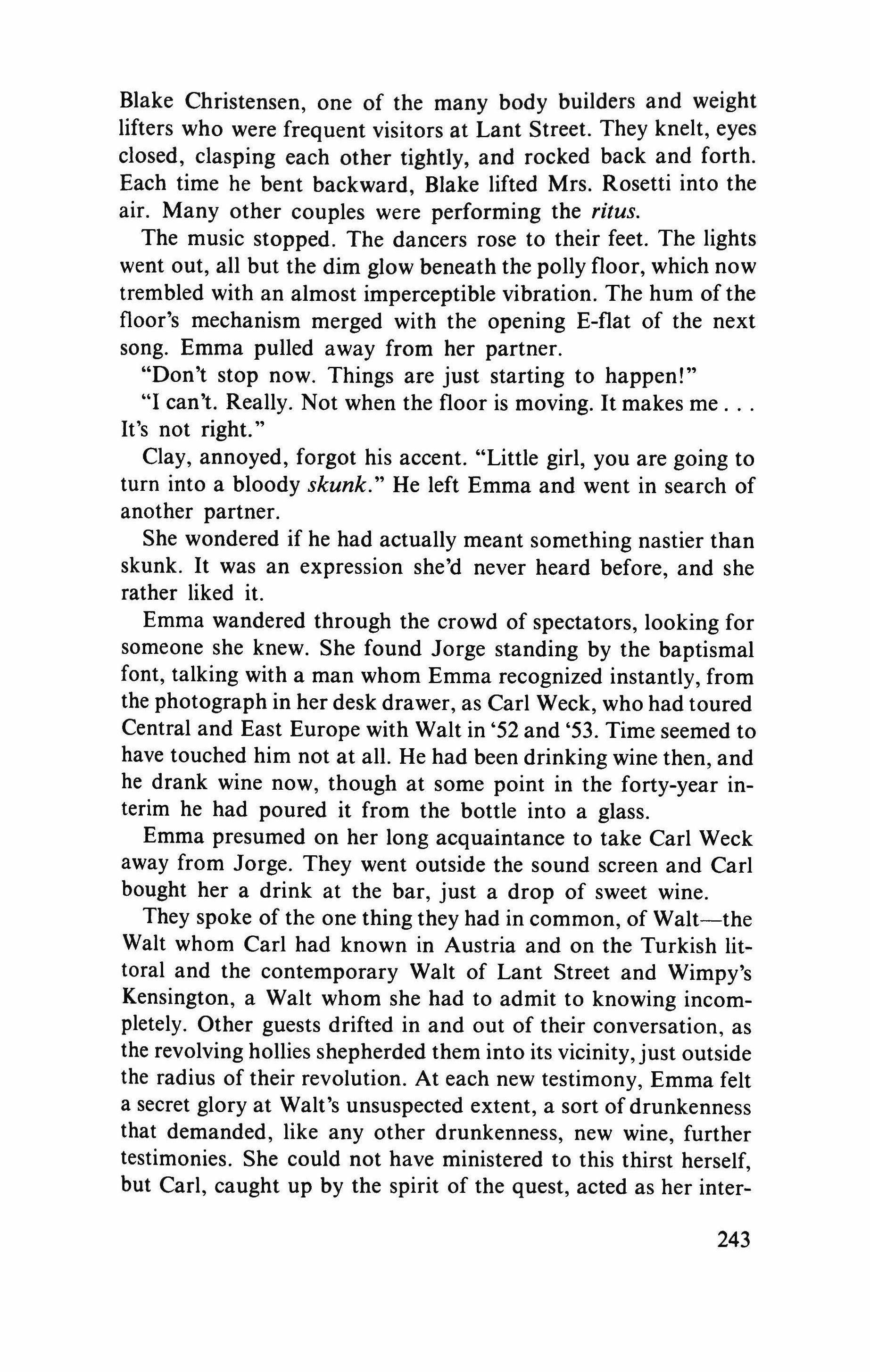
Blake Christensen, one of the many body builders and weight lifters who were frequent visitors at Lant Street. They knelt, eyes closed, clasping each other tightly, and rocked back and forth. Each time he bent backward, Blake lifted Mrs. Rosetti into the air. Many other couples were performing the ritus.
The music stopped. The dancers rose to their feet. The lights went out, all but the dim glow beneath the polly floor, which now trembled with an almost imperceptible vibration. The hum of the floor's mechanism merged with the opening E-flat of the next song. Emma pulled away from her partner.
"Don't stop now. Things are just starting to happen!"
"I can't. Really. Not when the floor is moving. It makes me It's not right."
Clay, annoyed, forgot his accent. "Little girl, you are going to turn into a bloody skunk." He left Emma and went in search of another partner.
She wondered if he had actually meant something nastier than skunk. It was an expression she'd never heard before, and she rather liked it.
Emma wandered through the crowd of spectators, looking for someone she knew. She found Jorge standing by the baptismal font, talking with a man whom Emma recognized instantly, from the photograph in her desk drawer, as Carl Week, who had toured Central and East Europe with Walt in '52 and '53. Time seemed to have touched him not at all. He had been drinking wine then, and he drank wine now, though at some point in the forty-year interim he had poured it from the bottle into a glass.
Emma presumed on her long acquaintance to take Carl Week away from Jorge. They went outside the sound screen and Carl bought her a drink at the bar, just a drop of sweet wine.
They spoke of the one thing they had in common, of Walt-the Walt whom Carl had known in Austria and on the Turkish littoral and the contemporary Walt of Lant Street and Wimpy's Kensington, a Walt whom she had to admit to knowing incompletely. Other guests drifted in and out of their conversation, as the revolving hollies shepherded them into its vicinity, just outside the radius of their revolution. At each new testimony, Emma felt a secret glory at Walt's unsuspected extent, a sort of drunkenness that demanded, like any other drunkenness, new wine, further testimonies. She could not have ministered to this thirst herself, but Carl, caught up by the spirit of the quest, acted as her inter-
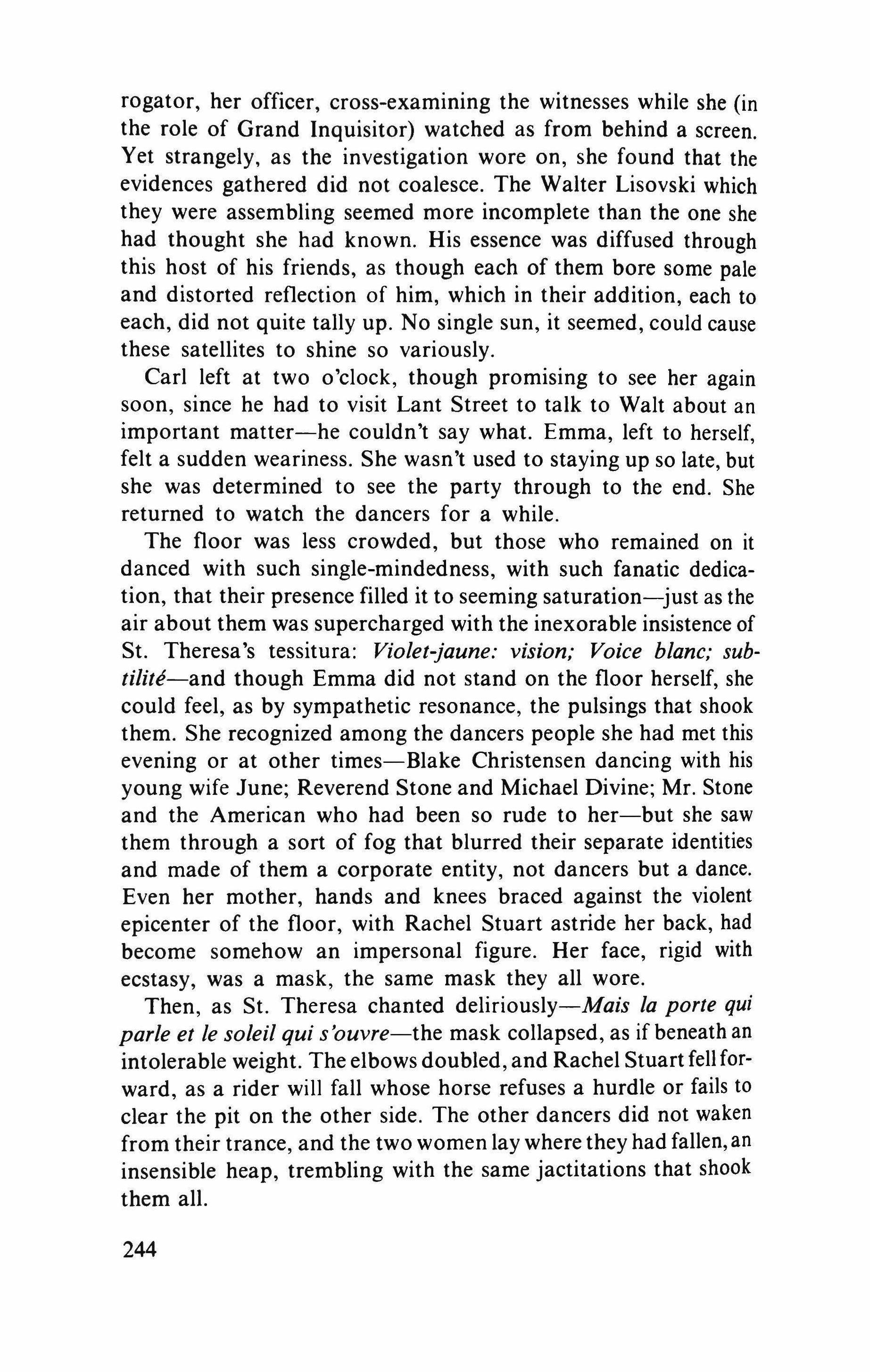
rogator, her officer, cross-examining the witnesses while she (in the role of Grand Inquisitor) watched as from behind a screen. Yet strangely, as the investigation wore on, she found that the evidences gathered did not coalesce. The Walter Lisovski which they were assembling seemed more incomplete than the one she had thought she had known. His essence was diffused through this host of his friends, as though each of them bore some pale and distorted reflection of him, which in their addition, each to each, did not quite tally up. No single sun, it seemed, could cause these satellites to shine so variously.
Carl left at two o'clock, though promising to see her again soon, since he had to visit Lant Street to talk to Walt about an important matter-he couldn't say what. Emma, left to herself, felt a sudden weariness. She wasn't used to staying up so late, but she was determined to see the party through to the end. She returned to watch the dancers for a while.
The floor was less crowded, but those who remained on it danced with such single-mindedness, with such fanatic dedication, that their presence filled it to seeming saturation-just as the air about them was supercharged with the inexorable insistence of St. Theresa's tessitura: Violet-jaune: vision; Voice blanc; subtUite-and though Emma did not stand on the floor herself, she could feel, as by sympathetic resonance, the pulsings that shook them. She recognized among the dancers people she had met this evening or at other times-Blake Christensen dancing with his young wife June; Reverend Stone and Michael Divine; Mr. Stone and the American who had been so rude to her-but she saw them through a sort of fog that blurred their separate identities and made of them a corporate entity, not dancers but a dance. Even her mother, hands and knees braced against the violent epicenter of the floor, with Rachel Stuart astride her back, had become somehow an impersonal figure. Her face, rigid with ecstasy, was a mask, the same mask they all wore.
Then, as St. Theresa chanted deliriously-Mais la porte qui parle et Ie solei! qui s 'ouvre-the mask collapsed, as if beneath an intolerable weight. The elbows doubled, and Rachel Stuart fell forward, as a rider will fall whose horse refuses a hurdle or fails to clear the pit on the other side. The other dancers did not waken from their trance, and the two women lay where they had fallen, an insensible heap, trembling with the same jactitations that shook them all.
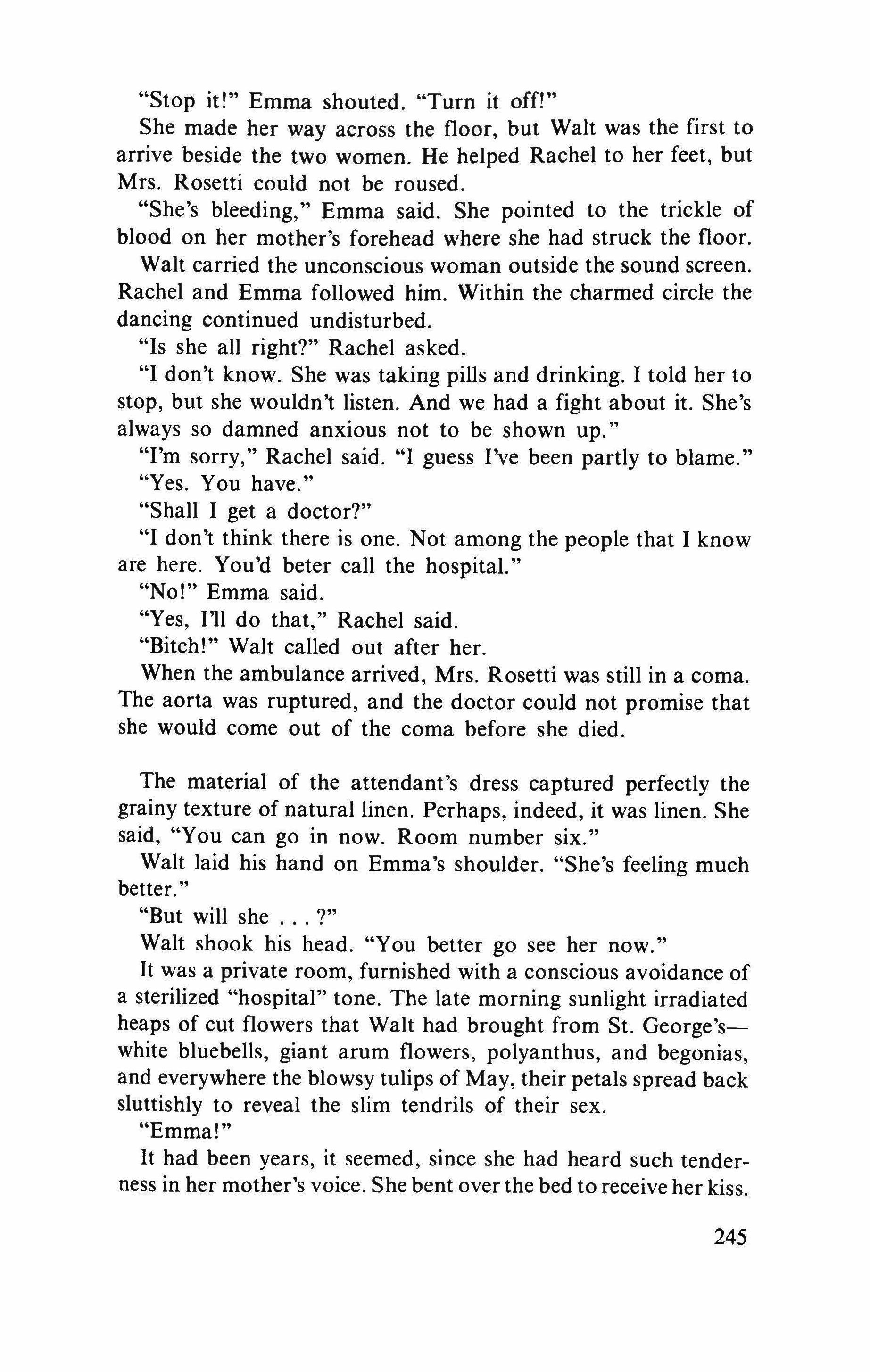
"Stop it!" Emma shouted. "Turn it off!"
She made her way across the floor, but Walt was the first to arrive beside the two women. He helped Rachel to her feet, but Mrs. Rosetti could not be roused.
"She's bleeding," Emma said. She pointed to the trickle of blood on her mother's forehead where she had struck the floor.
Walt carried the unconscious woman outside the sound screen. Rachel and Emma followed him. Within the charmed circle the dancing continued undisturbed.
"Is she all right?" Rachel asked.
"I don't know. She was taking pills and drinking. I told her to stop, but she wouldn't listen. And we had a fight about it. She's always so damned anxious not to be shown up."
"I'm sorry," Rachel said. "I guess I've been partly to blame."
"Yes. You have."
"Shall I get a doctor?"
"I don't think there is one. Not among the people that I know are here. You'd beter call the hospital."
"No!" Emma said.
"Yes, I'll do that," Rachel said.
"Bitch!" Walt called out after her.
When the ambulance arrived, Mrs. Rosetti was still in a coma. The aorta was ruptured, and the doctor could not promise that she would come out of the coma before she died.
The material of the attendant's dress captured perfectly the grainy texture of natural linen. Perhaps, indeed, it was linen. She said, "You can go in now. Room number six."
Walt laid his hand on Emma's shoulder. "She's feeling much better.
"But will she ?"
Walt shook his head. "You better go see her now."
It was a private room, furnished with a conscious avoidance of a sterilized "hospital" tone. The late morning sunlight irradiated heaps of cut flowers that Walt had brought from St. George'swhite bluebells, giant arum flowers, polyanthus, and begonias, and everywhere the blowsy tulips of May, their petals spread back sluttishly to reveal the slim tendrils of their sex.
"Emma!"
It had been years, it seemed, since she had heard such tenderness in her mother's voice. She bent over the bed to receive her kiss.

"Well, then, cry-but try to stop soon, because I want you to hear what I have to say. Why don't you sit on the edge of the bed? I won't feel I have to talk so loud. Did you speak to Arthur?"
"I tried to, early this morning, but he wouldn't let me in. I told him what had happened, what the doctor said, but hejust He was nasty to me."
"I told you he would be. It doesn't matter."
"But I had to try. It seems like such a little money, really."
"It's huge, Emma. Walt would have to work for three years to make that much."
"The way he works now. But he told me himself that if he went to a better place he could earn twenty thousand in one year. A year! A year doesn't mean anything to them."
"You didn't say that to him, did you? You didn't ask him to do that?"
"No. But he must have thought of it himself."
"You must promise that you won't. Ever."
Emma nodded. "I promise."
Mrs. Rosetti smiled, then turned to regard the sunlit orange and lavender stripes of the wall. After a long silence, she said, "Really, you know, I don't want the operation. It's not at all certain to be a success-even if I'd gone in to surgery last night. And if they sewed me up, what then? What would I be? An invalid. I'd have to worry about climbing stairs, about what I ate, about everything. I wouldn't want to live like that. I never wanted to end up as another old hag on the street, and now I won't.
"Please don't talk like that," Emma pleaded.
"No, my darling, hear me out. It's been such a long time since we've been honest with each other. I've not been a very good mother, but that doesn't fill me with any large regret. I don't think, if I had it to do over again, I'd do it any differently. Going to live with Arthur-perhaps that was a mistake. I didn't love him. I do love Walt. He has such a perfect sense of what the rules are. But I don't have to explain Walt to you, do I? You love him too."
"No. I mean, yes."
"He's so lovely, isn't he? And I wouldn't want to be with him, unless Well, I wouldn't want to bore him. One has no right to bore other people, least of all the people one loves. I wonder
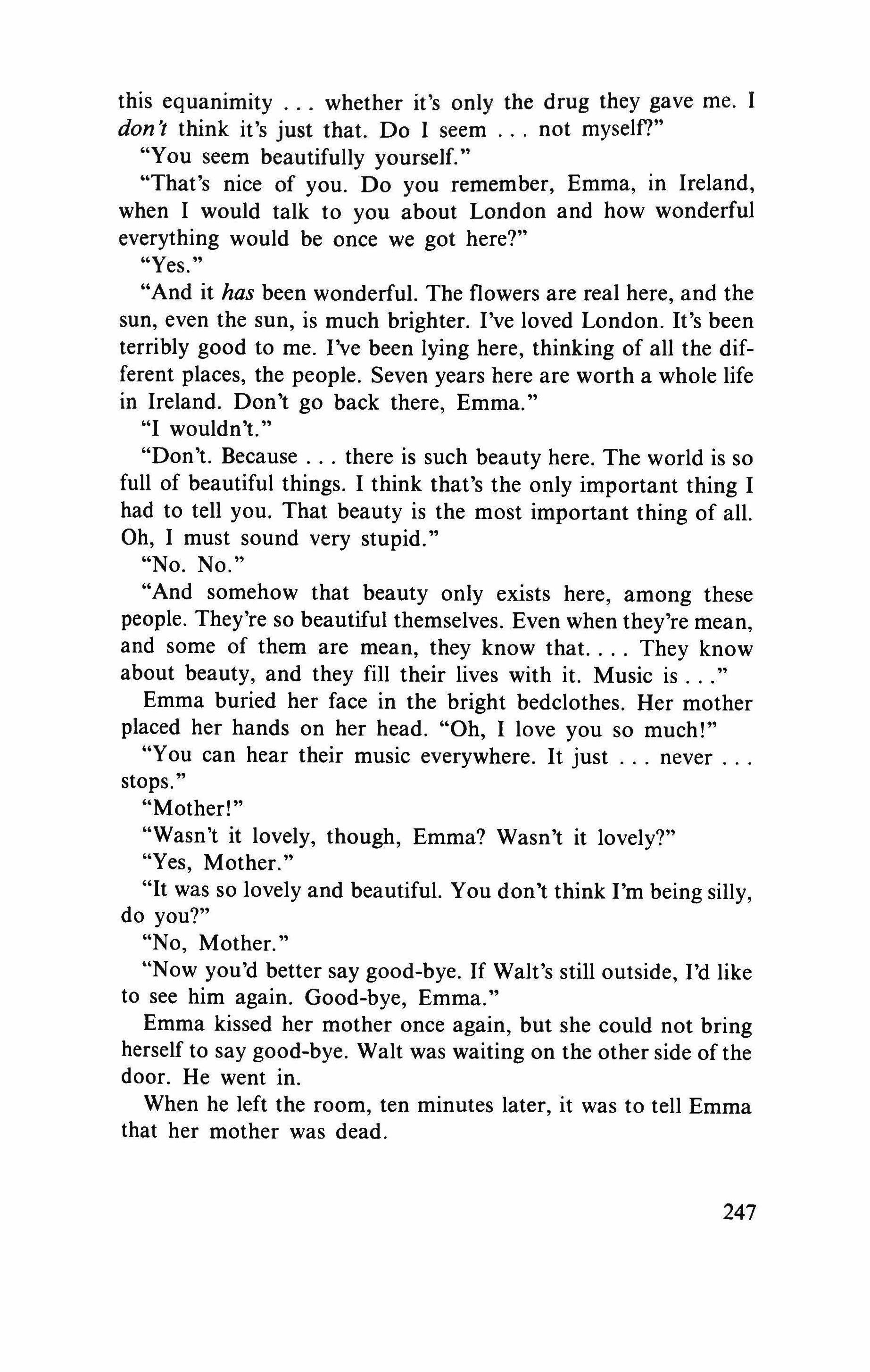
this equanimity whether it's only the drug they gave me. don '( think it's just that. Do I seem not myself?"
"You seem beautifully yourself."
"That's nice of you. Do you remember, Emma, in Ireland, when I would talk to you about London and how wonderful everything would be once we got here?"
"Yes.
"And it has been wonderful. The flowers are real here, and the sun, even the sun, is much brighter. I've loved London. It's been terribly good to me. I've been lying here, thinking of all the different places, the people. Seven years here are worth a whole life in Ireland. Don't go back there, Emma."
"I wouldn't."
"Don't. Because there is such beauty here. The world is so full of beautiful things. I think that's the only important thing I had to tell you. That beauty is the most important thing of all. Oh, I must sound very stupid."
"No. No."
"And somehow that beauty only exists here, among these people. They're so beautiful themselves. Even when they're mean, and some of them are mean, they know that. They know about beauty, and they fill their lives with it. Music is Emma buried her face in the bright bedclothes. Her mother placed her hands on her head. "Oh, I love you so much!"
"You can hear their music everywhere. It just never stops."
"Mother!"
"Wasn't it lovely, though, Emma? Wasn't it lovely?"
"Yes, Mother."
"It was so lovely and beautiful. You don't think I'm being silly, do you?"
"No, Mother."
"Now you'd better say good-bye. If Walt's still outside, I'd like to see him again. Good-bye, Emma."
Emma kissed her mother once again, but she could not bring herself to say good-bye. Walt was waiting on the other side of the door. He went in.
When he left the room, ten minutes later, it was to tell Emma that her mother was dead.

They went home together in a taxi, but they did not speak to each other until the next afternoon, after the cremation. They had gone to a small restaurant for coffee.
"Are you going away for long?" she asked.
Though he had said nothing about it, she had seen him packing his two bags. It was a subject that they could not very well avoid.
"Yes. For a long while, I think."
"Where?"
"To Belize. It's on the Caribbean near Guatemala, beneath the Yucatan. Carl Week can get me a job there. I've never lived in the tropics; it should be interesting. In any case, with Mary dead, I don't want to stay in London any longer. The job came at the right time."
"And do you want ?"
"You? I'm sorry, Emma. It wouldn't be a fit place. They're still pretty primitive. And poor."
"I wouldn't mind that. It wouldn't be poorer than Ireland."
"No, really. It would be the wrong thing to do."
"Walt, I love you. If you want, I'll become your mistress."
"You're a sweetheart, Rosebud." He lifted her hand to kiss the tips of her fingers. "And I love you too. But I'd be a pretty rotten bastard if I let you do that. Or if I let myself do it."
"Is that why you're going away?"
"That's one of the reasons."
"But what will I do?"
"I've written a letter to your cousin in Ireland. What's her name? Mrs. Anckers. I explained what happened to your mother asked her if she would, uh, take you back. Or find some place for you, maybe with another relative."
"I won't do that. I won't go back. I promised Mother that I wouldn't. And I don't want to."
"You wouldn't have to stay there forever."
"I just won't."
"Well, anyhow, you can stay on at Lant Street till you've made up your mind. I'm subletting the big room to some friends of mine, but you can have the small room you have now until the end of the year. And I've left money with Reverend Stone. She11 send you a weekly check for as long as you need it, or until it runs out. If you're careful you should be able to stretch it out for a year. I didn't tell the Relief Board, because I promised Mary I wouldn't. But if things get bad, you could go to them yourself."
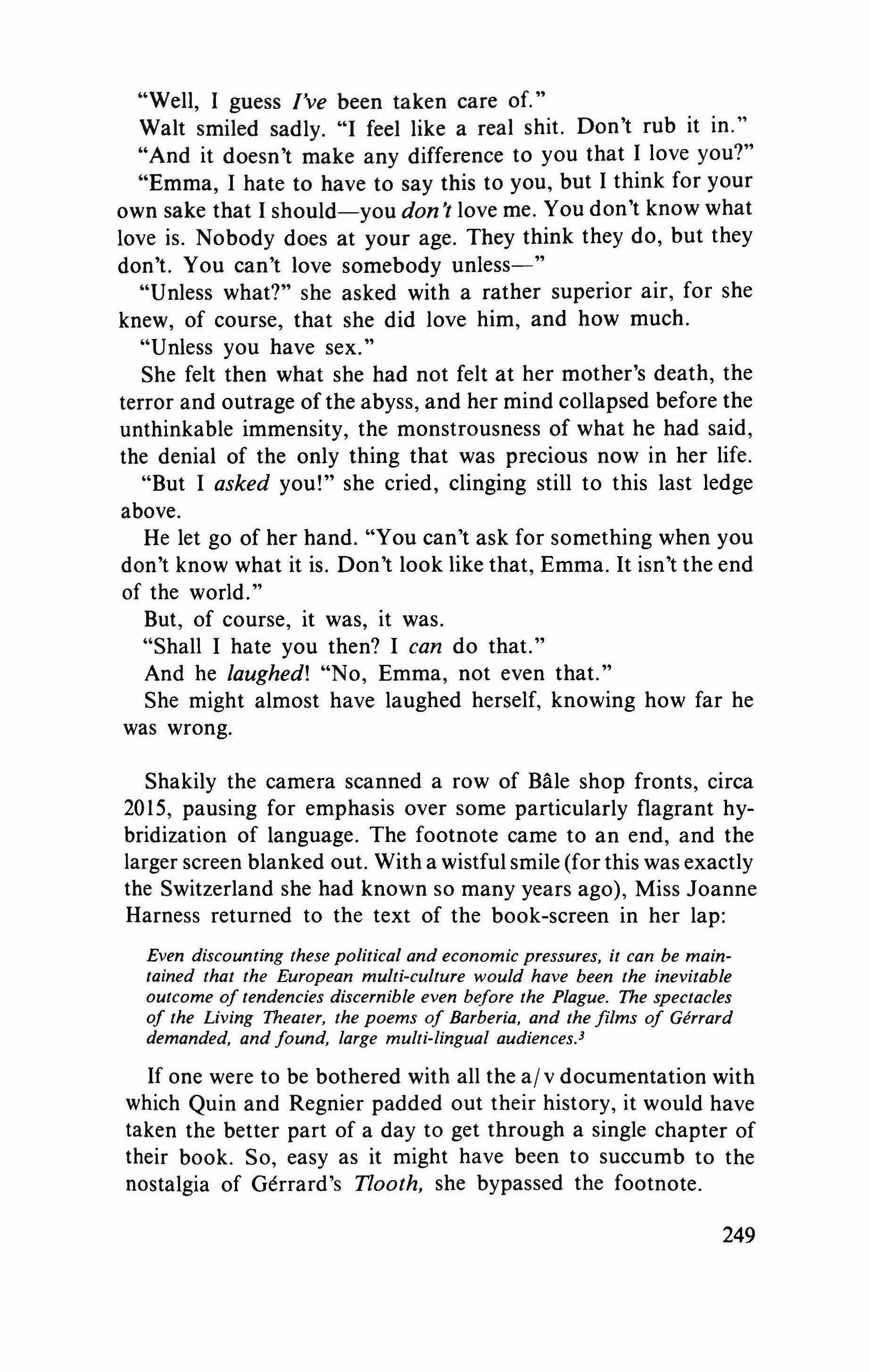
"Well, 1 guess I've been taken care of."
Walt smiled sadly. "I feel like a real shit. Don't rub it in."
"And it doesn't make any difference to you that I love you?"
"Emma, 1 hate to have to say this to you, but I think for your own sake that 1 should-you don't love me. You don't know what love is. Nobody does at your age. They think they do, but they don't. You can't love somebody unless-"
"Unless what?" she asked with a rather superior air, for she knew, of course, that she did love him, and how much.
"Unless you have sex."
She felt then what she had not felt at her mother's death, the terror and outrage of the abyss, and her mind collapsed before the unthinkable immensity, the monstrousness of what he had said, the denial of the only thing that was precious now in her life.
"But 1 asked you!" she cried, clinging still to this last ledge above.
He let go of her hand. "You can't ask for something when you don't know what it is. Don't look like that, Emma. It isn't the end of the world."
But, of course, it was, it was.
"Shall 1 hate you then? 1 can do that."
And he laughed! "No, Emma, not even that."
She might almost have laughed herself, knowing how far he was wrong.
Shakily the camera scanned a row of Bale shop fronts, circa 2015, pausing for emphasis over some particularly flagrant hybridization of language. The footnote came to an end, and the larger screen blanked out. With a wistful smile (for this was exactly the Switzerland she had known so many years ago), Miss Joanne Harness returned to the text of the book-screen in her lap:
Even discounting these political and economic pressures, it can be maintained that the European multi-culture would have been the inevitable outcome of tendencies discernible even before the Plague. The spectacles of the Living Theater, the poems of Barberia, and the films of Gerrard demanded, and found, large multi-lingual audiences.!
If one were to be bothered with all the a/ v documentation with which Quin and Regnier padded out their history, it would have taken the better part of a day to get through a single chapter of their book. So, easy as it might have been to succumb to the nostalgia of Gerrard's Tlooth, she bypassed the footnote.
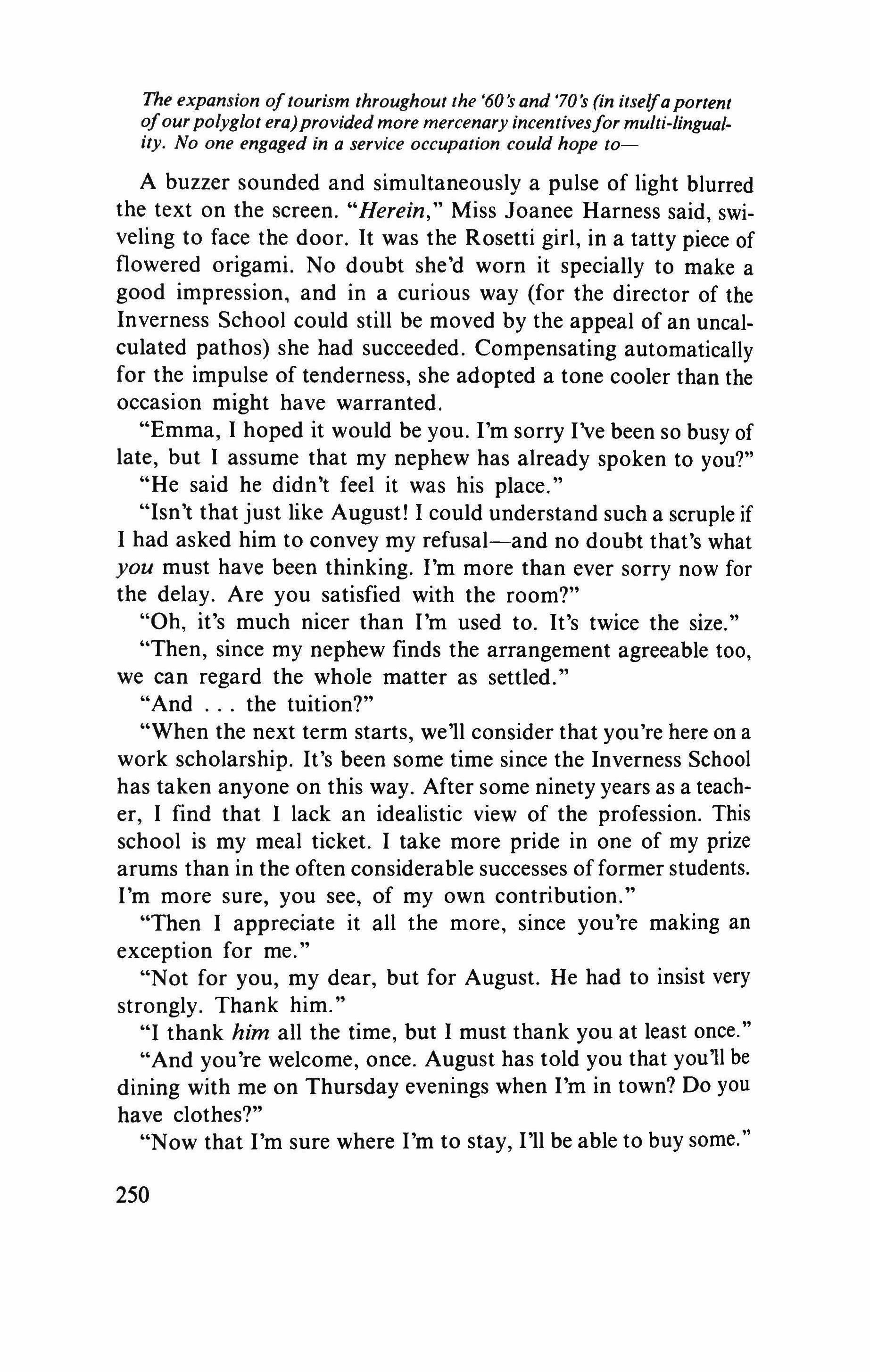
The expansion oftourism throughout the '60:S and '70:S (in itselfa portent ofour polyglot era)provided more mercenary incentivesfor multi-linguality. No one engaged in a service occupation could hope to-
A buzzer sounded and simultaneously a pulse of light blurred the text on the screen. "Herein," Miss Joanee Harness said, swiveling to face the door. It was the Rosetti girl, in a tatty piece of flowered origami. No doubt she'd worn it specially to make a good impression, and in a curious way (for the director of the Inverness School could still be moved by the appeal of an uncalculated pathos) she had succeeded. Compensating automatically for the impulse of tenderness, she adopted a tone cooler than the occasion might have warranted.
"Emma, I hoped it would be you. I'm sorry I've been so busy of late, but I assume that my nephew has already spoken to you?"
"He said he didn't feel it was his place."
"Isn't that just like August! I could understand such a scruple if I had asked him to convey my refusal-and no doubt that's what you must have been thinking. I'm more than ever sorry now for the delay. Are you satisfied with the room?"
"Oh, it's much nicer than I'm used to. It's twice the size."
"Then, since my nephew finds the arrangement agreeable too, we can regard the whole matter as settled."
"And the tuition?"
"When the next term starts, we'll consider that you're here on a work scholarship. It's been some time since the Inverness School has taken anyone on this way. After some ninety years as a teacher, I find that I lack an idealistic view of the profession. This school is my meal ticket. I take more pride in one of my prize arums than in the often considerable successes of former students. I'm more sure, you see, of my own contribution."
"Then I appreciate it all the more, since you're making an exception for me."
"Not for you, my dear, but for August. He had to insist very strongly. Thank him."
"I thank him all the time, but I must thank you at least once."
"And you're welcome, once. August has told you that you'll be dining with me on Thursday evenings when I'm in town? Do you have clothes?"
"Now that I'm sure where I'm to stay, I'll be able to buy some."
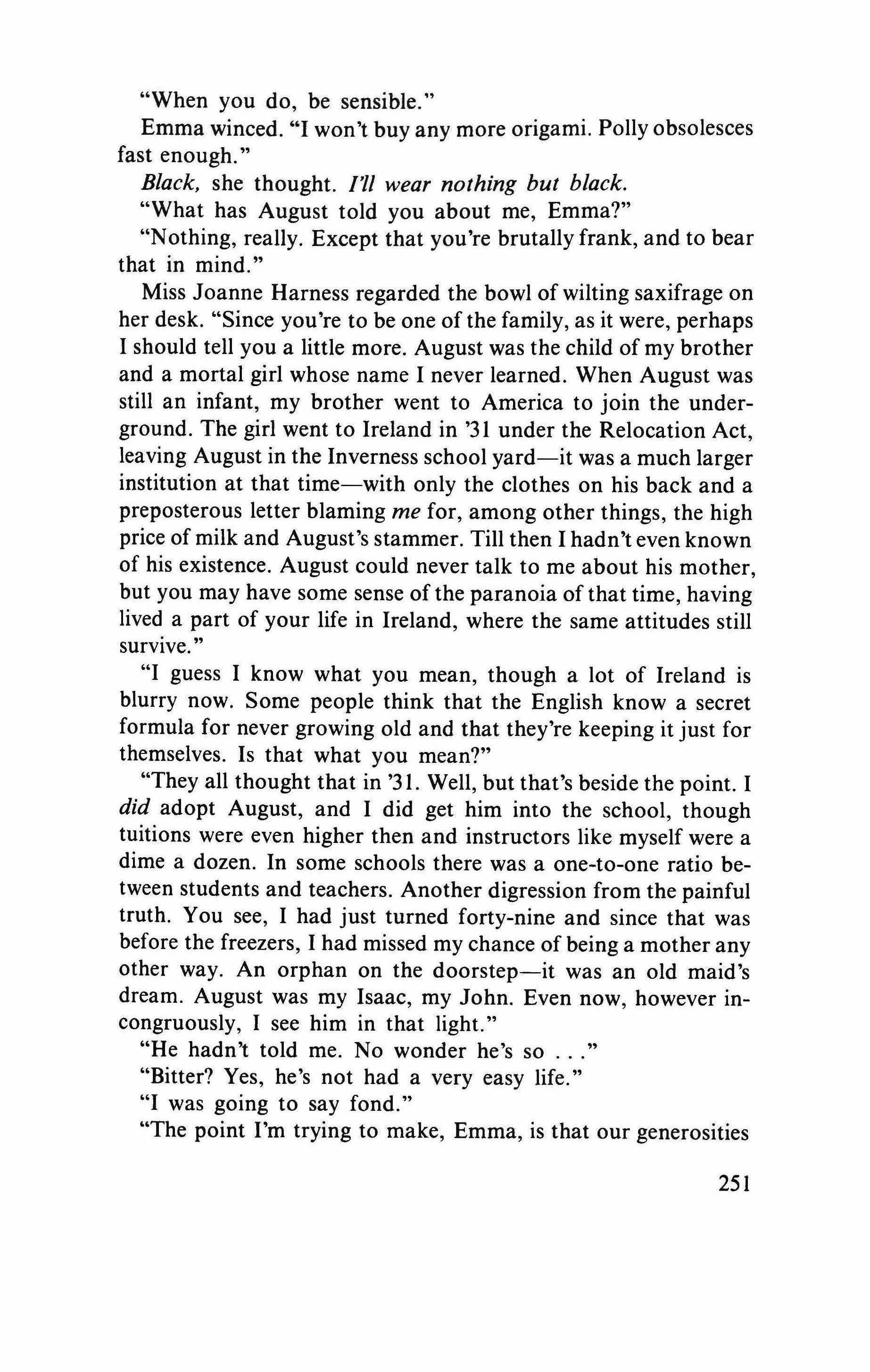
"When you do, be sensible."
Emma winced. "I won't buy any more origami. Polly obsolesces fast enough."
Black, she thought. I'll wear nothing but black.
"What has August told you about me, Emma?"
"Nothing, really. Except that you're brutally frank, and to bear that in mind."
Miss Joanne Harness regarded the bowl of wilting saxifrage on her desk. "Since you're to be one of the family, as it were, perhaps I should tell you a little more. August was the child of my brother and a mortal girl whose name I never learned. When August was still an infant, my brother went to America to join the underground. The girl went to Ireland in '31 under the Relocation Act, leaving August in the Inverness school yard-it was a much larger institution at that time-with only the clothes on his back and a preposterous letter blaming me for, among other things, the high price of milk and August's stammer. Till then I hadn't even known of his existence. August could never talk to me about his mother, but you may have some sense of the paranoia of that time, having lived a part of your life in Ireland, where the same attitudes still survive.
"I guess I know what you mean, though a lot of Ireland is blurry now. Some people think that the English know a secret formula for never growing old and that they're keeping it just for themselves. Is that what you mean?"
"They all thought that in '31. Well, but that's beside the point. I did adopt August, and I did get him into the school, though tuitions were even higher then and instructors like myself were a dime a dozen. In some schools there was a one-to-one ratio between students and teachers. Another digression from the painful truth. You see, I had just turned forty-nine and since that was before the freezers, I had missed my chance of being a mother any other way. An orphan on the doorstep-it was an old maid's dream. August was my Isaac, my John. Even now, however incongruously, I see him in that light."
"He hadn't told me. No wonder he's so "Bitter? Yes, he's not had a very easy life."
"I was going to say fond."
"The point I'm trying to make, Emma, is that our generosities

are usually a disguised form of selfishness. When we're good to other people, it's because we feel a need to be. So when you accept favors from strangers, you should be careful and look both ways."
"Oh, but I'm sure August doesn't have anything like that in mind!"
Miss Harness laughed. "Ah, you are a realist! But that wasn't quite what I meant you should be careful of. I'm sure we're going to get along."
It was Emma's turn to study the bowl of saxifrage. "Miss Harness?"
"Yes?"
"Have you heard anything more from Charmian Levin? Do you know when she'll be coming back?"
"Not from Charmian, but from her father. She isn't coming back. The Levins are moving to Milan, and Charmian is entering an art school there. I don't feel myself that's she's quite ready, but-" She shrugged lightly, as though to show how gladly she could suffer fools.
"Oh,
"One last thing, Emma. I took a telephone call for you this afternoon. In the future I wish you'd give August's number, not the school's. It was from a Mr. Christensen at your former address. He says there is a letter for you and that you forgot a box of your things. He'll be home through the evening."
As soon as he opened the door, Blake asked her, "Is that fellow still down on the street, the fellow in the red pants?"
"Michael Divine?"
"He is. Oh bugger."
"He said he was waiting to see Mr. Stone."
"I know, I know. He's trying to squeeze out the last drops, and Ned is just soft enough to let himself be squeezed. I'd give him the money myself if I though it would get rid of him."
Emma felt it was none of her business. How often in this same room Walt or her mother had poked fun at the swift succession of Blake's entanglements-and now these walls, like a chapel in which livestock are stabled, had become no more than the backdrop for this weight lifter's whimsical promiscuities. Nothing had changed. In the depths of the holly, apricots blossomed in a spring garden. And everything had changed. The holly was a lie: there was no garden, no spring, no flowering branch.

But for the letter she would never have come back to Lant Street. The two weeks that she had had to share the flat with Blake and Mr. Stone (who, to do them credit, had shown every consideration to their forlorn boarder) had been an agony of unspeakable shame for Emma. At the end of that time she would have been ready, had there been any reply from Cousin Bridie, to break the promise she had made her mother and return to Clonmel. Without the burden of that shame she would never have broken down in front of Mr. Harness. The last thing she had wanted to do was to seem to be begging-and she had done just that.
The letter was not from Walt.
The letter was from her Cousin Bridie, who explained that though she would herself have liked to take Emma in, there was so little space, with the six children all so big-besides which Leonard had put his foot down. Leonard became more impossible all the time, and Bridie did not want to upset Emma by repeating some of the things he had said, though probably Emma could imagine them for herself. Bridie was very sorry, but she couldn't see what she herself could do, and that was why she'd taken so long to reply. She had written to Mr. Smith in Cork, but Mr. Smith was senile now and even worse than Leonard (if that was possible), and didn't Emma know that old Mrs. Almrath was dead? She had died in the bad winter of '88, though she'd been very ill for a year before that. Bridie had even talked to Mr. Tauler, but Mr. Tauler had borne a grudge against Emma's mother ever since she'd run off with the money he had expected her to invest in the shop, and anyhow he had his niece, Agnes Kelleher, working in the shop. Cousin Bridie didn't know what else to suggest. She mentioned Emma and her mother every time she went to Mass, and she hoped Emma wouldn't hold it against her that she wasn't able to do more than that.
It was more or less the letter that Emma had been expecting from her cousin. After she'd read it through, she dropped it down the chute.
"Don't forget the box of things you left in the desk drawer." Blake said as she was leaving.
"How silly of me," Emma said. She took the neat package that Blake had made up for her.
"You can stay for dinner if you like. Ned won't be coming home till late."
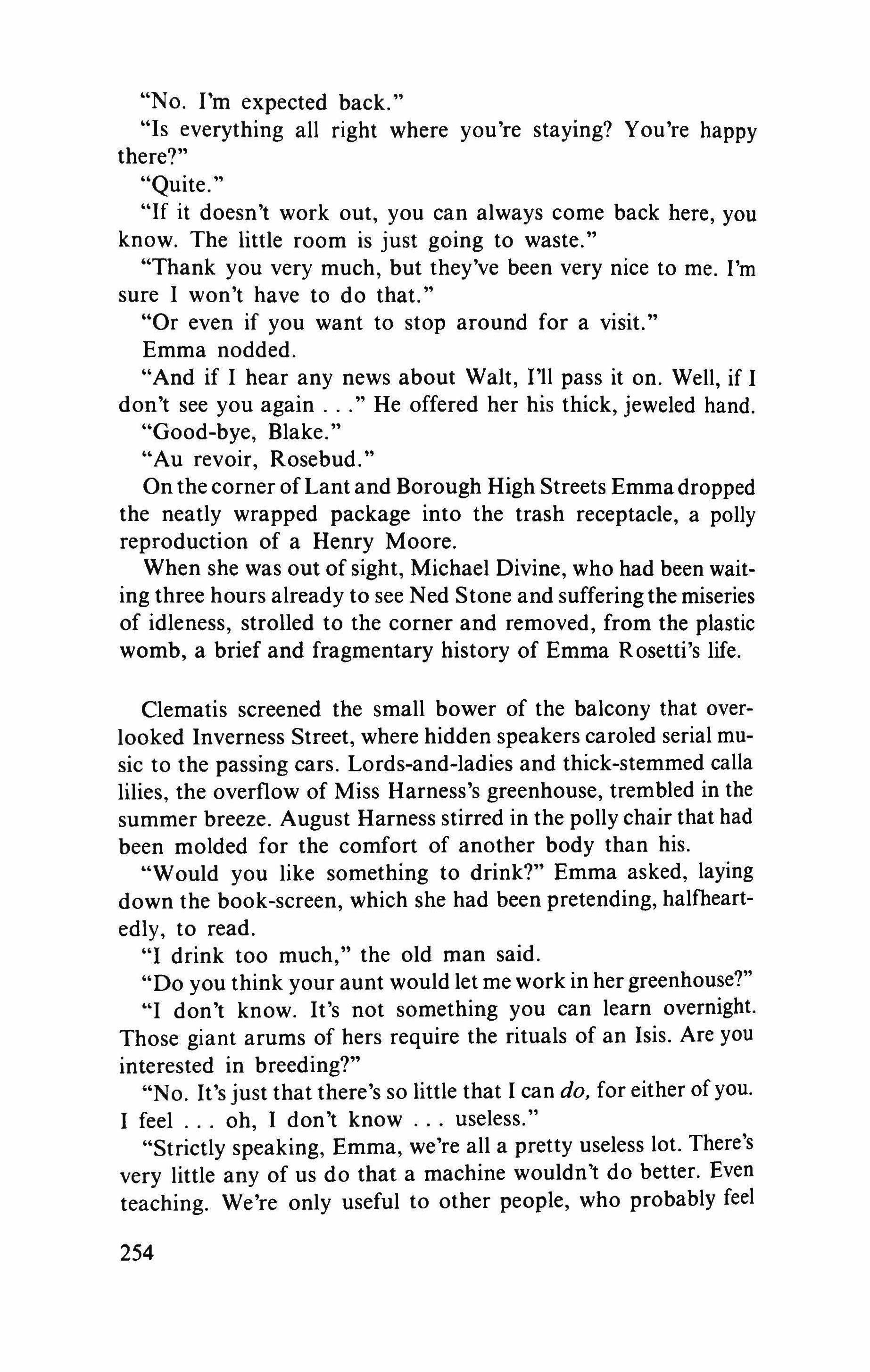
"No. I'm expected back."
"Is everything all right where you're staying? You're happy there?"
"Quite.
"If it doesn't work out, you can always come back here, you know. The little room is just going to waste."
"Thank you very much, but they've been very nice to me. I'm sure I won't have to do that."
"Or even if you want to stop around for a visit."
Emma nodded.
"And if I hear any news about Walt, I'll pass it on. Well, if I don't see you again He offered her his thick, jeweled hand.
"Good-bye, Blake."
"Au revoir, Rosebud."
On the corner of Lant and Borough High Streets Emma dropped the neatly wrapped package into the trash receptacle, a polly reproduction of a Henry Moore.
When she was out of sight, Michael Divine, who had been waiting three hours already to see Ned Stone and suffering the miseries of idleness, strolled to the corner and removed, from the plastic womb, a brief and fragmentary history of Emma Rosetti's life.
Clematis screened the small bower of the balcony that overlooked Inverness Street, where hidden speakers caroled serial music to the passing cars. Lords-and-ladies and thick-stemmed calla lilies, the overflow of Miss Harness's greenhouse, trembled in the summer breeze. August Harness stirred in the polly chair that had been molded for the comfort of another body than his.
"Would you like something to drink?" Emma asked, laying down the book-screen, which she had been pretending, halfheartedly, to read.
"I drink too much," the old man said.
"Do you think your aunt would let me work in her greenhouse?"
"I don't know. It's not something you can learn overnight. Those giant arums of hers require the rituals of an Isis. Are you interested in breeding?"
"No. It's just that there's so little that I can do, for either of you. I feel oh, I don't know useless."
"Strictly speaking, Emma, we're all a pretty useless lot. There's very little any of us do that a machine wouldn't do better. Even teaching. We're only useful to other people, who probably feel
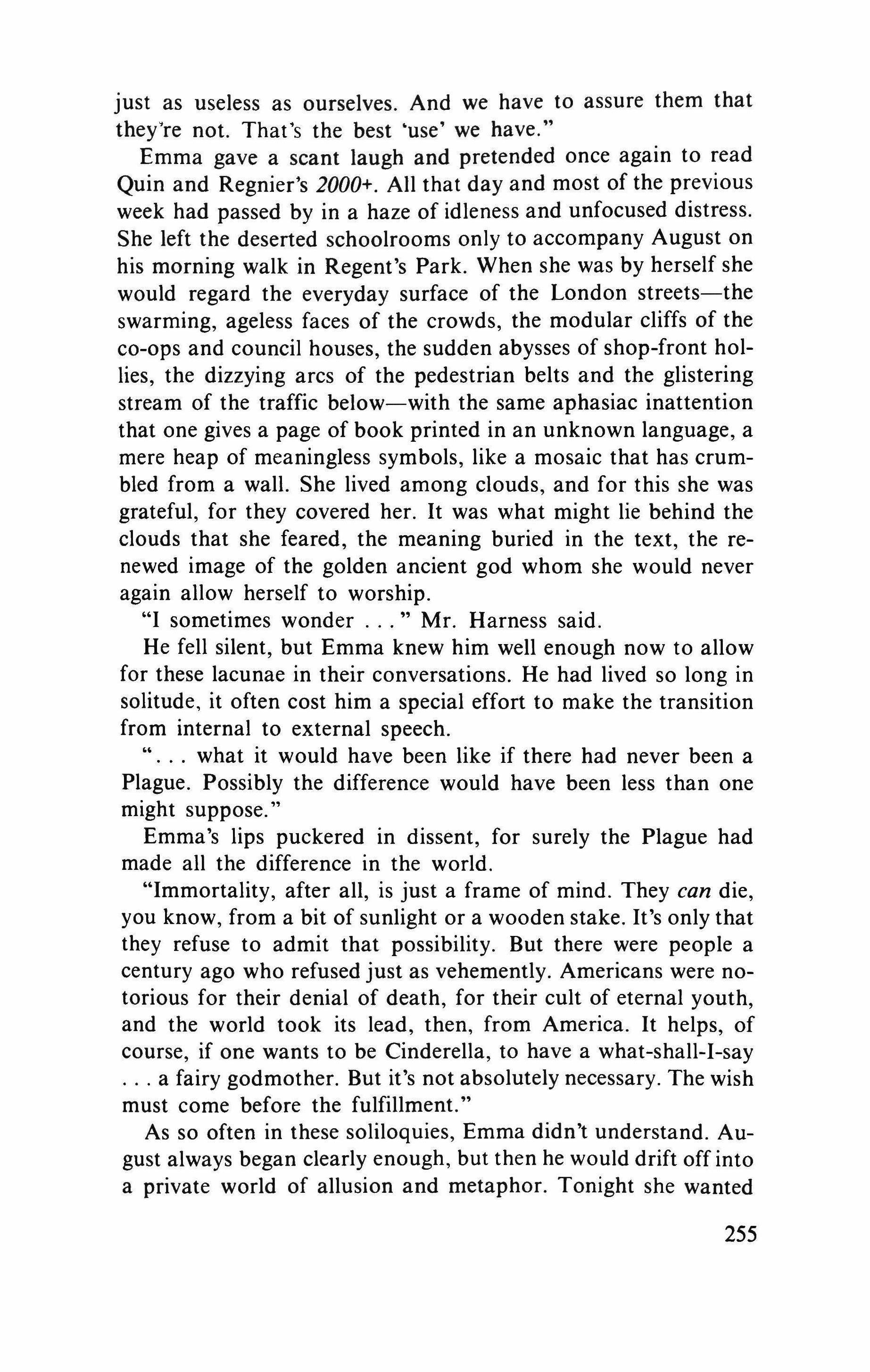
just as useless as ourselves. And we have to assure them that they're not. That's the best 'use' we have."
Emma gave a scant laugh and pretended once again to read Quin and Regnier's 2000+. All that day and most of the previous week had passed by in a haze of idleness and unfocused distress. She left the deserted schoolrooms only to accompany August on his morning walk in Regent's Park. When she was by herself she would regard the everyday surface of the London streets-the swarming, ageless faces of the crowds, the modular cliffs of the co-ops and council houses, the sudden abysses of shop-front hollies, the dizzying arcs of the pedestrian belts and the glistering stream of the traffic below-with the same aphasiac inattention that one gives a page of book printed in an unknown language, a mere heap of meaningless symbols, like a mosaic that has crumbled from a wall. She lived among clouds, and for this she was grateful, for they covered her. It was what might lie behind the clouds that she feared, the meaning buried in the text, the renewed image of the golden ancient god whom she would never again allow herself to worship.
"I sometimes wonder Mr. Harness said. He fell silent, but Emma knew him well enough now to allow for these lacunae in their conversations. He had lived so long in solitude, it often cost him a special effort to make the transition from internal to external speech.
what it would have been like if there had never been a Plague. Possibly the difference would have been less than one might suppose."
Emma's lips puckered in dissent, for surely the Plague had made all the difference in the world.
"Immortality, after all, is just a frame of mind. They can die, you know, from a bit of sunlight or a wooden stake. It's only that they refuse to admit that possibility. But there were people a century ago who refused just as vehemently. Americans were notorious for their denial of death, for their cult of eternal youth, and the world took its lead, then, from America. It helps, of course, if one wants to be Cinderella, to have a what-shall-I-say a fairy godmother. But it's not absolutely necessary. The wish must come before the fulfillment."
As so often in these soliloquies, Emma didn't understand. August always began clearly enough, but then he would drift off into a private world of allusion and metaphor. Tonight she wanted
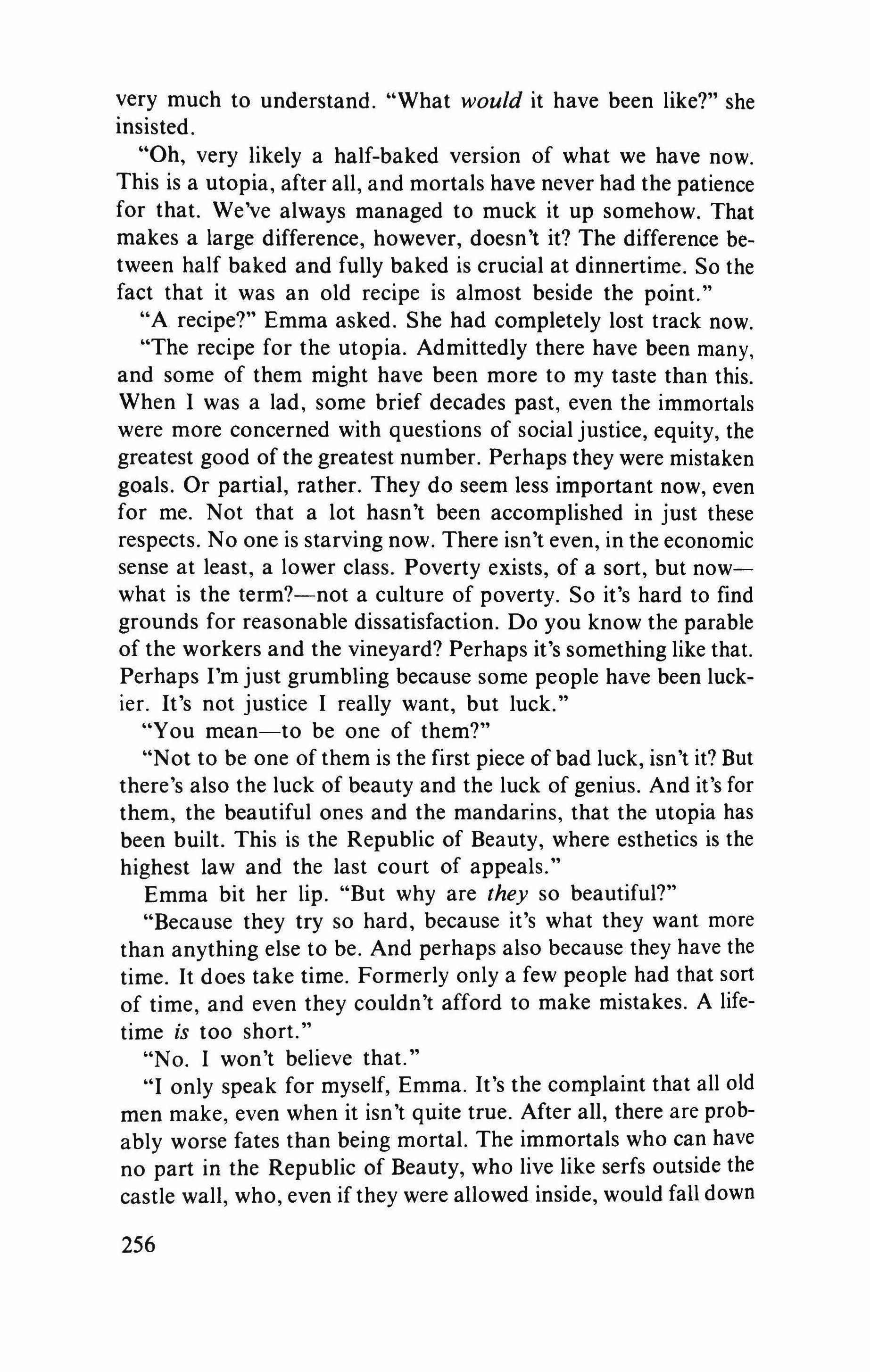
very much to understand. "What would it have been like?" she insisted.
"Oh, very likely a half-baked version of what we have now. This is a utopia, after all, and mortals have never had the patience for that. We've always managed to muck it up somehow. That makes a large difference, however, doesn't it? The difference between half baked and fully baked is crucial at dinnertime. So the fact that it was an old recipe is almost beside the point."
"A recipe?" Emma asked. She had completely lost track now.
"The recipe for the utopia. Admittedly there have been many, and some of them might have been more to my taste than this. When 1 was a lad, some brief decades past, even the immortals were more concerned with questions of social justice, equity, the greatest good of the greatest number. Perhaps they were mistaken goals. Or partial, rather. They do seem less important now, even for me. Not that a lot hasn't been accomplished in just these respects. No one is starving now. There isn't even, in the economic sense at least, a lower class. Poverty exists, of a sort, but nowwhat is the term?-not a culture of poverty. So it's hard to find grounds for reasonable dissatisfaction. Do you know the parable of the workers and the vineyard? Perhaps it's something like that. Perhaps I'm just grumbling because some people have been luckier. It's not justice I really want, but luck."
"You mean-to be one of them?"
"Not to be one of them is the first piece of bad luck, isn't it? But there's also the luck of beauty and the luck of genius. And it's for them, the beautiful ones and the mandarins, that the utopia has been built. This is the Republic of Beauty, where esthetics is the highest law and the last court of appeals."
Emma bit her lip. "But why are they so beautiful?"
"Because they try so hard, because it's what they want more than anything else to be. And perhaps also because they have the time. It does take time. Formerly only a few people had that sort of time, and even they couldn't afford to make mistakes. A lifetime is too short."
"No. 1 won't believe that."
"I only speak for myself, Emma. It's the complaint that all old men make, even when it isn't quite true. After all, there are probably worse fates than being mortal. The immortals who can have no part in the Republic of Beauty, who live like serfs outside the castle wall, who, even if they were allowed inside, would fall down
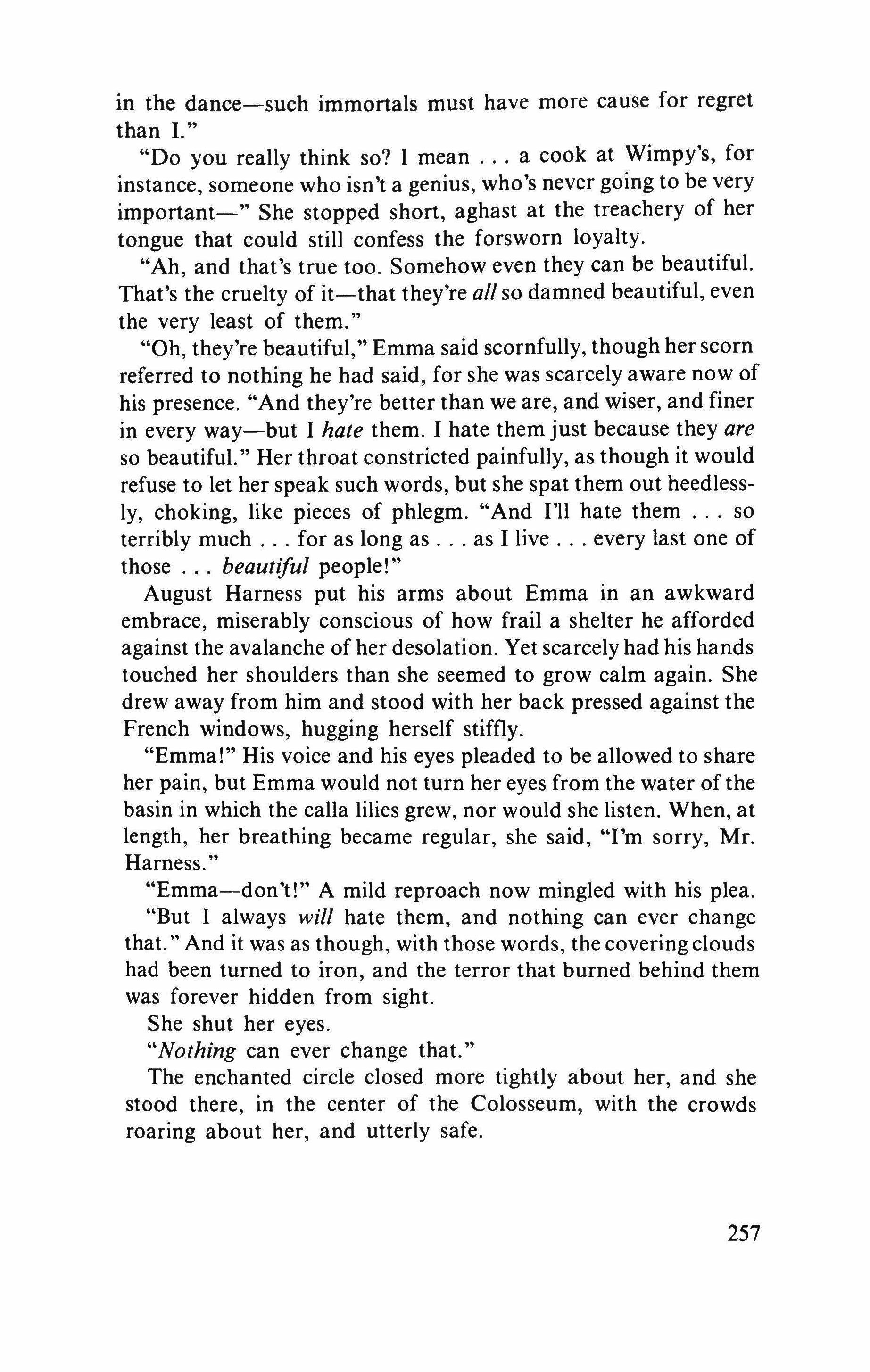
in the dance-such immortals must have more cause for regret than I."
"Do you really think so? I mean a cook at Wimpy's, for instance, someone who isn't a genius, who's never going to be very important-" She stopped short, aghast at the treachery of her tongue that could still confess the forsworn loyalty.
"Ah, and that's true too. Somehow even they can be beautiful. That's the cruelty of it-that they're all so damned beautiful, even the very least of them."
"Oh, they're beautiful," Emma said scornfully, though her scorn referred to nothing he had said, for she was scarcely aware now of his presence. "And they're better than we are, and wiser, and finer in every way-but I hate them. I hate them just because they are so beautiful." Her throat constricted painfully, as though it would refuse to let her speak such words, but she spat them out heedlessly, choking, like pieces of phlegm. "And I'll hate them so terribly much for as long as as I live every last one of those beautiful people!"
August Harness put his arms about Emma in an awkward embrace, miserably conscious of how frail a shelter he afforded against the avalanche of her desolation. Yet scarcely had his hands touched her shoulders than she seemed to grow calm again. She drew away from him and stood with her back pressed against the French windows, hugging herself stiffly.
"Emma!" His voice and his eyes pleaded to be allowed to share her pain, but Emma would not turn her eyes from the water of the basin in which the calla lilies grew, nor would she listen. When, at length, her breathing became regular, she said, "I'm sorry, Mr. Harness."
"Emma-don't!" A mild reproach now mingled with his plea.
"But I always will hate them, and nothing can ever change that." And it was as though, with those words, the covering clouds had been turned to iron, and the terror that burned behind them was forever hidden from sight.
She shut her eyes.
"Nothing can ever change that."
The enchanted circle closed more tightly about her, and she stood there, in the center of the Colosseum, with the crowds roaring about her, and utterly safe.

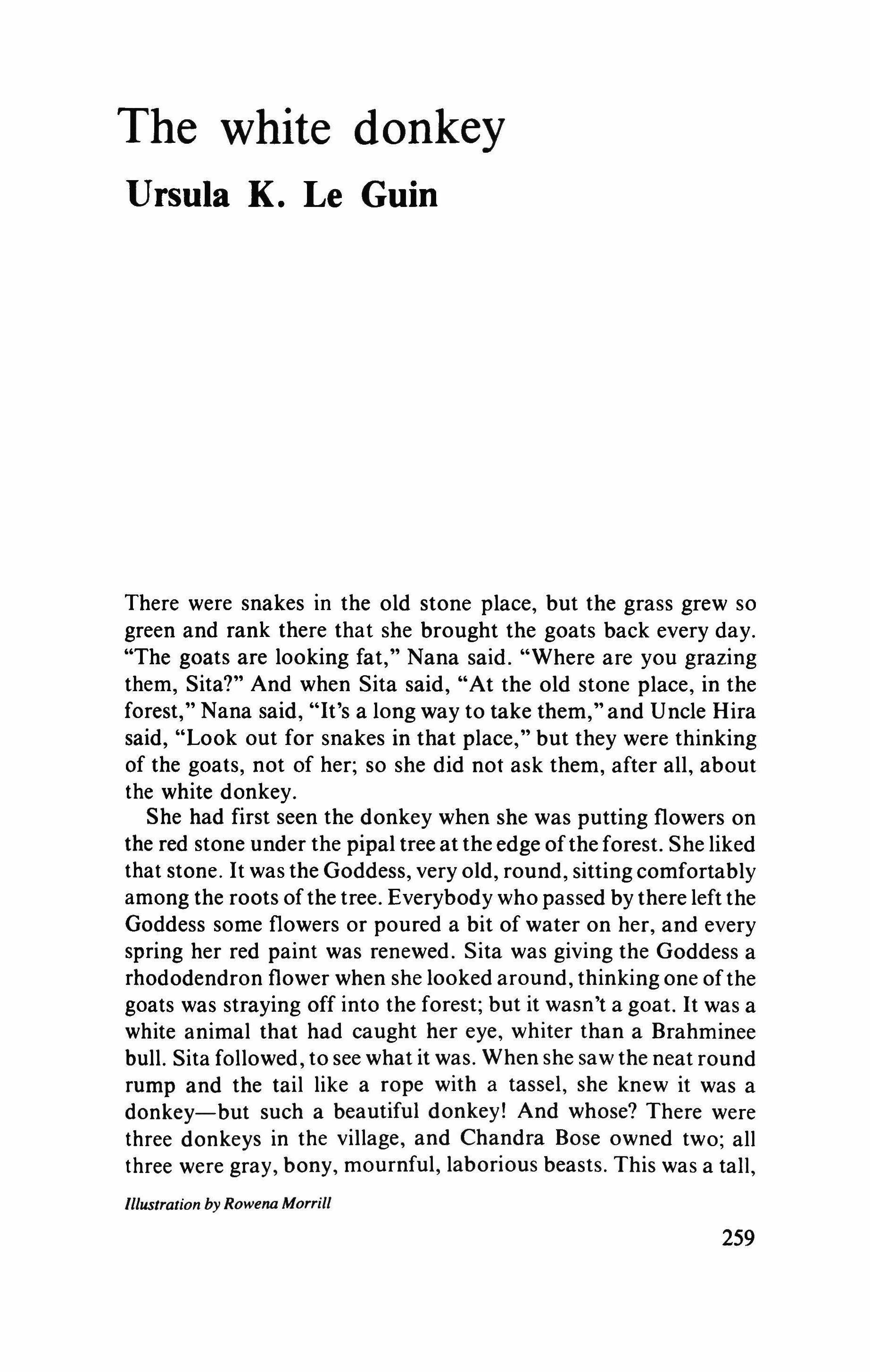
There were snakes in the old stone place, but the grass grew so green and rank there that she brought the goats back every day. "The goats are looking fat," Nana said. "Where are you grazing them, Sita?" And when Sita said, "At the old stone place, in the forest," Nana said, "It's a long way to take them," and Uncle Hira said, "Look out for snakes in that place," but they were thinking of the goats, not of her; so she did not ask them, after all, about the white donkey.
She had first seen the donkey when she was putting flowers on the red stone under the pipal tree at the edge ofthe forest. She liked that stone. It was the Goddess, very old, round, sittingcomfortably among the roots of the tree. Everybody who passed by there left the Goddess some flowers or poured a bit of water on her, and every spring her red paint was renewed. Sita was giving the Goddess a rhododendron flower when she looked around, thinking one ofthe goats was straying off into the forest; but it wasn't a goat. It was a white animal that had caught her eye, whiter than a Brahminee bull. Sita followed, to see what it was. When she saw the neat round rump and the tail like a rope with a tassel, she knew it was a donkey-but such a beautiful donkey! And whose? There were three donkeys in the village, and Chandra Bose owned two; all three were gray, bony, mournful, laborious beasts. This was a tall,
Illustration by Rowena
Morrill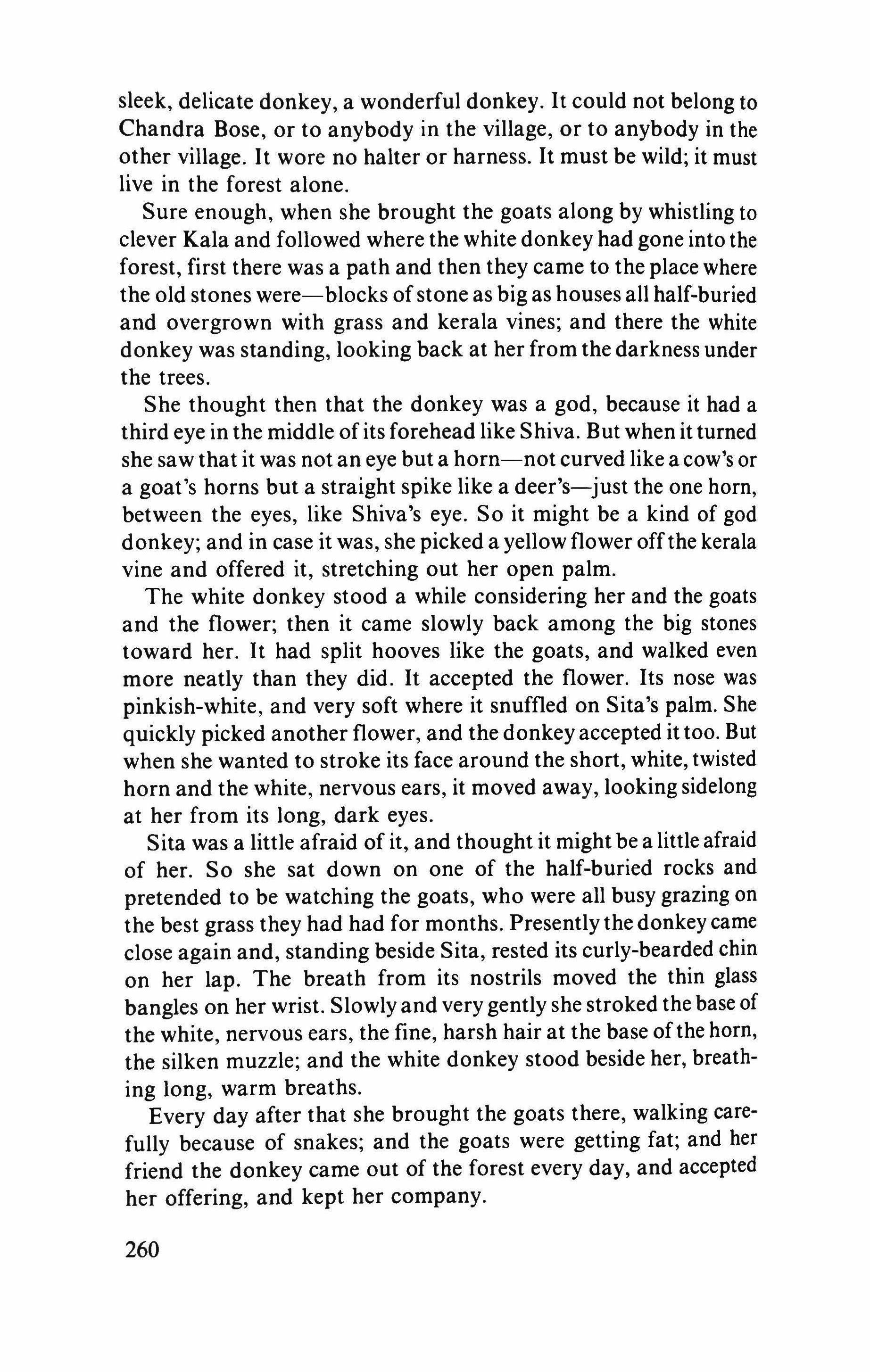
sleek, delicate donkey, a wonderful donkey. It could not belong to Chandra Bose, or to anybody in the village, or to anybody in the other village. It wore no halter or harness. It must be wild; it must live in the forest alone.
Sure enough, when she brought the goats along by whistling to clever Kala and followed where the white donkey had gone into the forest, first there was a path and then they came to the place where the old stones were-blocks of stone as big as houses all half-buried and overgrown with grass and kerala vines; and there the white donkey was standing, looking back at her from the darkness under the trees.
She thought then that the donkey was a god, because it had a third eye in the middle of its forehead like Shiva. But when it turned she saw that it was not an eye buta horn-not curved like a cow's or a goat's horns but a straight spike like a deer's-just the one horn, between the eyes, like Shiva's eye. So it might be a kind of god donkey; and in case it was, she picked a yellow flower offthe kerala vine and offered it, stretching out her open palm.
The white donkey stood a while considering her and the goats and the flower; then it came slowly back among the big stones toward her. It had split hooves like the goats, and walked even more neatly than they did. It accepted the flower. Its nose was pinkish-white, and very soft where it snuffled on Sita's palm. She quickly picked another flower, and the donkey accepted it too. But when she wanted to stroke its face around the short, white, twisted horn and the white, nervous ears, it moved away, looking sidelong at her from its long, dark eyes.
Sita was a little afraid of it, and thought it might be a little afraid of her. So she sat down on one of the half-buried rocks and pretended to be watching the goats, who were all busy grazing on the best grass they had had for months. Presently the donkey came close again and, standing beside Sita, rested its curly-bearded chin on her lap. The breath from its nostrils moved the thin glass bangles on her wrist. Slowly and very gently she stroked the base of the white, nervous ears, the fine, harsh hair at the base ofthe horn, the silken muzzle; and the white donkey stood beside her, breathing long, warm breaths.
Every day after that she brought the goats there, walking carefully because of snakes; and the goats were getting fat; and her friend the donkey came out of the forest every day, and accepted her offering, and kept her company.

"One bullock and one hundred rupees cash," said Vncle Hira. "You're crazy if you think we can marry her for less!"
"Moti Lal is a lazy man," Nana said. "Dirty and lazy."
"So he wants a wife to work and clean for him! And he'll take her for only one bullock and one hundred rupees cash!"
"Maybe he'll settle down when he's married," Nana said.
So Sita was betrothed to Moti Lal from the other village, who had watched her driving the goats home at evening. She had seen him watching her across the road but had never looked at him. She did not want to look at him.
"This is the last day," she said to the white donkey, while the goats cropped the grass among the big, carved, fallen stones, and the forest stood all about them in the singing stillness. "Tomorrow I'll come with Uma's little brother to show him the way here. He'll be the village goatherd now. The day after tomorrow is my wedding day."
The white donkey stood still, its curly, silky beard resting against her hand.
"Nana is giving me her gold bangle," Sita said to the donkey. "I get to wear a red sari, and have henna on my feet and hands."
The donkey stood still, listening.
"There'll be sweet rice to eat at the wedding," Sita said; then she began to cry.
"Good-bye, white donkey," she said. The white donkey looked at her sidelong, and slowly, not looking back, moved away from her and walked into the darkness under the trees.
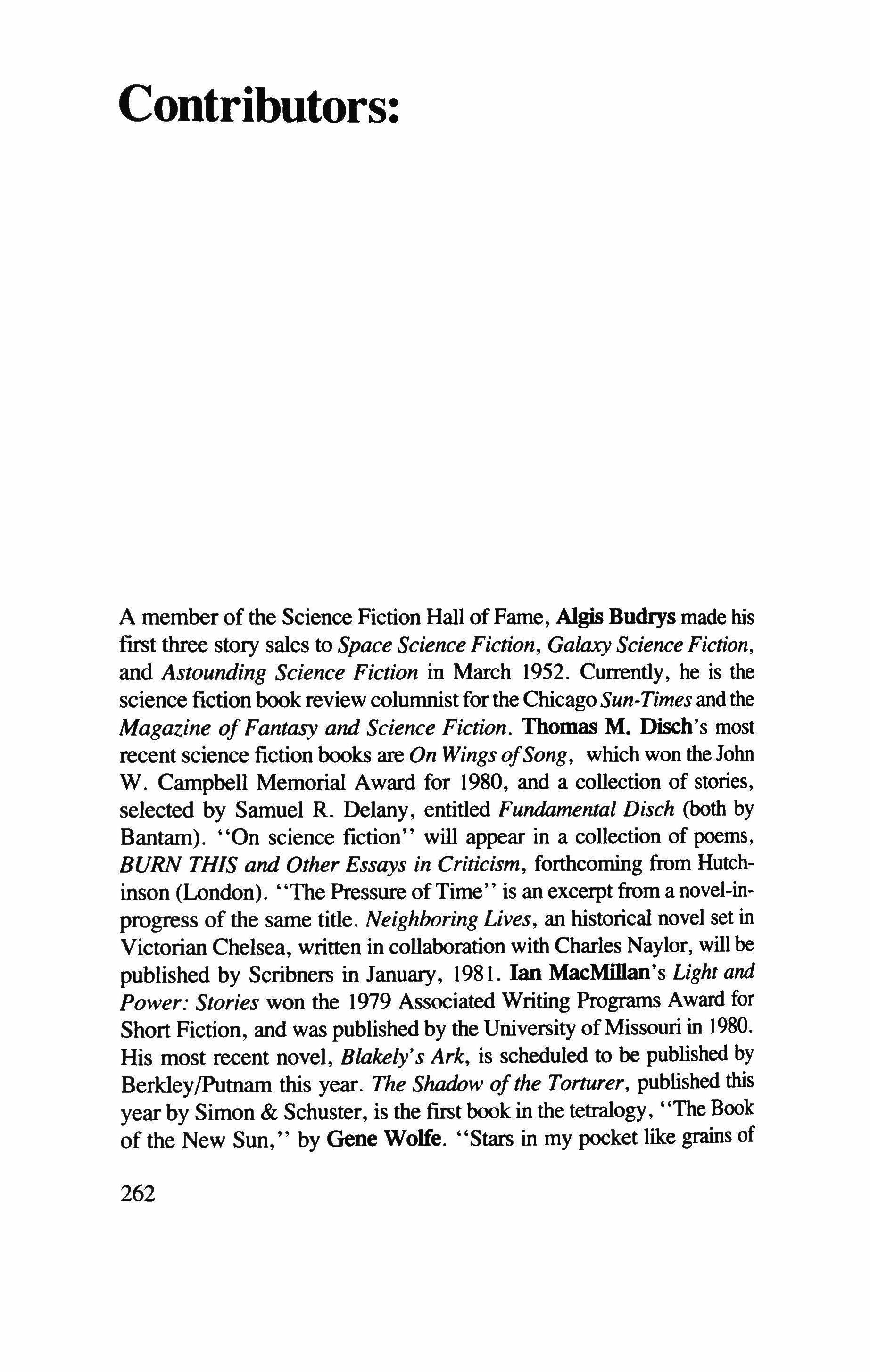
A member of the Science Fiction Hall of Fame, A1gis Budrys made his first three story sales to Space Science Fiction, Galaxy Science Fiction, and Astounding Science Fiction in March 1952. Currently, he is the science fiction book review columnist for the Chicago Sun-Times and the Magazine ofFantasy and Science Fiction. Thomas M. Disch's most recent science fiction books are On WingsofSong, which won the John W. Campbell Memorial Award for 1980, and a collection of stories, selected by Samuel R. Delany, entitled Fundamental Disch (both by Bantam). "On science fiction" will appear in a collection of poems, BURN THIS and Other Essays in Criticism, forthcoming from Hutchinson (London). "The Pressure of Time" is an excerpt from a novel-inprogress of the same title. Neighboring Lives, an historical novel set in Victorian Chelsea, written in collaboration with Charles Naylor, will be published by Scribners in January, 1981. Ian MacMillan's Light and Power: Stories won the 1979 Associated Writing Programs Award for Short Fiction, and was published by the University ofMissouri in 1980. His most recent novel, Blakely's Ark, is scheduled to be published by Berkley/Putnam this year. The Shadow ofthe Torturer, published this year by Simon & Schuster, is the first book in the tetralogy, "The Book of the New Sun," by Gene Wolfe. "Stars in my pocket like grains of 262
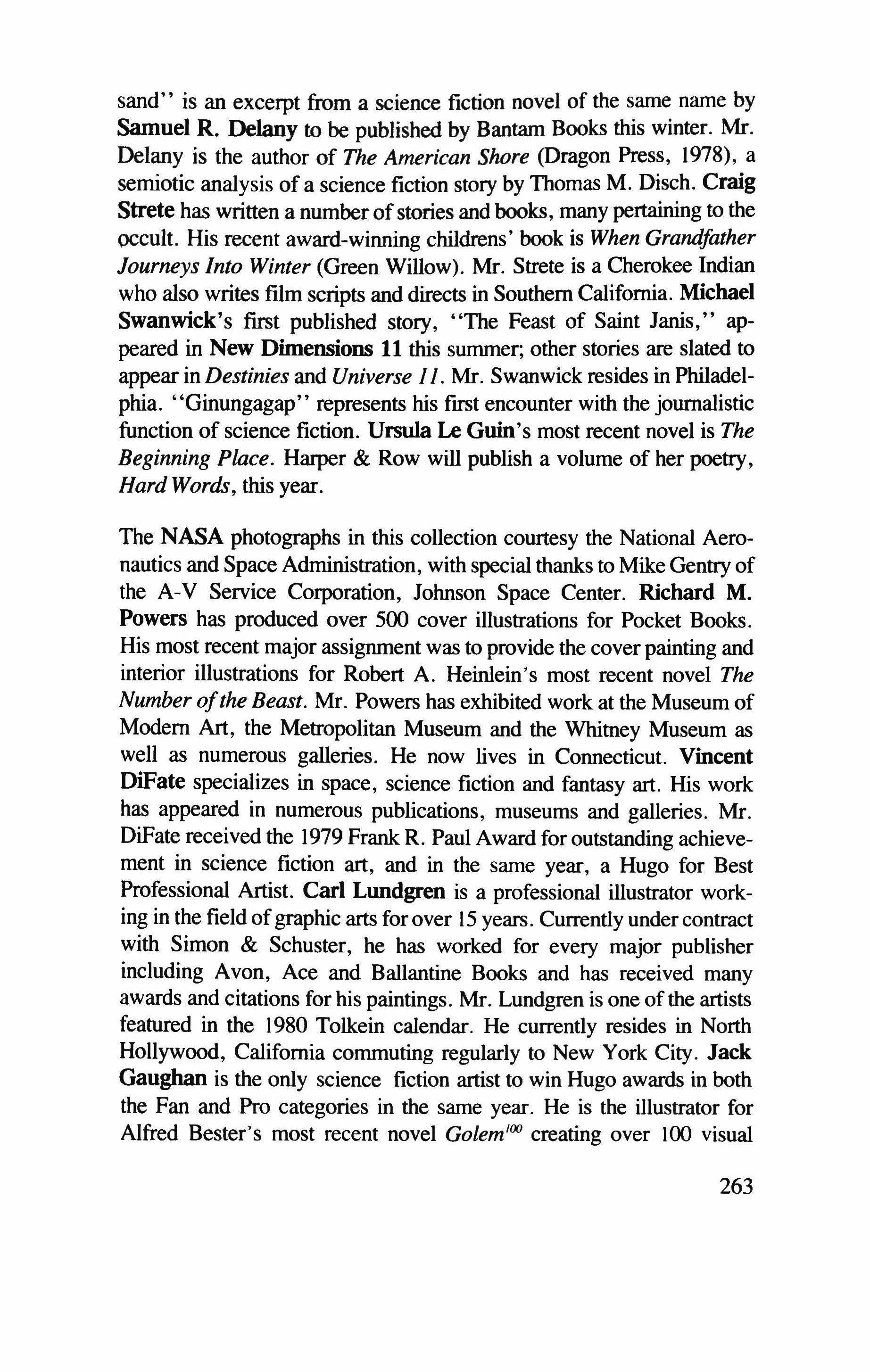
sand" is an excerpt from a science fiction novel of the same name by Samuel R. Delany to be published by Bantam Books this winter. Mr. Delany is the author of The American Shore (Dragon Press, 1978), a semiotic analysis of a science fiction story by Thomas M. Disch. Craig Strete has written a number of stories and books, many pertaining to the occult. His recent award-winning childrens' book is When Grandfather Journeys Into Winter (Green Willow). Mr. Strete is a Cherokee Indian who also writes film scripts and directs in Southern California. Michael Swanwick's first published story, "The Feast of Saint Janis," appeared in New Dimensions 11 this summer; other stories are slated to appear in Destinies and Universe 11. Mr. Swanwick resides in Philadelphia. "Ginungagap" represents his first encounter with the journalistic function of science fiction. Ursula Le Guin's most recent novel is The Beginning Place. Harper & Row will publish a volume of her poetry, Hard Words, this year.
The NASA photographs in this collection courtesy the National Aeronautics and Space Administration, with special thanks to Mike Gentry of the A-V Service Corporation, Johnson Space Center. Richard M. Powers has produced over 500 cover illustrations for Pocket Books. His most recent major assignment was to provide the cover painting and interior illustrations for Robert A. Heinlein's most recent novel The Number ofthe Beast. Mr. Powers has exhibited work at the Museum of Modem Art, the Metropolitan Museum and the Whitney Museum as well as numerous galleries. He now lives in Connecticut. Vincent DiFate specializes in space, science fiction and fantasy art. His work has appeared in numerous publications, museums and galleries. Mr. DiFate received the 1979 Frank R. Paul Award for outstanding achievement in science fiction art, and in the same year, a Hugo for Best Professional Artist. Carl Lundgren is a professional illustrator working in the field ofgraphic arts for over 15 years. Currently under contract with Simon & Schuster, he has worked for every major publisher including Avon, Ace and Ballantine Books and has received many awards and citations for his paintings. Mr. Lundgren is one of the artists featured in the 1980 Tolkein calendar. He currently resides in North Hollywood, California commuting regularly to New York City. Jack Gaughan is the only science fiction artist to win Hugo awards in both the Fan and Pro categories in the same year. He is the illustrator for Alfred Bester's most recent novel Golem'" creating over 100 visual
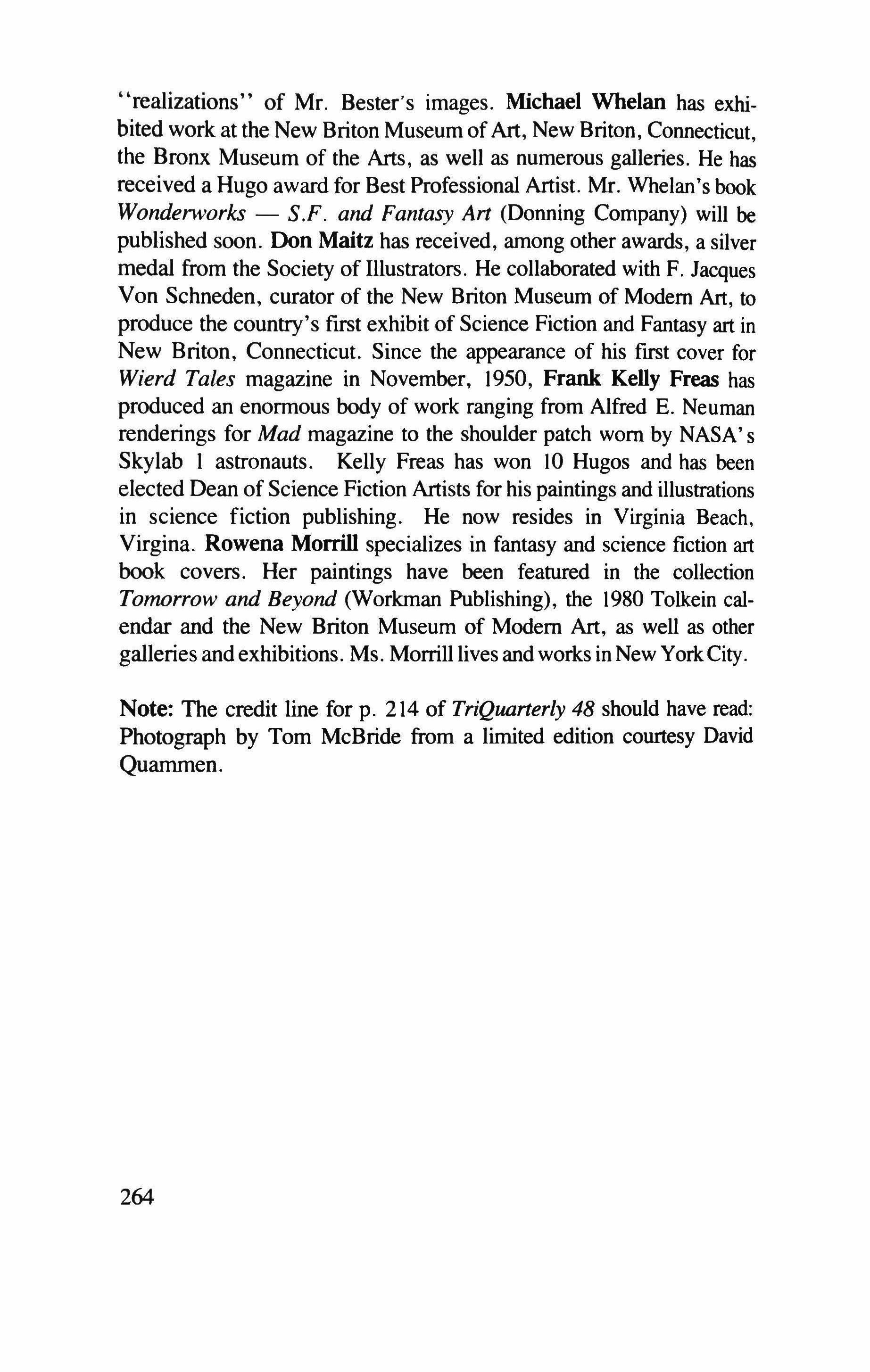
"realizations" of Mr. Bester's images. Michael Whelan has exhibited work at the New Briton Museum of Art, New Briton, Connecticut, the Bronx Museum of the Arts, as well as numerous galleries. He has received a Hugo award for Best Professional Artist. Mr. Whelan's book Wonderworks - S.F. and Fantasy Art (Donning Company) will be published soon. Don Maitz has received, among other awards, a silver medal from the Society of Illustrators. He collaborated with F. Jacques Von Schneden, curator of the New Briton Museum of Modem Art, to produce the country's first exhibit of Science Fiction and Fantasy art in New Briton, Connecticut. Since the appearance of his first cover for Wierd Tales magazine in November, 1950, Frank Kelly Freas has produced an enormous body of work ranging from Alfred E. Neuman renderings for Mad magazine to the shoulder patch worn by NASA's Skylab I astronauts. Kelly Freas has won 10 Hugos and has been elected Dean of Science Fiction Artists for his paintings and illustrations in science fiction publishing. He now resides in Virginia Beach, Virgina. Rowena Morrill specializes in fantasy and science fiction art book covers. Her paintings have been featured in the collection Tomorrow and Beyond (Workman Publishing), the 1980 Tolkein calendar and the New Briton Museum of Modem Art, as well as other galleries and exhibitions. Ms. Morrill lives and works in New York City.
Note: The credit line for p. 214 of TriQuarterly 48 should have read: Photograph by Tom McBride from a limited edition courtesy David Quammen.
Ox'o�d U�iv�� p�� announc� the �iut volume. o� 4 new -6«i� devoted to -6C.ie.nce ,.ict.ion w.t.it�.
An examination of the scope of Heinlein's works, including his latest novel, The Number of the Beast. Franklin considers Heinlein's SF novels and stories as an expression of some of the most fundamental dreams and nightmares of a rapidly changing society and demonstrates that his writings are intertwined with the significant technological and social changes that have occured in America over four decades (November 80, Cloth $12.95, Paper $3.95).
Also published by Oxford: Scf.ence FictiOll: History. Scf.ence. YiaiOll by Robert Scholes & Eric S. Rabkin
A collection of SF stories based on environmental concern about the future of Planet Earth. The stories vary in mood and outlook, and offer a wide range of speculation about the future of our planet. The contributors include such notable authors as Ursula Le Guin, Frank Herbert, Poul Anderson and Larry Niven and also various newer writers.
Published by Sierra Club Books (October 1980) paper $5.95
An internationally renowned astronomer (discoverer of two galaxies) takes the reader on a voyage through the solar system and on to the outer reaches of space. With vivid imagery. Paolo Maffei creates a dazzling picture of the vastness and splendor of the universe. Maffei has also written a sequel, Monsters in the Sky (MIT Press, $15.00). Beyond the Moon is now published in paperback by Avon Books, $7.95.
Available at these and other Follett bookstores:
Jobns BopItiDs University Book Center
Charles & 34th Streets Baltimore. MD 21218
Rorria Center Store
Northwestern University 1999 Sheridan Road Evanston, IL 60201
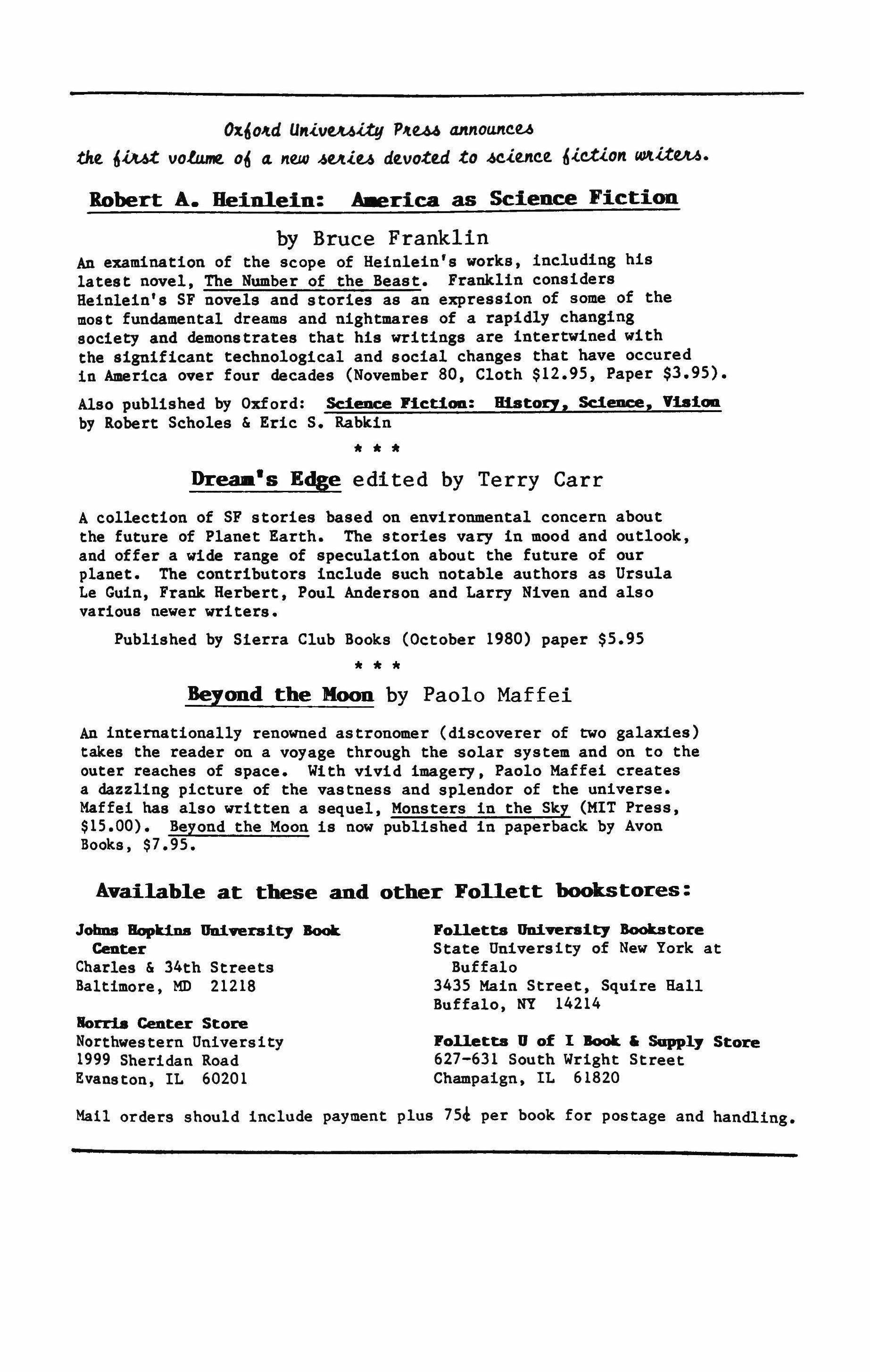
Folletta Uni_rsity Bookstore State University of New York at Buffalo 3435 Main Street, Squire Hall Buffalo, NY 14214
Folletta 0 of I Book • Supply Store 627-631 South Wright Street Champaign. IL 61820
Mail orders should include payment plus 75¢ per book for postage and handling.
Sentences
Howard Nemerov
The poems in Sentences-epigrams, narratives, speculations, riddles, meditations -' word the world, give fresh perception to the familiar object and the essential fact.
elolh 76pt1.ges 18.9) December
Shadow ofthe Hunter
Stones o/EskimoLtfe
Richard K. Nelson
In this collection ofstories, ethnographer Richard Nelson explores the human genius for adapting to challenge and adversity, in a land where every moment oflife is an utmost expression ofthat genius.
Clolh 272pt1.ges 112.9J Avt1.iklble
"NllrllYlln Wilkes in me II spring ofgrlltitude, for he hilS offered me II secondhome Without him I could never hllve known whllt it is like to be Indian. "-Grllhllm Greene
Swami and Friends
With that gentle humor, Narayan's first novel evokes for us the universal experiences of childhood while capturing the particular flavor ofwhat that experience was like in 1930 amidst the first stirrings oflndia's struggle for independence.
Peper 192pt1.ges 13.9) Avt1.iklble
The Bachelor ofArts
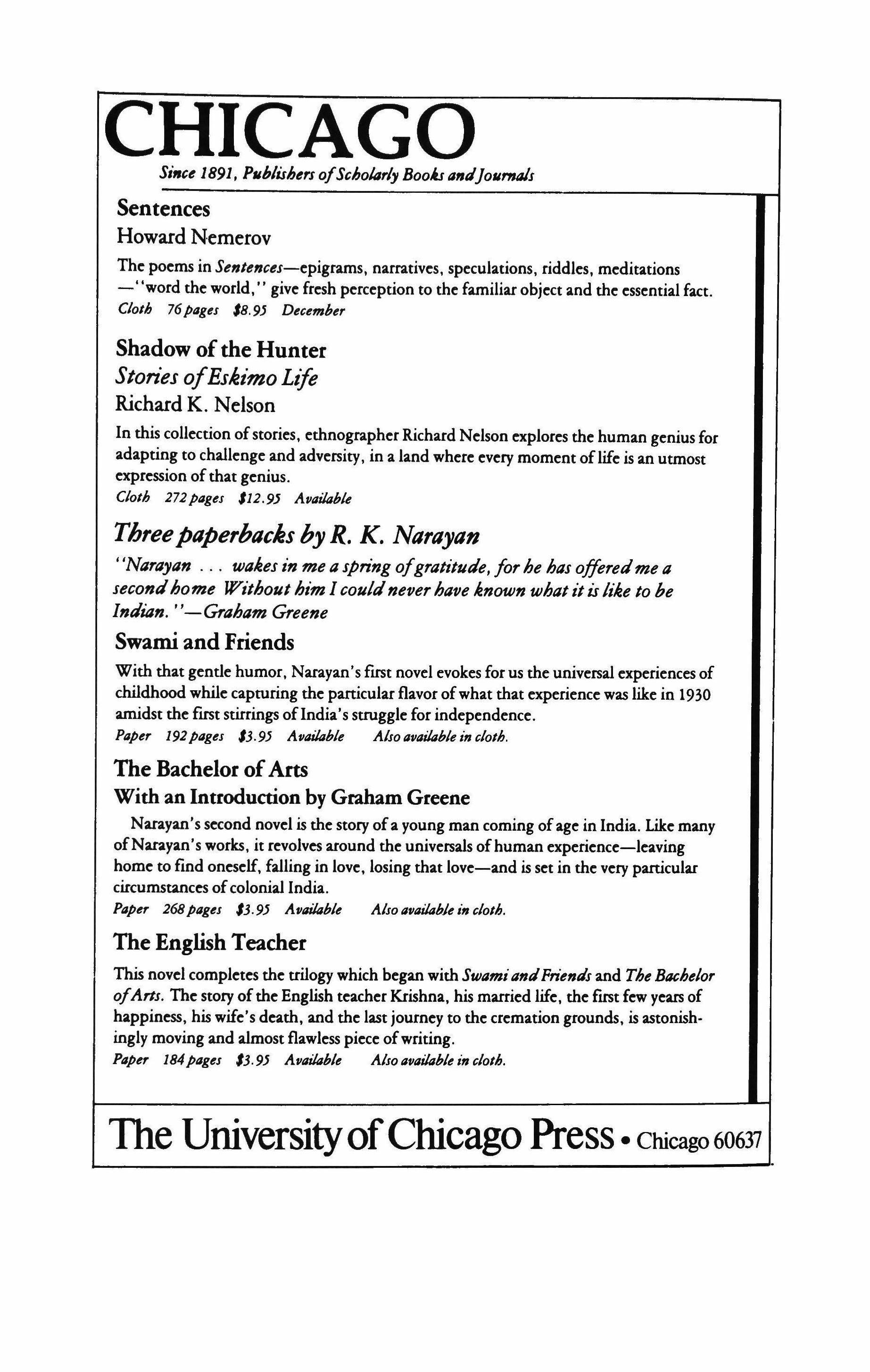
Also t1.1It1.iklbie in clolh.
With an Introduction by Graham Greene
Narayan's second novel is the story of a young man coming ofage in India. Like many ofNarayan's works, it revolves around the universals ofhuman experience-leaving home to find oneself, falling in love, losing that love-and is set in the very particular circumstances ofcolonial India.
Paper 268pt1.ges 13.9) Allt1.ikIbie
Also t1.1It1.iklbJe in clolh.
This novel completes the trilogy which began with SWllmilindFriends and The BlIChelor ofArts. The Story ofthe English teacher Krishna, his married life, the first few years of happiness, his wife's death, and the last journey to the cremation grounds, is astonishingly moving and almost flawless piece ofwriting.
Pt1.per 184pt1.ges 13.9) Avt1.iklble Alsot1.vt1.iklbie in clolh.
The UniversityofChicago Press Chicago 60637
Those caught up in contemporary changes in the intellectual world - in literary criticism and cultural criticism - will gain much from this stimulating and complex look at an emerging intellectual theory. "The essays, addresses, lectures, and journal pieces which comprise this new volume are connected by Hassan's abiding interest in the human imagination and its capabilities to see through experience to the innermost levels of meaning, to creatively deal with change, and to envision the future." - Culturallnfomation Service. $15.00 Newly Published in Paperback

"The most impressive theoretical criticism of the year - American Literary Scholarship. Zavarzadeh "breaks new ground in literary analysis, especially as he considers literary modes (the fictional vs. the factual) and technique In all respects, this is a major theoretical work." - Choice. (Chosen by Choice as an outstanding book of 1977-78.) $5.95 (also in cloth, $10.00)
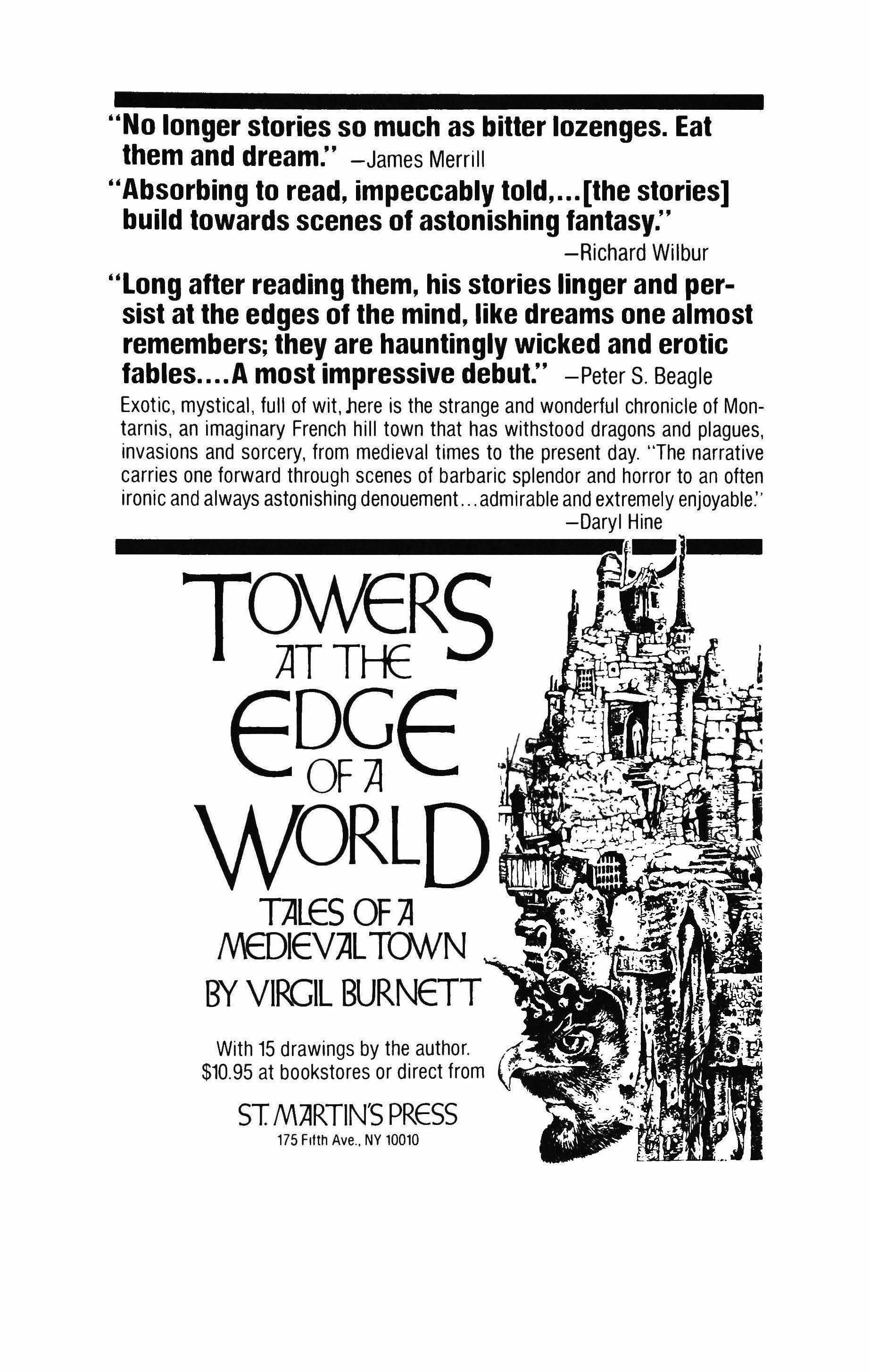
"No longer stories so much as bitter lozenges. Eat them and dream." -James
Merrill"Absorbing to read, impeccably tOld, [the stories] build towards scenes of astonishing fantasy."
-Richard Wilbur"Long after reading them, his stories linger and persist at the edges of the mind, like dreams one almost remembers; they are hauntingly wicked and erotic fables A most impressive debut." -Peter S. Beagle
Exotic, mystical, full of wit, .here is the strange and wonderful chronicle of Montarnis, an imaginary French hill town that has withstood dragons and plagues, invasions and sorcery, from medieval times to the present day. "The narrative carries one forward through scenes of barbaric splendor and horror to an often ironic and always astonishing denouement admirable and extremely enjoyable:'
-Daryl Hine
